

Winter 1982
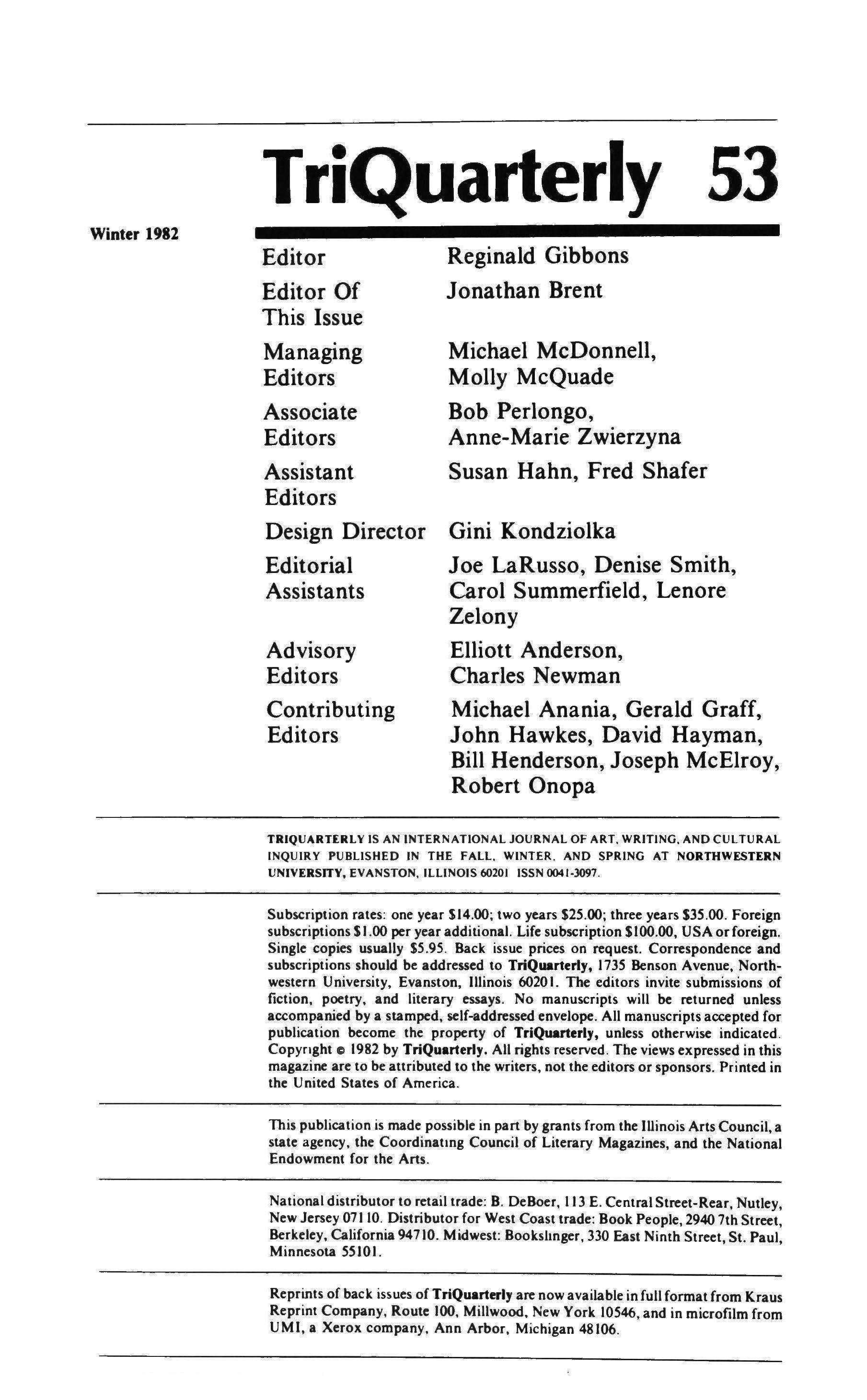



Winter 1982

Editor
Editor Of This Issue
Managing
Editors
Associate
Editors
Assistant
Editors
Design Director
Editorial Assistants
Advisory
Editors
Contributing
Editors
Reginald Gibbons
Jonathan Brent
Michael McDonnell, Molly McQuade
Bob Perlongo, Anne-Marie Zwierzyna
Susan Hahn, Fred Shafer
Gini Kondziolka
Joe LaRusso, Denise Smith, Carol Summerfield, Lenore Zelony
Elliott Anderson, Charles Newman
Michael Anania, Gerald Graff, John Hawkes, David Hayman, Bill Henderson, Joseph McElroy, Robert Onopa
TRIQUARTERLY IS AN INTERNATIONAL JOURNAL OF ART. WRITING. AND CUlTURAl INQUIRY PUBLISHED IN THE FAll. WINTER. AND SPRING AT NORTHWESTERN UNIVERSITY, EVANSTON. ILLINOIS 60201 ISSN 0041·3097.
Subscription rates: one year 514.00; two years 525.00; three years 535.00. Foreign subscriptions $ 1.00 per year additional. Life subscription $100.00, USA or foreign. Single copies usually $5.95. Back issue prices on request. Correspondence and subscriptions should be addressed to TriQuarterly, 1735 Benson Avenue, Northwestern University, Evanston, Illinois 60201. The editors invite submissions of fiction, poetry, and literary essays. No manuscripts will be returned unless accompanied by a stamped, self-addressed envelope. All manuscripts accepted for publication become the property of TriQuarterly, unless otherwise indicated. Copynght 0 1982 by TriQuarterly. All rights reserved. The views expressed in this magazine are to be attributed to the writers, not the editors or sponsors. Printed in the United States of America.
This publication is made possible in part by grants from the Illinois Arts Council, a state agency. the Coordinatmg Council of Literary Magazines, and the National Endowment for the Arts.
National distributor to retail trade: B. DeBoer, 113 E. Central Street-Rear, Nutley, New Jersey 07110. Distributor for West Coast trade: Book People, 2940 7th Street, Berkeley, California 94710. Midwest: Bookshngcr. 330 East Ninth Street, St. Paul, Minnesota 55101.
Reprints of back issues of TriQuarterly are now available in full format from Kraus Reprint Company, Route 100, Millwood, New York 10546, and in microfilm from UMI, a Xerox company. Ann Arbor. Michigan 48106.


By the spring where the water's still clear, before itflows into the valley and darkens -[Folk song]
Army: the combined military forces of a state except for its navy. Designation of the highest collection of operational forces composed of corps and divisions of various types of soldiers or only of one type.-[From a directive of the Israeli Army, June, 1948]
Kismet.-[A Turkish word for fate]
1 For two days and two nights, Monday and Tuesday, the 6th and 7th of June 1948, the 22nd and 23rd day of the Arab-Israeli war, Danny Polnauer had been waiting at Bab el Waad to be assigned to a division that was transporting food, water, arms, and soldiers into Jerusalem. The place was under seige, and flooded with rumors and conjectures which raised false hopes. Both sides had built up their offenses and defenses and were trying to capture or hold on to as much as they could. He and Lampel had arranged to meet at Magda Wilderova's place in a week's time, but he hoped he'd get there a few days earlier. It seemed to him that, in spite of all, she held the world close to her and yet at a distance, as if it were a friend whose faults she admits to and laughs at and whom she likes at the same time. Lampel had used the back of a Via Imperial telegram which he'd received, requesting him to send material and saying his money had been sent to Bank Leumi. Lampel had scrawled on it to inform Danny that he was with a rearguard unit in the mountains.
The staging center lay between Ekron and Chulda. The encampment was full of soldiers, officers, horses, cars, and tents; some of the tents were standing, some were folded. There were all sorts of stuff, including barrels of fish and cages of pigeons. A few of the fish had died and lay stinking on the pine needles. Soldiers with their mess kits stood around the kitchen tent, 3
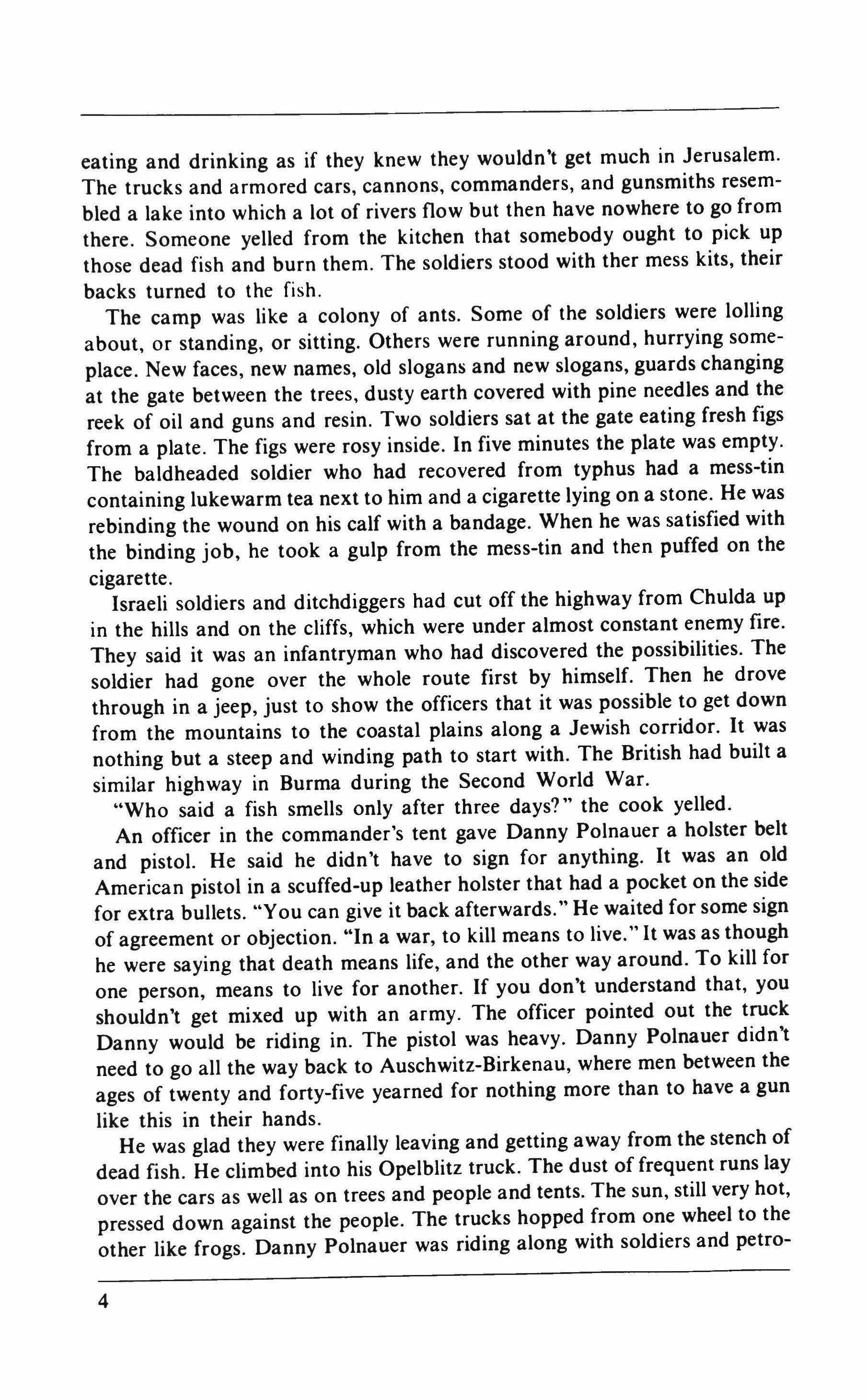
eating and drinking as if they knew they wouldn't get much in Jerusalem. The trucks and armored cars, cannons, commanders, and gunsmiths resembled a lake into which a lot of rivers flow but then have nowhere to go from there. Someone yelled from the kitchen that somebody ought to pick up those dead fish and burn them. The soldiers stood with ther mess kits, their backs turned to the fish.
The camp was like a colony of ants. Some of the soldiers were lolling about, or standing, or sitting. Others were running around, hurrying someplace. New faces, new names, old slogans and new slogans, guards changing at the gate between the trees, dusty earth covered with pine needles and the reek of oil and guns and resin. Two soldiers sat at the gate eating fresh figs from a plate. The figs were rosy inside. In five minutes the plate was empty. The baldheaded soldier who had recovered from typhus had a mess-tin containing lukewarm tea next to him and a cigarette lying on a stone. He was rebinding the wound on his calf with a bandage. When he was satisfied with the binding job, he took a gulp from the mess-tin and then puffed on the cigarette.
Israeli soldiers and ditchdiggers had cut off the highway from Chulda up in the hills and on the cliffs, which were under almost constant enemy fire. They said it was an infantryman who had discovered the possibilities. The soldier had gone over the whole route first by himself. Then he drove through in a jeep, just to show the officers that it was possible to get down from the mountains to the coastal plains along a Jewish corridor. It was nothing but a steep and winding path to start with. The British had built a similar highway in Burma during the Second World War.
"Who said a fish smells only after three days?" the cook yelled.
An officer in the commander's tent gave Danny Polnauer a holster belt and pistol. He said he didn't have to sign for anything. It was an old American pistol in a scuffed-up leather holster that had a pocket on the side for extra bullets. "You can give it back afterwards." He waited for some sign of agreement or objection. "In a war, to kill means to live." It was as though he were saying that death means life, and the other way around. To kill for one person, means to live for another. If you don't understand that, you shouldn't get mixed up with an army. The officer pointed out the truck Danny would be riding in. The pistol was heavy. Danny Polnauer didn't need to go all the way back to Auschwitz-Birkenau, where men between the ages of twenty and forty-five yearned for nothing more than to have a gun like this in their hands.
He was glad they were finally leaving and getting away from the stench of dead fish. He climbed into his Opelblitz truck. The dust of frequent runs lay over the cars as well as on trees and people and tents. The sun, still very hot, pressed down against the people. The trucks hopped from one wheel to the other like frogs. Danny Polnauer was riding along with soldiers and petro-
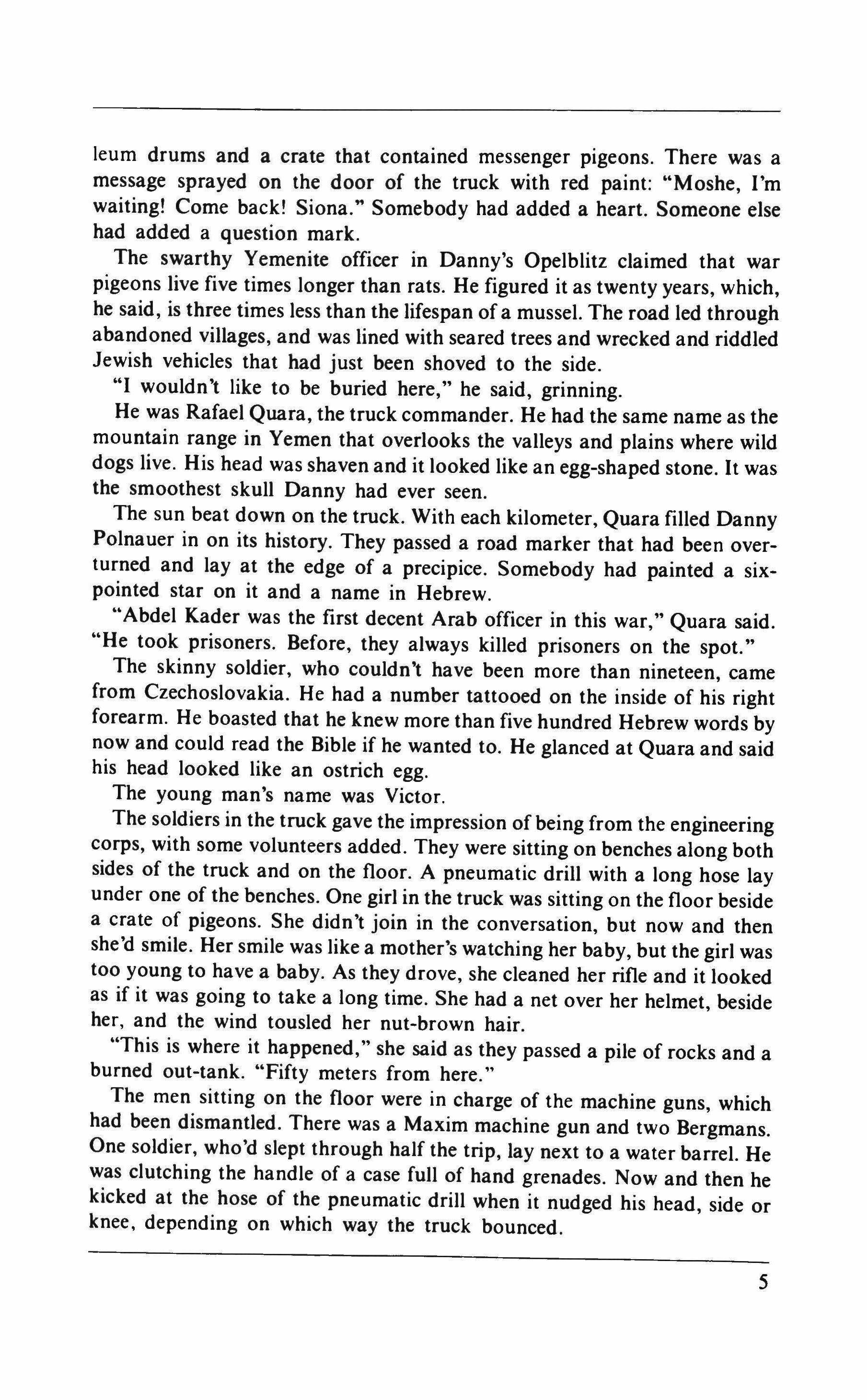
leum drums and a crate that contained messenger pigeons. There was a message sprayed on the door of the truck with red paint: "Moshe, I'm waiting! Corne back! Siona." Somebody had added a heart. Someone else had added a question mark.
The swarthy Yemenite officer in Danny's Opelblitz claimed that war pigeons live five times longer than rats. He figured it as twenty years, which, he said, is three times less than the lifespan of a mussel. The road led through abandoned villages, and was lined with seared trees and wrecked and riddled Jewish vehicles that had just been shoved to the side.
"I wouldn't like to be buried here," he said, grinning.
He was Rafael Quara, the truck commander. He had the same name as the mountain range in Yemen that overlooks the valleys and plains where wild dogs live. His head was shaven and it looked like an egg-shaped stone. It was the smoothest skull Danny had ever seen.
The sun beat down on the truck. With each kilometer, Quara filled Danny Polnauer in on its history. They passed a road marker that had been overturned and lay at the edge of a precipice. Somebody had painted a sixpointed star on it and a name in Hebrew.
"Abdel Kader was the first decent Arab officer in this war," Quara said. "He took prisoners. Before, they always killed prisoners on the spot."
The skinny soldier, who couldn't have been more than nineteen, carne from Czechoslovakia. He had a number tattooed on the inside of his right forearm. He boasted that he knew more than five hundred Hebrew words by now and could read the Bible if he wanted to. He glanced at Quara and said his head looked like an ostrich egg.
The young man's name was Victor.
The soldiers in the truck gave the impression of being from the engineering corps, with some volunteers added. They were sitting on benches along both sides of the truck and on the floor. A pneumatic drill with a long hose lay under one of the benches. One girl in the truck was sitting on the floor beside a crate of pigeons. She didn't join in the conversation, but now and then she'd smile. Her smile was like a mother's watching her baby, but the girl was too young to have a baby. As they drove, she cleaned her rifle and it looked as if it was going to take a long time. She had a net over her helmet, beside her, and the wind tousled her nut-brown hair.
"This is where it happened," she said as they passed a pile of rocks and a burned out-tank. "Fifty meters from here."
The men sitting on the floor were in charge of the machine guns, which had been dismantled. There was a Maxim machine gun and two Bergmans. One soldier, who'd slept through half the trip, lay next to a water barrel. He was clutching the handle of a case full of hand grenades. Now and then he kicked at the hose of the pneumatic drill when it nudged his head, side or knee, depending on which way the truck bounced.

"You could save time if you went on horseback," Quara said to the girl. "I don't want to come late," she said.
"Don't worry, you won't."
A jackal stood on top of the rocks they'd just passed. It was middle-sized and looked like a shabby old cat. Its head was broad, and when it yawned, you could see its strong teeth. Its back sloped down to a drooping tail. Was it waiting for fresh carrion, or had it just finished eating some? Its hide was dappled with dirty brown stripes.
"It's a female," Quara observed. "In Africa, there're a hundred jackals for every wild dog. It's easier for hyenas to eat carrion than for wild dogs to hunt jackals because they're bigger and stronger."
"They survived the Stone Age," remarked Praeger. He looked fifty. He was the oldest of the soldiers. "What more do you want?"
"How can you tell it's a female?" asked the girl.
"Not letting yourself get killed is enough for me," Quara agreed. He was probably imagining a place of yellow, sun-baked rocks and hills and banks of sand turning into narrow bands of green, like in Yemen. Whenever they passed through here, he would always see the green plains of Africa, the gentle hills filled with zebras and hyenas and lions and wild dingo dogs, hunting in packs. Wild dogs only hunt live prey. Although they looked as if they interbred with jackals and hyenas. Quara found them more likeable. He wondered how wild dogs resemble human beings. The way they take care of their young? The way they teach them to hunt, to kill, and to share their prey? He'd watched them hunt down a zebra, the way he'd seen lions do, pursuing it until it dropped, then tearing it to pieces; and when they'd had enough to eat, they went away, as if the plains were a restaurant that served raw meat.
The jackal wasn't afraid of their truck. It had gotten used to the trucks and the shooting, and it just stood there, its back sagging limply, patient, almost indifferent. Maybe it didn't even see them.
"Don't shoot," Quara said to the soldier who was aiming at the jackal with his American repeater rifle. "Save your ammunition." It was too late. They missed the jackal by a hundred meters.
The edges of the rocks began to change color. The sun set slowly. The peaks of the rocks no longer showed a sharp profile above the valley. Shadows settled in the ravines and passes. In the distance the houses looked like small gray clay boxes.
"They're all over the place here, except you don't see them," Quara told Danny Polnauer. "A lot of them are scared of us, just like we're scared of them."
Danny realized that Quara wasn't talking about jackals anymore. He laughed, a bit embarrassed. Quara understood. He said no more, except to remark that many of them were fighting up in the hills, on their own.

Quara spoke of fear the way you talk about grass or zebras or tents, or how bees reproduce.
"EI Tel has horses," said Victor. "The only kind of horses we get are in cans." The Australian soldier looked at a burnt tank that had been thrown off the road.
"That reminds me of whales who throw themselves on the shore and die."
As the evening fog set in, the dampness began. They could feel it when the driver shifted gears. The trucks, one by one, crawled and lumbered up through the hills, keeping a ten-meter distance. Their noise roared down the hillsides, dropping into the clefts of rocks and drowning there. They could imagine how deep the ravines were, because they looked so high. It was a barren, disheveled land.
Stars began to swim out into the sky. The mountains exuded the scent of the forest, of rocks and wind. The air smelled of resin and oil and burned-out trucks. It had grown distinctly cooler. The truck tossed them from side to side.
"I'll tell you something," Pretty Boy declared to one of the soldiers. "It's a sect. I don't like sects. They're chosen people among the chosen. They think they've got a patent on the truth. All they've got is shit. They're scared they'll get blended in with the collective and nobody will be able to hear them very well.
"Where s Avi today? How come he didn't come along with us?" the nineteen-year-old asked Pretty Boy.
"Do you really want me to tell you?"
"He goes from one person to another and plants what somebody else has told him, trying to make himself look nice, and finally everybody figures out what he's really like."
"Avi's always a couple miles ahead of everybody else," said Quara.
"He told me that when he goes with a woman, he feels like after he's vomited. So why does he go with them?"
"He told me that it cleanses him. He doesn't know what he's talking about. He's nuts."
"They made a whore of that beautiful sixteen-year-old Diana of his at the Hotel Hagelberg. The one who always used to go around with at least three Englishmen," Pretty Boy remarked, as if he didn't need to add that he'd had it coming to him. He glanced over at the girl. "Where are we?"
"In some asshole," the nineteen-year-old assured him. "Anachnu kulanu be tachad, amar kapitan ve onia tava. We're all in the asshole, as the captain said when the ship went down."
"They aren't used to fighting at night," said Quara. "They believe in demons, like my wife does. It's hard for me to get her to go to the movies, to sit still when the lights go off. She thinks there's some kind of demon in the movie house-just light and shadows and smoke that rises to the roof."
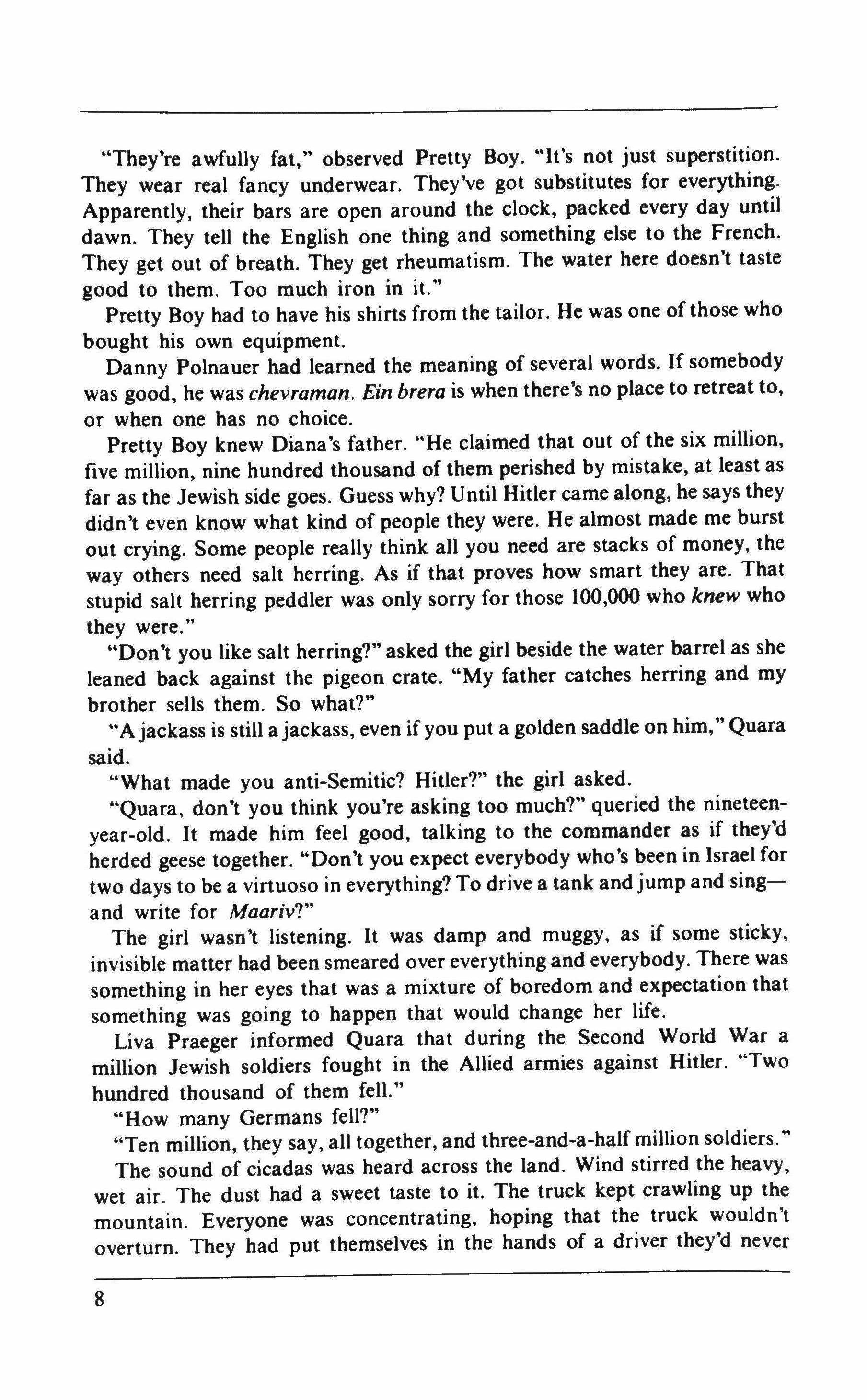
"They're awfully fat," observed Pretty Boy. "It's not just superstition. They wear real fancy underwear. They've got substitutes for everything. Apparently, their bars are open around the clock, packed every day until dawn. They tell the English one thing and something else to the French. They get out of breath. They get rheumatism. The water here doesn't taste good to them. Too much iron in it."
Pretty Boy had to have his shirts from the tailor. He was one of those who bought his own equipment.
Danny Polnauer had learned the meaning of several words. If somebody was good, he was chevraman. Ein brera is when there's no place to retreat to, or when one has no choice.
Pretty Boy knew Diana's father. "He claimed that out of the six million, five million, nine hundred thousand of them perished by mistake, at least as far as the Jewish side goes. Guess why? Until Hitler came along, he says they didn't even know what kind of people they were. He almost made me burst out crying. Some people really think all you need are stacks of money, the way others need salt herring. As if that proves how smart they are. That stupid salt herring peddler was only sorry for those 100,000 who knew who they were."
"Don't you like salt herring?" asked the girl beside the water barrel as she leaned back against the pigeon crate. "My father catches herring and my brother sells them. So what?"
A jackass is still a jackass, even if you put a golden saddle on him," Quara said.
"What made you anti-Semitic? Hitler?" the girl asked.
"Quara, don't you think you're asking too much?" queried the nineteenyear-old. It made him feel good, talking to the commander as if they'd herded geese together. "Don't you expect everybody who's been in Israel for two days to be a virtuoso in everything? To drive a tank and jump and singand write for Maarivt"
The girl wasn't listening. It was damp and muggy, as if some sticky, invisible matter had been smeared over everything and everybody. There was something in her eyes that was a mixture of boredom and expectation that something was going to happen that would change her life.
Liva Praeger informed Quara that during the Second World War a million Jewish soldiers fought in the Allied armies against Hitler. "Two hundred thousand of them fell."
"How many Germans fell?"
"Ten million, they say, all together, and three-and-a-half million soldiers."
The sound of cicadas was heard across the land. Wind stirred the heavy, wet air. The dust had a sweet taste to it. The truck kept crawling up the mountain. Everyone was concentrating, hoping that the truck wouldn't overturn. They had put themselves in the hands of a driver they'd never
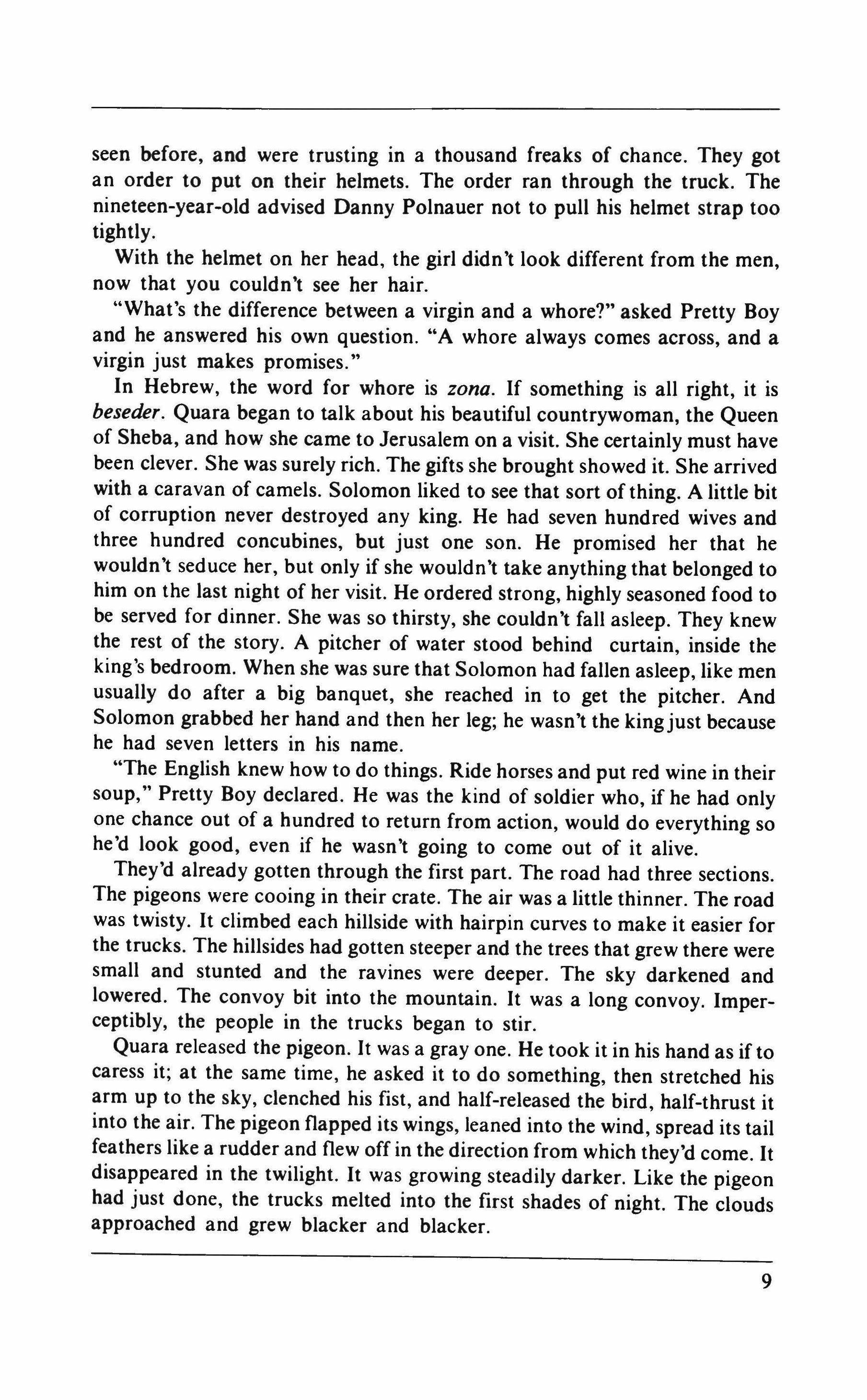
seen before, and were trusting in a thousand freaks of chance. They got an order to put on their helmets. The order ran through the truck. The nineteen-year-old advised Danny Polnauer not to pull his helmet strap too tightly.
With the helmet on her head, the girl didn't look different from the men, now that you couldn't see her hair.
"What's the difference between a virgin and a whore?" asked Pretty Boy and he answered his own question. "A whore always comes across, and a virgin just makes promises."
In Hebrew, the word for whore is zona. If something is all right, it is beseder. Quara began to talk about his beautiful countrywoman, the Queen of Sheba, and how she came to Jerusalem on a visit. She certainly must have been clever. She was surely rich. The gifts she brought showed it. She arrived with a caravan of camels. Solomon liked to see that sort of thing. A little bit of corruption never destroyed any king. He had seven hundred wives and three hundred concubines, but just one son. He promised her that he wouldn't seduce her, but only if she wouldn't take anything that belonged to him on the last night of her visit. He ordered strong, highly seasoned food to be served for dinner. She was so thirsty, she couldn't fall asleep. They knew the rest of the story. A pitcher of water stood behind curtain, inside the king's bedroom. When she was sure that Solomon had fallen asleep, like men usually do after a big banquet, she reached in to get the pitcher. And Solomon grabbed her hand and then her leg; he wasn't the kingjust because he had seven letters in his name.
"The English knew how to do things. Ride horses and put red wine in their soup," Pretty Boy declared. He was the kind of soldier who, if he had only one chance out of a hundred to return from action, would do everything so he'd look good, even if he wasn't going to come out of it alive.
They'd already gotten through the first part. The road had three sections. The pigeons were cooing in their crate. The air was a little thinner. The road was twisty. It climbed each hillside with hairpin curves to make it easier for the trucks. The hillsides had gotten steeper and the trees that grew there were small and stunted and the ravines were deeper. The sky darkened and lowered. The convoy bit into the mountain. It was a long convoy. Imperceptibly, the people in the trucks began to stir.
Quara released the pigeon. It was a gray one. He took it in his hand as if to caress it; at the same time, he asked it to do something, then stretched his arm up to the sky, clenched his fist, and half-released the bird, half-thrust it into the air. The pigeon flapped its wings, leaned into the wind, spread its tail feathers like a rudder and flew off in the direction from which they'd come. It disappeared in the twilight. It was growing steadily darker. Like the pigeon had just done, the trucks melted into the first shades of night. The clouds approached and grew blacker and blacker.
2

His back sagging under the sack of flour he was carrying, Danny Polnauer concentrated almost exclusively on keeping his knees from buckling. It was other people who determined which way to go, how fast, and everything else. The country around them had grown even wilder. The wind, which had been annoying when they were in the trucks, was refreshing them now. The men in front were carrying crates of munitions. Behind them came men with machine guns. In pairs, others carried water kegs and barrels of oil. Quara moved between the pigeon crates and the machine-gun bearers. The trucks had stopped beside one of the ravines. The soldiers plodded through the shadows cast by the trees and melted into them.
The landscape was like a chain of deep ravines. When the wind drove away the clouds to sea where they dissolved, treetops appeared, sailing above the horizon, and then the stars came out. They had to go through heavy underbrush. In the distance, they could hear the sound of trucks. They were their own vehicles. When trucks are lost, people aren't. When people are lost, trucks aren't. The convoy filed on through the bushes.
The sack of flour had rubbed Danny Polnauer's back almost raw. The pistol sagged, so he tightened his belt by another notch. The tamarisks and thorny underbrush scratched his shins. The path was full of stones. In the moonlight they looked like fragments of stars, and the sides of the ravine glistened like glacier fortresses.
You could smell the men's sweat. Mosquito's legs looked like matchsticks. You could get by here with five or six words in Hebrew: matches, gafrurim; mosquito, jitusch; flame, lehava; rock, even; toothpick, machcaca; dog, kelev; Hebrew was an old mistress, a young grandmother. "Just try lifting this sack yourself!" Danny imagined himself telling Lampe). The muscles in his thighs grew taut. The sky seemed to tremble for a moment when the wind stirred up the dust, and it was as if a star had shattered into bits. The stars looked close enough for him to touch, if he'd wanted to reach out his arm. They were going through a valley. Up, down. It was easier going downhill. Almost like slipping. Now and then a pebble rolled away or a clod of earth crumbled. He kicked into the sand, or dried mud. A twig cracked under someone's step.
The convoy plunged on across mountains and valleys and trails. A soldier from their truck was carrying a bag of grenades and, now and then, they jingled against each other like a lot of lockets and medallions. The wind brought in a whiff of diesel oil. Somebody saw a lizard or a chameleon and somebody else stepped on a snake. Danny Polnauer remembered how scared Lampel was of scorpions. They trudged up a hillside. He stopped thinking about what he was going to write. Whenever he stopped thinking about himself, he walked easier. Did Magda Wilderova really believe that one retains only what one gives to somebody else as if one received it oneself? He jagged his foot on some thistles. He was begining to feel cold. The men in

front had already reached the top of the hill. Suddenly, just above them, a flair burst. They were ordered to lie down. The order passed from one soldier to the next. The flair began to die.
3 "I've had just about enough of this," said Victor after they'd been lying on the ground for ten minutes. His voice sounded like a child's.
"We're up the creek now, it looks like," a soldier said.
Then Pretty Boy spoke up. "I wish I knew whether they're the English or Legionnaires. It's probably El Kaukji. Our synchronization doesn't work."
"Let's just wait and see," said Quara.
Pretty Boy whispered, "I can't for the life of me figure out this one Englishman from Aberdeen. I guess you've got to be from Aberdeen to photograph the stuff he photographed. Settlements surrounded by barbed wire, Arab children, a Syrian pirate. His officers and friends and armored cars on the road. Donkeys and blown-up bridges. Never our people. Not one single person of ours. Man or woman."
"Don't you know why?" queried Quara. "Every time you take a picture of somebody, you take a way part of his soul."
"He even took pictures of white mud leeches."
"Don't talk like a broken-down army truck," a voice spoke up. It was Rafael Ben Sch.
A second flair shot across the sky. When it reached its zenith, it dropped, lighting up some of the land beneath it, and the people in the convoy with it, like a sparkler. It fell in a slow arc, then straight toward them.
"I hope it's not going to be man to man," piped a childlike voice.
Rafael Ben Sch knelt beside the man with the Maxim. Everything lost itself in the night. It took about two minutes to set it up. The third flair was accompanied by the sound of breeches being pulled back and rifles being cocked. You could notice bits of landscape, of a mountain, a rock, or trees, as if they had been made into miniatures. It was a big human hand overgrown with bushes where people crouched on both sides in the night.
"They didn't give us orders to fix our bayonets," piped the childish voice.
He was thinking about that soldier from the Givat Chajim kibbutz who had killed a Syrian soldier with his bayonet and lost his speech, so all he could do was work in the kitchen. Although the doctor said he'd get over it, he still couldn't talk. When there was singing at the kibbutz after supper, he'd open his mouth, but not a sound came to his lips. They were afraid to send him a medal.
As the flair died and the light went out, the convoy became invisible again. Clouds drifted underneath the stars and covered them. The wind poured across the sky, like waves in the sea. An order came from the machine-gun post again and the soldiers passed on. They were told to get ready to fight. Some of the men crawled around and formed themselves into the shape of

a horseshoe, whose center was the foxhole where Danny Polnauer crouched with the girl from the truck. Danny Polnauer didn't feel comfortable, sheltered by all those human bodies. He was glad when the horseshoe spread out and he stayed beside the girl on the same level as the others. He drew out his pistol and touched the butt of his rifle with his other hand. The sack on his back felt very heavy. His arms were numb. The ground was dusty and cold. His whole body, which had been sweatyjust awhile ago, had cooled off now and was getting stiff. This delay must be tough for whoever was waiting for them at the next section, he said to himself. Sometimes he thought he heard trucks. He pulled his helmet strap tighter. The girl beside him had her machine-gun ready to shoot, its barrel propped against her left arm.
Mosquito lay in the same position, his rifle ready. Slowly, he was able to distinguish one person from another. He could feel the blood rushing to his head. One of the soldiers whispered that, last time, the fear gave him a rash on his face. It happened to him every time, he whispered, and then it disappeared again.
Danny sensed what it was he was ashamed of, even if it had been only in his own eyes. At the same time, he felt lucky that it was something private which can't be shared or seen by anybody else.
Suddenly he realized who the girl reminded him of all this time. A fraction of a second was enough for him. In his mind's eye, he saw the women's huts at Theresienstadt and saw Lisa Cohen, who left on the C transport on September 20, 1943 for Auschwitz-Birkenau, Camp B II b. She was kept with the girls and women who were sterilized immediately after passing through the delousing station, where they were undressed, their heads and bodies shaved, and then bathed in a concentrated solution of Iysol. The German doctors let the women over sixteen be inseminated by selected Jewish men whose skulls and limbs were measured by weight and dimensions. They quickly examined the crotches of the younger women to make sure they would not give birth. They looked at them all only as guinea pigs. To some they gave lead shots to change their brown eyes to blue and black hair to blond.
He found that out from her after the war in June 1945. They were living together for two months along with other repatriates at the YWCA, the home for young Christian women in Prague, which had five floors and a kitchen. She was in the hospital hut in Birkenau in 1944 before they sent her to work in the general government. In the spring of 1945 she was assigned to take care of children who had survived the winter. The Germans drove them beyond the camp during the evacuation in the early part of spring, and she helped dig a pit six feet deep and twenty-four feet long at the edge of the forest. The noncommissioned officers overseeing them were saying it was a pit for potato storage. Because of the spring rains and the sun, the ground was damp and easy to dig. They never would have been able to dig if the
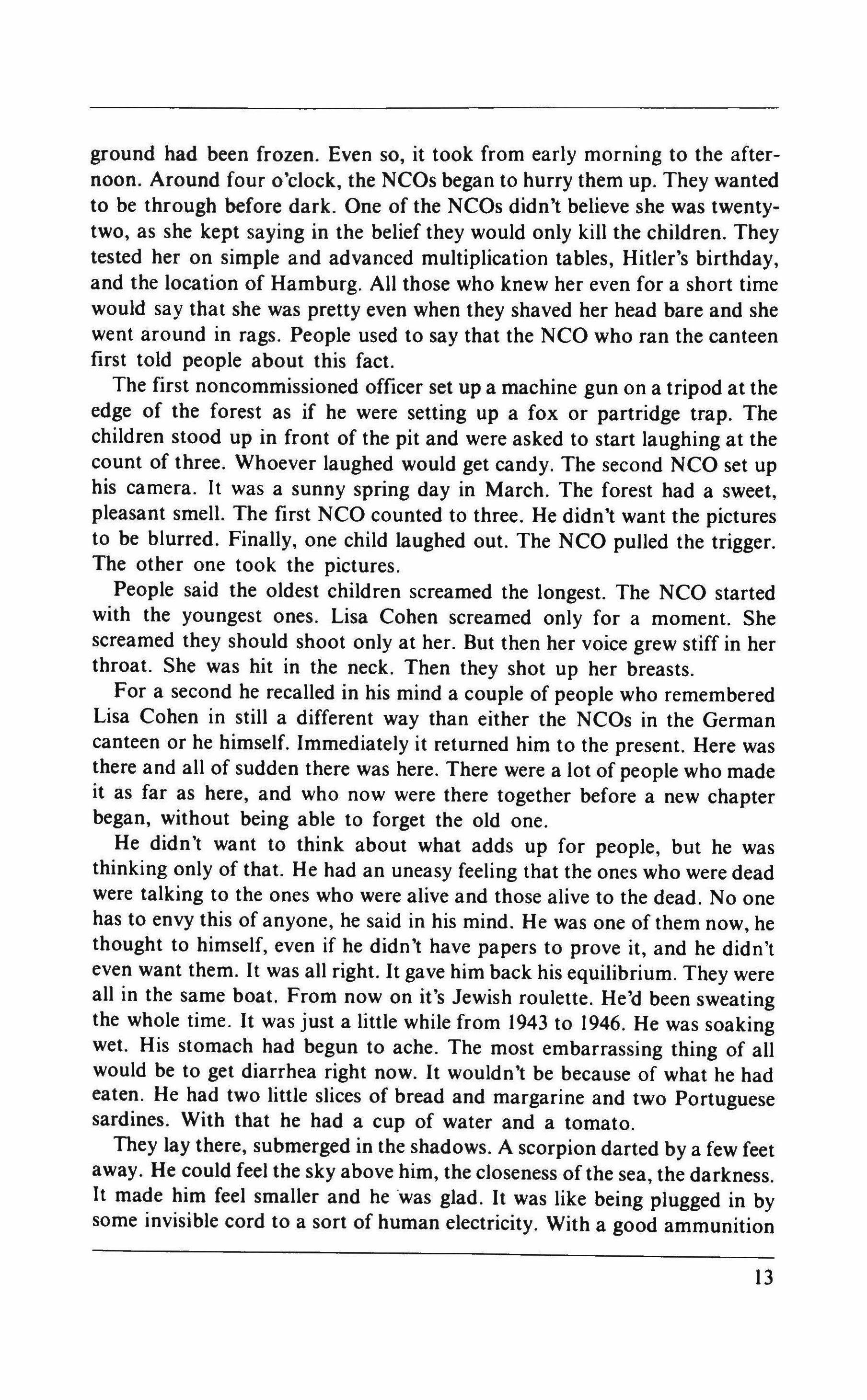
ground had been frozen. Even so, it took from early morning to the afternoon. Around four o'clock, the NCOs began to hurry them up. They wanted to be through before dark. One of the NCOs didn't believe she was twentytwo, as she kept saying in the belief they would only kill the children. They tested her on simple and advanced multiplication tables, Hitler's birthday, and the location of Hamburg. All those who knew her even for a short time would say that she was pretty even when they shaved her head bare and she went around in rags. People used to say that the NCO who ran the canteen first told people about this fact.
The first noncommissioned officer set up a machine gun on a tripod at the edge of the forest as if he were setting up a fox or partridge trap. The children stood up in front of the pit and were asked to start laughing at the count of three. Whoever laughed would get candy. The second NCO set up his camera. It was a sunny spring day in March. The forest had a sweet, pleasant smell. The first NCO counted to three. He didn't want the pictures to be blurred. Finally, one child laughed out. The NCO pulled the trigger. The other one took the pictures.
People said the oldest children screamed the longest. The NCO started with the youngest ones. Lisa Cohen screamed only for a moment. She screamed they should shoot only at her. But then her voice grew stiff in her throat. She was hit in the neck. Then they shot up her breasts.
For a second he recalled in his mind a couple of people who remembered Lisa Cohen in still a different way than either the NCOs in the German canteen or he himself. Immediately it returned him to the present. Here was there and all of sudden there was here. There were a lot of people who made it as far as here, and who now were there together before a new chapter began, without being able to forget the old one.
He didn't want to think about what adds up for people, but he was thinking only of that. He had an uneasy feeling that the ones who were dead were talking to the ones who were alive and those alive to the dead. No one has to envy this of anyone, he said in his mind. He was one of them now, he thought to himself, even if he didn't have papers to prove it, and he didn't even want them. It was all right. It gave him back his equilibrium. They were all in the same boat. From now on it's Jewish roulette. He'd been sweating the whole time. It was just a little while from 1943 to 1946. He was soaking wet. His stomach had begun to ache. The most embarrassing thing of all would be to get diarrhea right now. It wouldn't be because of what he had eaten. He had two little slices of bread and margarine and two Portuguese sardines. With that he had a cup of water and a tomato.
They lay there, submerged in the shadows. A scorpion darted by a few feet away. He could feel the sky above him, the closeness of the sea, the darkness. It made him feel smaller and he was glad. It was like being plugged in by some invisible cord to a sort of human electricity. With a good ammunition
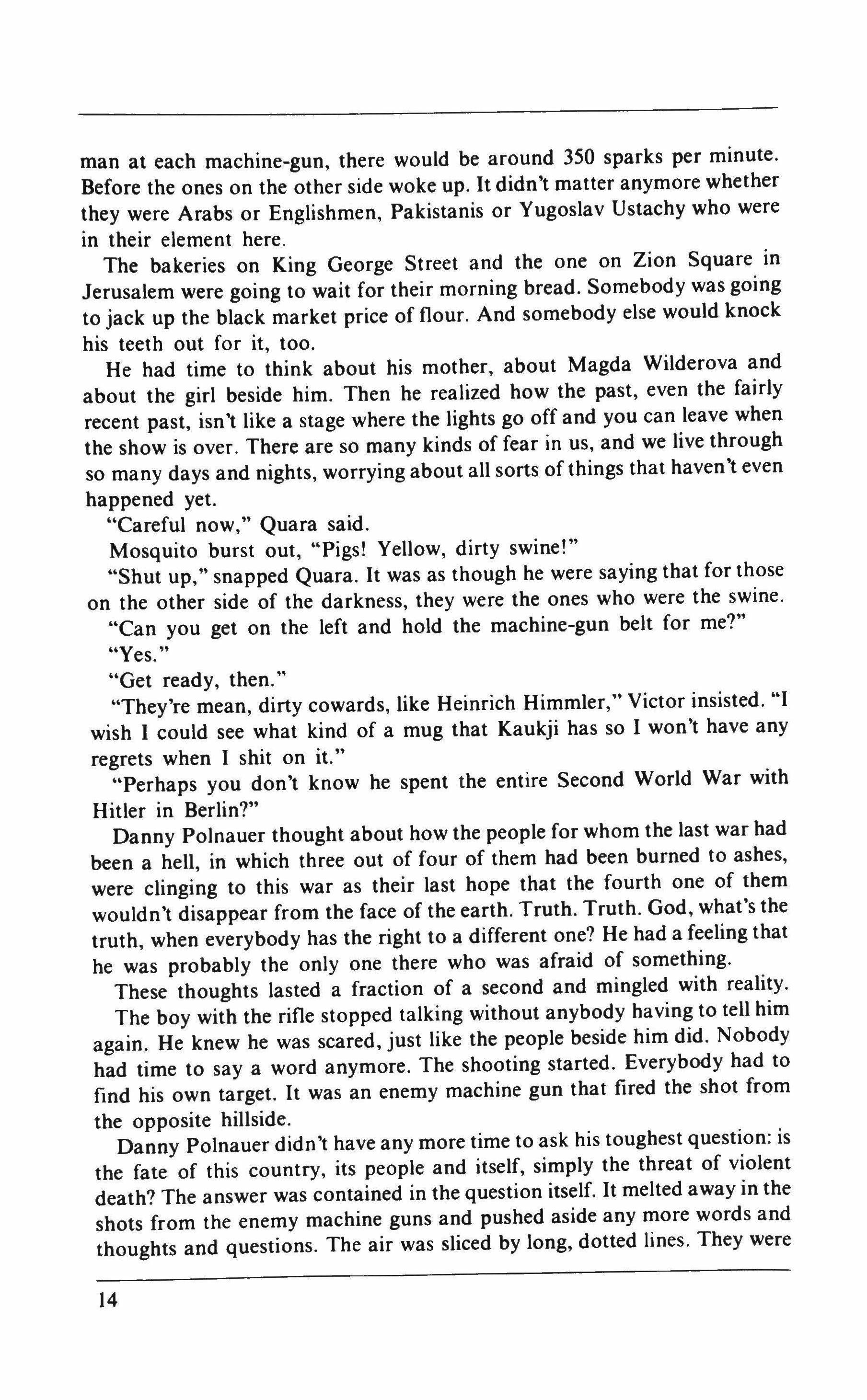
man at each machine-gun, there would be around 350 sparks per minute. Before the ones on the other side woke up. It didn't matter anymore whether they were Arabs or Englishmen, Pakistanis or Yugoslav Ustachy who were in their element here.
The bakeries on King George Street and the one on Zion Square in Jerusalem were going to wait for their morning bread. Somebody was going to jack up the black market price of flour. And somebody else would knock his teeth out for it, too.
He had time to think about his mother, about Magda Wilderova and about the girl beside him. Then he realized how the past, even the fairly recent past, isn't like a stage where the lights go off and you can leave when the show is over. There are so many kinds of fear in us, and we live through so many days and nights, worrying about all sorts of things that haven't even happened yet.
"Careful now," Quara said.
Mosquito burst out, "Pigs! Yellow, dirty swine!"
"Shut up," snapped Quara. It was as though he were saying that for those on the other side of the darkness, they were the ones who were the swine.
"Can you get on the left and hold the machine-gun belt for me?"
"Yes.
"Get ready, then."
"They're mean, dirty cowards, like Heinrich Himmler," Victor insisted. "I wish 1 could see what kind of a mug that Kaukji has so 1 won't have any regrets when I shit on it."
"Perhaps you don't know he spent the entire Second World War with Hitler in Berlin?"
Danny Polnauer thought about how the people for whom the last war had been a hell, in which three out of four of them had been burned to ashes, were clinging to this war as their last hope that the fourth one of them wouldn't disappear from the face of the earth. Truth. Truth. God, what's the truth, when everybody has the right to a different one? He had a feeling that he was probably the only one there who was afraid of something. These thoughts lasted a fraction of a second and mingled with reality. The boy with the rifle stopped talking without anybody having to tell him again. He knew he was scared, just like the people beside him did. Nobody had time to say a word anymore. The shooting started. Everybody had to find his own target. It was an enemy machine gun that fired the shot from the opposite hillside.
Danny Polnauer didn't have any more time to ask his toughest question: is the fate of this country, its people and itself, simply the threat of violent death? The answer was contained in the question itself. It melted away in the shots from the enemy machine guns and pushed aside any more words and thoughts and questions. The air was sliced by long, dotted lines. They were

corning right at them. Not just one or two or three. All of them. The flashing shots brought an unfamiliar kind of terror. He was sure they were all aimed at him, at his eyes and his chest and his shoulders. Death had never corne toward him in this way.
But every soldier had the feeling that those flashing shots were aimed only at him. It made him press closer into the earth, making themselves as small as possible; it helped them to hide better.
From somewhere nearby birds screeched and flew away. Danny Polnauer pushed his forehead into the dust. He turned it just so that his mouth was free, so he could breathe. The metal of his helmet scraped against his neck. When he finally forced himself to raise his head, he saw that the girl beside him was half-kneeling and so were Victor and Quara and Praeger and Pretty Boy. They were doing it so they could shoot. It only lasted about sixty seconds. Then another sixty seconds. Some of the trees were struck by bullets. He could imagine sap flowing from the wounds.
Streaks of clouds stretched across the sky. It was a good darkness, against the enemy machine guns. And then Praeger began to shoot. He was giving back what he had learned in the Foreign Legion and in the British Army during World War II and he did it well, because two machine guns on the other side were silenced.
The encounter had caught them at the point where the water line led from Lydda to Ramle, to Latrun across Bab el Waad and all the way to Jerusalem. Deir Yassin wasn't far from here. In Latrun two years ago there was a British concentration camp for people from Europe who did not have a place to go and who were deported after arriving, hungry and freezing, direct from the boats.
The wind brought with it the scent of eucalyptus. And then the reek of burned gunpowder. Suddenly, they heard an airplane. The sound came from above and then it was like an echo, coming from a second source. Swiftly, the noise of a motor came closer. It was a small, one-motor plane. When it was right above them, it looked as though it were going to fly past without dropping a bomb or firing a shot.
"Get up!" ordered Rafael Ben Sch and, again, the order was passed from one to the other, as if they were taking their own roll call.
"That plane farts like it didn't have an exhaust pipe," said Victor. Then he turned to Quara.
"Let's go," said Quara.
"Let's go," the soldiers echoed.
Danny Polnauer stuck his pistols back. He'd have to replace the cartridges he'd just fired before the next shooting match carne. They had a few hours of rapid march ahead of them. When they all moved at the same speed, Danny Polnauer found the going was easier, through the ravines that had been worn down by thousands of years of erosion. They walked into the darkness, led

by somebody who must have known the way very well. Birds screeched overhead. Were they going back to where they'd come from when they'd been scared away by the shooting? You couldn't see the birds.
"I've seen what it looks like here in the daytime," Quara said. "I was digging here. You don't have to ask me how much I enjoyed it. We didn't even have tents." He said it as though he were telling a nineteen-year-old boy about what a beautiful, rich bride he'd find.
The insects' voices thickened. They were nocturnal insects, the primeval inhabitants of this land, and nobody had ever managed to eliminate them.
"It's always the same thing here, like on purpose," Praeger said. "I'm doing this for the fourth time." All he was carrying was the part of one machine gun. They'd brought him along as a machine-gunner.
"At your age, it's a real achievement," declared Pretty Boy.
"When you're driving in a truck and you're going fifty kilometers an hour, you feel like you're flying in a fighter plane."
"After the war, buy yourself a truck and drive it here like a taxi," Victor suggested. He wondered if they didn't get the road mixed up with a hole.
"Quara," he went on, "would you believe me, I didn't even notice these lousy four meters' width in the daytime? Wouldn't you like to give me an assignment some other time than at night? Do you think I'm like an owl and that I don't sleep at night? Well, you're wrong."
The countryside ahead seemed full of traps. Visions of springs with clear, cool water. Something which is and isn't. The convoy had stretched out again. The first truck and the last were lost in the darkness. An invisible soldier up front set the pace and the direction. They were probably hurrying so the dawn wouldn't catch up with them. The mist that rises before daybreak in the mountains drifted around and began to seep into the moonlight. Dew appeared on the moss, the thistles, and the stones on the' road. It soaked into their shoes. Danny Polnauer felt as though blood were dripping from his shins.
They had reached the third section of the road and got back into their trucks. Everything was in its place: the crate of pigeons, the water keg, the girl with the net on her helmet; the ammunition, parts of the machine-gun, the bag of hand grenades, and the soldier who soon resumed posture of a lying shooter.
Quara released another bird. Nobody paid much attention. Danny Polnauer felt that he'd been riding with them in the truck for as long as he could remember.
Quara looked them over and saw how dirty they were from the dust and oil and pine needles, how bruised and scratched they were, smeared with morning dew and mist and everything all together. Even Pretty Boy, in his tailor-made shirt. You could tell they were climbing toward the top, from where at any moment they'd be able to see Romema.
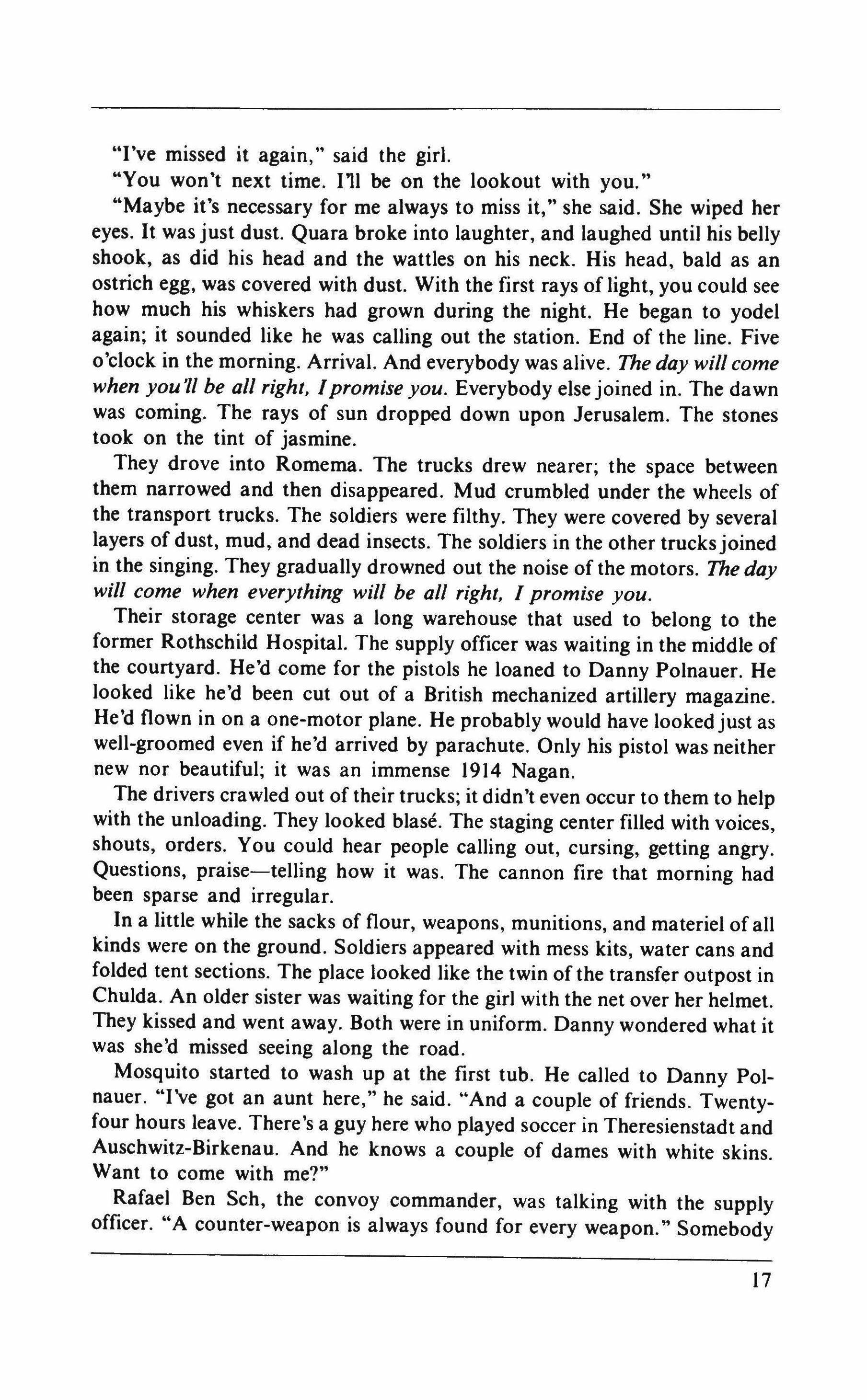
"I've missed it again," said the girl.
"You won't next time. 111 be on the lookout with you."
"Maybe it's necessary for me always to miss it," she said. She wiped her eyes. It was just dust. Quara broke into laughter, and laughed until his belly shook, as did his head and the wattles on his neck. His head, bald as an ostrich egg, was covered with dust. With the first rays of light, you could see how much his whiskers had grown during the night. He began to yodel again; it sounded like he was calling out the station. End of the line. Five o'clock in the morning. Arrival. And everybody was alive. The day will come when you'll be all right, Ipromise you. Everybody else joined in. The dawn was coming. The rays of sun dropped down upon Jerusalem. The stones took on the tint of jasmine.
They drove into Romerna. The trucks drew nearer; the space between them narrowed and then disappeared. Mud crumbled under the wheels of the transport trucks. The soldiers were filthy. They were covered by several layers of dust, mud, and dead insects. The soldiers in the other trucksjoined in the singing. They gradually drowned out the noise of the motors. The day will come when everything will be all right, I promise you.
Their storage center was a long warehouse that used to belong to the former Rothschild Hospital. The supply officer was waiting in the middle of the courtyard. He'd come for the pistols he loaned to Danny Polnauer. He looked like he'd been cut out of a British mechanized artillery magazine. He'd flown in on a one-motor plane. He probably would have looked just as well-groomed even if he'd arrived by parachute. Only his pistol was neither new nor beautiful; it was an immense 1914 Nagan.
The drivers crawled out of their trucks; it didn't even occur to them to help with the unloading. They looked blase. The staging center filled with voices, shouts, orders. You could hear people calling out, cursing, getting angry. Questions, praise-telling how it was. The cannon fire that morning had been sparse and irregular.
In a little while the sacks of flour, weapons, munitions, and materiel of all kinds were on the ground. Soldiers appeared with mess kits, water cans and folded tent sections. The place looked like the twin of the transfer outpost in Chulda. An older sister was waiting for the girl with the net over her helmet. They kissed and went away. Both were in uniform. Danny wondered what it was she'd missed seeing along the road.
Mosquito started to wash up at the first tub. He called to Danny Polnauer. "I've got an aunt here," he said. "And a couple of friends. Twentyfour hours leave. There's a guy here who played soccer in Theresienstadt and Auschwitz-Birkenau. And he knows a couple of dames with white skins. Want to come with me?"
Rafael Ben Sch, the convoy commander, was talking with the supply officer. "A counter-weapon is always found for every weapon." Somebody

arrived to hand him papers with the new password. The soldiers who were standing around had taken off their shirts and some of them wanted to wash their feet, but others tried to make them wait until they all could wash the upper part of their bodies.
The supply officer paused and thought for awhile. Then he quoted a Chinese saying, "Victory is always king. The one who is defeated is, at best, a bandit. At worst, he's passed off as a traitor. How can the one who's defeated defend himself?" They began to laugh.
"My aunt's a nurse," Mosquito said.
"Let me have the address," said Danny Polnauer.
They both dried themselves with the same towel, just like they washed in the same water. Nobody economized with vaccinations, starting with those against the plague and ending with those against scabies.
"My aunt straightened herself out here," he piped up in his boyish voice. "Before, she used to say that money's the only religion there is. She said that if she didn't have money, she'd just as soon lie down in the bathtub and turn on the gas. She's just fifty-six years old. She's the most beautiful woman I know. When she came here, she got over that attitude." He stuck his shirt inside his pants. He tightened his belt.
The supply officer yelled at them, asking if they had lead in their pants. Quara tossed the towel behind the water barrel.
Each got a chunk of smoked beef, a loaf of bread, and a jar of black olives. Some of them started to eat immediately, others put the food away for friends in Jerusalem.
A couple of soldiers stood around next to the tub. They must have been telling jokes. Danny Polnauer had overheard the name of one of them in the truck, but he didn't remember it. He was a tall, sturdy young man, around twenty-five years old. He was chatting with a thirty-year-old giant who almost looked like his elder brother. They roared with laughter. A letter had been waiting for the thirty-year-old and he'd read it twice; he kept holding onto it. He was telling the twenty-five-year-old about his mother who lived in a kibbutz near the Jordanian border. To liven up the story, he told about how she'd come through Turkey on foot, just like their father, and how everybody in a tavern had asked him whether she was Turkish. By that time almost everybody was laughing. Both his mother and father had been arrested in 1932 Istanbul. That was where their story began. He had an eight-year-old brother in the kibbutz and his mother had written about him.
The twenty-five-year-old soldier had a dog at his feet and he kept tossing it scraps of the smoked beef. The thirty-year-old soldier just looked on. An officer who was passing by asked him if he wasn't ashamed of himself, feeding meat to a dog.
"This dog's better than a human being," the soldier replied. "Do you know

all he's done for me by now?" He tossed another scrap of meat to the dog. "Go on and eat it, you crazy mutt."
"Do people in the kibbutzim feed dogs caviar?" asked the officer.
"I tell you, this dog's like a human," repeated the soldier.
Then, as if the officer didn't exist, he continued, "My dad shot down a Jordanian plane from a trench, using a repeating shotgun. The plane was flying low. When it fell, those Jordanian infantrymen got up and ran away so fast, you couldn't see them for the dust. They were camped a hundred meters in front of our kibbutz," he chuckled.
"You're lucky," said the twenty-five-year-old. "My mother threw a grenade for the first time in her life on Thursday. She stretched her arm back as far as she could and the grenade fell behind her head. It rolled about five meters away. Aside from a couple splinters in her backside, she lived through it.
"Did she get scared?" broke in Quara.
"It's enough for a woman to see a rifle and she thinks it's a whole army already," said the thirty-year-old. "Give my sister a carbine and you can't hold her back."
"She didn't even stop to put a bandage on her backside," went on the twenty-five-year-old. "They were throwing grenades like guys. That evening it occurred to her that she might get blood poisoning. So she poured a whole bottle of iodine on her backside. Dad had to make his bed in the dining room."
The thirty-year-old glanced at the letter. "They were taking the children by bus to Haifa. They were scared the kibbutz would fall. On the way, though, the bus got hit by a grenade. Mother was in charge. Most of the kids were asleep. When the bus began to burn, she counted the kids as they came out, but she couldn't count them all; so she crawled back into the bus and brought out three more children before the thing was blown to bits."
The twenty-five-year-old fed the dog. "You're just like a human being, aren't you?" he asked it.
While they'd been talking, the dog had eaten all their meat. It rubbed against the soldier's leg. The twenty-five-year-old pulled a bar of Bradbury chocolate from his pocket and broke off a piece for the dog. "Wait a minute, let me finish." It was the best English chocolate.
"Is he really as good?"
"Better than a man," the twenty-five-year-old repeated. He had taken the dog with him on a mission in a troop carrier. They had two periods of ninety seconds each to do the job. The twenty-five-year-old didn't make it back to the carrier. The dog refused to jump back inside. When one of the other soldiers grabbed him and tossed him inside like a package of ruddy hair and paws, he jumped off the tailgate. In the meantime, the twenty-five-year-old came running up. But the dog didn't make it back.

A grenade killed him. The soldier was sure that if it hadn't been for the dog, the troop carrier would have gone off without him.
"How could he be killed in action and be here at the same time?"
"This one is his sister."
It was a two-year-old Irish setter.
"My eight-year-old brother tells about it here in the letter," the thirty-yearold went on. "He was standing fifty meters from the bus when it went up in flames. He saw how Mother crawled inside and how she carried out those three kids, one after the other. He was scared she'd be burned up." He stared back at the letter, as though it were proof he was telling the truth.
"Afterwards, my brother writes, she was trembling for hours. She thought nobody noticed in the darkness."
The dog again nudged against the twenty-five-year-old's legs. Somebody started playing a song about friendship over the loudspeaker on the side of the warehouse. The sun rose higher and higher. A couple of soldiers began to hum and whistle along.
"I can't stand that song anymore," said Pretty Boy. He had gotten himself cleaned up as best he could. He threw a stone at the loudspeaker. He didn't hit it.
"You'd better wash your feet, too," Victor told Danny Polnauer. "Watch Absalom here. He'll tell you what an itch you can get between your toes."
"Why don't they ever play 'Green Eyes'?" wondered Pretty Boy. One of Hanus Berger's weaknesses was that he liked Nazi marches, not for their ideology, but for their melody and vigor, and also for the irony of singing them here in Israel. He'd even whistle the Horst Wessel song when he didn't have an American jazz tune on his lips.
Victor kept on trying to talk Danny Polnauer into sticking with him, as if he didn't want to part so soon from someone with whom he could share experiences that nobody here was very fond of hearing about. He looked at him as if he were saying that both of them were "soap."
"Not even for just one drink?"
4 Round bits of shrapnel were lying around in front of the house at King George 44. The soldiers at the wall across the street had defused a time bomb. Four men loaded it inside a little Italian truck and took the unexploded bomb away. They were soaked with sweat. There seemed to be more people on the street than when Danny had gone away. Nobody was at home upstairs.
While he was taking a few steps across the sidewalk, Danny could suddenly imagine all he'd been imagining on Wednesday, the 2nd of June, when they'd spent with Lampel and Magda Wilderova the night in the apartment downstairs. The transport, the skirmish at night-everything about it-had stimulated his already active imagination. He had a kind of imagination that

gives you everything you don't have, all the things that might be, and that you'll have someday. Had something happened that would change his life? He didn't even have to close his eyes. He saw and heard and touched Magda Wilderova. "Meajin ora ba? she'd ask him. Where had you come from? She spoke in that slow drawl of hers. In her voice was something only a woman can put into it. He gave her his secondhand account of where he'd been. She slowly unbuttoned his shirt and wiped him off with a damp towel. She laid his things on the second chair. He thanked her for her letters. She thanked him, too, for his letters. He placed his rations on the bureau-the bread, olives, and meat. He noticed that Magda Wilderova had gotten some coffee. She said she'd make him some and it would take ten minutes. He knew right away that something had changed, but he couldn't say what it was. He was undressed, but Magda Wilderova was still wearing her new army uniform without insignia. She inspected the places on his shoulders that the straps had chafed raw, the bruises on his back that he hadn't noticed, the scratched shins and the blisters on his heels. He told her they'd brought flour. She replied that what the people brought in the last convoy had been full of maggots. He asked her whether they'd thrown it out. We sifted it, she answered. She recalled what her mother had told her about the famine in Galicia in the First World War, in 1915, when people used to eat rats. Apparently, poor people had done the same in Paris during the Franco-Prussian War. She told him his eyes looked puffy. She placed a saucer in front of him with a small cup of coffee. It was the best coffee he'd ever drunk. He knew nothing would ever be as easy as it was up to now. He told her about how they'd driven and tramped across so many hills, that it had felt like as many different countries. The road was narrower than a hole leading into hell. A truck could hardly squeeze through. Sometimes they drove only on three wheels. She smiled at him, the way lovers smile at each other. Three wheels can still keep a truck in balance, she assured him. She sat there with her legs crossed. She asked him where Lampel was. In the Negev, he told her. They'd put him in the same room in Notre Dame, not far from here, with an Armenian-American, Sammy Birlian, who had gotten fed up with selling carpets for his daddy. He wanted to write a book about how the Turks had massacred the Armenians, but he didn't want it to be just a book about cruelty.
She told him she'd been in the section known as "Burma Road," which he just came from. There's a kind of pine tree growing there that's between 800 and 1,000 years old, she said. And flowers, too, which the government says you mustn't pick. He asked her whether she meant that she'd trudged there at night, like they had. That's not important, she smiled. She asked him whether any woman had been with them. He'd seen several women in uniform at Bab el Waad-nurses and girls from the signal corps. One girl soldier had been in the same truck. To hell with life, just as long as we're
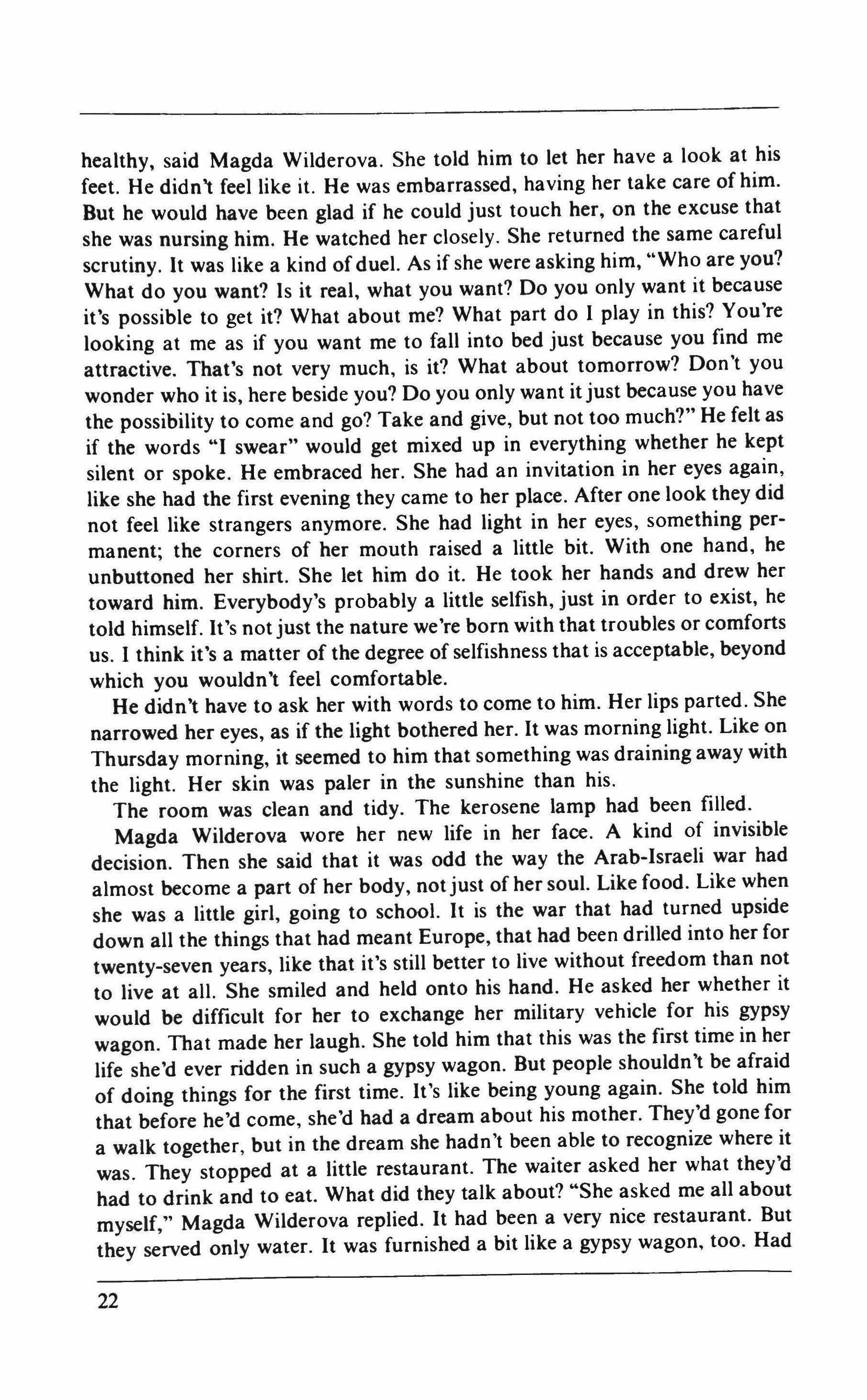
healthy, said Magda Wilderova. She told him to let her have a look at his feet. He didn't feel like it. He was embarrassed, having her take care of him. But he would have been glad if he could just touch her, on the excuse that she was nursing him. He watched her closely. She returned the same careful scrutiny. It was like a kind of duel. As if she were asking him, "Who are you? What do you want? Is it real, what you want? Do you only want it because it's possible to get it? What about me? What part do I play in this? You're looking at me as if you want me to fall into bed just because you find me attractive. That's not very much, is it? What about tomorrow? Don't you wonder who it is, here beside you? Do you only want it just because you have the possibility to come and go? Take and give, but not too much?" He felt as if the words "I swear" would get mixed up in everything whether he kept silent or spoke. He embraced her. She had an invitation in her eyes again, like she had the first evening they came to her place. After one look they did not feel like strangers anymore. She had light in her eyes, something permanent; the corners of her mouth raised a little bit. With one hand, he unbuttoned her shirt. She let him do it. He took her hands and drew her toward him. Everybody's probably a little selfish, just in order to exist, he told himself. It's not just the nature we're born with that troubles or comforts us. I think it's a matter of the degree of selfishness that is acceptable, beyond which you wouldn't feel comfortable.
He didn't have to ask her with words to come to him. Her lips parted. She narrowed her eyes, as if the light bothered her. It was morning light. Like on Thursday morning, it seemed to him that something was draining away with the light. Her skin was paler in the sunshine than his.
The room was clean and tidy. The kerosene lamp had been filled. Magda Wilderova wore her new life in her face. A kind of invisible decision. Then she said that it was odd the way the Arab-Israeli war had almost become a part of her body, not just of her soul. Like food. Like when she was a little girl, going to school. It is the war that had turned upside down all the things that had meant Europe, that had been drilled into her for twenty-seven years, like that it's still better to live without freedom than not to live at all. She smiled and held onto his hand. He asked her whether it would be difficult for her to exchange her military vehicle for his gypsy wagon. That made her laugh. She told him that this was the first time in her life she'd ever ridden in such a gypsy wagon. But people shouldn't be afraid of doing things for the first time. It's like being young again. She told him that before he'd come, she'd had a dream about his mother. They'd gone for a walk together, but in the dream she hadn't been able to recognize where it was. They stopped at a little restaurant. The waiter asked her what they'd had to drink and to eat. What did they talk about? "She asked me all about myself," Magda Wilderova replied. It had been a very nice restaurant. But they served only water. It was furnished a bit like a gypsy wagon, too. Had

they brought ammunition and oil? Was there shooting when you passed by Latrun?-Everybody here likes to shoot at night, he answered.-Was it a good fight? What do you measure it by? Depending on the outcome. Depending on who you are after the fight. Depending on how your opponent has fought.-Ah, darling, she said then. It's always a new path from innocence to knowledge. It depends on how you go into it and how you get yourself out of it. How it's changed you.-How is a person supposed to change? he asked. It isn't supposed to change you, she replied. Had he heard the expression, tohar neshek? What did it mean? Cleanness of weapons. In reality, cleanness of the soul. It's the principle of going into a battle with a clean soul and coming out of it with a clean soul. It doesn't matter whether you're afraid, whether you have to put up with a hundred and one sufferings all alone; in battle, nothing is predictable for anybody in advance because no human being is a war machine. It doesn't even have anything to do with the fact that when you're wounded, you die any differently than you imagined you would. Or, if you're destined to survive, that you'll survive any differently than you expected to. Battle, blood, and death aren't a theater performance whose script can be written in advance and rehearsed and performed. It's always the first performance and it's always different. The way you shoot and the way they shoot at you. It's always easier than you thought it would be and incomparably worse than you imagined it. Good and bad. It's everything you are yourself. It's knowledge which a person would rather forget or reject. But the main thing, the thing that can be measured, is tohar neshek. To come back with clean hands. Not to stain your weapon. Everybody knows that it isn't just the gun that kills. It's the commandment that you must not defile your soul, your hands, your conscience. It's only when a person doesn't have a conscience that he can become an instrument for killing other people. That was why Hitler wanted to destroy the conscience first, so he could kill in just as cruel a way as earthquakes kill, or the plague or floods or fire. War isn't simply a germ which has no brain. It's the work of human beings. It is the duel between yetser hara and yetser hartov. The inclination for good and the inclination for evil. The principle is to kill in battle only when you must. In self-defense. When you take the offensive the idea is not to kill anybody when they put their hands up or anybody who isn't shooting at you, who doesn't counterattack, anybody who can't defend himself anymore, either because his ammunition has run out or because he's been wounded, bleeding, blinded, or has lost his senses. All the different kinds of human beings who are defenseless. Women and children in the villages, at the fountains, men in the fields. It is forbidden to burn and destroy villages, if you don't have to do it. To burn the cities if you don't have to put them on fire. The rights of the defenseless. Then he asked her about when you can't see the other person in the course of a battle because it's night or because the two of you are
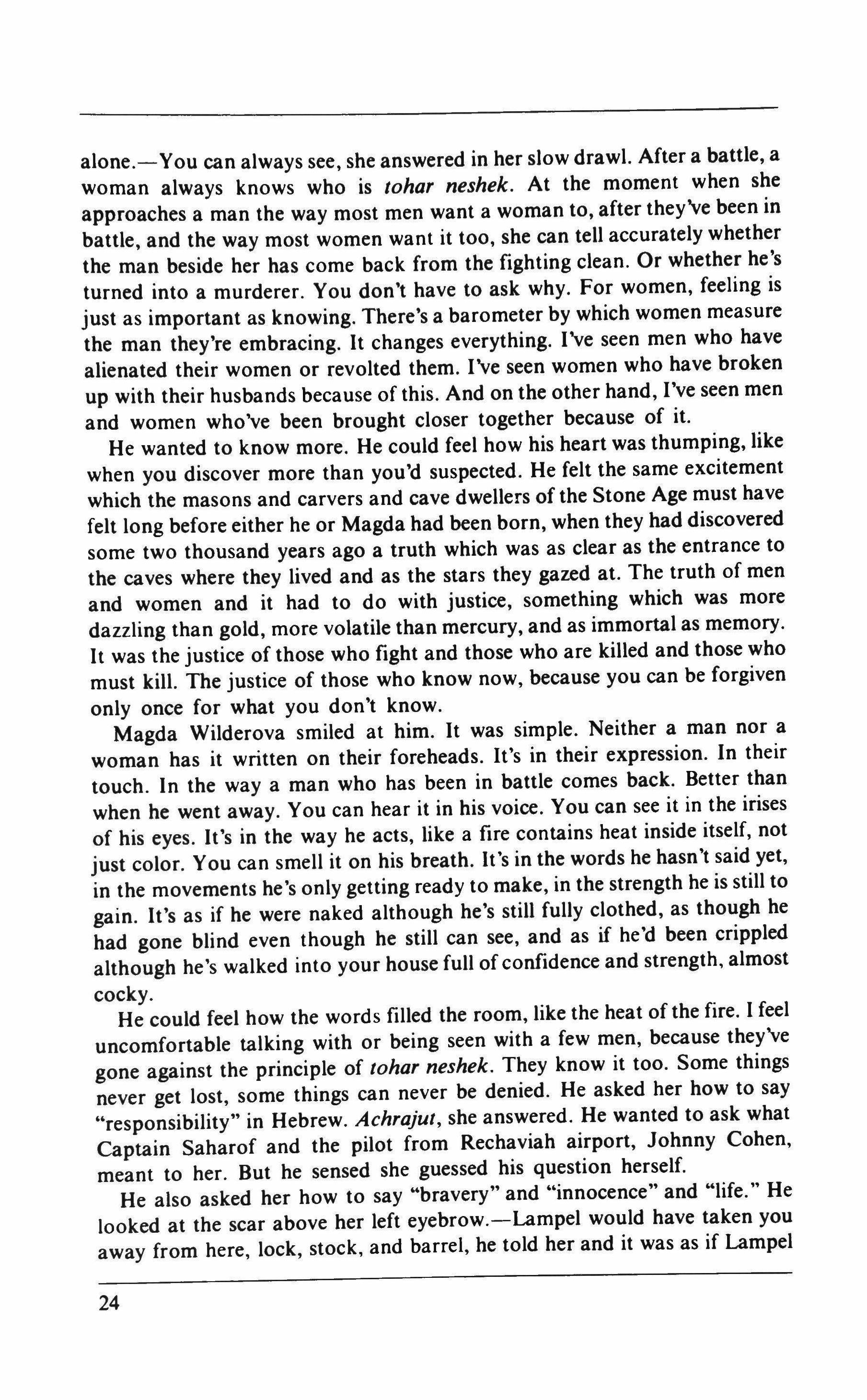
alone.-You can always see, she answered in her slow drawl. After a battle, a woman always knows who is tohar neshek. At the moment when she approaches a man the way most men want a woman to, after they've been in battle, and the way most women want it too, she can tell accurately whether the man beside her has come back from the fighting clean. Or whether he's turned into a murderer. You don't have to ask why. For women, feeling is just as important as knowing. There's a barometer by which women measure the man they're embracing. It changes everything. I've seen men who have alienated their women or revolted them. I've seen women who have broken up with their husbands because of this. And on the other hand, I've seen men and women who've been brought closer together because of it. He wanted to know more. He could feel how his heart was thumping, like when you discover more than you'd suspected. He felt the same excitement which the masons and carvers and cave dwellers of the Stone Age must have felt long before either he or Magda had been born, when they had discovered some two thousand years ago a truth which was as clear as the entrance to the caves where they lived and as the stars they gazed at. The truth of men and women and it had to do with justice, something which was more dazzling than gold, more volatile than mercury, and as immortal as memory. It was the justice of those who fight and those who are killed and those who must kill. The justice of those who know now, because you can be forgiven only once for what you don't know.
Magda Wilderova smiled at him. It was simple. Neither a man nor a woman has it written on their foreheads. It's in their expression. In their touch. In the way a man who has been in battle comes back. Better than when he went away. You can hear it in his voice. You can see it in the irises of his eyes. It's in the way he acts, like a fire contains heat inside itself, not just color. You can smell it on his breath. It's in the words he hasn't said yet, in the movements he's only getting ready to make, in the strength he is still to gain. It's as if he were naked although he's still fully clothed, as though he had gone blind even though he still can see, and as if he'd been crippled although he's walked into your house full of confidence and strength, almost cocky.
He could feel how the words filled the room, like the heat of the fire. I feel uncomfortable talking with or being seen with a few men, because they've gone against the principle of tohar neshek, They know it too. Some things never get lost, some things can never be denied. He asked her how to say "responsibility" in Hebrew. Achrajut, she answered. He wanted to ask what Captain Saharof and the pilot from Rechaviah airport, Johnny Cohen, meant to her. But he sensed she guessed his question herself. He also asked her how to say "bravery" and "innocence" and "life." He looked at the scar above her left eyebrow.-Lampel would have taken you away from here, lock, stock, and barrel, he told her and it was as if Lampel

himself had heard what he said.-Nobody will ever take me away from here, she smiled. That smile made her beautiful; in her eyes and her expression and in every movement she made was truth.-They were using cannons at Latrun, he said.-They're stronger there, said Magda Wilderova. We haven't been able to reverse it. A lot of people have fallen there. He tried to pick up the last army communique on the radio, and then music. The music was nice. They played an old American tune, "Green Eyes." He thought she'd finished, because she'd explained to him about the principle of tohar neshek. Instead, to his surprise, she went on.
You know, you'll be surprised at what I'm going to tell you now, but I can swear just as well as you can that this is the truth. I want to be honest and respect myself and not to owe anybody anything, not to take what doesn't belong to me-personally, I mean-in my relations with men, because, just like there isn't just one woman in the world, so there isn't just one man either. For nine-tenths of the time, I feel like an equal among equals. But it's enough if I hear a word, a hint, an echo, and somewhere, in the depths of my soul, there's a sudden snag and I'm afraid I haven't gotten rid of something that's inside me, something that destroys a person and sticks to us like an acid, as if it's still there, inside me, turned against myself, a piece of Hitler which I must destroy, almost regardless of tohar neshek, Doesn't it ever occur to you that the people who saw so many others die and who lost so much, may have killed something inside themselves?-Maybe we're just learning to live with our past, he suggested.-Sure, to deny the past is like taking off all your clothes in the desert in the cool of the night, like being alone, she said.-And yet Maybe victory begins by our admitting it, he said.-You don't want me to take my clothes off, do you? she asked him.
Magda Wilderova kissed him on the lips.-Where do you get your optimism? she asked.-How can you be free if you don't have trust? he replied. When he dozed off, because her arms were soft and her embrace was warm, she put a compress on the blisters that had formed on his heels.-Maybe you'll have to forgive me for something, she said. I may disappoint you in a lot of ways. He had a limp and dreamy impression that she was annointing him with oil or balsam which she was pouring into her hand from a little bottle that used to have French cologne in it. He thought he could read the name of the perfume; F and T and then another T and he dreamed that she was kissing his ankles. When he woke up briefly, she told him that she'd give him her blood if he needed it. And he answered that he'd give her his blood, too, if she'd ever need it. But then he suddenly wasn't sure ifthat was true, at least on his part.
He could see her pistols on the table. She'd taken out the clips as if she wasn't afraid as long as she was home, even if she'd been alone. He'd often wondered what she'd do if someone would attack her here. He clutched
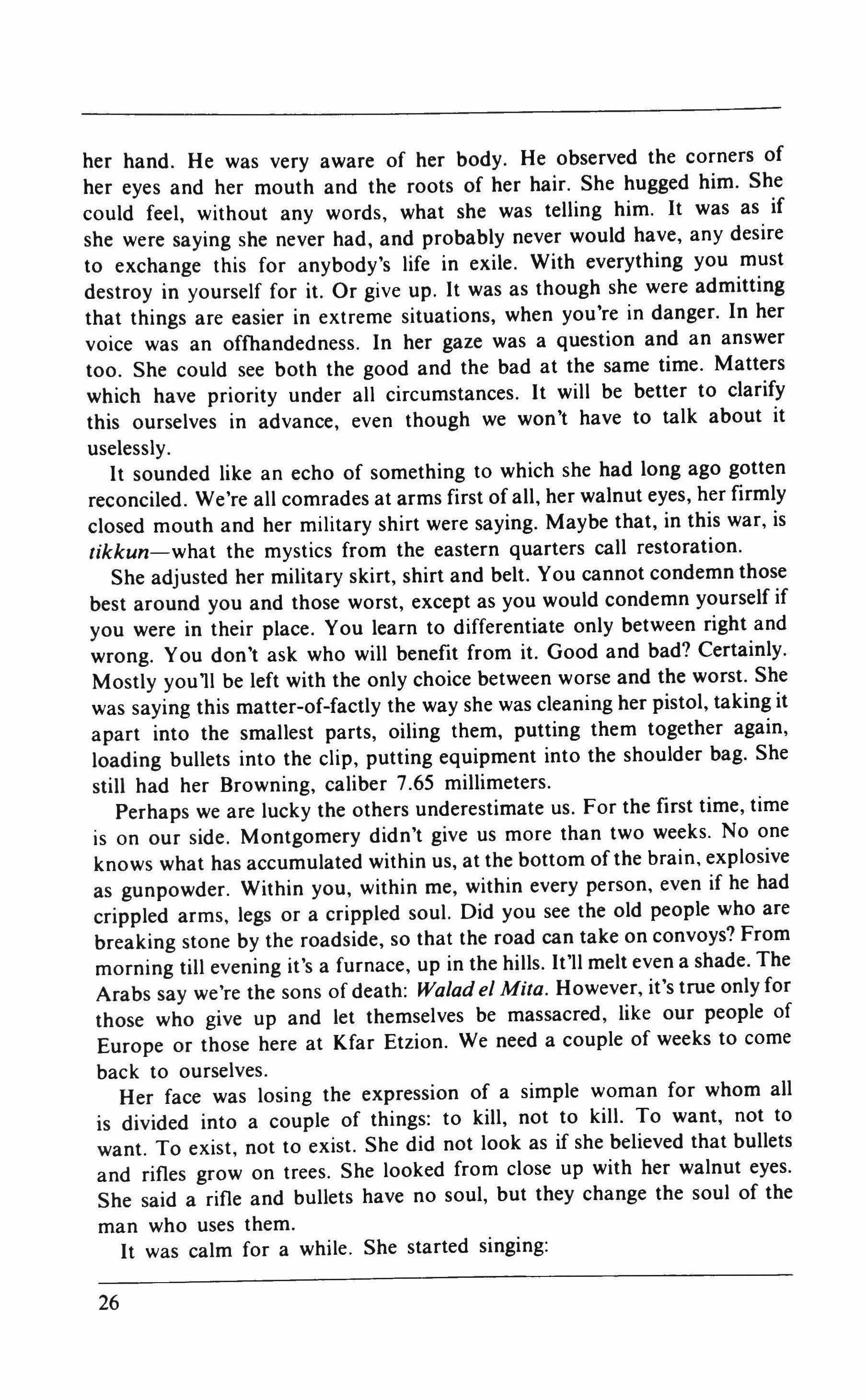
her hand. He was very aware of her body. He observed the corners of her eyes and her mouth and the roots of her hair. She hugged him. She could feel, without any words, what she was telling him. It was as if she were saying she never had, and probably never would have, any desire to exchange this for anybody's life in exile. With everything you must destroy in yourself for it. Or give up. It was as though she were admitting that things are easier in extreme situations, when you're in danger. In her voice was an offhandedness. In her gaze was a question and an answer too. She could see both the good and the bad at the same time. Matters which have priority under all circumstances. It will be better to clarify this ourselves in advance, even though we won't have to talk about it uselessly.
It sounded like an echo of something to which she had long ago gotten reconciled. We're all comrades at arms first of all, her walnut eyes, her firmly closed mouth and her military shirt were saying. Maybe that, in this war, is tikkun=wtis: the mystics from the eastern quarters call restoration. She adjusted her military skirt, shirt and belt. You cannot condemn those best around you and those worst, except as you would condemn yourself if you were in their place. You learn to differentiate only between right and wrong. You don't ask who will benefit from it. Good and bad? Certainly. Mostly you11 be left with the only choice between worse and the worst. She was saying this rnatter-of-factly the way she was cleaning her pistol, taking it apart into the smallest parts, oiling them, putting them together again, loading bullets into the clip, putting equipment into the shoulder bag. She still had her Browning, caliber 7.65 millimeters.
Perhaps we are lucky the others underestimate us. For the first time, time is on our side. Montgomery didn't give us more than two weeks. No one knows what has accumulated within us, at the bottom ofthe brain, explosive as gunpowder. Within you, within me, within every person, even if he had crippled arms, legs or a crippled soul. Did you see the old people who are breaking stone by the roadside, so that the road can take on convoys? From morning till evening it's a furnace, up in the hills. It'll melt even a shade. The Arabs say we're the sons of death: Waladel Mila. However, it's true only for those who give up and let themselves be massacred, like our people of Europe or those here at Kfar Etzion. We need a couple of weeks to come back to ourselves.
Her face was losing the expression of a simple woman for whom all is divided into a couple of things: to kill, not to kill. To want, not to want. To exist, not to exist. She did not look as if she believed that bullets and rifles grow on trees. She looked from close up with her walnut eyes. She said a rifle and bullets have no soul, but they change the soul of the man who uses them.
It was calm for a while. She started singing:

In the faraway mountains. on high meadows. and in thick forests. there lived a girl named Ruth. named Ruth. She never wanted to die. that girl named Ruth. Seven deserts. nine hills and eight plains away there lived a Ruth. seventeen springs old
And then:
Five borders. ten rivers and two oceans away. there lived a girl named Ruth. named Ruth. She never wanted to die. that girl named Ruth Beyond treacherous waters. violent whirlpools and high waves. there lived a Ruth. seventeen summers old
That girl Ruth left herfather and left her mother and left her brothers. she left with a rifle and took a dream along. She never wanted to die. that girl named Ruth. Seven deserts. nine hills and eight marshlands away she lay down in a trench. the seventeen-year-old Ruth
In faraway deserts. beyond the dunes. in the fog and sandstorms. there fell the girl named Ruth. named Ruth
She never wanted to die. that seventeen-year-old Ruth
In the echo of two hyenas' howling and two jackals' shriek and the screams of she-wolves that s how that Ruth girl is living in a song, the living Ruth.
Magda Wilderova's voice was slow. She was looking at him, at the record player, at her pistol and suddenly she smiled. She had full breasts, strong shoulders. She intertwined the fingers of her hands and stretched. Her hairline started just above her forehead. She had broad, Slavic cheekbones, a straight nose. As she stretched her chin touched the shallow depression between her neck and chest. Her chin reminded him of a small pillow.
She sensed that he was looking at her and said, "I think that one of my grandmothers was raped by the cossacks."
The sounds of the city streamed in through the open window, the sounds of gunfire and of a hot day. While he embraced her, everything began to reverse itself in his mind. The cars and trucks, the soldiers, the gunfire. The hills drowned inside the mountains, and the mist, and the fact that the stars hadn't been shining at the decisive moment. Everything gave back an offhanded answer: here we are, to live, to die, our backs to the wall, our faces toward the mountains. Why not? The moon sailed on beneath thick clouds. Like the stars which looked like the waterproof lamps which the fishing boats and Coast Guard cutters carry out on the nighttime sea. He could feel
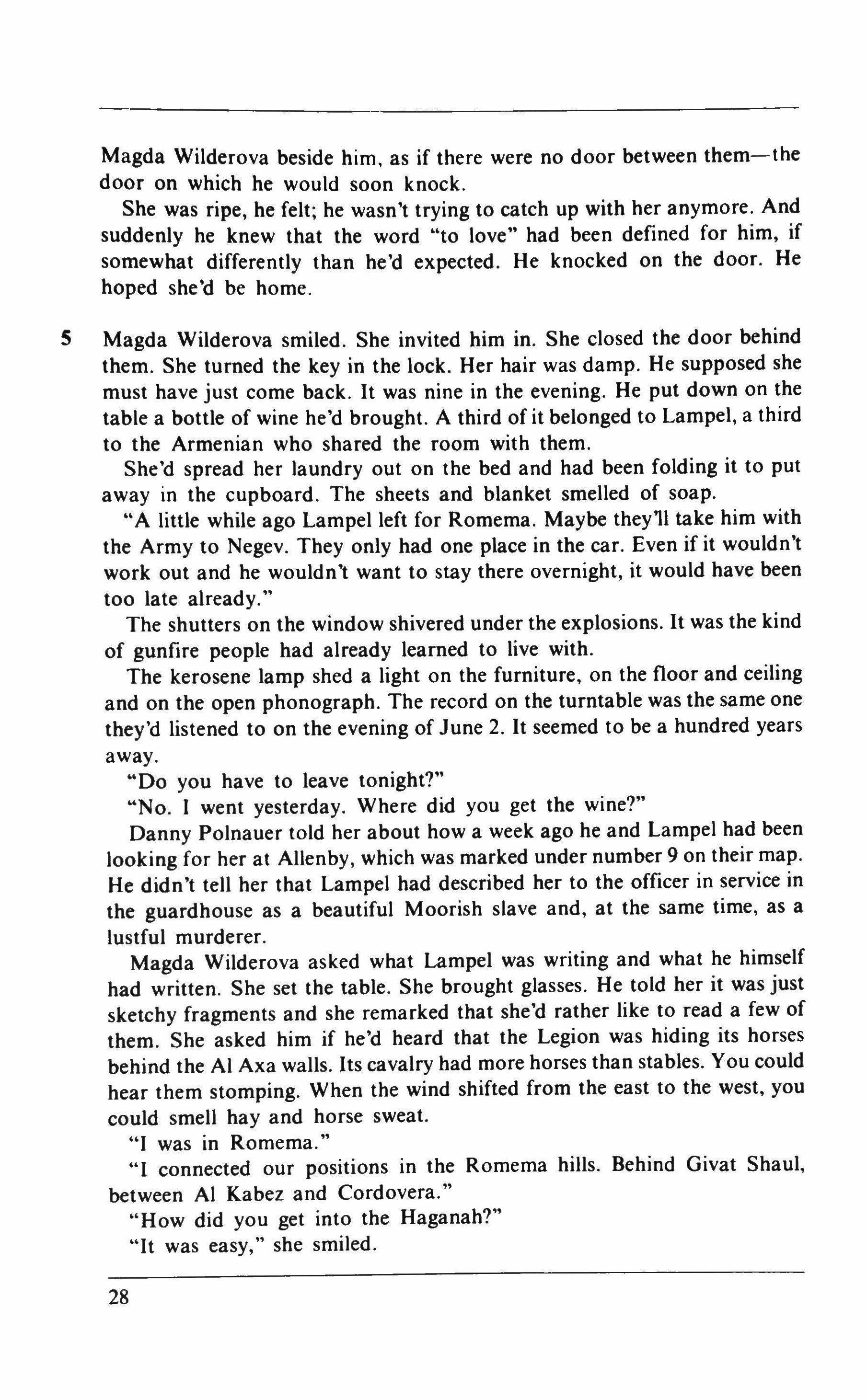
Magda Wilderova beside him, as if there were no door between them-the door on which he would soon knock.
She was ripe, he felt; he wasn't trying to catch up with her anymore. And suddenly he knew that the word "to love" had been defined for him, if somewhat differently than he'd expected. He knocked on the door. He hoped she'd be home.
S Magda Wilderova smiled. She invited him in. She closed the door behind them. She turned the key in the lock. Her hair was damp. He supposed she must have just come back. It was nine in the evening. He put down on the table a bottle of wine he'd brought. A third of it belonged to Lampel, a third to the Armenian who shared the room with them.
She'd spread her laundry out on the bed and had been folding it to put away in the cupboard. The sheets and blanket smelled of soap.
"A little while ago Lampelleft for Romema. Maybe they'll take him with the Army to Negev. They only had one place in the car. Even if it wouldn't work out and he wouldn't want to stay there overnight, it would have been too late already
The shutters on the window shivered under the explosions. It was the kind of gunfire people had already learned to live with.
The kerosene lamp shed a light on the furniture, on the floor and ceiling and on the open phonograph. The record on the turntable was the same one they'd listened to on the evening of June 2. It seemed to be a hundred years away.
"Do you have to leave tonight?"
"No. I went yesterday. Where did you get the wine?"
Danny Polnauer told her about how a week ago he and Lampe) had been looking for her at Allenby, which was marked under number 9 on their map. He didn't tell her that Lampel had described her to the officer in service in the guardhouse as a beautiful Moorish slave and, at the same time, as a lustful murderer.
Magda Wilderova asked what Lampel was writing and what he himself had written. She set the table. She brought glasses. He told her it was just sketchy fragments and she remarked that she'd rather like to read a few of them. She asked him if he'd heard that the Legion was hiding its horses behind the AI Axa walls. Its cavalry had more horses than stables. You could hear them stomping. When the wind shifted from the east to the west, you could smell hay and horse sweat.
"I was in Rornema."
"I connected our positions in the Romema hills. Behind Givat Shaul, between AI Kabez and Cordovera."
"How did you get into the Haganah?"
"It was easy," she smiled.

"I don't want to bore you."
"I wouldn't let you."
"They gave us the wine for all three of us. We live with this Armenian writer. Everytime he goes out, he makes sure a dozen times that he's locked all the locks on the suitcase as if he was carrying around three golden wands. He has a manuscript he's working on about the fate of his people and how their hope hasn't been extinguished to this day."
"I could add my own story to that," she smiled. "Everyone of us could, couldn't we? That's not important." She paused and then went on. "At the airport in Rechaviah, when I was working at the radio, 1 had a commanding officer who was even worse in his attitude toward animals than Saharof is. For Saharof, you know, anybody who doesn't understand animals is a zero. When he wanted to explain something to us, he always found an example. Once, during an attack, he told us about how, not far from Katmandu, near Mount Everest, a herd of wild elephants began attacking the Nepalese villagers, breaking down their houses, destroying and trampling their fields. Nobody could stop them or drive them away. The elephants kept on attacking. It was always only in regions where the elephants used to live. The villagers had come from the north and cut down the forests, plowed up the meadows where the elephants used to graze, built their villages and started planting crops. The elephants came back to take revenge the same way, year after year, and their anger grew stronger instead of weaker."
"Mount Everest? Lampel was there. He talked to Tenzing, the one who climbed to the top."
The evening streamed in through the window, heavy and moist, with the sound of cannons in the distance. They could see the sky, full of stars. Danny Polnauer felt like a fisherman looking out across an unfamiliar ocean, wondering whether he would ever catch a fish in that immense expanse of water. Above, the blue sky darkened, but as far as he could see, the dusty stars, like bits of molten silver, looked like the thin covering of snow on a mountain.
"Will you have something to eat with me?"
"Only if you'll have something to drink with me."
She probably couldn't understand why he laughed. "When I was a little boy, 1 had problems with good manners, and when we were invited somewhere and they offered me bread and butter. I envied people who could control themselves better, who knew how to say no or wait. But later I realized those are the good manners of the well-fed."
"It's the same with everybody, I suppose."
"Three days ago, I met a woman who served with you in Galilee. She stamped our identity cards. It was kind of difficult to have them extended. She was a blond with a haggard look and a scar on her neck. They were ordered to pull down the electrical wires and cut off the highway."
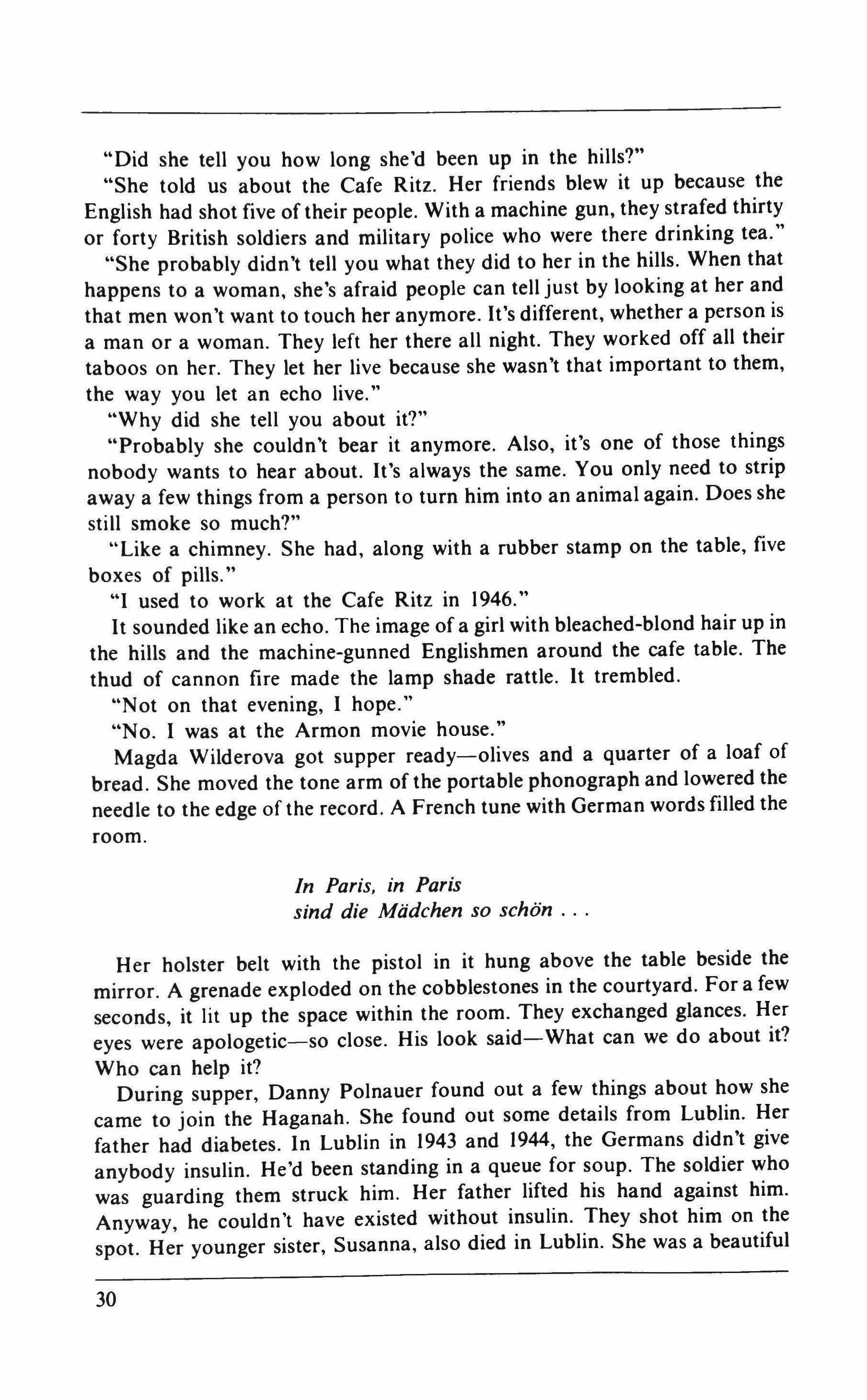
"Did she tell you how long she'd been up in the hills?"
"She told us about the Cafe Ritz. Her friends blew it up because the English had shot five of their people. With a machine gun, they strafed thirty or forty British soldiers and military police who were there drinking tea."
"She probably didn't tell you what they did to her in the hills. When that happens to a woman, she's afraid people can tell just by looking at her and that men won't want to touch her anymore. It's different, whether a person is a man or a woman. They left her there all night. They worked off all their taboos on her. They let her live because she wasn't that important to them, the way you let an echo live."
"Why did she tell you about it?"
"Probably she couldn't bear it anymore. Also, it's one of those things nobody wants to hear about. It's always the same. You only need to strip away a few things from a person to turn him into an animal again. Does she still smoke so much?"
"Like a chimney. She had, along with a rubber stamp on the table, five boxes of pills."
"I used to work at the Cafe Ritz in 1946."
It sounded like an echo. The image of a girl with bleached-blond hair up in the hills and the machine-gunned Englishmen around the cafe table. The thud of cannon fire made the lamp shade rattle. It trembled.
"Not on that evening, I hope."
"No. I was at the Armon movie house."
Magda Wilderova got supper ready-olives and a quarter of a loaf of bread. She moved the tone arm of the portable phonograph and lowered the needle to the edge of the record. A French tune with German words filled the room.
In Paris, in Paris
sind die Miidchen so schon
Her holster belt with the pistol in it hung above the table beside the mirror. A grenade exploded on the cobblestones in the courtyard. For a few seconds, it lit up the space within the room. They exchanged glances. Her eyes were apologetic-so close. His look said-What can we do about it? Who can help it?
During supper, Danny Polnauer found out a few things about how she came to join the Haganah. She found out some details from Lublin. Her father had diabetes. In Lublin in 1943 and 1944, the Germans didn't give anybody insulin. He'd been standing in a queue for soup. The soldier who was guarding them struck him. Her father lifted his hand against him. Anyway, he couldn't have existed without insulin. They shot him on the spot. Her younger sister, Susanna, also died in Lublin. She was a beautiful

girl with blond braids and a pale, silken skin, almost the Germanic type. Everybody thought they were Christians. When they were all still at home, in Bratislava in 1942, a Hitler-jugend boy had once taken the broom from her father's hand to sweep the sidewalk for him. Next day, that same boy threw a rock through their window.
"Were you a nurse for long?"
"No. I couldn't stand looking at those sick and crippled children standing in line for water. And every decent person joined the army."
Before she'd come here, in the fall of 1944, she and the sister and brother of a close friend had helped people from Hungary get here through Romania and Turkey. They had made the trip five times. Twice they were caught. Once in the winter 1943 and the second time at Easter 1944. She didn't look Jewish. From her family, only her older sister was left. The younger sister left Bratislava in the winter of 1942 with her mother and father and they'd written just once from Lublin. She spoke Slovak, Hungarian and German. At a little customs station, they were ordered to take off their shoes. They were beaten across the feet while a radio was playing, turned up loud. "Lili Marlene" could be heard up and down the street. A young officer beat her. He behaved smoothly, like a hussar, and he was freshly shaven and perfumed.-If I were your sister, you'd be proud to walk down the street with me, she screamed at him. And just because my mother's Jewish, you want to kill me.-Get out! he bellowed. At least she could walk and help the others who hadn't said a word. Their feet were so swollen, they couldn't take a step.
The second time, on Easter Monday in March 1944, it was a peasant who had offered them shelter, then turned them over to the Hungarian gendarmes. He took money from them first and, later, from the gendarmes. He kept them in the barn. She recalled the warm reek of the cows and sheep and horses. Steam rose from the damp piles of hay and straw. Spring rain fell through the holes in the roof. When the gendarmes came, he pinned her to the wall with a pitchfork. He said he could tell a Jew as soon as she opened her mouth, even if he'd had his eyes closed, because of the money clinking in her pockets. He wanted to know where she'd hidden her gold and silver and her money purse.
She ate slowly. She made a long journey from 1942 to June of 1948. She glanced down at her breasts. She was probably visualizing the house and the parlor where the peasant had more chairs and tables and beds than a furniture store. In one room there was a stove where he burned crumbled coal waste which was hardly more than dust. The soot had been ground into the floor. There were only the servants in the house. He told her to come with him to scrub the floor in the bedroom. He had featherbeds piled on top that were higher than the bed itself, all made of goosefeathers. Under the bed were suitcases and cardboard cartons tied with rope. The walls were spotted with dead bugs and flies. A crystal lamp from some Budapest salon hung

from the unplastered ceiling. He brought her a bucket of water. He really didn't want her to scrub the floor.
A railroad ran not far from the house. Hungarian and German ammunition and freight trains with tank cars passed that way, going in both directions. Through the window she could see the signals and the lights, and the whole time she could hear the moaning voices of the locomotives and the train whistles.
The peasant's cupboard was full of clothes he'd stripped off the Jewish refugees-women's dresses and fur coats-things, things, things. Some of the people had what he was looking for-family jewels, foreign currency, gold. Most of them only had good shoes. He yanked out the tongues and the linings of some of the shoes to see if anything was hidden inside, and their leather soles hung limply.
She could only imagine how he set out on his refugee-hunting expeditions, the way you go hunting for rabbits and quail or wild boar. He'd offer them goulash soup and home-brew brandy and a place to sleep.
The peasant had an almost kindly face and his arms were long and strong. He wore a woman's fur coat. She could imagine how many refugees he'd caught and what those fur coats could say, and the box under the bed or the chandelier, and what was inside the big closet with carved angels.
The gendarmes put her in a cell with prostitutes. She stayed there for six days. They didn't want to believe her when she insisted that she had lived in Budapest since the spring of 1939. One of the gendarmes tested her-What are they singing in Budapest now? he asked. She sang him a tune the prostitutes had been singing. He let her go.-"You never know what can save your skin."
"May I turn the record over?" asked Danny Polnauer. "Do you have anything to open this bottle with?"
A few snapshots lay beside the phonograph. There was Johnny Cohen, surrounded by other pilots, sitting at a table where half the people were playing cards and the other half were playing chess. In another photograph, Magda Wilderova was smiling with some soldiers in front of a half-truck transport. They were all smudged with oil, holding rifles and machine guns in their raised hands, bareheaded or wearing all sorts of different hats.
"Would you like to dance?"
"That was somewhere around Sheik Jaraha," she replied, listening to where the firing had come from. "We're about in the middle."
"I hope I can get to the airport eventually."
"When Cohen turns up here, 111 be glad to tell him."
"Thanks."
Danny Polnauer held out his hand to her. He waited until she placed her hand in his. The wick of the lamp was struggling for a few more drops of kerosene.

"I guess it's easy to talk me into things," she smiled.
"You dance very nicely."
"So do you."
"Your records are good to dance to."
Magda Wilderova narrowed her eyes. "In Budapest, in spring of 1944, I met a young man very briefly, a Swede, who bought train tickets for our people and paid for their hotels and made them Swedish citizens. Apparently he had a drop of Jewish blood in his veins. He spoke fluent German. He was one of those people who know just what they're doing and why. I asked him why he was risking his life for us.-To keep silent means to acquiesce to the worst, he told me. Indifference isn't just adjusting to evil, but actually helping it. People who pretend to be neutral when the weak are being beaten up, really stand on the side of those who hold the whip, not those who are being flogged, he said. I hugged him and kissed him on the cheek. He blushed. It was only when I got to Istanbul that I found out he'd bought buildings and administered them under the Swedish flag. He tried to save anybody he could. I think about him when I'm alone, at night, or when a unit goes into battle. They say one time he raced to the Hungarian border after a train that was going from Budapest through Bratislava to AuschwitzBirkenau. He passed out identity papers to anybody who could reach their hands out of the windows and then he claimed to the German authorities that those people were Swedish citizens. Eichmann detested him. Identity papers meant everything in those days. They say he saved a hundred thousand of our people." When she said the number, she sounded almost offhanded.
"What became of him?"
"He disappeared without a trace. They say lots of different things. Some people claim he's still alive, even. Some say he was arrested or shot by the Russians when they came to Budapest and took him off to Debrecin."
While they were dancing, there was something in her voice and her movements that flying birds have who have left others behind with broken wings and torn feathers. Those who flew off first and have flown the farthest, seldom look back, except perhaps to see their young who are still flying because they're supported by the strong ones, the ones with the scars of old wounds.
6 Danny Polnauer danced slowly. He wanted to find out what more there was to know about her and it was as if he knew nothing at all. Now and then he touched his cheek to hers. He could feel the curve of her breasts. The music drowned out the boom of the cannons. The lamp burned with a frugal flame. The low, yellowish light softened the angles of her face. Within the hour, the darkness had thickened outside; the air smelled of hard, dry earth; and the cannon rumbled intermittently from both sides.

"Have you known Saharof for a long time?"
"That depends on what you mean by long," she answered. "I had him in the hospital."
"He didn't say he'd been wounded. Seriously?"
"He was lucky."
She asked if he would like to go in front of the house for awhile. They went out to the street. Then they went to the hillside. The two Arab cannons were firing along the wall to where they couldn't see. The hillside was dirty, filled with garbage, broken tamarisks, cans and shrapnel remnants. No one was outside. Night covered the city. The wind was bringing the fragrance from the mountains. Somewhere, a jackal was screaming. They could hear the engine of a truck. He explained it to himself that she didn't want to be inside, whatever the reason. It was good to breathe in fresh air. It will bejust as pleasant to enter the house and to have thick walls around and above oneself.
"We're lucky," he said. "It's almost calm here."
"Therefore 1 wanted to go outside."
"What brought you to Jerusalem?"
"Everyone is asking me that. Perhaps a coincidence."
Then she said: "One can't be picky." She smiled briefly.
"In the last three weeks every situation has been crucial."
"Perhaps even in the last three, last ten years."
"If we lose here, it won't be only us wh011 lose," she added.
She looked at him from the side. In her eyes was a question. Her singed eyebrows were becoming lost in the darkness. The wind blew. It ruffled up her brown hair. She breathed in deeply, shrugged her shoulders, and crossed her arms on her chest for a moment.
The house behind her looked deserted. Stones, bushes and the ground torn out by grenades during the day and cans were lying on the hillside. The earth and the hills and the stars were touching in the distance. A truck sounded again beyond the hill. The echo was reminiscent of the machine guns, shouting of people, horses and radios.
"It is simple," she said. "How much better is to be in the war than to be put to death as lice."
Then she said, "Even many of our own people have already buried us alive.
The complexion of her neck gleamed through the open neck of her shirt. She closed the last two buttons. The wind leaned against her and mussed up her hair.
Now the cannons could only be heard, not seen. Her expression did not reflect what she was talking about. She pointed to the hills: "We've lost all that. Atarot. Hartuv. Neve Yaakov, Kfar Etzion. The people too."
A star was falling into Samaria in the direction to Latrun, Ramlah.
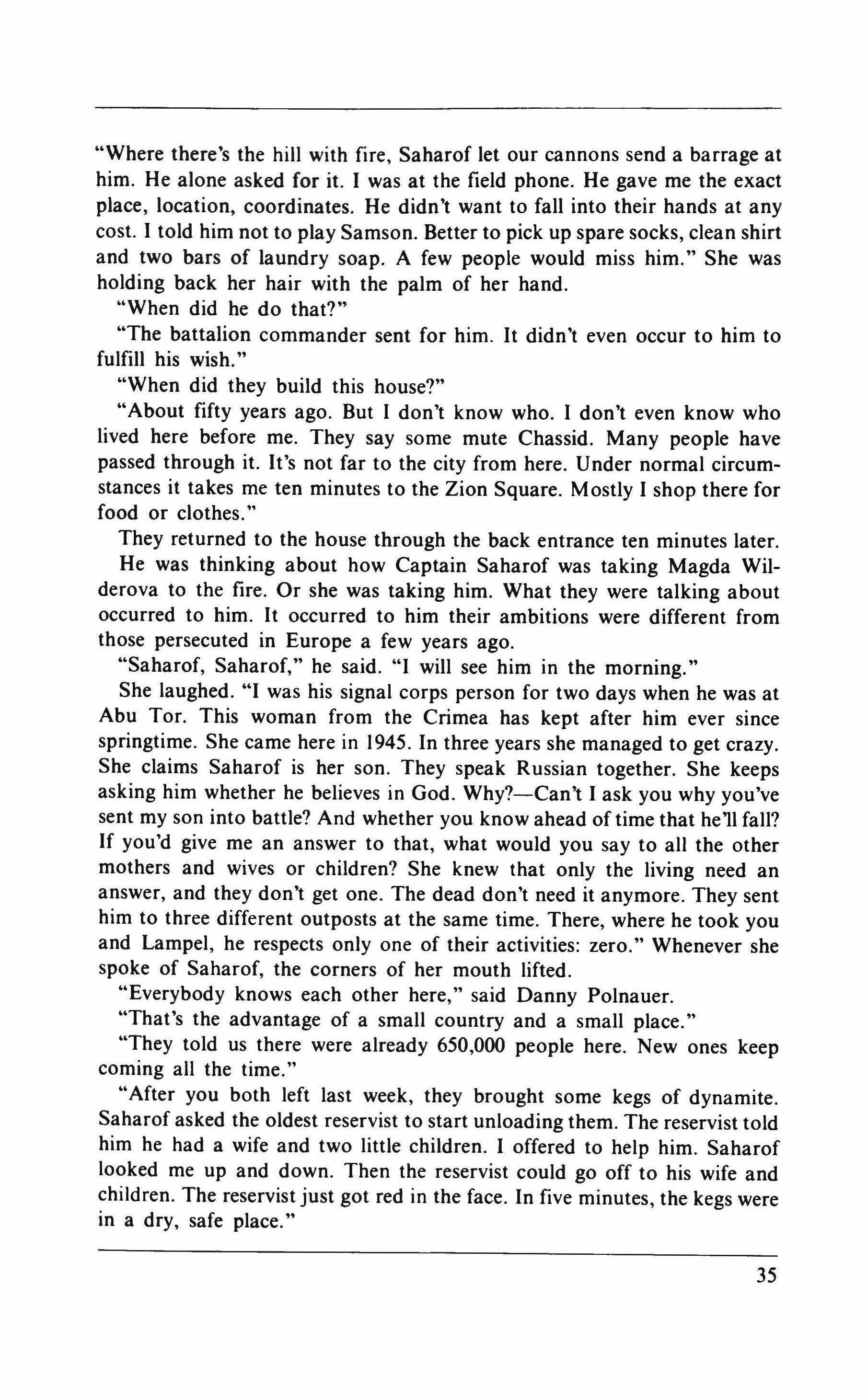
"Where there's the hill with fire, Saharof let our cannons send a barrage at him. He alone asked for it. I was at the field phone. He gave me the exact place, location, coordinates. He didn't want to fall into their hands at any cost. 1 told him not to play Samson. Better to pick up spare socks, clean shirt and two bars of laundry soap. A few people would miss him." She was holding back her hair with the palm of her hand.
"When did he do that?"
"The battalion commander sent for him. It didn't even occur to him to fulfill his wish."
"When did they build this house?"
"About fifty years ago. But I don't know who. I don't even know who lived here before me. They say some mute Chassid. Many people have passed through it. It's not far to the city from here. Under normal circumstances it takes me ten minutes to the Zion Square. Mostly I shop there for food or clothes."
They returned to the house through the back entrance ten minutes later. He was thinking about how Captain Saharof was taking Magda Wilderova to the fire. Or she was taking him. What they were talking about occurred to him. It occurred to him their ambitions were different from those persecuted in Europe a few years ago.
"Saharof, Saharof," he said. "I will see him in the morning."
She laughed. "I was his signal corps person for two days when he was at Abu Tor. This woman from the Crimea has kept after him ever since springtime. She came here in 1945. In three years she managed to get crazy. She claims Saharof is her son. They speak Russian together. She keeps asking him whether he believes in God. Why?-Can't I ask you why you've sent my son into battle? And whether you know ahead of time that hell fall? If you'd give me an answer to that, what would you say to all the other mothers and wives or children? She knew that only the living need an answer, and they don't get one. The dead don't need it anymore. They sent him to three different outposts at the same time. There, where he took you and Lampel, he respects only one of their activities: zero." Whenever she spoke of Saharof, the corners of her mouth lifted.
"Everybody knows each other here," said Danny Polnauer.
"That's the advantage of a small country and a small place."
"They told us there were already 650,000 people here. New ones keep coming all the time."
"After you both left last week, they brought some kegs of dynamite. Saharof asked the oldest reservist to start unloading them. The reservist told him he had a wife and two little children. 1 offered to help him. Saharof looked me up and down. Then the reservist could go off to his wife and children. The reservist just got red in the face. In five minutes, the kegs were in a dry, safe place."
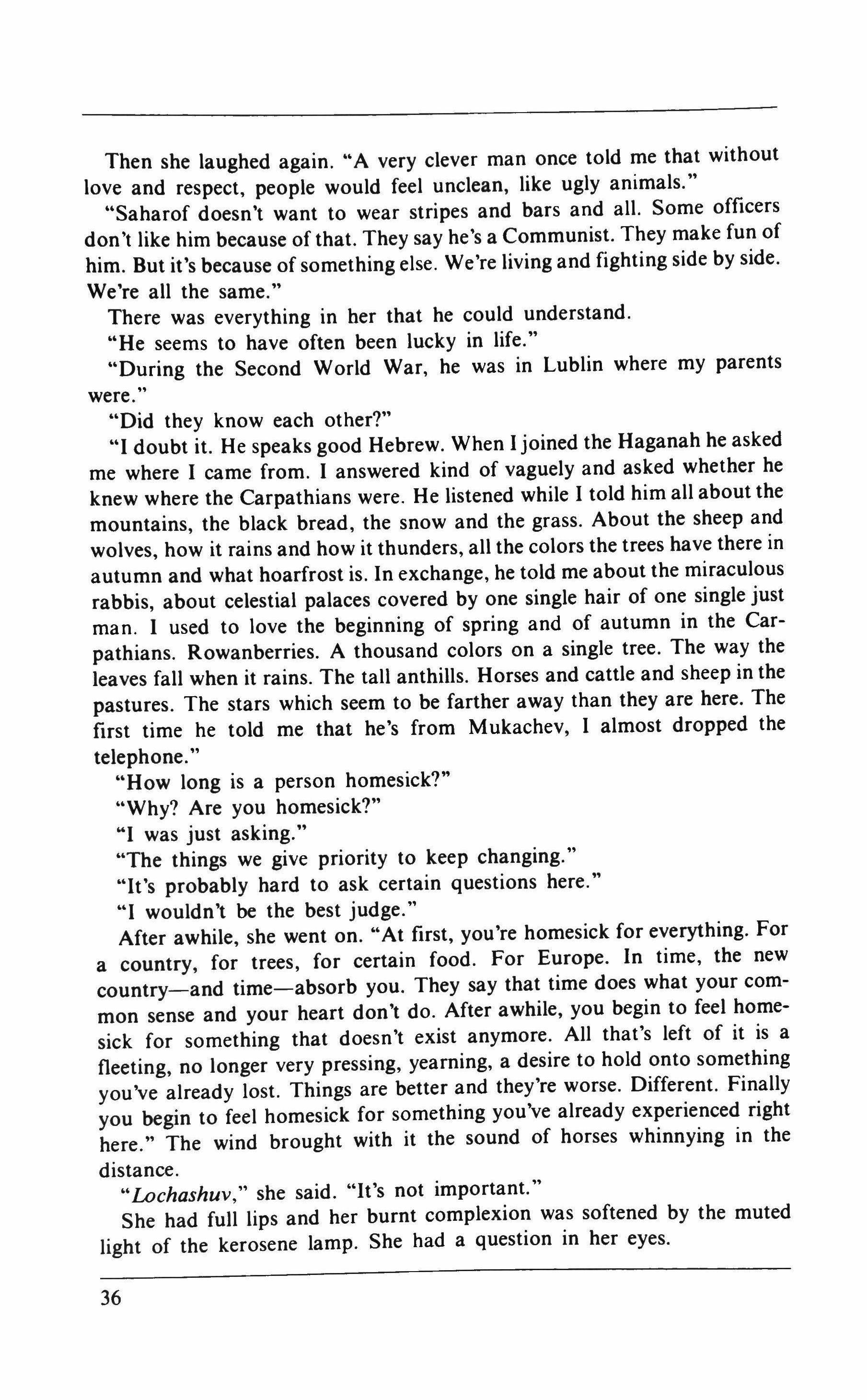
Then she laughed again. "A very clever man once told me that without love and respect, people would feel unclean, like ugly animals."
"Saharof doesn't want to wear stripes and bars and all. Some officers don't like him because of that. They say he's a Communist. They make fun of him. But it's because of something else. We're living and fighting side by side. We're all the same."
There was everything in her that he could understand.
"He seems to have often been lucky in life."
"During the Second World War, he was in Lublin where my parents were."
"Did they know each other?"
"I doubt it. He speaks good Hebrew. When I joined the Haganah he asked me where I came from. I answered kind of vaguely and asked whether he knew where the Carpathians were. He listened while I told him all about the mountains, the black bread, the snow and the grass. About the sheep and wolves, how it rains and how it thunders, all the colors the trees have there in autumn and what hoarfrost is. In exchange, he told me about the miraculous rabbis, about celestial palaces covered by one single hair of one single just man. I used to love the beginning of spring and of autumn in the Carpathians. Rowanberries. A thousand colors on a single tree. The way the leaves fall when it rains. The tall anthills. Horses and cattle and sheep in the pastures. The stars which seem to be farther away than they are here. The first time he told me that he's from Mukachev, 1 almost dropped the telephone.
"How long is a person homesick?"
"Why? Are you homesick?"
"I was just asking."
"The things we give priority to keep changing."
"It's probably hard to ask certain questions here."
"I wouldn't be the best judge."
After awhile, she went on. "At first, you're homesick for everything. For a country, for trees, for certain food. For Europe. In time, the new country-and time-absorb you. They say that time does what your common sense and your heart don't do. After awhile, you begin to feel homesick for something that doesn't exist anymore. All that's left of it is a fleeting, no longer very pressing, yearning, a desire to hold onto something you've already lost. Things are better and they're worse. Different. Finally you begin to feel homesick for something you've already experienced right here." The wind brought with it the sound of horses Whinnying in the distance.
"Lochashuv," she said. "It's not important."
She had full lips and her burnt complexion was softened by the muted light of the kerosene lamp. She had a question in her eyes.
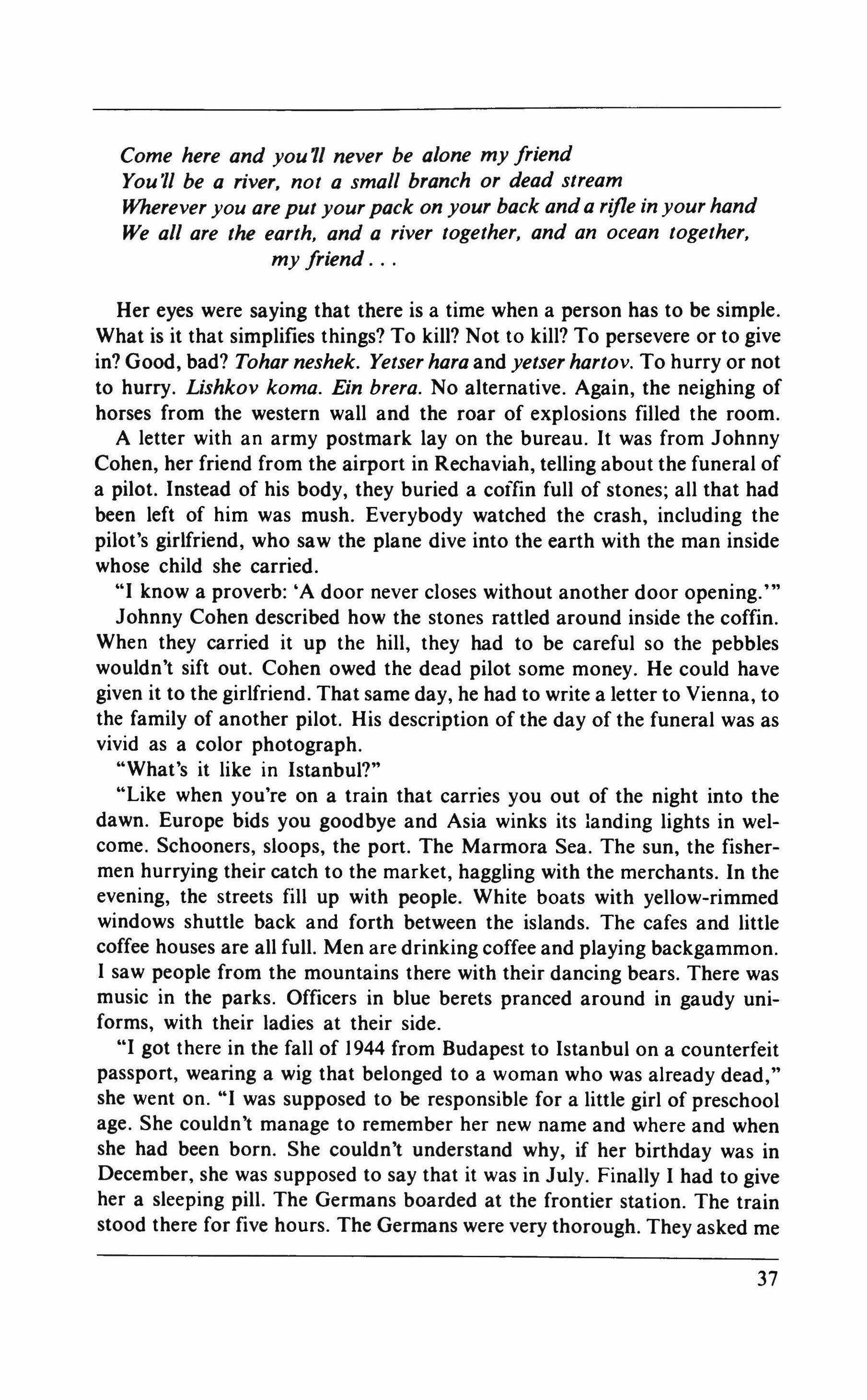
Come here and you 71 never be alone my friend
You11 be a river. not a small branch or dead stream
Wherever you are put your pack on your back and a rifle in your hand
We all are the earth. and a river together. and an ocean together. my friend
Her eyes were saying that there is a time when a person has to be simple. What is it that simplifies things? To kill? Not to kill? To persevere or to give in? Good, bad? Tohar neshek. Yetser hara and yetser hartov. To hurry or not to hurry. Lishkov koma. Ein brera. No alternative. Again, the neighing of horses from the western wall and the roar of explosions filled the room.
A letter with an army postmark lay on the bureau. It was from Johnny Cohen, her friend from the airport in Rechaviah, telling about the funeral of a pilot. Instead of his body, they buried a coffin full of stones; all that had been left of him was mush. Everybody watched the crash, including the pilot's girlfriend, who saw the plane dive into the earth with the man inside whose child she carried.
"I know a proverb: 'A door never closes without another door opening."
Johnny Cohen described how the stones rattled around inside the coffin. When they carried it up the hill, they had to be careful so the pebbles wouldn't sift out. Cohen owed the dead pilot some money. He could have given it to the girlfriend. That same day, he had to write a letter to Vienna, to the family of another pilot. His description of the day of the funeral was as vivid as a color photograph.
"What's it like in Istanbul?"
"Like when you're on a train that carries you out of the night into the dawn. Europe bids you goodbye and Asia winks its landing lights in welcome. Schooners, sloops, the port. The Marmora Sea. The sun, the fishermen hurrying their catch to the market, haggling with the merchants. In the evening, the streets fill up with people. White boats with yellow-rimmed windows shuttle back and forth between the islands. The cafes and little coffee houses are all full. Men are drinking coffee and playing backgammon. I saw people from the mountains there with their dancing bears. There was music in the parks. Officers in blue berets pranced around in gaudy uniforms, with their ladies at their side.
"I got there in the fall of 1944 from Budapest to Istanbul on a counterfeit passport, wearing a wig that belonged to a woman who was already dead," she went on. "I was supposed to be responsible for a little girl of preschool age. She couldn't manage to remember her new name and where and when she had been born. She couldn't understand why, if her birthday was in December, she was supposed to say that it was in JUly. Finally I had to give her a sleeping pill. The Germans boarded at the frontier station. The train stood there for five hours. The Germans were very thorough. They asked me

about the child. I was scared I'd given her too many sleeping pills. The officer inspected my passport for a long time. He leafed through every single page three times, frontwards and backwards."
Then she smiled again. "In Ankara, there was a priest who helped us. He did it as if it were something he shouldn't be doing." She could still see the man in whose eyes there had been a kind of anger that he must do something for them that he would have done much more easily if it had been for someone else. As if they didn't quite deserve it.
"The Turks have a saying that you can't hold two melons in one hand."
"Everybody can only live with their own conscience."
"It's good that the priest helped you in Ankara. No matter what he thought when he did it."
"I don't know. I hope so. It's not important. It's even kind of silly. With every refugee he sent down here through Istanbul, he felt more like one of us.
"Yesterday," she added, "they found Bredow among the Egyptian prisoners who had been captured. He was one of the commanders at Treblinka. They shot him on the spot."
"Were they scared of what else he might say at a trial? Didn't they shoot him too fast?"
"That's not important. Why?"
"Sometimes the Israelis do things I can't understand."
"Sometimes the only good thing is what's fast. In Treblinka the Nazis killed eight hundred thousand of our people. Only forty survived. Some of them are with us."
"Is it fear?"
"Maybe it's fear, too. They say that from tomorrow till tomorrow is a long way. I don't know. Maybe he told them all what they wanted to know. And it's certainly lishkov koma, too-the ability to stand tall. The ability not to go back to where each one of us has been already. I can't say I'm very fond of the Arab soldiers. But I like them a hundred times more than Nazis. There's a difference between fear and cowardice. Everyone of us is frightened. But it wouldn't be normal for somebody not to be afraid when tracer bullets are raining down on you. But the fear that they might occupy and humiliate us is even greater. So you destroy one kind of fear-of being humiliated-by another fear, of death. The result is that you fight. Cowardice is something different. Cowardice is when the fighting stops and the commander looks for people to evacuate the wounded as fast as possible. And some people run away and others hide because if they're using their two hands to carry a stretcher, they can't shoot and defend themselves." She covered her mouth with her hand. "But it doesn't really matter."
Danny Polnauer wondered how many people she'd shot already. And how many times she'd been under fire. How many stretchers she'd carried away.

It was the middle of the night. A rooster crowed somewhere. It seemed too early, with all the stars and darkness, as if the rooster had been wakened by shrapnel.
"Everything's different and simpler when you do it for yourself. It's almost easy.
She smiled anew. "When I first took a rifle into my hands, it wasn't just because of how I was going to shoot with it and what I was defending myself against. I didn't even know how to put in the clip. But I knew I wasn't made of mud anymore. I cried when I first saw someone fall. 1 couldn't lie to myself, that a yearning for weapons means just a desire for freedom, for victory, because I'd gotten used to the constant presence of death." She smiled thoughtfully, as if she were apologizing for something. She ran her hand over her hair and touched the corners of her mouth with her fingertips. She went on smiling.
"We don't have to talk about the war."
She could go back to telling about how she'd left the kibbutz in the beginning of 1946 and come to Jerusalem. It was a cosmopolitan city. She'd gone to work in the Atara Cafe. She stayed there for three-quarters of a year. They cheated her. An older waitress confided in her that she was a member of the Haganah. Magda wanted to enlist too. As far as social status went, it didn't matter what you did. A maid, a nurse, or serving in the army. She met Saharof with his formula that whoever gives more to himself than to others ends up as a vacuum. They invited her to come to the hospital cashier's office. It was evening and the room was dark. They interrogated her to find out what sort of a person she was. They asked her what a person thinks about when circumstances force them to do the worse.-The worst stays inside you, she told them. We have the worst inside us, along with everything else. But the best also. It's always only the tip ofthe iceberg that you can talk about and explain and share. After midnight they told her she could leave, that she'd be notified. She didn't have many illusions. Within a week, she was given an assignment, to stay in the cafe. The first thing was to observe with whom the English officers drank their tea or coffee, to listen to what they talked about. Then Haganah sent her to a hospital for basic training. She learned how to handle a gun. It was a Czech rifle, with a German name engraved on it: Heinz Kremenetz. They taught her how to orient herself at night. The duties of a patrol: to notice when, where, who, how, and what she saw. They trusted the Sabras most-the people who had been born here. Then those who had served in the Allied armies. Finally, the people like her. She took a nursing course and learned how to give injections for a gynecologist. Then they assigned her to the airport at Rechaviah and she took a radio and telephone course in communications. The instructors began to commend her. From their experience, they could tell that she would shoot to kill. Each day she had a different commander. She was happy to be in the

Haganah. It was the kind of happiness which can be explained by her Jewish experience.
"On the first night, an instructor took us out for live target practice and he acted as if he'd been born with enough courage to last a dozen soldiers for a lifetime. He gave us a hard time. Then suddenly, out of the darkness, the outlines of trucks and horses appeared, and the silhouettes of enemy soldiers. He ordered us to lie down. There wasn't a sound. Then he gave the order to fire. He shot more than anybody else. Nothing stirred. Before daybreak, he told us to get up and march over to the target barrels. There were thirteen barrels. Not one of them had been hit. We never heard of him after that."
"You're very pretty," he told her slowly.
"Some people tell me that from time to time."
Some of the explosions outside lasted longer than it took for a record of dance music to start and finish playing. Magda Wilderova opened the window halfway. One of the buttons on her shirt had come undone.-It's probably a good thing and a bad one that we can't read minds, he decided.
"It's at the end again," she said when the record stopped. "Don't you want to sit down for awhile? I don't know about your main talent. But you certainly know how to dance." She smoothed her skirt. When she sat down, he noticed how her breasts rose and fell. She folded her hands in her lap. Her hair was dry already. The lamplight gave it a golden sheen. In the sky were flashes from the antiaircraft guns.
"Do you think it's very late by now?"
"Unless it's late for you. I don't know how long your leave is good for. I don't have any responsibilities tomorrow. Then we'll talk with Lampel."
"Until twelve o'clock. It's not important."
"Still a little while?"
Danny Polnauer poured more wine for both of them. Then he got up and went over to the lamp and fiddled with it for awhile. The flame grew smaller. They were drowned in shadows, and her smile in the dusk was offering him something and taking something back. He could hear himself, like an echo, telling her how pretty she was. She held her glass with two hands. She had callouses on her fingers and hands, most likely from pulling coils of wire. The light flickered and her face and shoulders and haunches disappeared into the shadows and then swam back into the light again. The bottle was still two-thirds full.
"Did you want to ask me something just now?"
"I wanted to ask you how it is with you when Lampel and I don't happen to be imposing on you."
"And you're alone?"
"Here?"
He saw immediately that he'd made a mistake.

"I like company. There are a few people who come around now and then. It's one of those important things, to know you're not alone. Not just because in a house like ours too much gets destroyed anyway, even without the bombs.
The explosions had been going on since the beginning of the evening and it didn't sound as if they'd end very soon.
"Could any of them come while we're hetel"
"It's not important. By now, nobody will be coming any more and you'll be leaving in a little while. Unless you're afraid to go." It seemed as if she were talking about one thing and thinking about something else, something he couldn't comprehend, something full of a sensuality which excited him.
He put on the record about the girls in Paris. Once again she placed her hand slowly in his.
"Are you tired of me?"
"I was married not long ago and my husband died."
The offhanded way she said it had a faint, almost faded echo to it-of things you don't believe until they happen to you for the first time, things that surprise you only once.
He was startled. He could put together some of the things she'd been saying. He was glad it was almost dark. The booming thuds outside covered the city. Was she thinking about those you love best and who are the first to be killed? He was thinking how the dead are present in people, like the desert is always there, and the sea and mountains. The past. He'd thought several times about what changes people's nature when they've lost somebody or whose entire family has died and in a country which has a desert and maybe it doesn't. Or a sea.
"Not here," she said.
"Where?"
"Not here," she said anew, as if she hadn't heard him. "He didn't die here and now."
She'd said "not long ago." What was long ago for her?
It was a story which he was soon to hear, about the man whose name he did not know. He had taken care of her in 1942 when she fled from Bratislava with her elder sister so they wouldn't have to go to Lublin. They had been together on a secret hakshara, or holiday, where they had learned to plow, to take care of horses, to speak Hebrew, and to live in community. He had taken her into his brother's group.
She'd often thought about whether sharing is easier for people who have little or nothing, or for those who have enough of everything. What guides them and under what circumstances? Is it a gift, an inclination, a matter of will? Is it an ability or an art of sharing? She believed that poor people have better hearts. Bigger hearts. Sometimes great ones. The brave and the unselfish have great hearts too. They also are guided by them more than the
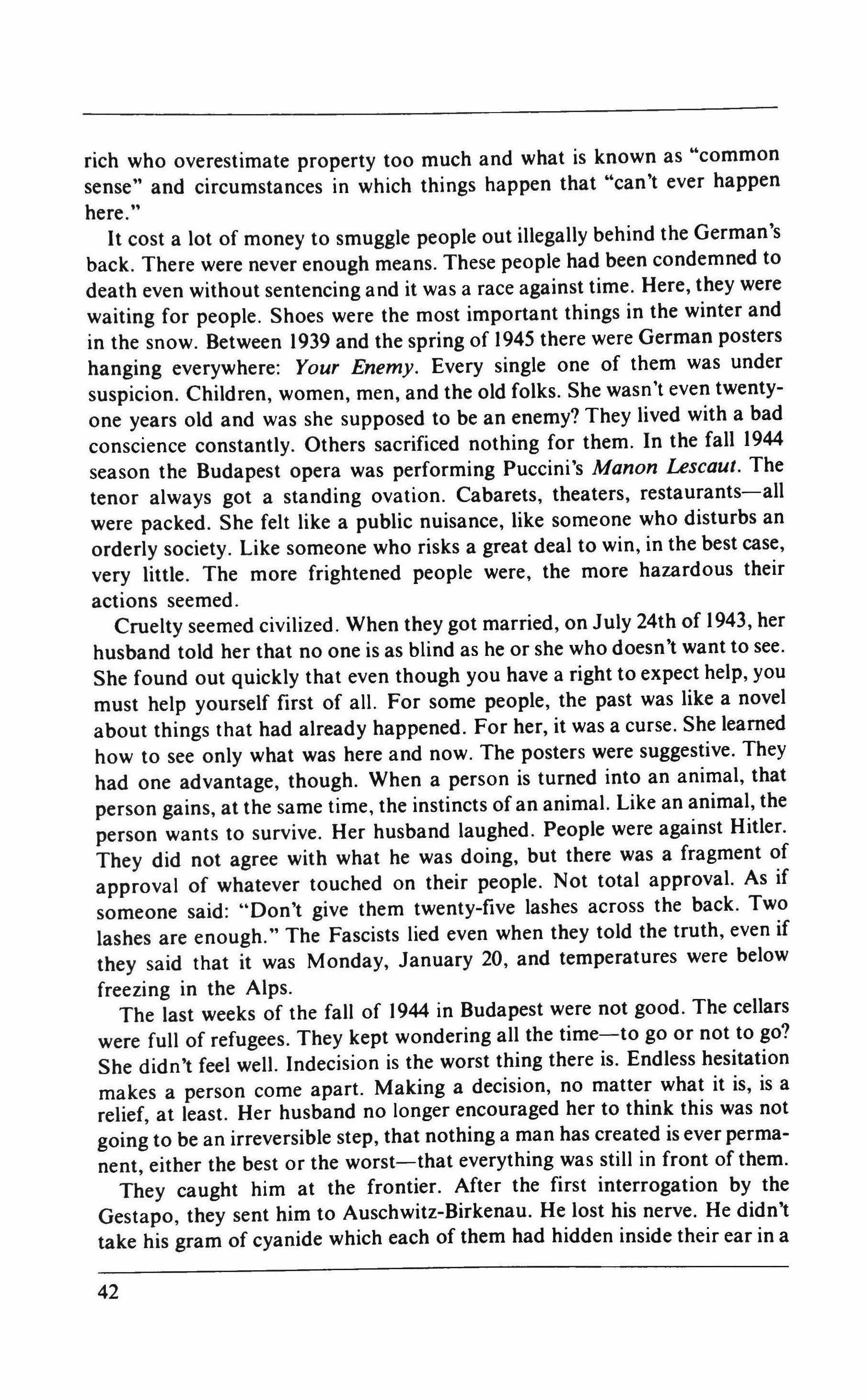
rich who overestimate property too much and what is known as "common sense" and circumstances in which things happen that "can't ever happen here."
It cost a lot of money to smuggle people out illegally behind the German's back. There were never enough means. These people had been condemned to death even without sentencing and it was a race against time. Here, they were waiting for people. Shoes were the most important things in the winter and in the snow. Between 1939 and the spring of 1945 there were German posters hanging everywhere: Your Enemy. Every single one of them was under suspicion. Children, women, men, and the old folks. She wasn't even twentyone years old and was she supposed to be an enemy? They lived with a bad conscience constantly. Others sacrificed nothing for them. In the fall 1944 season the Budapest opera was performing Puccini's Manon Lescaut. The tenor always got a standing ovation. Cabarets, theaters, restaurants-all were packed. She felt like a public nuisance, like someone who disturbs an orderly society. Like someone who risks a great deal to win, in the best case, very little. The more frightened people were, the more hazardous their actions seemed.
Cruelty seemed civilized. When they got married, on July 24th of 1943, her husband told her that no one is as blind as he or she who doesn't want to see. She found out quickly that even though you have a right to expect help, you must help yourself first of all. For some people, the past was like a novel about things that had already happened. For her, it was a curse. She learned how to see only what was here and now. The posters were suggestive. They had one advantage, though. When a person is turned into an animal, that person gains, at the same time, the instincts of an animal. Like an animal, the person wants to survive. Her husband laughed. People were against Hitler. They did not agree with what he was doing, but there was a fragment of approval of whatever touched on their people. Not total approval. As if someone said: "Don't give them twenty-five lashes across the back. Two lashes are enough." The Fascists lied even when they told the truth, even if they said that it was Monday, January 20, and temperatures were below freezing in the Alps.
The last weeks of the fall of 1944 in Budapest were not good. The cellars were full of refugees. They kept wondering all the time-to go or not to go? She didn't feel well. Indecision is the worst thing there is. Endless hesitation makes a person come apart. Making a decision, no matter what it is, is a relief, at least. Her husband no longer encouraged her to think this was not going to be an irreversible step, that nothing a man has created is ever permanent, either the best or the worst-that everything was still in front of them. They caught him at the frontier. After the first interrogation by the Gestapo, they sent him to Auschwitz-Birkenau, He lost his nerve. He didn't take his gram of cyanide which each of them had hidden inside their ear in a

bit of cotton. The leaders didn't have to tell them anymore that if they were caught they would have nowhere to go. During the interrogation, they asked the first one where he came from, who he was and who his contacts were. Name, place, name of contact. Some of them were tortured. They crushed their genitals, burned their fingernails, gave them injections-everything that German civilization had mastered so well between 1939 and 1945. Even the bravest usually confessed to save the lives of the others at least. But the Germans were even calculating about this. They questioned the second person. He let himself be shot too. Then it was her husband's turn. They didn't shoot him right away. They knew he was the leader. They wanted the will of the victor to prevail over the will of the defeated before they killed him. They also wanted to sow suspicion and distrust among those they hadn't caught. She wondered whether it had been her fault. If he hadn't wanted to go with her, he could have stayed alive. Her conscience bothered her. They'd gotten themselves into a situation in which whatever they did was wrong. He didn't have any good reasons, only bad ones. The Gestapo muddied the waters so thoroughly that this wouldn't be straightened out for fifty years to come.
They even went so far that a speck of Gestapo gunpowder was in every cartridge shot against Israeli soldiers for four years after her husband died in the winter of 1944.
When the Fascists killed him, it seemed that the only possiblity left for her was to work for his brother's organization. They didn't fuss over anybody, just as nobody fussed over them. But what mattered to her was what they were doing, not under whose banner. She had her doubts: who to save? The other question grew out of this: who not to? Why? No person is God, but when life is at stake, everybody is first, after God. The Germans had their lists of whom to kill and we had the list of whom to save. It was a struggle for each second. For each conscious decision: what's good, what's bad, what's better, what's worse, the worst?
It always went back to her parents. She'd told them already in March of 1941-Leave everything and come! It's going to get worse. Nobody will live through this. They said:-Even worse? What about our house? Our life? Have we stolen something or what? All of a sudden they became refugees in their own country. Everything changed. In Slovakia, their own people hampered what they were doing. They were afraid of life. From the first seconds after we're born, we fear death. For them, life was what they'd been, what they had. They'd gotten used to it. They'd worked twenty, thirty, fifty years for what they had and were they supposed to leave it now? What have we done that God is punishing us so much? Had they lost sight of where the victim they had become ends, and where betrayal begins-of themselves, of the past, of the future? Some of them preferred to get fat rather than to run away. A few of them jumped out of the window or turned on the gas.

"I've been here like this for quite a long time," she said. "Maybe I've forgotten how to speak the way I spoke before. Here you can get along with English or German until you learn Hebrew."
She remembered how, in Istanbul, in the fall of 1944, she'd seen oranges for the first time. She had friends there. The day after her arrival, the Germans marched into Hungary. It was at the last minute. Then all she did was wait for news. People told her-Keep on going! She had to tell them how things looked in Budapest, at the frontier crossings, and that bread was rationed, and about what the Germans were doing with people.
"I wanted to leave here in the winter of '44 and go back to Europe as a parachutist. I was in a kibbutz. There were two people there, a man and a woman, who were getting ready to go. They had a six-month-old child. I explained to them about how things were in occupied Hungary. 1 told him once,-You have a child. You don't know what those Germans are like. He said,-I have my mother there. I couldn't live if 1 didn't try it. 1 thought 1 could have taken his place. General Vlasov's people shot him in a forest. They pretended they were partisans and he joined them."
And the woman?"
"She's dead, too."
"It's a good thing they didn't let you go."
Danny Polnauer wondered why she had criticized the man for wanting to go and not the girl. Echoes of an old scorn got mixed up with his feelings.
"They caught her and tortured her. They killed her when she was twentythree years old. Her mother survived and she's living here now."
She smiled. "Two weeks ago, right after the war began, 1 wanted to give a lift to this woman in Romema and let her ride under the tarpaulin of the truck. Her nerves were shot, she could still hear the Katushkas from the war whenever there was thunder, she thought shrapnel was falling. She didn't manage to crawl into the truck in time. Our commander saw us. He reprimanded me for what 1 was doing. If everybody would leave, the Legionnaires would take our houses for free. 1 tried it again, with a moving van. 1 offered cigarettes to the driver and wine to the commander."
"Did he come?"
"I don't want to go into detail."
She smiled again. She wondered whether it might not take a thousand years before all the old wrongs were smoothed over and before groups of human families who had been hurt for thousands of years back into the past would be able to feel like equals among equals. Anybody with a brain in his head ought to understand that someone whose 150 grandmothers for 75 generations back had been cheated and killed and shouted down would not suddenly rush like a rabbit into the coils of a boa constrictor, even though the boa constrictor would, for a change, tell him not to be afraid, that he wasn't going to get hurt, that we're all equals now. The smile slowly left her

lips, their corners drooped and her expression was one of somebody who refuses to let the past carry her off wherever it wants to.
In the spring of 1945 she'd gotten a photograph from Egypt, from an English training camp, with the Pyramids in the background. It was a picture of the group with which her friend was to have left-after training with the British Army-far behind the German lines. The redheaded girl in front was from a Ukrainian rabbi's family. She spoke nine languages. They looked like tourists posing in front of the pyramids. One of the girls was laughing. Her corpse was later found in a common grave along the Hron River.
They'd found out all the details only bit by bit, after the Second World War, when the rest of the world celebrated victory. They'd come here as through a net of time, but it was as if it had happened just now. The Palestine POSI reported that Peron had provided more than 8,000 passports for the Nazis, with no questions asked. Dr. Mengele disappeared in Paraguay. She wondered if she wasn't having hallucinations. Had the world changed so little? Wasn't one world separate from the other? Is there just this one murky stream which we have in common? A Jewish woman had been found dead in the Andes, apparently because she'd recognized one of those former Nazis.
There wasn't much from her married life that she wanted to recall. Who does not want what one has had? A teacher who was a member of their group married them. He said: There is another tomorrow. All is not lost that is delayed. He comforted them, saying he laughs best who laughs last. In the evening, they sang Hebrew songs. They were singing a song about the land, where the inevitable result of all effort isn't treason or disappointment. Where one straightens up even if it should be only for a day, a week, an hour of a free life.
In July 1944 they were waiting for a contact. The moss in the forest, different beds almost every night, different apartments, houses, remote places; better half a loaf than no bread. Her husband laughed: Where a tavern exists, a bakery is not needed. He also used to say love and war is the food of the poor. In the fall she was getting used to the cold nights, to the warmth man gives a woman and a woman to a man. He would sing her a song with the moral that he who doesn't stretch his legs according to his bed gets used to having them stick out. The stars and the moon were their company.
She remembered one chilly night. They lay in a hayloft of a deserted house. Her husband came from a ten-hour journey. From the National Printing Workshop in Budapest he brought identification forms with which several dozen other people could get work at the train car plant. One of their contacts, a blond-haired, blue-eyed Jewish girl from Szeged, had stolen the forms. She got about twenty of them legally, the rest when the clerk was
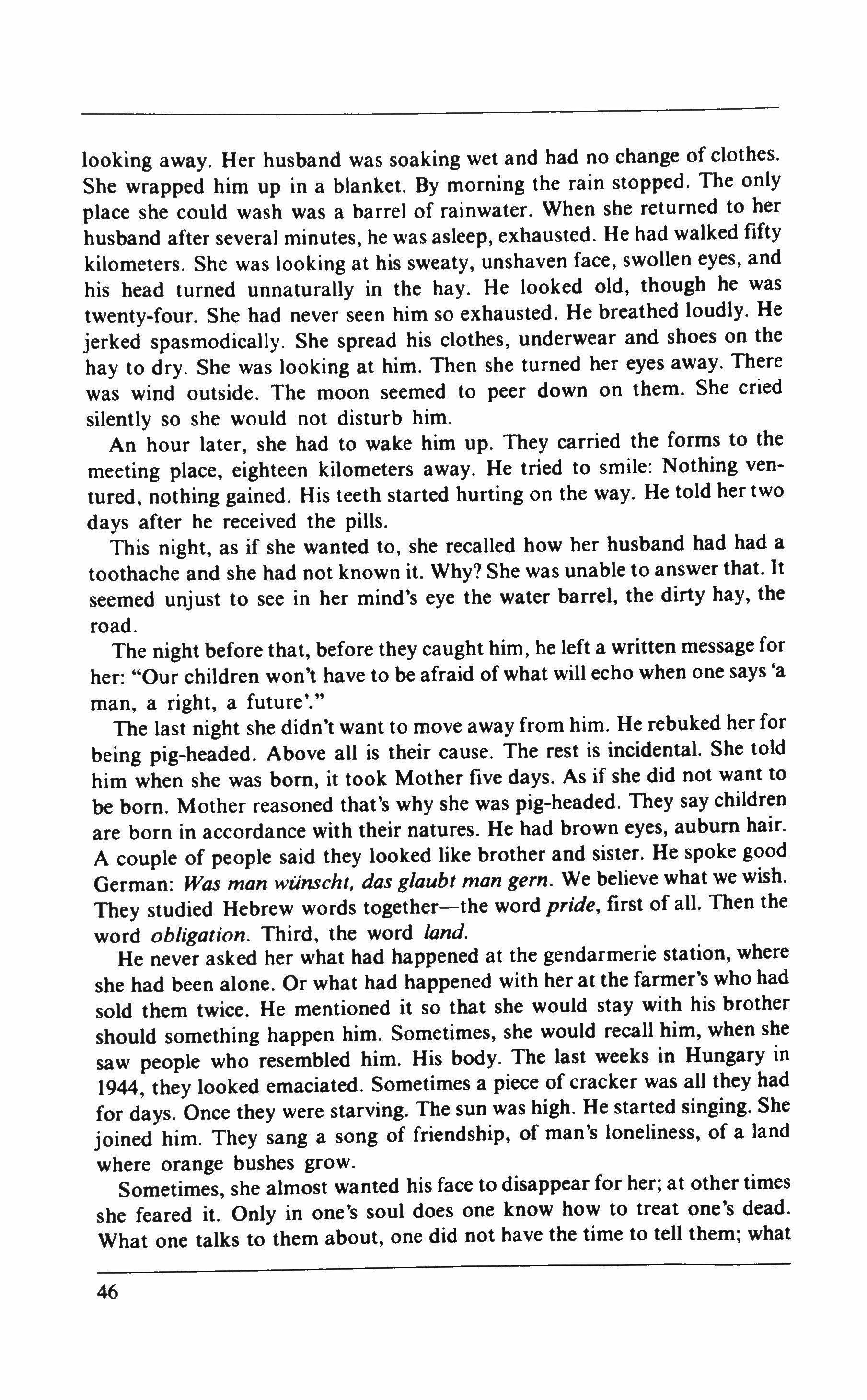
looking away. Her husband was soaking wet and had no change of clothes. She wrapped him up in a blanket. By morning the rain stopped. The only place she could wash was a barrel of rainwater. When she returned to her husband after several minutes, he was asleep, exhausted. He had walked fifty kilometers. She was looking at his sweaty, unshaven face, swollen eyes, and his head turned unnaturally in the hay. He looked old, though he was twenty-four. She had never seen him so exhausted. He breathed loudly. He jerked spasmodically. She spread his clothes, underwear and shoes on the hay to dry. She was looking at him. Then she turned her eyes away. There was wind outside. The moon seemed to peer down on them. She cried silently so she would not disturb him.
An hour later, she had to wake him up. They carried the forms to the meeting place, eighteen kilometers away. He tried to smile: Nothing ventured, nothing gained. His teeth started hurting on the way. He told her two days after he received the pills.
This night, as if she wanted to, she recalled how her husband had had a toothache and she had not known it. Why? She was unable to answer that. It seemed unjust to see in her mind's eye the water barrel, the dirty hay, the road.
The night before that, before they caught him, he left a written message for her: "Our children won't have to be afraid of what will echo when one says 'a man, a right, a future'."
The last night she didn't want to move away from him. He rebuked her for being pig-headed. Above all is their cause. The rest is incidental. She told him when she was born, it took Mother five days. As if she did not want to be born. Mother reasoned that's why she was pig-headed. They say children are born in accordance with their natures. He had brown eyes, auburn hair. A couple of people said they looked like brother and sister. He spoke good German: Was man wunscht, das glaubt man gem. We believe what we wish. They studied Hebrew words together-the word pride, first of all. Then the word obligation. Third, the word land.
He never asked her what had happened at the gendarmerie station, where she had been alone. Or what had happened with her at the farmer's who had sold them twice. He mentioned it so that she would stay with his brother should something happen him. Sometimes, she would recall him, when she saw people who resembled him. His body. The last weeks in Hungary in 1944, they looked emaciated. Sometimes a piece of cracker was all they had for days. Once they were starving. The sun was high. He started singing. She joined him. They sang a song of friendship, of man's loneliness, of a land where orange bushes grow.
Sometimes, she almost wanted his face to disappear for her; at other times she feared it. Only in one's soul does one know how to treat one's dead. What one talks to them about, one did not have the time to tell them; what

one asks, one had never asked before: what one wants to spare them. She smoothed her hair and went over her eyelids with her fingertips.
For a few seconds, she imagined that she was back at the munitions dump where yesterday she had been sent by the army. The people who came through were like her sisters and brothers. It was in Romema. Soldiers came through, and officers, people from every branch of the army. The women brought food and water to the men in the trenches three times a day and when they returned they carried back the wounded. She'd gotten to know everybody who had done anything there.
At first, she'd gotten brief notes: be there and there. The years 1945, 1946 and the beginning of this year. That was the Haganah. Finally she got her call-up papers. She was at Bank Leumi that time, too. They told her to bring clothes and underwear for three days. She was supposed to relieve a nurse. She couldn't get into the bank, and asked Saharof to help her. He broke in the door with his shoulder. Inside they were making Molotov cocktails. An elderly Bulgarian woman was cooking for the soldiers.-I don't know how to do much anymore, but I do know how to cook, she said. Bottles of blood plasma were kept in the safe. As long as the Bulgarian woman kept her mouth shut, everybody thought she was from Mexico. Or Panama. For her, everybody was some mother's baby. Her name was Sonya.
It was all like being carried along by a swift current. When had it happened? A thousand years ago? No, it was only today, yesterday, six or seven days ago, six or seven nights. A week or two. A month or two. It had all been right here, here and now.
The melody wove its way through the twilit room. The explosions echoed off the stones of the city. If either one of them would start to talk about themself, it would be as if they wanted to minimize things.
In Paris, in Paris, sind die Miidchen so schon
"You speak very well."
"Far from it."
"It never even occurred to me that you'd ever spoken anything else."
7 Danny Polnauer glanced over at the kerosene lamp. It would go out in a minute or two, he figured. He thought about the ways in which the woman there beside him was older than he was, and how he was older beside her. He looked over at the lamp again. Suddenly it seemed cowardly to wait any longer. He went over and kissed her on the lips.
She didn't say a word. He stood close beside her. He could feel her breath. It smelled of tea and wine. Her eyelashes fluttered. Her eyebrows, slightly scorched, extended into a scar.
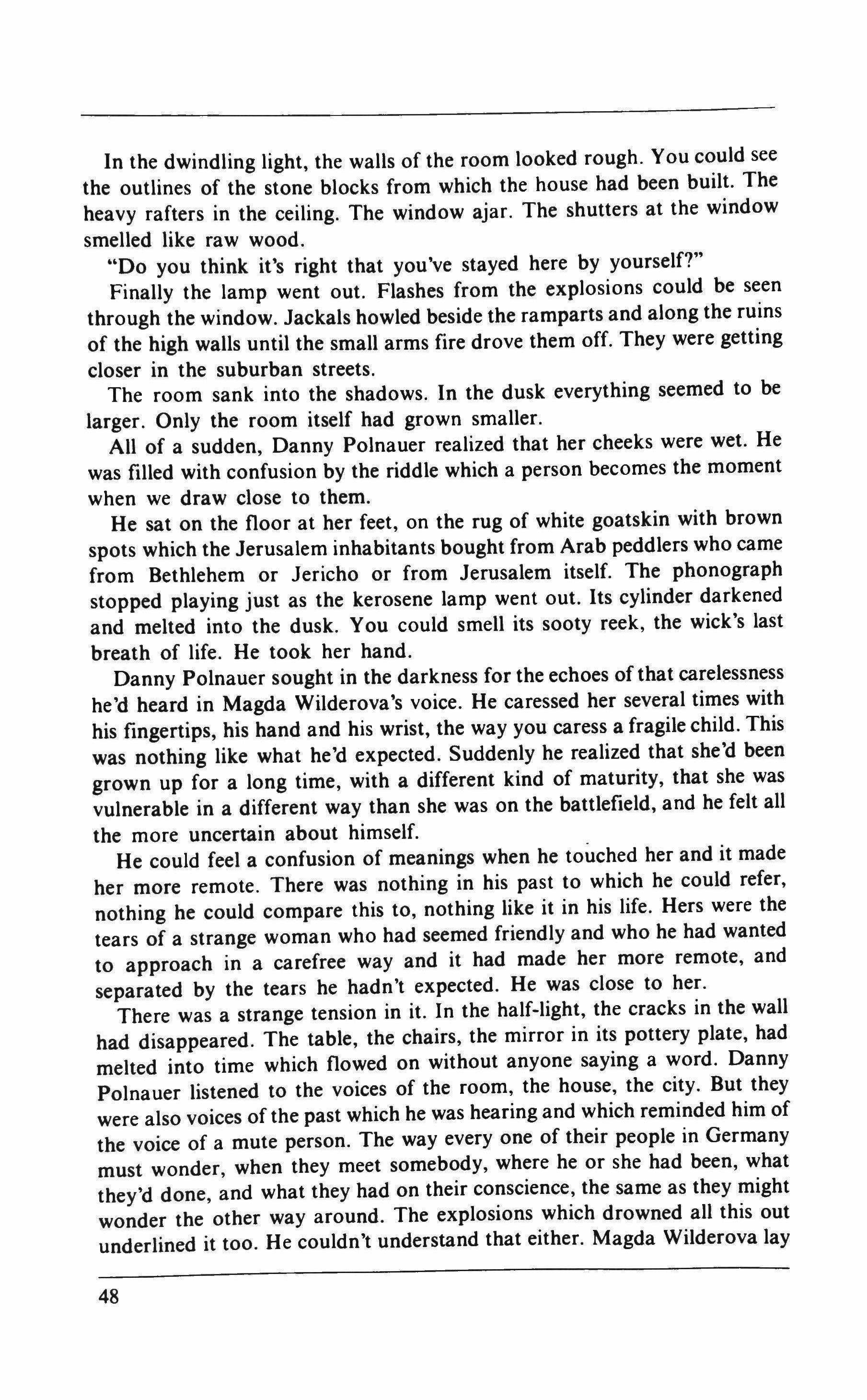
In the dwindling light, the walls of the room looked rough. You could see the outlines of the stone blocks from which the house had been built. The heavy rafters in the ceiling. The window ajar. The shutters at the window smelled like raw wood.
"Do you think it's right that you've stayed here by yourself?"
Finally the lamp went out. Flashes from the explosions could be seen through the window. Jackals howled beside the ramparts and along the ruins of the high walls until the small arms fire drove them off. They were getting closer in the suburban streets.
The room sank into the shadows. In the dusk everything seemed to be larger. Only the room itself had grown smaller.
All of a sudden, Danny Polnauer realized that her cheeks were wet. He was filled with confusion by the riddle which a person becomes the moment when we draw close to them.
He sat on the floor at her feet, on the rug of white goatskin with brown spots which the Jerusalem inhabitants bought from Arab peddlers who came from Bethlehem or Jericho or from Jerusalem itself. The phonograph stopped playing just as the kerosene lamp went out. Its cylinder darkened and melted into the dusk. You could smell its sooty reek, the wick's last breath of life. He took her hand.
Danny Polnauer sought in the darkness for the echoes of that carelessness he'd heard in Magda Wilderova's voice. He caressed her several times with his fingertips, his hand and his wrist, the way you caress a fragile child. This was nothing like what he'd expected. Suddenly he realized that she'd been grown up for a long time, with a different kind of maturity, that she was vulnerable in a different way than she was on the battlefield, and he felt all the more uncertain about himself.
He could feel a confusion of meanings when he touched her and it made her more remote. There was nothing in his past to which he could refer, nothing he could compare this to, nothing like it in his life. Hers were the tears of a strange woman who had seemed friendly and who he had wanted to approach in a carefree way and it had made her more remote, and separated by the tears he hadn't expected. He was close to her.
There was a strange tension in it. In the half-light, the cracks in the wall had disappeared. The table, the chairs, the mirror in its pottery plate, had melted into time which flowed on without anyone saying a word. Danny Polnauer listened to the voices of the room, the house, the city. But they were also voices of the past which he was hearing and which reminded him of the voice of a mute person. The way everyone of their people in Germany must wonder, when they meet somebody, where he or she had been, what they'd done, and what they had on their conscience, the same as they might wonder the other way around. The explosions which drowned all this out underlined it too. He couldn't understand that either. Magda Wilderova lay

on the bed, her eyes open and her hand that he was holding resting on the edge of the bed.
A few seconds passed. He continued to caress her. It wasn't the first time that he'd thought about what would happen if the house were hit. Each time it was five hundred against one in an hour, a thousand against one in an hour.
He was satisfied just to caress her hand. Through the window he could see striped white objects, flying shrapnel. Sometimes they resembled illuminated pursuit planes among the stars, flying in an arc toward their target. Sometimes they flew thick, as if one of them was chasing another or as if the first had called the second, the second a third, and so on, endlessly.
The house around him felt like a mountain within whose depths a cavern is concealed and inside the cavern, a secret. He could distinguish each rafter in the ceiling. One of them was sturdier than the rest. The goatskin he was sitting on was thick and soft and it smelled of roughly-worked furs. Intermittently he wondered whether the rafters might kill them, or perhaps save them.
On the opposite wall from the bed hung a picture of an old man whose hair and beard were like sheep's fleece. It had been torn off a 1947 calendar. The expression on the old man's face got lost in the dusk. The cannons tore through the silence of the night. The falling shrapnel made the earth tremble. The house was shivering. Danny Polnauer had an impression of many, many waves coming together to form a current. He didn't know how long it had lasted-seconds, minutes, hours, He had drawn close to the touch of human coldness which he had encountered differently before.
"1 know it's late now," he said.
"We're all more frightened of shame than of death," she answered.
Danny Polnauer was glad she let him caress her. And he was glad she didn't get up and light the candle, even later. He folded his legs under him and kissed both her hands. He touched the scars and burns on her hands. He felt like a cliff in the middle of a wide plain where there was almost nothing at all, and where a sound carried far. He thought about his mother. He thought of what had happened during his mother's life, the things he didn't know about and never would because mothers, besides being mothers for their sons, are women, too. The things that are secret in the lives of women without men, or the things their husbands never find out about. Suddenly he was aware of his body like a runner who is ready to run a race. The distance ahead lost itself in darkness. He was afraid to move. He tried to touch her soul like the time he'd touched her lips and, now, her hands.
Danny Polnauer could hear the voice of his heart almost like when the tracer bullets had been flying above their heads in the Latrun-Jerusalem section, when he had felt as if his days were numbered. Suddenly he was afraid this might be getting tedious for her, that she was getting bored and

tired and would tell him to leave. Or to lie down on the camp bed where Lampel had slept last Wednesday night.
Although she had not said why or how her husband had died, this suddenly represented the key to everything that touched her and it was a different key than her body, her face, her slow smile and her scars and scorched eyebrows, her army clothing, her holster belt with the pistols, her apartment, her phonograph, her friendly handshake. And something different than Jerusalem under siege, and the Arab and English cannons.
The night sounds poured across the city and into the house and into this room, and on into endlessness. One cannon was responding to another. The tension that had tightened his throat suddenly made it impossible for him to think of anything else but getting up and lying down beside Magda Wilderova. It seemed unavoidable now, like everything that had ever been important to him in his life. He wasn't thinking anymore about what's good or bad, what's cowardly or brave, beautiful or ugly. He had stopped being afraid of what would happen, as if a curtain had fallen in front of him and everything else had disappeared behind it. At least he wasn't so frightened of it anymore.
Danny Polnauer got up and lay down alongside Magda Wilderova. He had the feeling he should have done it last Wednesday night when he still didn't know anything about her, when he'd listened to only a few words she'd said, when he'd touched her only a couple of times while they were dancing, when he'd thrown away the chance that Lampel had lost too. And at the same time he had the feeling that even when he was silent, it would only be his own voice that echoed the quiet hoarseness that scratched his throat. A lot of "yes's" and a lot of "no's". Pleas and requests and assurances. The endlessness of another. The secrets which a woman shares with a man and a man shares with a woman. And the anguish and the worry that she'd throw him out or tell him not to, and that was just the same as the enormous emotion which forced him to do what he was doing.
He waited, holding his breath, to see what Magda Wilderova would do next. When she didn't do anything or say anything, he began to caress her face, her hair and her temples, and after that he began to kiss her.
He hoped she wouldn't say a word. For a moment, he lay beside her, absolutely still. Her body was supple and warm and he could feel her moving closer. He tried to be sensitive to her. He kept on caressing her. He breathed her breath.
Then he undressed her, as naturally as if he'd done it many times. Her army shirt, her skirt, the buttons and hooks, all the secrets of a woman's underwear, surrendered to his fingers, as if she had been helping him. Then he got undressed too. Although Magda Wilderova kept silent, he had a feeling that there were many words streaming toward him, her sounds and smells and senses.

He could not understand all that was going on inside them both. From a breath, a voice grew, and from the voice, a body, a brain, hands, legs, loins. The will of a woman's body, the tips of hair. The sweet breath of sweat. It was like a raindrop in the middle of a clear night which melts into the surface of a lake, penetrating the tranquil water with a gentle splash and awakening it. And then, suddenly, it begins to grow, and at the same time it drowns in silence and grows in circles that get bigger and bigger on the surface,just like the imagination of a young man as he lies beside a mature woman and his imagination grows and grows about her from the first moment he sees her. Is it a vision of beauty that exists only in his mind? And doesn't he wonder whether the woman's beauty-real or imagined-corresponds with the truth, and whether others are affected by her in the same way? Are there no whys and becauses anymore? Is it the joining of the guilt and desire, of wishing and wanting? Is it beyond the limits which a man has set for himself? Only the good, only the best is added to the woman's portrait. Courage, a sense of friendship. Devotion. The thing everybody can have, but which in reality only a few do. The vision and the need for love. For one single night. For a thousand years.
Both lay quietly, side by side. Both shared each other's noisy breathing. She didn't say, "We don't know each other yet," as women say when they don't know a man. He could hear her voice in the very silence. And he didn't ask her whether she were cold. He felt good like that, breathing so close to her.
"It's always only just once," she said, but he didn't understand, until much later.
For a brief moment, Danny Polnauer wondered if their undressing hadn't taken too long. In between the cannon firing, the town was full of the noise of cicadas. Hoots and squeaks and whistles of all kinds of insects. The darkness was soft and moist. Everything was helping him. The night had robed and veiled what he didn't want to see. It emphasized everything he wanted it to. The sky had lowered and the stars glowed like sand that had flooded out along the seacoast into the space that surrounded them.
He could feel her soft and warm breasts, her hips and arms and lips. A moment later, Danny wasn't thinking of anything anymore except that they were there together. He was very aware of her cheeks, her breasts, her belly. The way she was embracing him. It finally absorbed his desire to know everything about her, the things a man wants or needs to know about a woman and the confusion, because he knew only a fraction of it. Almost nothing. Her hands and breath were hot. Danny Polnauer's breath was hot too. She smelled of tea and wine and tears. There was a maturity in her which dissolved his fear that he would behave awkwardly in the embrace of a grown-up woman.
She whispered something to him which he couldn't understand. It was

suddenly like a pressure in which uncertainty relaxed and desire turned into a sense of fullness. And with the pressure, any scorn or embarrassment or eagerness were transformed into something very basic, like a farmer turning the earth with his plow, or a mother cutting bread to give to her children, or a father pouring them mugs of milk. Beginnings and ends. Everything had come together. Explosions, mouth, breath, the secret depths of their bodies, the way reality and hallucination combine. The wish which nothing can lessen and nothing can stop.
"It's not a pain," she said.
They were together like a woman and a man and a man and a woman, and it was as if a volcano had opened up and the lava, instead of spurting outwards, flowed inward, bitter and hot and humiliating. The touch of one, two, a thousand lives. The thing that makes a person die for a fraction of a second as if he were being born and how he is reborn as if he had died. The way loneliness is destroyed, and fear and war and danger and doubts. The way, at the same time, you gain an equilibrium that does not tell lies. Who knows? An explosion whose echoes died away slowly, the way dust that has been stirred up settles back. The hunger which can only be satisfied in the same way a famished animal finds a spring and food. Mutual prey. A gift.
The blanket smelled of soap and sand. He could feel her body, her lips and smile which she had exchanged with him. Her hair. Legs. Breasts. The door, with its steel bars and heavy nails, gleamed in the dusk. The lock resembled an iron coat of arms.
He suddenly stopped asking himself who was this Magda Wilderova and what her life had been, because simultaneously it all raised the question of who he himself had been. Yesterday? Today? Tomorrow? He was savoring his now.
"I want this to be true," she said.
"It is true," he replied.
He didn't even try to imagine where the explosions were coming from anymore, he was simply satisfied that they were far. For just a fraction of a second, he remembered the gypsies in Auschwitz-Birkenau. In the bathhouse, where gas instead of water dropped from the shower heads, they had amazed the Nazis when it had come to the end: they had all made love to each other-men and women and old people and children, brothers and sisters. They were in a hurry to finish, they had little time.
For the remainder of that second, he thought about how, during that same October of 1944, Magda Wilderova had been escorting refugees across the mountains between Hungary and Romania, behind the backs of Hitler and Horthy, bringing them here, and then he thought about the people she had nursed at the hospital in 1946 after the Haganah had accepted her. They were in a hurry too.
"I never ask anything from anyone," she said slowly.

He didn't understand it.
"Maybe it's better if it's only for once," she added. "What are you thinking about?"
About the ocean and ships and being free."
He could feel her looking at his body in the darkness. He didn't know that she was thinking to herself-all young people are beautiful. Young bodies have the freshness of a flower. But they die, just like everything else. How many of them are dead already? And their names passed through her head, one after another, together with the image of their faces and how she'd known them and what they'd experienced together, or missed experiencing, before the war or during the war or on the battlefield, from March of 1939 to the middle of 1948. So you're glad if someone is alive, at least, who has had some connection with your past life, and even perhaps with a segment of your future. She would never say this aloud to anybody and she smiled to herself. She was also thinking about how a person in wartime is capable of making sacrifices for someone else. But would she tell someone-here, take my legs or my arms in place of yours? My eyes in place of yours that have been shot out?
She smiled again in the darkness at Danny Polnauer and her smile seemed warm and yet remote. When he asked her what she was thinking about, she allowed cannon shrapnel to explode two or three times and the noise to die away before kissing him on the mouth. He could feel her sweaty body, and his. Her eyes were wet and on her lips was a smile. She was thinking about how the war had brought the two of them together and in what way.
"It's as if I've been running."
"You 're still breathing very hard."
8 "Yedid nefesh;" she told him.
"What does that mean?"
"Friend of my soul."
She smiled like women do who know the only secret of time and what "now" means-the immediate "now." "I never made much of a difference between a lover and a friend. That's probably why a lover of mine can't be anybody who isn't also my friend at the same time." Then she went on, "Nobody ever did with me what you did."
"I still don't understand everything."
"There are such a lot of things we don't understand. Myoid commanding officer in Rechaviah always used to say, 'Look at the whale, how big it is. And it's got such a narrow gullet that it can't swallow more than the smallest fish. Why? Nobody knows. That's simply the way it is."
"I wish 1 knew an appropriate fairy tale."
"Did it ever occur to you that a man's hand, when it caresses you, is strong enough to kill?"
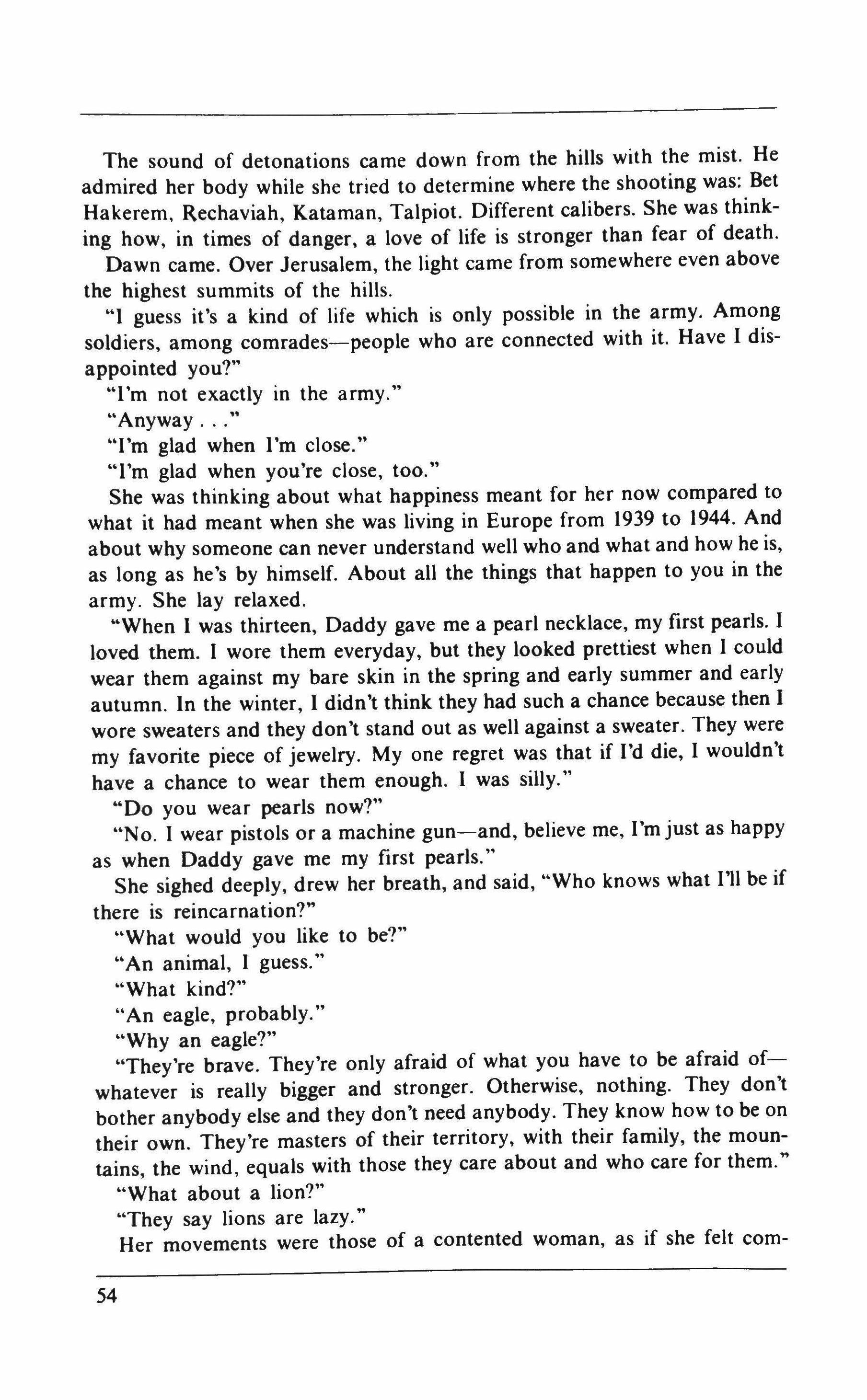
The sound of detonations came down from the hills with the mist. He admired her body while she tried to determine where the shooting was: Bet Hakerem, Rechaviah, Kataman, Talpiot. Different calibers. She was thinking how, in times of danger, a love of life is stronger than fear of death. Dawn came. Over Jerusalem, the light came from somewhere even above the highest summits of the hills.
"I guess it's a kind of life which is only possible in the army. Among soldiers, among comrades-people who are connected with it. Have I disappointed you?"
"I'm not exactly in the army."
"Anyway
"I'm glad when I'm close."
"I'm glad when you're close, too."
She was thinking about what happiness meant for her now compared to what it had meant when she was living in Europe from 1939 to 1944. And about why someone can never understand well who and what and how he is, as long as he's by himself. About all the things that happen to you in the army. She lay relaxed.
"When I was thirteen, Daddy gave me a pearl necklace, my first pearls. I loved them. I wore them everyday, but they looked prettiest when I could wear them against my bare skin in the spring and early summer and early autumn. In the winter, I didn't think they had such a chance because then I wore sweaters and they don't stand out as well against a sweater. They were my favorite piece of jewelry. My one regret was that if I'd die, I wouldn't have a chance to wear them enough. I was silly."
"Do you wear pearls now?"
"No. I wear pistols or a machine gun-and, believe me, I'm just as happy as when Daddy gave me my first pearls."
She sighed deeply, drew her breath, and said, "Who knows what 111 be if there is reincarnation?"
"What would you like to be?"
"An animal, I guess."
"What kind?"
"An eagle, probably."
"Why an eagle?"
"They're brave. They're only afraid of what you have to be afraid ofwhatever is really bigger and stronger. Otherwise, nothing. They don't bother anybody else and they don't need anybody. They know how to be on their own. They're masters of their territory, with their family, the mountains, the wind, equals with those they care about and who care for them."
"What about a lion?"
"They say lions are lazy."
Her movements were those of a contented woman, as if she felt com-
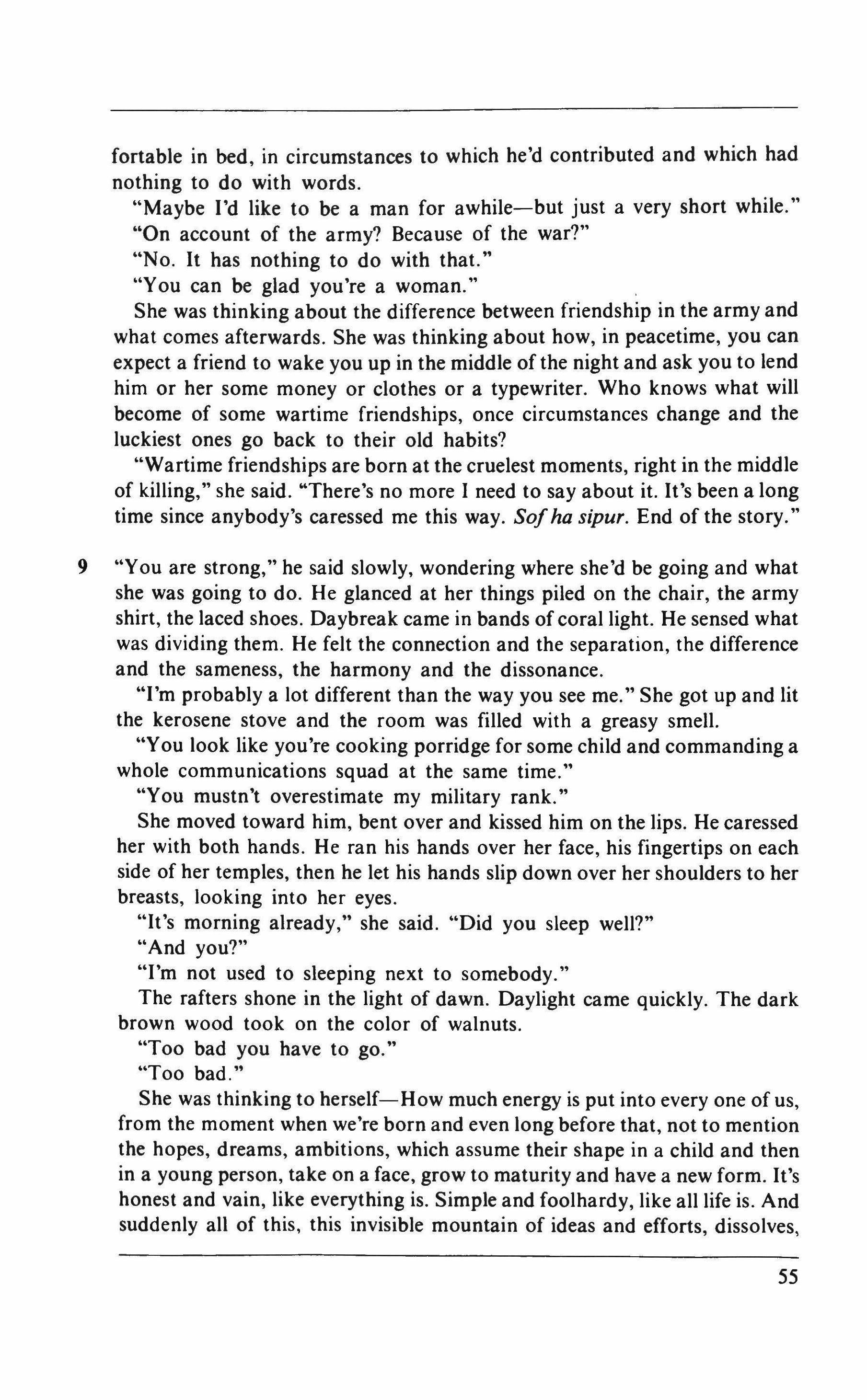
fortable in bed, in circumstances to which he'd contributed and which had nothing to do with words.
"Maybe I'd like to be a man for awhile-but just a very short while."
"On account of the army? Because of the war?"
"N o. It has nothing to do with that."
"You can be glad you're a woman."
She was thinking about the difference between friendship in the army and what comes afterwards. She was thinking about how, in peacetime, you can expect a friend to wake you up in the middle of the night and ask you to lend him or her some money or clothes or a typewriter. Who knows what will become of some wartime friendships, once circumstances change and the luckiest ones go back to their old habits?
"Wartime friendships are born at the cruelest moments, right in the middle of killing," she said. "There's no more I need to say about it. It's been a long time since anybody's caressed me this way. So!ha sipur. End of the story."
9 "You are strong," he said slowly, wondering where she'd be going and what she was going to do. He glanced at her things piled on the chair, the army shirt, the laced shoes. Daybreak came in bands of coral light. He sensed what was dividing them. He felt the connection and the separation, the difference and the sameness, the harmony and the dissonance.
"I'm probably a lot different than the way you see me." She got up and lit the kerosene stove and the room was filled with a greasy smell.
"You look like you're cooking porridge for some child and commanding a whole communications squad at the same time."
"You mustn't overestimate my military rank."
She moved toward him, bent over and kissed him on the lips. He caressed her with both hands. He ran his hands over her face, his fingertips on each side of her temples, then he let his hands slip down over her shoulders to her breasts, looking into her eyes.
"It's morning already," she said. "Did you sleep well?"
"And you?"
"I'm not used to sleeping next to somebody."
The rafters shone in the light of dawn. Daylight came quickly. The dark brown wood took on the color of walnuts.
"Too bad you have to go."
"T00 bad."
She was thinking to herself-How much energy is put into everyone of us, from the moment when we're born and even long before that, not to mention the hopes, dreams, ambitions, which assume their shape in a child and then in a young person, take on a face, grow to maturity and have a new form. It's honest and vain, like everything is. Simple and foolhardy, like all life is. And suddenly all of this, this invisible mountain of ideas and efforts, dissolves,

swifter than water flowing through our fingers. And yet we go on acting as if it's natural, as if it were a game of roulette which everybody's got to play, the way people get up in the morning and go to bed at night, go to work or to their post, the way someone is pretty and another ugly, pleasant or embittered. How many men, and the women around them, had promised themselves all the good and beautiful things they were going to have together, and then perished as fast as lightning, or else death comes for them at a snail's pace, but just as surely. And for how many of them does war mean stopping somewhere in the middle and dreaming simply of a whole and healthy arm or leg or eyes?-Ah, she thought to herself, everything is just what it is. It's always just the tip of the iceberg. It's that way with everybody.
"I've learned to live with it," she said. "To hell with life, just as long as we're healthy. It's not important. That's the way it is."
She stretched in her womanly way. She narrowed her eyes like a cat. The sun and stars looked out of them, all the things that are good and fragile and strong in a person.
Night layover everything, and it was melting into morning. Night, that had begun like falling into moss and into the resinous scent of forests. It was as if they were riding on swift, strong horses, and it took his breath away so he could hardly recover. The shadows came together, without a word to the swarms of stars, into a still, seething cauldron, as if they had separated themselves from the world and yet remained a part of it, along with the detonations. The wind, interwoven with war and night, which suddenly differentiated itself from everything else, was like in the prayer he'd learned from his mother and which Magda Wilderova had learned from her mother and father. Wind and earth which whispered like a woman or an animal.
"I don't want to be too serious, I just want you to know What's inside of me when you take my clothes off."
She looped a towel around her waist. She went over to put up the window shades. With the white towel, she looked like a Slavic or Jewish princess beside a campfire in a mountain meadow. She had strong shoulders and large, supple breasts. You could hear the morning cannon fire; you could see the plump, white horses as they grazed. The first rays of sunlight poured over her hair. There was not much in her appearance that could be called typical of her race, besides what she already had inside her. There was a naturalness about her which hadn't been there at first, or in the middle of the night, or as long as she was lying down.
Everything was in its place: the pistols, her clothes, the phonograph, the clips. She turned on the radio. After the news, they played "You'll Never Be Alone." It sounded different than the grainy, dark-toned voice of the woman who yesterday evening had been singing about the girls in Paris.
He thought about how many contradictions her body contained which yesterday had been exposed to the same dangers she would be soon con-
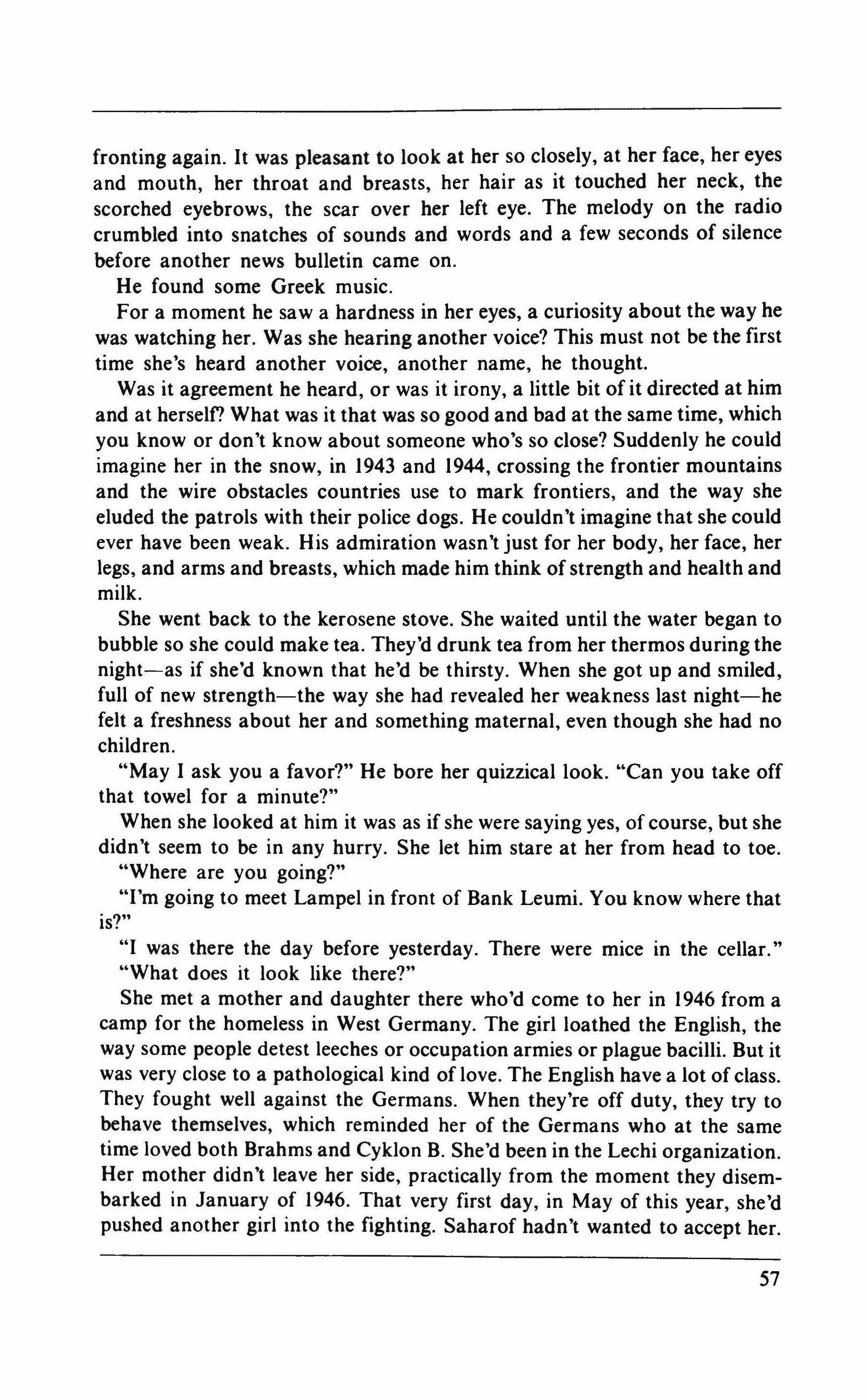
fronting again. It was pleasant to look at her so closely, at her face, her eyes and mouth, her throat and breasts, her hair as it touched her neck, the scorched eyebrows, the scar over her left eye. The melody on the radio crumbled into snatches of sounds and words and a few seconds of silence before another news bulletin came on.
He found some Greek music.
For a moment he saw a hardness in her eyes, a curiosity about the way he was watching her. Was she hearing another voice? This must not be the first time she's heard another voice, another name, he thought.
Was it agreement he heard, or was it irony, a little bit of it directed at him and at herself? What was it that was so good and bad at the same time, which you know or don't know about someone who's so close? Suddenly he could imagine her in the snow, in 1943 and 1944, crossing the frontier mountains and the wire obstacles countries use to mark frontiers, and the way she eluded the patrols with their police dogs. He couldn't imagine that she could ever have been weak. His admiration wasn't just for her body, her face, her legs, and arms and breasts, which made him think of strength and health and milk.
She went back to the kerosene stove. She waited until the water began to bubble so she could make tea. They'd drunk tea from her thermos during the night-as if she'd known that he'd be thirsty. When she got up and smiled, full of new strength-the way she had revealed her weakness last night-he felt a freshness about her and something maternal, even though she had no children.
"May 1 ask you a favor?" He bore her quizzical look. "Can you take off that towel for a minute?"
When she looked at him it was as if she were saying yes, of course, but she didn't seem to be in any hurry. She let him stare at her from head to toe.
"Where are you going?"
"I'm going to meet Lampel in front of Bank Leumi. You know where that is?"
"I was there the day before yesterday. There were mice in the cellar."
"What does it look like there?"
She met a mother and daughter there who'd come to her in 1946 from a camp for the homeless in West Germany. The girl loathed the English, the way some people detest leeches or occupation armies or plague bacilli. But it was very close to a pathological kind of love. The English have a lot of class. They fought well against the Germans. When they're off duty, they try to behave themselves, which reminded her of the Germans who at the same time loved both Brahms and Cyklon B. She'd been in the Lechi organization. Her mother didn't leave her side, practically from the moment they disembarked in January of 1946. That very first day, in May of this year, she'd pushed another girl into the fighting. Saharof hadn't wanted to accept her.
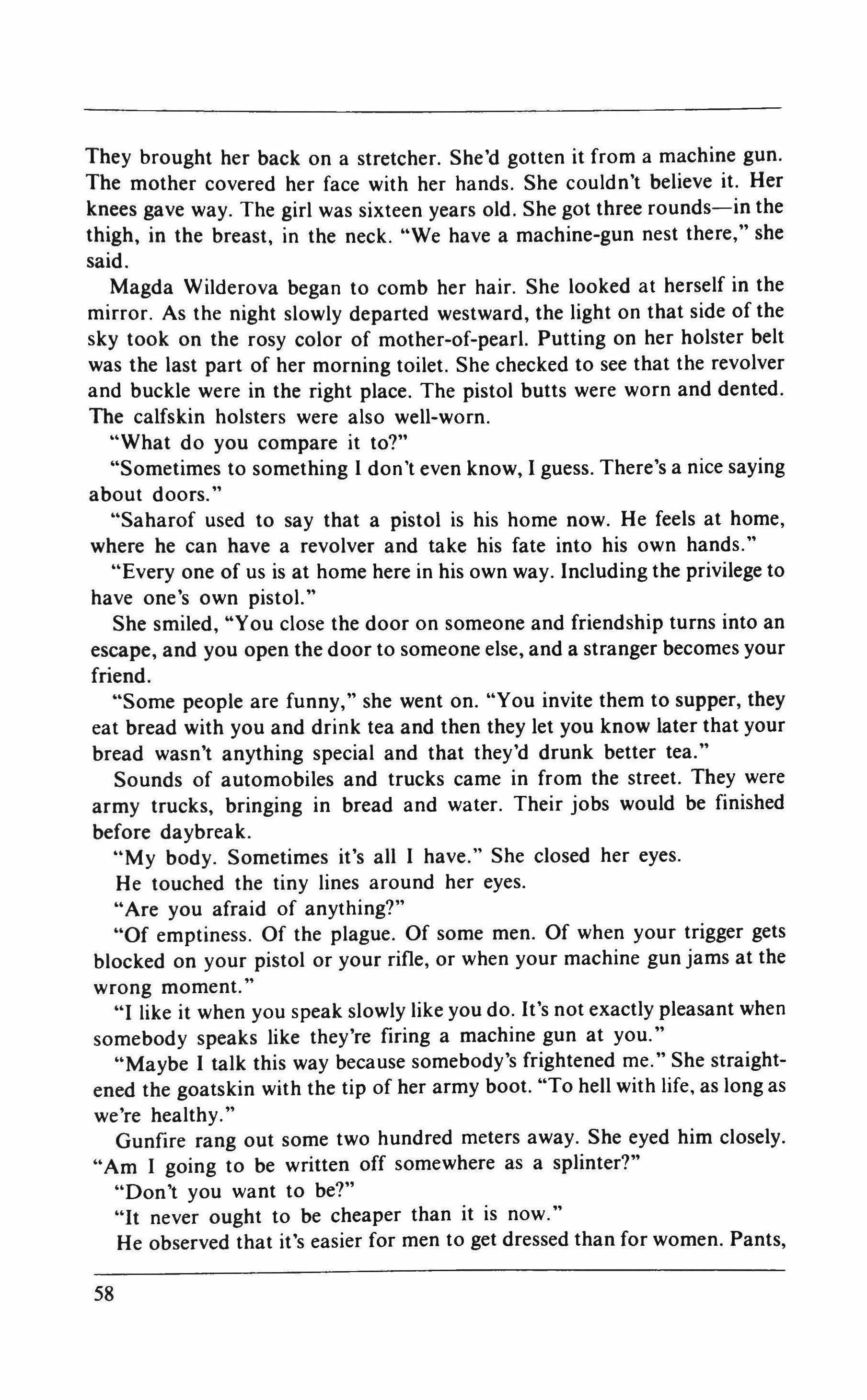
They brought her back on a stretcher. She'd gotten it from a machine gun. The mother covered her face with her hands. She couldn't believe it. Her knees gave way. The girl was sixteen years old. She got three rounds-in the thigh, in the breast, in the neck. "We have a machine-gun nest there," she said.
Magda Wilderova began to comb her hair. She looked at herself in the mirror. As the night slowly departed westward, the light on that side of the sky took on the rosy color of mother-of-pearl. Putting on her holster belt was the last part of her morning toilet. She checked to see that the revolver and buckle were in the right place. The pistol butts were worn and dented. The calfskin holsters were also well-worn.
"What do you compare it to?"
"Sometimes to something I don't even know, I guess. There's a nice saying about doors."
"Saharof used to say that a pistol is his home now. He feels at home, where he can have a revolver and take his fate into his own hands."
"Everyone of us is at home here in his own way. Including the privilege to have one's own pistol."
She smiled, "You close the door on someone and friendship turns into an escape, and you open the door to someone else, and a stranger becomes your friend.
"Some people are funny," she went on. "You invite them to supper, they eat bread with you and drink tea and then they let you know later that your bread wasn't anything special and that they'd drunk better tea."
Sounds of automobiles and trucks came in from the street. They were army trucks, bringing in bread and water. Their jobs would be finished before daybreak.
"My body. Sometimes it's all I have." She closed her eyes.
He touched the tiny lines around her eyes.
"Are you afraid of anything?"
"Of emptiness. Of the plague. Of some men. Of when your trigger gets blocked on your pistol or your rifle, or when your machine gun jams at the wrong moment."
"I like it when you speak slowly like you do. It's not exactly pleasant when somebody speaks like they're firing a machine gun at you."
"Maybe I talk this way because somebody's frightened me." She straightened the goatskin with the tip of her army boot. "To hell with life, as long as we're healthy."
Gunfire rang out some two hundred meters away. She eyed him closely Am 1 going to be written off somewhere as a splinter?"
"Don't you want to be?"
"It never ought to be cheaper than it is now."
He observed that it's easier for men to get dressed than for women. Pants,
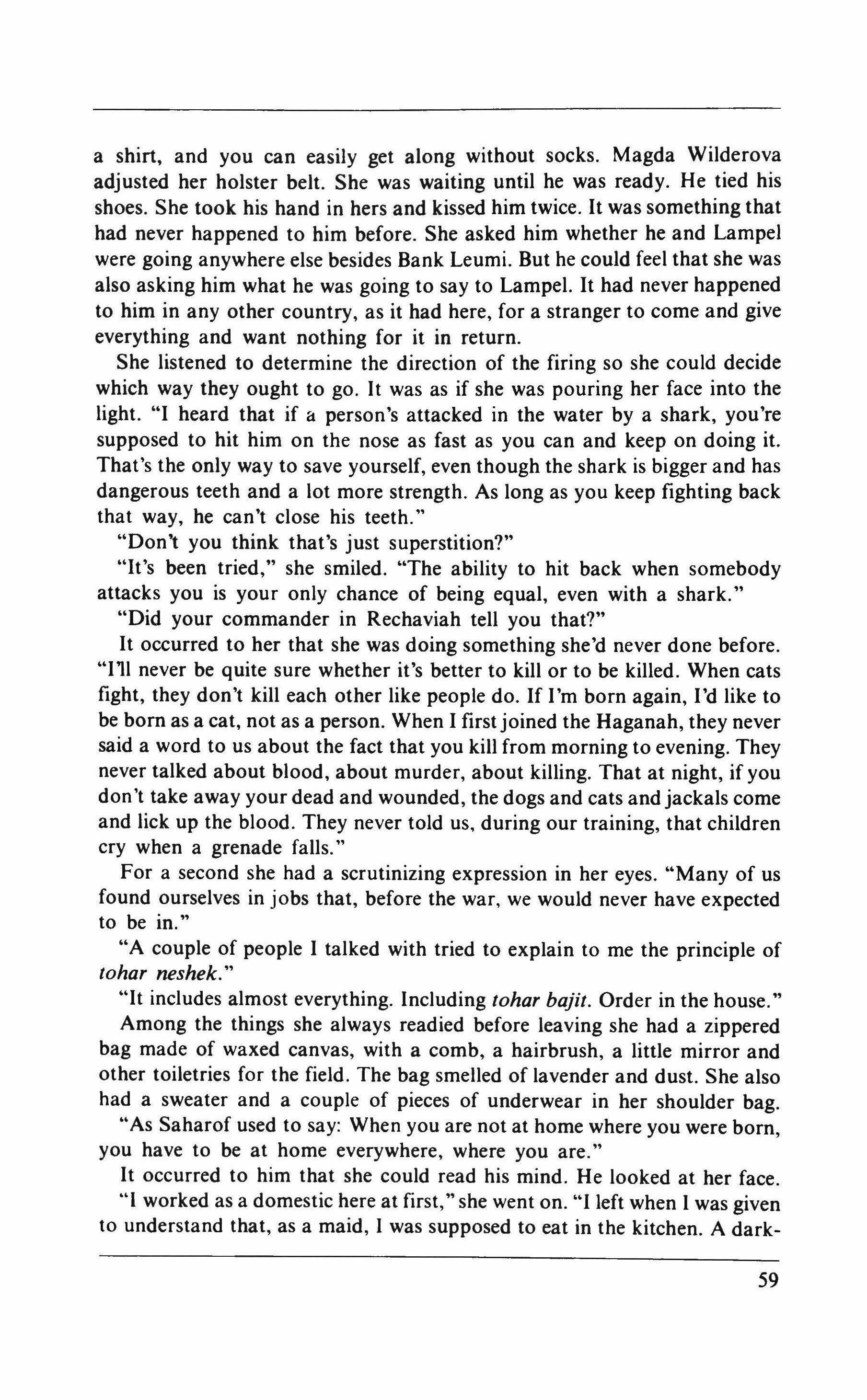
a shirt, and you can easily get along without socks. Magda Wilderova adjusted her holster belt. She was waiting until he was ready. He tied his shoes. She took his hand in hers and kissed him twice. It was something that had never happened to him before. She asked him whether he and Lampel were going anywhere else besides Bank Leumi. But he could feel that she was also asking him what he was going to say to Lampel. It had never happened to him in any other country, as it had here, for a stranger to come and give everything and want nothing for it in return.
She listened to determine the direction of the firing so she could decide which way they ought to go. It was as if she was pouring her face into the light. "I heard that if a person's attacked in the water by a shark, you're supposed to hit him on the nose as fast as you can and keep on doing it. That's the only way to save yourself, even though the shark is bigger and has dangerous teeth and a lot more strength. As long as you keep fighting back that way, he can't close his teeth."
"Don't you think that's just superstition?"
"It's been tried," she smiled. "The ability to hit back when somebody attacks you is your only chance of being equal, even with a shark."
"Did your commander in Rechaviah tell you that?"
It occurred to her that she was doing something she'd never done before. "111 never be quite sure whether it's better to kill or to be killed. When cats fight, they don't kill each other like people do. If I'm born again, I'd like to be born as a cat, not as a person. When I first joined the Haganah, they never said a word to us about the fact that you kill from morning to evening. They never talked about blood, about murder, about killing. That at night, if you don't take away your dead and wounded, the dogs and cats and jackals come and lick up the blood. They never told us, during our training, that children cry when a grenade falls."
For a second she had a scrutinizing expression in her eyes. "Many of us found ourselves in jobs that, before the war, we would never have expected to be in."
"A couple of people I talked with tried to explain to me the principle of tohar neshek:"
"It includes almost everything. Including tohar bajit. Order in the house."
Among the things she always readied before leaving she had a zippered bag made of waxed canvas, with a comb, a hairbrush, a little mirror and other toiletries for the field. The bag smelled of lavender and dust. She also had a sweater and a couple of pieces of underwear in her shoulder bag.
"As Saharof used to say: When you are not at home where you were born, you have to be at home everywhere, where you are."
It occurred to him that she could read his mind. He looked at her face.
"I worked as a domestic here at first," she went on. "I left when I was given to understand that, as a maid, I was supposed to eat in the kitchen. A dark-

skinned man invited me on a date one day. He was a Yemenite dock worker. People called after me, asking why I was going out with him. I didn't have any money then and I wasn't worried about color differences."
Like all women, she liked to comb her hair and she took her time about it, although her army hairdo didn't need much combing.
"In Syria, in Aleppo in November of 1944, we were investigated on the way by someone from the British Secret Service. From Aleppo, we travelled with a man who had escorted us all the way from Istanbul. He said that in this part of the world, people don't deface things. Flowers grew everywhere. He asked me if I'd like to pick some. I thought he was kidding. The train stopped. That was the first time I realized we were in a very different place. He picked a bouquet for me."
It seemed as if she were wrapped in music-a special kind of music. As she combed her hair, her hands, too, were surrounded by music. It was disturbed by detonations. It was in her voice, too, regardless of what she was saying.
"For some time, I've preferred the word 'we' to '1'." She looked over at him as if she were wondering how many more times she'd see him. "When I came here in 1944 from Istanbul, they put us in quarantine. That was in Atlit. They registered us according to the custom under the British Mandate. Comrades from the kibbutz picked me up there. There was poverty everywhere. Three meetings had to be called before a woman got a pillow to put under her head. It was so hot, I couldn't fall asleep until midnight. I felt an inexplicable guilt. What for? I don't exactly know. The cicadas and other insects bothered me. I woke up around four o'clock, freezing cold. Yet I was happy that I was there. Everybody kept asking, 'What can I do?' 'How can I help?' 'Where do you need me most?' But I only felt in the way sometimes. Other times I felt very much alone. On Friday, the women lit candles in the chadarochel, the common dining room, and they sang until late at night. They sang about people and trees and children. I couldn't believe it. I realized that there's more than one world somewhere."
In her mind's eye, she could see that first Friday and the kibbutz member, big as a mountain, and how he was praying. The beauty of this image penetrated, of a man who is strong and humble at the same time. It was a very short prayer.
"I still keep having dreams about the country where I never was. The dreams are detailed." She paused. "I dream I'm falling, too. But it's not in a forest. It isn't far. It's right here." It sounded as if she were reminding him that he hadn't asked her how she felt.
The sweet taste of sleep was still on his lips. He could see her underwear on a hanger inside the open wardrobe, and towels, boxes of soap, a coat made out of a U.S. Army blanket, and two pairs of army boots alongside two pairs of dress shoes. Two white silk blouses hung alongside the coat, and a black velveteen jacket with white pearl buttons, and sweaters. All of a sudden he
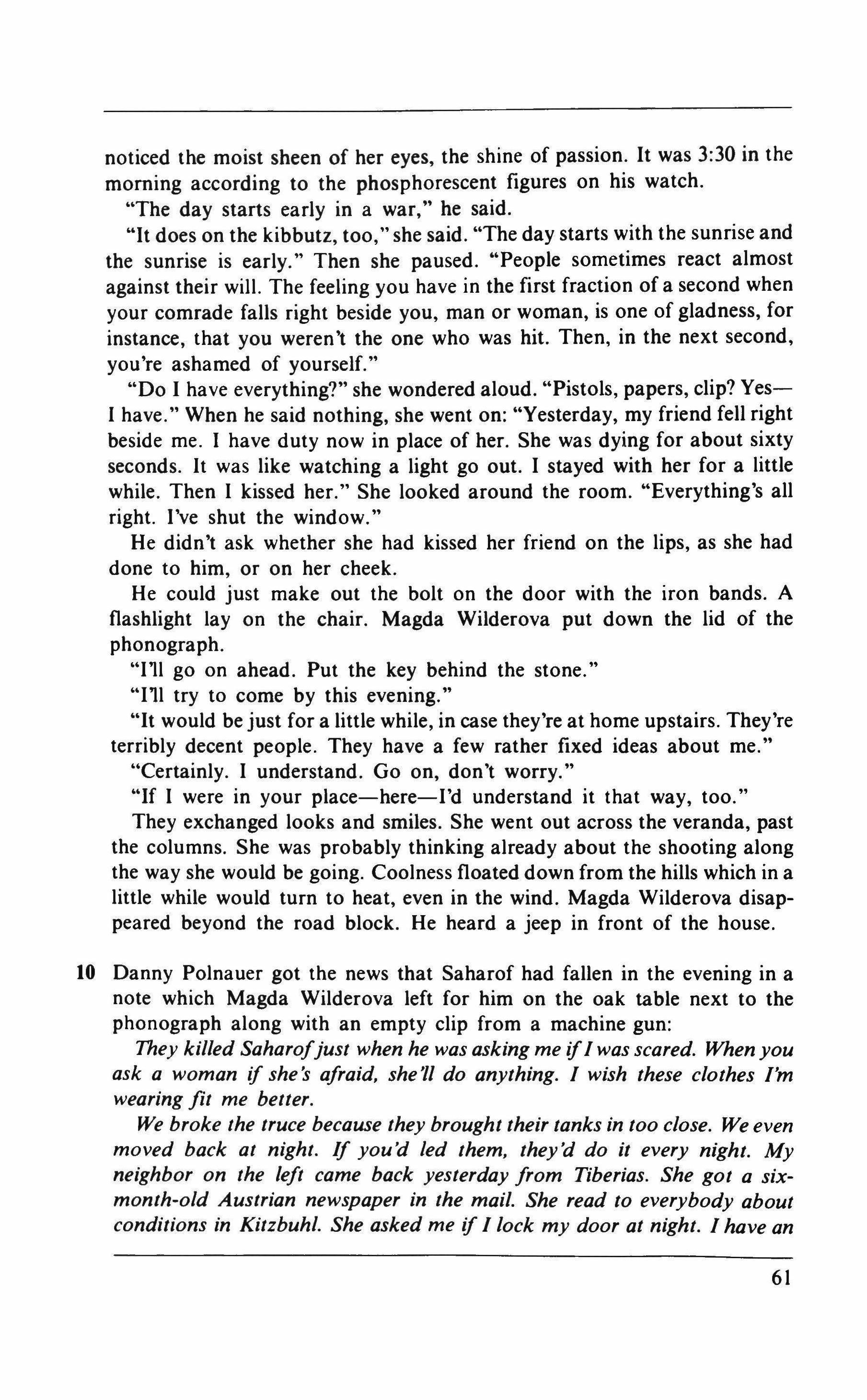
noticed the moist sheen of her eyes, the shine of passion. It was 3:30 in the morning according to the phosphorescent figures on his watch.
"The day starts early in a war," he said.
"It does on the kibbutz, too," she said. "The day starts with the sunrise and the sunrise is early." Then she paused. "People sometimes react almost against their will. The feeling you have in the first fraction of a second when your comrade falls right beside you, man or woman, is one of gladness, for instance, that you weren't the one who was hit. Then, in the next second, you're ashamed of yourself."
"Do I have everything?" she wondered aloud. "Pistols, papers, clip? YesI have." When he said nothing, she went on: "Yesterday, my friend fell right beside me. I have duty now in place of her. She was dying for about sixty seconds. It was like watching a light go out. I stayed with her for a little while. Then I kissed her." She looked around the room. "Everything's all right. I've shut the window."
He didn't ask whether she had kissed her friend on the lips, as she had done to him, or on her cheek.
He could just make out the bolt on the door with the iron bands. A flashlight lay on the chair. Magda Wilderova put down the lid of the phonograph.
"I'll go on ahead. Put the key behind the stone."
"I'll try to come by this evening."
"It would be just for a little while, in case they're at home upstairs. They're terribly decent people. They have a few rather fixed ideas about me."
"Certainly. I understand. Go on, don't worry."
"If I were in your place-here-I'd understand it that way, too."
They exchanged looks and smiles. She went out across the veranda, past the columns. She was probably thinking already about the shooting along the way she would be going. Coolness floated down from the hills which in a little while would turn to heat, even in the wind. Magda Wilderova disappeared beyond the road block. He heard a jeep in front of the house.
10 Danny Polnauer got the news that Saharof had fallen in the evening in a note which Magda Wilderova left for him on the oak table next to the phonograph along with an empty clip from a machine gun: They killed Saharofjust when he was asking me if[was scared. When you ask a woman if she s afraid, she '/I do anything. [ wish these clothes I'm wearing fit me better.
We broke the truce because they brought their tanks in too close. We even moved back at night. If you'd led them, they'd do it every night. My neighbor on the left came back yesterday from Tiberias. She got a sixmonth-old Austrian newspaper in the mail. She read to everybody about conditions in Kitzbuhl. She asked me if [lock my door at night. [have an
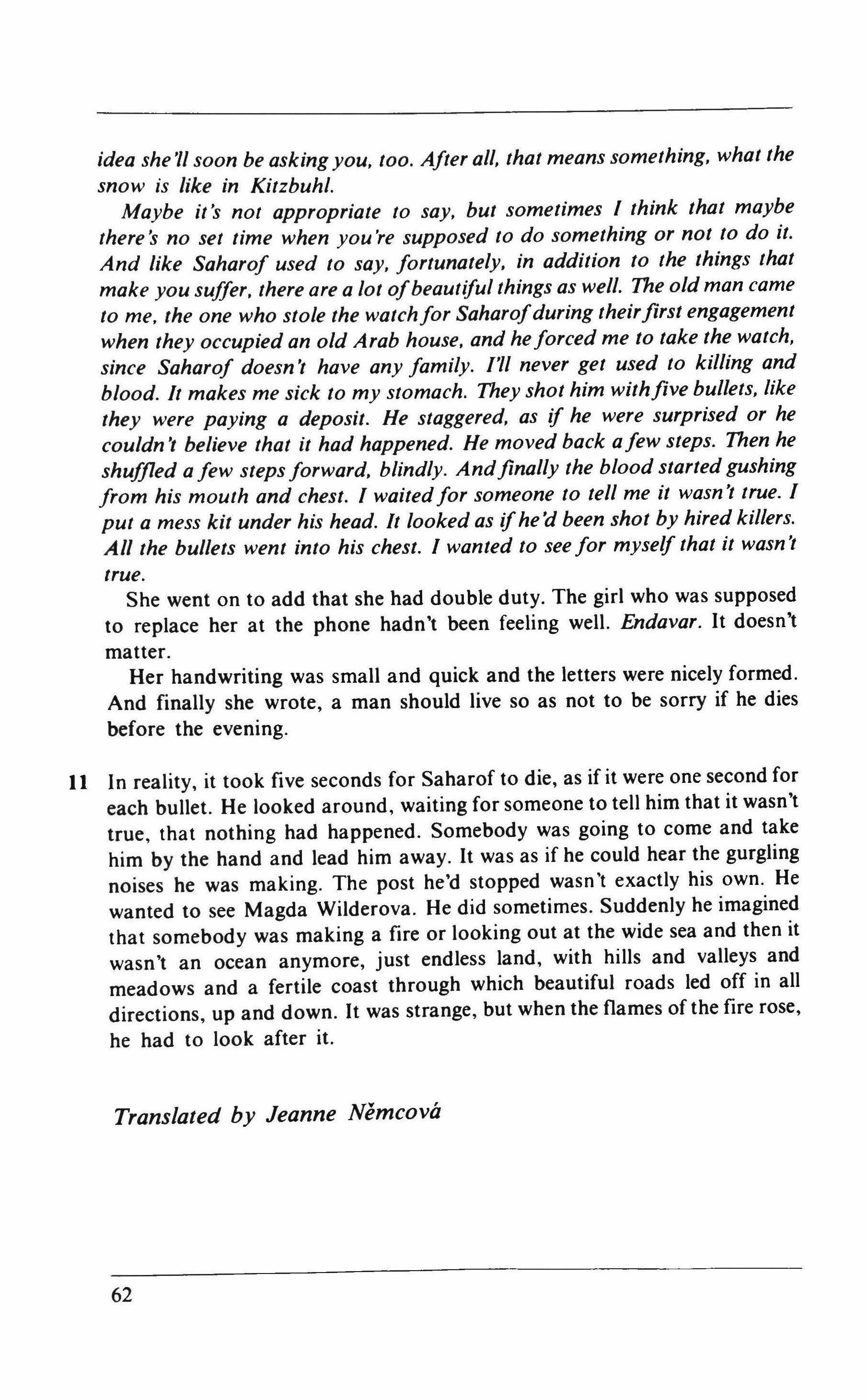
idea she'll soon be askingyou, too. After all, that means something, what the snow is like in Kitzbuhl.
Maybe it s not appropriate to say, but sometimes I think that maybe there s no set time when you're supposed to do something or not to do it. And like Saharof used 10 say, fortunately, in addition to the things that make you suffer, there are a lot ofbeautiful things as well. The old man came to me, the one who stole the watchfor Saharofduring theirfirst engagement when they occupied an old Arab house, and heforced me to take the watch, since Saharof doesn't have any family. I'll never get used to killing and blood. It makes me sick 10 my stomach. They shot him withfive bullets, like they were paying a deposit. He staggered, as if he were surprised or he couldn't believe that it had happened. He moved back a few steps. Then he shuffled a few steps forward, blindly. Andfinally the blood started gushing from his mouth and chest. I waitedfor someone to tell me it wasn't true. I put a mess kit under his head. It looked as ifhe'd been shot by hired killers. All the bullets went into his chest. I wanted to see for myself that it wasn't true.
She went on to add that she had double duty. The girl who was supposed to replace her at the phone hadn't been feeling well. Endavar. It doesn't matter.
Her handwriting was small and quick and the letters were nicely formed. And finally she wrote, a man should live so as not to be sorry if he dies before the evening.
11 In reality, it took five seconds for Saharof to die, as if it were one second for each bullet. He looked around, waiting for someone to tell him that it wasn't true, that nothing had happened. Somebody was going to come and take him by the hand and lead him away. It was as if he could hear the gurgling noises he was making. The post he'd stopped wasn't exactly his own. He wanted to see Magda Wilderova. He did sometimes. Suddenly he imagined that somebody was making a fire or looking out at the wide sea and then it wasn't an ocean anymore, just endless land, with hills and valleys and meadows and a fertile coast through which beautiful roads led off in all directions, up and down. It was strange, but when the flames of the fire rose, he had to look after it.
Translated by Jeanne Nemcova
Because he knew Coule's type. Recognized retrospectively the solid, bulldog centers of gravity of his kind, his big-bodied, full-bellied, hard-handed, heavy-hammed, iron-armed, thick-throated, barrel-chested lineman likenesses and congeners. Not overgrown, like giants, say; such men did not, or so it seemed to Mills, even possess glands, lacking not a pituitary so much as the space for one, mass not a function of secretions, of body-buried wells of the cellular juices splashed and splattered indiscriminately throughout the skeletal sluices of their frames, nothing endocrinic, hormonal, for there could have been no more room for these, or for organs either, than there was for glands, their insides pure prime meat, human steak all the way through, gristled perhaps and marbled possibly and certainly scaffolded with bone, but nothing liquid to account for size, and even their blood only for coloring, flesh tones, flush, their pee and excrement, too, merely variants of their blood's limited palette, affected by the air perhaps, the light, like exposed film. So nothing leviathan in their genes-he'd seen their parents, their brothers and sisters like the law of averages-their physical displacement a kind of decision, the ukase of their boom town wills, their realtor reality. And many were realtors, or at least landlords. It would have been difficult not to be in the Florida of the thirties, even though this wasn't Miami or even Tampa or Sarasota, Jacksonville, St. Pete, or anywhere oceaned, beached, or even particularly mild.
It was Cassadaga, and except for the fact that George knew they had come south, that he and his mother and father had changed their lives and been translated to a state called Florida (he had no memory of how they'd gotten there, probably some of the way by bus, some by hitchhiking) where his father meant to pick oranges, become a migrant worker; it could have been not Milwaukee, since Milwaukee was a city of some size and Cassadaga was barely a town, but some residential neighborhood in Milwaukee. Stucco

might never have been invented or, Florida so new, it had not yet become indigenous there, its properties undiscovered, it no more occurring to the other Easterners and Midwesterners to mix cement and sand and hydrated lime to make their homes than to build them of thatch. So the houses were wooden as the trees, the ordinary oaks and elms and maples of any Iowa or Wisconsin yard or street. And perhaps that's why he had no memory of how they'd got there (he'd seen no sea, no gulls or beach) because the landscape was the same he'd lived in all his nontropical, Tropic of Cancer life, along the bland, unrainy-seasoned peel of earth with its gray and temperate gifts.
He did not even know where the oranges would be, could be. There were no groves near Cassadaga, nothing citrus in the odor of the wind. He'd seen more fruit in Milwaukee. And no palm trees except for the one by the bench in the town's small square, its tall stem and leaves like an immense shredded umbrella.
"That's a tree?" he'd asked.
"Hell," his father said, "I don't know if it's even wood."
He pointed to its sky-high shells, shaggy, brown as bowel, clustered as cannonballs or the cabbages in produce bins. "Are the oranges inside them things?"
"If they are, you don't pick oranges, you climb them."
Because this is where they'd been dropped, the young men who'd given them the ride (it was their journey he couldn't recall, not their arrival) driving on toward Daytona Beach. "Looks nice and homey," one of them said. "You should be able to get a room here. Tomorrow you can walk the few yards to where the groves begin."
They had no luggage to speak of, only the single suitcase between them, which contained not all their clothes but all the clothes that they still had, which they had not sold along with their furniture and dishes and odds and ends in order to get a nest egg together, a stake, to make the trip. Anyway, they had all the clothes that they believed they would need in the hot new climate to which they believed they had come: socks, the three changes of boys' and men's and women's underwear, the two sets of overalls and denim workshirts, the two cotton dresses. They had not even brought handkerchiefs because they thought they had come to a place where no one ever caught cold. They had not brought anything dressy for Sundays. They were not religious and so wouldn't need anything for church. For Sundays and holidays there were the three brand-new bathing suits in the brand-new valise. The only other things in the grip were a change of sheets and pillowslips and a large box of laundry powder. They were ready to make their new life, traveling light as any three people could who had excised not only fall and winter from their lives but the very idea of temperature. And so if Cassadaga looked homey-and it did-they looked, save for the single clue of the single suitcase, already at home.

"Look here," his father said. He was standing by an immense, glassenclosed hoarding at the entrance to the square. "It's the church directory. Just look at them all. Did you ever see so many? Maybe this ain't even Florida. Maybe we bus-rided and hitchhiked all the way to Rome."
"I don't see any churches," his mother told his father. "Seems in a town tiny and churchy as this one you'd be able to spot at least one spire. Wouldn't you think so, George?"
"Maybe they have some ordinance against them. Or maybe they run the crosses up on Sundays like flags on the Fourth of July."
"Oh, George," his mother said.
"Well," his father said, "we didn't come all this way to sightsee. And tomorrow we got to look for work. I think our best bet is to find somewhere we can get a place to sleep. You tired, George?"
"Yes, sir," George said.
They walked through the little town. Mills remembered it yet. It was a paradigm of neighborhood, not a town but a constituency, not a place but a vicinity, homogenous as graveyard or forest or a field of wheat. There were no stores or gas stations, no public buildings, neither school nor library nor jailhouse-whatever of municipality or commonwealth, canton, arrondissement, deme, or nome, whatever of government itself, centripetalized in the bench in the small square. There were no churches.
"I think it must be one of these suburbs," his father said.
"What of?" said his mother.
"I don't know," his father said. "Maybe the highway."
They passed several blocks of neat frame houses, not identical but all lawned, porched, and porch-swinged. Many had gardens, some narrow driveways that led to tiny garages that looked like scaled-down versions of the houses themselves.
They walked up a side street, turned south at the corner, went down that street, and entered another side street. They turned at another corner. It was the same everywhere they walked. (He was carrying the suitcase now; it was that light.)
They came out of the town and were in open country.
"You know?" his father said.
"What?" his mother said.
"I think those houses must be the main crop around here."
"Oh, George," his mother said.
"Look for yourself," his father said. He pointed to the open country. "They must have already harvested this part."
"Oh, George," his mother said. "You tired, honey?" she asked Mills.
"A little, I guess," he said.
"Here. Give me that." She took the suitcase from him. "We better turn back, George. The kid's falling off his feet."
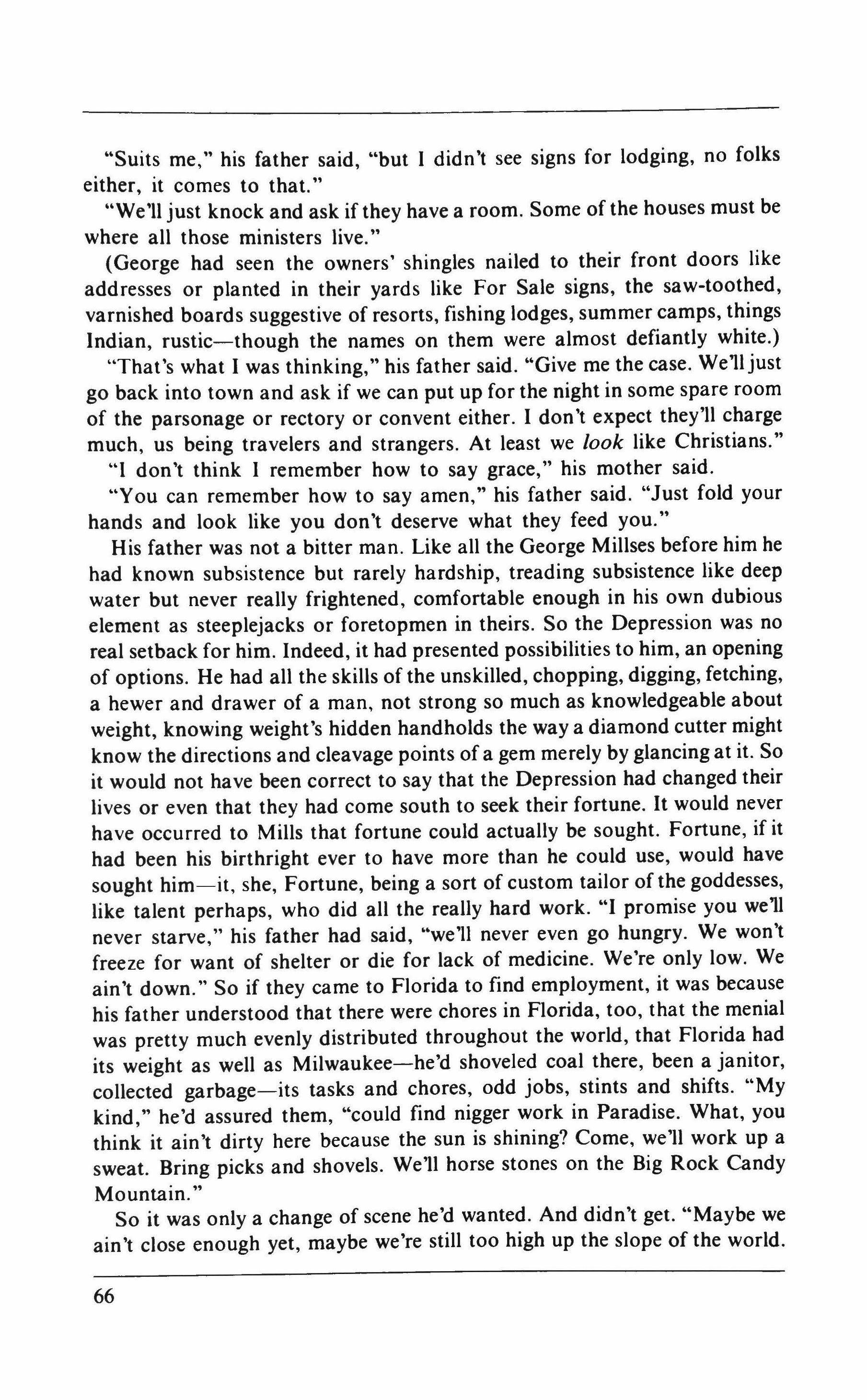
"Suits me," his father said, "but I didn't see signs for lodging, no folks either, it comes to that."
"We'll just knock and ask if they have a room. Some of the houses must be where all those ministers live."
(George had seen the owners' shingles nailed to their front doors like addresses or planted in their yards like For Sale signs, the saw-toothed, varnished boards suggestive of resorts, fishing lodges, summer camps, things Indian, rustic-though the names on them were almost defiantly white.)
"That's what I was thinking," his father said. "Give me the case. We1ljust go back into town and ask if we can put up for the night in some spare room of the parsonage or rectory or convent either. I don't expect they'll charge much, us being travelers and strangers. At least we look like Christians."
"I don't think I remember how to say grace," his mother said.
"You can remember how to say amen," his father said. "Just fold your hands and look like you don't deserve what they feed you."
His father was not a bitter man. Like all the George Millses before him he had known subsistence but rarely hardship, treading subsistence like deep water but never really frightened, comfortable enough in his own dubious element as steeplejacks or foretopmen in theirs. So the Depression was no real setback for him. Indeed, it had presented possibilities to him, an opening of options. He had all the skills of the unskilled, chopping, digging, fetching, a hewer and drawer of a man, not strong so much as knowledgeable about weight, knowing weight's hidden handholds the way a diamond cutter might know the directions and cleavage points of a gem merely by glancing at it. So it would not have been correct to say that the Depression had changed their lives or even that they had come south to seek their fortune. It would never have occurred to Mills that fortune could actually be sought. Fortune, if it had been his birthright ever to have more than he could use, would have sought him-it, she, Fortune, being a sort of custom tailor of the goddesses, like talent perhaps, who did all the really hard work. "I promise you well never starve," his father had said, "we'll never even go hungry. We won't freeze for want of shelter or die for lack of medicine. We're only low. We ain't down." So if they came to Florida to find employment, it was because his father understood that there were chores in Florida, too, that the menial was pretty much evenly distributed throughout the world, that Florida had its weight as well as Milwaukee-he'd shoveled coal there, been a janitor, collected garbage-its tasks and chores, odd jobs, stints and shifts. "My kind," he'd assured them, "could find nigger work in Paradise. What, you think it ain't dirty here because the sun is shining? Come, we'll work up a sweat. Bring picks and shovels. We11 horse stones on the Big Rock Candy Mountain."
So it was only a change of scene he'd wanted. And didn't get. "Maybe we ain't close enough yet, maybe we're still too high up the slope of the world.

Maybe we got to be where you just nudge a stone and it rolls all the way downhill to the equator. But whatever, I don't see no parrots in this neighborhood. I ain't spotted no alligators." (Because they'd been in Florida better than a day now, crossing from Dothan, Alabama, into Marianna, Florida, passing Tallahassee and Gainesville and Ocala and De Land, all of which could have been northern towns except for the souvenirs in the gas stations and grocery stores where they bought his father's cigarettes and his mother the makings, the dry cereals and packaged white breads and luncheon meats and quarts of milk, for their meals-the toy 'gators and candies in the shape of oranges and grapefruits, the rubber tomahawks and Seminole jewelry, drinking glasses with scenes of St. Petersburg, Miami, Florida's keys, and fishing tackle with deep-sea, heavy-duty line. There were suntan lotions on the drugstore shelves, cheap sunglasses on pasteboard cards. This is where his mother bought their three new swimsuits. "It stands to reason," she'd said before they'd ever left Wisconsin, "bathing trunks have to be cheaper down there." And picked out the swimsuits in the first town they came to after they crossed the state line. "Sure," his father had said, still good-humored, "maybe we should never have got George that cloth alligator while we was still up north. I think we made a mistake there. It stands to reason. A cloth, souvenir, toy-dolllizard would cost a lot less money in some grocery store near the swamps where there ain't no call for pretend alligators because there's the real thing snapping at your toes no further off than the distance of your own height.'j But still good-mooded, the absence of physical evidence that they were there still within the acceptable limits of credulity. It was only late summer. They would have to wait months yet before they would get the benefit of the hot winter weather, before they would have any reason to wonder where the snow was, where the ice. His father's mild complaint about the whereabouts of the strange birds and animals only the teasing echo of his own kid questions and alerted suspicions. He was obviously enjoying himself, the twelve-hundred-mile journey they had already come itself a vacation. He was having a good time, his temper was sweet, he was feeling fine, even the queer, stoneless, ungoverned, and, for all they knew, spare-roomless town a pleasant curiosity. His father, all of them, were happy.
Until they saw the chain gang.
It was policing the small square where the bench and palm tree were. Two guards with rifles slouched along on either side of the line of convicts as they moved across the square picking up cigarette butts, Coca-Cola bottles, the feeble litter of the lightly trafficked park. A third guard sat on the bench watching the prisoners as one might casually watch a ball game played by children, his arms embracing the back of the bench, his rifle balanced against his crotch.
It was a chain gang. They were actually chained at the legs, the chains
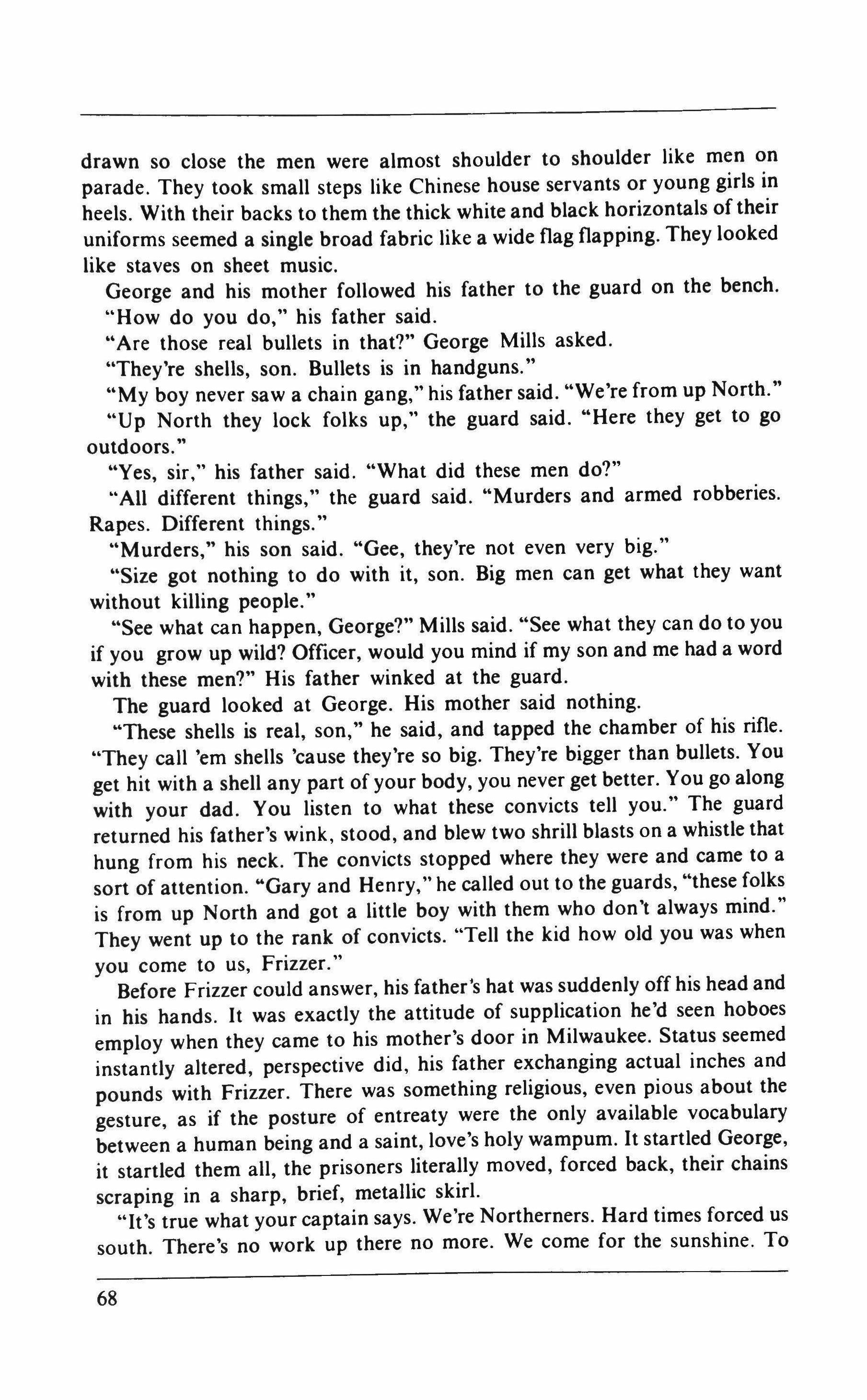
drawn so close the men were almost shoulder to shoulder like men on parade. They took small steps like Chinese house servants or young girls in heels. With their backs to them the thick white and black horizontals of their uniforms seemed a single broad fabric like a wide flag flapping. They looked like staves on sheet music.
George and his mother followed his father to the guard on the bench.
"How do you do," his father said.
"Are those real bullets in that?" George Mills asked.
"They're shells, son. Bullets is in handguns."
"My boy never saw a chain gang," his father said. "We're from up North."
"Up North they lock folks up," the guard said. "Here they get to go outdoors.
"Yes, sir," his father said. "What did these men do?"
"All different things," the guard said. "Murders and armed robberies. Rapes. Different things."
"Murders," his son said. "Gee, they're not even very big."
"Size got nothing to do with it, son. Big men can get what they want without killing people."
"See what can happen, George?" Mills said. "See what they can do to you if you grow up wild? Officer, would you mind if my son and me had a word with these men?" His father winked at the guard.
The guard looked at George. His mother said nothing.
"These shells is real, son," he said, and tapped the chamber of his rifle.
"They cal1 'em shells 'cause they're so big. They're bigger than bullets. You get hit with a shell any part of your body, you never get better. You go along with your dad. You listen to what these convicts tell you." The guard returned his father's wink, stood, and blew two shrill blasts on a whistle that hung from his neck. The convicts stopped where they were and came to a sort of attention. "Gary and Henry," he cal1ed out to the guards, "these folks is from up North and got a little boy with them who don't always mind." They went up to the rank of convicts. "Tell the kid how old you was when you come to us, Frizzer."
Before Frizzer could answer, his father's hat was suddenly off his head and in his hands. It was exactly the attitude of supplication he'd seen hoboes employ when they came to his mother's door in Milwaukee. Status seemed instantly altered, perspective did, his father exchanging actual inches and pounds with Frizzer. There was something religious, even pious about the gesture, as if the posture of entreaty were the only available vocabulary between a human being and a saint, love's holy wampum. It startled George, it startled them all, the prisoners literally moved, forced back, their chains scraping in a sharp, brief, metallic skirl.
"It's true what your captain says. We're Northerners. Hard times forced us south. There's no work up there no more. We come for the sunshine. To

catch fish from the water. My boy ain't had no nourishment in two days. His rna is pregnant. If you got you some candy, the sugar in gum If you could let them drink off the last sweetness in them soda bottles you picked up from the ground. If you could-"
"Wait a minute, hey," the guard said who had told them about the shells.
"If you saved you something from your lunch-"
"Hold on here. What-"
"My boy ain't had nothing in his mouth these two days, my wife been hungry three. Flowers we eat, the crusts from peanut butter and jelly sandwiches from other folks' picnics in the public parks."
"Now just a golden goddamn min-"
"I guess I don't need this fruit," the convict Frizzer said, and produced an orange from where it had been stored in his blouse.
"Me neither," said another con and handed over a second orange, placing it beside Frizzer's in his father's upturned hat.
"I ain't hungry," said a third man, handing his orange to the boy.
"What the hell!" the guard shouted.
"Thank you," his father said. "God bless you. God bless you, men. God bless you, Cap'n," his father said, and hurried his wife and son from the square. They disappeared up a street.
"But we all had sandwiches and milk two hours ago," George said.
"Son of a bitch," his father said. "Son of a bitch!" He was furious, his size restored, not magnified, compact as a middleweight, coiled, latent with force and uppercut, like the clever laborer he was who took weight's measure, gravity'S marksman.
"What is it? What's wrong?" his mother said.
"Working conditions!" his father said. "The competition!" He turned and as hard as he could, threw the two oranges he still carried back in the direction of the square. "The way they organize the labor around here! Evidently they got to arrest and chain you before they let you work in their parks or pick their oranges. Apparently you first got to kill a man, then armrob and rape him before they let you into their union! We might as well stay and get a good night's rest before we start back home in the morning."
It was getting on towards dusk. There were cars parked in the street now, two and sometimes three cars in each of the driveways, giving the town or neighborhood or whatever it was a vaguely prosperous look.
"Look at 'em," his father said, pointing to the houses, which had now turned on their porch lights, "they're blind pigs. Or cathouses. This must be where they apprentice their workers. What's that piano music?"
"Organ," his wife said. "They're churches, George."
When he was calmer, he jabbed the doorbell of the first car-less, unlighted house they came to.
"Reverend?" his father said to the large, powerfully built man who opened

the door for them, the hearty, gland- and even organ-less type George would remember all his life, though he didn't know this yet and saw only a big old man who looked even bigger in the dark, loose-flowing robe he wore like a dress, only not like a dress any woman would wear, and suddenly recalled the prisoners' strange garb. Thinking, "So it isn't the land or trees or animals or even the houses that's weird down here, it's the clothes." Thinking, "There ain't nothing in Mama's suitcase like anything they wear in Florida. Mama packed all wrong." "Reverend," his father said again. "Joe sent me, Reverend. My wife figured you might have a spare room, but I figure it's more like a back room, so you can bring me and her a couple of beers and the boy a Coca-Cola."
"Y ou can set that suitcase down," the big man said. George had never heard a voice like it. Vocal cords could not have produced such clear, resonant sound, only hard, unflexed, lenient muscle. "Your boy's tired."
"We're all tired, Reverend," his father said. "Or ought I be calling you foreman?"
"Foreman?"
"Well, it's just that we've seen your work detail or day shift or whatever you call those chained, shotgun-trained fellows down by the square, and I just figured that the bosses would have to have somewhere to sleep nights, too. Where they could rest their bodies and rifles and jackboots. Why, it would be awful hard fitting all those gun-toting foremen and overseers on just that one bitty bench. Ain't this the hotel?"
The man seemed bewildered. He turned to George. "Where have you come from?"
"Milwaukee," George said.
"Was it your brother or sister you lost?" George looked to his father for help.
"Hey, you," his father said.
"Which was it, Mother," the big man asked, "your son or your daughter?"
"I miscarried some years ago," his mother said. "A little girl." Her eyes were red.
"Had you named her yet? They're easier to locate if they had a name."
"She was born dead," his mother said angrily.
"Of course," the man said, "but often a name's been picked out. Even if there were only one or two you were merely favoring. Were you going to call the child after a relative? Were you thinking of giving her your name?"
"Come on, Nancy," George Mills said uneasily. "We've made some mistake."
"Nancy," the man said sweetly. "She'd have been Nancy."
"Let's go." He picked up the suitcase and turned to leave.
"I preferred Janet," his mother said softly. "Yes," he said. "Janet's a fine name."

"Let's go," Mills said, "let's just go." But his wife was weeping now, his son had begun to sob. "Ah, for Christ's sake," his father said, setting the suitcase down again.
He was not crying for the stillborn sister whom he had seen only briefly in a blur of swaddling and whose name he had just heard for the first time, and not for his mother whose grief seemed to trigger his own, nor even for his suddenly confused, uncomfortable father. He wept as children in fairy tales did. It wasn't even grief. It was fear. How could he ever have supposed that there was no difference between where they were and where they had come from? They were lost, all of them. They were lost. They were missing persons.
He had little moral imagination. His sense of evil was circumscribed by his ideas about the wicked, what they could do to you, the harm in villains. Only the monstrous and disfigured. Not murderers and holdup men but murderers and holdup men hobbled and joined at the ankles-some chain reaction of the irrational. Even their uniforms-the guards' as well as the convicts'-suggesting action in multiples, armies of bad men, familied, for all he knew actually blooded. (This would have been in the days of the Dillingers and Baby Face Nelsons and Capones and others, gangs, clans, tribes, confederated in wickedness and villainy like the red savages he read about in books.) The town, the community itself, presented just such a face to him, its east-west axes like its north-south ones, the configuration of each block like that of its neighbor. All the churches-he knew they were churches now-advertised on the glass-encased hoarding and reverends-he knew there were reverends here, men and women like the dark-robed fellow who spoke of his dead sister, the two-year-buried little girl-in all the rectories, vicarages, and parsonages like the one they stood in.
"I said, let's go," his father said. "I said, let's get out of here."
"Before I've shown you your daughter?" the big man said. "Before I've brought her back to speak to you?"
His father was holding the door open. "George," he said, "Nancy."
"Can't we just see her first, George?" his wife said.
"Can we?" his son asked. He had an idea that she was somewhere in the house, the old man keeping her for them like shoes brought in for repair.
"Go on," the man told them gently. "I'm sorry," he said to his father. "It's near dark. If you leave now, you can walk back to the highway while there's still some light."
"How do you know one of those cars parked outside isn't mine?"
"You have no automobile."
"Sure we do. It's parked a few houses down."
"You have no machine," the old man said.
"You hear that, Nancy?" his father said shrewdly. "That's the man you

were going to let show you the child we lost. An old woman who ain't got nothing better to do than spy on folks from back of curtains."
"If you had an auto, you'd have locked that suitcase in it."
"Before 1 found out whether you had any spare rooms? All right, Reverend," his father relented, "I guess you got me there. There's no car. But here's where 1 got you. We ain't got no money for no medicine show. We've put a little by for milk and bread and a buck or so for a clean kip once in a while till we get settled, but we failed to set anything aside for apparitions or haunt house card tricks, so unless you work free like them orange picker murderers, you might just as well lift the charm or spell off Nancy and the kid and let us all get going."
"A dollar?" the man said.
"Sure," his father said, "if you'll act like a landlord and keep the tables from rapping so we can get some sleep. If the Ouija boards are put away and the sheets are fresh. 111 give you a dollar. What do you say, old Merlin?"
"Stay the night. 1 won't charge you."
"Here's your buck," his father said.
"I won't charge you."
"You ain't my uncle," his father said, pressing money into the man's hand.
"I invited you," he said.
"And I'm obliged for the invitation," his father said, "but near as I can tell you're just some working stiff like me and George here will be someday if we can onlyjust get him the proper sleep every so often. Don't worry about the money. You'd have taken that and more, too, I guess, if only we'd looked into that crystal ball of yours."
"You think I'm a fake," the big man said, slipping the dollar his father had given him into a pocket in his robe.
"Well," his father said mildly, "at least a rotten businessman. I see lots more cars parked in front of them other congregations."
The big man made their bed up for them in what they did not know yet was the master bedroom. Then he went downstairs to his dimly lighted parlor, waiting, they supposed, for someone else to come to his door. Later, George Mills heard his heavy step on the stairs when he came up again to fix a cot and sleep in the small extra bedroom down the hall.
In fact, the loose, dark robe was a sort of dressing gown, not Wickland's working clothes at all. These, like those of most of the psychics, parapsychologists, clairvoyants and occultists in Cassadaga, were ordinary business suits, the customary browns and grays and faintly baggy wool garments of traveling salesmen or reporters, say-vested, fobbed, long and thickly flied. He was given to brightly colored sleeve garters. Otherwise, his clothing was sober, the color of fedoras or suits in snapshots. Nor was there much in the way of paraphernalia about the house, little of the gear George or his parents

might have expected. Though they were to see this stuff, too, plenty of it, during their long sojourn in the queer town, George, before Wickland found other uses for him, a sort of errand boy, as the only kid in town a community asset, his services on call, available to everyone, all of them, like the Fire Department they did not have or the doctor they did not need.
Meanwhile, his father found work, underbidding the prison officials for the contract on the town's small square and streets. He did other things, too, of course: driving one or another of their cars the fifteen miles into De Land each day-where the circus had its winter quarters-to pick up their mail at the PO boxes they rented there; mailing the parcels and pamphlets they sent out, the letters and phonograph records with their special messages from the dead, to almost all of the forty-eight states. And working in the darkrooms, taught to develop the blurred photographs he was told were auras, bringing out the burning images of spirit photography in sharp detail so that he became almost a technician, driving with their copy all the way to the Orlando printers and, after a while, choosing the stock, selecting the font, sometimes even suggesting the layouts, the color of the boards-a sort of agent ombudsman who dickered with the printers about the proper discount when mistakes were made, the proofreading off or the bundles mismanaged. And constable, too, not a lawman, having no powers of arrest, of course, but a kind of agent for the town, too, like a volunteer in a tourist booth, only there was no booth either, of course, but actually wearing a badge with a four-digit number on it-this, the number, clearly embossed, like a code stamped on a tin can, and a legend around it like a nimbus. And from time to time getting actually physical, servicing the town the way a bouncer might vigilante a bar or roadhouse, though these occasions were rare, the griefstricken and mentally ill being by and large a docile lot, wonderful folks to do business with.
In less than three months the spiritualists-though to use the term was to paint with too broad a brush, there being as much difference between a clairvoyant and clairaudient as there was between a Holy Roller and a bishop-wondered how they had ever gotten along without him. Bill J. Pierce, a spirit photographer who'd been photographing auras for over fifty years, said Mills had been sent to them. He made enough to pay Wickland for their room and board. He made more, in fact, than he had ever made in his life and was actually able to bank a part of his earnings. He forgot all about orange picking as soon as he returned the next day to the hoarding at the entrance to the small square, studying the board, reading the rubrics he had at first only glanced at, assuming it to be the town's directory of churches, knowing only now where he was, what the fine sounding titles, the "Drs." and "Reverends" and "Professors" with their long tail of high-toned initials, really meant. It was not no man's land but one of those places like Hollywood or

Broadway, or Reno, say, or somewhere offshore, beyond what was still the twelve-mile limit, where gambling ships dropped anchor and the high rollers had to take into account not just ordinary house odds but the pitch and yaw of the salon, too. It was a district, as Covent Garden was a district, as the Reeperbahn was, or Coney Island, given over to a single-minded commerce not with no real reason for it but no real reason for it there, or none that anyone understood, not even Pierce, the aura photographer of fifty years. It was evidently famous-Mills checked off the license plates; more were from out of state than from Florida-as something is famous only after you discover you have a need for it, as if you've taken up tennis or golf and find out that there are magazines that advertise not only rackets and clubs, but devices for restringing rackets, bulk catgut like balls of twine, tees specially designed to stand straight in sandy earth.
So Cassadaga was famous. At least twenty pages of Hartmann s Directory of Psychic Science and Spiritualism were given over to its closely printed ads. It was famous for its occult hardware, the arcane merchandise that Mills toted into the De Land post office-tiny, heart-shaped planchettes and Ouija boards like odd altars or artists' palettes, pocket breath controllers, charts of auras, the rich colors painted on linen and attached to rollers like window shades, Aurospecs, seance trumpets, gazing crystals, spirit restraints, prisms, joss sticks, tarot cards, exorcism salts, sheet music, lullabies for the infant dead, marches for soldiers fallen in battle, witch waltzes. There were dictionaries of magic words, Seals of Solomon, left- and right-handed palms, telekinetic dice, outdoor seance furniture, occult recipes, three-dimensional models of the human soul, wands and charms, bells, books, candles-all sorcery's fee-faw-fum, all Belief's hocus-pocus-dominocus.
And this just a sideline, though he didn't know that yet, though his son found out first and even tried to tell him about it, to warn the father not to be taken in when he sometimes boasted that for the first time in a thousand years the Millses had risen above their station and gotten into crime, escaping, if only briefly and if only through the odd historical accident of the Depression, that old curse on all fallen men that they must labor by the sweat of their brow and the clench of their muscles just to eke out a measly subsistence, which had to be pledged daily, renewed daily, like prayer or exercise.
"What do you mean, a thousand years?" George asked.
"What do I mean? A thousand years. It's a figure of speech."
"We've been poor a thousand years?"
"Did I say that? We're with the crooks now, that's all. This is the age of busted law, sonny boy. We're on the side of the corrupt for once. Watch our smoke."
"But we're not. They're not."
"Not much."
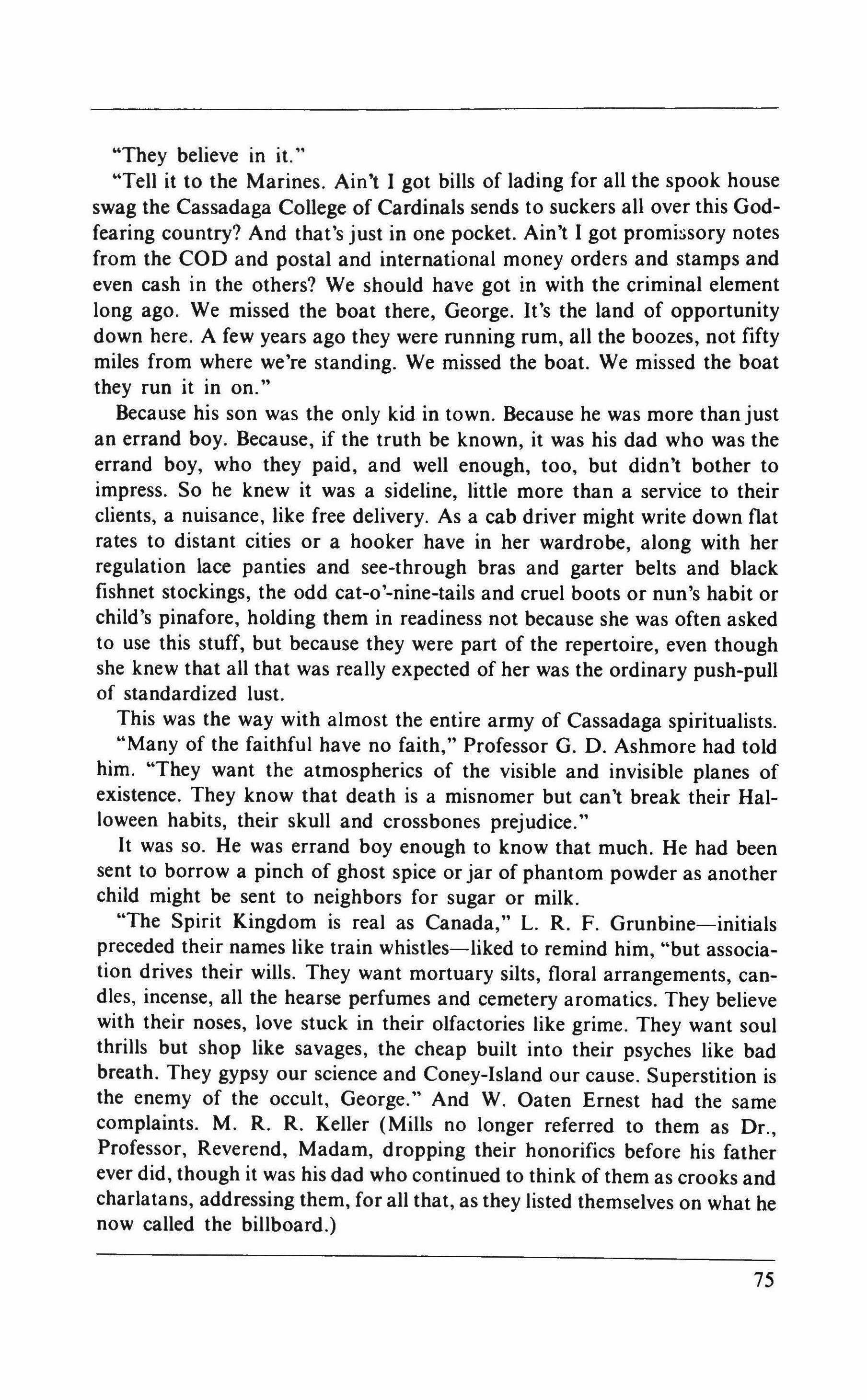
"They believe in it."
"Tell it to the Marines. Ain't I got bills of lading for all the spook house swag the Cassadaga College of Cardinals sends to suckers all over this Godfearing country? And that's just in one pocket. Ain't I got promissory notes from the COD and postal and international money orders and stamps and even cash in the others? We should have got in with the criminal element long ago. We missed the boat there, George. It's the land of opportunity down here. A few years ago they were running rum, all the boozes, not fifty miles from where we're standing. We missed the boat. We missed the boat they run it in on."
Because his son was the only kid in town. Because he was more than just an errand boy. Because, if the truth be known, it was his dad who was the errand boy, who they paid, and well enough, too, but didn't bother to impress. So he knew it was a sideline, little more than a service to their clients, a nuisance, like free delivery. As a cab driver might write down flat rates to distant cities or a hooker have in her wardrobe, along with her regulation lace panties and see-through bras and garter belts and black fishnet stockings, the odd cat-o'-nine-tails and cruel boots or nun's habit or child's pinafore, holding them in readiness not because she was often asked to use this stuff, but because they were part of the repertoire, even though she knew that all that was really expected of her was the ordinary push-pull of standardized lust.
This was the way with almost the entire army of Cassadaga spiritualists.
"Many of the faithful have no faith," Professor G. D. Ashmore had told him. "They want the atmospherics of the visible and invisible planes of existence. They know that death is a misnomer but can't break their Halloween habits, their skull and crossbones prejudice."
It was so. He was errand boy enough to know that much. He had been sent to borrow a pinch of ghost spice or jar of phantom powder as another child might be sent to neighbors for sugar or milk.
"The Spirit Kingdom is real as Canada," L. R. F. Grunbine-initials preceded their names like train whistles-liked to remind him, "but association drives their wills. They want mortuary silts, floral arrangements, candles, incense, all the hearse perfumes and cemetery aromatics. They believe with their noses, love stuck in their olfactories like grime. They want soul thrills but shop like savages, the cheap built into their psyches like bad breath. They gypsy our science and Coney-Island our cause. Superstition is the enemy of the occult, George." And W. Oaten Ernest had the same complaints. M. R. R. Keller (Mills no longer referred to them as Dr., Professor, Reverend, Madam, dropping their honorifics before his father ever did, though it was his dad who continued to think of them as crooks and charlatans, addressing them, for all that, as they listed themselves on what he now called the billboard.)

Only Wickland was Reverend still.
Of all the mystics, psychics, theosophists, astrologers, telepaths, palm readers, metapsychologists, diviners, fortune tellers, alchemists, necrophysicists, crystal gazers, and figure flingers in Cassadaga, only Wickland was Reverend. Nor did George believe any more in Wickland's bona fides than he did in the spiritual and scientific ordainments of Cassadaga's other metaphysicians. It was a simple matter of distancing.
The town's only child, nephew and grandson to all, he was in on their secrets, the tricks of their trade. Lessoned as a novitiate, closely drilled as an apprentice, often permitted to help with their proofreading the pamphlets and handbooks they were endlessly writing, the psychic newsletters they were always getting out, he was their confidant, too. He read their mail to them: petitions of the mortally ill-the divines of Cassadaga were a forum of last resort-requests for clues to stave off death; appeals from widows, widowers-he learned that couples in their fifties and sixties and seventies still made love, ardent as teenagers; he learned, if not of the sanctity of marriage at least of its addictive powers, that love was always the last habit broken-to contact their dead.
There were letters of inquiry.
"Dear Professor M. R. R. Keller, I am eighty-two years old and very infirm. I do not expect to live out the year. Indeed, I feel so bad now and everything is so hard for me that I don't much want to. I am not a religious person, but I read your book about contact with the invisible world and I have followed your experiments and truly believe I have benefited from my experiences with discarnated Intelligences.
"I am writing for information. My problem is this. Nowhere in your book are any rules set down on how to behave when I am dead. Is there an etiquette in such things? Will 1 still be desirable to Lionel? He was only fifty-six when he passed. Is it permissible for the lady to make the first move?
"I suppose I will find out soon enough, but if you could provide me with some tips it could help me to avoid awkward and unnecessary embarrassment."
Keller's answer was straightforward as the letter which prompted it.
"Dear Mrs. Line, I regret to say that my researches have not extended to the delicate areas in which you seek information. Might I suggest, however, that you consult some dear and trusted discarnated Intelligence directly and ask her?"
The Cassadagans never put a price on these exchanges. A few dollars almost always accompanied a letter of inquiry. When they didn't, the letter was answered anyway. George judged that most psychics were good for between twenty to thirty dollars a week from such correspondence, and though they made more by filling orders for the merchandise his father took

into De Land, the merchandise remained the sideline, their psychic services the real business of their lives.
He was permitted to handle the gazing crystals, the clear, flawless globes like temperate, neutral ice, so transparent he felt he held invisible weight. He looked through prisms, altering light as one might pull the strings on marionettes. And tried the Aurospecs, seeing other people as if they were on fire, their green and red and orange radiance exploding off them like gasses from the surface of the sun, their jeweled and kindled selves seething about their persons like rainbows boiling. And pressed his ear to the seance trumpet and heard the muted sharps and flats of invisible performance.
But it was the letters that interested him most.
"Dear Dr. N. M. M. Kinsley, I have been a practitioner of the Kinsley Astral Projection Method for the past five years and have had dozens of successful expeditions. I have visited the homes of several relatives at distances in excess of two thousand miles, although I am still unable to get past the Rocky Mountains.
"Always before, as your method proclaims, I have been most successful where need is greatest, when subliminal, subconscious Soul cries out to sensitized, psychic Soul. These, as you well know, have not always been 'pleasant' experiences, the comfort I have been able to impart to a grieving cousin who has lost her young husband or a father temporarily separated from his son by the wall of death being a fleeting, cold sort of comfort at best. I have tried, as you suggest in your superb tract, to bring them good will and the good news of immortality, but in their grief states I have noticed that they are not always, or even often, responsive. Indeed, since I am unable to take with me the departed's actual astral imprint, I have sometimes come away feeling of no more real use to the family than the ordinary wellintentioned condolence caller from church with her cakes and casseroles.
"In one chapter you outline techniques by which the astral projectionist may enter the dreams of sleeping subjects in order to leave messages that they may take with them into their waking lives, but either I am not as adept in these advanced techniques as I could be or I arrive at times when escapist turbulences are most effectively at work. I think the latter. As you discuss elsewhere in your chapter on conflict, Negative Life Forces have rather the advantage over Positive Spirit Forces. They bend the vulnerable, suffering will away from its genuine needs, postponing and perhaps forever arresting the subject's best metaphysical interests. However helpless I may feel psychologically when even under the best circumstances I am able to leave only my well-meaning spiritual calling cards (a gesture, which in terms of lasting benefits I dismiss in the very act of writing the word 'gesture'), I find that I return to my bed after such dubious house calls enervated, depleted, exhausted, and profoundly unhappy.
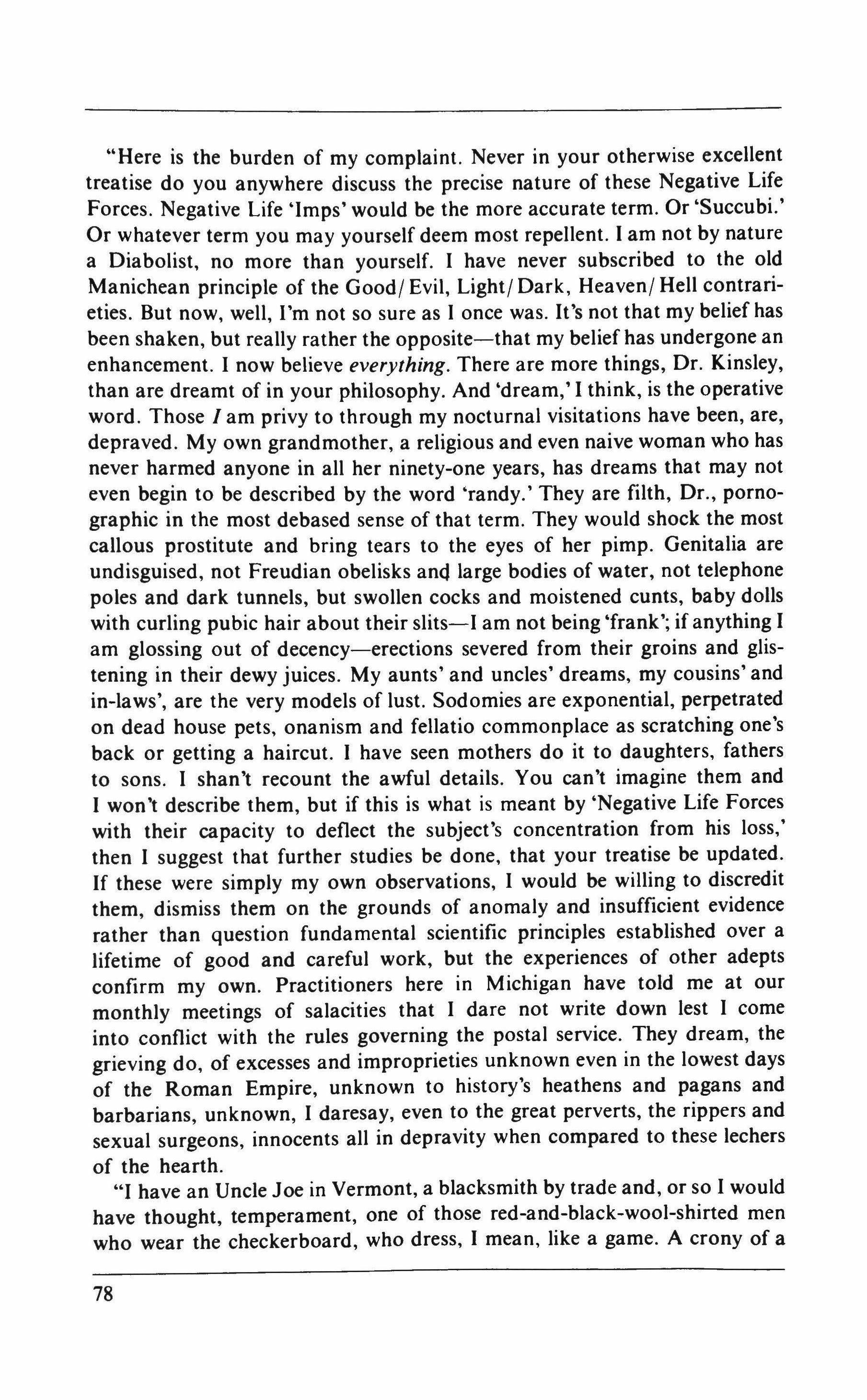
"Here is the burden of my complaint. Never in your otherwise excellent treatise do you anywhere discuss the precise nature of these Negative Life Forces. Negative Life 'Imps' would be the more accurate term. Or 'Succubi.' Or whatever term you may yourself deem most repellent. I am not by nature a Diabolist, no more than yourself. I have never subscribed to the old Manichean principle of the Good/ Evil, Light/ Dark, Heaven/ Hell contrarieties. But now, well, I'm not so sure as I once was. It's not that my belief has been shaken, but really rather the opposite-that my belief has undergone an enhancement. I now believe everything. There are more things, Dr. Kinsley, than are dreamt of in your philosophy. And 'dream,' I think, is the operative word. Those I am privy to through my nocturnal visitations have been, are, depraved. My own grandmother, a religious and even naive woman who has never harmed anyone in all her ninety-one years, has dreams that may not even begin to be described by the word 'randy.' They are filth, Dr., pornographic in the most debased sense of that term. They would shock the most callous prostitute and bring tears to the eyes of her pimp. Genitalia are undisguised, not Freudian obelisks and large bodies of water, not telephone poles and dark tunnels, but swollen cocks and moistened cunts, baby dolls with curling pubic hair about their slits-I am not being 'frank'; if anything I am glossing out of decency-erections severed from their groins and glistening in their dewy juices. My aunts' and uncles'dreams, my cousins' and in-laws', are the very models of lust. Sodomies are exponential, perpetrated on dead house pets, onanism and fellatio commonplace as scratching one's back or getting a haircut. I have seen mothers do it to daughters, fathers to sons. I shan't recount the awful details. You can't imagine them and I won't describe them, but if this is what is meant by 'Negative Life Forces with their capacity to deflect the subject's concentration from his loss,' then I suggest that further studies be done, that your treatise be updated. If these were simply my own observations, I would be willing to discredit them, dismiss them on the grounds of anomaly and insufficient evidence rather than question fundamental scientific principles established over a lifetime of good and careful work, but the experiences of other adepts confirm my own. Practitioners here in Michigan have told me at our monthly meetings of salacities that I dare not write down lest I come into conflict with the rules governing the postal service. They dream, the grieving do, of excesses and improprieties unknown even in the lowest days of the Roman Empire, unknown to history's heathens and pagans and barbarians, unknown, I daresay, even to the great perverts, the rippers and sexual surgeons, innocents all in depravity when compared to these lechers of the hearth.
"I have an Uncle Joe in Vermont, a blacksmith by trade and, or so I would have thought, temperament, one of those red-and-black-wool-shirted men who wear the checkerboard, who dress, I mean, like a game. A crony of a

man, long-underweared and gallused and wide-leather-belted, too, one of the dark-pantsed and wood-stoved of earth who has the names and faces of his townsmen like a postmaster. A fisherman of a fellow, honest as a hunter, more loyal to the local woods and streams than to any nation, who has all the intricate weathers like a second language. A whittler, of course, and volunteer fireman, a loresman of stone and all the materials of naturebeech and maple, elm and ash-and all the secret, invisible grains of the human heart. Whose word is his bond-and he has many words, as comforting as honest. For children, for men with troubles, and for sad ladies, for lame dogs and lamer ducks. You know the type, or if you're lucky do, an unofficial mayor of a man, powerful of course, muscled I mean, with strength that comes as much from virtue and good will as hammer or heat. His power great but never guarded, not held like a secret or watched like his fire, no caution catching it up or checking it in, not anything fearful. My uncle's great strength, innocent as talent, like a good singing voice, or the gift of speed.
"And no bachelor. Uncle Joe a family man, that organic guy. The sort of man-this didn't happen-who might have married the sister-in-law when the sister died, who found the fit of love, I mean to say, who'd find it anywhere and count it as a wonder that his loved ones-all the folks he wanted most to be with in the world, his wife and children, nephews, sisters, nieces, brothers-should live so close to home, not even in the next valley but right there in the very town, beside him in the very section of the very church he prayed in, the very lake he swam in, the store he bought his staples in.
"He married Aunt Elizabeth when both were twenty-eight. They had four children, my cousins Redford and Oliver and Susan and Ben, and raised them, he and Elizabeth-I don't mean strictly, I don't mean by any theory, I don't even mean good-naturedly-as naturally as Aunt Elizabeth might put up strawberries, following nothing more than the natural laws and timehonored processes of canning, first this, then that.
"Elizabeth died when the youngest, Oliver, was still in his teens.
"Fine young men, a lovely woman, whose only quarrel that I can now recall was who would get to stay with Joe. The smith profession is, of course, a languishing one, and while it was never a matter of who would make his way in the world, who would get to go off to the state university at Burlington-none would, none wanted to-but rather which would have to hire out, which would have to work the timber or the nearby farms or go to the factories where the money was, and which would remain-they wouldn't have thought of it as behind-with the benevolent, godlike father they loved as much for his kindness and wisdom as for his paternity.
"'Mother's dead,' Susan told him. 'You have no woman, Father, no one to cook your meals or mend and wash or sing for you. The trade is falling on

hard times. You're only fifty-two. You don't yet even need our young strength to help you at the forge. Send them away, dear. Let me stay.'
"Redford said, 'I'm the oldest, Father. It's the privilege of the oldest sonI don't say "duty," I say "privilege," I could say "right"-to follow in his father's footsteps, to help in his profession. I don't want to take it over, sir. For this I care nothing, though should you desire it J would stay at the forge till after the last horse in Vermont had died, and after that as well. I would repair tools, fit new discs and harrows, shape new heads to nails, fashioning your iron as you taught me, building the fire to 1535 degrees centigrade, puddling and shingling, adding your water like transfusion. Allow me to remain, Father. I ask in the name of primogeniture.'
"Tm the youngest, Pa,' said Oliver. 'My boyhood isn't finished yet. I lost a mother. I'm not ready, Daddy. Don't send me off.'
And Ben reminded him he was neither oldest son nor youngest, not special at all, not even female like his sister, that nothing about his birth gave him the special prerogatives or claims the three others had lived with all their lives. It was only justice and fair play, qualities whose names he might not even know had he not learned about them, a mute listener, an undistinguished son and brother, in his father's shop all his unexceptional life. It was only retroactive equity and redress he was seeking in asking to be allowed to stay with his father. It was only the presentation of a twentysome-odd-year-old bill and quitclaim.
"'You can't ask me,' Joe told them-they had come separately to make their case, but he answered them together-'to choose among my children. Your sex and ages are of no importance. Years make no precedence in love. Biology has no claims on it. You shall have to decide between yourselves.'
"It was only the next valley over, Dr. Kinsley, not the next state or county or even Village. None was to be exiled, banished. It was understood that they could take their dinners together, not weekly, mind, but daily if they chose. Joe had built rooms onto his house as they were needed, had carpentered the beds and other furniture for each of his children, so that their living arrangements were not only adequate but actually lavish, the house as trim and ordered and ample to the needs of their bodies and imaginations as a child's tree house. It was their sense of seemliness and honor that guided them, their knowledge that if they continued to live together as a family now that all but one of them was grown, it would be as a family that had somehow gone off, spoiled in some acute, vinegarish way.
"That was when they quarreled. They did it where their father could not hear them, could not know of it. They had been told that they had to decide by themselves. Logic was useless. These were the claims of need and love. They soon saw that right had nothing to do with it, that each of their arguments was checked and canceled by the equally legitimate arguments of each of the others.
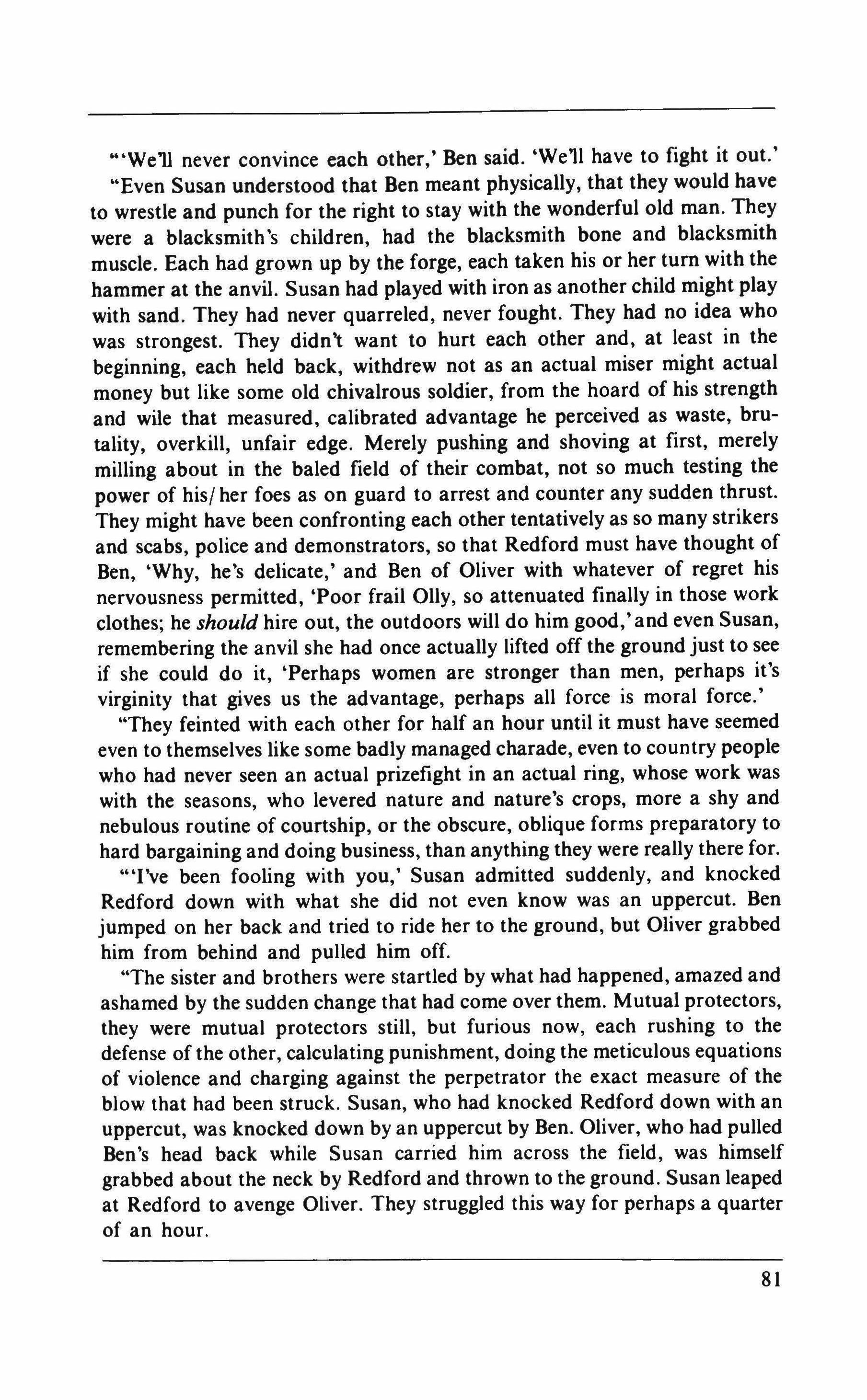
"'Well never convince each other,' Ben said. 'We'll have to fight it out.'
"Even Susan understood that Ben meant physically, that they would have to wrestle and punch for the right to stay with the wonderful old man. They were a blacksmith's children, had the blacksmith bone and blacksmith muscle. Each had grown up by the forge, each taken his or her turn with the hammer at the anvil. Susan had played with iron as another child might play with sand. They had never quarreled, never fought. They had no idea who was strongest. They didn't want to hurt each other and, at least in the beginning, each held back, withdrew not as an actual miser might actual money but like some old chivalrous soldier, from the hoard of his strength and wile that measured, calibrated advantage he perceived as waste, brutality, overkill, unfair edge. Merely pushing and shoving at first, merely milling about in the baled field of their combat, not so much testing the power of his/ her foes as on guard to arrest and counter any sudden thrust. They might have been confronting each other tentatively as so many strikers and scabs, police and demonstrators, so that Redford must have thought of Ben, 'Why, he's delicate,' and Ben of Oliver with whatever of regret his nervousness permitted, 'Poor frail Olly, so attenuated finally in those work clothes; he should hire out, the outdoors will do him good,' and even Susan, remembering the anvil she had once actually lifted off the ground just to see if she could do it, 'Perhaps women are stronger than men, perhaps it's virginity that gives us the advantage, perhaps all force is moral force.'
"They feinted with each other for half an hour until it must have seemed even to themselves like some badly managed charade, even to country people who had never seen an actual prizefight in an actual ring, whose work was with the seasons, who levered nature and nature's crops, more a shy and nebulous routine of courtship, or the obscure, oblique forms preparatory to hard bargaining and doing business, than anything they were really there for.
"Tve been fooling with you,' Susan admitted suddenly, and knocked Redford down with what she did not even know was an uppercut. Ben jumped on her back and tried to ride her to the ground, but Oliver grabbed him from behind and pulled him off.
"The sister and brothers were startled by what had happened, amazed and ashamed by the sudden change that had come over them. Mutual protectors, they were mutual protectors still, but furious now, each rushing to the defense of the other, calculating punishment, doing the meticulous equations of violence and charging against the perpetrator the exact measure of the blow that had been struck. Susan, who had knocked Redford down with an uppercut, was knocked down by an uppercut by Ben. Oliver, who had pulled Ben's head back while Susan carried him across the field, was himself grabbed about the neck by Redford and thrown to the ground. Susan leaped at Redford to avenge Oliver. They struggled this way for perhaps a quarter of an hour.
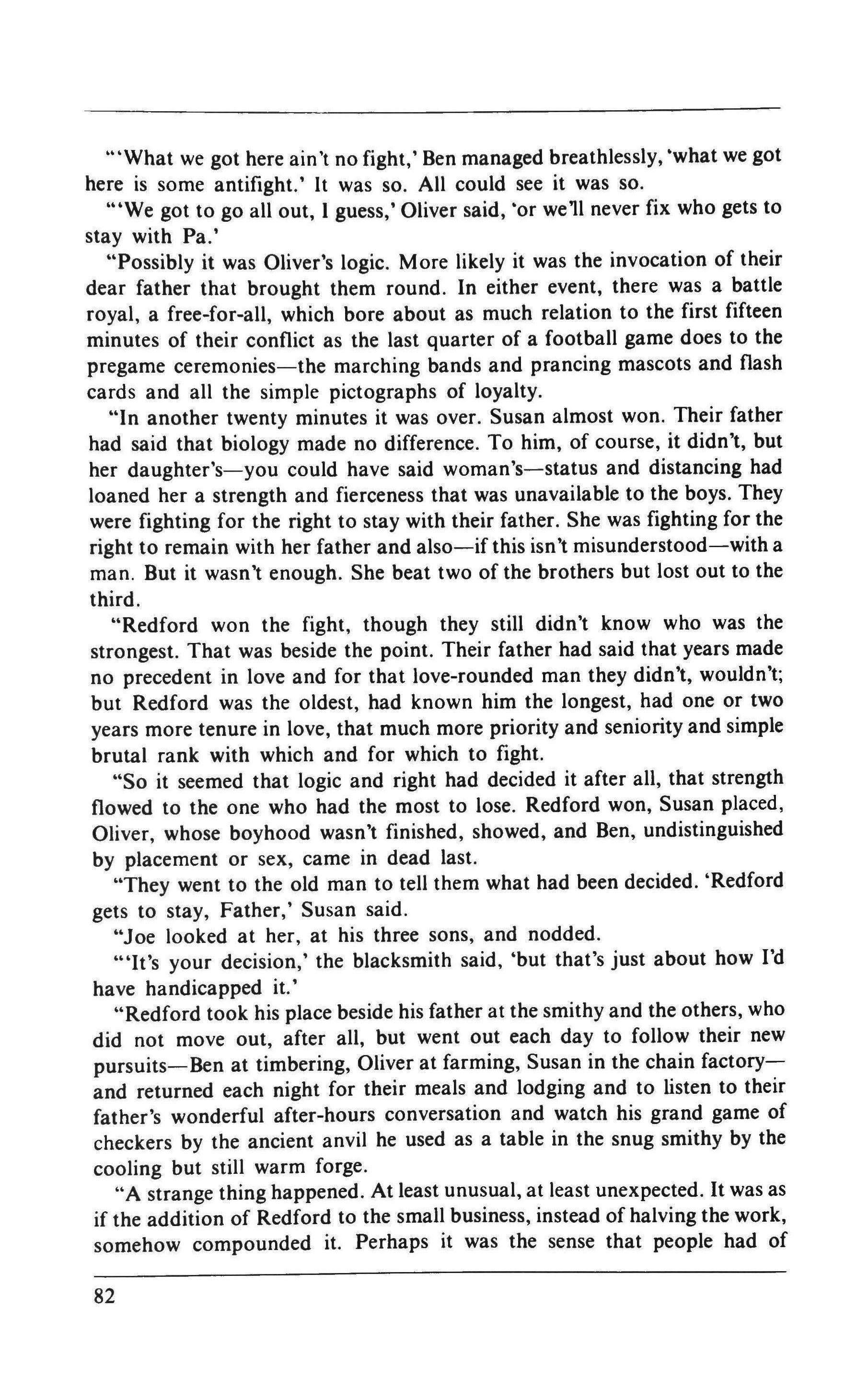
'''What we got here ain't no fight; Ben managed breathlessly, 'what we got here is some antifight.' It was so. All could see it was so.
'''We got to go all out, I guess,' Oliver said, 'or we'll never fix who gets to stay with Pa.'
"Possibly it was Oliver's logic. More likely it was the invocation of their dear father that brought them round. In either event, there was a battle royal, a free-for-all, which bore about as much relation to the first fifteen minutes of their conflict as the last quarter of a football game does to the pregame ceremonies-the marching bands and prancing mascots and flash cards and all the simple pictographs of loyalty.
"In another twenty minutes it was over. Susan almost won. Their father had said that biology made no difference. To him, of course, it didn't, but her daughter's-you could have said woman's-status and distancing had loaned her a strength and fierceness that was unavailable to the boys. They were fighting for the right to stay with their father. She was fighting for the right to remain with her father and also-if this isn't misunderstood-with a man. But it wasn't enough. She beat two of the brothers but lost out to the third.
"Redford won the fight, though they still didn't know who was the strongest. That was beside the point. Their father had said that years made no precedent in love and for that love-rounded man they didn't, wouldn't; but Redford was the oldest, had known him the longest, had one or two years more tenure in love, that much more priority and seniority and simple brutal rank with which and for which to fight.
"So it seemed that logic and right had decided it after all, that strength flowed to the one who had the most to lose. Redford won, Susan placed, Oliver, whose boyhood wasn't finished, showed, and Ben, undistinguished by placement or sex, came in dead last.
"They went to the old man to tell them what had been decided. 'Redford gets to stay, Father; Susan said.
"Joe looked at her, at his three sons, and nodded.
'''It's your decision,' the blacksmith said, 'but that's just about how I'd have handicapped it.'
"Redford took his place beside his father at the smithy and the others, who did not move out, after all, but went out each day to follow their new pursuits-Ben at timbering, Oliver at farming, Susan in the chain factoryand returned each night for their meals and lodging and to listen to their father's wonderful after-hours conversation and watch his grand game of checkers by the ancient anvil he used as a table in the snug smithy by the cooling but stilI warm forge.
"A strange thing happened. At least unusual, at least unexpected. It was as if the addition of Redford to the small business, instead of halving the work, somehow compounded it. Perhaps it was the sense that people had of

dealing with the beginning of a dynasty, a House, or perhaps it was simply the practical Vermonters' suspicion that Joe, by taking on additional help, was getting ready to expand, introduce intricate new refinements to the blacksmith trade. In any event, Doctor, they now came with their horses and broken equipment as never before. They came not only from all over the county but from the next county as well, and some from as far away as the Northeast Kingdom. To the oldtimers, and to his new custom, too, Joe was as convivial as ever, as wise as ever, as reasonable, as much the, well, American, as he had ever been, the man most likely to break up a lynching, if you know what I mean.
"Only Redford had the feeling that his father was unhappy with the new arrangement. They never spoke of it; Redford never mentioned it to his brothers or sister-l have it from an astral projection to one of his dreamsyet as time passed Redford was more and more convinced that his dad found fault with his presence. He queried himself constantly, went over and over his behavior and performance to see how he had given offense. He could find nothing. He was tormented. 'Perhaps he would have preferred Oliver,' he thought, 'perhaps Susan or Ben.' He was tormented and his work suffered.
"A blacksmith must concentrate. His work is dangerous as a surgeon's. There must be steady-state attention, attention as focused as acetylene, as managed as meditation.
"He was stirring pig iron in the puddling furnace and did not read the gauges properly, mistaking the first 3 in 1335 centigrade degrees for a 5. He was still two hundred degrees below the melting point of iron but did not know this and could not understand the strange and sudden obdurance of the metal. He put on his almost opaque smoked glasses and long asbestos gloves and opened the door of the furnace to investigate. Behind smoked glasses iron ingots look like peeled, pale bananas, less bright than new rope. The brilliant red bed of heat in which they rest is dimmed the color of roofing tile.
"He was a blacksmith, used to heat, as at ease in Celsius as in spring, cozy in Fahrenheit, cold-blooded as fish or bird. Of course he didn't feel the heat who, testing himself as a child, had plucked live cinders from the shingled iron with his fingers, moving the hot dross about under his hands like chessmen or checkers in a game. And he was distracted by his good-managainst-the-lynch-mob dad, that serene, knowing, grandfatherly man who he of all the elder sons on earth was (not as a grandparent and not in fly-fisher affiliation or woods guide relation or even priest counselor one, and all this even if not in actual dotage-Redford himself would already be twenty-four years old on his next birthday-from a fellow getting on, an old-timer, part of whose virtue must have come from things got past, put by, some nolo contendere deal with greed and lust, but as a still-in-there, live and kicking,

actual, viable Pop) not done with him yet, and who for as far ahead as Redford could see would never be done with him, who still had plenty to teach to someone who still had plenty to learn. And if his father's new queer distance from his eldest boy had any cause at all, it had to lie with Redford, some mysterious, unmanly infraction yet to be decoded. No insubordination or defection or noncompliance, no sedition, putsch or blackleg treason-a breach, blemish, some piddling moral caesura visible only to his pa's Indian vision.
"So he was distracted; he did not feel the heat. Behind the dark glasses the iron pigs, two hundred degrees centigrade below the boil, looked dark as stones on a dull night. He reached forward into the furnace and lifted one out, the size and shape of a small book, bringing it close to his face to examine. His hands ignited like kindling. His head caught fire.
"Joe built the coffin himself. He dug the grave next to Elizabeth's on the flank of Kingdom Mountain and eloquently spoke the psalms he did not even have to read. He delivered the eulogy.
"Susan took her brother's place beside her father at the blacksmith shop. She worked as effortlessly as Redford but with better concentration. She was dead within the month. Tearing her hymen in the rough and tumble with her brothers, she had somehow ruptured something important in her womb. The hemorrhage had been slow, almost undetectable, the bleached red smear she saw on her toilet paper of no more significance than the trivial spotting after a period. The hemorrhage had been slow, something that happened almost without her, like air deflating from a football in a closet in the off-season. The bruises, green as olives on her belly, she put down to the punches she had traded with her brothers. Oliver's would be darker, she thought, Ben's would. It was not the heavy lifting that exacerbated the bleeding, it was the work she did with the sledge at the anvil, shaking her blood down through the sluices and flumes of her body with each powerful blow of her arm. Finally it was as if she had too vigorously shaken ketchup from its bottle. 'Perhaps,' she mused again, when she saw the immense sticky bolus of blood at her feet, felt it in her shoes, between her toes, just before she died, 'it's virginity gives us the advantage. Perhaps all force is moral force.'
"Her father buried her as he had Redford, on the same green mountain, in a coffin exactly the dimensions of her older brother's, reciting the same psalms and, word for word, the identical eulogy.
"Oliver came forward.
'''No,' the father said. 'I know the sequence. Didn't I handicap your decisions? Didn't I have the morning line on it? Your boyhood ain't finished, you said. Why should you do up the end of your life before you've done up its beginning? Ben will work with me.'
"So the unadvantaged (not disadvantaged, just only undistinguished by age or sex) Ben put by his axes and saws and cleared his cuffs and cleats and

clothes of the wooden, flammable chips, shavings, and twigs, the residual timber that clung to him like dew, and reported to his father at the forge.
'''Well, one thing,' his father said, 'now you've got your priority, too.'
'''Sure,' Ben said.
'''Work the bellows while I start this fire.'
'''Sure,' Ben said.
'''Just remember what I told you. Squeeze it like you would an accordion. Easy. Easy. Try to imagine you're playing a waltz. It ain't no march, it ain't any square dance.'
'''Sure.
'''Still too fast,' the father said. 'What we want is to give this fire a shove in the right direction. We ain't looking to blow it out the other end of the forge.'
'''Sure,' Ben said.
'''Ayuh. That's it. That's it. See how the color is evenly distributed? Just like leaves turning up on Kingdom Mountain.'
'''Sure,' Ben said. 'Father?'
'''You can put that down now. Why don't you just layout my tools? 1'1 be needing my peen and maul. You can hand me the tamp and my small sternmer.'
'''Sure. Father?'
'''Fetch my spalling hammer, too, why don't you? That special one with the claw head. What?'
"'It's about my eulogy.'
"'I fashioned the claw on this myself. Don't know why someone didn't think to do it earlier. Seems a simple enough adaptation. Stand back for a minute. I need some elbow room to swing this thing. What about it?'
'''I don't mind about the psalms. Anyone would be pleased with those psalms. They're good psalms.'
"They're stately psalms.'
"'Sure,' Ben said. 'It's the eulogy. Seeing as how I was neither eldest son nor youngest, nor even a daughter like Susan, seeing as how I was always sort of lost in there-I ain't saying misplaced, I ain't sayingforgotten or even mislaid, though mislaid gives some of my sense of it-seeing as how I was just kind of ganged up on by accidental circumstance, I was wondering if you couldn't sort of distinguish me a little in the eulogy. All you'd really have to do is say what I just mentioned.'
"His father didn't answer him. They got through the day, Joe doing the close work, Ben relegated to helper, but a helper, he knew, of little more urgency and use to the blacksmith than the merest customer who might, the smith's mouth full of nails and his hands busy with tongs and sledge, almost casually tie up the back of his leather apron if it came undone. Joe referred to what his son had said only once. It was after they had finished for the day. He was banking the fires. 'Don't think about your eulogy,' he said.
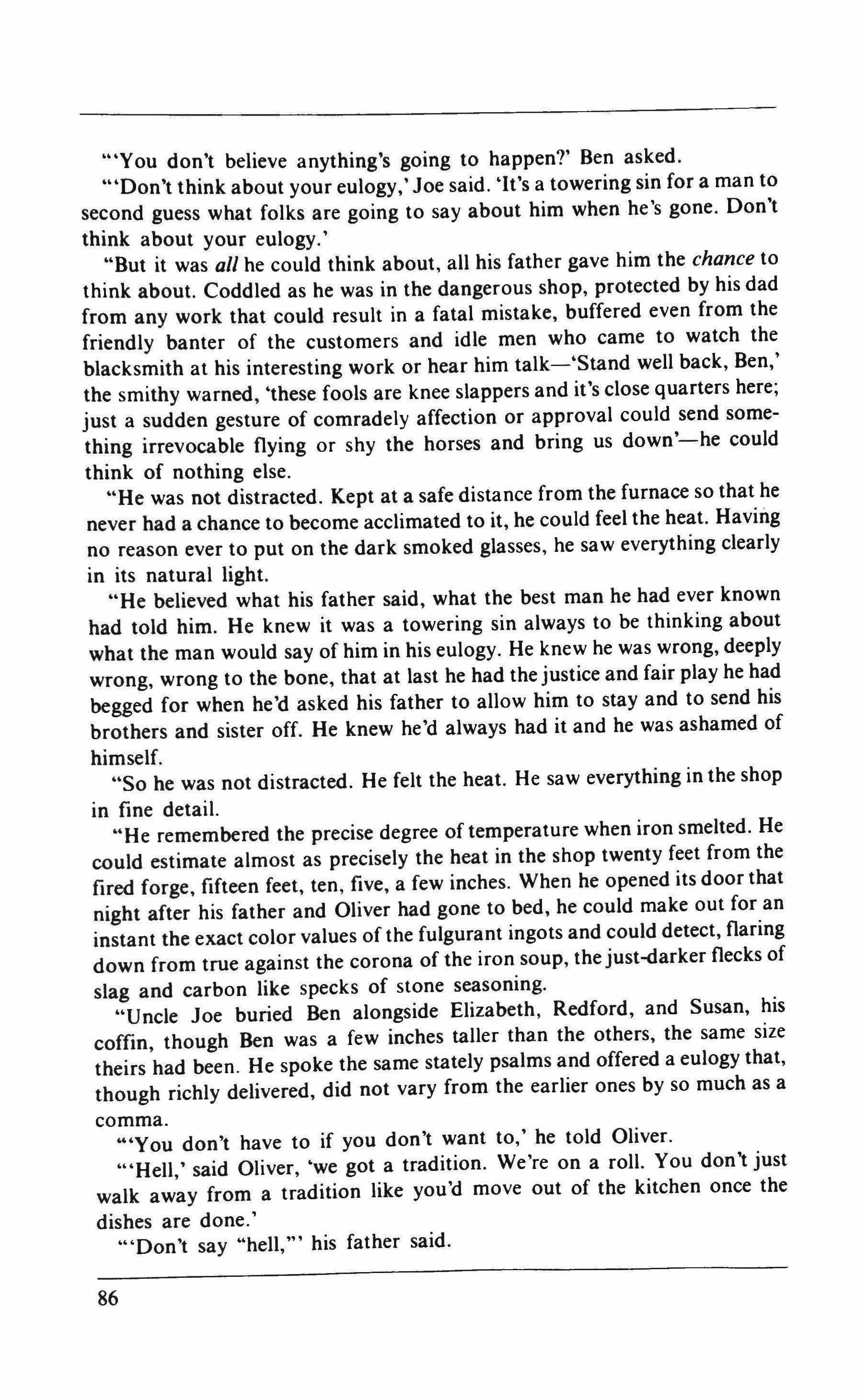
'''You don't believe anything's going to happen?' Ben asked.
'''Don't think about your eulogy,' Joe said. 'It's a towering sin for a man to second guess what folks are going to say about him when he's gone. Don't think about your eulogy.'
"But it was all he could think about, all his father gave him the chance to think about. Coddled as he was in the dangerous shop, protected by his dad from any work that could result in a fatal mistake, buffered even from the friendly banter of the customers and idle men who came to watch the blacksmith at his interesting work or hear him talk-'Stand well back, Ben,' the smithy warned, 'these fools are knee slappers and it's close quarters here; just a sudden gesture of comradely affection or approval could send something irrevocable flying or shy the horses and bring us down'-he could think of nothing else.
"He was not distracted. Kept at a safe distance from the furnace so that he never had a chance to become acclimated to it, he could feel the heat. Having no reason ever to put on the dark smoked glasses, he saw everything clearly in its natural light.
"He believed what his father said, what the best man he had ever known had told him. He knew it was a towering sin always to be thinking about what the man would say of him in his eulogy. He knew he was wrong, deeply wrong, wrong to the bone, that at last he had the justice and fair play he had begged for when he'd asked his father to allow him to stay and to send his brothers and sister off. He knew he'd always had it and he was ashamed of himself.
"So he was not distracted. He felt the heat. He saw everything in the shop in fine detail.
"He remembered the precise degree of temperature when iron smelted. He could estimate almost as precisely the heat in the shop twenty feet from the fired forge, fifteen feet, ten, five, a few inches. When he opened its door that night after his father and Oliver had gone to bed, he could make out for an instant the exact color values of the fulgurant ingots and could detect, flaring down from true against the corona of the iron soup, the just-darker flecks of slag and carbon like specks of stone seasoning.
"Uncle Joe buried Ben alongside Elizabeth, Redford, and Susan, his coffin, though Ben was a few inches taller than the others, the same size theirs had been. He spoke the same stately psalms and offered a eulogy that, though richly delivered, did not vary from the earlier ones by so much as a comma.
"'You don't have to if you don't want to,' he told Oliver.
"'Hell,' said Oliver, 'we got a tradition. We're on a roll. You don't just walk away from a tradition like you'd move out of the kitchen once the dishes are done.'
"'Don't say "hell,''' his father said.

'And I'm twenty now, Oliver said. 'I got ten months till I'm twenty-one. 1 figure 1 got at least that much time to get so expert in the trade that by the time I reach my majority and circumstances swarm me I might even be of some use to you.'
"He was wrong, though. Not about his ability to learn, though he was in fact already expert and of great use to his father. He was the one who had hired out, who had driven the disc harrows and tractors and balers, who had handled the plows and cultivators, who was as familiar with the machinery and wagons of agriculture as any cowboy with his mount, or musician with the pegs and valves of his instruments. He knew their tensions and faults, could guess from a funny sound in the field just which part had busted off, and was so familiar with their shapes and resistances that he could estimate to within a foot the direction and angle of their roll. What he brought to the business was a knowledge of broken pieces, shard, some synecdochic,jigsaw sense of the whole. 'Here,' he'd say, 'let me do that,' when some farmer helplessly held out the ruined, rude pinnings and copulas, the pegs, dowels, brads and hasps of his sad, collapsed one-horse-shay equipment.
'''He's like a jeweler,' they said. It was true.
"Oliver halved the time that would ordinarily have been given over to fashioning new pieces from scratch, and the business, always steady, began suddenly to flourish.
'''Are you pleased?' he asked his father one day.
"Tll work with the animals and run off the big shapes I'm familiar with,' Joe said. 'You do the Swiss watches.'
"He set up a corner of the shop for his son, and now the boy was screened from his father and all the activity by the large anvil as ever Ben had been. Few cared to watch him work and, when sometimes people did drift over, they could see very little of what he was doing-his work was too meticulous, it did not lend itself to raillery-and soon moved back to where the grander, more dramatic activity was going on at Joe's end.
"Oliver listened with his back to them while he worked, much as he had heard the sudden pings and small crashes of the brittle machinery in the fields, hearing everything only after it was already behind him but making his adjustments for deflection and pitch and yaw by the sound of the voice, guessing not only the speaker but the one addressed, and listening, too, for the rhythmic, sedative slaps of his father's hammer on the steel anvil.
"What happened was this. Their voices were suddenly lowered. He was fusing a hitch, one he had never seen before, like a delicate ampersand or the treble clef on sheet music.
got what he wanted,' he heard. did take deaths.'
'''Hush,' he heard, and a low laugh. And his father's hammer, the loud crack of steel on steel undiminished, if anything quickened, lending a kind of fillip of assent like a rim shot under a joke.
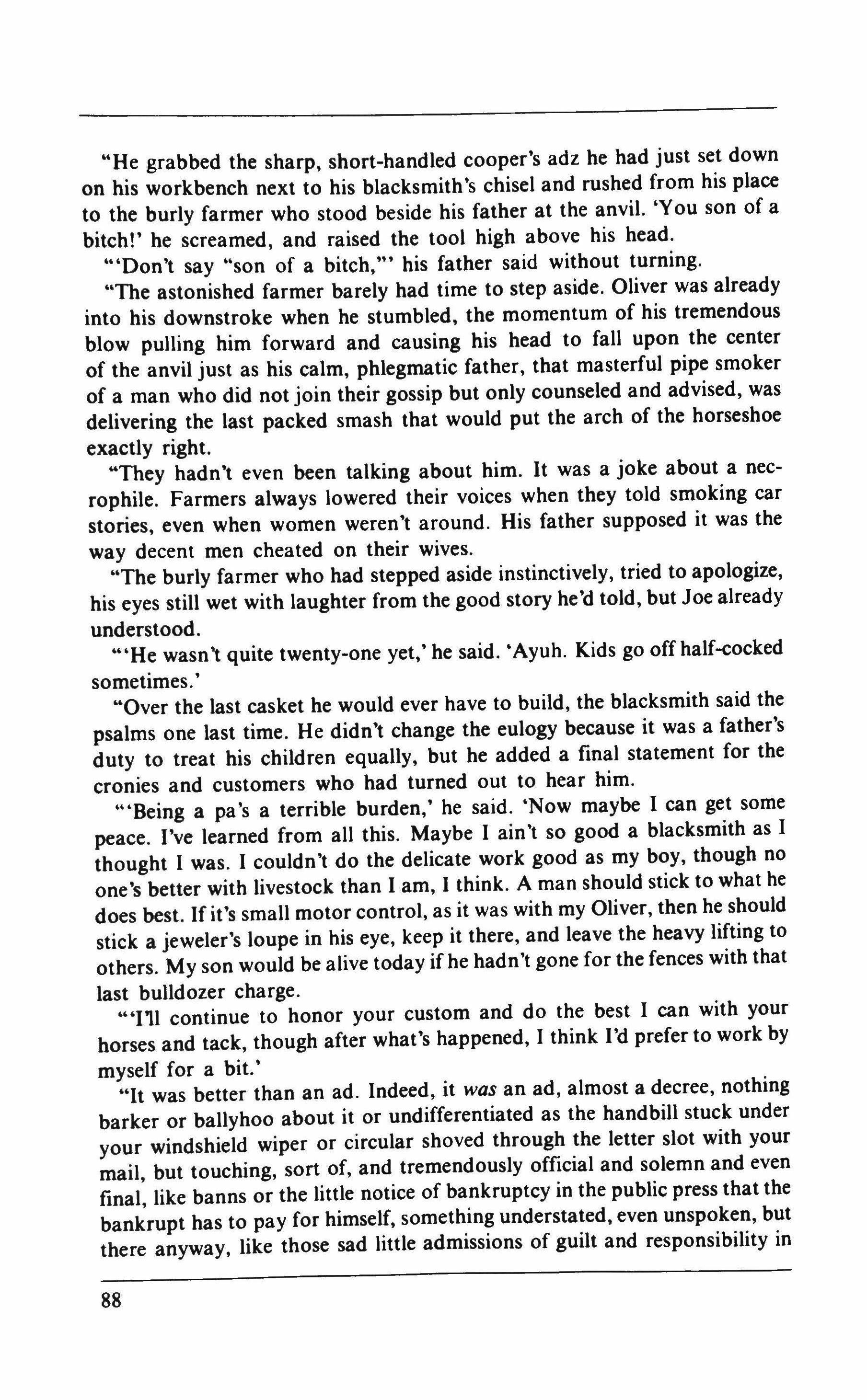
"He grabbed the sharp, short-handled cooper's adz he had just set down on his workbench next to his blacksmith's chisel and rushed from his place to the burly farmer who stood beside his father at the anvil. 'You son of a bitch!' he screamed, and raised the tool high above his head.
"'Don't say "son of a bitch," his father said without turning.
"The astonished farmer barely had time to step aside. Oliver was already into his downstroke when he stumbled, the momentum of his tremendous blow pulling him forward and causing his head to fall upon the center of the anvil just as his calm, phlegmatic father, that masterful pipe smoker of a man who did not join their gossip but only counseled and advised, was delivering the last packed smash that would put the arch of the horseshoe exactly right.
"They hadn't even been talking about him. It was a joke about a necrophile. Farmers always lowered their voices when they told smoking car stories, even when women weren't around. His father supposed it was the way decent men cheated on their wives.
"The burly farmer who had stepped aside instinctively, tried to apologize, his eyes still wet with laughter from the good story he'd told, but Joe already understood.
"'He wasn't quite twenty-one yet,' he said. 'Ayuh, Kids go off half-cocked sometimes.
"Over the last casket he would ever have to build, the blacksmith said the psalms one last time. He didn't change the eulogy because it was a father's duty to treat his children equally, but he added a final statement for the cronies and customers who had turned out to hear him.
"'Being a pa's a terrible burden,' he said. 'Now maybe I can get some peace. I've learned from all this. Maybe I ain't so good a blacksmith as I thought I was. I couldn't do the delicate work good as my boy, though no one's better with livestock than I am, I think. A man should stick to what he does best. If it's small motor control, as it was with my Oliver, then he should stick a jeweler's loupe in his eye, keep it there, and leave the heavy lifting to others. My son would be alive today ifhe hadn't gone for the fences with that last bulldozer charge.
"'111 continue to honor your custom and do the best I can with your horses and tack, though after what's happened, I think I'd prefer to work by myself for a bit.'
"It was better than an ad. Indeed, it was an ad, almost a decree, nothing barker or ballyhoo about it or undifferentiated as the handbill stuck under your windshield wiper or circular shoved through the letter slot with your mail, but touching, sort of, and tremendously official and solemn and even final, like banns or the little notice of bankruptcy in the public press that the bankrupt has to pay for himself, something understated, even unspoken, but there anyway, like those sad little admissions of guilt and responsibility in
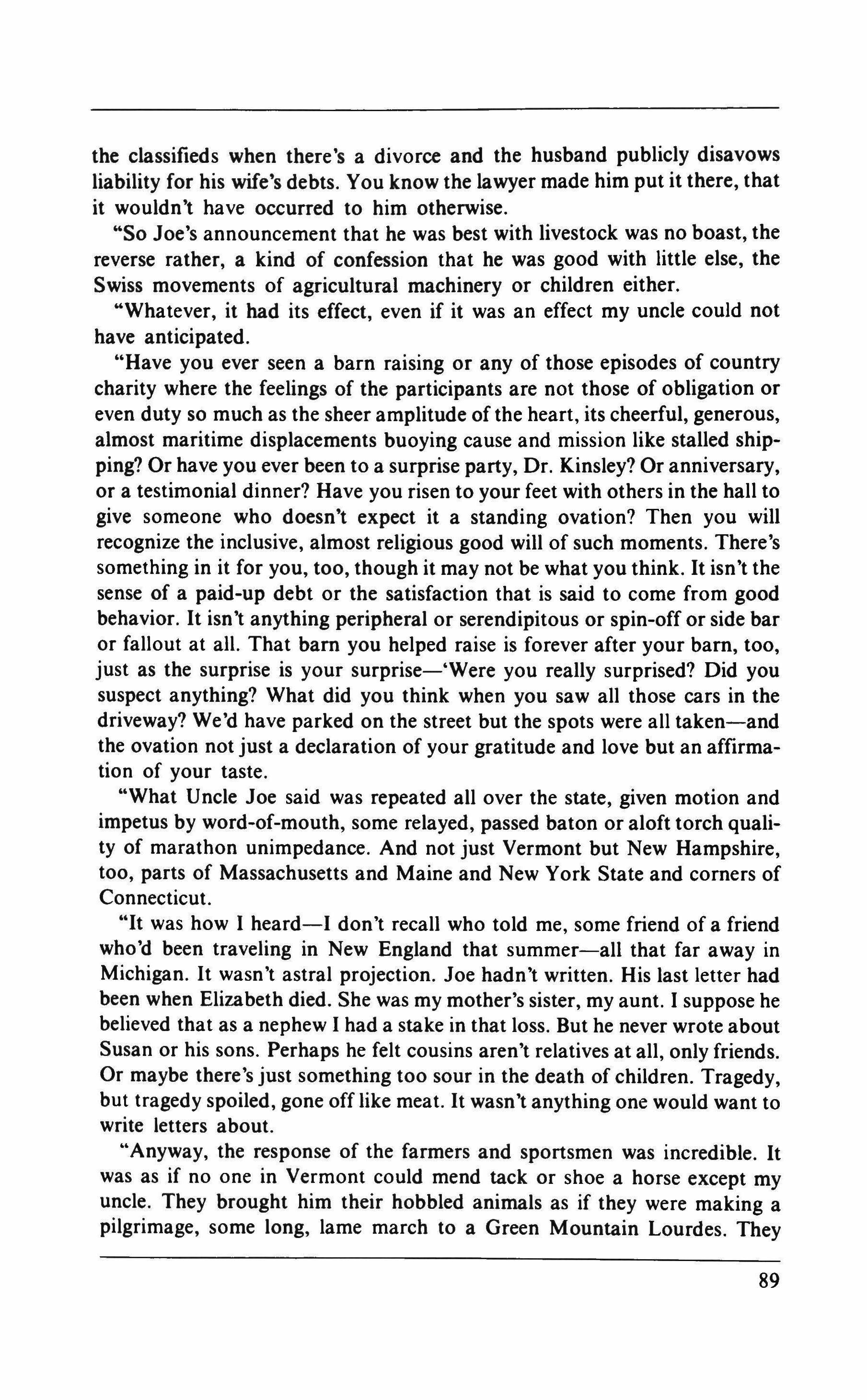
the classifieds when there's a divorce and the husband publicly disavows liability for his wife's debts. You know the lawyer made him put it there, that it wouldn't have occurred to him otherwise.
"So Joe's announcement that he was best with livestock was no boast, the reverse rather, a kind of confession that he was good with little else, the Swiss movements of agricultural machinery or children either.
"Whatever, it had its effect, even if it was an effect my uncle could not have anticipated.
"Have you ever seen a barn raising or any of those episodes of country charity where the feelings of the participants are not those of obligation or even duty so much as the sheer amplitude of the heart, its cheerful, generous, almost maritime displacements buoying cause and mission like stalled shipping? Or have you ever been to a surprise party, Dr. Kinsley? Or anniversary, or a testimonial dinner? Have you risen to your feet with others in the hall to give someone who doesn't expect it a standing ovation? Then you will recognize the inclusive, almost religious good will of such moments. There's something in it for you, too, though it may not be what you think. It isn't the sense of a paid-up debt or the satisfaction that is said to come from good behavior. It isn't anything peripheral or serendipitous or spin-off or side bar or fallout at all. That bam you helped raise is forever after your bam, too, just as the surprise is your surprise-'Were you really surprised? Did you suspect anything? What did you think when you sawall those cars in the driveway? We'd have parked on the street but the spots were all taken-and the ovation not just a declaration of your gratitude and love but an affirmation of your taste.
"What Uncle Joe said was repeated all over the state, given motion and impetus by word-of-mouth, some relayed, passed baton or aloft torch quality of marathon unimpedance. And not just Vermont but New Hampshire, too, parts of Massachusetts and Maine and New York State and comers of Connecticut.
"It was how I heard-I don't recall who told me, some friend of a friend who'd been traveling in New England that summer-all that far away in Michigan. It wasn't astral projection. Joe hadn't written. His last letter had been when Elizabeth died. She was my mother's sister, my aunt. I suppose he believed that as a nephew I had a stake in that loss. But he never wrote about Susan or his sons. Perhaps he felt cousins aren't relatives at all, only friends. Or maybe there's just something too sour in the death of children. Tragedy, but tragedy spoiled, gone off like meat. It wasn't anything one would want to write letters about.
"Anyway, the response of the farmers and sportsmen was incredible. It was as if no one in Vermont could mend tack or shoe a horse except my uncle. They brought him their hobbled animals as if they were making a pilgrimage, some long, lame march to a Green Mountain Lourdes. They
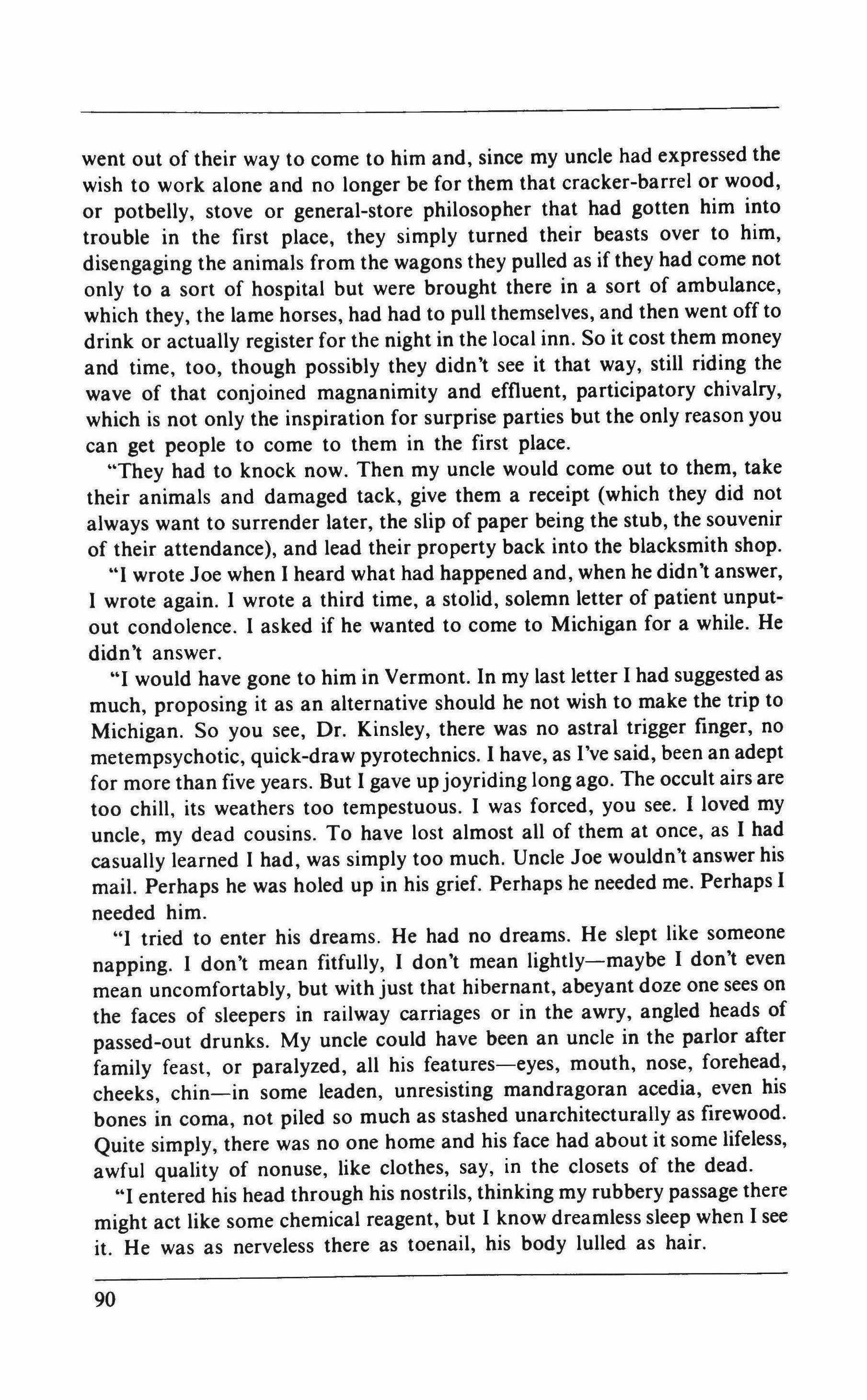
went out of their way to come to him and, since my uncle had expressed the wish to work alone and no longer be for them that cracker-barrel or wood, or potbelly, stove or general-store philosopher that had gotten him into trouble in the first place, they simply turned their beasts over to him, disengaging the animals from the wagons they pulled as if they had come not only to a sort of hospital but were brought there in a sort of ambulance, which they, the lame horses, had had to pull themselves, and then went off to drink or actually register for the night in the local inn. So it cost them money and time, too, though possibly they didn't see it that way, still riding the wave of that conjoined magnanimity and effluent, participatory chivalry, which is not only the inspiration for surprise parties but the only reason you can get people to come to them in the first place.
"They had to knock now. Then my uncle would come out to them, take their animals and damaged tack, give them a receipt (which they did not always want to surrender later, the slip of paper being the stub, the souvenir of their attendance), and lead their property back into the blacksmith shop.
"I wrote Joe when I heard what had happened and, when he didn't answer, I wrote again. I wrote a third time, a stolid, solemn letter of patient unputout condolence. I asked if he wanted to come to Michigan for a while. He didn't answer.
"I would have gone to him in Vermont. In my last letter I had suggested as much, proposing it as an alternative should he not wish to make the trip to Michigan. So you see, Dr. Kinsley, there was no astral trigger finger, no metempsychotic, quick-draw pyrotechnics. I have, as I've said, been an adept for more than five years. But I gave up joyriding long ago. The occult airs are too chill, its weathers too tempestuous. I was forced, you see. I loved my uncle, my dead cousins. To have lost almost all of them at once, as I had casually learned I had, was simply too much. Uncle Joe wouldn't answer his mail. Perhaps he was holed up in his grief. Perhaps he needed me. Perhaps I needed him.
"I tried to enter his dreams. He had no dreams. He slept like someone napping. I don't mean fitfully, I don't mean lightly-maybe 1 don't even mean uncomfortably, but with just that hibernant, abeyant doze one sees on the faces of sleepers in railway carriages or in the awry, angled heads of passed-out drunks. My uncle could have been an uncle in the parlor after family feast, or paralyzed, all his features-eyes, mouth, nose, forehead, cheeks, chin-in some leaden, unresisting mandragoran acedia, even his bones in coma, not piled so much as stashed unarchitecturally as firewood. Quite simply, there was no one home and his face had about it some lifeless, awful quality of nonuse, like clothes, say, in the closets of the dead.
"I entered his head through his nostrils, thinking my rubbery passage there might act like some chemical reagent, but I know dreamless sleep when I see it. He was as nerveless there as toenail, his body lulled as hair.

"I became bolder, even naughty. 1 entered his head through his anus, his ears, the littorals of his sex-all the watched passes and zebra-gated, checkpoint vulnerables of his ticklish borders. 1 would have done as well to have entered his head through his hat.
"Once inside, 1 moved about as freely as a man in his rooms, but with as little sense of voyage, journey. 1 probed his brain like a caver, but the cave was featureless, dead-the bland limestones and indigenous geologies ordinary as cellar. There was neither grief nor joy, his unconscious recessive as his hunger.
"I slipped outside again with the intention of reconnoitering his room, more cop than nephew, more scientist than mourner. 1 looked for-what? A Bible perhaps, open at some telling passage of consolation or bleak denunciation, or perhaps at one of those two psalms in my uncle's repertoire that might indicate the words meant more to him than just a formula for the disposition of bodies.
"There was no Bible.
"I looked for framed photographs of my cousins-posed, frozen, idealized, Sunday-bested, their young lives solemnized and potentiated by their severe clothes and managed expressions, neither openly smiling nor hardened in some scam seriousness but posed nevertheless, genuinely posed, to give off their own real, considered sense of who they were, all they intended to be. Or loose snapshots, deceptive candids, my cousins tricked out in life as they worked by the forge or were snapped in repose, horseplay, seated at table or dancing the jig.
"There were no framed photographs, there were no loose candids.
"I looked for mementos. Not locks of hair or the stuffed toys of their childhood-I knew there wouldn't be any-but their heights sketched with a pencil mark on the doorways and walls or a window hairline-cracked by one of them in roughhouse. For diary,journal, a note passed at school. For their lucky coins and stamp collections. For anything beside the way, which had once engaged them and which now, in death, might be allowed to stand for the obscure talismans of their father's engagement.
"There was nothing.
"Ah, thought the astral detective, then doesn't the persistent absence of such stuff suggest their willful repudiation? Wouldn't Joe have gone the other way altogether: sweep away, get rid of,jettison forever all trace, spoor, vestige, and relic of his all-gone family, doing the conscientious spring cleaning of death?
"No evidence warranted the assumption. In their rooms, their furniture and lives, if not just as they had left them, seemed to have been put in a more logical order, arranged, even enhanced. I had last visited three years earlier. Aunt Elizabeth was still alive. I remember Susan had remarked that she had no place to store her things. There was a chiffonier in Redford's room.
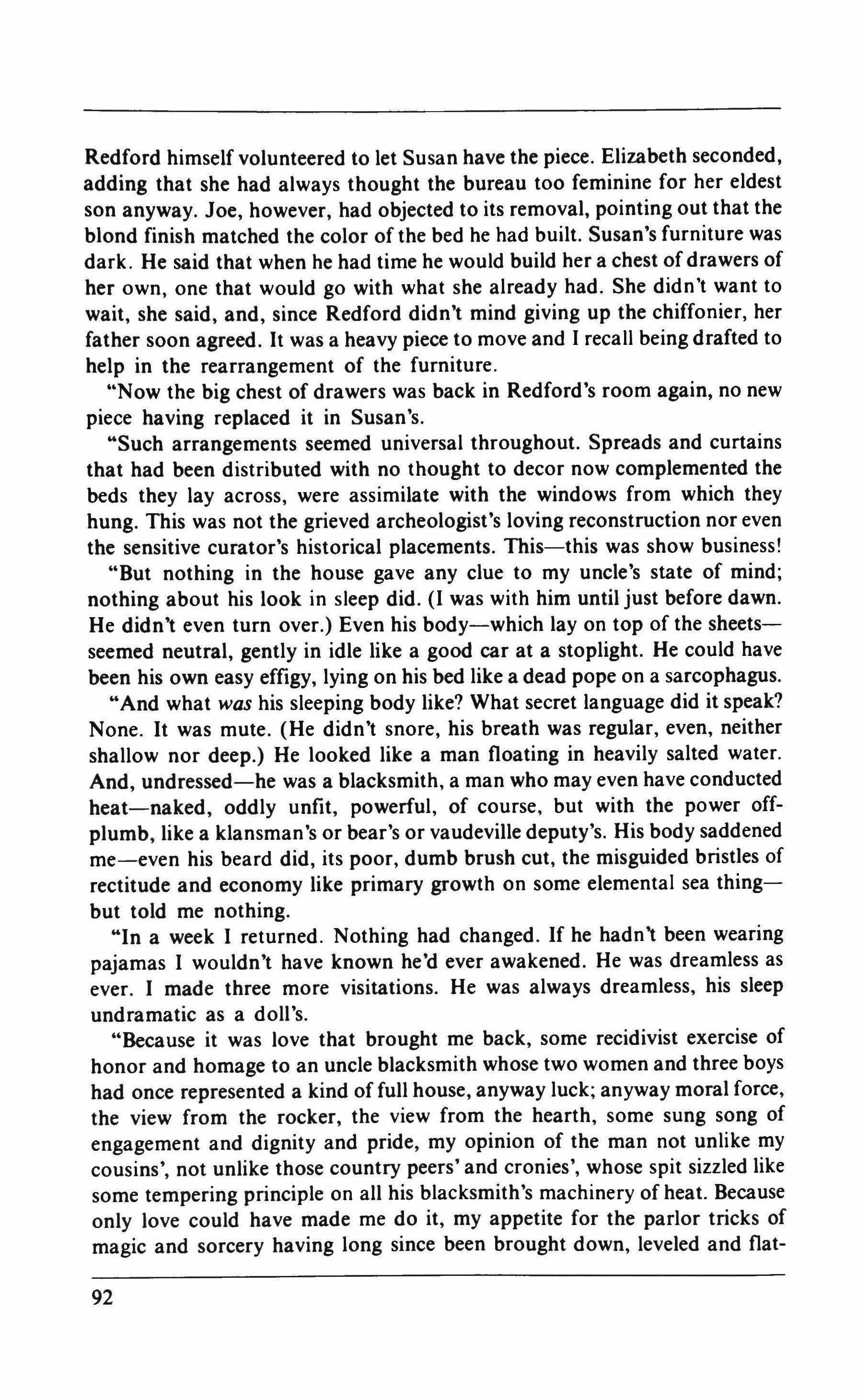
Redford himself volunteered to let Susan have the piece. Elizabeth seconded, adding that she had always thought the bureau too feminine for her eldest son anyway. Joe, however, had objected to its removal, pointing out that the blond finish matched the color of the bed he had built. Susan's furniture was dark. He said that when he had time he would build her a chest of drawers of her own, one that would go with what she already had. She didn't want to wait, she said, and, since Redford didn't mind giving up the chiffonier, her father soon agreed. It was a heavy piece to move and I recall being drafted to help in the rearrangement of the furniture.
"Now the big chest of drawers was back in Redford's room again, no new piece having replaced it in Susan's.
"Such arrangements seemed universal throughout. Spreads and curtains that had been distributed with no thought to decor now complemented the beds they lay across, were assimilate with the windows from which they hung. This was not the grieved archeologist's loving reconstruction nor even the sensitive curator's historical placements. This-this was show business!
"But nothing in the house gave any clue to my uncle's state of mind; nothing about his look in sleep did. (I was with him until just before dawn. He didn't even turn over.) Even his body-which lay on top of the sheetsseemed neutral, gently in idle like a good car at a stoplight. He could have been his own easy effigy, lying on his bed like a dead pope on a sarcophagus
And what was his sleeping body like? What secret language did it speak? None. It was mute. (He didn't snore, his breath was regular, even, neither shallow nor deep.) He looked like a man floating in heavily salted water. And, undressed-he was a blacksmith, a man who may even have conducted heat-naked, oddly unfit, powerful, of course, but with the power offplumb, like a klansman's or bear's or vaudeville deputy's. His body saddened me-even his beard did, its poor, dumb brush cut, the misguided bristles of rectitude and economy like primary growth on some elemental sea thingbut told me nothing.
"In a week I returned. Nothing had changed. If he hadn't been wearing pajamas I wouldn't have known he'd ever awakened. He was dreamless as ever. I made three more visitations. He was always dreamless, his sleep undramatic as a doll's.
"Because it was love that brought me back, some recidivist exercise of honor and homage to an uncle blacksmith whose two women and three boys had once represented a kind of full house, anyway luck; anyway moral force, the view from the rocker, the view from the hearth, some sung song of engagement and dignity and pride, my opinion of the man not unlike my cousins', not unlike those country peers' and cronies', whose spit sizzled like some tempering principle on all his blacksmith's machinery of heat. Because only love could have made me do it, my appetite for the parlor tricks of magic and sorcery having long since been brought down, leveled and flat-

tened, of no more interest to me now that I could do them than the charms of money, say, to a tired sheik. (Because I don't know how God does it, don't understand what's in it for Him, why his limitless power and the limitless demands on it don't bore Him to death.) And if you're not God, it drains you, really takes it out of you, runs down your health, grinds your teeth, there really being such a thing as beginner's luck, those lively gushers of commencement like the hefty, undepleted reserves of sperm in a fifteen-yearold boy. I had no such energy, and each trip, each paranormal, theurgic transport told heavily on my-well, what have you?-blood, bone, skin, bowel, urine, and saliva. I would return each time after my nocturnal sojourns to a body whose blood seemed to have thickened and cooled. I cut my hand, bled. Fat bubbled there in globules like oil slicks in soup. My bones burned. My skin rashed. My bowels loosened. My urine hardened, painfully scraped the walls of my urethra. My saliva congealed. I had to pick it from between my teeth with floss. What if I caught a draft? Exposed, sloped as a flier gone down in a glacier, my lungs would have shipped the pneumonic poisons like locks filling. (I shut the windows before I went to sleep, pulled the shades-this was high summer-closed the doors, arranged myself between quilts and comforters.) What if I became overheated? I would have expired of all the miasmas and malarials of Michigan concentrated in the bedroom. (And without even delirium to comfort me, my mind fled with my spirit.)
"And it has never been easy for me. Maybe I haven't the stomach for it. Even in the beginning, when I was younger, stronger, it wasn't easy, all that steep, uphill, roller-coaster and ferris-wheel verticality, all that roil and flux and vertigo, spiral roll, reel, twirl, and turn giving me the staggers, shakes, totters and spastics, giving me the flutters, flops, snaps and palpitations.
"Also, frankly, it bored me. I mean the astral projection itself-if one can even think of boredom in connection with an enterprise filled with such dread and terror, immaculate as the edge of a knife. I am afraid I am afraid of the dark.
"The trip from Michigan to Vermont is almost a thousand miles and is accomplished in time. No dimension is finessed, and even if my body is incorporeal the Great Lakes are wet and deep, the cold night air piled with isobar, pressure, front, moisture, and electrical charge. There are birds that could snap up my soul in one peck. There is gravity and the hard, wide, black landscape beneath it like a net. There are rough trees and treacherous limbs and sharp-edged leaves like a dangerous vegetable cutlery. There are small animals in the grasses with their honed, predatory temperaments. There are vicious puddles of oil on the highways, noxious, cloying as quicksand. There are tile and slate roofs like strips of sulfur below my astral friction. There is the air mail. There is everywhere beneath me and all along the route of my medium, impediment like land-mined space or badly-laid track. There are

the poisoned, awful molecules of the supernatural and the blinded atoms of the dark
And once, streaming through space, I felt the presence of some ignus fatuus and could just make it out, a phosphorescent, not point, grease of light that maneuvered with me, keeping pace with me, swerving to the left when I did, soaring when I soared, swooping when I swooped. I thought it might be a bird, but no bird could fly at such speeds. I tried to evade it, losing my course but not my companion. I did barrel rolls, loop-the-loops, plunges, spins, stalls, slips, and slides, all the dives and glides of Chagall acrobacy, but it kept up with me, I couldn't shake it. Terrified, I climbed-I could have made it over the Rockies then-higher than I had ever climbed and, at the apogee of my endurance, suddenly leveled off, thinking to outrun it. I could still hear it, its pierce through space, but behind me now and not so loud as before.
"At the last it called out. 'Please. Please,' it called. 'I'm lost. Please. Let me come with you! Please,' it cried. 'Something's wrong. I can't get back. Won't you help me? Please,' it cried, 'please!'
"It was another astral projectionist. Ifit hadn't been exhausted, if it hadn't been on its return trip, it would have caught me. It would have followed me back. It would have burrowed into the vacant body on my bed like a worm hiding in fruit.
"So of course it was love that took me there, not curiosity. If I needed to know what my uncle was feeling, it was so I could console him. But he would not dream, he was dreamless. I would have to make the trip in daylight.
"Forget that I would have to face in light the thousand terrors I had merely glossed in dark, that each stone would now not only be palpable but visible, and all rough terrain writ large, the confused blur of geography, the rooftops, kids, dogs, and all sharp spikes of the world present to me as temperature. Or maybe it was that height, height itself (and distance, too) would become a landmark, a physical, ponderable corporeity solid as the calculable per second per second acceleration offalling bodies. Forget aI/my misgivings. There was still left the physics of the thing, the fixed givens of technique like the constitutional stipulations governing a presidency. The spirit may separate itself from the material plane only when the physical body is sleeping. There is that same guard/ prisoner relationship one runs across in melodrama-jealousy, suspicion, and the followed heart.
"I am not one of those fortunates who can nod offanywhere. I haven't the gift of napping. Sleep is a ceremony with me. There must be weariness, yes, but also beds, night, pajamas, and turned-down blankets. The clocks must be wound, the house locked and the cat put out. There must be bedtime. Even when I'm ill, I've noticed, I find it hard to doze in the daytime. Healthy, the task is almost impossible.
"But I made the effort. I undressed as I would at night, carefully folding

my shirt, still fresh-I'd put it on that morning-and hanging my suit neatly in the closet. I lined up my shoes, the toes just sticking out from beneath the bed but hiding the part where the laces begin. I put my bathrobe on over my pajamas and brought my socks, handkerchief, and underwear to the laundry hamper. I emptied my bladder and brushed my teeth. I got into bed. I sighed and yawned, attempting to trick myself with the noises of ease. I was quite wakeful of course. I knew I would be. I decided to read for a bit, selecting for my reading matter not only the dullest book I could find but one I had already read. I turned on the reading lamp beside the bed, though there was light enough to read even with the shades drawn and the curtains pulled tight across the window. Wakeful as ever, it seemed to me that I was becoming hungry. I nibbled fruit, drank warm milk, grazed cold chicken. At three that afternoon I dressed, went to my office, and put in three hours of work before starting home. I repeated my efforts the next day and the next after that, and though I slept soundly at night, my insomnia disappearing at my normal hour for going to bed, I was unable to sleep at all during the day.
"On the fourth day it occurred to me to try to lull myself with the habits of my childhood. I had no toys now, of course, but I brought the cat into the room and encouraged it to stay beside me on the bed, a privilege it is at all other times refused. The cat was terrified and I let it go. I said my prayers. I counted sheep. I prayed for sleep. What didn't I do? I even obtained a rather powerful sleeping draught from a pharmacist friend and took it late one morning with a cup of warm honey. The potion worked and I was soon asleep, but I had not realized that inside my drugged physical body my astral body would be narcotized, too. We are a curious mix of curious psychology, Dr., a patchwork of whim and fixed idea. I don't know if you will understand this, or if the boy you show this letter to will, but I was more bitter about the seven wasted hours of drug-induced sleep than I was about all thirty of the wakeful, working, tossing, and turning ones I had put in trying to lose consciousness.
"The solution to the problem when it came in the middle of the second week-the seventh week after I had first learned of my uncle's difficultieswas absurdly simple. Or perhaps not simple, merely correct, merely honorable. It was never just family feeling that had drawn me on those night flights to Vermont. It was never, though it should have been, that avalanche loss of prized cousins, that cumulative, rolled-snow cataract of exacerbate, bumped-up death. It wasn't even my sense of my uncle's awful losses, the terrible casualties he was taking that year. It was my uncle himself, his being, legend, whatever it was in the man that had captured first the imaginations of Susan and Oliver, Redford and Ben, and then their souls, whatever it was that had made them do actual physical violence to each other, even delayed murder, just for the right not to live with him, since they already had that right, but to stay in the same room with him while he worked, even, for

appearance, decorum, taking on that work themselves-the watchmaker, the woodsman, the young man with tenure in love, the young woman who lifted anvils not just to see if a girl who weighed perhaps 130 pounds could raise and hold off the ground an object two and a half times her own weight but just to be ready to do so if a time ever came when she might be required to. It was Joe, it was my uncle, whatever he had been-was, is-that had caused his children to repudiate whatever potential they may have had for individual distinction-none even wished to attend the state university at Burlington-and collectively subsume all future, even after the pattern was established and they saw it was certain to be a doomed one, under his. Not apprenticed to the blacksmith, apostled.
"So it was simply a matter of putting things into perspective. If my cousins could lay down their lives for my uncle, surely I could lay down and sleep for a few hours.
"I rose on a Thursday morning in the second week of my efforts to sleep during the day. 1 showered, dressed, made my bed, breakfasted, and returned to my bedroom where I undressed, got into the pajamas I had taken off less than an hour earlier, removed the spread from the bed 1 had just made, got into bed, and was asleep almost as soon as my head touched the pillow.
"Separation came quickly, my astral integument peeling off from my body like rind. The trip to Vermont was uneventful.
"I am, perhaps, too sentimental, but it was a place I'd summered when I was a child, where I'd spent all those sharp, bright weeks of un-Michigan youth, where 1 was a visitor, privileged, glamorous even to myself, cargoed by all that distant geography of the Midwest, the kid who'd seen Chicago, who'd lived for a time in Detroit where the automobiles came from, where dozens of factories employed thousands of men simply to tighten a bolt, or just to patrol, take down the names of men talking, where there were machines, assembly lines longer than the main street of my cousins' New England town, where somehow-I knew it, my aunt did, my cousins-the scale was different, not just the buildings that were bigger and taller, but the people, too, who would have had to be if only to manage those immense planes and perpendicularities. (They asked if there were mountains in Michigan. 1 told them no. Of course, they said. Meaning, I think, that there wouldn't have been room for them, that something would have to give way in the fierce moil of all that activity and that, of course, it would be Nature.)
So, welcome as I was, I was looked on by my cousins with something like awe, and if they took me on trails in their mountains or patiently taught me to fish in their streams, or sidestepped with me, hugging the loose timbers for handhold, along the outside ledges of their covered bridges or sneaked me into their granges and meeting halls where we hid in the back or crouched beneath the stage while the grownups argued, or invited me to church on
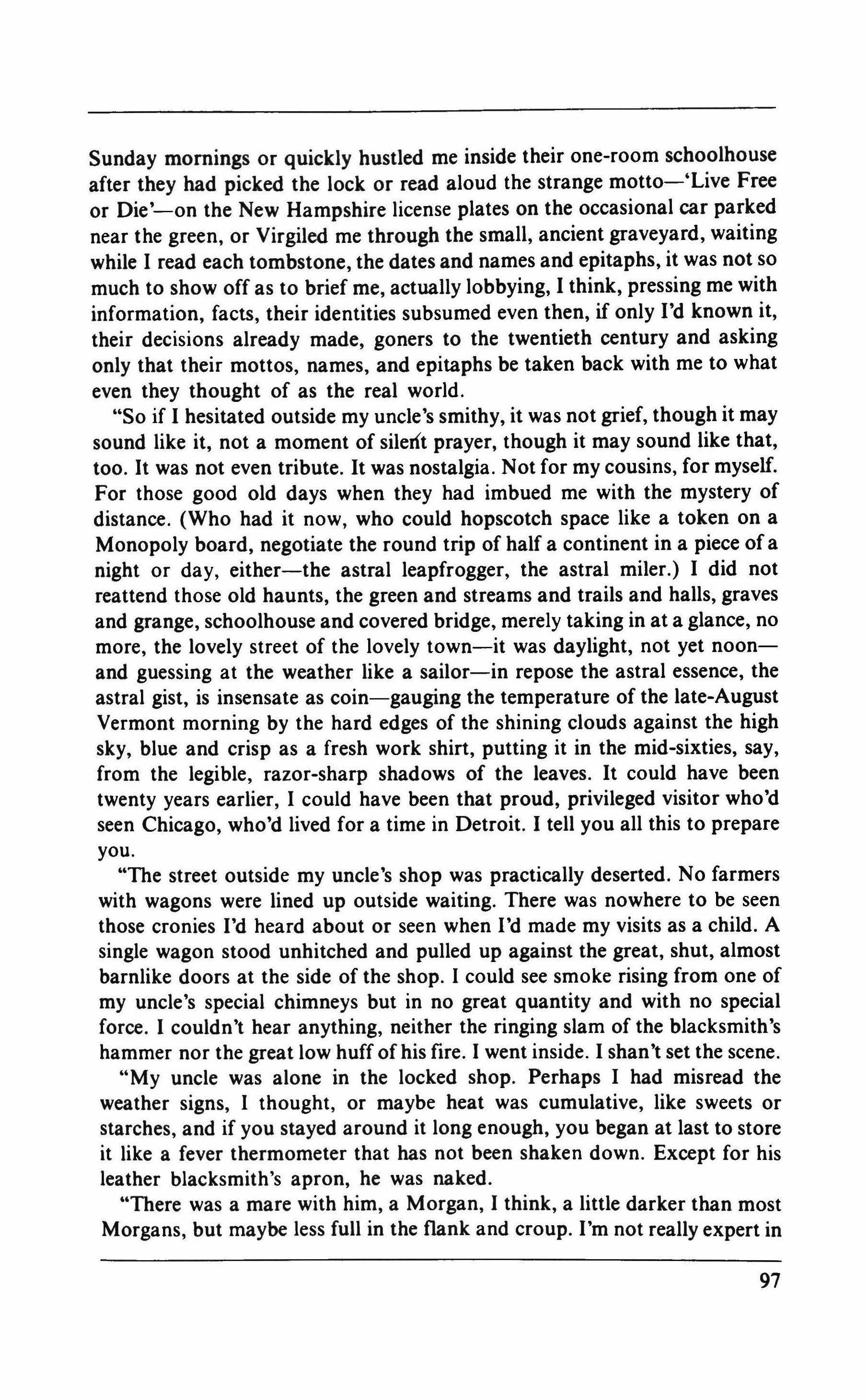
Sunday mornings or quickly hustled me inside their one-room schoolhouse after they had picked the lock or read aloud the strange motto-'Live Free or Die'-on the New Hampshire license plates on the occasional car parked near the green, or Virgiled me through the small, ancient graveyard, waiting while I read each tombstone, the dates and names and epitaphs, it was not so much to show off as to brief me, actually lobbying, I think, pressing me with information, facts, their identities subsumed even then, if only I'd known it, their decisions already made, goners to the twentieth century and asking only that their mottos, names, and epitaphs be taken back with me to what even they thought of as the real world.
"So if I hesitated outside my uncle's smithy, it was not grief, though it may sound like it, not a moment of silent prayer, though it may sound like that, too. It was not even tribute. It was nostalgia. Not for my cousins, for myself. For those good old days when they had imbued me with the mystery of distance. (Who had it now, who could hopscotch space like a token on a Monopoly board, negotiate the round trip of half a continent in a piece of a night or day, either-the astral leapfrogger, the astral miler.) I did not reattend those old haunts, the green and streams and trails and halls, graves and grange, schoolhouse and covered bridge, merely taking in at a glance, no more, the lovely street of the lovely town-it was daylight, not yet noonand guessing at the weather like a sailor-in repose the astral essence, the astral gist, is insensate as coin-gauging the temperature of the late-August Vermont morning by the hard edges of the shining clouds against the high sky, blue and crisp as a fresh work shirt, putting it in the mid-sixties, say, from the legible, razor-sharp shadows of the leaves. It could have been twenty years earlier, I could have been that proud, privileged visitor who'd seen Chicago, who'd lived for a time in Detroit. I tell you all this to prepare you.
"The street outside my uncle's shop was practically deserted. No farmers with wagons were lined up outside waiting. There was nowhere to be seen those cronies I'd heard about or seen when I'd made my visits as a child. A single wagon stood unhitched and pulled up against the great, shut, almost barnlike doors at the side of the shop. I could see smoke rising from one of my uncle's special chimneys but in no great quantity and with no special force. I couldn't hear anything, neither the ringing slam of the blacksmith's hammer nor the great low huff of his fire. I went inside. I shan't set the scene.
"My uncle was alone in the locked shop. Perhaps I had misread the weather signs, I thought, or maybe heat was cumulative, like sweets or starches, and if you stayed around it long enough, you began at last to store it like a fever thermometer that has not been shaken down. Except for his leather blacksmith's apron, he was naked.
"There was a mare with him, a Morgan, I think, a little darker than most Morgans, but maybe less full in the flank and croup. I'm not really expert in
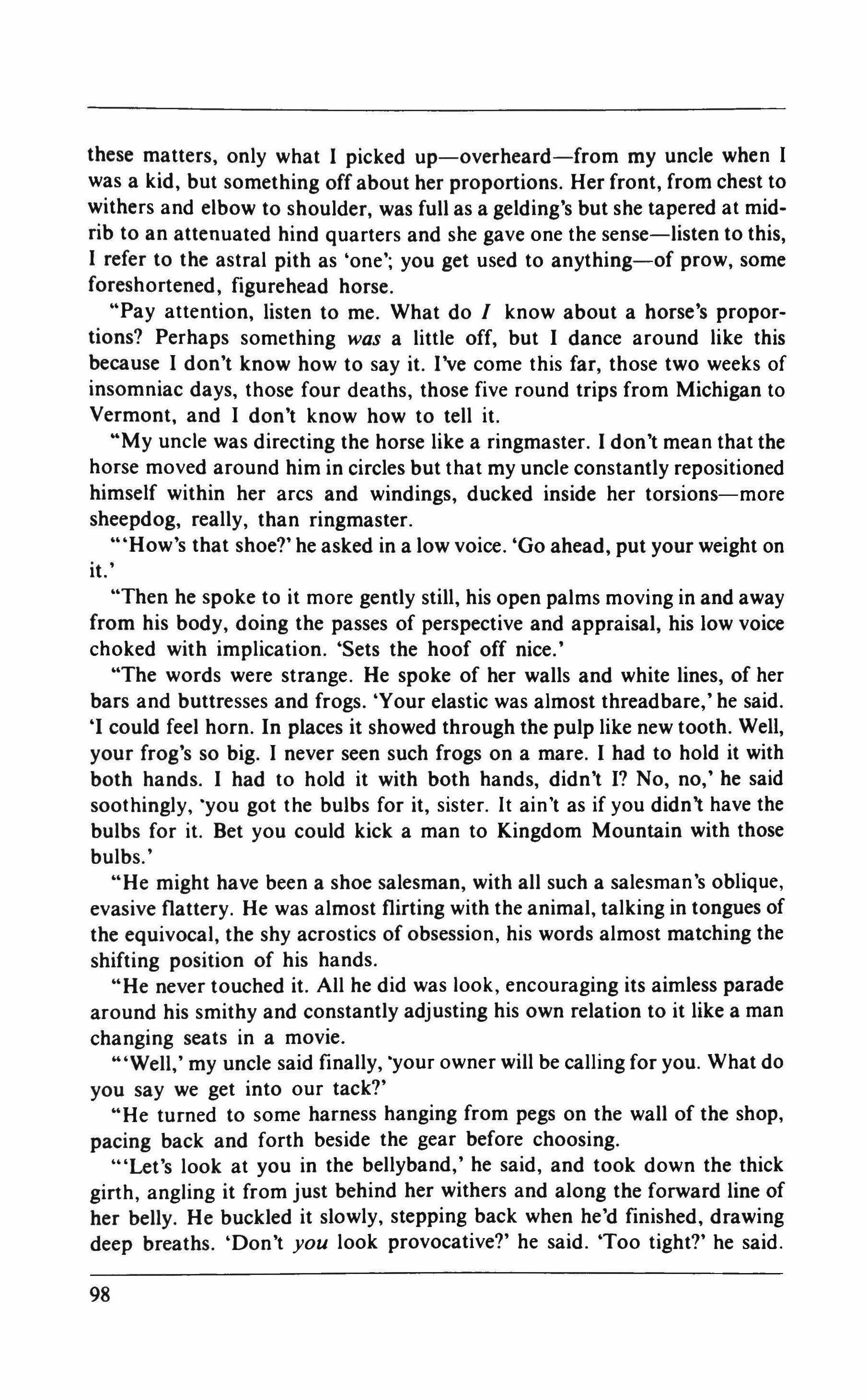
these matters, only what I picked up-overheard-from my uncle when I was a kid, but something off about her proportions. Her front, from chest to withers and elbow to shoulder, was full as a gelding's but she tapered at midrib to an attenuated hind quarters and she gave one the sense-listen to this, I refer to the astral pith as 'one'; you get used to anything-of prow, some foreshortened, figurehead horse.
"Pay attention, listen to me. What do I know about a horse's proportions? Perhaps something was a little off, but I dance around like this because I don't know how to say it. I've come this far, those two weeks of insomniac days, those four deaths, those five round trips from Michigan to Vermont, and I don't know how to tell it.
"My uncle was directing the horse like a ringmaster. I don't mean that the horse moved around him in circles but that my uncle constantly repositioned himself within her arcs and windings, ducked inside her torsions-more sheepdog, really, than ringmaster.
"'How's that shoe?' he asked in a low voice. 'Go ahead, put your weight on it.'
"Then he spoke to it more gently still, his open palms moving in and away from his body, doing the passes of perspective and appraisal, his low voice choked with implication. 'Sets the hoof off nice.'
"The words were strange. He spoke of her walls and white lines, of her bars and buttresses and frogs. 'Your elastic was almost threadbare,' he said. 'I could feel horn. In places it showed through the pulp like new tooth. Well, your frog's so big. I never seen such frogs on a mare. I had to hold it with both hands. I had to hold it with both hands, didn't I? No, no,' he said soothingly, 'you got the bulbs for it, sister. It ain't as if you didn't have the bulbs for it. Bet you could kick a man to Kingdom Mountain with those bulbs.'
"He might have been a shoe salesman, with all such a salesman's oblique, evasive flattery. He was almost flirting with the animal, talking in tongues of the equivocal, the shy acrostics of obsession, his words almost matching the shifting position of his hands.
"He never touched it. All he did was look, encouraging its aimless parade around his smithy and constantly adjusting his own relation to it like a man changing seats in a movie.
"'Well,' my uncle said finally, 'your owner will be calling for you. What do you say we get into our tack?'
"He turned to some harness hanging from pegs on the wall of the shop, pacing back and forth beside the gear before choosing.
'''Let's look at you in the bellyband,' he said, and took down the thick girth, angling it from just behind her withers and along the forward line of her belly. He buckled it slowly, stepping back when he'd finished, drawing deep breaths. 'Don't you look provocative?' he said. 'Too tight?' he said.
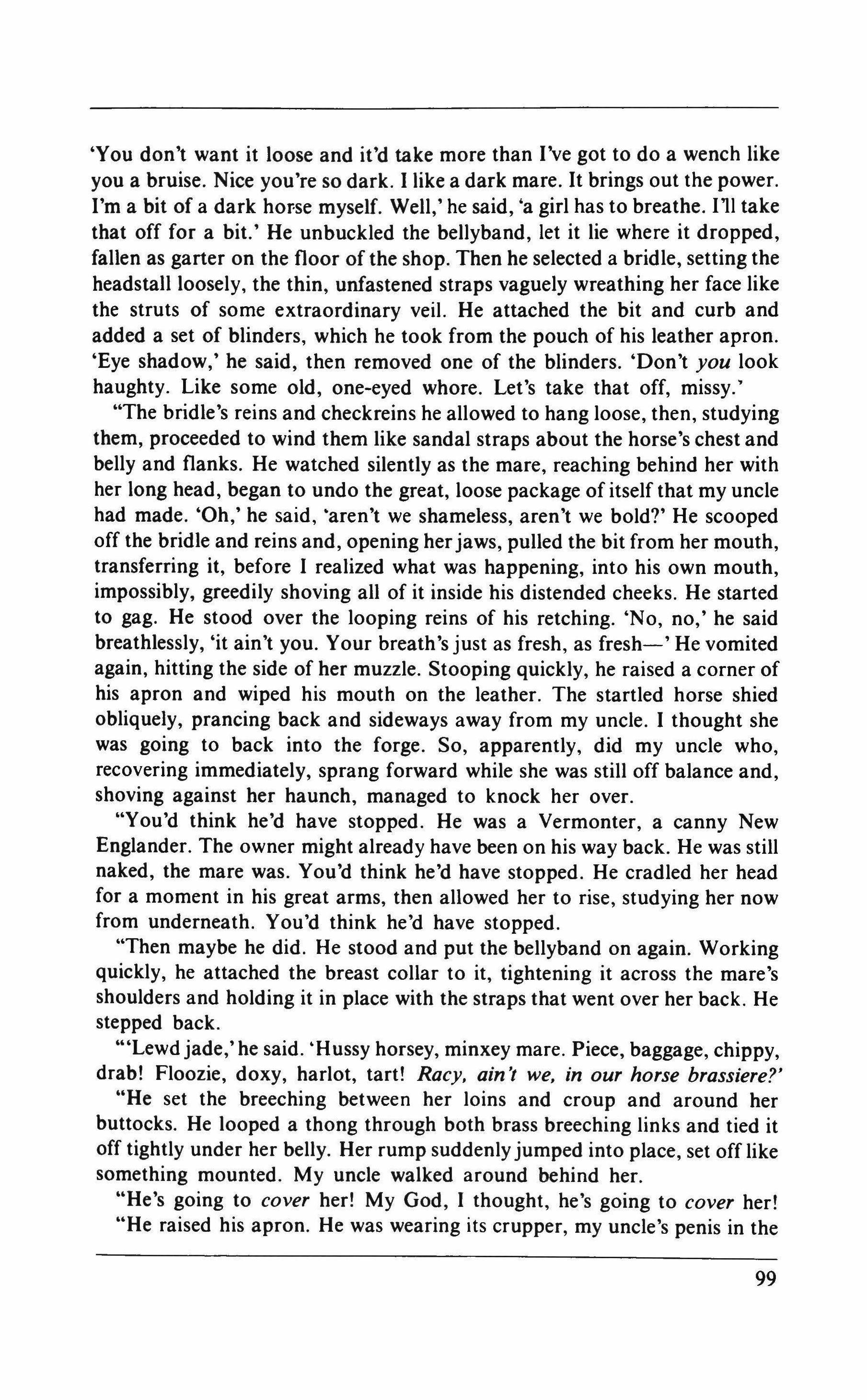
'You don't want it loose and it'd take more than I've got to do a wench like you a bruise. Nice you're so dark. I like a dark mare. It brings out the power. I'm a bit of a dark hor-se myself. Well,' he said, 'a girl has to breathe. I'll take that off for a bit.' He unbuckled the bellyband, let it lie where it dropped, fallen as garter on the floor of the shop. Then he selected a bridle, setting the headstall loosely, the thin, unfastened straps vaguely wreathing her face like the struts of some extraordinary veil. He attached the bit and curb and added a set of blinders, which he took from the pouch of his leather apron. 'Eye shadow,' he said, then removed one of the blinders. 'Don't you look haughty. Like some old, one-eyed whore. Let's take that off, missy.'
"The bridle's reins and checkreins he allowed to hang loose, then, studying them, proceeded to wind them like sandal straps about the horse's chest and belly and flanks. He watched silently as the mare, reaching behind her with her long head, began to undo the great, loose package of itself that my uncle had made. 'Oh,' he said, 'aren't we shameless, aren't we bold?' He scooped off the bridle and reins and, opening herjaws, pulled the bit from her mouth, transferring it, before I realized what was happening, into his own mouth, impossibly, greedily shoving all of it inside his distended cheeks. He started to gag. He stood over the looping reins of his retching. 'No, no,' he said breathlessly, 'it ain't you. Your breath's just as fresh, as fresh-' He vomited again, hitting the side of her muzzle. Stooping quickly, he raised a corner of his apron and wiped his mouth on the leather. The startled horse shied obliquely, prancing back and sideways away from my uncle. I thought she was going to back into the forge. So, apparently, did my uncle who, recovering immediately, sprang forward while she was still off balance and, shoving against her haunch, managed to knock her over.
"You'd think he'd have stopped. He was a Vermonter, a canny New Englander. The owner might already have been on his way back. He was still naked, the mare was. You'd think he'd have stopped. He cradled her head for a moment in his great arms, then allowed her to rise, studying her now from underneath. You'd think he'd have stopped.
"Then maybe he did. He stood and put the bellyband on again. Working quickly, he attached the breast collar to it, tightening it across the mare's shoulders and holding it in place with the straps that went over her back. He stepped back.
'''Lewd jade,' he said. 'Hussy horsey, minxey mare. Piece, baggage, chippy, drab! Floozie, doxy, harlot, tart! Racy, ain't we, in our horse brassiere?'
"He set the breeching between her loins and croup and around her buttocks. He looped a thong through both brass breeching links and tied it off tightly under her belly. Her rump suddenlyjumped into place, set off like something mounted. My uncle walked around behind her.
"He's going to cover her! My God, I thought, he's going to cover her!
"He raised his apron. He was wearing its crupper, my uncle's penis in the

leather loop. He'd been wearing it all along, big enough all along 10 wear it. 'The smith,' he said huskily, 'a mighty man is he,' and loosened the loop, rolling it down the length of his cock. Then, raising the mare's tail, he passed the loop quickly under it, buckling it to the harness so that the tail, arched now, perked in some counterfeit of swank and hauteur and pride, the beast, arranged in leather, seeming as abandoned and wanton and vainglorious as anything my uncle had yet called it, its own leathery being made for harness, for all the dressings, gauzes, slings, and splints, all the bandages, swabs, and tourniquets, all the Sam Browne belt kind of girdled loin and the intricate sexual square knots of leverage, actually prosthetic perhaps, the bandoleer and bunting arrangements, the flashy, fleshy piping of possibility.
"He's going to cover her. He's not even going to remove his apron. He's going to cover her.
"But he didn't. All he did was squat behind her on his bare feet, his long testicles grazing the floor. All he did was watch.
"Then, suddenly, the mare stiffened, locked her legs, and shit a steaming mound of manure bright as tobacco. And so did my uncle.
"Yes. I wondered about that part, too. It had been a good projection, I mean an easy one. The trip to Vermont was uneventful, I wasn't even winded. What had happened to the astral telegraph? Where was the soul semaphore, the point-to-point red alert of the heart? At first I was going to 'speak.' I had meant to. I had my objections and chastisements and pleas all ready. I had meant to speak out.
"First I didn't. Then I couldn't.
"The smith, a mighty man was he. Who denied the claims of biology and brooked no precedence in love. Who would not vary a psalm or alter an iota of eulogy and who built his coffins not to custom but to paradigm. He didn't want his children to die, he couldn't have known that they would. I can only presume that he knew the preferences of his glands, that he had identified them from the beginning, from the time he first went into blacksmithing-he could as easily have tapped the maple trees or farmed cider or made a crop of hay-perhaps before, perhaps from the moment he had first seen a horse saddled. Not only permitting the oldtimers and cronies but actually hosting them, wearing the scratchy checkered shirts (who wanted hide next to his skin or nothing) out of some native patience and politeness, some I'll-come-as-you-are deference and courtesy, like a man who manages to get down some food he can't stand simply because his hostess has taken the trouble to prepare it for him. And then permitting the children as he had permitted the cronies, not a host this time but a father, and evidently a good one, possibly a great one. Not forbidding their attendance on him even after their mother had died, only-love makes no precedence, no distinction-asking of them that they settle the pecking order themselves. The glands in abeyance, their rampage not tamed but checked, 100

whip-and-chaired up onto the heavy platforms of decorum, and his back never once turned.
"As I say, astral projection can take you so far and no further. As 1 say, it can't even get me past the Rockies. As 1 say, it is often a cold comfort, well intentioned but of as much real use as the casserole of a condolence caller. It can clear the air, though. Sometimes. A little, a little it can. That blazing sprint of the soul can clear the air, and perhaps may even explain the good weather, the briskness of the day, its sharp shadows, focused as ink on a bright page.
Kinsley was across the room watching him read, knowing, the boy believed, just where George was in the letter at any given time, not only which page but which paragraph, which sentence.
"Well?" the man said as George looked at the signature. "What do you think?"
"What did he mean 'the boy you show this letter to'?"
"Ah," the big man said.
"What did he mean?"
Kinsley smiled. "Perhaps only that we're being watched."
"Watched?" George said.
"It's the West he can't get to, not Florida." George looked in the comers of the room, on the lookout for the telltale point of greasy light Ringlinger had spoken of. "111 tell you what I think," Kinsley said. "I think it's the pornography business we're in. Death and the supernatural are merely the covers it takes. I think we're in the pornography business, that the religion we practice, the hoodoo consolation we give away, is sexual. I'd like you to work the seances with me. 1 want you to be my contact, my messenger boy from Death. You're not twelve yet. I want you to work nude. No pasties, no Indian loincloth or oversize dressing gown with its planets and crescents and five-points-to-the-star astronomy. Naked. Nude. No one would touch you. You won't have to touch anyone. It will be dark. No one will even be able to make out your face.
"It's a good idea, you know. We'd make a lot of money. There's so much lust. The stitching of sex everywhere, common as knot, pandemic as signature. More lust and combination than the ingredients in recipes. Ask your parents. It's a jimcrack idea.
"You know," Kinsley said, "it's a shame finally. It's all real, you know. The supernatural plane is real as a breadboard. Astral projection is real. All of it is. I'm certain of my facts. (I get past the Rockies.) Last night 1 visited my dead. It's just you can't always reproduce it for them. It's just that you have to be alone. Isn't that right, Mr. Ringlinger? Isn't that right, sir? Am 1 lying to this boy?"
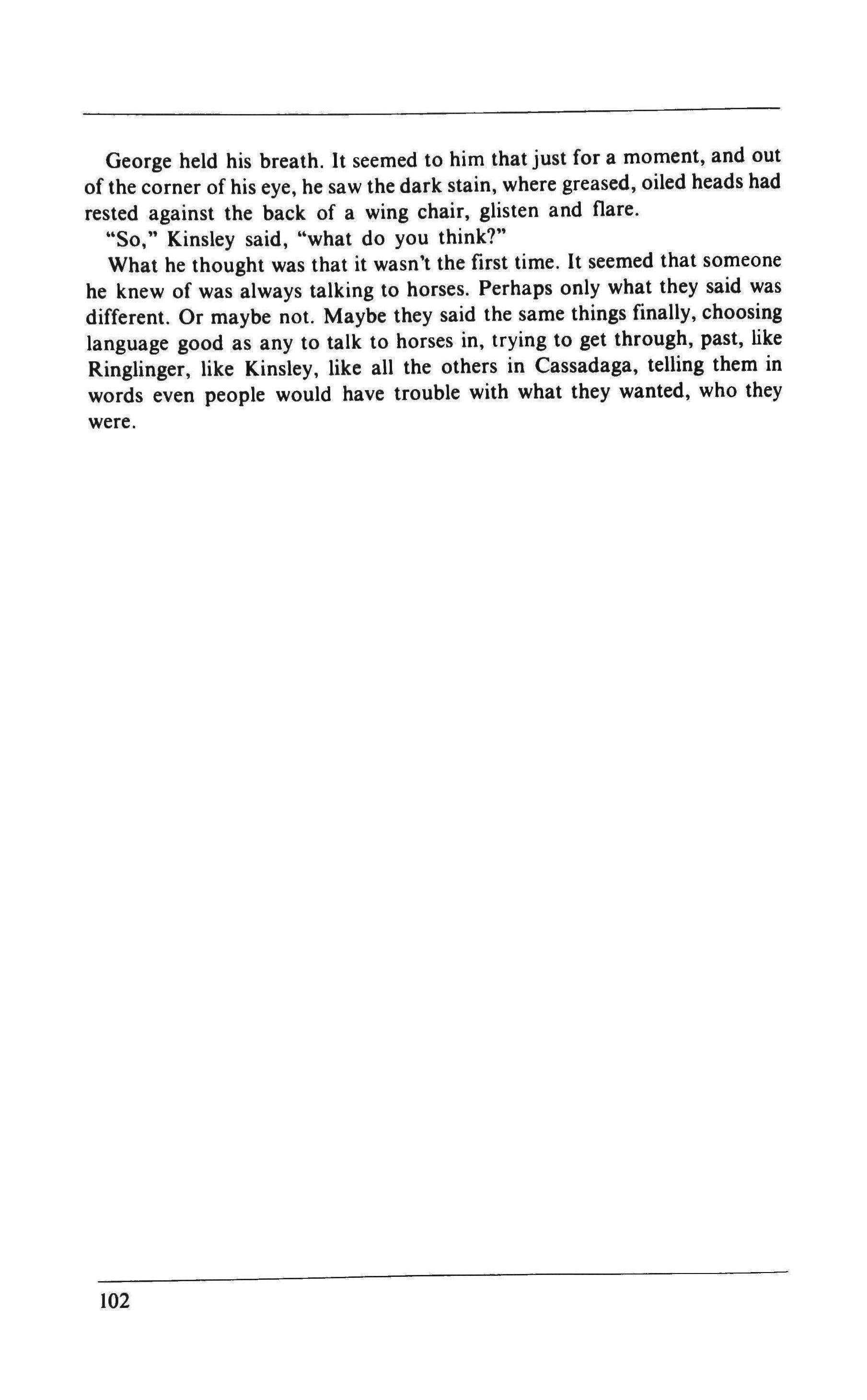
George held his breath. It seemed to him that just for a moment, and out of the corner of his eye, he saw the dark stain, where greased, oiled heads had rested against the back of a wing chair, glisten and flare.
"So," Kinsley said, "what do you think?"
What he thought was that it wasn't the first time. It seemed that someone he knew of was always talking to horses. Perhaps only what they said was different. Or maybe not. Maybe they said the same things finally, choosing language good as any to talk to horses in, trying to get through, past, like Ringlinger, like Kinsley, like all the others in Cassadaga, telling them in words even people would have trouble with what they wanted, who they were.
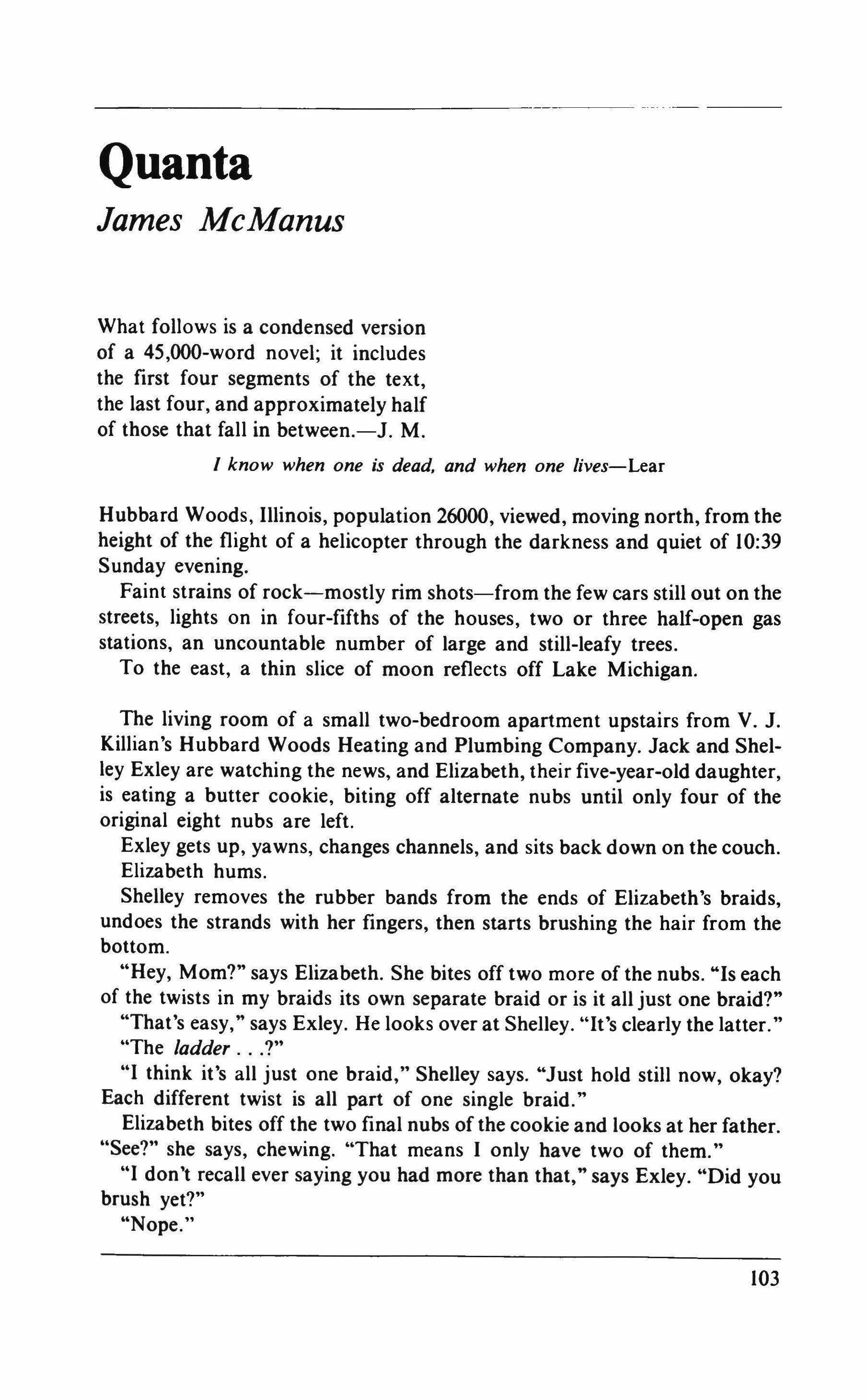
What follows is a condensed version of a 45,OOO-word novel; it includes the first four segments of the text, the last four, and approximately half of those that fall in between.-J. M.
I know when one is dead. and when one lives-Lear
Hubbard Woods, Illinois, population 26000, viewed, moving north, from the height of the flight of a helicopter through the darkness and quiet of 10:39 Sunday evening.
Faint strains of rock-mostly rim shots-from the few cars still out on the streets, lights on in four-fifths of the houses, two or three half-open gas stations, an uncountable number of large and still-leafy trees.
To the east, a thin slice of moon reflects off Lake Michigan.
The living room of a small two-bedroom apartment upstairs from V. J. Killian's Hubbard Woods Heating and Plumbing Company. Jack and Shelley Exley are watching the news, and Elizabeth, their five-year-old daughter, is eating a butter cookie, biting off alternate nubs until only four of the original eight nubs are left.
Exley gets up, yawns, changes channels, and sits back down on the couch.
Elizabeth hums.
Shelley removes the rubber bands from the ends of Elizabeth's braids, undoes the strands with her fingers, then starts brushing the hair from the bottom.
"Hey, Mom?" says Elizabeth. She bites off two more of the nubs. "Is each of the twists in my braids its own separate braid or is it all just one braid?"
"That's easy," says Exley. He looks over at Shelley. "It's clearly the latter."
"The ladder ?"
"I think it's all just one braid," Shelley says. "Just hold still now, okay? Each different twist is all part of one single braid."
Elizabeth bites off the two final nubs of the cookie and looks at her father. "See?" she says, chewing. "That means I only have two of them."
"I don't recall ever saying you had more than that," says Exley. "Did you brush yet?"
"Nope."

"How's the tooth?"
Still nibbling, Elizabeth rounds off the edge of what's left of the cookie, careful to keep intact the ring she's just fashioned, then looks through the hole at her father.
"Still loose?" he asks.
"Yup."
"Honey, please," says Shelley. "Almost done now."
Elizabeth swallows the cookie ring whole with one bite. "Ummm," she says, rubbing her stomach.
"I think
Shelley puts down the brush and sits back.
"Still loose," says Elizabeth, turning and facing her mother. "It's still kinda loose, Mommy." She moves one of her lower incisors back and forth with her thumb. "'Ook."
"Hmm."
Exley glances up at the clock on the wall, then turns and looks at Elizabeth. Elizabeth stares back at him, grinning, moving her tooth with her tongue now.
"I would say," Exley says, "that it's-" Elizabeth jumps up off the couch. "Good night now, Ed Bradley for CBS News." She switches off the TV. "Didn't you know it's way past my bedtime either?"
"Way past," says Shelley, slowly getting up off the couch.
Exley also stands up.
"Can we still read a story tonight?" asks Elizabeth. Exley hoists her up by her armpits, lets her hang from his neck for a second, then crosses his forearms under her rump to support her.
"Just one short short story, Dad? Please?"
"No stories tonight, I don't think," Exley says. He lets go with one hand and brushes some crumbs from her robe. "It's much, much too late."
"But just one though, Daddy? Come on." She wedges her forehead between his neck and his shoulder. "Okay?"
"Esbeth," says Shelley, standing beside them now. "It's already an hour and a half-"
"No stories, E," Exley says. "Not tonight."
"Just one real short tuck-in chat then?"
Exley carries her out of the living room and down the short hall to the bathroom. "We'll see," he says. "This is too damn late for you, E. Really."
She squeezes him. "Yes?"
"Maybe."
"Maybe yes?"
"Maybe," he says. He lets her down until her toes touch the small oval rug in front of the sink, lets her go. "Better brush now."

"Yes a story?"
"Yes one very short chat. An extremely-"
"Just but how short of one?"
"Just brush now," says Exley.
A Mustang and a Rabbit pull into the small, dark, empty parking lot alongside Hubbard Woods High School.
The Mustang gets parked between two yellow lines, its lights are shut off, its driver climbs out and locks it.
The driver of the Mustang gets into the Rabbit, and the Rabbit pulls out of the parking lot.
Exley brushes along Shelley's spine with the backs of his knuckles as she begins to get out of her skirt. There is silence.
Shelley reaches behind her and unhooks her bra, slips it down off her arms, turns and faces him. She is twenty weeks pregnant.
They rest their hands on each other's shoulders and-their lips barely touching-start kissing.
Shelley turns then, drapes the bra over the back of a rocking chair, slips off her panties. Reaching around her, Exley touches one of her nipples, kisses the back of her neck.
"She asleep yet?"
Exley says nothing. He reaches around with his other hand, takes her left nipple between his thumb and his forefinger, pinches and twists it. Shelley breathes out hard through her mouth.
All of a sudden Exley says, "Shit."
"What?"
"I haven't got any shirts for this week."
Shelley does not tum around. "I thought She switches the overhead light off. "What time does Zengelers open?"
Exley takes off the shirt he is wearing, grabs a hanger from out of the closet, hangs up the shirt. "I haven't even taken them in yet."
"Mmm."
"Jesus."
"Well
Exley leans over then and touches her hip with his lips. "You're right then," she says, reaching back, stroking him with the side of her wrist.
"What?"
Shelley puts both hands onto her belly, massages herself for a second, then slides her hands onto her hips. "You haven't got any shirts for this week."
He bites her softly on the back of her thigh, bites her harder.
She rotates her palm on his ear. "Trouble city," she says, breathing in.
"Funky shirts. She asleep yet?"

He continues to kiss her.
"Is she?"
"She's asleep yet."
They do not speak now for more than a minute.
"My eyes aren't used to the darkness
Shelley puts her hands on his head and leans back as Exley kneels down in front of her. She breathes out and shivers.
A small fist knocks on the door now. They look at each other.
Monday, the first day of the fourth week of school.
There are seven classrooms, four on one side of the hallway and three on the other, on the first floor of the Hubbard Woods Elementary School. They are arranged in descending order from fourth grade through kindergarten.
The hallway is empty. Various noises and voices can be heard from inside the classrooms. The gray tile floor of the hallway has been waxed just that weekend.
From the first grade room, the last room on the right, comes the sound of one flute's arpeggios.
Across the hall, on the wall to the left of the door, is a brown, leafless tree that's been cut from a large piece of cardboard; there are creases from when it had still been a box. In an arc above its branches, also in cardboard, are the words FALL INTO KINDERGARTEN. Around the base of the tree is a cluster of seventeen maple leaves that have been cut from scarlet, orange, purple, and yellow construction paper. Each leaf bears the name of one of the kindergartners: Colin, Machiko, John, Lowell, Elizabeth, Kelly, Gordie, Heide, Carlos, Genevieve R., Mark, Audrey, Jimmy, Genevieve W., and Max. The two other names are the names of the teachers, Mrs. Witt and Mrs. Zigulski.
Tentatively, but soon with more confidence, a second flute joins the first one.
Beyond the kindergarten, at the end of the hallway, are three steel-andglass exit doors, which lead out onto the playground.
The music of two flutes continues.
It is cool out, and still, for early October.
Three Hubbard Woods High School cheerleaders, wearing their green and white uniforms, are crammed together in the front seat of a small red Datsun station wagon, laughing hysterically. The girl who is driving is smoking a cigarette.
"Old Dan Rather's not half bad himself," says the girl on the right. They begin to calm down.
"Oh yeah," says the driver.
"I Don't Remember" comes on the radio now, and the middle girl turns up

the volume. All three girls begin to yodel and shout along with Peter Gabriel, shifting their weight on the seat with the chords, bumping and grinding.
The sun shines in long streaks and shafts through the trees along Sheridan Road. Its reflection slides jaggedly over the glass of the Datsun and dazzles the left side-view mirror. The leaves on the trees overhead are the colors of the paper leaves outside the kindergarten, only much more spectacular and vivid. To the left, beyond a succession of small hills and mansions and trees, is Lake Michigan.
The girls sing the gibberish chorus along with the backup singers.
Near the Elder Lane Beach they pass a Hubbard Woods squad car with its radar gun pointing north, and they wave. The Datsun is doing three miles over the speed limit. The girl on the right rolls down her window, lights a cigarette, rests her elbow outside. "It's great out," she says.
The driver just nods.
"Really," says the girl in the middle.
They turn right at Winnetka Avenue and drive past two more blocks of houses; the houses here are not quite so large. The driver rolls down her window five or six inches and tosses her cigarette out.
Two of the gym classes are meeting outside on the tennis courts; there are orange and yellow balls everywhere. The girls honk and wave.
They drive past the high school's main building now, eyes peeled for a parking spot, then turn right at Birch Street. "Once in a Lifetime" comes on now, and the girl on the right whistles and rolls up her window.
They park in the far corner of the small student lot off of Birch; it's the only spot left. They get out, lock both front doors, and begin walking between the two rows of cars toward the school.
Suddenly the girl who'd been driving stops, turns around and says, "Shit," then starts running back toward the Datsun.
The other two call back to her, slapping their thighs, saying they're "gonna be late."
The driver unlocks the door, rolls the window all the way up, presses the lock button down, and slams the door shut. Then she runs to catch up with her friends.
The girl who'd sat on the right makes a joke now, and all three girls start to laugh.
"This is no wave," she says.
As they approach the end of the parking lot, a red-haired boy calls out to them from a third-floor classroom window. His exact words are not comprehensible; it is something about "days in a row." The girl who'd sat in the middle grimaces, looks at her friends, then calls up to the boy in the window.
Right away the other two girls start to hoot, mimicking the way she'd responded. "Wha'?" says the driver, raising her voice to a whine and making herself sound gullible and dumb. "Huh?"

As the second word leaves her lips there's a loud blast behind them. A light blue Mustang is parked about twenty-five feet from where they are standing; they'd just walked right past it. Its hood is blown offand the entire front end of the car has burst into flames.
All three girls duck down and turn simultaneously. They watch as the Mustang's hood lands on the roof of a car in the opposite row and bounces back up in the air.
"Holy shit."
The driver and the girl who'd sat in the middle begin crawling toward the end of the row. The other girl starts to sob. She is still holding onto her cigarette, pinching it between two fingers.
There's a second blast now, even louder, as the Mustang's gas tank explodes.
The red-haired boy's face disappears from the window then reappears almost immediately. It's beenjoined now by two other faces. By this point all three cheerleaders are crouched down behind the last car in the row.
An arc of translucent heat shimmers up over what's left of the Mustang. The twisted hood lies on the sidewalk.
A white Rabbit drives by on Birch, stops at the corner, turns right. Dozens of faces appear at the windows along all three floors of the high school.
Thick black smoke rises up over the parking lot.
There is almost no wind, almost silence.
Audrey stands in the center of the carpeted play area, opening and closing her eyes. "I'm hungry," she says.
"Let's draw," says Genevieve Webster. "Let's go draw."
"Hey, yeah," Audrey says.
They are surrounded by six large bay windows. Numbers, letters of the alphabet, children's faces in watercolor, and pictures of animals are stapled and taped over the windows and onto the wall space between and beneath them. The bright sun outside lights the room.
Russell is talking to Colin, Mrs. Zigulski, and John at one ofthe tables. It is drawing time. The six low wooden tables are arranged in a rectangle, which extends from the play area into the rest of the room.
"Lisa's big now," says Colin. "But not that big because she still has to wear Pampers."
"Does your Mom let you help change her?" says Mrs. Zigulski. "Sure does," says Russell. "All the time."
"But doesn't it stink though?" says Colin. "Yup," says Russell. "Sure does."
Kelly, Machiko, Genevieve Rawls, and Elizabeth are using their table to draw. They are silent. Genevieve and Machiko are drawing their dads;

Machiko is making her dad's hair light blue. Kelly and Elizabeth are working on pigs.
"I keep have to unrasing it," says Kelly, rubbing out part of a hand. "Me too," says Elizabeth. "It's erase it. E."
Kelly looks over at her.
"My name isn't Unlizabeth, you know."
Kelly giggles.
Mrs. Witt, Heide, and Max are feeding Mrs. Esther G. Hubbard, the garter snake.
Mrs. Zigulski stands behind Colin. "That's a real good wheel, Colin," she says. "Is that your new bike?"
"Yup," says Colin. "It's a dirt bike."
"I got one, too," says Russell. "Mine is gonzo."
Mrs. Zigulski looks up at the clock now. "Do you think you're ready to pass out your snack now, Russell?" she says.
Russell jumps up. "Sure am," he says.
Mrs. Zigulski and Russell go over by the sink and refrigerator. The snack he has brought is a one-gallon jug of apple cider and two loaves of zucchini bread.
Mrs. Witt comes over to help them. Mrs. Zigulski fills paper cups with the cider while Mrs. Witt slices the bread. Russell takes each slice and places it onto a red-and-white checkered napkin, then arranges the napkins in two neat rows along the edge of one of the tables.
"Did you help your Mom bake this?" says Mrs. Witt.
"Sure did," Russell says. He looks at Mrs. Zigulski.
"That must have been fun."
Russell just nods.
"Come and get it now, friends," says Mrs. Witt.
Four of the children are already there at the snack table. Most of the others now stop what they're doing and start heading in that direction.
"I want a whole of one," says Genevieve Webster.
"Me too," says Audrey.
"Look at this delicious zucchini bread that Russell's Mom baked for us," says Mrs. Witt.
The children crowd around the small snack table.
"And Russell," says Mrs. Zigulski.
Russell starts biting his fingernails. He is smiling.
"Try not to spill your cider now, Mark," says Mrs. Zigulski.
"You too, Heide," says Mrs. Witt.
Room 216, Stevenson HaU, the University of Illinois at Chicago Circle. Jack Exley's ten o'clock section of Comp 101.

"Before I forget," Exley says, standing up. "Pass those comparison and contrast papers in to your left."
There are groans.
"Before he forgets," someone says.
Exley moves to his right and begins gathering together the small piles of essays at the end of each row.
"That thing's due today?"
There is laughter.
"Yours is due next Monday, Terry," says Exley. "It's only everyone else's I'm gonna collect now."
"Am I gonna lose points, Mr. Exley?"
"Kind of looks that way, Terry."
There is laughter.
"About how many?"
"Oh how about, say, twenty-five percent of the total."
"But I was sick, I think, on the day you assigned it."
General groaning and tsking.
Exley stops smiling. "Terry," he says, staring straight at the student. "Talk to me after class."
There is silence.
"111 try to get these back to you by Wednesday."
"Or Thursday," says someone.
Laughter again.
"No sense rushin' yourself."
Exley places the essays on top of his briefcase.
"Now," he says, turning around. "As promised on Friday, the comma splice.
General book shuffling and groans.
"That's pages forty-seven to fifty in the handbook."
Someone says something in the back of the room.
"And which you all," says Exley, "or most of you, seem particularly fond of constructing."
He turns and writes on the board: John loves Mary Mary loves Alex, saying "Part of your continuing acculturation, by the way, into ruling-class values.
He faces the room again. There is silence.
"Derrick," he says, nodding toward a student in the back of the room.
"How would you punctuate this?"
Derrick looks down at his handbook.
"This sentence here, Derrick," says Exley, tapping the blackboard with chalk. "This sentence quote unquote."
"Well," says Derrick.
There is silence. Two hands go up. Exley waits.
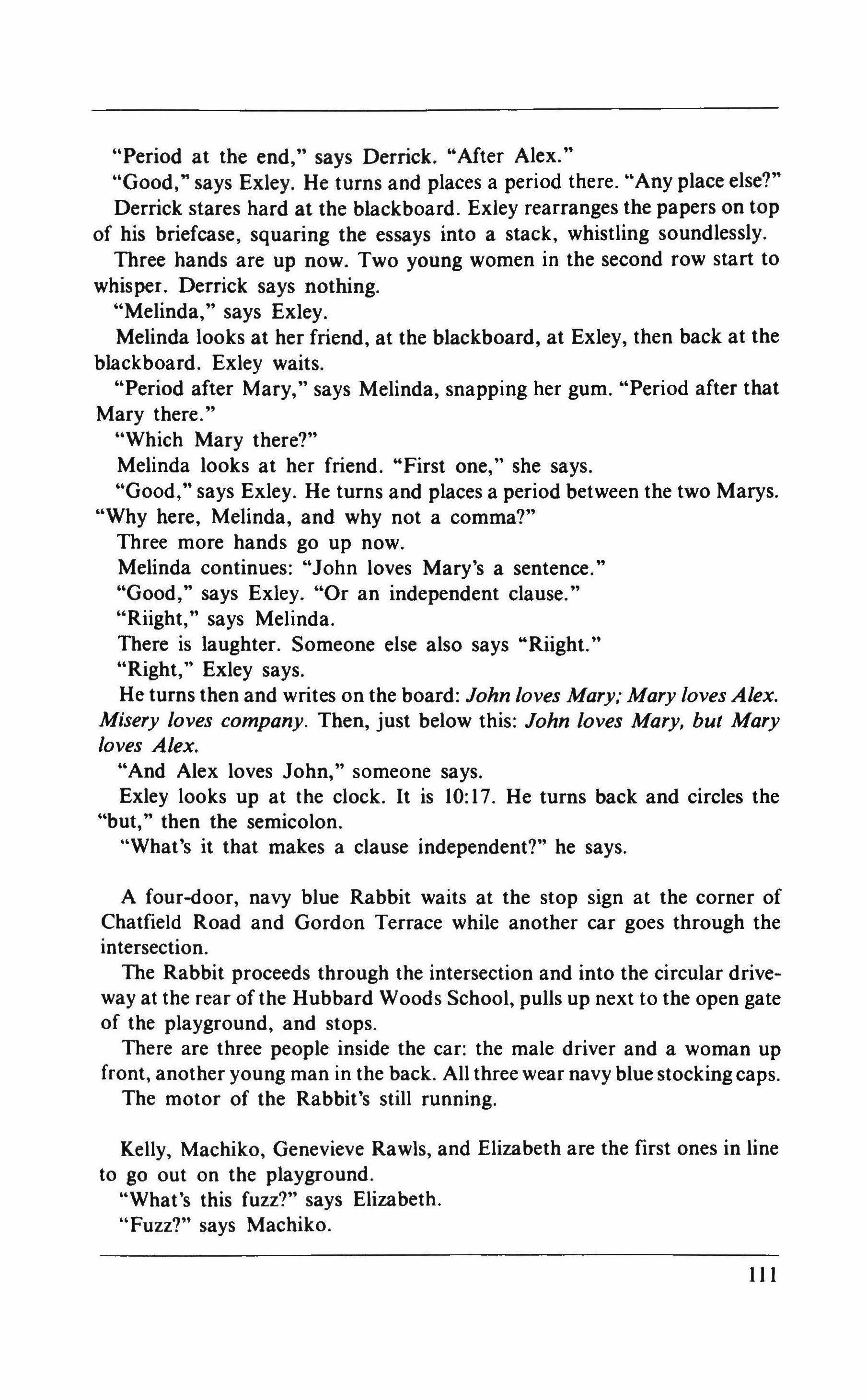
"Period at the end," says Derrick. "After Alex."
"Good," says Exley. He turns and places a period there. "Any place else?"
Derrick stares hard at the blackboard. Exley rearranges the papers on top of his briefcase, squaring the essays into a stack, whistling soundlessly.
Three hands are up now. Two young women in the second row start to whisper. Derrick says nothing.
"Melinda," says Exley.
Melinda looks at her friend, at the blackboard, at Exley, then back at the blackboard. Exley waits.
"Period after Mary," says Melinda, snapping her gum. "Period after that Mary there."
"Which Mary there?"
Melinda looks at her friend. "First one," she says. "Good," says Exley. He turns and places a period between the two Marys. "Why here, Melinda, and why not a comma?"
Three more hands go up now.
Melinda continues: "John loves Mary's a sentence." "Good," says Exley. "Or an independent clause." "Riight," says Melinda.
There is laughter. Someone else also says "Riight."
"Right," Exley says.
He turns then and writes on the board: John loves Mary; Mary loves Alex. Misery loves company. Then, just below this: John loves Mary, but Mary loves Alex.
"And Alex loves John," someone says.
Exley looks up at the clock. It is 10: 17. He turns back and circles the "but," then the semicolon.
"What's it that makes a clause independent?" he says.
A four-door, navy blue Rabbit waits at the stop sign at the corner of Chatfield Road and Gordon Terrace while another car goes through the intersection.
The Rabbit proceeds through the intersection and into the circular driveway at the rear ofthe Hubbard Woods School, pulls up next to the open gate of the playground, and stops.
There are three people inside the car: the male driver and a woman up front, another young man in the back. All three wear navy blue stocking caps. The motor of the Rabbit's still running.
Kelly, Machiko, Genevieve Rawls, and Elizabeth are the first ones in line to go out on the playground.
"What's this fuzz?" says Elizabeth. "Fuzz?" says Machiko.
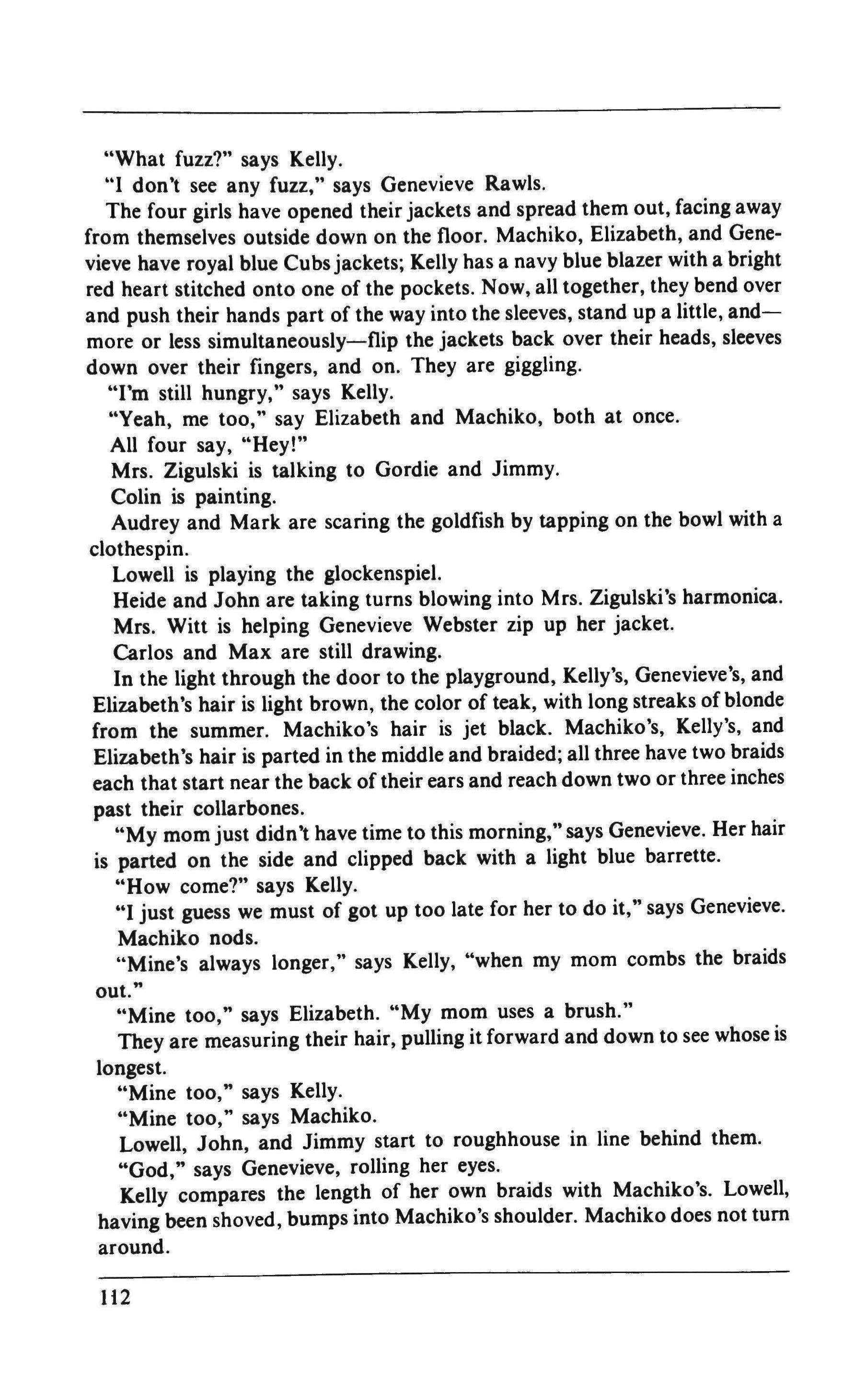
"What fuzz?" says Kelly.
"I don't see any fuzz," says Genevieve Rawls.
The four girls have opened their jackets and spread them out, facing away from themselves outside down on the floor. Machiko, Elizabeth, and Genevieve have royal blue Cubs jackets; Kelly has a navy blue blazer with a bright red heart stitched onto one of the pockets. Now, all together, they bend over and push their hands part of the way into the sleeves, stand up a little, andmore or less simultaneously-flip the jackets back over their heads, sleeves down over their fingers, and on. They are giggling.
"I'm still hungry," says Kelly.
"Yeah, me too," say Elizabeth and Machiko, both at once.
All four say, "Hey!"
Mrs. Zigulski is talking to Gordie and Jimmy.
Colin is painting.
Audrey and Mark are scaring the goldfish by tapping on the bowl with a clothespin.
Lowell is playing the glockenspiel.
Heide and John are taking turns blowing into Mrs. Zigulski's harmonica.
Mrs. Witt is helping Genevieve Webster zip up her jacket.
Carlos and Max are still drawing.
In the light through the door to the playground, Kelly's, Genevieve's, and Elizabeth's hair is light brown, the color of teak, with long streaks of blonde from the summer. Machiko's hair is jet black. Machiko's, Kelly's, and Elizabeth's hair is parted in the middle and braided; all three have two braids each that start near the back of their ears and reach down two or three inches past their collarbones.
"My mom just didn't have time to this morning," says Genevieve. Her hair is parted on the side and clipped back with a light blue barrette.
"How come?" says Kelly.
"I just guess we must of got up too late for her to do it," says Genevieve. Machiko nods.
"Mine's always longer," says Kelly, "when my mom combs the braids out."
"Mine too," says Elizabeth. "My mom uses a brush."
They are measuring their hair, pulling it forward and down to see whose is longest.
"Mine too," says Kelly.
"Mine too," says Machiko.
Lowell, John, and Jimmy start to roughhouse in line behind them.
"God," says Genevieve, rolling her eyes.
Kelly compares the length of her own braids with Machiko's. Lowell, having been shoved, bumps into Machiko's shoulder. Machiko does not tum around.
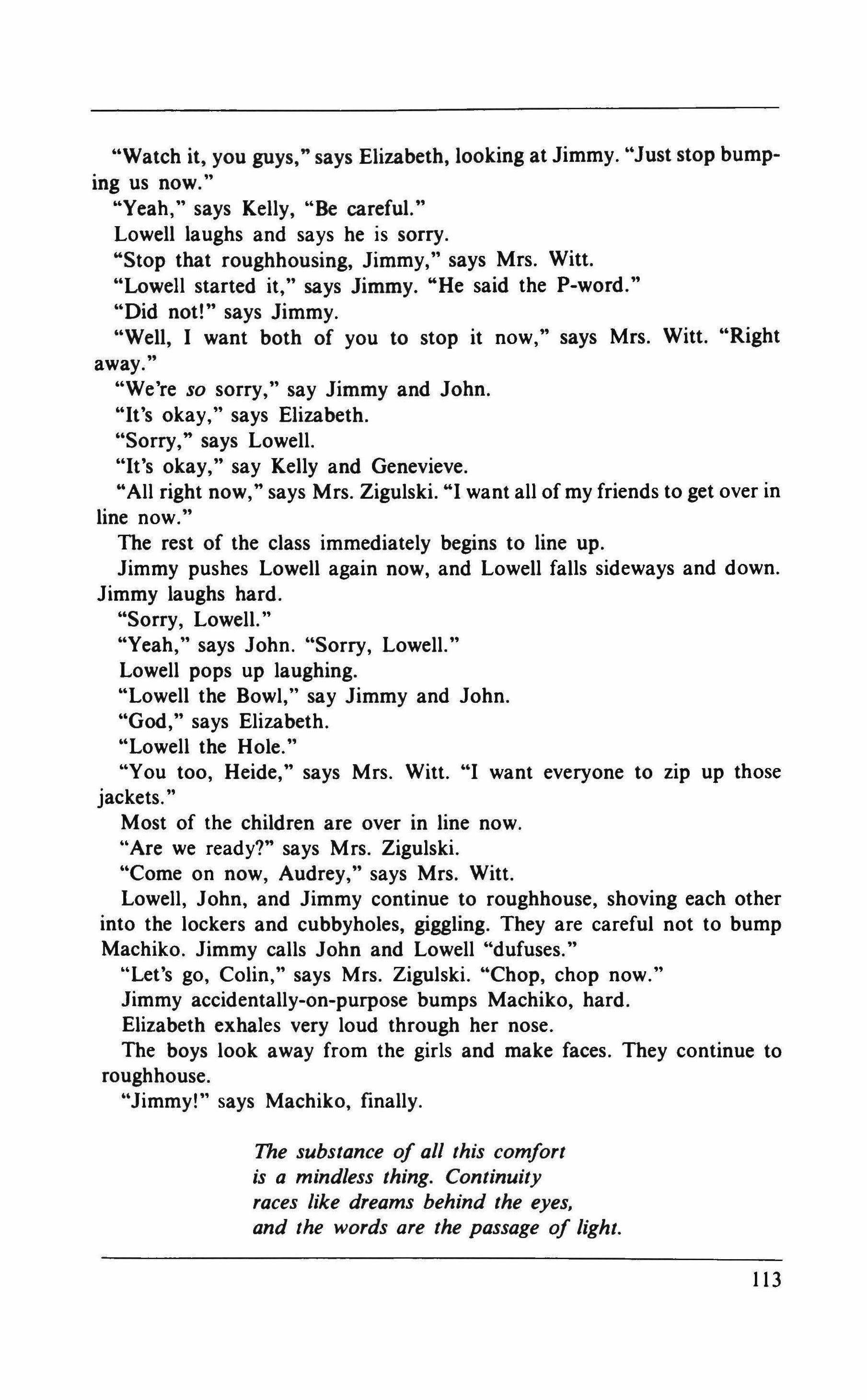
"Watch it, you guys," says Elizabeth, looking at Jimmy. "Just stop bumping us now."
"Yeah," says Kelly, "Be careful."
Lowell laughs and says he is sorry.
"Stop that roughhousing, Jimmy," says Mrs. Witt.
"Lowell started it," says Jimmy. "He said the P-word."
"Did not!" says Jimmy.
"Well, I want both of you to stop it now," says Mrs. Witt. "Right away."
"We're so sorry," say Jimmy and John.
"It's okay," says Elizabeth.
"Sorry," says Lowell.
"It's okay," say Kelly and Genevieve.
"All right now," says Mrs. Zigulski, "I want all of my friends to get over in line now."
The rest of the class immediately begins to line up.
Jimmy pushes Lowell again now, and Lowell falls sideways and down. Jimmy laughs hard.
"Sorry, Lowell."
"Yeah," says John. "Sorry, Lowell."
Lowell pops up laughing.
"Lowell the Bowl," say Jimmy and John.
"God," says Elizabeth.
"Lowell the Hole."
"You too, Heide," says Mrs. Witt. "I want everyone to zip up those jackets.
Most of the children are over in line now.
"Are we ready?" says Mrs. Zigulski.
"Come on now, Audrey," says Mrs. Witt.
Lowell, John, and Jimmy continue to roughhouse, shoving each other into the lockers and cubbyholes, giggling. They are careful not to bump Machiko. Jimmy calls John and Lowell "dufuses."
"Let's go, Colin," says Mrs. Zigulski. "Chop, chop now."
Jimmy accidentally-on-purpose bumps Machiko, hard.
Elizabeth exhales very loud through her nose.
The boys look away from the girls and make faces. They continue to roughhouse.
"Jimmy!" says Machiko, finally.
The substance of all this comfort is a mindless thing. Continuity races like dreams behind the eyes, and the words are the passage of light.
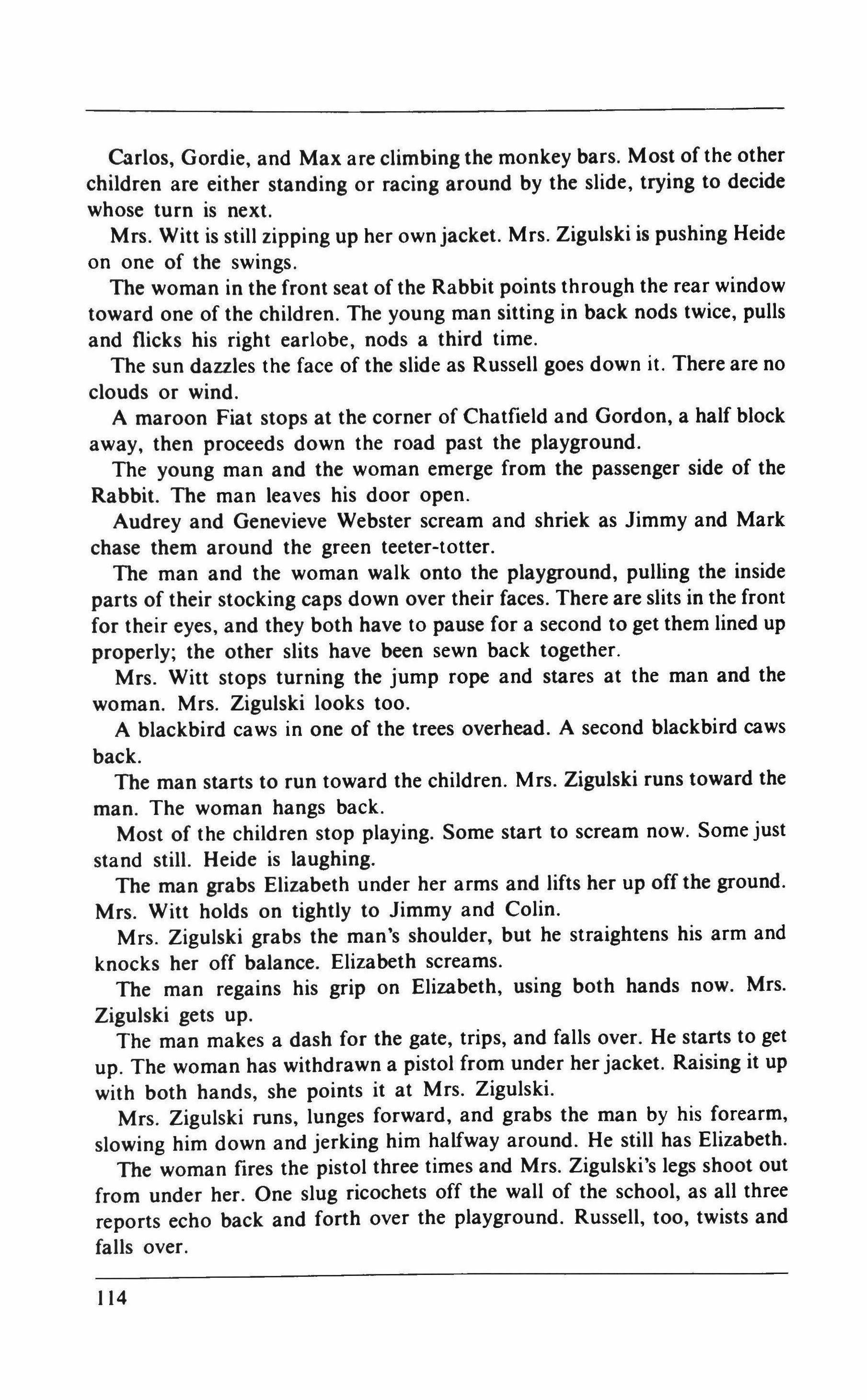
Carlos, Gordie, and Max a re climbing the monkey bars. Most of the other children are either standing or racing around by the slide, trying to decide whose turn is next.
Mrs. Witt is still zipping up her own jacket. Mrs. Zigulski is pushing Heide on one of the swings.
The woman in the front seat of the Rabbit points through the rear window toward one of the children. The young man sitting in back nods twice, pulls and flicks his right earlobe, nods a third time.
The sun dazzles the face of the slide as Russell goes down it. There are no clouds or wind.
A maroon Fiat stops at the corner of Chatfield and Gordon, a half block away, then proceeds down the road past the playground.
The young man and the woman emerge from the passenger side of the Rabbit. The man leaves his door open.
Audrey and Genevieve Webster scream and shriek as Jimmy and Mark chase them around the green teeter-totter.
The man and the woman walk onto the playground, pulling the inside parts of their stocking caps down over their faces. There are slits in the front for their eyes, and they both have to pause for a second to get them lined up properly; the other slits have been sewn back together.
Mrs. Witt stops turning the jump rope and stares at the man and the woman. Mrs. Zigulski looks too.
A blackbird caws in one of the trees overhead. A second blackbird caws back.
The man starts to run toward the children. Mrs. Zigulski runs toward the man. The woman hangs back.
Most of the children stop playing. Some start to scream now. Some just stand still. Heide is laughing.
The man grabs Elizabeth under her arms and lifts her up off the ground. Mrs. Witt holds on tightly to Jimmy and Colin.
Mrs. Zigulski grabs the man's shoulder, but he straightens his arm and knocks her off balance. Elizabeth screams.
The man regains his grip on Elizabeth, using both hands now. Mrs. Zigulski gets up.
The man makes a dash for the gate, trips, and falls over. He starts to get up. The woman has withdrawn a pistol from under her jacket. Raising it up with both hands, she points it at Mrs. Zigulski.
Mrs. Zigulski runs, lunges forward, and grabs the man by his forearm, slowing him down and jerking him halfway around. He still has Elizabeth.
The woman fires the pistol three times and Mrs. Zigulski's legs shoot out from under her. One slug ricochets off the wall of the school, as all three reports echo back and forth over the playground. Russell, too, twists and falls over.

The woman follows Elizabeth and the man through the gate, then jumps into the Rabbit ahead of them. Elizabeth continues to scream. The man tosses Elizabeth in next to the woman then climbs in himself, slamming the door shut behind him.
The Rabbit pulls out of the driveway and heads at a moderate speed up Gordon Terrace. The three adult occupants pull off their stocking caps. Russell gets up on one knee, starts to cry.
The Rabbit stops at the corner and its right-turn signal starts flashing. The Tower Road traffic goes by.
Children run away from and toward Mrs. Zigulski.
Some just stand still.
A huge fireman passes Russell into the back of an ambulance. Russell is wincing and sobbing, craning his neck to see past the fireman's shoulder.
The three blocks surrounding the playground are teeming with squad cars and people. A half dozen teachers stand near the door of the school. The children have been taken inside.
A huge crow caws overhead.
Mrs. Zigulski has been placed on a stretcher. A very young doctor kneels and works over her.
Photographers are snapping off pictures.
Two men pick up the stretcher and carry Mrs. Zigulski toward the back of an ambulance. Her eyelids and fingers are moving.
The two ambulances, escorted by several police cars, slowly make their way up Gordon Terrace. Horns are honking, and sunlight glints off the chrome.
When they reach Tower Road the sirens and rotating lights all go on, and the convoy turns right and accelerates.
Two camouflage-colored Navy helicopters, flying at an altitude of three hundred feet, crisscross the area above and around Hubbard Woods. A third flies along even lower above the northbound lanes of the Edens Expressway. Small traffic jams develop as cars begin to accumulate in back of the various roadblocks. Along Tower Road drivers wave up through their windshields or honk, but the sound of their horns is drowned out by the noise from the chopper's propellers.
Noon. The empty kitchen of the Exleys' apartment. Three cane-backed chairs, two metal stools, a small wooden table. A green metal garbage can with a black polyethylene bag as a liner. Plain white cotton curtains tied back with nautical cord. A clock. A green plastic rack of clean dishes. Shelley's brown leather purse lies on its side on the table. It is open. Magnetized plastic letters in the primary colors are stuck, mostly at 115

random, to the lower two-thirds of the door of the refrigerator. A Craypas drawing of a sun and a house and a girl is attached by the X and the upsidedown Q to the door; the Q covers part of the sun. A note on a torn piece of looseleaf is attached higher up by the R. ELIZAB TH is neatly spelled out just beneath it.
Taped to the cabinets over the oven and sink are more of the drawings. One shows two frogs standing one on top of the other beside a dark purple house; the frog on the bottom is wearing a dark purple necktie. In the second, four round pink pig figures are arranged from left to right according to size: father pig, whose necktie is scarlet and whose legs have horizontal navy blue stripes; mother pig, slightly shorter and rounder, in a scarlet necklace and a floor-length navy blue dress; daughter pig, whose yellow hair is fixed with scarlet barrettes and who wears a scarlet and green checkered shirt; and baby pig, who is naked. The third drawing shows a large peanut butter and jelly sandwich in cross section, and beside it a glass of brown milk.
Around the corner and down the short hall from here, in the living room, someone is sobbing. A man's voice speaks softly. Other voices, too, reach the kitchen.
A metal lighter clicks open, its wick is ignited, it closes.
Someone coughs.
A box-shaped orange and white van-an ambulance-is parked in the Killians' driveway. A dozen reporters, three Hubbard Woods policemen, and a minicam crew from News CenterS are standing close by.
The minicam operator steps forward into the doorway, focusing, then begins to back up and shoot as Shelley is brought out the door on a stretcher. Other reporters surge forward, shouting, taking pictures. Agent Campion and Exley ignore them.
Two attendants slide the stretcher into the back of the ambulance. A third holds the door.
Campion says something to Exley. Exley leans in and says something to Shelley but does not get into the ambulance with her. He hands the paramedic her purse.
Exley says something to one of the reporters-a middle-aged woman, tall, wearing sunglasses-but Campion takes him by the shoulder and leads him back toward the doorway. Exley turns.
The siren goes on, a policeman on Green Bay signals that it's now safe to turn, and the ambulance pulls out of the driveway.
The Rawlses' front doorbell chimes and Luz Cordova-Valez, their maid, goes to answer it.
The man at the door-he is bearded, with very long hair-is from the

Hubbard Woods Post Office. He hands Luz an envelope. "Special delivery, Ma'am."
Luz takes the envelope, thanks him, closes the door.
Anne Rawls comes into the living room. "Who was that?"
"Letter," says Luz. "Special delivery." She examines the envelope briefly, then hands it to Anne. "For Mr. Rawls."
Anne takes the envelope and, trying to judge its weight and looking it over, carries it into the study. Rawls is inside at his desk, writing in a small leather datebook.
"Special delivery," says Anne. She hands him the envelope. "No return address
Rawls thanks her, takes a pair of scissors out of his drawer, and cuts off the end of the envelope.
"Who's it from?"
"Haven't the foggiest, dear," says Rawls. He looks up at Anne, begins to say something else to her, doesn't. He pulls a single sheet of white bond typing paper out of the envelope, opens it, reads:
I. We make no mistakes. Our errors are volitional and are the portals of discovery. So don't fuck with us.
2. We have Elizabeth Exley instead of your daughter. Elizabeth will be returned in one piece to her nuclear family if and only if you, Burke Rawls, Esq., deliver to us three hundred carats of D-E, VVS1 diamonds. No diamond should be smaller than three carats or larger than five.
3. You have until 5:00 p.m. Tuesday-one business day-to gather together these diamonds. This deadline will not be extended.
4. If you claim to have insufficient funds to meet this demand, you're a liar. Talk to your friends at Commonwealth Edison and/ or the Illinois Arts Council. Or think of it as one more campaign contribution. Or talk to your wife.
5. If you claim that you aren't responsible for the life of Elizabeth Exley, you are also a liar. The systemic violence of you and your ilk has been contributing all along to her slow-motion murder. Our action today merely underscores this hideous fact; it is the necessary counterviolence that is called for. The labor we delight in physics pain.
6. It's the old carat-or-stick routine, Burke. You of all people should understand how it works: either we get the diamonds or Elizabeth here gets the stick. Or think of it as the law of supply and demand: right now Elizabeth's in real short supply, and our demands are above. Dot dot dot.
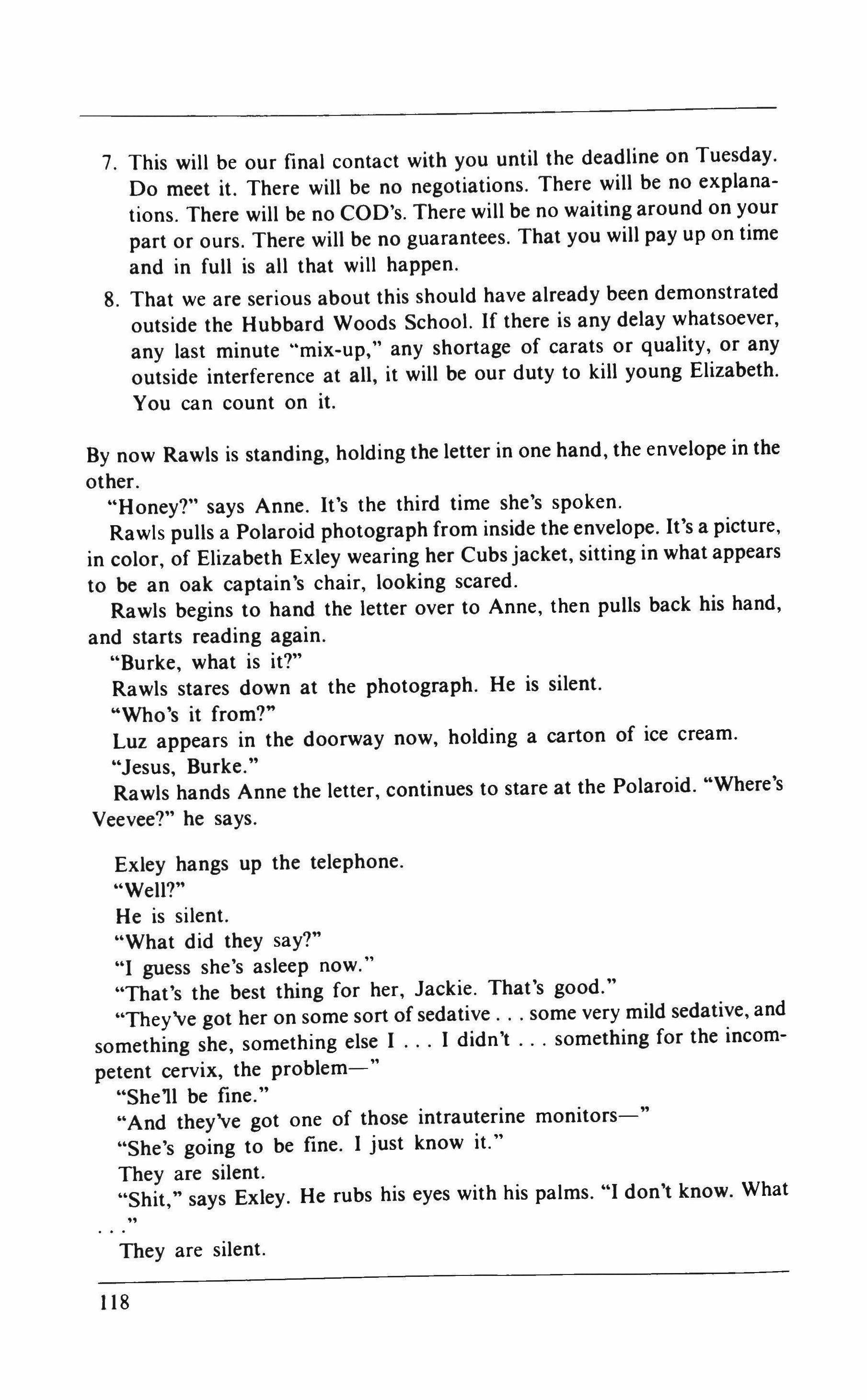
7. This will be our final contact with you until the deadline on Tuesday. Do meet it. There will be no negotiations. There will be no explanations. There will be no COD's. There will be no waiting around on your part or ours. There will be no guarantees. That you will pay up on time and in full is all that will happen.
8. That we are serious about this should have already been demonstrated outside the Hubbard Woods School. If there is any delay whatsoever, any last minute "mix-up," any shortage of carats or quality, or any outside interference at all, it will be our duty to kill young Elizabeth. You can count on it.
By now Rawls is standing, holding the letter in one hand, the envelope in the other.
"Honey?" says Anne. It's the third time she's spoken.
Rawls pulls a Polaroid photograph from inside the envelope. It's a picture, in color, of Elizabeth Exley wearing her Cubs jacket, sitting in what appears to be an oak captain's chair, looking scared.
Rawls begins to hand the letter over to Anne, then pulls back his hand, and starts reading again.
"Burke, what is it?"
Rawls stares down at the photograph. He is silent.
"Who's it from?"
Luz appears in the doorway now, holding a carton of ice cream.
"Jesus, Burke."
Rawls hands Anne the letter, continues to stare at the Polaroid. "Where's Veevee?" he says.
Exley hangs up the telephone. "Well?"
He is silent.
"What did they say?"
"I guess she's asleep now."
"That's the best thing for her, Jackie. That's good."
"They've got her on some sort of sedative some very mild sedative, and something she, something else 1 1 didn't something for the incompetent cervix, the problem-"
"She'll be fine."
"And they've got one of those intrauterine monitors-"
"She's going to be fine. 1 just know it."
They are silent.
"Shit," says Exley. He rubs his eyes with his palms. ··1 don't know. What
They are silent.
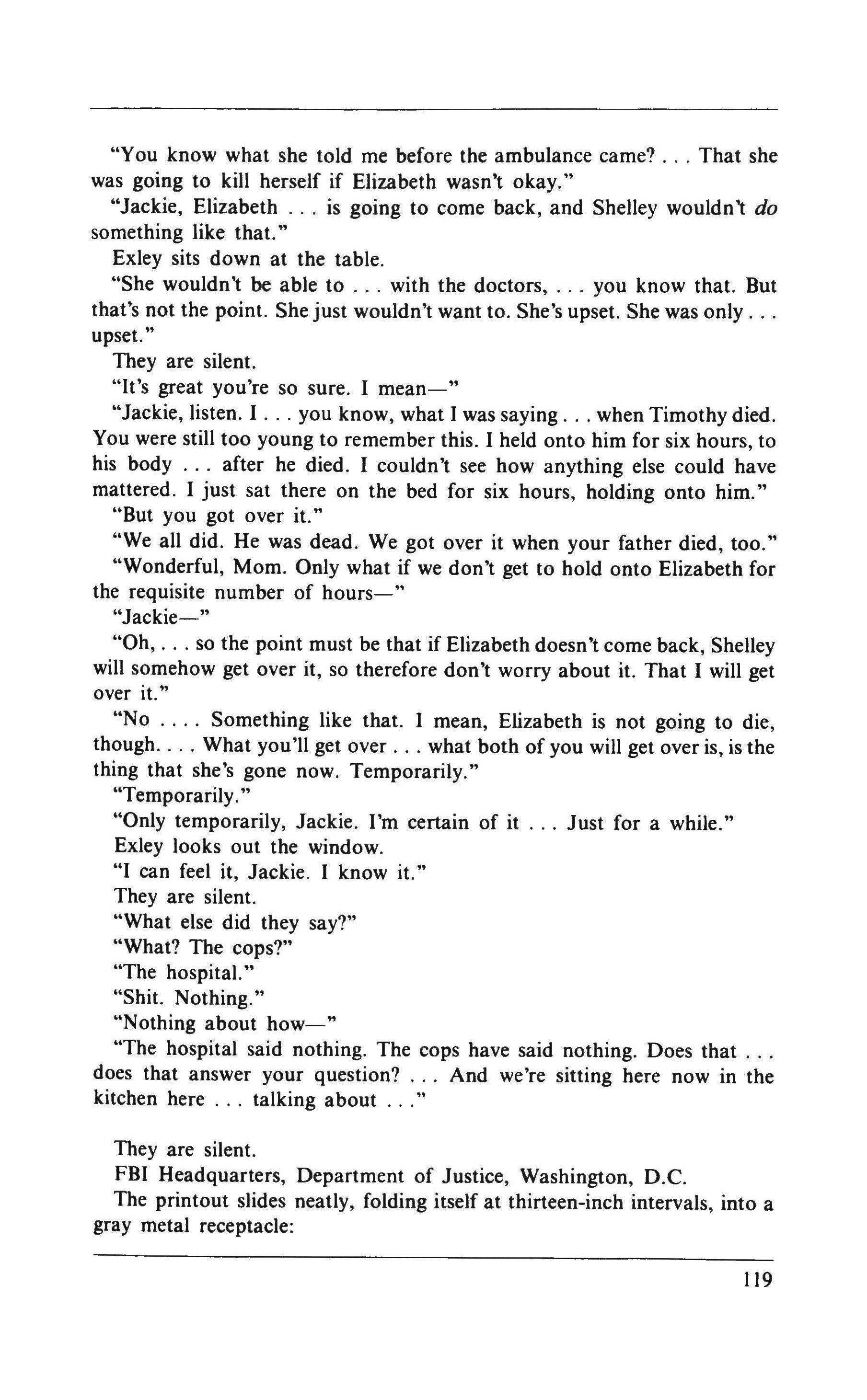
"You know what she told me before the ambulance came? That she was going to kill herself if Elizabeth wasn't okay."
"Jackie, Elizabeth is going to come back, and Shelley wouldn't do something like that."
Exley sits down at the table.
"She wouldn't be able to with the doctors, you know that. But that's not the point. She just wouldn't want to. She's upset. She was only upset.
They are silent.
"It's great you're so sure. I mean-"
"Jackie, listen. I you know, what I was saying when Timothy died. You were still too young to remember this. I held onto him for six hours, to his body after he died. I couldn't see how anything else could have mattered. I just sat there on the bed for six hours, holding onto him."
"But you got over it."
"We all did. He was dead. We got over it when your father died, too."
"Wonderful, Mom. Only what if we don't get to hold onto Elizabeth for the requisite number of hours-"
"Jackie-"
"Oh, so the point must be that if Elizabeth doesn't come back, Shelley will somehow get over it, so therefore don't worry about it. That I will get over it."
"No Something like that. I mean, Elizabeth is not going to die, though What you'll get over what both of you will get over is, is the thing that she's gone now. Temporarily."
"Temporarily.
"Only temporarily, Jackie. I'm certain of it Just for awhile."
Exley looks out the window.
"I can feel it, Jackie. I know it."
They are silent.
"What else did they say?"
"What? The cops?"
"The hospital."
"Shit. Nothing."
"Nothing about how-"
"The hospital said nothing. The cops have said nothing. Does that does that answer your question? And we're sitting here now in the kitchen here talking about
They are silent.
FBI Headquarters, Department of Justice, Washington, D.C.
The printout slides neatly, folding itself at thirteen-inch intervals, into a gray metal receptacle:

EVENT: EXLEY/ RAWLS
TYPE: KIDNAPPING
DATE: 801006
LOCATION: HUBBARD WOODS HIGH SCHOOL
LOCALE: HUBBARD WOODSIL
REGION: MIDWEST
HOST-COUNTRY: Nj A
ANNOUNCED-CLAIMANT:
WHEN-CLAIMED: 1635, 801006
ANNOUNCED-PURPOSE:
DISCLAIMANT:
TARGET: GENEVIEVE RAWLS
TARGET-SYMBOLIC-VALUE:
TARGET-ACCESSABILlTY: HIGH
VICTIM: ELIZABETH EXLEY
BOMB-WEIGHT: 5 OZ
BOMB-TYPE: AUTOMOBILE
BOMB-SIZE: SMALL
BOMB-DELIVERY: PLANTED
BOMB-DETONATION: REMOTE (COMMAND RADIO)
SECONDARY-DETONATION: NO DETONATION
DETONATION-SOURCE: PERPETRATOR
BOMB-COMPOSITION: PLASTIQUE
EXPLOSIVE-SOURCE: COMMERCIAL
BOMB-SOPHISTICATION: MEDIUM
AUDACITY: MEDIUM
RISK-TO-PERPETRATOR: LOW
RECIPIENT-OF-WARNING: NO WARNING
WARNING-TIME: NO WARNING TIME
OUTCOME: DETONATED
TACTICAL-OBJECTIVE: EXTORTION
STRATEGIC-OBJECTIVE: DISTRACTION
NUMBER-KILLED: 0
NUMBER-WOUNDED: 0
PRIMARY-DAMAGE: LOW
SECONDARY-DAMAGE: NO DAMAGE
INSTIGATOR:
PERPETRATOR:
GROUP-NAME:
POLITICAL-IDEOLOGY: NATIONALITY: AMERICAN
AGE:
OBJECTIVE: KIDNAPPING FOR RANSOM
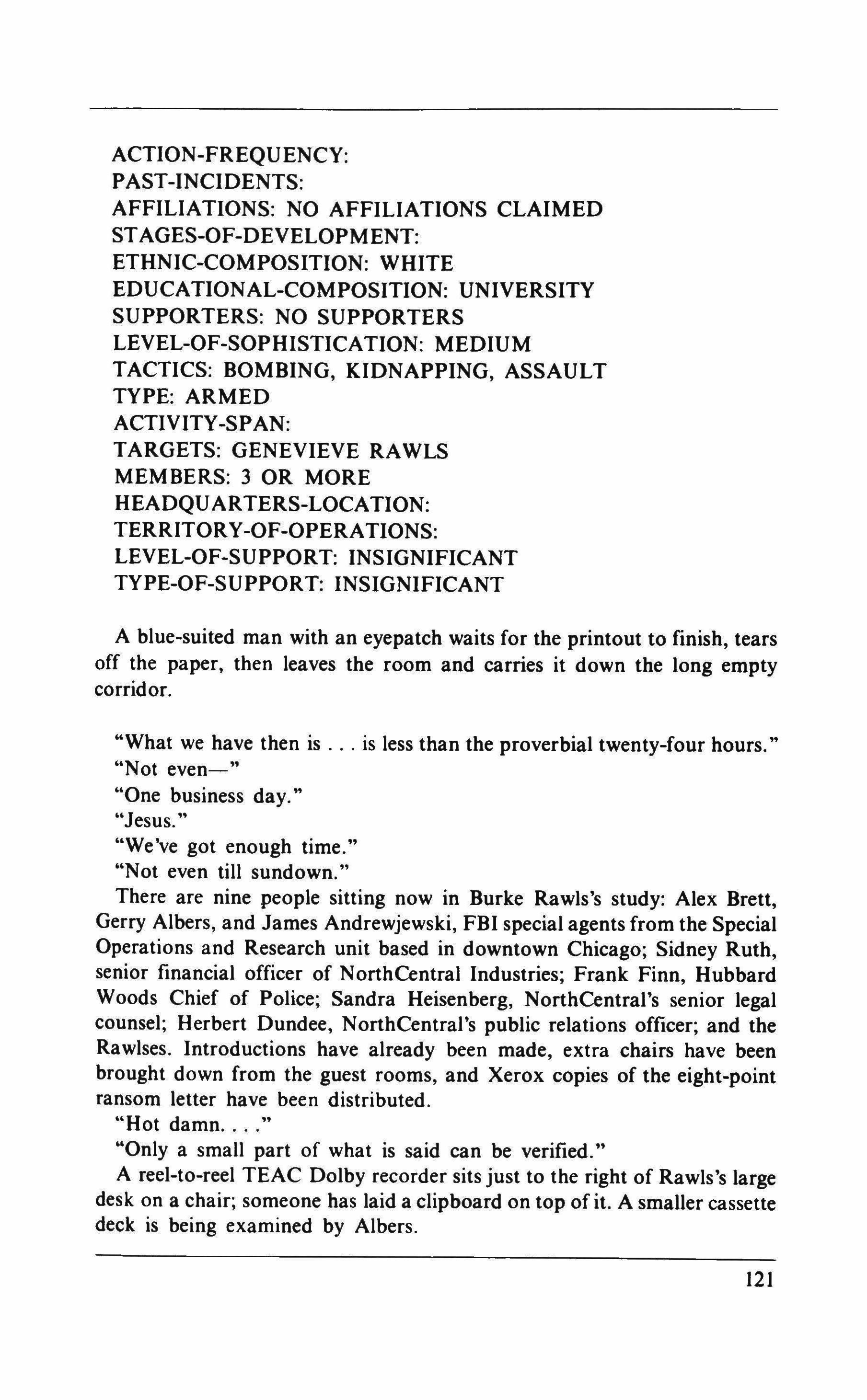
ACTION-FREQUENCY:
PAST-INCIDENTS:
AFFILIATIONS: NO AFFILIATIONS CLAIMED
STAGES-OF-DEVELOPMENT:
ETHNIC-COMPOSITION: WHITE
EDUCATIONAL-COMPOSITION: UNIVERSITY
SUPPORTERS: NO SUPPORTERS
LEVEL-OF-SOPHISTICATION: MEDIUM
TACTICS: BOMBING, KIDNAPPING, ASSAULT
TYPE: ARMED
ACTIVITY-SPAN:
TARGETS: GENEVIEVE RAWLS
MEMBERS: 3 OR MORE
HEADQUARTERS-LOCATION:
TERRITORY-OF-OPERATIONS:
LEVEL-OF-SUPPORT: INSIGNIFICANT
TYPE-OF-SUPPORT: INSIGNIFICANT
A blue-suited man with an eyepatch waits for the printout to finish, tears off the paper, then leaves the room and carries it down the long empty corridor.
"What we have then is is less than the proverbial twenty-four hours.
"Not even-"
"One business day."
"Jesus
"We've got enough time."
"Not even till sundown."
There are nine people sitting now in Burke Rawls's study: Alex Brett, Gerry Albers, and James Andrewjewski, FBI special agents from the Special Operations and Research unit based in downtown Chicago; Sidney Ruth, senior financial officer of NorthCentral Industries; Frank Finn, Hubbard Woods Chief of Police; Sandra Heisenberg, NorthCentral's senior legal counsel; Herbert Dundee, NorthCentral's public relations officer; and the Rawlses. Introductions have already been made, extra chairs have been brought down from the guest rooms, and Xerox copies of the eight-point ransom letter have been distributed.
"Hot damn
"Only a small part of what is said can be verified."
A reel-to-reel TEAC Dolby recorder sits just to the right of Rawls's large desk on a chair; someone has laid a clipboard on top of it. A smaller cassette deck is being examined by Albers.

"They're all pretty nocuous, actually."
"More or less."
"I would say so."
Two walls of the study are lined, floor to ceiling, with bookshelves. On a third wall are three framed black and white photographs, three framed certificates, and a small oil portrait by Mary Cassatt of a girl with red hair.
Luz appears in the doorway, sniffs, disappears.
A blackboard and corkboard, both empty, both four feet by six feet, stand side by side in front of the room's single window, blocking the lower threefifths of its view. It has just gotten dark out.
Anne Rawls gets up, turns around and looks out the door, then sits down again. She takes a sip of her drink.
"We've got another set of headphones and a copying machine out in our van," says Albers. "It's out in the driveway."
Two Illinois Bell technicians, in the process of hooking up six extra telephones, move-businesslike, unobtrusive-in and out of the study.
"We should start looking at that right away," says Heisenberg. "Have the parents been contacted yet?"
"The mother is pregnant," says Anne. Her fingers are trembling. "I think I think that we know her."
"1 don't think so," says Rawls.
"Not yet," says Andrewjewski.
"They took her down to the emergency room," says Finn. "At Evanston. We advised Mr. Exley to stay put for a while in his apartment 1 mean, for the call."
"For the time being," says Brett.
"Right.
Anne massages her neck.
"It is necessary that we have the absolute cooperation, even those persons on the periphery, the television people."
"Exactly,
"It's not the sort of thing you can quash simply by snapping your fingers at it.
Luz reappears now, excusing herself, carrying a neat stack of five large porcelain ashtrays. "That icemaker's broken all weekend," she says. "No have, we have no ice at all."
"No ice at all," someone says.
"Really. There is laughter.
"We've got no ice at all."
"Your hands are tied, our hands are tied, and these people take out anybody they want to these days. Just out walking along on the sidewalk,
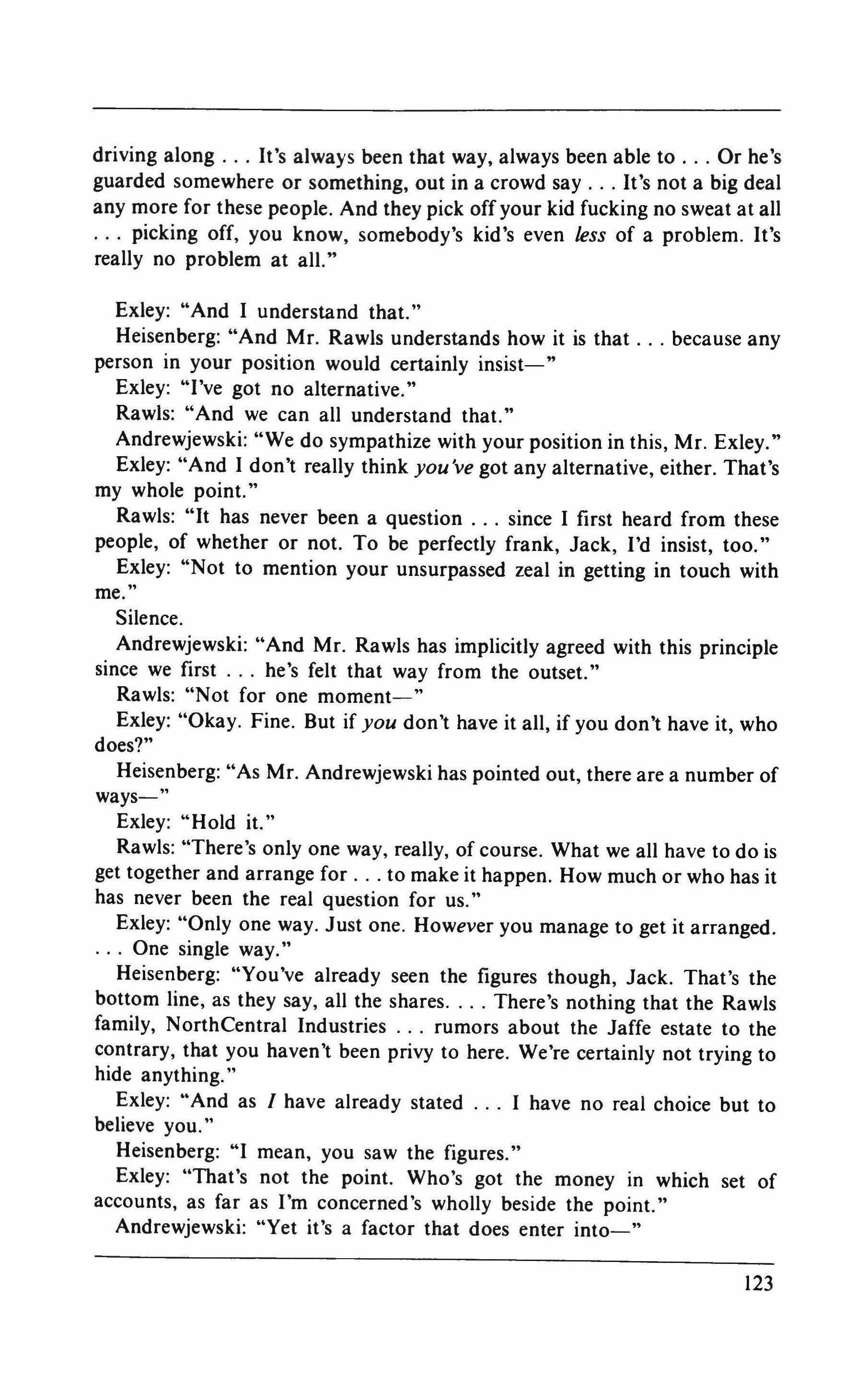
driving along It's always been that way, always been able to Or he's guarded somewhere or something, out in a crowd say It's not a big deal any more for these people. And they pick off your kid fucking no sweat at all picking off, you know, somebody's kid's even less of a problem. It's really no problem at all."
Exley: "And I understand that."
Heisenberg: "And Mr. Rawls understands how it is that because any person in your position would certainly insist-"
Exley: "I've got no alternative."
Rawls: "And we can all understand that."
Andrewjewski: "We do sympathize with your position in this, Mr. Exley."
Exley: "And I don't really think you've got any alternative, either. That's my whole point."
Rawls: "It has never been a question since I first heard from these people, of whether or not. To be perfectly frank, Jack, I'd insist, too."
Exley: "Not to mention your unsurpassed zeal in getting in touch with me."
Silence.
Andrewjewski: "And Mr. Rawls has implicitly agreed with this principle since we first he's felt that way from the outset."
Rawls: "Not for one moment-"
Exley: "Okay. Fine. But if you don't have it all, if you don't have it, who does?"
Heisenberg: "As Mr. Andrewjewski has pointed out, there are a number of ways-"
Exley: "Hold it."
Rawls: "There's only one way, really, of course. What we all have to do is get together and arrange for to make it happen. How much or who has it has never been the real question for us."
Exley: "Only one way. Just one. However you manage to get it arranged. One single way."
Heisenberg: "You've already seen the figures though, Jack. That's the bottom line, as they say, all the shares There's nothing that the Rawls family, NorthCentral Industries rumors about the Jaffe estate to the contrary, that you haven't been privy to here. We're certainly not trying to hide anything."
Exley: "And as I have already stated I have no real choice but to believe you."
Heisenberg: "I mean, you saw the figures."
Exley: "That's not the point. Who's got the money in which set of accounts, as far as I'm concerned's wholly beside the point."
Andrewjewski: "Yet it's a factor that does enter into-"
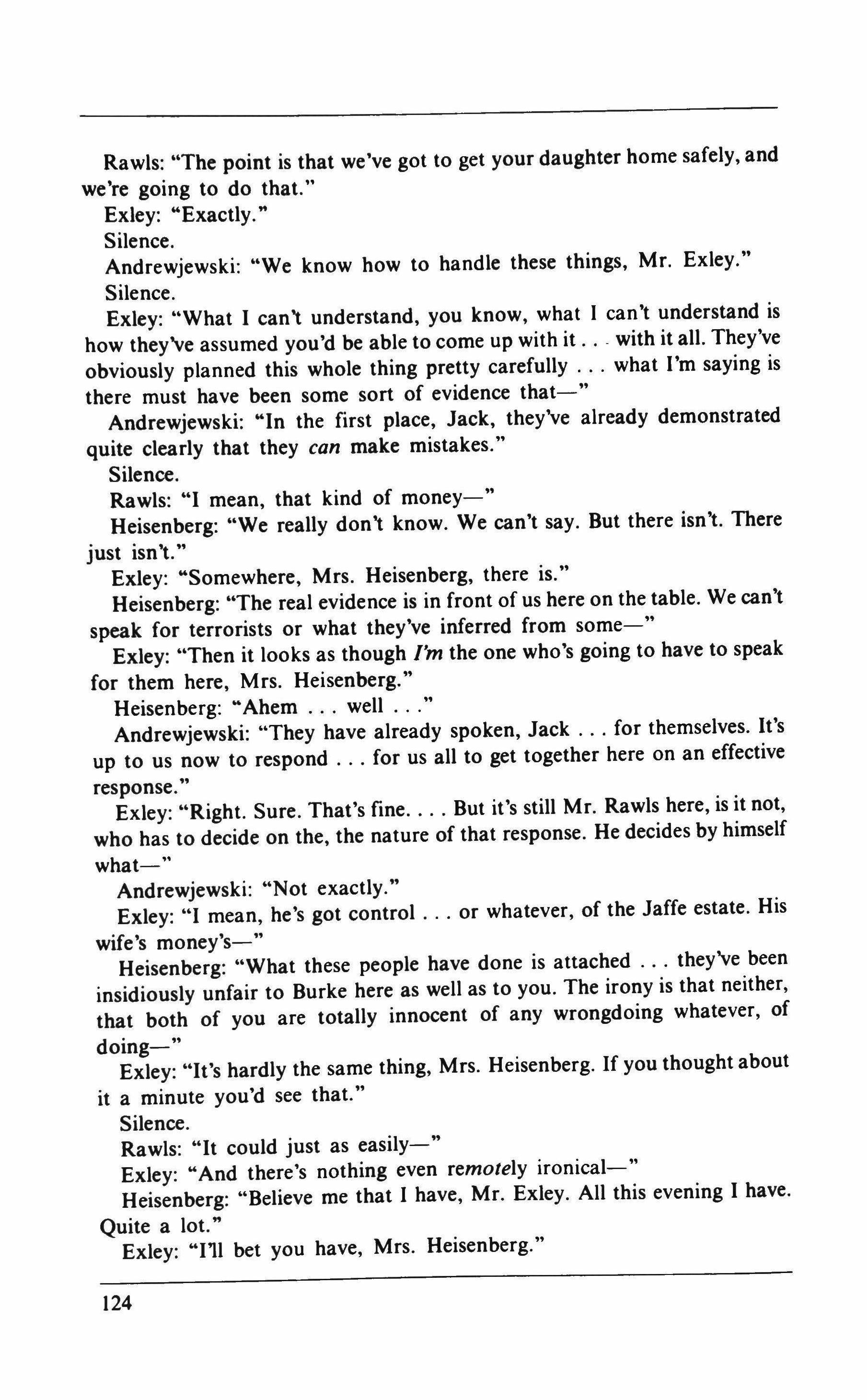
Rawls: "The point is that we've got to get your daughter home safely, and we're going to do that."
Exley: "Exactly." Silence.
Andrewjewski: "We know how to handle these things, Mr. Exley." Silence.
Exley: "What I can't understand, you know, what I can't understand is how they've assumed you'd be able to come up with it - with it all. They've obviously planned this whole thing pretty carefully what I'm saying is there must have been some sort of evidence that-"
Andrewjewski: "In the first place, Jack, they've already demonstrated quite clearly that they can make mistakes." Silence.
Rawls: "I mean, that kind of money-"
Heisenberg: "We really don't know. We can't say. But there isn't. There just isn't."
Exley: "Somewhere, Mrs. Heisenberg, there is."
Heisenberg: "The real evidence is in front of us here on the table. We can't speak for terrorists or what they've inferred from some-"
Exley: "Then it looks as though I'm the one who's going to have to speak for them here, Mrs. Heisenberg."
Heisenberg: "Ahem well
Andrewjewski: "They have already spoken, Jack for themselves. It's up to us now to respond for us all to get together here on an effective response.
Exley: "Right. Sure. That's fine
But it's still Mr. Rawls here, is it not, who has to decide on the, the nature of that response. He decides by himself what-"
Andrewjewski: "Not exactly."
Exley: "I mean, he's got control or whatever, of the Jaffe estate. His wife's money's-"
Heisenberg: "What these people have done is attached they've been insidiously unfair to Burke here as well as to you. The irony is that neither, that both of you are totally innocent of any wrongdoing whatever, of doing-"
Exley: "It's hardly the same thing, Mrs. Heisenberg. If you thought about it a minute you'd see that."
Silence.
Rawls: "It could just as easily-"
Exley: "And there's nothing even remotely ironical-"
Heisenberg: "Believe me that I have, Mr. Exley. All this evening I have. Quite a lot."
Exley: "I'll bet you have, Mrs. Heisenberg."

Silence.
Andrewjewski: "And there is still an excellent chance that Mr. Rawls or, or the corporation as 1 understand it will be able to come up with a sufficient amount."
Exley: "So please don't talk to me with your fey little connotations about irony, Mrs. Heisenberg. Not in your situation. Not in the situation my daughter's in. Just don't."
Andrewjewski: "O.K. I think-to
Exley: "Just don't."
Andrewjewski: "I think Jack's made his point. 1 agree with you. 1 also agree with Mr. Rawls that there's an excellent chance the funds can be gathered together."
Rawls: "They can be." Silence.
Exley: "When?"
Rawls: "If by tomorrow All indications so far from New York are that we'll be able to manage it. That's the important the important thing, Jack, is that-to
Exley: "By when?"
Rawls: "At the very latest by noon tomorrow." Silence.
Exley: "Good Wait a second Jesus what am 1 saying? An excellent chance just won't be good enough. It is not nearly good enough."
Rawls: "We're going to cover it, Jack. And on time You can count on it.
Andrewjewski: "Jack, look-"
Exley: "Can I, sir? Can you promise me that?"
Andrewjewski: "Our policy always has been-"
Rawls: "You have my word."
Exley: "I hope so. 1 really do hope so. Because another problem I've got is there being some sort of plan, you know, in which you in which somebody tries to recover the money the diamonds, while the transfer's being made. Behind my back, if you will. And if so if that's-"
Andrewjewski: "There is no such plan, Mr. Exley, and it would be better really better for all of us if we sat-"
Exley: "Yeah. But say you get some sort of fix on where they're hiding out between now or even before and so what happens then? I mean, I would like to state very clearly right now that 1 want no moves at all to get made without my without asking me first."
Heisenberg: "Because-"
Rawls: "Because you think it might endanger Elizabeth."
Exley: "You got it."
Andrewjewski: "Our number one priority throughout this operation is
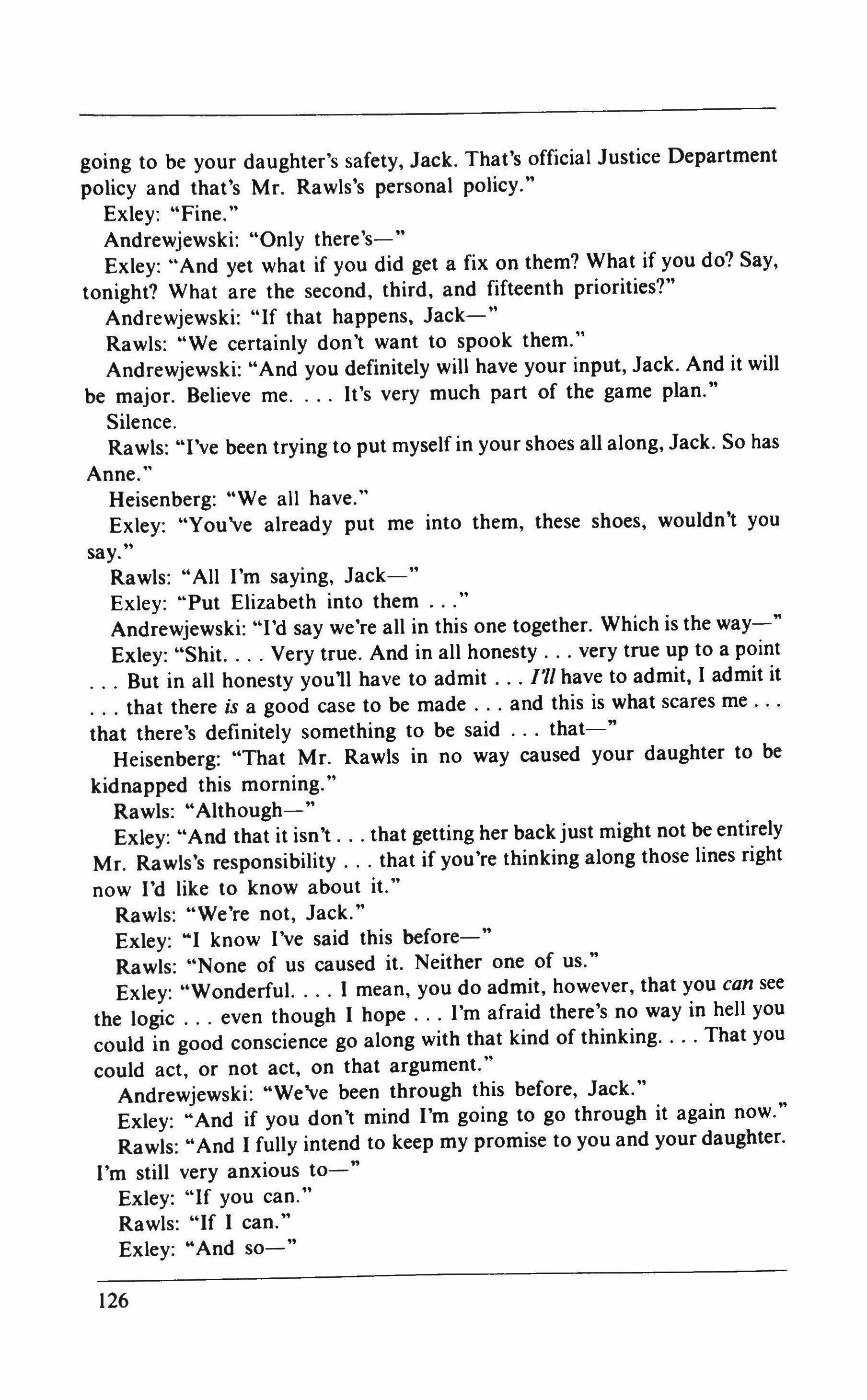
going to be your daughter's safety, Jack. That's official Justice Department policy and that's Mr. Rawls's personal policy."
Exley: "Fine."
Andrewjewski: "Only there's-"
Exley: "And yet what if you did get a fix on them? What if you do? Say, tonight? What are the second, third, and fifteenth priorities?"
Andrewjewski: "If that happens, Jack-"
Rawls: "We certainly don't want to spook them."
Andrewjewski: "And you definitely will have your input, Jack. And it will be major. Believe me It's very much part of the game plan." Silence.
Rawls: "I've been trying to put myselfin your shoes all along, Jack. So has Anne.
Heisenberg: "We all have."
Exley: "You've already put me into them, these shoes, wouldn't you say.
Rawls: "All I'm saying, Jack=-"
Exley: "Put Elizabeth into them
Andrewjewski: "I'd say we're all in this one together. Which is the way-"
Exley: "Shit. Very true. And in all honesty very true up to a point
But in all honesty you'll have to admit 1'1/ have to admit, I admit it that there is a good case to be made and this is what scares me that there's definitely something to be said that-"
Heisenberg: "That Mr. Rawls in no way caused your daughter to be kidnapped this morning."
Rawls: "Although=-"
Exley: "And that it isn't that getting her backjust might not be entirely Mr. Rawls's responsibility that if you're thinking along those lines right now I'd like to know about it."
Rawls: "We're not, Jack."
Exley: "I know I've said this before-"
Rawls: "None of us caused it. Neither one of us."
Exley: "Wonderful. I mean, you do admit, however, that you can see the logic even though I hope I'm afraid there's no way in hell you could in good conscience go along with that kind of thinking That you could act, or not act, on that argument."
Andrewjewski: "We've been through this before, Jack."
Exley: "And if you don't mind I'm going to go through it again now."
Rawls: "And I fully intend to keep my promise to you and your daughter. I'm still very anxious to-"
Exley: "If you can."
Rawls: "If I can."
Exley: "And so-"
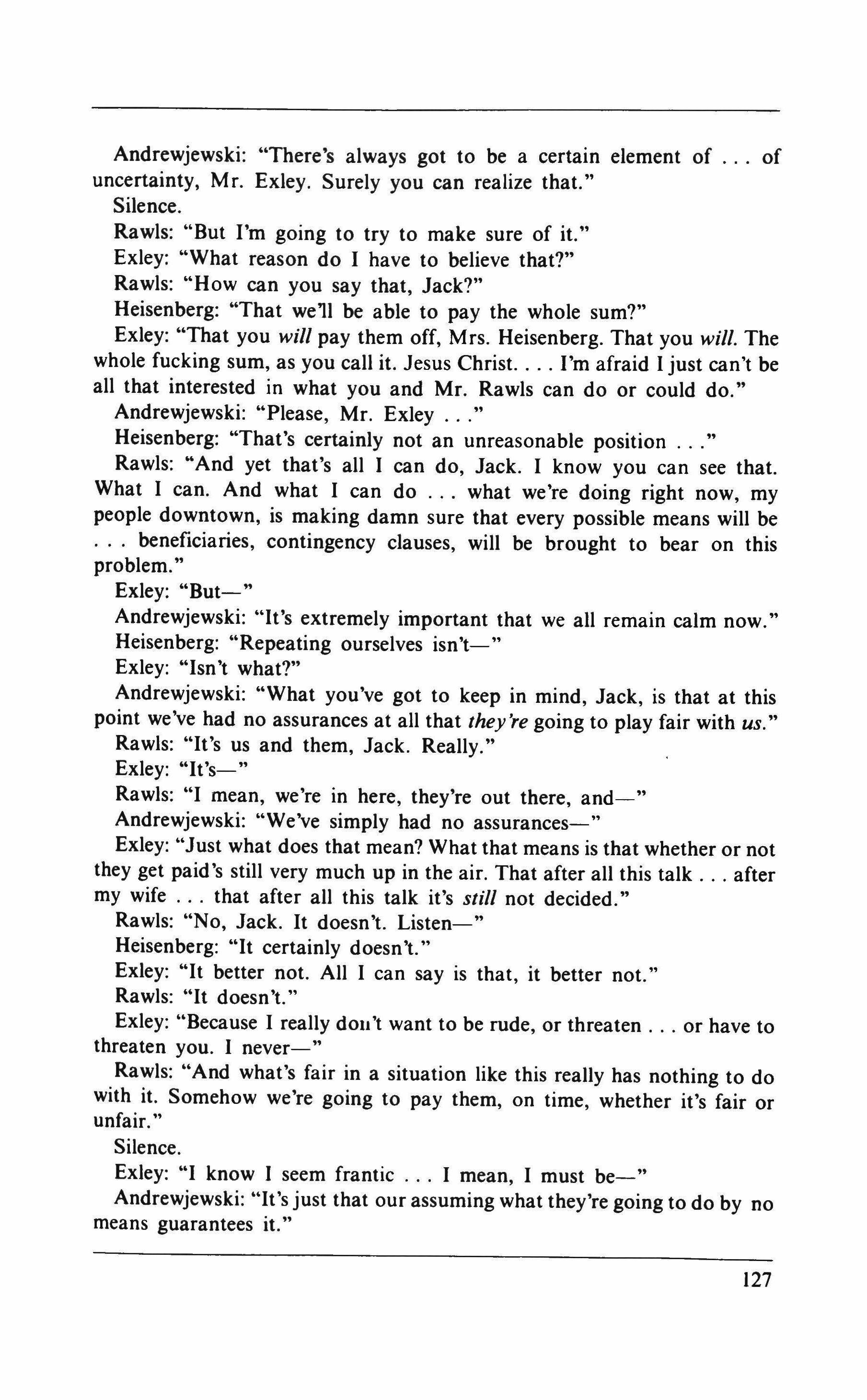
Andrewjewski: "There's always got to be a certain element of of uncertainty, Mr. Exley. Surely you can realize that." Silence.
Rawls: "But I'm going to try to make sure of it."
Exley: "What reason do I have to believe that?"
Rawls: "How can you say that, Jack?"
Heisenberg: "That well be able to pay the whole sum?"
Exley: "That you will pay them off, Mrs. Heisenberg. That you will. The whole fucking sum, as you call it. Jesus Christ. I'm afraid I just can't be all that interested in what you and Mr. Rawls can do or could do."
Andrewjewski: "Please, Mr. Exley "
Heisenberg: "That's certainly not an unreasonable position
Rawls: "And yet that's all I can do, Jack. I know you can see that. What I can. And what I can do what we're doing right now, my people downtown, is making damn sure that every possible means will be beneficiaries, contingency clauses, will be brought to bear on this problem."
Exley: "But-"
Andrewjewski: "It's extremely important that we all remain calm now."
Heisenberg: "Repeating ourselves isn't-"
Exley: "Isn't what?"
Andrewjewski: "What you've got to keep in mind, Jack, is that at this point we've had no assurances at all that they're going to play fair with us."
Rawls: "It's us and them, Jack. Really."
Exley: "It's-"
Rawls: "I mean, we're in here, they're out there, and-"
Andrewjewski: "We've simply had no assurances-"
Exley: "Just what does that mean? What that means is that whether or not they get paid's still very much up in the air. That after all this talk after my wife that after all this talk it's still not decided."
Rawls: "No, Jack. It doesn't. Listen-"
Heisenberg: "It certainly doesn't."
Exley: "It better not. All I can say is that, it better not."
Rawls: "It doesn't."
Exley: "Because I really don't want to be rude, or threaten or have to threaten you. I never-"
Rawls: "And what's fair in a situation like this really has nothing to do with it. Somehow we're going to pay them, on time, whether it's fair or unfair.
Silence.
Exley: "I know I seem frantic I mean, I must be-"
Andrewjewski: "It's just that our assuming what they're going to do by no means guarantees it."

Rawls: "I think we all understand what we're up against, what's got to be done.
Silence.
Exley: "Let me say this, Mr. Rawls I'm a little screwed up now a little confused, and I might have been close to delirious for a while there. But so far this evening you've given me pretty good reason to trust you, although under the circumstances to believe you have my daughter's best interests in mind. And that you're an honorable person. Because the position originally I mean, this is a shitty spot to be in for both of us But you must get that money together, let me finish buy the diamonds the number of diamonds they ask for, and then deliver them all the moment they ask for them. And you say that you will, and therefore I'm grateful to you for your attitude."
Rawls: "Because I'm sure you'd do the same
Exley: "What you've got to understand is that somehow I need a lot more. I need a hell of a lot more What I want is for the situation to be such that it is altogether impossible that my daughter will be returned safely, period. Good odds mean nothing to me at this point Because as far as I'm concerned, it is no longer a question it has never been a question of your being reasonable or unreasonable, or generous, or of your acting honorably or dishonorably or fairly. I just want my child back."
Rawls: "We all want her back, Jack."
Andrewjewski: "We do."
Heisenberg: "We all do." Silence.
Exley: "That's downright edifying of you." Silence.
Rawls: "And I want you to trust me, Jack, that she will be brought back. I would never what I mean is, we will all-"
Andrewjewski: "We will get her back, Jack." Silence.
Exley: "Then what I want right now is your word that there is absolutely no way you can fail to deliver to them what they want, no matter what, no matter what happens, and that she will be brought back by tomorrow."
Heisenberg: "You have his word."
Room 3133, Obstetrics and Gynecology Ward, Evanston Memorial Hospital.
Exley leans forward, head on his hands, on a chair alongside Shelley's bed. Shelley is wearing a robe and pajamas now; an IV coil leads out from one of the cuffs of the robe along the side of the bed to an upside-down bottle half full with translucent liquid. Her records and chart are clipped to a board on the bedstead.

"At least," Exley says, looking up. "At least it's begun to make some sort of sense."
They hold hands.
"Whatever that means."
Shelley is silent.
"And that you should start to, now maybe feel better."
Shelley is silent.
"How do you feel?"
"I'm okay. 111 be okay. Traisman says I have to be to relax that, you know, because of the cervix business."
"What you've got to do now, Honey, is force yourself to relax. Kind of force yourself, you have to really work at it though. Concentrate on it. The Rawlses are going to take-"
"You just got through saying it was too early to tell yet. That even the-"
"What I meant was, it wasn't real clear yet which set of accounts something like, all that money would, you know, was going to come from."
"For sure."
"They sound pretty positive, Hon. The important thing is that they do have the money and that they're willing to pay it."
And all this is definite."
"As far as I can tell, Shell."
Shelley withdraws her hand in order to dry her palm on the sheet. "But both the Rawlses agree then that it's their responsibility too?"
"It's all theirs, Honey. They know that. Burke Rawls and he gave me his word several times."
They are silent.
"I've been doing some of those Lamaze exercises, you know, to try to relax.
"Good. "
They are silent.
"And Traisman was telling me, and I told him to be straight, to be as objective as possible, that you're gonna be fine. So's the baby."
"That way I won't have to have as strong as sedative."
"And everything's going smoothly up there so far. It's really a very clearcut situation, and, and at least now we know-"
Shelley inhales jaggedly through her mouth. "Though I guess, I guess what happened wasn't really their fault."
"They're good people, Shell. I mean, in a way we're extremely lucky so far as far as that goes."
"It's just that-"
"And I know it's a strange thing to say now, but I really don't think we have that much to worry about."
Quietly, closing her eyes, Shelley starts crying.
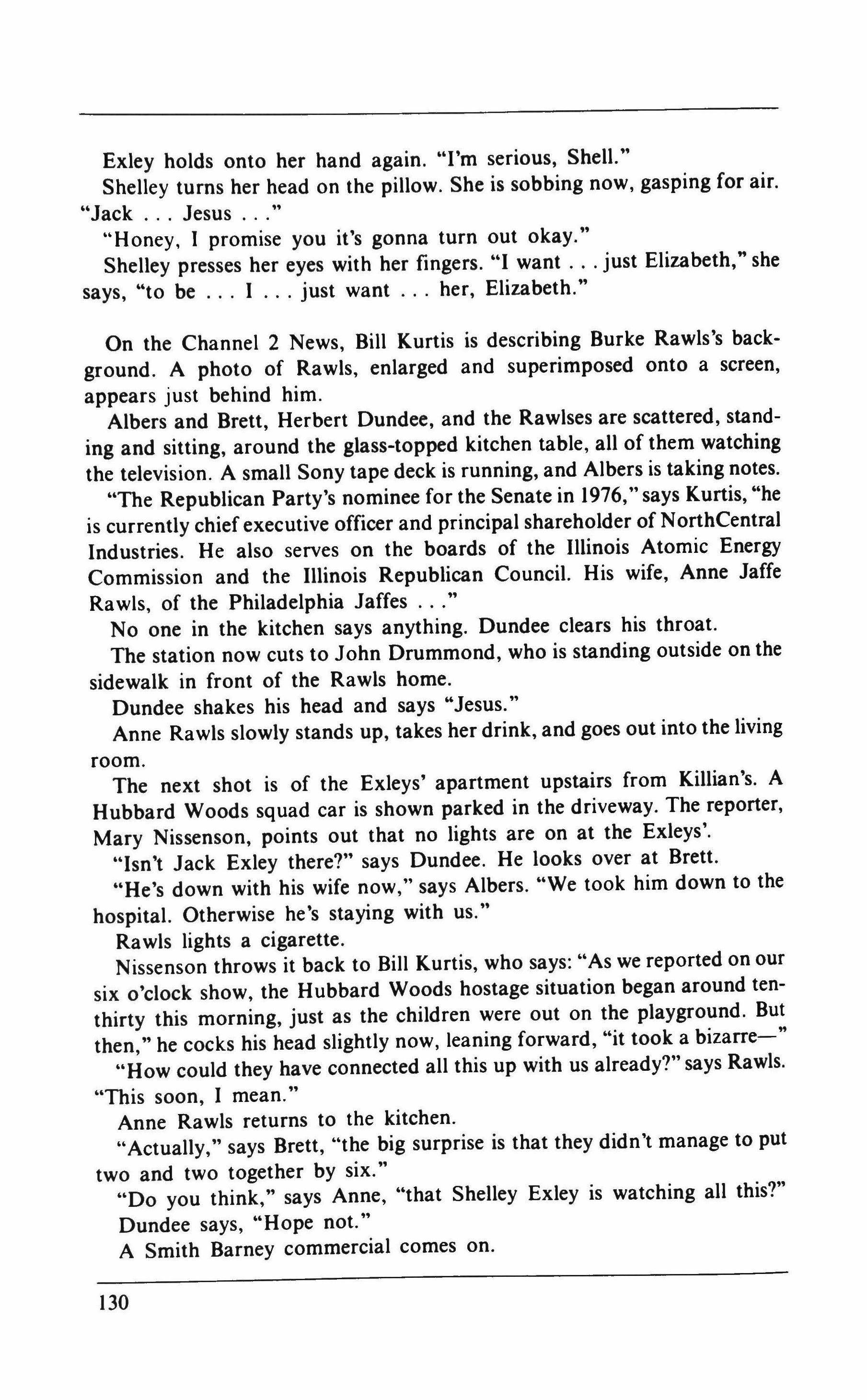
Exley holds onto her hand again. "I'm serious, Shell."
Shelley turns her head on the pillow. She is sobbing now, gasping for air. "Jack Jesus
"Honey, I promise you it's gonna turn out okay."
Shelley presses her eyes with her fingers. "I want just Elizabeth," she says, "to be I just want her, Elizabeth."
On the Channel 2 News, Bill Kurtis is describing Burke Rawls's background. A photo of Rawls, enlarged and superimposed onto a screen, appears just behind him.
Albers and Brett, Herbert Dundee, and the Rawlses are scattered, standing and sitting, around the glass-topped kitchen table, all of them watching the television. A small Sony tape deck is running, and Albers is taking notes.
"The Republican Party's nominee for the Senate in 1976," says Kurtis, "he is currently chief executive officer and principal shareholder of NorthCentral Industries. He also serves on the boards of the Illinois Atomic Energy Commission and the Illinois Republican Council. His wife, Anne Jaffe Rawls, of the Philadelphia Jaffes
No one in the kitchen says anything. Dundee clears his throat.
The station now cuts to John Drummond, who is standing outside on the sidewalk in front of the Rawls home.
Dundee shakes his head and says "Jesus."
Anne Rawls slowly stands up, takes her drink, and goes out into the living room.
The next shot is of the Exleys' apartment upstairs from Killian's. A Hubbard Woods squad car is shown parked in the driveway. The reporter, Mary Nissenson, points out that no lights are on at the Exleys'.
"Isn't Jack Exley there?" says Dundee. He looks over at Brett.
"He's down with his wife now," says Albers. "We took him down to the hospital. Otherwise he's staying with us."
Rawls lights a cigarette.
Nissenson throws it back to Bill Kurtis, who says: "As we reported on our six o'clock show, the Hubbard Woods hostage situation began around tenthirty this morning, just as the children were out on the playground. But then," he cocks his head slightly now, leaning forward, "it took a bizarre-"
"How could they have connected all this up with us already?" says Rawls. "This soon, I mean."
Anne Rawls returns to the kitchen.
"Actually," says Brett, "the big surprise is that they didn't manage to put two and two together by six."
"Do you think," says Anne, "that Shelley Exley is watching all this?"
Dundee says, "Hope not."
A Smith Barney commercial comes on.
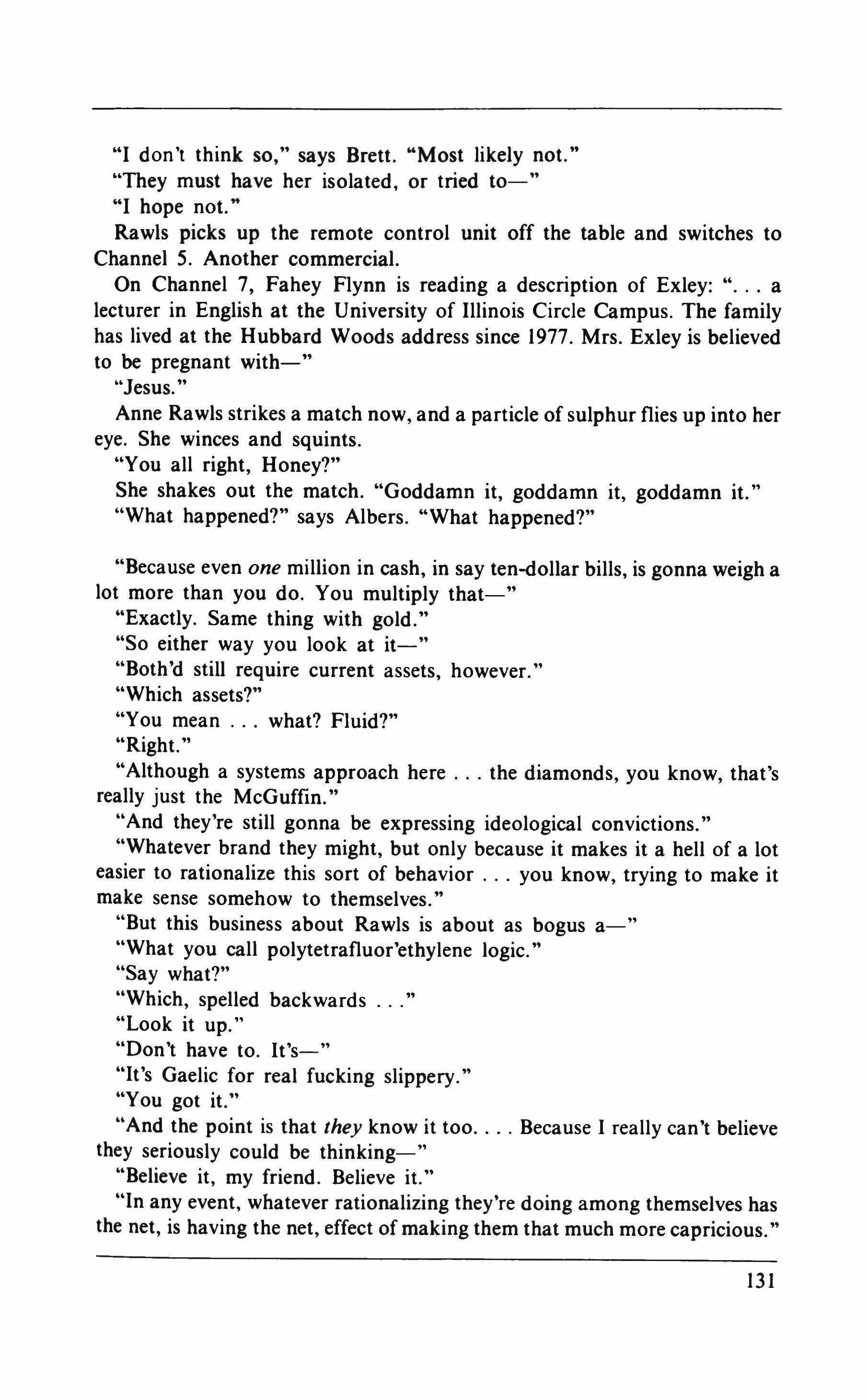
"I don't think so," says Brett. "Most likely not."
"They must have her isolated, or tried to-"
"I hope not."
Rawls picks up the remote control unit off the table and switches to Channel 5. Another commercial.
On Channel 7, Fahey Flynn is reading a description of Exley: " a lecturer in English at the University of Illinois Circle Campus. The family has lived at the Hubbard Woods address since 1977. Mrs. Exley is believed to be pregnant with-" "Jesus.
Anne Rawls strikes a match now, and a particle of sulphur flies up into her eye. She winces and squints.
-vou all right, Honey?"
She shakes out the match. "Goddamn it, goddamn it, goddamn it."
"What happened?" says Albers. "What happened?"
"Because even one million in cash, in say ten-dollar bills, is gonna weigh a lot more than you do. You multiply that-"
"Exactly. Same thing with gold."
"So either way you look at it-"
"Both'd still require current assets, however."
"Which assets?"
lOyou mean what? Fluid?"
"Right.
"Although a systems approach here the diamonds, you know, that's really just the McGuffin."
"And they're still gonna be expressing ideological convictions."
"Whatever brand they might, but only because it makes it a hell of a lot easier to rationalize this sort of behavior you know, trying to make it make sense somehow to themselves."
"But this business about Rawls is about as bogus a-" "What you call polytetrafluor'ethylene logic."
"Say what?"
"Which, spelled backwards "Look it up."
"Don't have to. It's-''
"It's Gaelic for real fucking slippery."
"You got it."
"And the point is that they know it too Because I really can't believe they seriously could be thinking-"
"Believe it, my friend. Believe it."
"In any event, whatever rationalizing they're doing among themselves has the net, is having the net, effect of making them that much more capricious."

"It's an iffy position we're both in. Plus anything we do
"As it stands now we've got a simple Hobbs Act violation, plus a few-to
"And it's making the Exley girl that much more vulnerable."
"Although that Kissinger thing
"The '73 Kissinger Policy doesn't even apply here."
"That's what I'm-"
"No way, man. 1 mean-"
"Yeah. Tell that to Whatshisname."
"I can't even remember the last time something like this-"
"No way. It's night and day, really
"It's a little like, like that the time that what's that guy's name?"
"Yeah
"Right. Yeah. 1 don't know."
"Right.
"I don't know."
Andrewjewski hands Exley the phone that's marked "Exley"; it'sjust rung a fifth time.
"Hello
Young male voice, cracking: "John P. Exley?"
"This is he."
Andrewjewski, listening in on the headphones, gestures to indicate that the conversation should continue.
"John Exley whose kid's just been kidnapped?"
"That's correct. Could you-"
"Well, do the Lindy, man." Background noise. Laughter. "Do the Lindy."
"Could you say
The young man hangs up then.
Two lights are on, behind curtains, in the apartment above the Chestnut Court Bookstore in downtown Hubbard Woods. A traffic signal switches from yellow to red. The only other light comes from the streetlights, from the mauve haze of dawn to the east, and from the indirect industrial panels through the windows of the Hubbard Woods Post Office.
The crowded, chaotic sorting room inside the Post Office. Forty-four carriers are singing, smoking, working their cases, drinking coffee from thermoses, complaining out loud to each other. Five three-tiered gurneys filled with letters stacked in gray plastic trays are wheeled in from the dock outside. A shriek-scream of laughter cuts through the general hubbub.
Carrier E. Norman Smith is quietly tossing cards, small parcels, and letters into the various slots of case 26. Each item for 1900 Sheridan Road, however, Smith hands to the tall, red-haired SOAR agent standing beside him. The agent immediately slits open these envelopes with the blade of a

Swiss army knife, briefly examines the contents, then slides both contents and envelopes into a cream-colored folder.
Two aisles away, at case 42, Lewis Mason is putting aside all mail addressed to the Exleys. It now sits in a small pile just to the left of the case: two third-class fliers from stores in the Loop, a postcard from Shelley's dentist reminding her that she is due for a checkup, a BankAmericard statement, a first-class letter from Tucson.
The agent in charge of intercepting the Exleys' mail-he is black, young, with round, gold-framed glasses-is up front now at the special delivery table, thumbing through the thick stack of packages, manila envelopes, and letters.
He stops now, breathes in and looks up at the clock, then pulls out a plain white business-sized envelope addressed to "Burke Rawls, Esquire."
He sniffs, clears his throat, and stands up.
"Because you can fudge a small bit on the color and save yourself, you know even use VVS2'S
"Difference between a D and an F in a three-carat would be forty, fifty percent.
"Forty thousand as opposed to twenty-four
"You think Rawls would go for it?"
"The question is, would those people out there be able to tell the difference."
"Right. But the real question is
"Did they specify brilliant and round, do you know?"
"I don't know. But the big question is, how-"
"Call him back up and find out."
"Yeah. 1 guess."
"That's the only way you're gonna find out."
"You call him then."
"Call him. That's the only way we're gonna find out."
"Or call Whatshisname Andrewjewski."
"Better call Rawls. Call Rawls first. Then you call Andrewjewski."
"N0 return address."
"None. P.M. Loop postmark, however. Good morning."
"Good morning."
"There've already been six or eight sets of prints smudged together all over the envelope."
"Mm, 1 knew I'd have to bend over eventually."
"Although 1 doubt very much there'll be any inside."
Rawls sips his coffee.
"Better try this on," says Andrewjewski. He hands Rawls a white latex
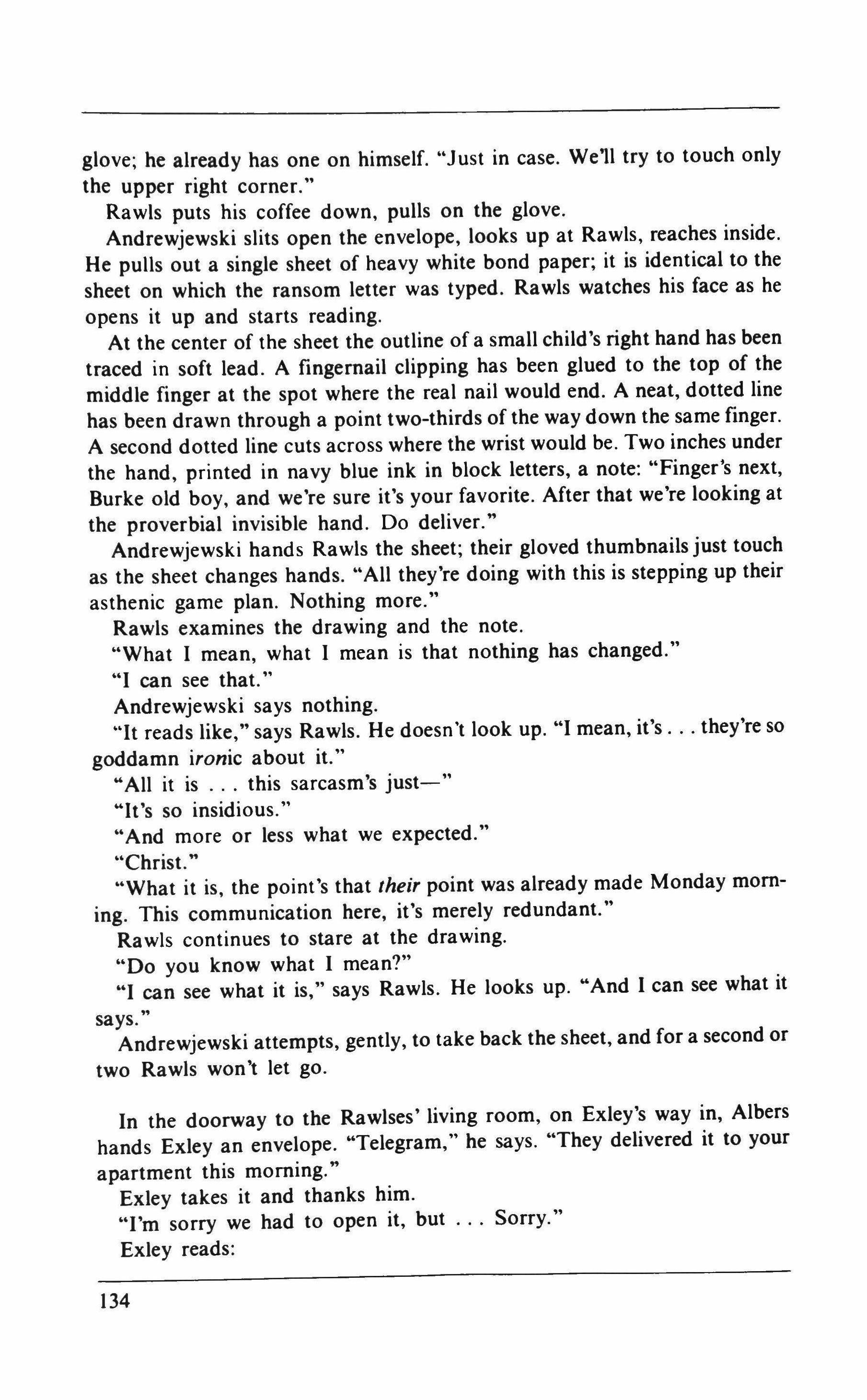
glove; he already has one on himself. "Just in case. We'll try to touch only the upper right corner."
Rawls puts his coffee down, pulls on the glove.
Andrewjewski slits open the envelope, looks up at Rawls, reaches inside. He pulls out a single sheet of heavy white bond paper; it is identical to the sheet on which the ransom letter was typed. Rawls watches his face as he opens it up and starts reading.
At the center of the sheet the outline of a small child's right hand has been traced in soft lead. A fingernail clipping has been glued to the top of the middle finger at the spot where the real nail would end. A neat, dotted line has been drawn through a point two-thirds of the way down the same finger. A second dotted line cuts across where the wrist would be. Two inches under the hand, printed in navy blue ink in block letters, a note: "Finger's next, Burke old boy, and we're sure it's your favorite. After that we're looking at the proverbial invisible hand. Do deliver."
Andrewjewski hands Rawls the sheet; their gloved thumbnails just touch as the sheet changes hands. "All they're doing with this is stepping up their asthenic game plan. Nothing more."
Rawls examines the drawing and the note.
"What 1 mean, what 1 mean is that nothing has changed."
"I can see that."
Andrewjewski says nothing.
"It reads like," says Rawls. He doesn't look up. "I mean, it's they're so goddamn ironic about it."
All it is this sarcasm's just-"
It's so insidious."
And more or less what we expected."
"Christ.
"What it is, the point's that their point was already made Monday morning. This communication here, it's merely redundant."
Rawls continues to stare at the drawing.
"Do you know what 1 mean?"
"I can see what it is," says Rawls. He looks up. "And I can see what it says."
Andrewjewski attempts, gently, to take back the sheet, and for a second or two Rawls won't let go.
In the doorway to the Rawlses' living room, on Exley's way in, Albers hands Exley an envelope. "Telegram," he says. "They delivered it to your apartment this morning."
Exley takes it and thanks him.
"I'm sorry we had to open it, but Sorry."
Exley reads:
MR AND MRS JOHN EXLEY
2933� GREEN BAY ROAD
HUBBARD WOODS IL 60093
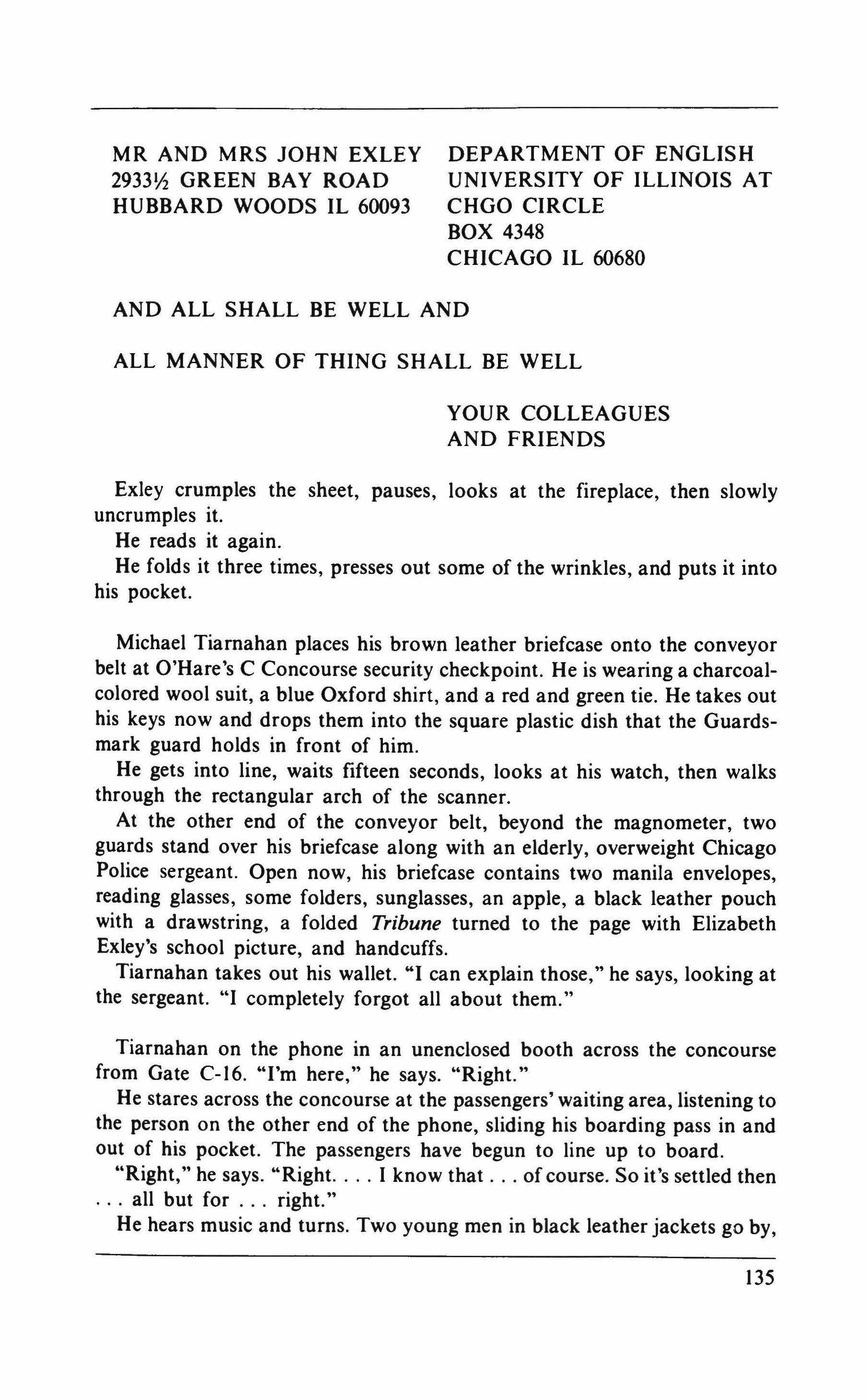
DEPARTMENT OF ENGLISH UNIVERSITY OF ILLINOIS AT CHGO CIRCLE BOX 4348
CHICAGO IL 60680
AND ALL SHALL BE WELL AND ALL MANNER OF THING SHALL BE WELL
Exley crumples the sheet, pauses, looks at the fireplace, then slowly uncrumples it.
He reads it again.
He folds it three times, presses out some of the wrinkles, and puts it into his pocket.
Michael Tiamahan places his brown leather briefcase onto the conveyor belt at O'Hare's C Concourse security checkpoint. He is wearing a charcoalcolored wool suit, a blue Oxford shirt, and a red and green tie. He takes out his keys now and drops them into the square plastic dish that the Guardsmark guard holds in front of him.
He gets into line, waits fifteen seconds, looks at his watch, then walks through the rectangular arch of the scanner.
At the other end of the conveyor belt, beyond the magnometer, two guards stand over his briefcase along with an elderly, overweight Chicago Police sergeant. Open now, his briefcase contains two manila envelopes, reading glasses, some folders, sunglasses, an apple, a black leather pouch with a drawstring, a folded Tribune turned to the page with Elizabeth Exley's school picture, and handcuffs.
Tiarnahan takes out his wallet. "I can explain those," he says, looking at the sergeant. "I completely forgot all about them."
Tiarnahan on the phone in an unenclosed booth across the concourse from Gate C-16. "I'm here," he says. "Right."
He stares across the concourse at the passengers' waiting area, listening to the person on the other end of the phone, sliding his boarding pass in and out of his pocket. The passengers have begun to line up to board. "Right," he says. "Right. I know that of course. So it's settled then all but for right."
He hears music and turns. Two young men in black leather jackets go by,
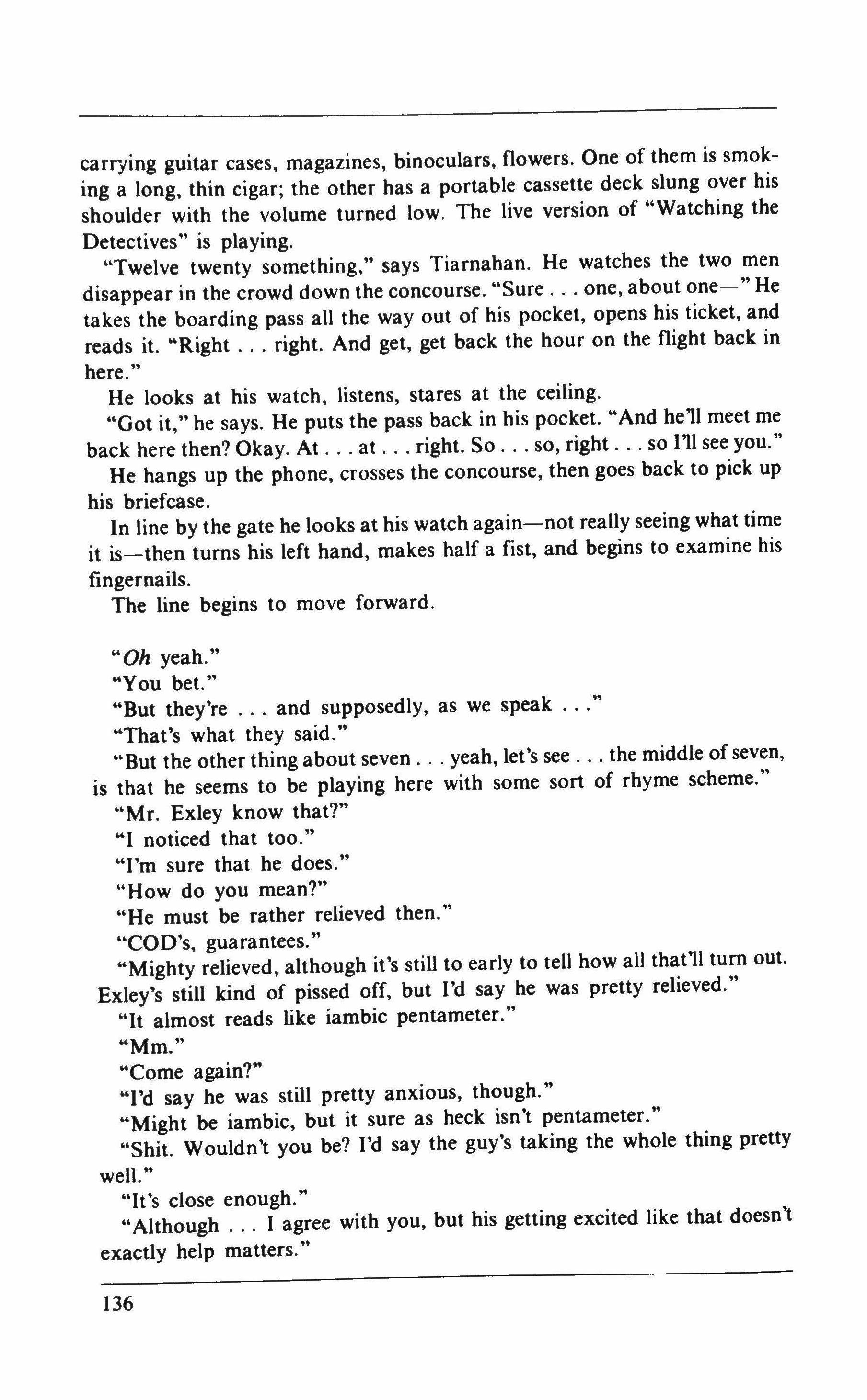
carrying guitar cases, magazines, binoculars, flowers. One of them is smoking a long, thin cigar; the other has a portable cassette deck slung over his shoulder with the volume turned low. The live version of "Watching the Detectives" is playing.
"Twelve twenty something," says Tiarnahan. He watches the two men disappear in the crowd down the concourse. "Sure one, about one-" He takes the boarding pass all the way out of his pocket, opens his ticket, and reads it. "Right right. And get, get back the hour on the flight back in here."
He looks at his watch, listens, stares at the ceiling.
"Got it," he says. He puts the pass back in his pocket. "And he'll meet me back here then? Okay. At at right. So so, right so 1'1 see you."
He hangs up the phone, crosses the concourse, then goes back to pick up his briefcase.
In line by the gate he looks at his watch again-not really seeing what time it is-then turns his left hand, makes half a fist, and begins to examine his fingernails.
The line begins to move forward.
"Oh yeah."
"You bet."
"But they're and supposedly, as we speak "
"That's what they said."
"But the other thing about seven yeah, let's see the middle of seven, is that he seems to be playing here with some sort of rhyme scheme."
"Mr. Exley know that?"
"I noticed that too."
"I'm sure that he does."
"How do you mean?"
"He must be rather relieved then."
"COD's, guarantees."
"Mighty relieved, although it's still to early to tell how all that'll turn out.
Exley's still kind of pissed off, but I'd say he was pretty relieved."
"It almost reads like iambic pentameter."
"Mm."
"Come again?"
"I'd say he was still pretty anxious, though."
"Might be iambic, but it sure as heck isn't pentameter."
"Shit. Wouldn't you be? I'd say the guy's taking the whole thing pretty well."
"It's close enough."
Although I agree with you, but his getting excited like that doesn't exactly help matters."
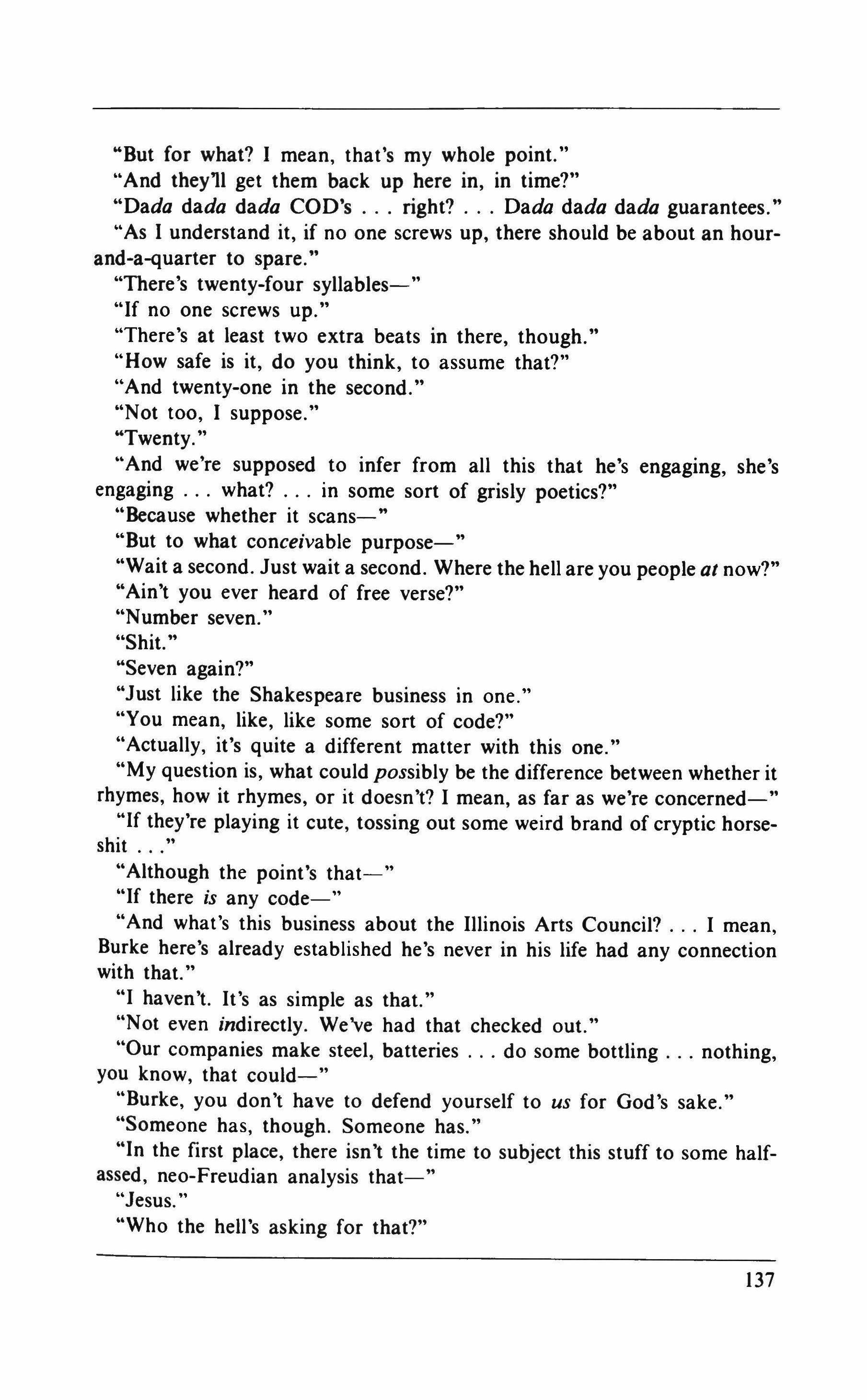
"But for what? I mean, that's my whole point."
"And they'll get them back up here in, in time?"
"Dada dada dada COD's right? Dada dada dada guarantees."
"As I understand it, if no one screws up, there should be about an hourand-a-quarter to spare."
"There's twenty-four syllables-"
"If no one screws up."
"There's at least two extra beats in there, though."
"How safe is it, do you think, to assume that?"
"And twenty-one in the second."
"Not too, I suppose."
"Twenty."
"And we're supposed to infer from all this that he's engaging, she's engaging what? in some sort of grisly poetics?"
"Because whether it scans-"
"But to what conceivable purpose-"
"Wait a second. Just wait a second. Where the hell are you people at now?"
"Ain't you ever heard of free verse?"
"Number seven."
"Shit
"Seven again?"
"Just like the Shakespeare business in one."
"You mean, like, like some sort of code?"
"Actually, it's quite a different matter with this one."
"My question is, what could possibly be the difference between whether it rhymes, how it rhymes, or it doesn't? I mean, as far as we're concerned-to
"If they're playing it cute, tossing out some weird brand of cryptic horseshit
"Although the point's that-"
"If there is any code-"
"And what's this business about the Illinois Arts Council? I mean, Burke here's already established he's never in his life had any connection with that."
"I haven't. It's as simple as that."
"Not even indirectly. We've had that checked out."
"Our companies make steel, batteries do some bottling nothing, you know, that could-"
"Burke, you don't have to defend yourself to us for God's sake."
"Someone has, though. Someone has."
"In the first place, there isn't the time to subject this stuff to some halfassed, neo-Freudian analysis that-"
"Jesus.
"Who the hell's asking for that?"

"Thank God for that."
"The best thing we can do for all of us to keep our composure."
"The point, sir, is that the, the author of this letter, or whatever it is, the author has clearly taken a great deal of care with his prose-the precise wording of each point he makes-and we're probably, and so we're probably safe to assume that the effort was at least to a certain extent collaborative, the changes in tone and all that and so that we, therefore, sitting here now in the position we're in that we'd be goddamn well advised to examine it with the same sort of care he put into it."
"Signed, The Selfs."
"And find what?"
"We don't know that yet. We can't know that yet till we look for it."
"111 be back in a minute."
"This is obviously an educated, intelligent person we're dealing with here, a dangerous group of fanatics, people who'd and it's unavoidable that it should impact, I mean, the exact words that they choose should impact on our decision as to how we respond to them."
"I thought that decision's already been made."
"The letter attached to the fingernail's an even better example."
"Please excuse me."
"Or the typo in eight."
"You done with that ashtray?"
"What typo in eight?"
"There's a typo in eight. The k in kill was originally typed as a h."
"Although anyone can make a typing mistake-especially, as we know, especially our friends here."
"Let me finish. You expect the error, a regular error, in trying to hit the k on the keyboard to turn up as eitherj, i 0 I, m, or comma Some are more likely than others, depending on the subsequent letters, but in general with the typo, one of the letters surrounding it is what you're expecting. But never a h."
"This was one of those big new IBM jobs they were using, was it not? One of the office models?"
"A Correcting Selectric."
"Whereas the c in insufficient in four was originally typed as a v. That you'd expect."
"Bookface Academic 72."
"Now you tell us."
"You can't see this, of course, on your Xeroxes, but when they turned the original over and looked, they could clearly make out which letter-you know, the key-he'd originally hit."
"I thought with these new IBMs you weren't supposed to be able to see these kinds of things."
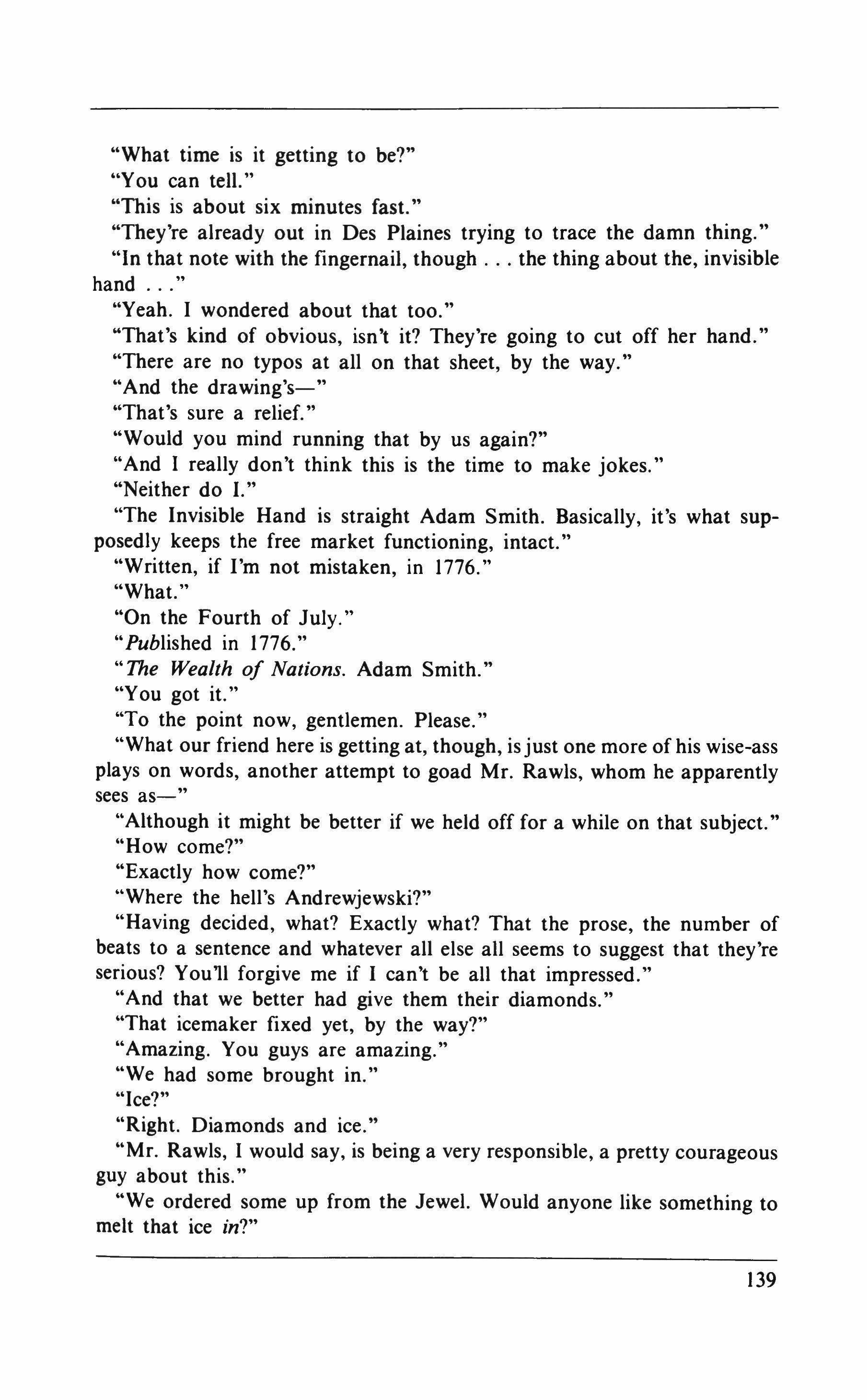
"What time is it getting to be?"
"You can tell."
"This is about six minutes fast."
"They're already out in Des Plaines trying to trace the damn thing."
"In that note with the fingernail, though the thing about the, invisible hand
"Yeah. I wondered about that too."
"That's kind of obvious, isn't it? They're going to cut off her hand."
"There are no typos at all on that sheet, by the way."
"And the drawing's-"
"That's sure a relief."
"Would you mind running that by us again?"
"And I really don't think this is the time to make jokes."
"Neither do I."
"The Invisible Hand is straight Adam Smith. Basically, it's what supposedly keeps the free market functioning, intact."
"Written, if I'm not mistaken, in 1776."
"What.
"On the Fourth of July."
"Published in 1776."
"The Wealth of Nations. Adam Smith."
"You got it."
"To the point now, gentlemen. Please."
"What our friend here is getting at, though, is just one more of his wise-ass plays on words, another attempt to goad Mr. Rawls, whom he apparently sees as-"
Although it might be better if we held off for a while on that subject."
"How come?"
"Exactly how come?"
"Where the hell's Andrewjewski?"
"Having decided, what? Exactly what? That the prose, the number of beats to a sentence and whatever all else all seems to suggest that they're serious? You'll forgive me if I can't be all that impressed."
"And that we better had give them their diamonds."
"That icemaker fixed yet, by the way?"
"Amazing. You guys are amazing."
"We had some brought in."
"Ice?"
"Right. Diamonds and ice."
"Mr. Rawls, I would say, is being a very responsible, a pretty courageous guy about this."
"We ordered some up from the Jewel. Would anyone like something to melt that ice in?"

"Burke Rawls, insidious purveyor of systemic violence, you mean? This guy here?"
"I'm not touching anything if his ice is in it."
"Now that you mention it_to "Yours truly, my friends."
"That's who I mean."
"Hands?"
"I wouldn't mind one. Just a taste to wash down this sandwich."
"Not for me, thanks."
"I think 1 would too."
Genevieve waves an old piece of lime green hula hoop at Frances, her golden retriever. Frances arches her back and starts yipping.
The sun casts their shadows almost straight down onto the grass of the Rawises' backyard; most of the grass is still green. Genevieve brushes the end of the hoop in the grass. A bright yellow Sunfish tilts and slides by through the trees a hundred yards out on the lake. Genevieve rears back and tosses the stick and Frances is on top of it in a moment.
Genevieve hollers, "Fetch!"
Frances returns to Genevieve's feet but refuses to give up the stick.
"Good girl," says Genevieve, reaching down. "Oh you! I mean bad girl."
She grabs for the stick again, laughing, but Frances draws back.
After fifteen seconds of this, Frances accidentally-on-purpose allows the stick to be snatched from her teeth.
Burke Rawls looks on from a first-story window; it is difficult to make out his features because of the dazzle of foliage and sun on the glass.
Genevieve tosses the stick-much farther this time-and Frances goes after it.
Two stories up, on the roof, an FBI tactical officer stands beside one of the gables, staring past Frances and Genevieve out toward the boat on the lake. Frances barks.
A brightly colored professional slide projected onto a portable screen at the far end of the almost-dark study: Burke Rawls giving a speech. He is standing behind the rostrum, wearing a gray pin-striped suit, on a stage draped with red, white, and blue bunting. His hair is darker and shorter, more slicked back, than it is at the moment, as he sits and stares up at the screen.
The slide advancer clicks forward, the screen darkens, and another slide drops into place: a small blonde girl in a green and blue bathing suit, squinting up into the sun.
"Elizabeth over the summer," says Andrewjewski.
Dust and smoke drift through the bright shaft of light. Someone coughs.

The projector continues to hum. The next slide shows Elizabeth in pigtails, her mouth open wide in a shout, sitting on Jack Exley's shoulders.
"The most recent shot we can get hold of," says Andrewjewski. "Besides the school picture. Taken about five or six weeks ago."
The next slide shows Elizabeth staring wide-eyed into the camera, wearing her Cubs jacket. The background is fuzzy.
"The Polaroid that came with the letter," says Andrewjewski. "The lab boys downtown managed to come up with this slide."
Next, an extreme close-up, cropped, of the previous slide.
"Pay attention now," says Andrewjewski. "This is Elizabeth-"
The next slide shows another young girl, also blond, also with pigtails, sitting on top of a pony.
"-and this is Genevieve Rawls."
A cropped close-up of the previous slide now appears.
"It might not be all that easy to see the resemblance," says Andrewjewski. "But even from these angles, these
The next slide shows Elizabeth again, sitting between her parents this time. Both she and Shelley had blinked as the film was exposed. Exley is smiling.
"We11 have to take Mrs. Witt's, and Mrs. Rawls's, word for it though. But if we imagine them both wearing braids on most days, almost exactly the same height and weight, the extent of their resemblance-in other words, they might well be mistaken
Andrewjewski gets up now and turns on the light. "The point's that they look damn well alike. They tended as well to wear these little baseball jackets, Cubs jackets, fairly regularly. At least twice a week according to both of their parents. Mrs. Exley has stated
The image on the screen of the Exleys' three faces can be made out just barely by now, in the light. and that Elizabeth often would
A nurse hands Shelley a small cup of juice, examines the IV fluid's level, smiles, and goes out. Exley ignores her. Shelley puts the juice on the table beside her. Exley rests his chin on his palm, lifts it back up right away. Shelley closes her eyes.
Exley stands up and says, "The one, the only thing they can calculate now, that they can promise us, Shell, is really what's probable."
Shelley is silent. Exley takes out a cigarette, lights it, looks around the room for an ashtray. He goes into the room's tiny bathroom and picks up a glass off the sink, comes back and sits down. Shelley is silent.
The sound-very sudden-of aluminum carts crashing together out in the hallway, plastic trays hitting the floor, clattering silverware. Shelley jumps.

Exley gets up and stands next to her.
Shelley stares out the window; her irises flutter and vibrate.
Tiarnahan clenches his jaw and breathes out, grinding his teeth to release the pressure inside his sinuses, as the plane drops another three hundred feet. The seatbelt and no-smoking signs light up.
He looks out the window and watches the end of the wing tilt and cut through the cloud cover. A stream of clear water sprays back off of the jet.
A stewardess comes down the aisle now, picking up cups, trays, and napkins, chewing gum. Tiarnahan fingers the latch on his briefcase.
The plane drops again and the lower end of Manhattan suddenly comes into view. Tiarnahan rests the side of his head on the window and stares.
Farther north and still lower: the Empire State Building, then Central Park. It is raining. He puts out his cigarette.
Cabs, specks of yellow, become visible now, moving between the dark buildings. The captain's voice comes over the speakers to announce what the weather will be.
Harlem. The Bronx. The East River. Trucks are now distinguishable from buses. The Hudson winds north. The horizon.
He sits back and closes his eyes, and keeps them closed for some time.
The cabin tips right as the plane, still descending over New Jersey in stages, begins circling down toward La Guardia.
He pinches his nose now, breathing out, watching Manhattan swing sideways away from him, the water get closer and closer.
Andrewjewski walks into the study. "There's some news here now, Jack." He sits down on one of the chairs. "So I'm glad you came back." He looks at his watch. "Although it's probably nothing."
Exley stands up.
"And Shelley's okay?"
"Shelley's okay. What's the news?"
"There's been a girl, Jack. About Elizabeth's age, blonde Alive?"
"Somebody found her-" "Elizabeth?"
"No. The body was found on the South Side this afternoon in one of the forest preserves."
Exley's lips press together; he sniffs, looks away. Andrewjewski watches him closely.
"But it and you're certain it isn't Elizabeth?"
"It probably isn't, Jack, which is the first thing we all want you and Shelley to know that eventually, that we really don't think it's your daughter.

"But she looks like 1 mean-to "We've already sent three pictures of Elizabeth down there."
"And?"
"And they still can't be positive."
"Jesus, where is she?"
"We hate to put you through something like this, Jack. We've just got to make sure."
"I understand that. But, shit So where is she?"
"They've taken her to the medical examiner's office. We'd like you to go down there and, you know, take a look at this girl. Just to be certain."
"Just to be certain. You mean, so you mean at the morgue?"
"They just took her in there in the last half hour or so."
"So when, when would we, be going down there?"
"Right away. We've got a helicopter and, whenever you're ready. 1 mean, I really do think that this is the easiest-"
"Let's go then."
"Because at this stage I don't believe, telling Exley nods.
"It would just-" "Right," says Exley, shaking his head. "Neither do I."
Tiarnahan's cab moves haltingly across Forty-seventh Street, slows down, and stops. The driver starts honking.
Three cars ahead of them two huge men in shirt-sleeves are unloading a van in the downpour, taking their time, laughing at a joke one has told.
Tiarnahan puts his index finger into his ear, turns it, shakes his head slightly. The meter clicks ahead to $16.75. Someone honks.
The cab moves forward again as one of the cars in front of them manages to get past the van. The driver says something in Spanish, then groans. They slow down and stop. They move forward, slow down, and stop.
The torque from the thirteen-foot props on the silver and black NCI helicopter whips the bushes and trees into a frenzy in the Rawlses' backyard as Exley and Brett climb in, in back of the pilot.
A minicam operator leans out of NewsChopper5 and begins shooting this scene from the air.
The NCI helicopter rises straight up now, hovers at treetop level for two or three seconds, then swings out over the lake. It is followed by NewsChopperS. Exley looks down.

Both helicopters cut back over Kenilworth then, picking up speed, and head south-southwest toward the city.
Tiarnahan hands the driver a twenty, gets out of the cab, and dashes across the wide sidewalk, dodging pedestrians and covering his head with his briefcase. He pushes his way through the revolving glass door of the Fortyseventh Street entrance to 580 Fifth Avenue.
The lobby is packed. Nearly all of the men wear black suits, black ties, black coats, and streimels; their beards hang down past their collars. Tall black guards, with badges and holstered revolvers, are positioned in various comers. There are no women. Tiarnahan watches himself for a second or two in one of the fifteen TV monitors as he stands by the building's directory.
There's a camera as well in the elevator car he goes up in. To his left is a man who is, at most, four feet tall. What hair there is on his head is clipped short, but his curly brown beard hangs down onto his chest; several long strands from the beard near his temple have been pulled up and back, along with the curved silver frames of his glasses, and hang down in back of his ear. Beside this man is another man-also bearded, also dressed all in blackwho's six-feet-seven or eight. The two men speak softly in Yiddish.
Tiarnahan gets out at the seventeenth floor. A guard glances up from his desk, looks him over, then goes back to reading the paper.
The hallway is narrow and long, dimly lit. Each door is marked with a four-digit number in brass and a plaque bearing the name of the company inside. Tiamahan finds room 1720, the third to last door on the right, and goes in.
The wall facing the entrance in the tiny reception area has a gray metal door and beside it a teller-sized window shielded with bulletproof glass. Tiarnahan waits, presses a button, and waits.
A young, red-haired woman appears on the other side of the glass and says "Yes?"
Tiarnahan passes his card under the glass through the curved metal slot at the bottom. "I have an appointment with Mr
The woman looks at the card, then down at the calendar page on her desk. Tiamahan smiles.
The woman points in the direction of the gray metal door, smiles, and presses a loud, rasping buzzer.
The walnut-panelled viewing room of the Cook County Medical Examiner's Office. Exley, Brett, and Chief Deputy Examiner Henry F. Carr are standing alongside a brown Naugahyde sofa. A black and white TV monitor hangs from a strut in the corner; its picture, rolling vertically once every two or three seconds, is badly distorted by feedback patterns and static.
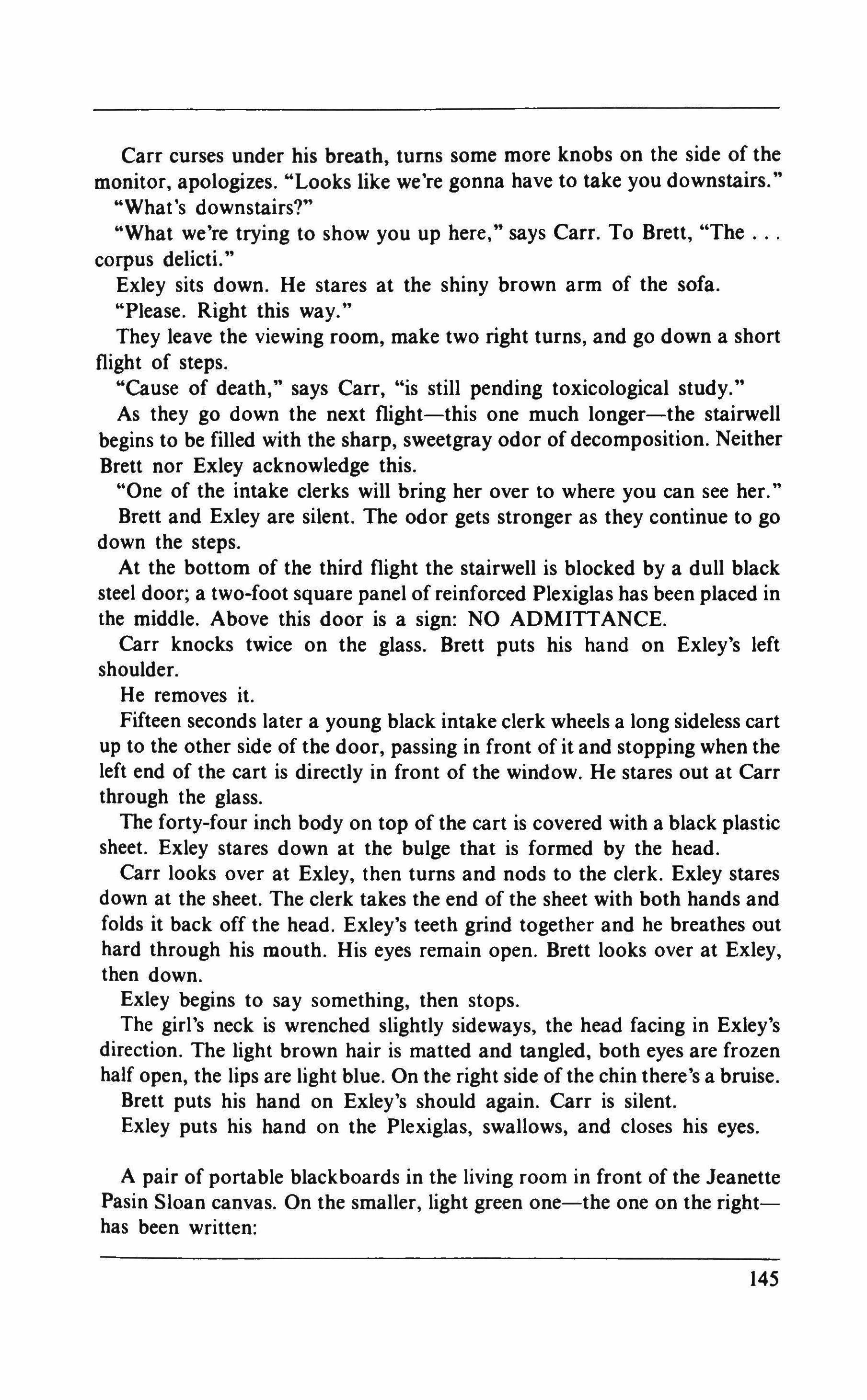
Carr curses under his breath, turns some more knobs on the side of the monitor, apologizes. "Looks like we're gonna have to take you downstairs."
"What's downstairs?"
"What we're trying to show you up here," says Carr. To Brett, "The corpus delicti."
Exley sits down. He stares at the shiny brown arm of the sofa.
"Please. Right this way."
They leave the viewing room, make two right turns, and go down a short flight of steps.
"Cause of death," says Carr, "is still pending toxicological study."
As they go down the next flight-this one much longer-the stairwell begins to be filled with the sharp, sweetgray odor of decomposition. Neither Brett nor Exley acknowledge this.
"One of the intake clerks will bring her over to where you can see her."
Brett and Exley are silent. The odor gets stronger as they continue to go down the steps.
At the bottom of the third flight the stairwell is blocked by a dull black steel door; a two-foot square panel of reinforced Plexiglas has been placed in the middle. Above this door is a sign: NO ADMITTANCE.
Carr knocks twice on the glass. Brett puts his hand on Exley's left shoulder.
He removes it.
Fifteen seconds later a young black intake clerk wheels a long sideless cart up to the other side of the door, passing in front of it and stopping when the left end of the cart is directly in front of the window. He stares out at Carr through the glass.
The forty-four inch body on top of the cart is covered with a black plastic sheet. Exley stares down at the bulge that is formed by the head.
Carr looks over at Exley, then turns and nods to the clerk. Exley stares down at the sheet. The clerk takes the end of the sheet with both hands and folds it back off the head. Exley's teeth grind together and he breathes out hard through his mouth. His eyes remain open. Brett looks over at Exley, then down.
Exley begins to say something, then stops.
The girl's neck is wrenched slightly sideways, the head facing in Exley's direction. The light brown hair is matted and tangled, both eyes are frozen half open, the lips are light blue. On the right side of the chin there's a bruise.
Brett puts his hand on Exley's should again. Carr is silent.
Exley puts his hand on the Plexiglas, swallows, and closes his eyes.
A pair of portable blackboards in the living room in front of the Jeanette Pasin Sloan canvas. On the smaller, light green one-the one on the righthas been written:
I· A3k I' 1m = rm k oo k-oo
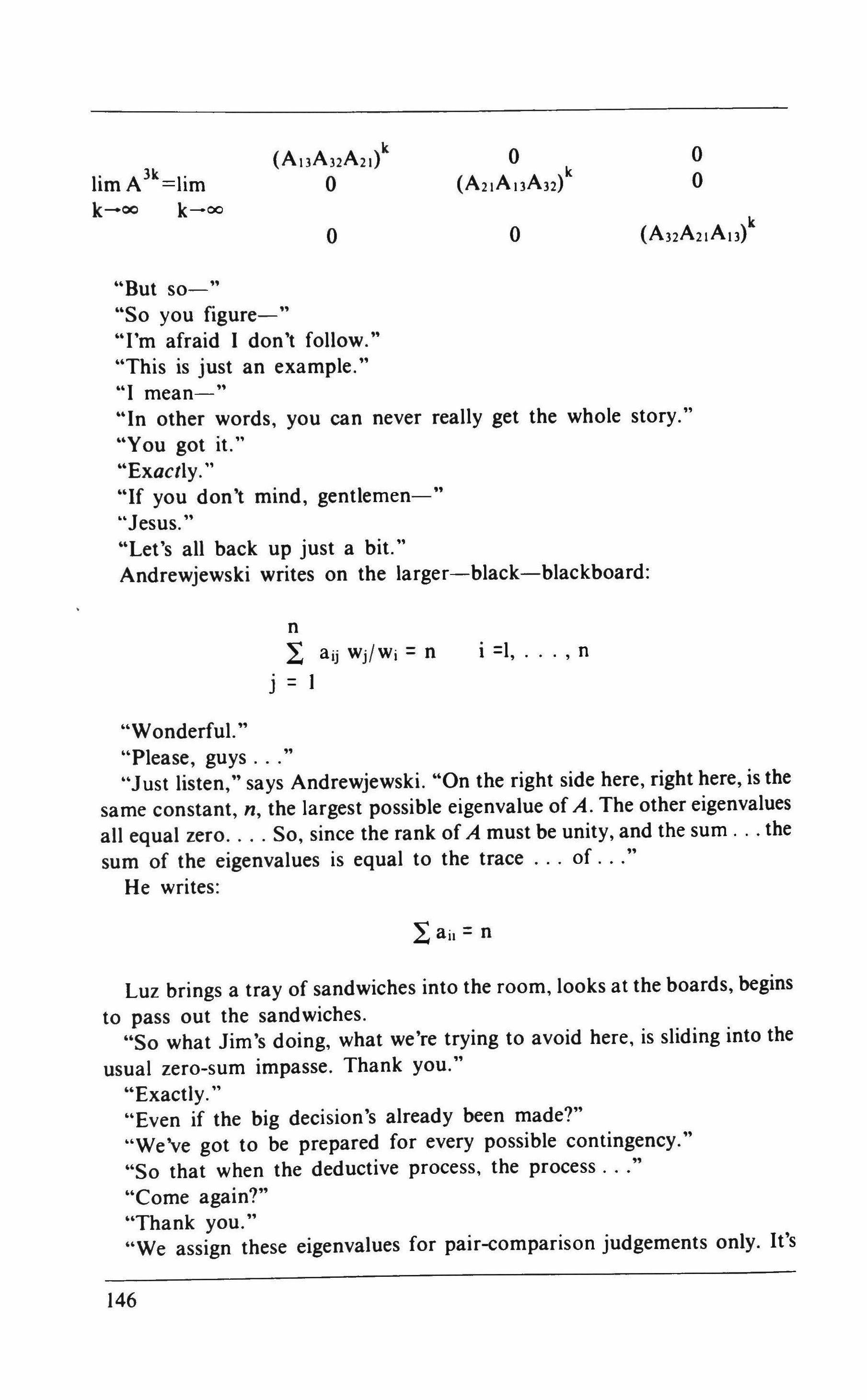
"But so-"
"So you figure-"
"I'm afraid I don't follow."
"This is just an example."
"I mean-"
"In other words, you can never really get the whole story."
"You got it."
"Exactly
"If you don't mind, gentlemen-"
"Jesus.
"Let's all back up just a bit."
Andrewjewski writes on the larger-black-blackboard:
"Wonderful.
"Please, guys
"Just listen," says Andrewjewski. "On the right side here, right here, is the same constant, n, the largest possible eigenvalue of A. The other eigenvalues all equal zero So, since the rank of A must be unity, and the sum the sum of the eigenvalues is equal to the trace of
He writes:
Luz brings a tray of sandwiches into the room, looks at the boards, begins to pass out the sandwiches.
"So what Jim's doing, what we're trying to avoid here, is sliding into the usual zero-sum impasse. Thank you."
"Exactly.
"Even if the big decision's already been made?"
"We've got to be prepared for every possible contingency."
"So that when the deductive process, the process
"Come again?"
"Thank you."
"We assign these eigenvalues for pair-comparison judgements only. It's
really quite simple. All we're doing is asking ourselves two simple questions: which of two alternatives is the more significant or better, and, second, what is the magnitude of the difference?" "Right."
Luz passes again in front of the boards and goes out.
"We try, you see, we try to let the figures we come up with reflect as accurately as possible our feelings, our considered opinions, but at the same time allowing for a moderate amount of uncertainty."
"What if we disagree on-"
"We just average them. And if we err at, at all, we always want to be sure-"
"Which figures, though?"
"What happened to the good old days with the x's and cosines?" "These," says Andrewjewski. He writes:
INTENSITY I 3 5 7 9 activities of equal importance inconclusive evidence favoring one activity good evidence-logical criteria favoring conclusive evidence absolute-maximum poss. ev
"We've already got this stuff down on the sheet." "Right," says Andrewjewski. Then, down in the corner of the same board, he writes:

"What we compare, then, is the ith activity-" "Right. "-with the jth."
"Got it."
"You follow?"
"Oh yeah."
"Suuure,"
There is laughter.
"What could be simpler?"
Rawls takes a bite of his sandwich.
"What about the kth with the lth? Can you-"
"Would you mind running that last part by us again?"
Andrewjewski loosens his tie, brushes some chalk dust off his pants, and says, "Sure."

"Contractions," says Shelley. "That's pretty much what they feel like. Contractions."
Dr. Traisman feels Shelley's abdomen, squeezes it gently, looks down into her eyes. Shelley reaches down and touches the lower part of her side, presses one spot, then moves her hand back and forth. "They're all in through here."
"Feeling cold at all, too?"
"Chills," she says. "Just when-" "When the pressure begins to start up again?" "Yes."
A nurse, standing on the other side of the bed, says, "She's been soaking through her peripads, almost two an hour."
Traisman nods. Shelley winces then and closes her eyes.
"What we're going to do," says Traisman, covering her up now and waiting for the contraction to pass, "is increase the Tributaline to help take some of this pressure off of your uterus."
Shelley doesn't respond.
"The most important thing now, 1 think, is for you to try to relax."
"I really-"
"Otherwise," says Traisman, "how are you doing?"
Shelley breathes out hard through her mouth and looks up at him.
Two reporters-a woman wearing a gray flannel business suit and medium heels, a man in a brown leather jacket and blue jeans-rush out the door of the Tribune Tower in downtown Chicago and head north on Michigan Avenue.
They alternate jogging and walking, picking their way through the crowd on the sidewalks, helping each other along, making about the same time as the buses and cabs in the street.
The woman looks at her watch as they pass Saks Fifth Avenue. They pick up the pace.
They go by the WAIT Radio Building, then get stopped by a red light at Huron.
At Chicago Avenue they stop again and speak to each other, the man holding onto the woman's left elbow, waiting for the light to tum green.
They pass the old Water Tower Works. The woman's ankle turns on her heel now, but she regains her balance, unhurt. The man slows down and waits up for her.
They go in the main entrance of Water Tower Place and stop, out of breath. The woman takes a small red tablet from her pocket, opens it, refers to some note. They both walk quickly then toward the escalator.
They mount the stairs of the escalator, moving past several people, until halfway up they are stopped by a tiny couple in their seventies standing
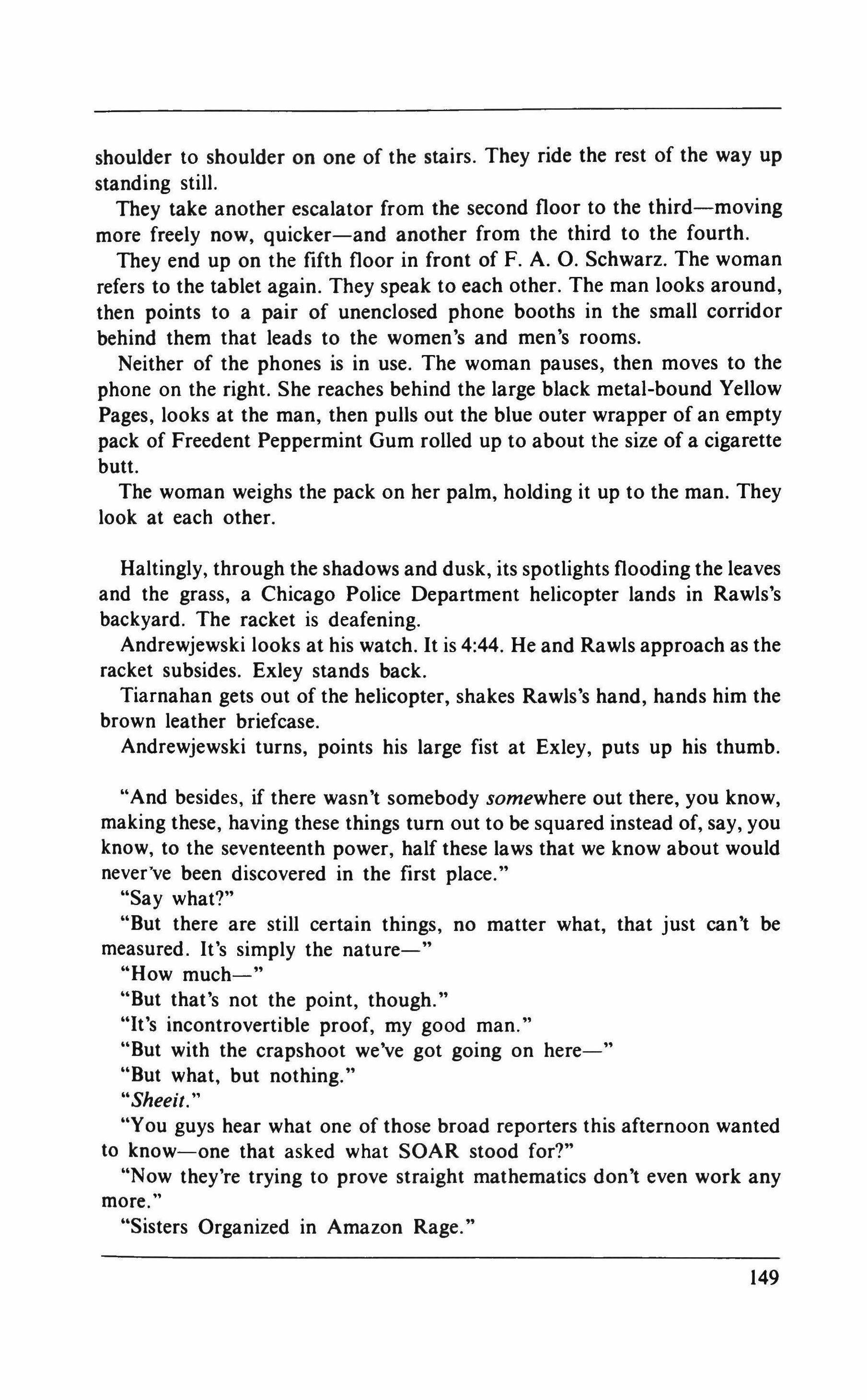
shoulder to shoulder on one of the stairs. They ride the rest of the way up standing still.
They take another escalator from the second floor to the third-moving more freely now, quicker-and another from the third to the fourth.
They end up on the fifth floor in front of F. A. O. Schwarz. The woman refers to the tablet again. They speak to each other. The man looks around, then points to a pair of unenclosed phone booths in the small corridor behind them that leads to the women's and men's rooms.
Neither of the phones is in use. The woman pauses, then moves to the phone on the right. She reaches behind the large black metal-bound Yellow Pages, looks at the man, then pulls out the blue outer wrapper of an empty pack of Freedent Peppermint Gum rolled up to about the size of a cigarette butt.
The woman weighs the pack on her palm, holding it up to the man. They look at each other.
Haltingly, through the shadows and dusk, its spotlights flooding the leaves and the grass, a Chicago Police Department helicopter lands in Rawls's backyard. The racket is deafening.
Andrewjewski looks at his watch. It is 4:44. He and Rawls approach as the racket subsides. Exley stands back.
Tiarnahan gets out of the helicopter, shakes Rawls's hand, hands him the brown leather briefcase.
Andrewjewski turns, points his large fist at Exley, puts up his thumb.
"And besides, if there wasn't somebody somewhere out there, you know, making these, having these things tum out to be squared instead of, say, you know, to the seventeenth power, half these laws that we know about would never ve been discovered in the first place."
"Say what?"
"But there are still certain things, no matter what, that just can't be measured. It's simply the nature-"
"How much-"
"But that's not the point, though."
"It's incontrovertible proof, my good man."
"But with the crapshoot we've got going on here-"
"But what, but nothing."
"Sheeit."
"You guys hear what one of those broad reporters this afternoon wanted to know-one that asked what SOAR stood for?"
"Now they're trying to prove straight mathematics don't even work any more."
"Sisters Organized in Amazon Rage."
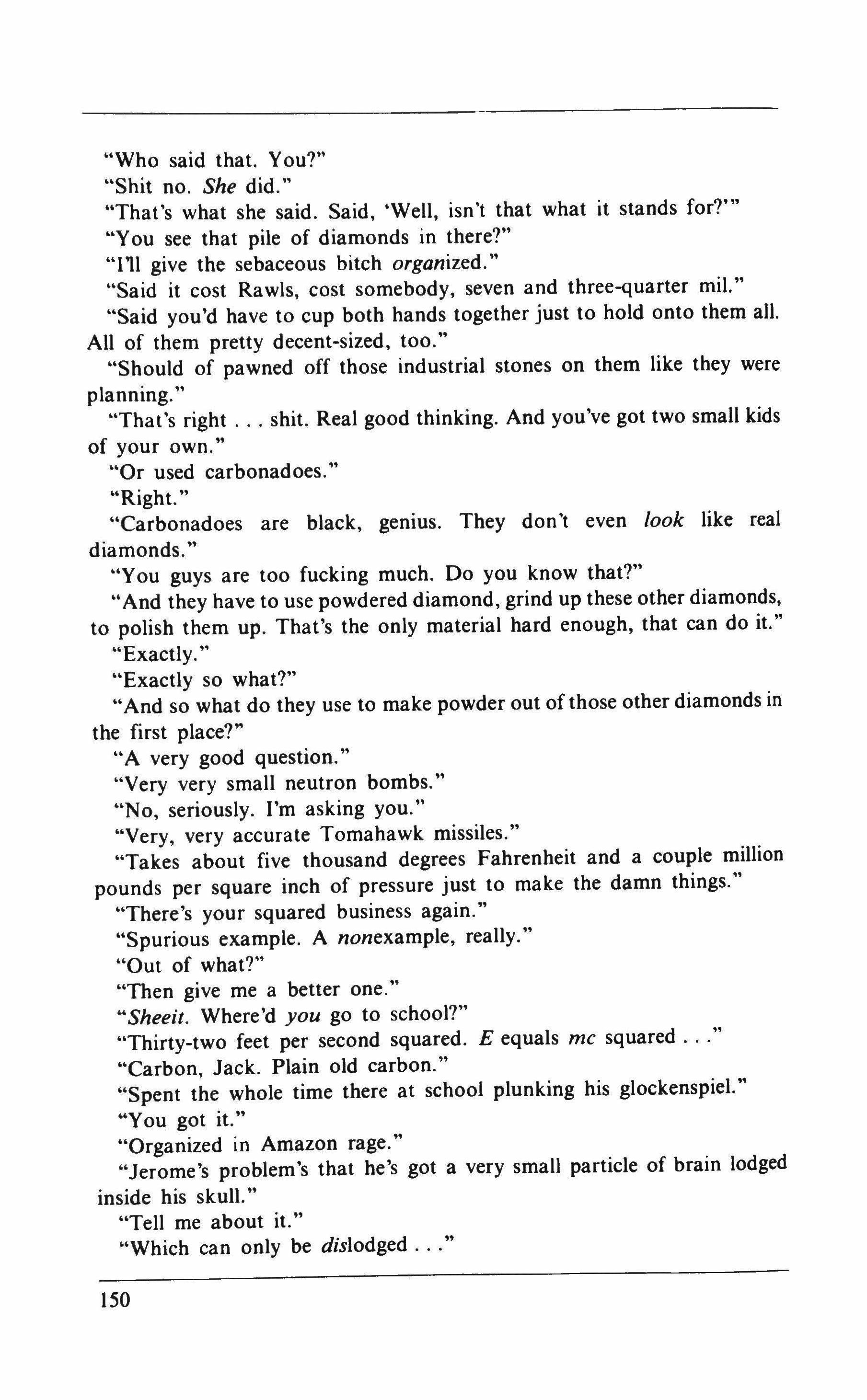
"Who said that. You?"
"Shit no. She did."
"That's what she said. Said, 'Well, isn't that what it stands for?"
"You see that pile of diamonds in there?"
"111 give the sebaceous bitch organized."
"Said it cost Rawls, cost somebody, seven and three-quarter mil."
"Said you'd have to cup both hands together just to hold onto them all. All of them pretty decent-sized, too."
"Should of pawned off those industrial stones on them like they were planning."
"That's right shit. Real good thinking. And you've got two small kids of your own."
"Or used carbonadoes."
"Right.
"Carbonadoes are black, genius. They don't even look like real diamonds."
"You guys are too fucking much. Do you know that?"
"And they have to use powdered diamond, grind up these other diamonds, to polish them up. That's the only material hard enough, that can do it."
"Exactly "Exactly so what?"
"And so what do they use to make powder out of those other diamonds in the first place?"
"A very good question."
"Very very small neutron bombs."
"No, seriously. I'm asking you."
"Very, very accurate Tomahawk missiles."
"Takes about five thousand degrees Fahrenheit and a couple million pounds per square inch of pressure just to make the damn things."
"There's your squared business again."
"Spurious example. A nonexample, really."
"Out of what?"
"Then give me a better one."
"Sheeit, Where'd you go to school?"
"Thirty-two feet per second squared. E equals me squared
"Carbon, Jack. Plain old carbon."
"Spent the whole time there at school plunking his glockenspiel."
"You got it."
"Organized in Amazon rage."
"Jerome's problem's that he's got a very small particle of brain lodged inside his skull."
"Tell me about it."
"Which can only be dislodged

"All this was before, even before Africa and South America split apart."
"Say what?"
"Continental drift, man."
"Which also goes to prove the existence of God, I suppose."
"You deduce this sort of thing from looking at the Kimberly shafts the diamonds end up getting suspended in."
"Oh, really?"
"Man here should be working for Exxon."
"Damn straight I should. And making about five times what you dickfors make."
"Sheeit.
"Tell me about it."
"111 tell you about it."
"Sheeeeit,
Andrewjewski, alone, in Rawls's study, holding up the blue Freedent gum packet.
He unrolls it finally, turns it upside down, and a child's small white incisor falls out onto the desk blotter; its miniscule roots are stained with dry blood.
He stares at the tooth for a while, massaging his temples, then stands.
He picks up the tooth, turns it around in his fingers, then drops it into the packet and rolls it back up again.
He stares around the room-at the bookshelves, the painting, the tape deck, the ashtrays, the row of gray phones-coughs, clears his throat.
He carefully wraps the packet inside a sheet of blank loose-leaf and puts it into his pocket.
Rawls comes into his study, carrying a Tribune, some folders, a pear. Exley is standing in front of one of the bookshelves, head cocked to the side, reading the titles. Andrewjewski sits up on the couch, his knees pressed together, writing on a large yellow legal pad.
There is silence.
Rawls looks at his watch-it is 8:48-then places the folders and pear on top of a file cabinet.
There is silence.
Exley pulls one of the books halfway out of the shelf. "Is this-"
The telephone rings-the second phone from the left-and Andrewjewski looks over at Rawls. He gets up off the couch, clicks on the tape deck, turns, picks up the phone.
"Rawls residence."
Exley looks over at Rawls.
"Yes May I ask who is calling."
Rawls scratches his cheekbone.

"All right. He's yes."
Andrewjewski hands Rawls the phone. "Hello."
Andrewjewski puts on the headphones and listens. Exley looks on, shifting his weight from foot to foot, blinking. "Yes," says Rawls. "Yes, I do have them Yes." He looks at Andrewjewski. "Ah hah I'm listening. But we'd also like to ask you something now Yes. But how do I know-"
Rawls stares at Andrewjewski, at Exley, listens into the phone. "We got cut off."
"He hung up," says Andrewjewski. He takes off the headphones. "What?"
"He just hung up," says Rawls. "I was just asking him how we'd be able to, that Elizabeth
Exley takes two quick steps forward and throws a wild roundhouse right at Rawls's head. Rawls starts to duck, but the blow still catches his forehead, knocking him sideways, backwards, and down. Andrewjewski puts his shoulder into Exley's chest and drives him back onto the couch. Exley cries out and covers his ribs with his forearm.
Rawls gets up off the floor. "Jesus H. fucking Christ."
The telephone receiver still lies on the carpet. The tape deck continues to turn. Andrewjewski disengages himself from Exley and gets back up off the couch. "Jack, listen-"
"How could you do that," says Exley to Rawls. "I mean I'm sorry, I but how could you fucking, do that."
"Do what?" says Rawls.
Exley sits up, trembling, catching his breath. still holding on to his ribs.
"I mean, Christ, Jack," says Rawls.
"Do what?"
"They'll call back, Jack," says Andrewjewski. He bends down and hangs up the phone. There is silence.
"Whatever you said," Exley says. He rubs his right knuckles. "Fucking whatever it is that you said
Some soft thing softly stirring soon to stir no more. To darkness visible to close the eyes and hear ifonly that. Some soft thing softly stirring soon to stir no more.
"I mean physically," says Exley. "You know what 1 feel like?"
Andrewjewski waits for the answer.
"I feel like, it's like 1 felt when 1 tried to quit smoking, but worse. 1 just realized that now. My eyes are bulging, they feel like they're pushing them-
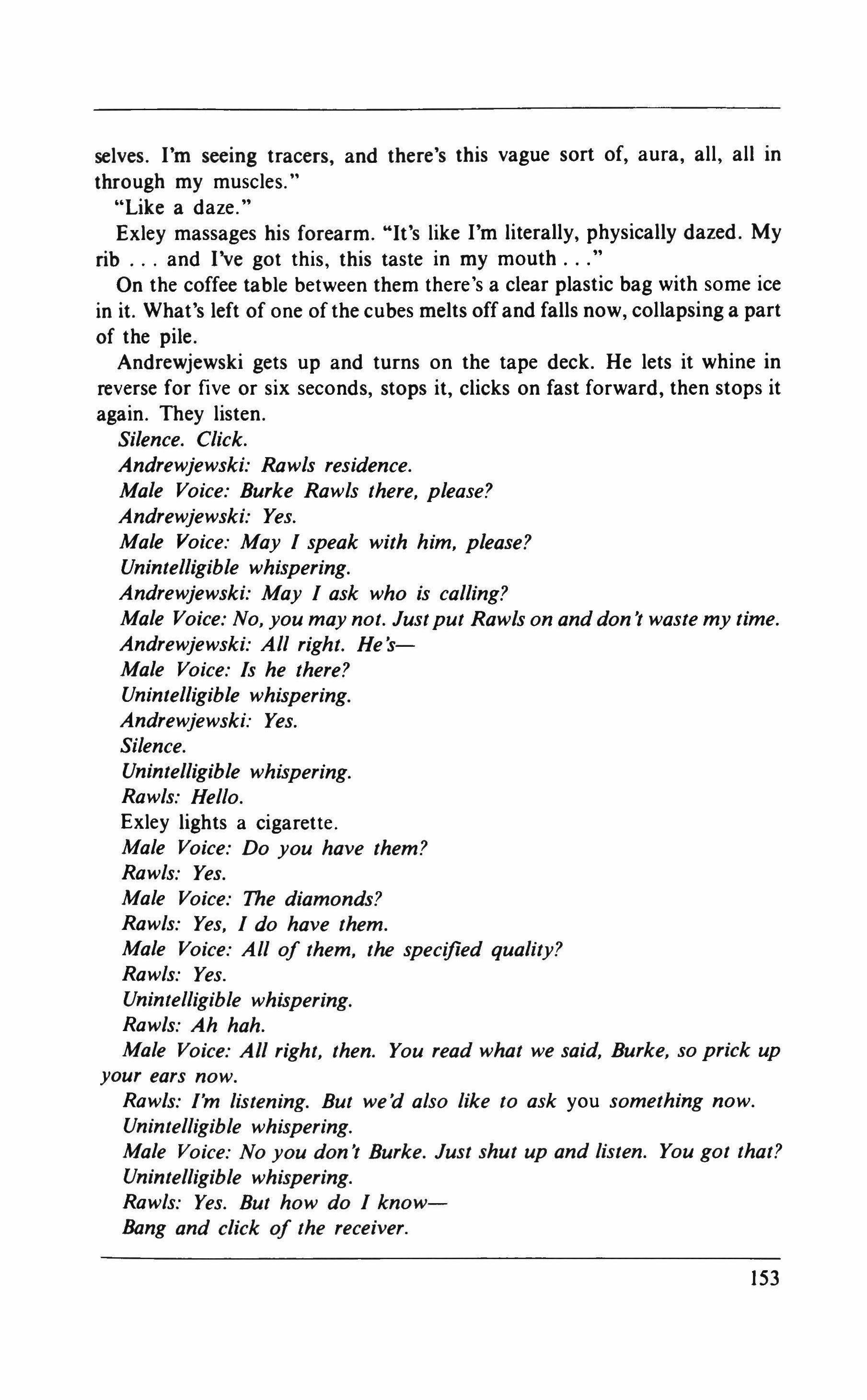
selves. I'm seeing tracers, and there's this vague sort of, aura, all, all in through my muscles."
"Like a daze."
Exley massages his forearm. "It's like I'm literally, physically dazed. My rib and I've got this, this taste in my mouth
On the coffee table between them there's a clear plastic bag with some ice in it. What's left of one of the cubes melts off and falls now, collapsing a part of the pile.
Andrewjewski gets up and turns on the tape deck. He lets it whine in reverse for five or six seconds, stops it, clicks on fast forward, then stops it again. They listen. Silence. Click.
Andrewjewski: Rawls residence.
Male Voice: Burke Rawls there, please?
Andrewjewski: Yes.
Male Voice: May I speak with him, please?
Unintelligible whispering.
Andrewjewski: May I ask who is calling?
Male Voice: No, you may not. Justput Rawls on and don't waste my time.
Andrewjewski: All right. He s-
Male Voice: Is he there?
Unintelligible whispering.
Andrewjewski: Yes. Silence.
Unintelligible whispering.
Rawls: Hello.
Exley lights a cigarette.
Male Voice: Do you have them?
Rawls: Yes.
Male Voice: The diamonds?
Rawls: Yes, I do have them.
Male Voice: All of them, the specified quality?
Rawls: Yes.
Unintelligible whispering.
Rawls: Ah hah.
Male Voice: All right, then. You read what we said, Burke, so prick up your ears now.
Rawls: I'm listening. But we'd also like to ask you something now.
Unintelligible whispering.
Male Voice: No you don't Burke. Just shut up and listen. You got that?
Unintelligible whispering.
Rawls: Yes. But how do I know
Bang and click of the receiver.

Silence.
Rawls: We got cut of!
Andrewjewski (further off): He hung up. Exley (further off): What?
Rawls: He just hung up I was just asking him how we'd be able to, that ElizabethShuffling noise, then a clap. The receiver bangs, vibrating loudly, onto the floor, then bounces around. Scuffling noise. A thud, then thefloor trembles. A cry, further off. Silence.
Rawls: Jesus H. fucking Christ. Silence.
"Expletive deleted," says Exley. "Right.
Andrewjewski: Jack, listenExley (out ofbreath): How could you do that? I mean I'm sorry, but how could you fucking, do that?
Rawls: Do what? Silence.
Rawls: I mean Christ, Jack.
Exley: Do what.
Andrewjewski: They'll call back, Jack. Silence.
Footsteps. Click of the receiver.
They sit there in silence-Exley still on the small leather couch, Andrewjewski in Rawls's desk chair-watching the silent tape move from one reel to the other. A haze of cigarette smoke hovers and floats in the light near the ceiling.
"I'm going out," says Exley. He puts out his cigarette.
"Sounds like a good idea," says Andrewjewski. He shuts off the tape deck. "111 be right here."
"Just take a short walk out back," Exley says. He looks out the window into the darkness. "Get some air."
Andrewjewski shifts his weight in the chair. "Good." He nods. "Do."
They are silent.
"And so, so you'll be in here."
"You go ahead," says Andrewjewski. "Don't worry."
Exley nods.
They both remain seated, staring off past one another.
12: IS. Rawls, in a clay-colored jacket, alone, reading the Tribune on the couch in his study. One of the telephones lights up and rings. He gets up, puts down the paper, and stands by the desk. The phone, the third from the
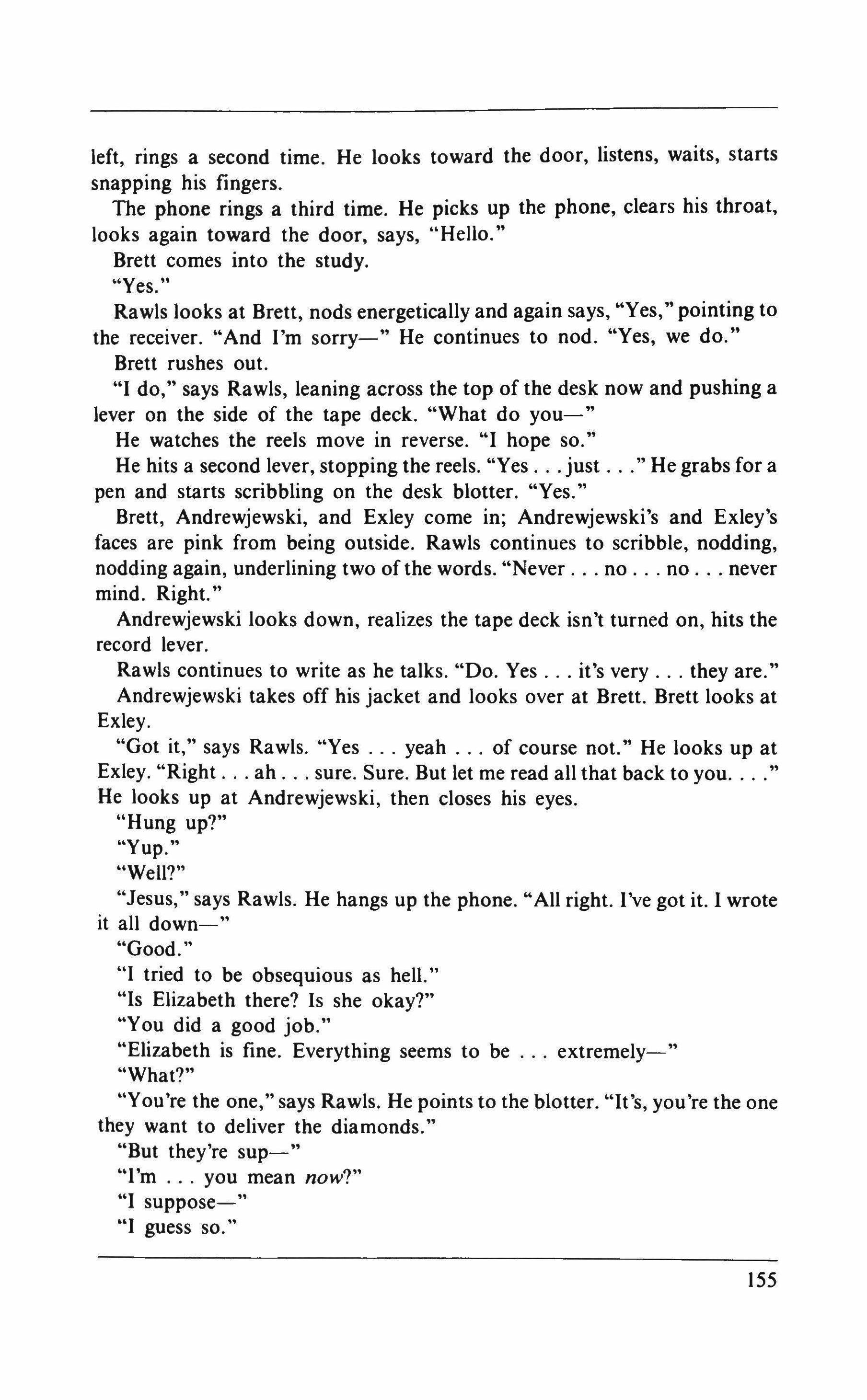
left, rings a second time. He looks toward the door, listens, waits, starts snapping his fingers.
The phone rings a third time. He picks up the phone, clears his throat, looks again toward the door, says, "Hello."
Brett comes into the study. "Yes. "
Rawls looks at Brett, nods energetically and again says, "Yes," pointing to the receiver. "And I'm sorry-" He continues to nod. "Yes, we do."
Brett rushes out.
"I do," says Rawls, leaning across the top of the desk now and pushing a lever on the side of the tape deck. "What do you-"
He watches the reels move in reverse. "I hope so."
He hits a second lever, stopping the reels. "Yes just He grabs for a pen and starts scribbling on the desk blotter. "Yes."
Brett, Andrewjewski, and Exley come in; Andrewjewski's and Exley's faces are pink from being outside. Rawls continues to scribble, nodding, nodding again, underlining two of the words. "Never no no never mind. Right."
Andrewjewski looks down, realizes the tape deck isn't turned on, hits the record lever.
Rawls continues to write as he talks. "Do. Yes it's very they are."
Andrewjewski takes off his jacket and looks over at Brett. Brett looks at Exley.
"Got it," says Rawls. "Yes yeah of course not." He looks up at Exley. "Right ah sure. Sure. But let me read all that back to you He looks up at Andrewjewski, then closes his eyes. "Hung up?"
"Yup." "Well?"
"Jesus," says Rawls. He hangs up the phone. "All right. I've got it. I wrote it all down-"
"Good."
"I tried to be obsequious as hell."
"Is Elizabeth there? Is she okay?"
"Y ou did a good job."
"Elizabeth is fine. Everything seems to be extremely-" "What?"
"You 're the one," says Rawls. He points to the blotter. "It's, you're the one they want to deliver the diamonds."
"But they're sup-"
"I'm you mean now?"
"I suppose-" "I guess so."

"I'm ready."
"And what did they actually say, Burke?"
"All right. Listen. Here's what he said." He refers to the blotter. "They want Jack; Jack's to deliver the diamonds." He looks up at Exley. "You're supposed to be wearing a stocking cap and a light-colored jacket and be to be walking south on the east-"
"I don't-"
"We'll get you one, Jack. Don't-"
"Look. Listen. I've got one I think you can out in the closet. The important thing is that they want you to be alone. All alone. He stressed that, said it three or four times." Rawls looks at the tape deck, then down at the blotter again. "You walk south on Sheridan Road until you come to the phone booth at the corner of Elder." To Andrewjewski: "He said he'll receive further tutelage once he gets there."
"When? That's good, Burke. But when?"
"Right away I assume. As soon as-"
"I mean, what time?"
"They shit! He didn't say. They didn't actually say what time I don't think.
"What?"
"Jesus.
"What time is it now?"
"You're sure, Burke."
"Twelve seventeen."
"Positive.
"They must of meant right away."
"The corner of Elder and Sheridan."
"Right.
Andrewjewski glances at Brett, nods, looks back at Rawls. Brett goes out.
"Okay," Exley says. "This is good."
"Your jacket's right there," says Andrewjewski, to Rawls. "Let me see it a second.
Rawls takes off his jacket and hands it to Andrewjewski.
"What we've got to do is," says Exley. "We've got to make sure we, that you don't-"
··111-"
"It's gonna work out."
Andrewjewski looks over the jacket-at the same time palming a small metal disk which he drops into one of the pockets-then hands it over to Exley.
"What they said was a light-colored jacket. Wasn't that what they said?"
··You don't think this is light enough?"
"Don't you think-"
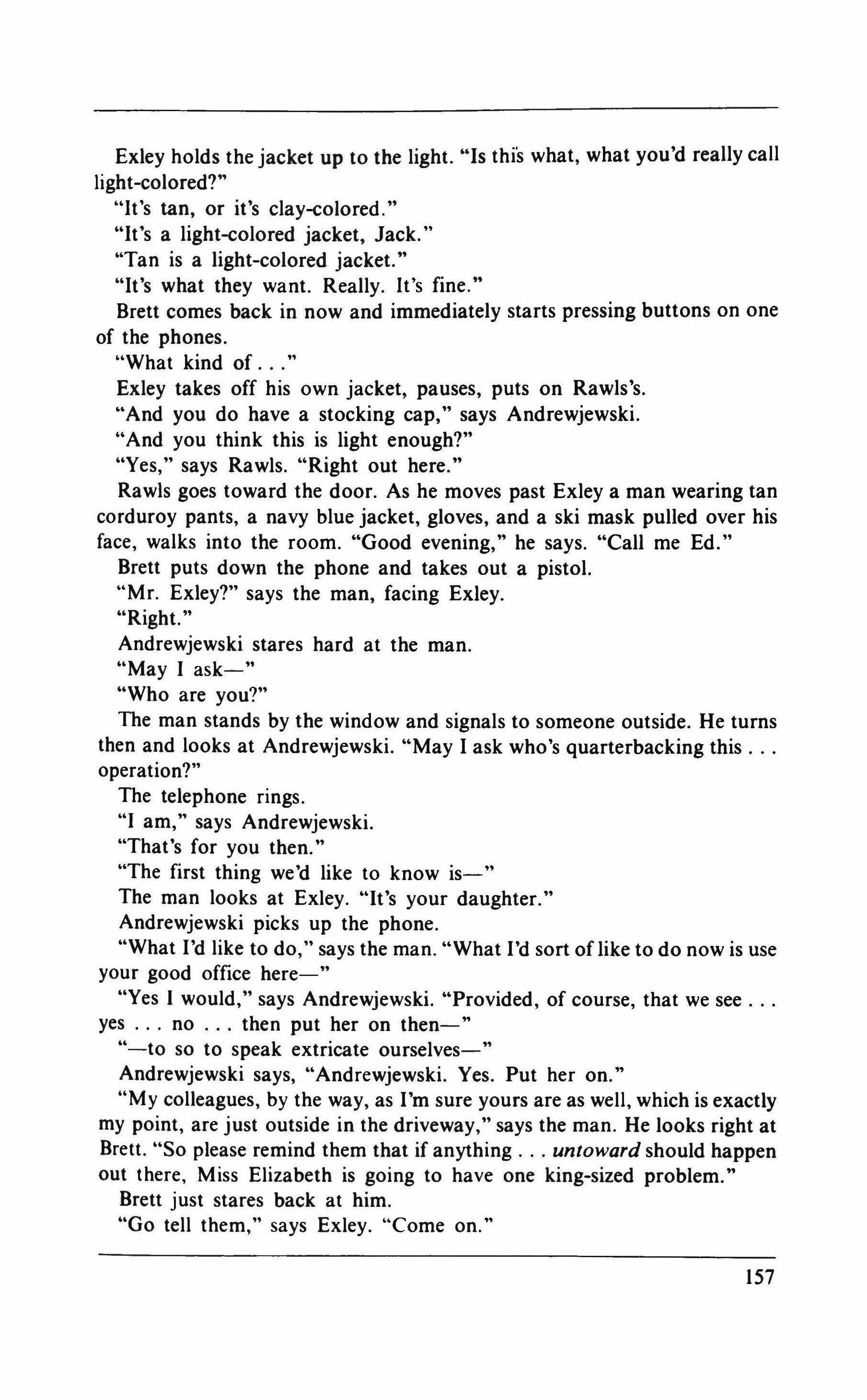
Exley holds the jacket up to the light. "Is this what, what you'd really call light-colored?"
"It's tan, or it's clay-colored."
"It's a light-colored jacket, Jack."
"Tan is a light-colored jacket."
"It's what they want. Really. It's fine."
Brett comes back in now and immediately starts pressing buttons on one of the phones.
"What kind of Exley takes off his own jacket, pauses, puts on Rawls's
And you do have a stocking cap," says Andrewjewski.
"And you think this is light enough?"
"Yes," says Rawls. "Right out here."
Rawls goes toward the door. As he moves past Exley a man wearing tan corduroy pants, a navy blue jacket, gloves, and a ski mask pulled over his face, walks into the room. "Good evening," he says. "Call me Ed."
Brett puts down the phone and takes out a pistol.
"Mr. Exley?" says the man, facing Exley.
"Right. Andrewjewski stares hard at the man.
"May I ask-" "Who are you?"
The man stands by the window and signals to someone outside. He turns then and looks at Andrewjewski. "May I ask who's quarterbacking this operation?"
The telephone rings. "I am," says Andrewjewski. "That's for you then."
"The first thing we'd like to know is-"
The man looks at Exley. "It's your daughter."
Andrewjewski picks up the phone.
"What I'd like to do," says the man. "What I'd sort of like to do now is use your good office here-"
"Yes I would," says Andrewjewski. "Provided, of course, that we see yes no then put her on then- to "-to so to speak extricate ourselves-"
Andrewjewski says, "Andrewjewski. Yes. Put her on."
"My colleagues, by the way, as I'm sure yours are as well, which is exactly my point, are just outside in the driveway," says the man. He looks right at Brett. "So please remind them that if anything untoward should happen out there, Miss Elizabeth is going to have one king-sized problem."
Brett just stares back at him.
"Go tell them," says Exley. "Come on."

"Yes," says Andrewjewski. "Although who's yes Ed is here." "Jesus," says Rawls.
Andrewjewski signals for Brett to go out, then reaches over, keeping his eye on the man, and hands Exley the phone. "She's fine," he says. "It's Elizabeth."
Brett leaves the room with his pistol.
"Yes," says the man. His eyes are light blue. "One heck of a king-sized problem."
"Honey?" says Exley. "It's Daddy yes." His voice goes up an octave and cracks. "I'm right here now."
The man glances around the study. "Very tasteful," he says. "Very tasteful although where are the diamonds?"
Rawls points them out.
"Ah.
"Sure," Exley says. "And we're gonna see you real soon, E. Really soon. Your tooth? Can you hear me? Right. Yeah, I'm real tired too."
The man takes a brown paper bag from his pocket, unfolds it, and carefully pours the diamonds from the pouch to the bag.
"Who's this?" Exley asks.
Andrewjewski and Rawls exchange glances.
"I won't," Exley says. "Fine right 1 won't. And you have my yeah. Should but should 1 Got it." He gives Andrewjewski the phone.
"What?"
"I do not want," says Exley. "I mean you simply, absolutely can't follow them out of here."
Andrewjewski listens into the phone, looks at the man, then hangs up.
"It's the most important part of the deal," Exley says. "They explicitly promised that if they see any cars, helicopters anything suspicious at all, they would kill her."
"The man's got a point," says the man. He looks out the window.
"The point-"
The man holds the bag up to Rawls in a kind of salute, bows, then stuffs the bag into his pocket.
Andrewjewski stares hard at the man. "We're not going to follow them, Jack.
"And you have what you came for, my friend," says Rawls. "Just understand that we want that girl back now."
The man puts up his hand. "You have my word."
"Understand?"
"She better come back," Exley says. He grabs the man's sleeve but quickly lets go. "How much-" "Jack, relax."
158

"Just what are you planning to do now?"
"Leave," says the man. To Andrewjewski: "Is everything clear?"
"Everything is perfectly clear," says Andrewjewski. "You're free to go now."
"Right," says the man. "The problem's that I never needed someone like you, old boy, to tell me these things."
"Whatever you say. I assure you we're all most impressed."
"When," Exley says. He blinks. "We'd like to know when she'll, exactly when you plan to release her."
"I'm going to send your kid back rather soon, as a matter of fact." "When?"
A hom honks outside.
"And if there's any funny business at all when we start to drive out of here," says the man. He raises his index finger. "I give you my word that she gets it."
"I mean it," says Exley. "I'll follow you till I drop in my tracks."
"Just go," says Andrewjewski. "You know what we want and we intend to see you deliver."
The man begins to walk out. "This has been a very delicate business," he says. "Wouldn't you say? And I want you to know that I think you've all behaved admirably."
"Which is-" "Exactly."
The man leaves the room and the other four follow after him. As they walk through the living room one of the phones rings again. Brett hesitates, looks over at Andrewjewski, then runs back to answer it. Genevieve, Anne, and another agent look out at them now from the kitchen.
"Look at it this way," says the man. "How am I gonna look next time if we don't send the girl back?"
No one responds.
They go out. The air frosts their breath as soon as they step out the door.
"Just keep in mind what I've said," says the man.
"And you do the same," says Andrewjewski.
A navy blue Plymouth Reliant K is parked in the driveway; its lights are on and its motor is running. Two men in ski masks are sitting in front, looking around at the six special agents who have surrounded the car. One of the agents furiously writes on a tablet. A gray Impala is parked in front of the Plymouth-right up against it-a green Impala in back of it.
The man tries to shake hands with Rawls but Rawls doesn't offer his hand. He turns then and shakes hands with Exley.
"I'm not going to beg you."
"No need to, friend. I'm a man of my word."
"But if she doesn't come back, I will kill you."
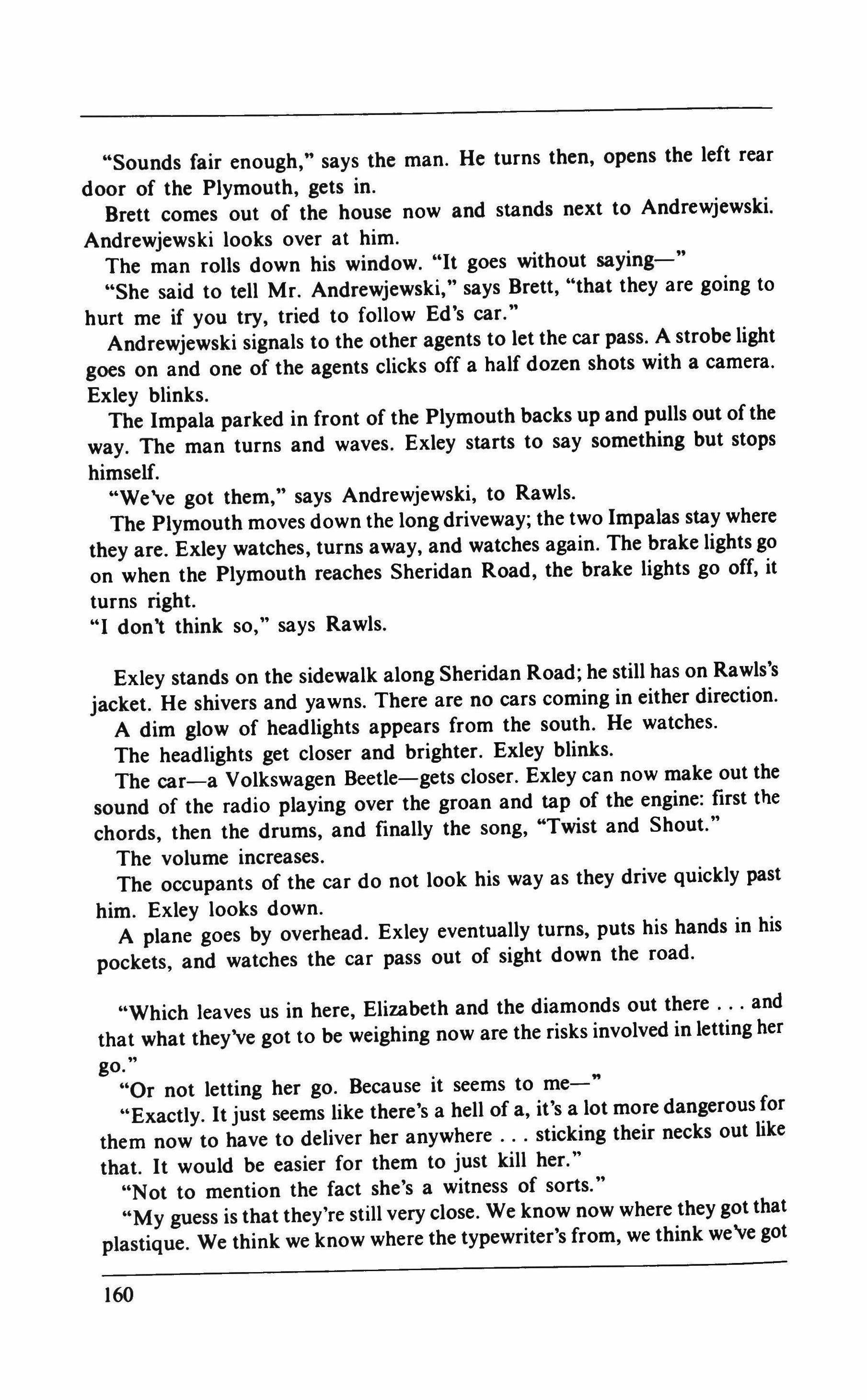
"Sounds fair enough," says the man. He turns then, opens the left rear door of the Plymouth, gets in.
Brett comes out of the house now and stands next to Andrewjewski. Andrewjewski looks over at him.
The man rolls down his window. "It goes without saying-" "She said to tell Mr. Andrewjewski," says Brett, "that they are going to hurt me if you try, tried to follow Ed's car."
Andrewjewski signals to the other agents to let the car pass. A strobe light goes on and one of the agents clicks off a half dozen shots with a camera.
Exley blinks.
The Impala parked in front of the Plymouth backs up and pulls out of the way. The man turns and waves. Exley starts to say something but stops himself.
"We've got them," says Andrewjewski, to Rawls.
The Plymouth moves down the long driveway; the two Impalas stay where they are. Exley watches, turns away, and watches again. The brake lights go on when the Plymouth reaches Sheridan Road, the brake lights go off, it turns right.
"I don't think so," says Rawls.
Exley stands on the sidewalk along Sheridan Road; he still has on Rawls's jacket. He shivers and yawns. There are no cars coming in either direction.
A dim glow of headlights appears from the south. He watches.
The headlights get closer and brighter. Exley blinks.
The car-a Volkswagen Beetle-gets closer. Exley can now make out the sound of the radio playing over the groan and tap of the engine: first the chords, then the drums, and finally the song, "Twist and Shout."
The volume increases.
The occupants of the car do not look his way as they drive quickly past him. Exley looks down.
A plane goes by overhead. Exley eventually turns, puts his hands in his pockets, and watches the car pass out of sight down the road.
"Which leaves us in here, Elizabeth and the diamonds out there and that what they've got to be weighing now are the risks involved in letting her go."
"Or not letting her go. Because it seems to me-"
"Exactly. It just seems like there's a hell of a, it's a lot more dangerous for them now to have to deliver her anywhere sticking their necks out like that. It would be easier for them to just kill her."
"Not to mention the fact she's a witness of sorts."
"My guess is that they're still very close. We know now where they got that plastique. We think we know where the typewriter's from, we think we've got
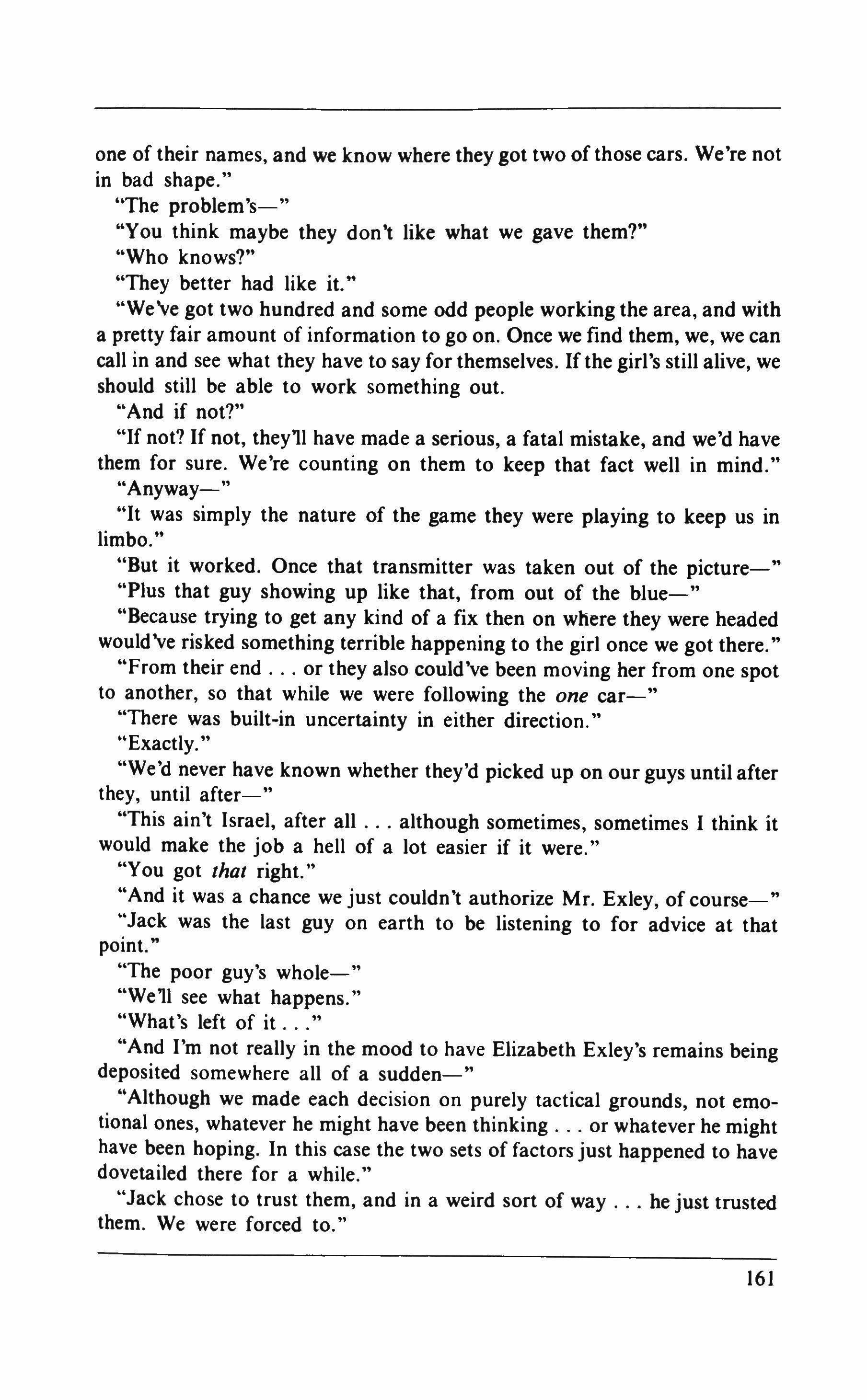
one of their names, and we know where they got two of those cars. We're not in bad shape."
"The problem's-"
"You think maybe they don't like what we gave them?"
"Who knows?"
"They better had like it."
"We've got two hundred and some odd people working the area, and with a pretty fair amount of information to go on. Once we find them, we, we can call in and see what they have to say for themselves. If the girl's still alive, we should still be able to work something out.
And if not?"
"If not? If not, they'll have made a serious, a fatal mistake, and we'd have them for sure. We're counting on them to keep that fact well in mind."
"Anyway-"
"It was simply the nature of the game they were playing to keep us in limbo."
"But it worked. Once that transmitter was taken out of the picture-"
"Plus that guy showing up like that, from out of the blue-"
"Because trying to get any kind of a fix then on where they were headed would've risked something terrible happening to the girl once we got there."
"From their end or they also could've been moving her from one spot to another, so that while we were following the one car-"
"There was built-in uncertainty in either direction."
"Exactly.
"We'd never have known whether they'd picked up on our guys until after they, until after-"
"This ain't Israel, after all although sometimes, sometimes I think it would make the job a hell of a lot easier if it were."
"You got that right."
"And it was a chance we just couldn't authorize Mr. Exley, of course-"
"Jack was the last guy on earth to be listening to for advice at that point.
"The poor guy's whole-"
"We'll see what happens."
"What's left of it
"And I'm not really in the mood to have Elizabeth Exley's remains being deposited somewhere all of a sudden-"
"Although we made each decision on purely tactical grounds, not emotional ones, whatever he might have been thinking or whatever he might have been hoping. In this case the two sets of factors just happened to have dovetailed there for awhile."
"Jack chose to trust them, and in a weird sort of way he just trusted them. We were forced to."
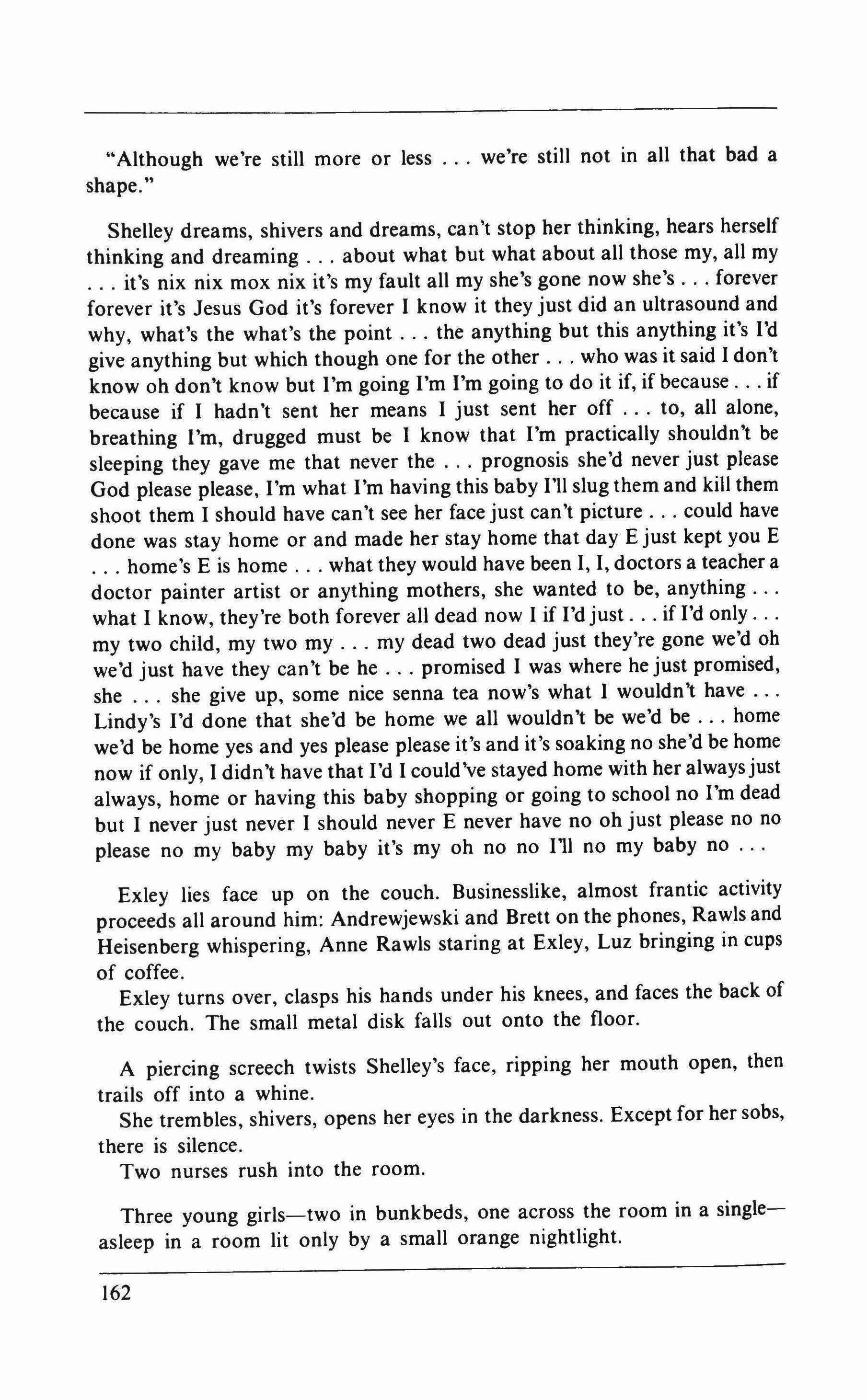
"Although we're still more or less we're still not in all that bad a shape."
Shelley dreams, shivers and dreams, can't stop her thinking, hears herself thinking and dreaming about what but what about all those my, all my it's nix nix mox nix it's my fault all my she's gone now she's forever forever it's Jesus God it's forever I know it they just did an ultrasound and why, what's the what's the point the anything but this anything it's I'd give anything but which though one for the other who was it said I don't know oh don't know but I'm going I'm I'm going to do it if, if because if because if I hadn't sent her means I just sent her off to, all alone, breathing I'm, drugged must be I know that I'm practically shouldn't be sleeping they gave me that never the prognosis she'd never just please God please please, I'm what I'm having this baby 111 slug them and kill them shoot them I should have can't see her face just can't picture could have done was stay home or and made her stay home that day E just kept you E home's E is home what they would have been I, I, doctors a teacher a doctor painter artist or anything mothers, she wanted to be, anything what I know, they're both forever all dead now I if I'd just if I'd only my two child, my two my my dead two dead just they're gone we'd oh we'd just have they can't be he promised I was where he just promised, she she give up, some nice senna tea now's what I wouldn't have Lindy's I'd done that she'd be home we all wouldn't be we'd be home we'd be home yes and yes please please it's and it's soaking no she'd be home now if only, I didn't have that I'd I could've stayed home with her alwaysjust always, home or having this baby shopping or going to school no I'm dead but I never just never I should never E never have no oh just please no no please no my baby my baby it's my oh no no 111 no my baby no
Exley lies face up on the couch. Businesslike, almost frantic activity proceeds all around him: Andrewjewski and Brett on the phones, Rawls and Heisenberg whispering, Anne Rawls staring at Exley, Luz bringing in cups of coffee.
Exley turns over, clasps his hands under his knees, and faces the back of the couch. The small metal disk falls out onto the floor.
A piercing screech twists Shelley's face, ripping her mouth open, then trails off into a whine.
She trembles, shivers, opens her eyes in the darkness. Except for her sobs, there is silence.
Two nurses rush into the room.
Three young girls-two in bunkbeds, one across the room in a singleasleep in a room lit only by a small orange nightlight.

An alarm clock goes off down the hall, but the girls do not stir.
The alarm clock is silenced.
Shelley's aluminum bed is wheeled out of an elevator, past two gurneys full of plasma and medicine, around one corner, then another, and down the short hallway toward the delivery room. One nurse keeps the IV bottle steady; a second holds a small damp towel against Shelley's forehead.
"She's contracting at at about ninety now," says one of the nurses. Shelley breathes quickly-once a second-and hard through her mouth. She is sweating.
"Because these spontaneous-"
Shelley grits her teeth and says "Shit."
They enter the delivery room. Two masked orderlies hoist Shelley up off the bed-one holds her calves, the other reaches under her armpits-and ease her onto the delivery table.
"She's started now breaking through."
Dr. Traisman holds a stethoscope against the lower part of her abdomen. He listens, then moves it to another position.
"Try to relax now, Honey," says one of the nurses. She holds Shelley's arm. "Just try to relax."
Another contraction arrives. Shelley winces.
"We've got four or five centimeters here of dilation," says Traisman.
The steady drip from the IV bottle continues.
"What about the new suture."
"Broke right through it again."
"A McDonald's?"
"Broke right through it."
Traisman places Shelley's left ankle into a stirrup and the second nurse raises the other one. Both legs glisten with sweat.
The contraction subsides but is followed right away by another one. Shelley cries out briefly and winces.
"Get me that-"
Shelley's whole abdomen quivers. She gasps.
"There."
Traisman gently parts Shelley's labium minus and touches the top of the skull.
"Oh fuck shit Jesus," says Shelley. She is sobbing now. "Oh my God!"
Another spasm and thrust and the top two-thirds of the head is exposed.
"Oh my God."
A nurse mops off Shelley's forehead.
"My oh my God
Traisman and the nurses work now in silence. Shelley's sobs and curses continue.

A third nurse enters the room, sees what is happening, then quickly goes out.
Traisman grabs the nine-inch-long female fetus and eases it the rest ofthe way out of Shelley's vagina. Shelley tries catching her breath, but she can't. She calls out Jack's name.
Still holding onto the fetus, Traisman cuts the umbilical cord with a pair of surgical scissors and looks up at Shelley. She sniffles and sobs. A nurse takes the fetus and leaves.
"It's all right now, Shelley. It's okay."
Another contraction, accompanied by a gurgling sound, and the afterbirth spills out onto the floor.
"It's okay."
Exley's face, facing left, in the light from the thin slice of moon.
Andrewjewski talks on the phone. "He's talking no, to sure sure. You can say that whatever-" He listens.
"Now listen," he says.
A crowded Chevrolet station wagon moves north on Sheridan Road. To the right, the sky over Lake Michigan has begun to light up; to the left it is still mostly dark. It is quiet.
The WAIT news is on the car's radio with the volume turned down. A middle-aged woman is driving, her teenaged son is sitting up front with her, and four or five younger girls are crowded into the back. They are quiet.
Three small birds call to each other as the light continues to spread out over the sky.
The boy holds up a green three-by-five card, looks out the window, and points. "This is it."
The wagon slows down, almost stops, then turns into the driveway marked 1900.
Two special agents dash across the white glaze of dew on the lawn and meet the car halfway up the driveway, signaling for the driver to stop. Frances starts barking.
The woman stops the car, rolls down her window, and speaks to one ofthe agents.
Andrewjewski and Exley come out the front door.
The wagon now slowly proceeds up the driveway with the two agents trotting beside it.
Exley tries to see into the car as it comes toward the porch, but all he can make out are the silvery reflections of tree limbs and sky flickering over the windshield. He tries hard to focus.
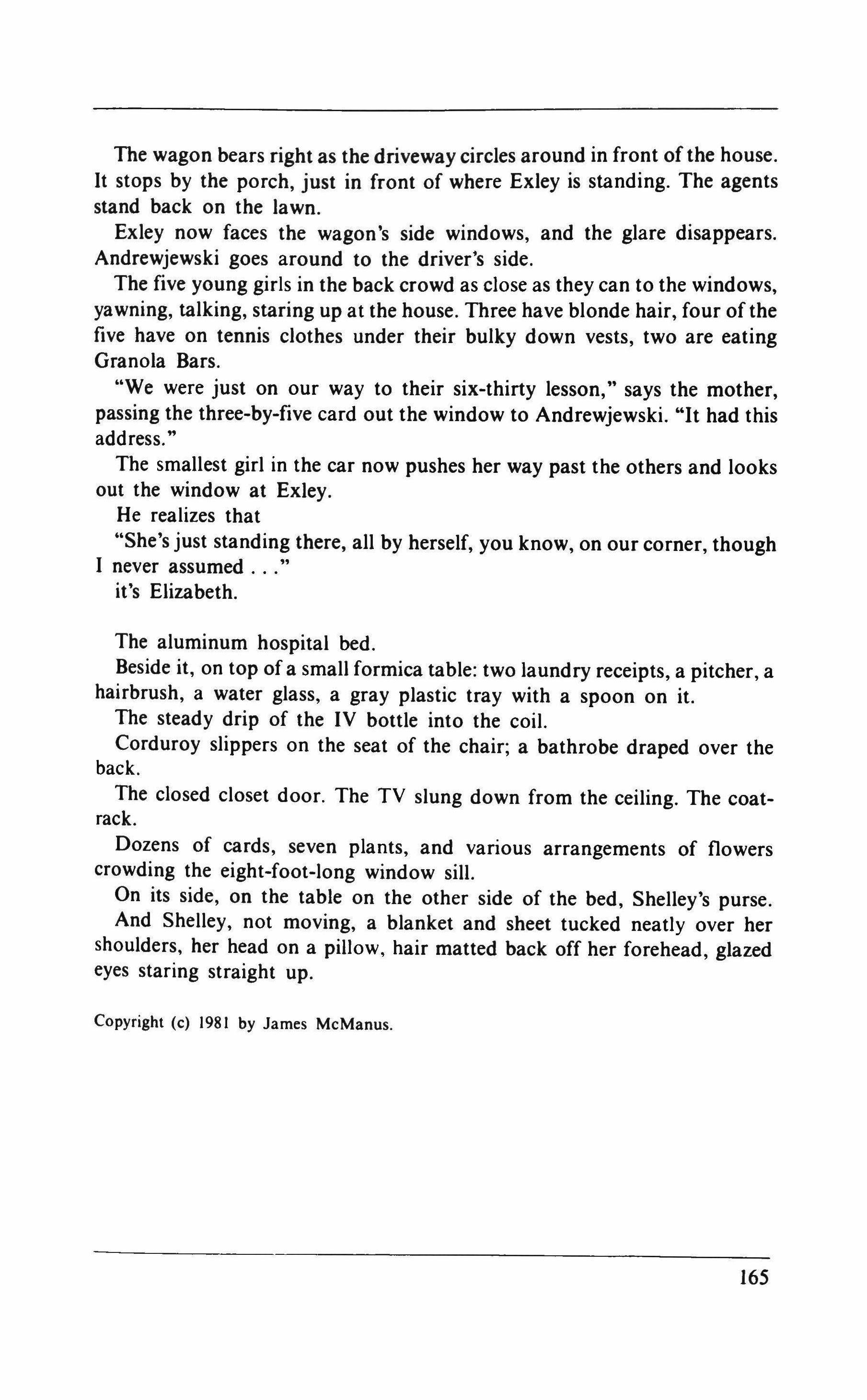
The wagon bears right as the driveway circles around in front of the house. It stops by the porch, just in front of where Exley is standing. The agents stand back on the lawn.
Exley now faces the wagon's side windows, and the glare disappears. Andrewjewski goes around to the driver's side.
The five young girls in the back crowd as close as they can to the windows, yawning, talking, staring up at the house. Three have blonde hair, four of the five have on tennis clothes under their bulky down vests, two are eating Granola Bars.
"We were just on our way to their six-thirty lesson," says the mother, passing the three-by-five card out the window to Andrewjewski. "It had this address.
The smallest girl in the car now pushes her way past the others and looks out the window at Exley.
He realizes that
"She's just standing there, all by herself, you know, on our corner, though I never assumed it's Elizabeth.
The aluminum hospital bed.
Beside it, on top of a small formica table: two laundry receipts, a pitcher, a hairbrush, a water glass, a gray plastic tray with a spoon on it.
The steady drip of the IV bottle into the coil.
Corduroy slippers on the seat of the chair; a bathrobe draped over the back.
The closed closet door. The TV slung down from the ceiling. The coatrack.
Dozens of cards, seven plants, and various arrangements of flowers crowding the eight-foot-long window sill.
On its side, on the table on the other side of the bed, Shelley's purse.
And Shelley, not moving, a blanket and sheet tucked neatly over her shoulders, her head on a pillow. hair matted back off her forehead, glazed eyes staring straight up.
Copyright (c) 1981 by James McManus.

The following portfolio is presented in conjunction with the first major United States retrospective of the sculpture of Magdalena Abakanowicz. This exhibition has been organized by the Museum ofContemporary Art, in Chicago, where it will open in October 1982. It is scheduled to tour nationally and internationally.
Over twenty years ago Magdalena Abakanowicz brought forth a totally new approach to the use of fiber. Born in 1930 to an aristocratic landowner family outside Warsaw, she survived World War II, and saw her family stripped of all means. From 1950 to 1955, she studied painting and sculpture at the Academy of Fine Arts in Warsaw, where she still lives. Abakanowicz's move to the use of fiber around 1960 was an unprecedented act: she insisted on the integrity of this material as a means of serious artistic expression with no utilitarian application; she employed sisal and other fibers, technically and formally, in thoroughly new ways. Fiber, a natural, pliable material, was well suited to the organic concepts that emerged in Abakanowicz's art. Her first important works were huge, coarsely woven forms that were usually tubular or circular abstract shapes and incorporated open slits, folds, and wrapped protruding elements, often sexually suggestive. Unique in the fiber field at that time, these works broke the centuries-old tradition of European tapestry-a tradition particularly strong and influential in Poland-and dramatically linked craft and art. The pieces were conceived three-dimensionally, first projecting from the wall and then fully sculptural, hanging free in space, and were so extraordinary that critics named them Abakans after the artist. Abakanowicz's approach to fiber, probably more than that of any other single contemporary artist, served as a major inspiration for the development, internationally, of innovative work in this medium throughout the 1960s and 1970s.
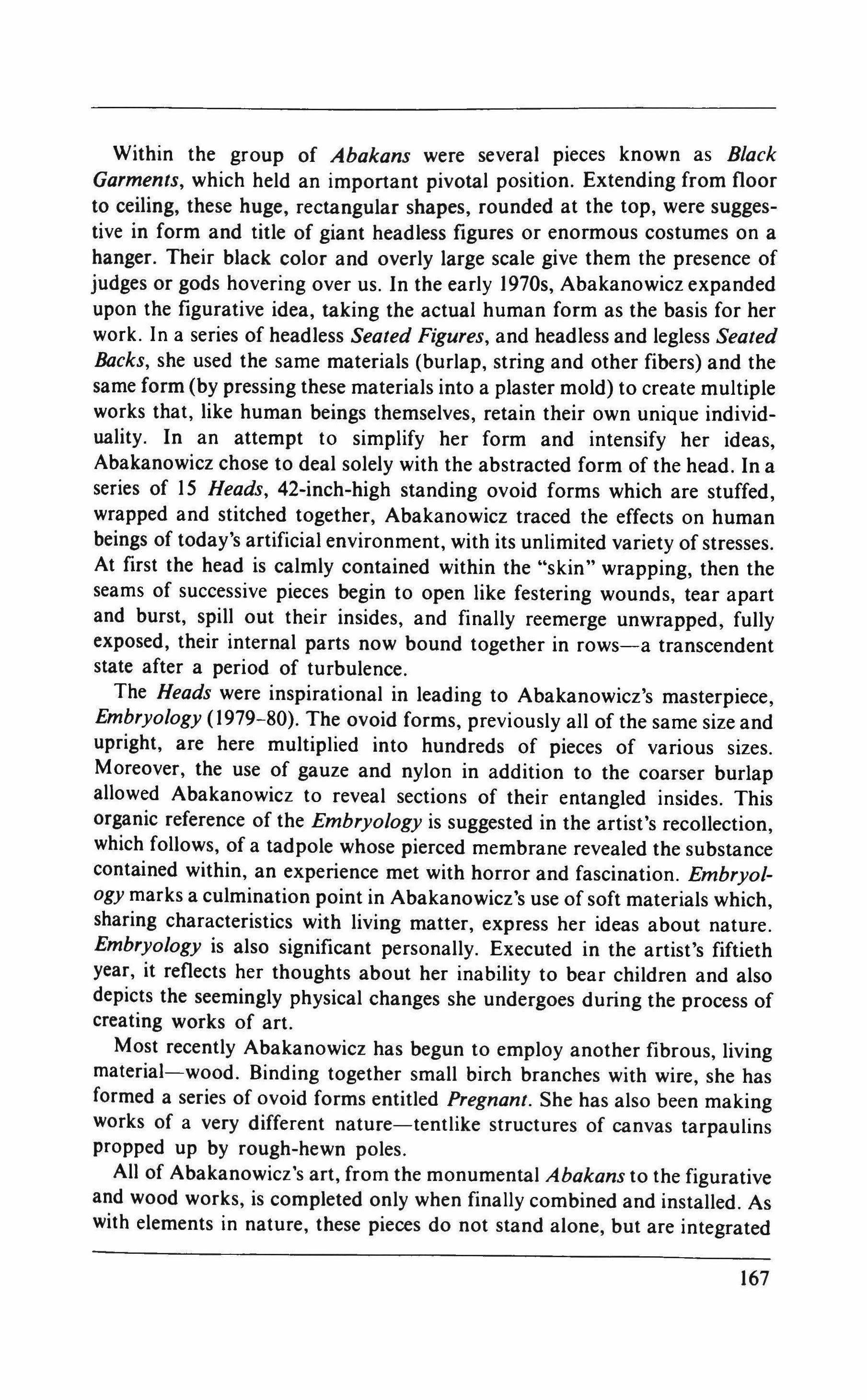
Within the group of Abakans were several pieces known as Black Garments, which held an important pivotal position. Extending from floor to ceiling, these huge, rectangular shapes, rounded at the top, were suggestive in form and title of giant headless figures or enormous costumes on a hanger. Their black color and overly large scale give them the presence of judges or gods hovering over us. In the early 1970s, Abakanowicz expanded upon the figurative idea, taking the actual human form as the basis for her work. In a series of headless Seated Figures, and headless and legless Seated Backs, she used the same materials (burlap, string and other fibers) and the same form (by pressing these materials into a plaster mold) to create multiple works that, like human beings themselves, retain their own unique individuality. In an attempt to simplify her form and intensify her ideas, Abakanowicz chose to deal solely with the abstracted form of the head. In a series of 15 Heads, 42-inch-high standing ovoid forms which are stuffed, wrapped and stitched together, Abakanowicz traced the effects on human beings of today's artificial environment, with its unlimited variety of stresses. At first the head is calmly contained within the "skin" wrapping, then the seams of successive pieces begin to open like festering wounds, tear apart and burst, spill out their insides, and finally reemerge unwrapped, fully exposed, their internal parts now bound together in rows-a transcendent state after a period of turbulence.
The Heads were inspirational in leading to Abakanowicz's masterpiece, Embryology (1979-80). The ovoid forms, previously all of the same size and upright, are here multiplied into hundreds of pieces of various sizes. Moreover, the use of gauze and nylon in addition to the coarser burlap allowed Abakanowicz to reveal sections of their entangled insides. This organic reference of the Embryology is suggested in the artist's recollection, which follows, of a tadpole whose pierced membrane revealed the substance contained within, an experience met with horror and fascination. Embryology marks a culmination point in Abakanowicz's use of soft materials which, sharing characteristics with living matter, express her ideas about nature. Embryology is also significant personally. Executed in the artist's fiftieth year, it reflects her thoughts about her inability to bear children and also depicts the seemingly physical changes she undergoes during the process of creating works of art.
Most recently Abakanowicz has begun to employ another fibrous, living material-wood. Binding together small birch branches with wire, she has formed a series of ovoid forms entitled Pregnant. She has also been making works of a very different nature-tentlike structures of canvas tarpaulins propped up by rough-hewn poles.
All of Abakanowicz's art, from the monumental Abakans to the figurative and wood works, is completed only when finally combined and installed. As with elements in nature, these pieces do not stand alone, but are integrated

with and supported by each other into environments determined by the space in which they are placed.
The work of Magdalena Abakanowicz possesses a remarkably powerful emotional intensity and mystery. We experience her art in our minds, hearts, and guts. It is made out of the ordinary struggles of daily life, which are expressed in these gnarled, tense forms. Abakanowicz's art is at once intimately personal, as it deals with the artist's life, and genuinely universal, as it communicates a profound historical sense of the condition of both her country and modern man.
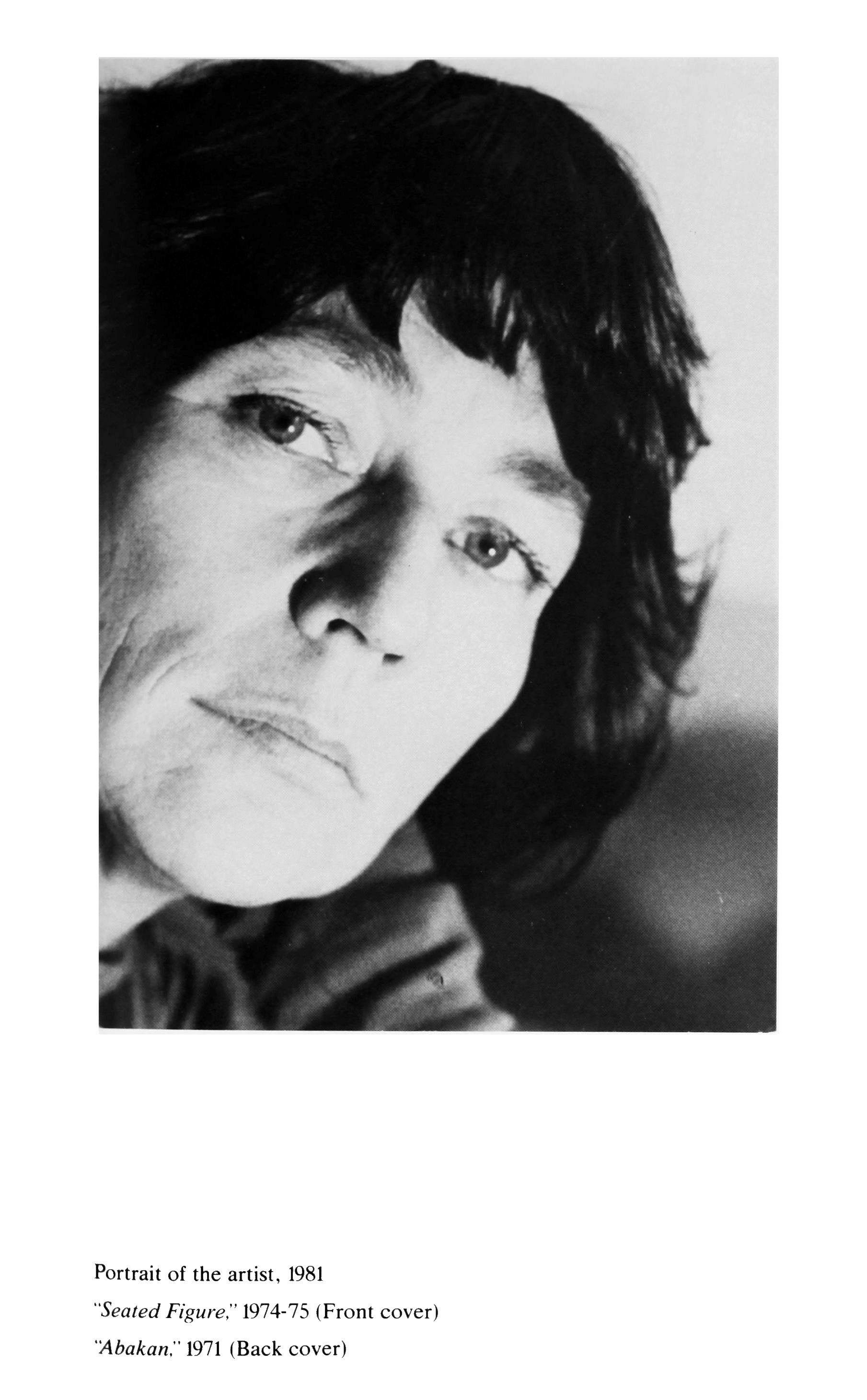
Portrait of the artist, 1981
Figure," 1974-75 (Front cover)
"Seated "Abakan,' 1971 (Back cover)
to right:
All works are in the collection of the artist unless otherwise noted.
From left "Great Black Abakan,' 1967/68-73 (In the collection of Centre Georges Pompidou Paris); "Abakan Open," 1966-67.
"Abakan.' 1971
 "Black Environment," 1970-78; "Abakan Orange," 1970
"Black Environment," 1970-78; "Abakan Orange," 1970
 Environment in the Dunes of Leba, Poland, for the film, "Abakany,' 1969, by
Environment in the Dunes of Leba, Poland, for the film, "Abakany,' 1969, by
Installation
(Installation

from
view, left to right: "Black Garments," 1970-74; "Seated Figures," 1974-75; "Heads," at the Art Gallery of New South Wales Sidney, Australia, 1976)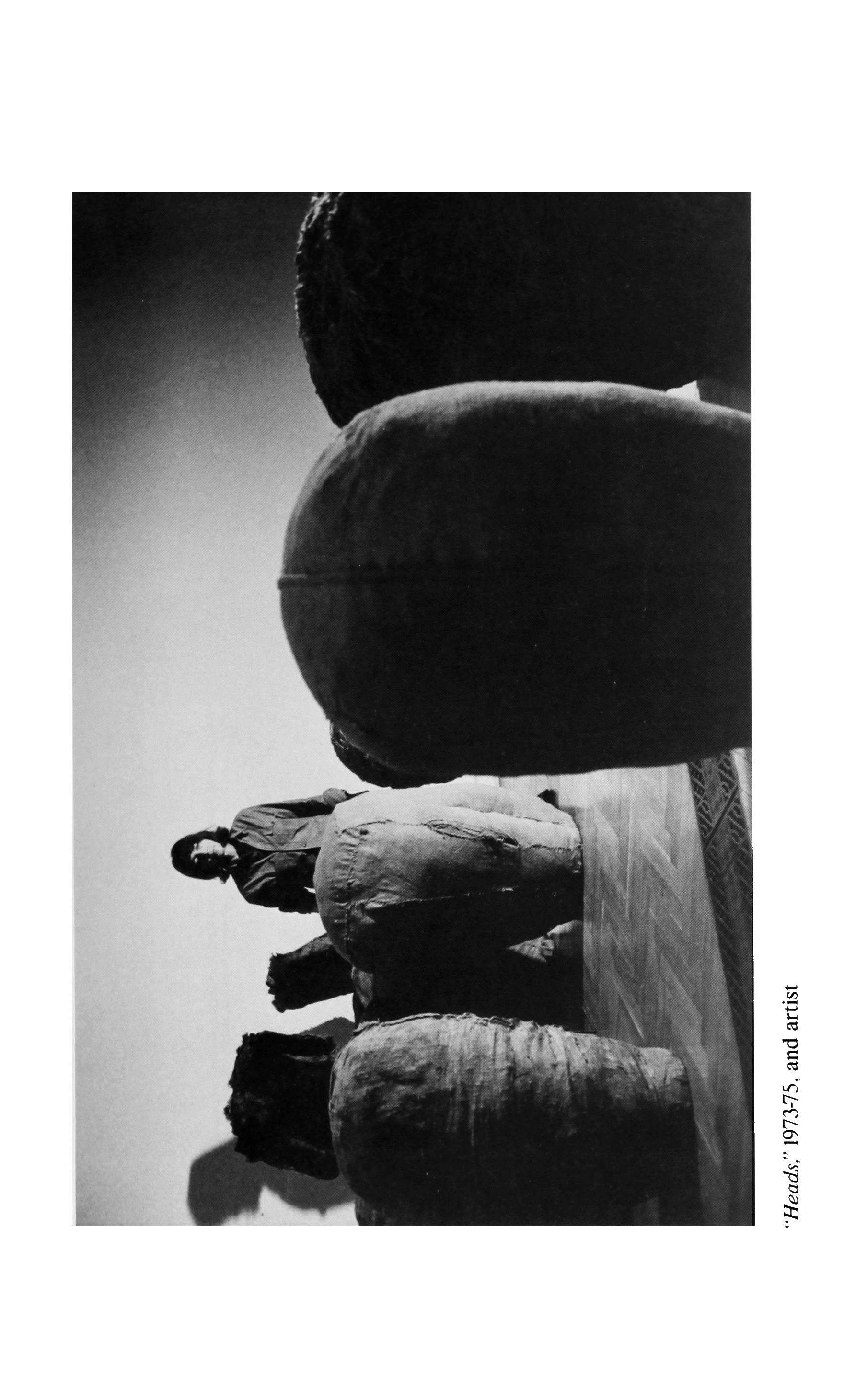
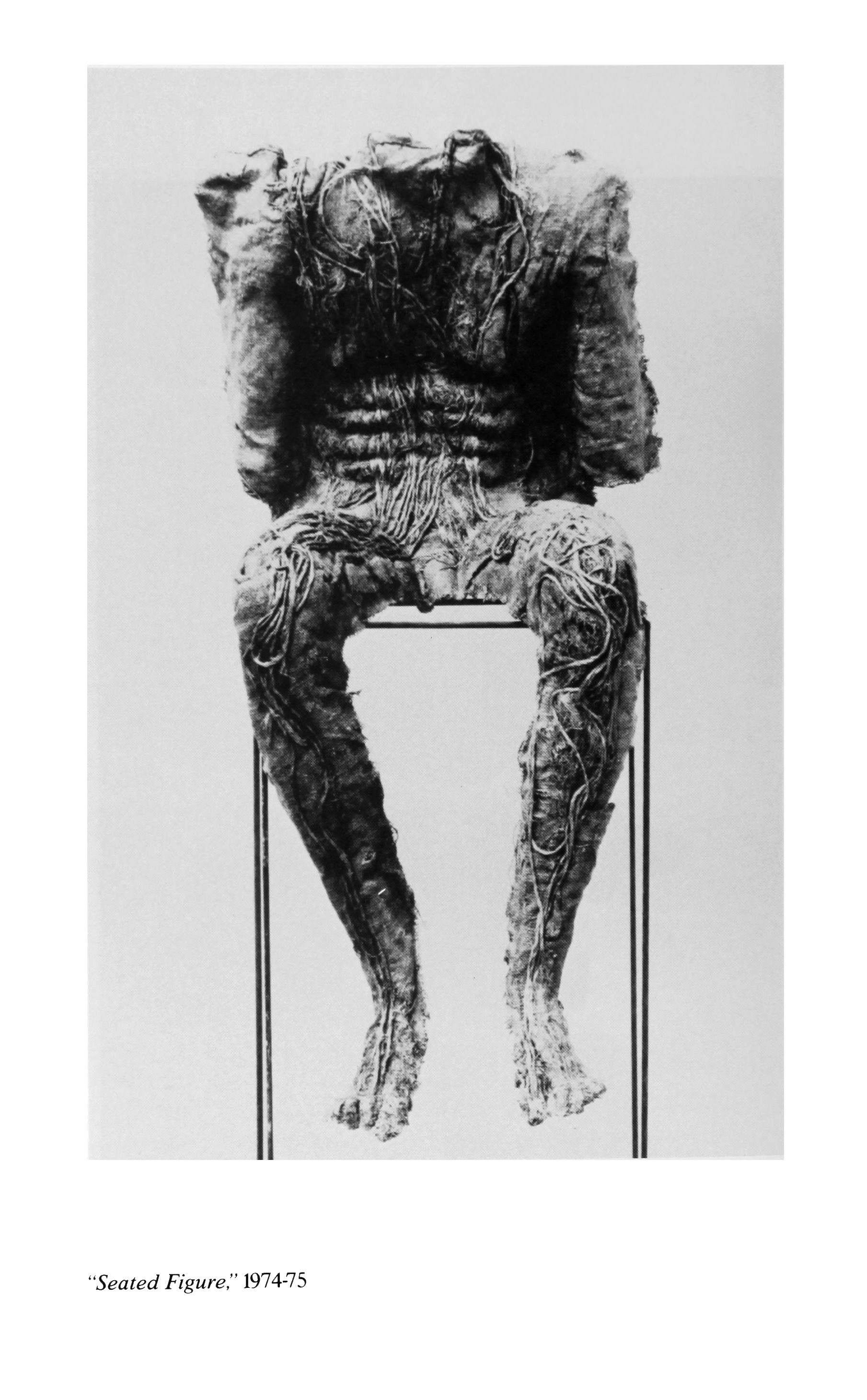
"Seated Figure," 1974-75
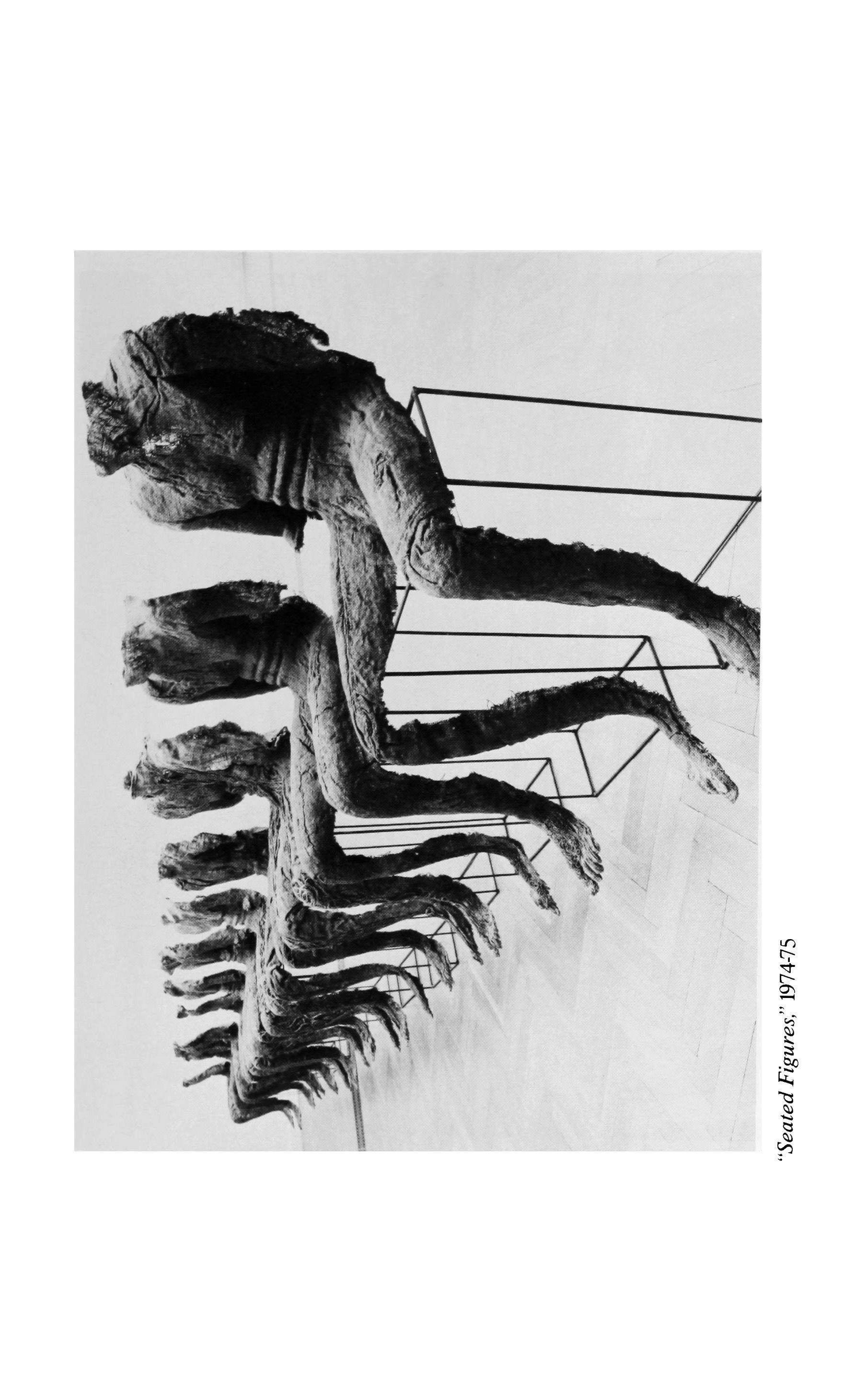



 Artist working on "Embryology"
Artist working on "Embryology"
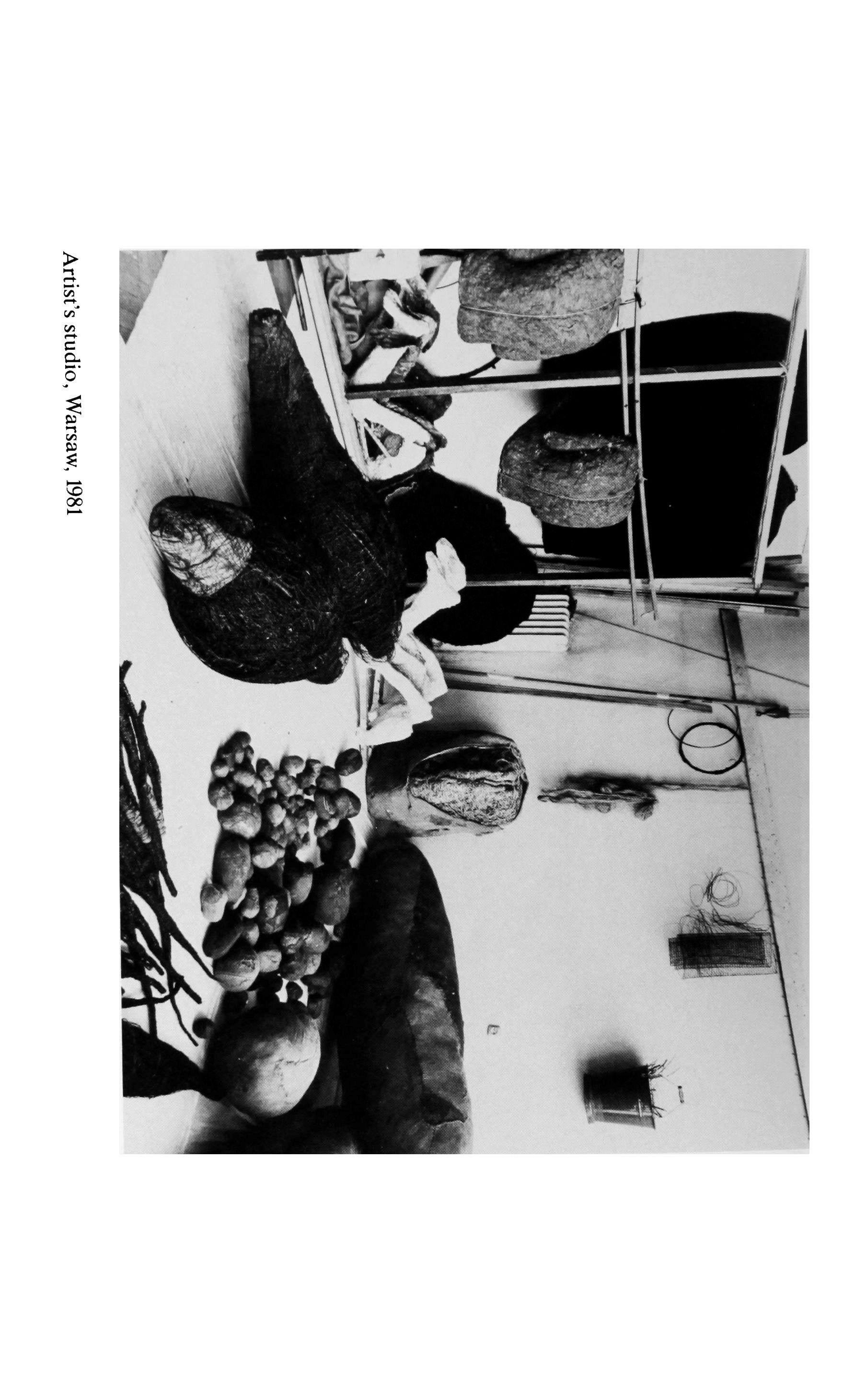


Countryside outside Warsaw, 1981

I was very little. Crouching over the edge of a marshy pond, I observed tadpoles. Enormous, about to be transformed into frogs. They were swarming by the bank. Through the fine membranes covering their distended stomachs one could clearly see the tangle of their guts. They were replete with the process of transformation, sluggish. They were tempting you to reach out for them. When they were pulled out with a stick onto the bank or inadvertently touched, their bulging bellies split and the contents leaked out in a confusion of knots. In a minute flies fell upon them. My heart was beating fast. I sat there shaken by what was happening. The destruction of soft matter and the boundless mystery of softness. It was not unlike looking at a broken stalk from which the sap brought forth by an indecipherable internal process, a force only imprecisely known, was flowing out. The mystery of never completely explored interior, soft, perishable. Many years later, I began to work in a material that was soft, with a complicated tissue. It gives me a feeling of kinship and affinity with a world that I don't wish to explore other than by touch, apprehending it and connecting with parts of me that lie deepest.
There is no intermediary of tools between the material that I mould and myself. I select it with my hands. I shape it with my hands. My energy is transmitted to it by my hands. Translating the intention into shape, my hands pass on to it something that eludes conceptualization. They reveal what is unconscious.
The shapes that I design are soft. They conceal in their interiors the origin of softness. They conceal everything that I leave to the imagination. Unexplained by the eye, the skin of the finger that probes or the palm that informs
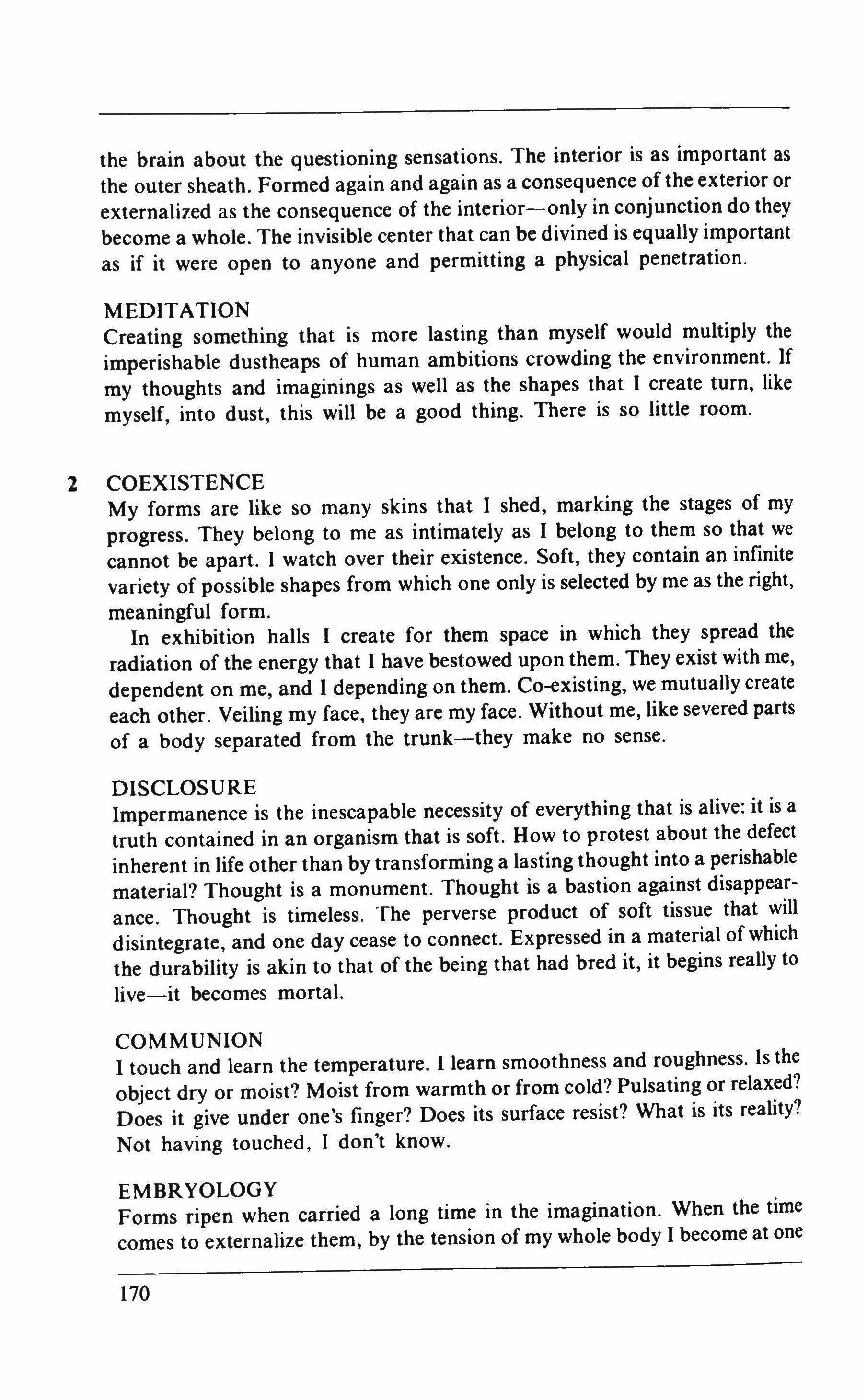
the brain about the questioning sensations. The interior is as important as the outer sheath. Formed again and again as a consequence of the exterior or externalized as the consequence of the interior-only in conjunction do they become a whole. The invisible center that can be divined is equally important as if it were open to anyone and permitting a physical penetration.
Creating something that is more lasting than myself would multiply the imperishable dustheaps of human ambitions crowding the environment. If my thoughts and imaginings as well as the shapes that I create turn, like myself, into dust, this will be a good thing. There is so little room.
My forms are like so many skins that I shed, marking the stages of my progress. They belong to me as intimately as I belong to them so that we cannot be apart. I watch over their existence. Soft, they contain an infinite variety of possible shapes from which one only is selected by me as the right, meaningful form.
In exhibition halls I create for them space in which they spread the radiation of the energy that I have bestowed upon them. They exist with me, dependent on me, and I depending on them. Co-existing, we mutually create each other. Veiling my face, they are my face. Without me, like severed parts of a body separated from the trunk-they make no sense.
Impermanence is the inescapable necessity of everything that is alive: it is a truth contained in an organism that is soft. How to protest about the defect inherent in life other than by transforming a lasting thought into a perishable material? Thought is a monument. Thought is a bastion against disappearance. Thought is timeless. The perverse product of soft tissue that will disintegrate, and one day cease to connect. Expressed in a material of which the durability is akin to that of the being that had bred it, it begins really to live-it becomes mortal.
I touch and learn the temperature. I learn smoothness and roughness. Is the object dry or moist? Moist from warmth or from cold? Pulsating or relaxed? Does it give under one's finger? Does its surface resist? What is its reality? Not having touched, I don't know.
Forms ripen when carried a long time in the imagination. When the time comes to externalize them, by the tension of my whole body I become at one
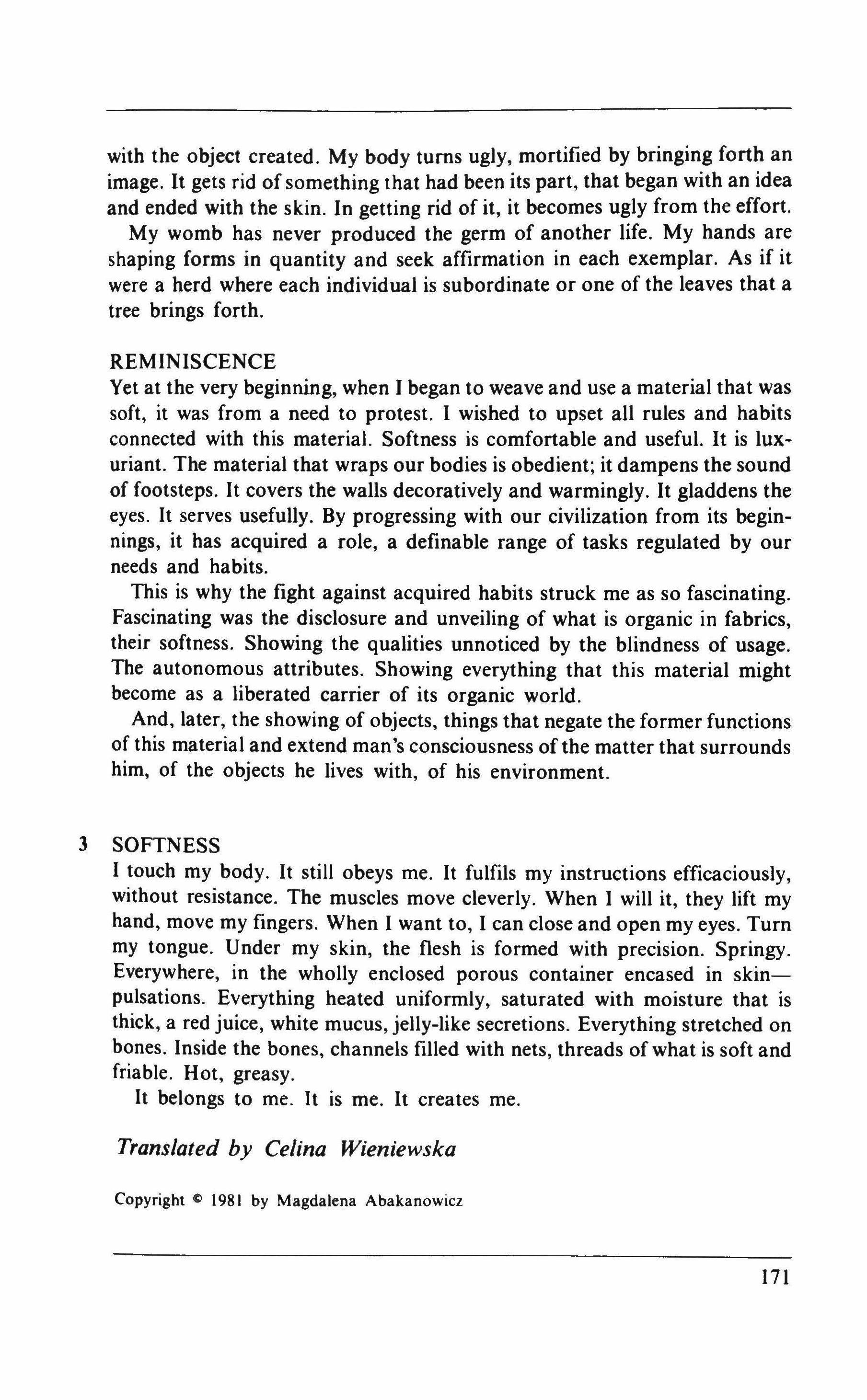
with the object created. My body turns ugly, mortified by bringing forth an image. It gets rid of something that had been its part, that began with an idea and ended with the skin. In getting rid of it, it becomes ugly from the effort. My womb has never produced the germ of another life. My hands are shaping forms in quantity and seek affirmation in each exemplar. As if it were a herd where each individual is subordinate or one of the leaves that a tree brings forth.
Yet at the very beginning, when I began to weave and use a material that was soft, it was from a need to protest. I wished to upset all rules and habits connected with this material. Softness is comfortable and useful. It is luxuriant. The material that wraps our bodies is obedient; it dampens the sound of footsteps. It covers the walls decoratively and warmingly. It gladdens the eyes. It serves usefully. By progressing with our civilization from its beginnings, it has acquired a role, a definable range of tasks regulated by our needs and habits.
This is why the fight against acquired habits struck me as so fascinating. Fascinating was the disclosure and unveiling of what is organic in fabrics, their softness. Showing the qualities unnoticed by the blindness of usage. The autonomous attributes. Showing everything that this material might become as a liberated carrier of its organic world.
And, later, the showing of objects, things that negate the former functions of this material and extend man's consciousness of the matter that surrounds him, of the objects he lives with, of his environment.
I touch my body. It still obeys me. It fulfils my instructions efficaciously, without resistance. The muscles move cleverly. When I will it, they lift my hand, move my fingers. When I want to, I can close and open my eyes. Turn my tongue. Under my skin, the flesh is formed with precision. Springy. Everywhere, in the wholly enclosed porous container encased in skinpulsations. Everything heated uniformly, saturated with moisture that is thick, a red juice, white mucus, jelly-like secretions. Everything stretched on bones. Inside the bones, channels filled with nets, threads of what is soft and friable. Hot, greasy. It belongs to me. It is me. It creates me.
Translated by Celina WieniewskaCopyright e 1981 by Magdalena Abakanowicz
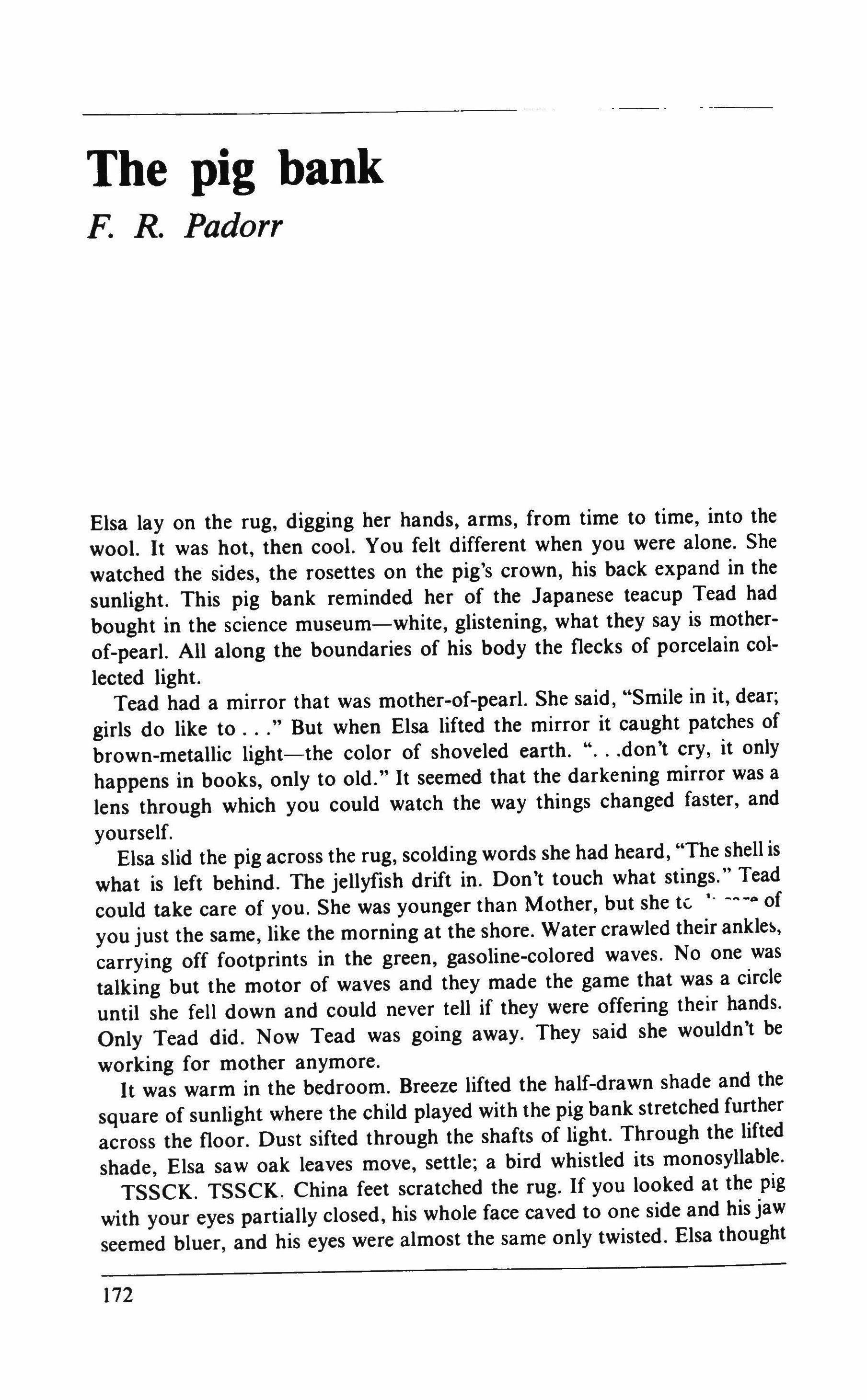
Elsa lay on the rug, digging her hands, arms, from time to time, into the wool. It was hot, then cool. You felt different when you were alone. She watched the sides, the rosettes on the pig's crown, his back expand in the sunlight. This pig bank reminded her of the Japanese teacup Tead had bought in the science museum-white, glistening, what they say is motherof-pearl. All along the boundaries of his body the flecks of porcelain collected light.
Tead had a mirror that was mother-of-pearl. She said, "Smile in it, dear; girls do like to But when Elsa lifted the mirror it caught patches of brown-metallic light-the color of shoveled earth. don't cry, it only happens in books, only to old." It seemed that the darkening mirror was a lens through which you could watch the way things changed faster, and yourself.
Elsa slid the pig across the rug, scolding words she had heard, "The shell is what is left behind. The jellyfish drift in. Don't touch what stings." Tead could take care of you. She was younger than Mother, but she tc '. -�- of you just the same, like the morning at the shore. Water crawled their ankles, carrying off footprints in the green, gasoline-colored waves. No one was talking but the motor of waves and they made the game that was a circle until she fell down and could never tell if they were offering their hands. Only Tead did. Now Tead was going away. They said she wouldn't be working for mother anymore. It was warm in the bedroom. Breeze lifted the half-drawn shade and the square of sunlight where the child played with the pig bank stretched further across the floor. Dust sifted through the shafts of light. Through the lifted shade, Elsa saw oak leaves move, settle; a bird whistled its monosyllable. TSSCK. TSSCK. China feet scratched the rug. If you looked at the pig with your eyes partially closed, his whole face caved to one side and his jaw seemed bluer, and his eyes were almost the same only twisted. Elsa thought

of the pig grown larger, as she had, and inside was the calcinated area where his thoughts came from. And they were true or they weren't like, "I love you, I love you not." Sometimes she thought how things were dying, the butterflies they bathed in gas which smelled so sweet it choked you and was thick and heavy in your chest.
She wished that Tead were there now. She would like to give her something before she left. The pig bank would be nice. Elsa thought how Tead would admire the pale colors, the glaze. When you held it to the light it grew warm, almost real. Tead hadn't looked so pretty lately. Her face was red a lot but Elsa liked her anyhow.
She wondered where Tead could be. Sometimes she'd go with the soldier who came to the door. His face was glassy and changing so that after a few minutes it was translucent, and his hollowed-out pants leg would swing while he waited and the whole entryway would begin to be covered with the soldier's smell, his cigarette, or what was around his hair and face.
Sometimes after Tead would leave, Elsa would stand under the lantern in the hall. A moth was caught in the frosted glass, his wings beating faster than your pulse. Outside you could catch one in nets or jars. But he couldn't breathe so in the glass. You can vibrate your arms like wings and if you touched them, they'd be smooth
Downstairs she could hear angry voices. The edges of words were muffled, but they sounded like steps getting louder. Elsa thought about the halfbabies she had seen floating gravityless in bottles of brine. At the science museum Tead had said not to matter; they were dead. Elsa knew another baby that died before it was born. It had made everyone feel sorry, not angry. It wasn't anyone's fault, you know. And Tead's baby too. Elsa wondered if it had looked half-frog like the others.
The voices were louder now, like when somebody was saying it was your fault. It's almost impossible for them to understand, to slip inside the outlines of someone's body and understand why this has happened or that. Elsa remembered a dream she had had. Standing on the pavement, in front of glass, the shoe store window, she watched the woman who weighed maybe three hundred pounds and the strange expression on her face. In a moment she understood what it meant, that woman's face. But when she woke up she forgot.
Elsa didn't want to hear their voices. She imagined how she'd place the pig bank on Tead's table where she'd be certain to look when she came back. Elsa didn't like the way Tead's room looked. She had two pictures of dancers on the walls. They looked like pigs. The gift would be nice-something to look at besides the pictures. But Tead was going away.
Usually babies were all right-in the end. Elsa thought about Desdemona, her cat, the day she shot through the half-opened door and under the stained bed, through the rip in the yellowish undersheet. And she wouldn't be pried
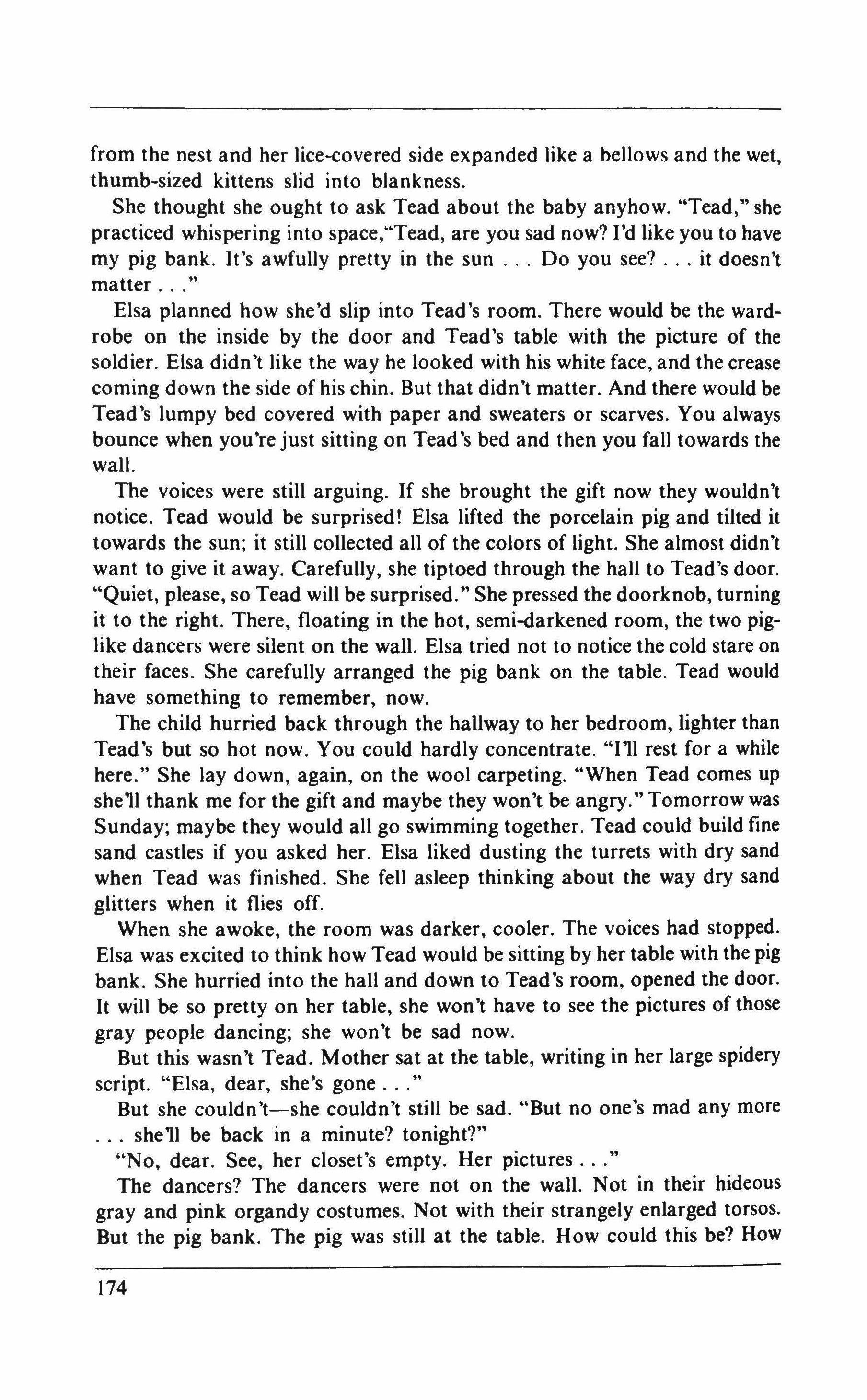
from the nest and her lice-covered side expanded like a bellows and the wet, thumb-sized kittens slid into blankness.
She thought she ought to ask Tead about the baby anyhow. "Tead," she practiced whispering into space,"Tead, are you sad now? I'd like you to have my pig bank. It's awfully pretty in the sun Do you see? it doesn't matter
Elsa planned how she'd slip into Tead's room. There would be the wardrobe on the inside by the door and Tead's table with the picture of the soldier. Elsa didn't like the way he looked with his white face, and the crease coming down the side of his chin. But that didn't matter. And there would be Tead's lumpy bed covered with paper and sweaters or scarves. You always bounce when you're just sitting on Tead's bed and then you fall towards the wall.
The voices were still arguing. If she brought the gift now they wouldn't notice. Tead would be surprised! Elsa lifted the porcelain pig and tilted it towards the sun; it still collected all of the colors of light. She almost didn't want to give it away. Carefully, she tiptoed through the hall to Tead's door. "Quiet, please, so Tead will be surprised." She pressed the doorknob, turning it to the right. There, floating in the hot, semi-darkened room, the two piglike dancers were silent on the wall. Elsa tried not to notice the cold stare on their faces. She carefully arranged the pig bank on the table. Tead would have something to remember, now.
The child hurried back through the hallway to her bedroom, lighter than Tead's but so hot now. You could hardly concentrate. "111 rest for a while here." She lay down, again, on the wool carpeting. "When Tead comes up she'll thank me for the gift and maybe they won't be angry." Tomorrow was Sunday; maybe they would all go swimming together. Tead could build fine sand castles if you asked her. Elsa liked dusting the turrets with dry sand when Tead was finished. She fell asleep thinking about the way dry sand glitters when it flies off.
When she awoke, the room was darker, cooler. The voices had stopped. Elsa was excited to think how Tead would be sitting by her table with the pig bank. She hurried into the hall and down to Tead's room, opened the door. It will be so pretty on her table, she won't have to see the pictures of those gray people dancing; she won't be sad now.
But this wasn't Tead. Mother sat at the table, writing in her large spidery script. "Elsa, dear, she's gone
But she couldn't-she couldn't still be sad. "But no one's mad any more she'll be back in a minute? tonight?"
"No, dear. See, her closet's empty. Her pictures
The dancers? The dancers were not on the wall. Not in their hideous gray and pink organdy costumes. Not with their strangely enlarged torsos. But the pig bank. The pig was still at the table. How could this be? How
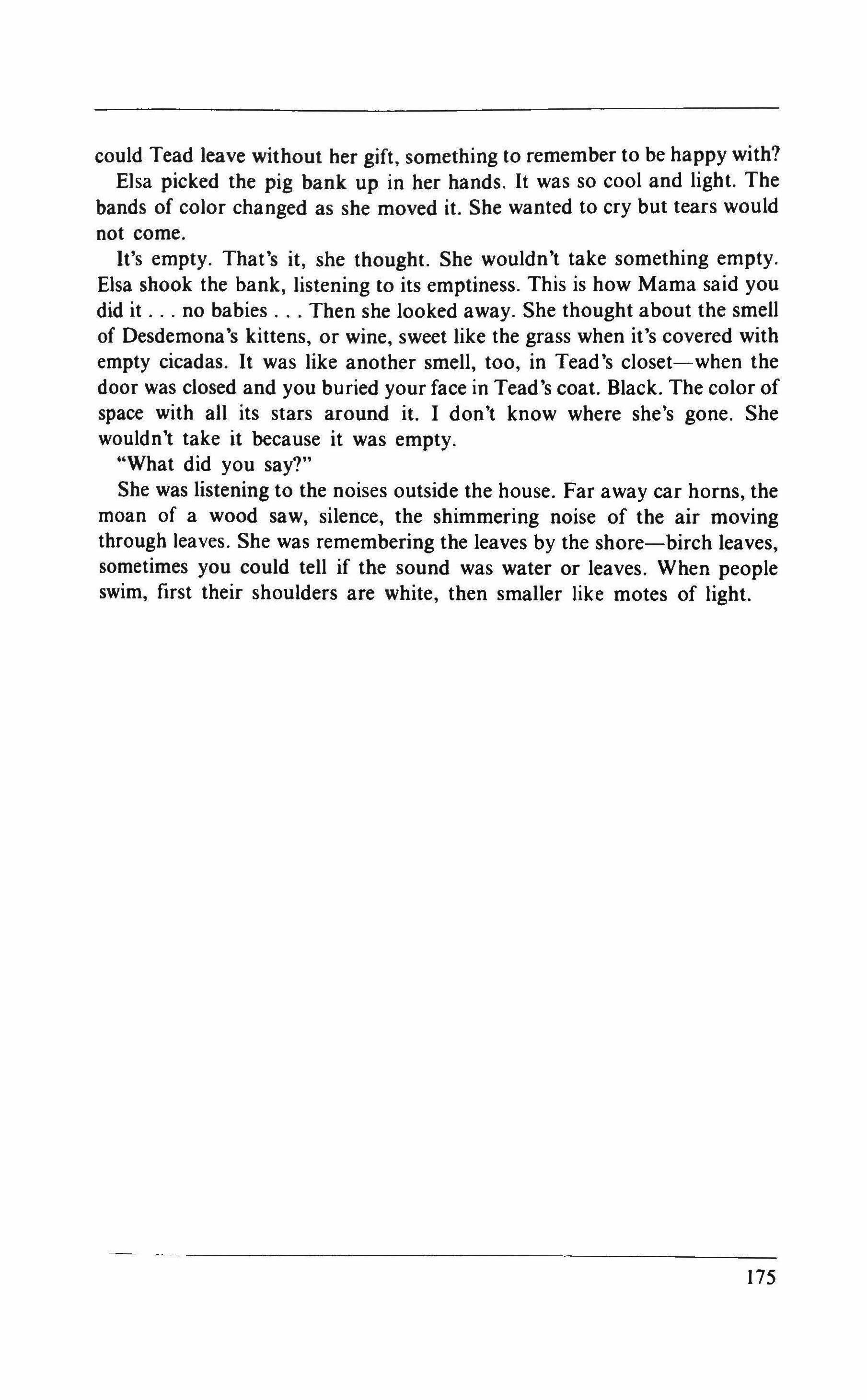
could Tead leave without her gift, something to remember to be happy with?
Elsa picked the pig bank up in her hands. It was so cool and light. The bands of color changed as she moved it. She wanted to cry but tears would not come.
It's empty. That's it, she thought. She wouldn't take something empty. Elsa shook the bank, listening to its emptiness. This is how Mama said you did it no babies Then she looked away. She thought about the smell of Desdemona's kittens, or wine, sweet like the grass when it's covered with empty cicadas. It was like another smell, too, in Tead's closet-when the door was closed and you buried your face in Tead's coat. Black. The color of space with all its stars around it. I don't know where she's gone. She wouldn't take it because it was empty.
"What did you say?"
She was listening to the noises outside the house. Far away car horns, the moan of a wood saw, silence, the shimmering noise of the air moving through leaves. She was remembering the leaves by the shore-birch leaves, sometimes you could tell if the sound was water or leaves. When people swim, first their shoulders are white, then smaller like motes of light.

Oscar was, by several weeks, the first of four students to arrive at Laniel, a village on Lake Kippawa in Quebec near the Ontario border, some 300 miles northwest of Montreal, where he went to college. He was going to work at a forestry department lab near the village. His was a summer job that his biology teacher had gotten him.
He had taken an express train west out of Montreal, and at Mattawa changed to a local that headed north along the Ottawa River toward James Bay. He felt adventurous, full ofexpectation, and fairly pleased with himself to have found what seemed to him an important, well-payingjob. But as the conductor of the local came to check his ticket, he realized that he was missing his wallet with the ticket in it; and self-reproach, misgivings, and worry took the place of his gladness. The conductor, a lean, white-haired man, was very understanding. He said his wallet must have slipped out ofhis pocket on the express train. There was nothing to worry about. At the next station-in a few minutes-he would talk to the stationmaster. The stationmaster would telephone North Bay, where the express was due shortly, and he'd get his wallet in the morning on the next train up. Such things happened all the time. He'd let him know as soon as they got to Temiskaming. Oscar smiled more in gratitude than hope-in matters of this sort he was rather pessimistic-and resumed looking at the steep, wooded banks of the Ottawa River. A while ago their beauty had stirred him, but now he drew no comfort from them. At Temiskaming the conductor, his face emotionless, came to tell him that the wallet was found. "You'll have it back tomorrow morning," he added.
"That's wonderful! Thank you," Oscar said and, hardly able to contain his joy, rose and shook the man's hand; he praised the railroad and Canada, and might have gone on to include mankind, the world, and heaven, too, had not the conductor, turning from so much praise, gone on down the aisle. Now the river glistened again, the leaves shone, and-when he reached

Laniel-far from being ashamed of himself, he had a joyful story to tell the head of the lab who had come to meet him at the station.
The head of the lab, Larry, was a soft-spoken, lanky young man. Wearing a tartan shirt with rolled-up sleeves, he greeted Oscar with a strong handshake and a genuine, disarming, absolutely unartificial smile. He seemed to have a slight stoop to his shoulders, perhaps because of his height or from long hours over a microscope-he was an expert on budworms, the insects which in their various stages, from egg to larva to moth, infest large portions of the Canadian woods, especially balsam. He turned to a very pretty brunette and introduced them. She was his wife, Jessica. Side by side, his arm around her, they reminded Oscar of pictures he had seen of man and wife in ancient Egyptian art-the same cheerful expression of two who look to the future serenely.
The village was small-just a few rows of houses, warehouses, a garage that belonged to the lab, two or three stores, a lumber mill, and a dock on the lake near the station. They boarded a motorboat. The engine started after one smart pull of the flywheel, and with a whining noise that tore up the silence, they were off and speeding along the broadening bay, the bow furiously cleaving the still, limpid water, to a point on the rocky shore about a quarter of a mile distant. They landed at a wharf where another boat and two canoes were tied up. A slight, spare, sinewy middle-aged man greeted them. His name was Theophile and he was from Laniel. "Theophile keeps the place going-the cars, the boats He built everything here, and he's a very good cook," Larry said.
"The pickup need a new gasket," Theophile said in a Quebecois accent. Then, turning to Oscar, "You didn't have no supper."
"How can you tell?" Larry asked.
"He look hungry. And no food in the train either, that I know."
"Even ifthere were, he wouldn't have been able to buy it. Left his wallet on the express. But it was found-it'll be here with the early train. Could you pick it up at the stationmaster's when you come in tomorrow morning?"
"His wallet? Sure," Theophile said, taking a critical look at him.
"Thank you," Oscar said.
They showed him to a cabin with a bunk, and then to the kitchen, which also served as dining room and sitting room, in a building that faced the lake. Theophile heated some ham and beans in a pan, then laid it on the table, all the time talking to Larry about things that had to be done. "Well, I go now," he said, wished them good night, and left for the village in one of the boats.
Larry and Jessica answered Oscar's questions about the lake. It was large and had many islands and bays. Its coastline was so irregular, it measured more than a thousand miles. It stretched east for seventy miles and branched

north and south a long way. The lab was at its westernmost corner. Larry and Jessica lived nearby-a ten-minute walk from the lab-on the next point of land on the lake in a log cabin Larry had built. For five or six weeks, they told him, he'd be alone here at night, then three more students were going to come-high school students, who didn't finish school till the middle of June. "You won't mind being alone?" Larry asked.
"Oh no, I won't mind."
"If you need anything, just come over to our place. Along that path. You can't miss it," Larry said, and they left.
Only then did he fully appreciate the silence around him. It seemed like a voice from which all sounds are born. He listened to it and watched the night gradually intensify and assert itself. Never before had he had such a large place all to himself. He stepped outside and smelled the night. It had its own perfume. Sunlight expressed a different fragrance. This was subtler, sweeter. It partook of the night's velvety texture. He descended to the level of the lake and touched the water, then dipped his arms deep into it. The surface around them was like imagined bracelets. He returned to the kitchen and sat by the lamp for a time, then he went to his cabin.
He slept soundly and rose at dawn, in time to watch the morning quicken, the light gradually reassert itself over darkness, the night recede. He walked down to the lake, which was shrouded in mist. As though it were breathing, vapor rose from it, making it look more alive. Then, as the sun rose, the mist slowly lifted or vanished, and the other side of the bay was disclosed, narrowing toward Laniel at his right, but widening to his left, point after point, its cliffs fringed with pines. Above him a bird flew diagonally across the lake, uttering a strange, hollow, prolonged, and melodious cry, the like of which he had never heard but was to hear again and again through the summer. It was a loon. Its song had something human and nonhuman about it. The water was at this time of the year-late spring-too cold to swim in at leisure, but he dove in nevertheless, then quickly returned to the wharf and his cabin. He made coffee in the kitchen; it was the first time he had ever kept house.
At eight, Theophile came with Oscar's wallet for him, and then Larry arrived. They all went out into the woods with clippers and baskets to gather balsam branches, which they took to the lab where Larry showed him how to spot diseased balsam needles. He and Larry counted them and entered the numbers in a notebook. In the days that followed, they roved the forest, on foot, or in a pickup truck or by boat, clipping the samples. Later, as the larvae grew, they examined them under a microscope for possible parasites with the hope of finding a viable, prolific, and virulent one that could be cultured and then spread over the forest. The work was tedious, but their expeditions were not, especially those on the lake. They went to remote bays and sometimes camped out for one or more nights. He sensed the vastness of

the land, that to the north stretched boundless toward a distant sea and the islands of the Arctic. Once, a moose drinking water at an inlet, its massive head crowned with antlers, looked at them then galloped away dripping water. Another time, while they were driving down a road in the woods, a bear crossed fast in front of them; and that appearance, though momentary, was more instructive than minutes spent watching bears in zoos or hours spent reading about them in zoology textbooks. And always, after these expeditions, it was good to return to the lab, the kitchen, his cabin, his bunk. Within walking distance of the lab, he found a little lake. It was in a hollow that reflected the green of the forest around it more than the blue of the sky. The water was clear and it rippled and shone. Again and again, after work in the evening, he went to this lake. It seemed virgin and secret. Ifthere was no wind, each leaf was faithfully portrayed, but the lightest breeze would cancel each image. He would watch the wayward, playful wind ruffling the surface, drawing arabesques, losing itself, finding itself again. And in the big lake he would go out by himself with the powerful outboard, at high speed, in the deep water under the sheer cliffs, weaving his way between rocks. Once, he struck one that lay under the surface and the motor went dead. He thought he had smashed the propeller. Feeling contrite, he rowed back to shore. "You probably just broke the point," Theophile said, and in a jiffy replaced it. Even more than going on the outboard, he liked canoeing. One of the canoes was made of birch bark; the other, of aluminum, could be fitted with a sail. With them he could steal into the shallowest water and silently explore caves and recesses. Often he went into the village, either by boat or-though it was much longer-on foot by a path that skirted the lake. But there wasn't much to do there. The villagers kept to themselves; and he didn't find it easy to talk to them, although he spoke some French. There, when he heard a train, he would go to the station for the link to the rest of the world it provided and watch the passengers though they sat behind glass and hardly any of them ever got off at Laniel. One morning he got up to find the end of the lake all the way to the village, solid with logs. They had been chained together and drawn by a tugboat to the dock, where they would be loaded onto a freight train. For days the logs floated there, leaving only a narrow channel for boats. He learned to logroll. From log to log he crossed the lake. And he learned to chop wood, splitting a log with one ax blow. It was fun, but he would have had more fun with a friend. His need to see new faces, unappeased by his trips to the village, grew intense. A drive to Temiskaming for supplies was a rare, exciting treat, though Temiskaming was only a small town. In midsummer, Larry said, they would drive south to North Bay and perhaps north to Cobalt and Cochrane. The mere mention of these towns filled Oscar with wonder. At one point Larry announced that a government official from the forestry department was going to come for a short visit, and the expectation that the news stirred was as pitiful as it was
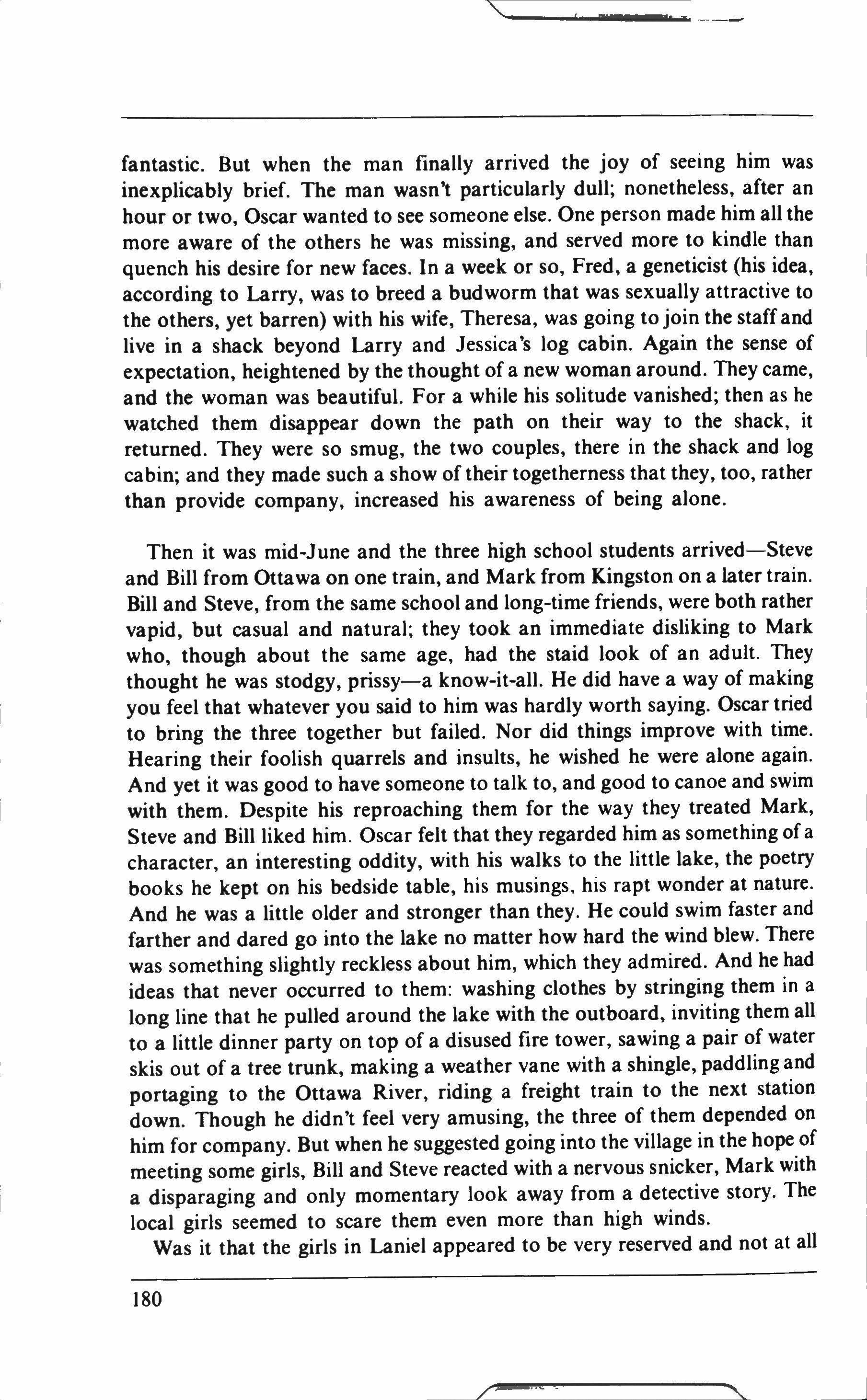
fantastic. But when the man finally arrived the joy of seeing him was inexplicably brief. The man wasn't particularly dull; nonetheless, after an hour or two, Oscar wanted to see someone else. One person made him all the more aware of the others he was missing, and served more to kindle than quench his desire for new faces. In a week or so, Fred, a geneticist (his idea, according to Larry, was to breed a budworm that was sexually attractive to the others, yet barren) with his wife, Theresa, was going to join the staff and live in a shack beyond Larry and Jessica's log cabin. Again the sense of expectation, heightened by the thought of a new woman around. They came, and the woman was beautiful. For a while his solitude vanished; then as he watched them disappear down the path on their way to the shack, it returned. They were so smug, the two couples, there in the shack and log cabin; and they made such a show of their togetherness that they, too, rather than provide company, increased his awareness of being alone.
Then it was mid-June and the three high school students arrived-Steve and Bill from Ottawa on one train, and Mark from Kingston on a later train. Bill and Steve, from the same school and long-time friends, were both rather vapid, but casual and natural; they took an immediate disliking to Mark who, though about the same age, had the staid look of an adult. They thought he was stodgy, prissy-a know-it-all. He did have a way of making you feel that whatever you said to him was hardly worth saying. Oscar tried to bring the three together but failed. Nor did things improve with time. Hearing their foolish quarrels and insults, he wished he were alone again. And yet it was good to have someone to talk to, and good to canoe and swim with them. Despite his reproaching them for the way they treated Mark, Steve and Bill liked him. Oscar felt that they regarded him as something of a character, an interesting oddity, with his walks to the little lake, the poetry books he kept on his bedside table, his musings. his rapt wonder at nature. And he was a little older and stronger than they. He could swim faster and farther and dared go into the lake no matter how hard the wind blew. There was something slightly reckless about him, which they admired. And he had ideas that never occurred to them: washing clothes by stringing them in a long line that he pulled around the lake with the outboard, inviting them all to a little dinner party on top of a disused fire tower, sawing a pair of water skis out of a tree trunk, making a weather vane with a shingle, paddling and portaging to the Ottawa River, riding a freight train to the next station down. Though he didn't feel very amusing, the three of them depended on him for company. But when he suggested going into the village in the hope of meeting some girls, Bill and Steve reacted with a nervous snicker, Mark with a disparaging and only momentary look away from a detective story. The local girls seemed to scare them even more than high winds. Was it that the girls in Laniel appeared to be very reserved and not at all
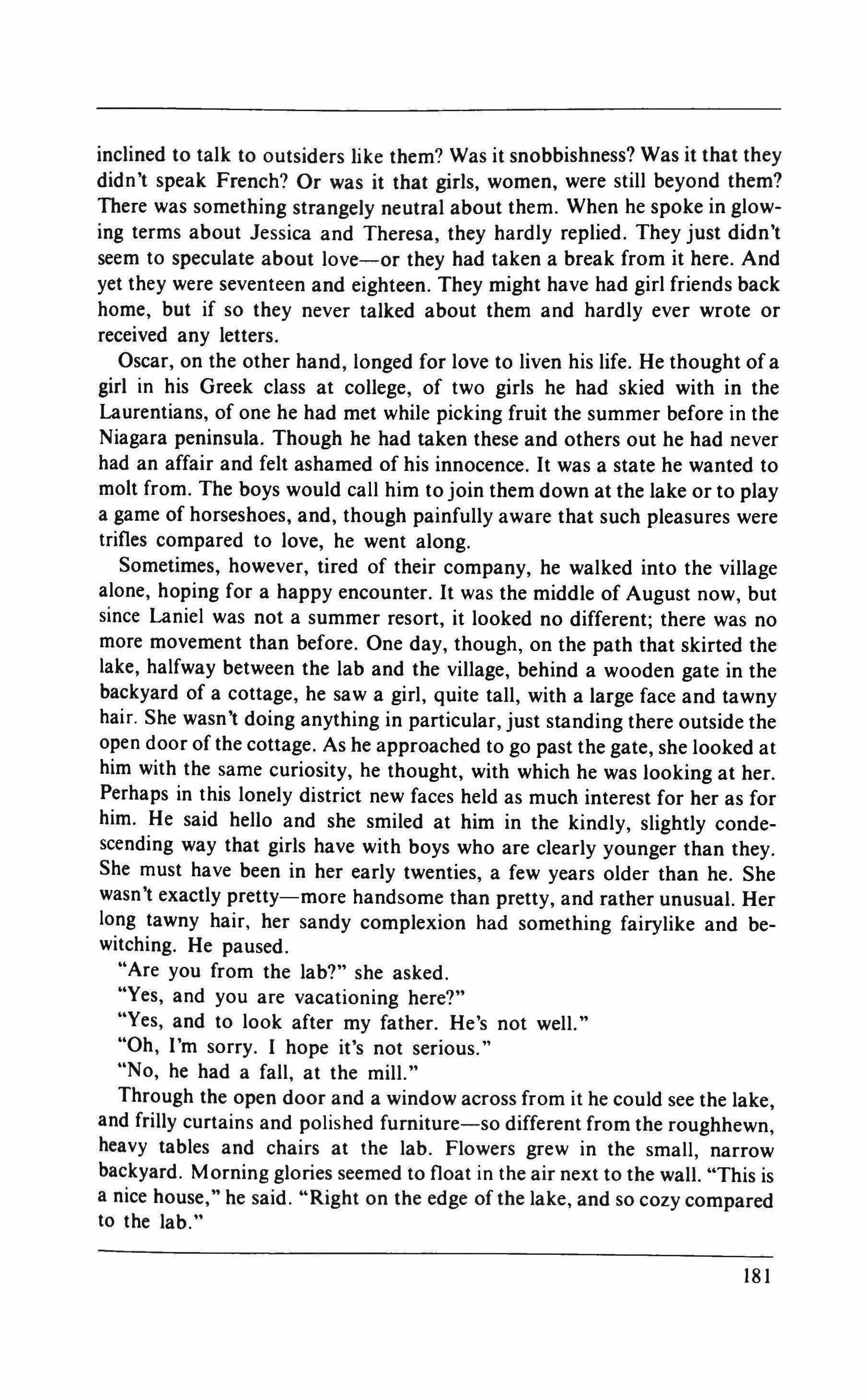
inclined to talk to outsiders like them? Was it snobbishness? Was it that they didn't speak French? Or was it that girls, women, were still beyond them? There was something strangely neutral about them. When he spoke in glowing terms about Jessica and Theresa, they hardly replied. They just didn't seem to speculate about love-or they had taken a break from it here. And yet they were seventeen and eighteen. They might have had girl friends back home, but if so they never talked about them and hardly ever wrote or received any letters.
Oscar, on the other hand, longed for love to liven his life. He thought of a girl in his Greek class at college, of two girls he had skied with in the Laurentians, of one he had met while picking fruit the summer before in the Niagara peninsula. Though he had taken these and others out he had never had an affair and felt ashamed of his innocence. It was a state he wanted to molt from. The boys would call him to join them down at the lake or to play a game of horseshoes, and, though painfully aware that such pleasures were trifles compared to love, he went along.
Sometimes, however, tired of their company, he walked into the village alone, hoping for a happy encounter. It was the middle of August now, but since Laniel was not a summer resort, it looked no different; there was no more movement than before. One day, though, on the path that skirted the lake, halfway between the lab and the village, behind a wooden gate in the backyard of a cottage, he saw a girl, quite tall, with a large face and tawny hair. She wasn't doing anything in particular, just standing there outside the open door of the cottage. As he approached to go past the gate, she looked at him with the same curiosity, he thought, with which he was looking at her. Perhaps in this lonely district new faces held as much interest for her as for him. He said hello and she smiled at him in the kindly, slightly condescending way that girls have with boys who are clearly younger than they. She must have been in her early twenties, a few years older than he. She wasn't exactly pretty-more handsome than pretty, and rather unusual. Her long tawny hair, her sandy complexion had something fairylike and bewitching. He paused.
"Are you from the lab?" she asked.
"Yes, and you are vacationing here?"
"Yes, and to look after my father. He's not well."
"Oh, I'm sorry. I hope it's not serious."
"No, he had a fall, at the mill."
Through the open door and a window across from it he could see the lake, and frilly curtains and polished furniture-so different from the roughhewn, heavy tables and chairs at the lab. Flowers grew in the small, narrow backyard. Morning glories seemed to float in the air next to the wall. "This is a nice house," he said. "Right on the edge of the lake, and so cozy compared to the lab."

"Yes, it's nice. But Laniel
"Are you from a big city?"
"No, not a big city. Sudbury."
"Still, there must be a lot going on there."
"No, not a lot, but a lot more than here."
"If you like, some evening 1 could take you out on the lab's outboard."
"A ride on the boat? Yes, I'd like that."
"When would you like to go? Tomorrow? Any day."
"Tomorrow'd be fine, if it's as hot as today."
"I could come here in front of your house after work, around six. And 111 get some food and wine in the village and we could have a picnic."
"Good," she said, and as he was about to go, she added, "Hey, 1 don't know your name."
"I'm Oscar, and 1 work at the lab. Oh, I've already said that! I go to college in Montreal."
"I'm Peggy, and I live with my mother and work in an office in Sudbury, Ontario." The amused, slightly condescending smile again lit her face, "111 see you tomorrow," she said.
While she was still in sight he had to control his step, but when he had rounded a bend his step quickened to keep pace with his heart, with his life. Soon his walk broke into a lilt and a run. He raced to the lab. He slowed down as he climbed the steps to the kitchen. Bright-eyed and with a lingering smile he went in.
"What happened to you?" Steve said.
"Oh, nothing. Just joie de vivre. Such joie de vivre here in Laniel."
He kept his secret, he revelled in it, went to bed and woke up with it. In the lab he had a hard time counting the insects. He kept seeing her, through the microscope, as if it were a telescope that could peer around corners and behind walls. She was so confiding and friendly-and not a little mysterious behind her curtain of hair. After work he said he wasn't going to have dinner here.
"Where are you going?" Bill asked him.
"I'm going out with a girl."
They looked at him as if they couldn't believe him. Who was she? Where? How had he met her? Where was he going to take her? He just smiled. "Tell us," they said as he went down to the boat.
For an answer he tugged at the flywheel, and was gone. First, he went to Laniel for bread, cheese, olives, and wine. At six he pulled alongside the float in front of her house. He knocked at the door on the lake side. A man's voice asked him in. He opened the door and saw a man well past middle age in an arm chair, his leg in a cast and a pair of crutches beside him. "Peggy'll be ready in a minute. She's in the kitchen. I just finished

supper. Sit down." After telling him that he was glad Peggy had found a friend, and cautioning about boats and especially outboards, he said a few words about his leg, then began talking about the work ethic. Oscar was not interested in working hours but in those certain moments that enclose eternity in them-and sometimes disclose it. He listened dutifully, nevertheless, until the door was opened with a flourish and Peggy appeared in a blouse and skirt.
"What was dad talking about?" she asked him on the way down to the boat.
"Work.
"Oh," she said and made a movement as though shrugging off a yoke. Then, taking his hand, she stepped into the boat.
They sped away. He wasn't sure where he would take her. First, they swept by the pier in Laniel, the wake making the boats in the harbor bob; then he skirted the coastline opposite the lab. The cliffs got higher. The bay widened. Two rocky headlands, weathered smooth by the ages, marked the entrance to a cove. He had been here before by boat and canoe. He cut the motor and they moved silently between the two narrowing cliffs whose shadows darkened the still and deep water. Ferns and pines grew on ledges up the cliffs' sides. Behind them, the open lake, still light and sunny, seemed like a window. Peggy looked up at the sky. There wasn't much of it. She was able to touch a fern that leaned out of the cliff wall. Then the keel brushed the sandy bottom, and they were still.
They stepped into the warm, clear water and he pulled the boat in. She was full of wonder at the beauty of the place. They both seemed to feel that no words could describe it, and so they just sat for a while-silent in the silence. He took the wine and food out of the boat and set it on the grass. When they spoke their voices sounded resonant, perhaps because the cove was shaped like a megaphone or a funnel. She sang a high note, and, pure as it was, it echoed even more pure. She sat with her hands clasped around her flexed knees, her skirt as taut as a tent and her feet barely touching the ground, in a posture that fascinated him; she looked like something he wanted to unravel. With her head slightly cocked she gazed at the water's surface as if she wanted to be level with it. "This sure beats staying home," she said.
He laughed joyfully at the indirect compliment. "What do you talk about with your dad?" he asked her.
"He's strong on work, as you know, and religion. He thinks if you apply yourself, you can get anywhere. He's such an optimist it's dismaying. I don't know why optimism should depress me, but it does. 'Everything's possible,' he keeps saying. 'Anything's within reach. Knock and it shall be opened unto you.' But I know it isn't so."

"I think one needs, each time, a very cleverly made, subtle, and fortunate key."
"Right," she said and grabbed his arm with enthusiasm. From his arm she brought her hand to her forehead to ward off a mosquito.
"Wait," he said. "In the boat there's something to keep them away." He went to the boat and brought back a little bottle. "Kippawa dope-keepaway dope-Larry's special preparation. He runs the lab and knows more about insects than anyone I've ever met. He's an authority, in fact. Let me rub some on you."
"How provident of you."
He daubed some of the ointment on her face, arms, and ankles. "Your legs, too," he said, and he gently rubbed the stuff on her shins and calves, up to her knees. She drew her skirt up over her knees. Carefully, as if he were touching something very precious, he rounded her knees. How smooth they felt! Lovingly, he spread the ointment as far up her thighs as he dared; still and passive, she let him. He felt like a doctor or a make-up man. Then he smeared some on himself.
"It works," she said.
"A magic balm."
He drew himself close to her. Slowly, very gradually, his mouth sought her mouth. He noted the pungent smell of balsam and soon forgot it. He pressed her lips. Yielding to the kiss, she reclined on the grass. Closer and closer they lay. And later, much later, they swam in their nakedness.
"I love love," she said.
It was dark now. The night hid them. A firefly glowed, an ephemeral star. It left a wake of light, then became invisible. Again, it shone in the distance. "Their light hasn't been fully explained," he told her.
"I'm glad," she said.
They reclined again. The darkness made touch more important. With that one sense he perceived her. "I wonder how many other creatures are making love in these woods."
"Thousands," she said.
"They are our brothers and sisters."
An envious wind stirred the branches. High above them, on the top ofthe cliff, they heard the pines soughing.
When he returned to the lab the boys were playing cards-Mark, too, who had never played with them before. Though he felt they had waited up for him, they didn't stop playing. They barely looked at him: not like a stranger, he felt, for they would have looked at a stranger, but rather like someone whom they knew and who had changed, had suddenly grown a bit older, all of a sudden a bit, and left them behind. The distance between them was more

than the three or four feet that separated them. It was as if he were standing on the other side of a rift.
The rift widened each time he saw her. The lake, the woods-which had been so much in the foreground-became background scenery, and she stood, or lay, prominent and always new, either at her home or on the grass of the cove, or on the smooth rocks lapped by the tideless water, or on a tiny island where only a few stunted pines grew in crevices, or on the boat. At times, especially at night, alone on his bunk thinking of her, she seemed immense, dwarfing everything else. Her town-Sudbury-became a huge center for him. Could he go there? Could she come to Montreal? Endlessly, he debated the questions, till they put him to sleep.
One evening he took her to the lab. Steve and Bill giggled and Mark flushed, as they met her.
"They've got such limp handshakes," she said later. "Sweaty, tooMark's."
"Hmm. But Mark, whom I never thought of as handsome, as he looked at you and blushed, seemed so. He looked positively splendid; his pimples were as red as miniature volcanoes erupting."
"Really? I can only remember those clammy hands."
"They were scared."
"What were they scared of?"
"Beauty."
He was all faith and service and in his free time did whatever she wanted. If she wanted him to play chess, he played chess. If she wished he would talk to her father, he talked to him. If she wanted to go out, he took her out. He felt like the weather vane he had made.
"You are so agreeable," she remarked.
"I am easily swayed."
"Too easily," she said and gave him a little push. He feigned a fall, and an amused, slightly derisive smile lit her face.
Closer and closer to her, farther and farther away from the boys, he drifted, till the summer was about over and the time came to leave.
"I've been wondering," she said; "perhaps we should think of this as just one long boat ride-a shipboard romance."
"N0, the outboard isn't a ship and the lake isn't an ocean."
"But in a way it's the same. There was a boat and a time limit, as in an ocean crossing. And now the cruise has come to an end. You have to go back to your life. I have to go back to mine."
How was it that one discordant note could turn to nothing what had seemed founded on rock, what had looked as though it could never be 185

shattered? He couldn't say a word. He got a shrinking, tightening feeling and a mad, useless urge to hang on.
"Will you write to me?" she said, assuming the air of the older person he had noticed in her at the beginning.
"Yes," he said, and he remembered his correspondences and how they would flourish for only a short season, to dwindle and fade like wild flowers. '''The sweetest flowers are ever frail and rare,''' he said, '''And love and freedom blossom but to wither. There he was, screening himself behind quotations. He kissed her, and there was a bitter taste in his mouth-a taste of tears, a dryness.
From Montreal he wrote to her. It was a long time before he got a reply, and it was preceded by a letter from Steve-a tedious letter about what he and Bill were doing. Her letter was similar, was no reply at all, and in vain he looked for more warmth in it than the words "dear" at the beginning and "love" at the end carried in them.
"She was obviously much more important to you than you were to her," a friend at college told him. The words had the unwelcome ring of unacceptable truth.
He looks at Lake Kippawa on the map. It is a jagged blue spot so small he has trouble finding it again if his eyes stray from it a moment. And then he looks for Sudbury. It is a name in little letters beside a tiny dot. "Once," he tells himself, "the rest of the world looked small, not these places."

"How it happened?" exclaimed the fair-haired woman. "How it happened?" she said, looking past her companion who sat with her back to the street window. "I don't care how it happened. It happened."
"But if you don't care," replied the other woman, who was younger, "how do you keep it from happening all over again the next time?"
She had hesitantly introduced herself to the fair-haired woman only to be invited to sit down; rather, she had found out who she really was after she had sat down.
"Don't worry, it could never happen in the same way again."
"You wouldn't kill him by the same method?" said the younger woman and put her finger to her lips.
"Oh, I told you he said that-that I killed him."
"I thought you did."
"He always was a braggart."
"Has he recovered from being killed?"
They smiled. "He's immortal, that's why he's so boring," said the fairhaired woman, whose name was Maya. She reached across to touch the other's hand, looking past her as if easily distracted by the street. "I'm better now," she said. "He pushed me into this free-lance thing like he pushed me into the book. I'm better now."
They seemed to tell each other in the corners of their eyes that the large man two tables away was listening to them at his leisure. The younger woman felt this modest challenge from the man, who was bald but had bushy red eyebrows and a mustache to end all mustaches.
"That book was everywhere," she said. "I even saw it in Burlington; 1 saw it here, of course, and do you know 1 saw it in Albuquerque. to "Oh," said Maya, "it was everywhere for two or three months, and then suddenly you couldn't find a copy anywhere. A lot happened too fast. 1 thought he was being supportive. He said, 'Behind every successful woman there's a good man.'"

"Yes. In her past," said the younger woman.
"Sounds like you know from experience."
"Other people's."
"Saves wear and tear."
"Saves time," the younger woman said.
"Why don't I believe you?" said the other. "Oh hell, you pick up what you can."
"Maybe so," said the younger woman, "but I'm never sure what it means when I first hear it."
"Well, I overheard it," said Maya, "that thing you mentioned-'behind every successful woman '"
"You mentioned it, Maya."
"You're right," said the fair-haired woman, in response to the familiarity. "We were at a party and he had his back to me when he said it. He was wearing the burnt orange sweater I bought him. I remember how he looked. Tall as he is, he looked almost slight. But then it came to me: SecondGeneration Pig, that's what he is."
"Second generation?"
"A generation's only about five years these days."
"Listen," said the younger woman, "at least he wanted you to do something with your life." She cast an eye at their neighbor, the man with the red mustache; he had received a large puffed pastry powdered with sugar, and he tilted it in his fingers curiously, like something very large, before biting into it.
"By that time," said Maya, "he wanted me out of the way; that was what he wanted. You're nodding," she said to her attentive companion.
"He wanted you out of the way?"
"But nearby-how about nearby? Happily surviving-how's that?"
"What's nearby?" the younger woman asked. "Same house? Same neighborhood?"
"You really ask the questions," said Maya.
"They can be painful to ask," said the younger woman, nodding, nodding.
"Especially if you know the answers already. There, you're doing it again," said Maya.
"All I know," said the younger woman, "is 111 be glad to live in this neighborhood for a good long time. It's not at all depressing like the West Side, and it's realer than the Upper East Side."
"I couldn't agree more," said the fair-haired woman. "It's where I'm happily surviving."
The younger woman uncrossed her legs and recrossed them the other way. She leaned sideways on her elbow to sip her coffee. "You yourself said he wanted you to make something of your life."
"Why, he was proud of me. He bragged about me as if I weren't there in

the room; he reported my originality and my talents as if I were someone he happened to know. You've heard that story?" The voice eased into faint curiosity. "You've heard that one?"
For-as if to say, When willpeople ever learn?-the younger woman was slowly shaking her head, smiling with sisterly resignation: "Yes, I've heard it.
"Granted, it's always nice to hear about yourself."
"There was nothing about you on the book jacket."
"You noticed."
"Suppose," said the younger woman, "the awful truth is that he's right and you are talented."
"Listen," said Maya, "to hear him, you'd think I was consumed with ambition."
"What were you consumed with?" the younger woman asked, and then, surprised by herself, she laughed.
"Let me tell you," said Maya, "the Second-Generation Pig comes to you supporting your every endeavor. He wants for you what he knows you halfthink you want. He tells you you're loaded with talent, you're incredible, you can do anything you decide to do. He's a feminist, right? Wrong; he's a closet pig."
"But this guy," said the other woman agreeably, "when I first sat down here, he sounded kind of special."
"You're nodding again," said the fair-haired woman. Her fitfully blinking pale blue eyes looked away, undecided as to how lightly her needling had been meant.
"I mean," said the younger woman, feeling boring but smiling more or less good-naturedly and nodding hopefully, "the way you said he still phones, and he gave you the picture of yourself you didn't know he took when you were working, and he tells jokes on himself, and he got that woman interested in you. He probably still loves you."
"Of course, he loves me now. Good old Dive."
"Dive?"
"My English for Dave. He did a lot of business in London in the old days. I guess it's a term of endearment."
"Maybe it was once."
"He did take time off," said the fair-haired woman. "I mean, during the day though he's a businessman."
"To do what?"
"I'd meet him here for an hour."
"Sounds nice."
"He scheduled me."
"Still, it sounds nice," said Sue. "I mean, you lived together but he took time during the day."
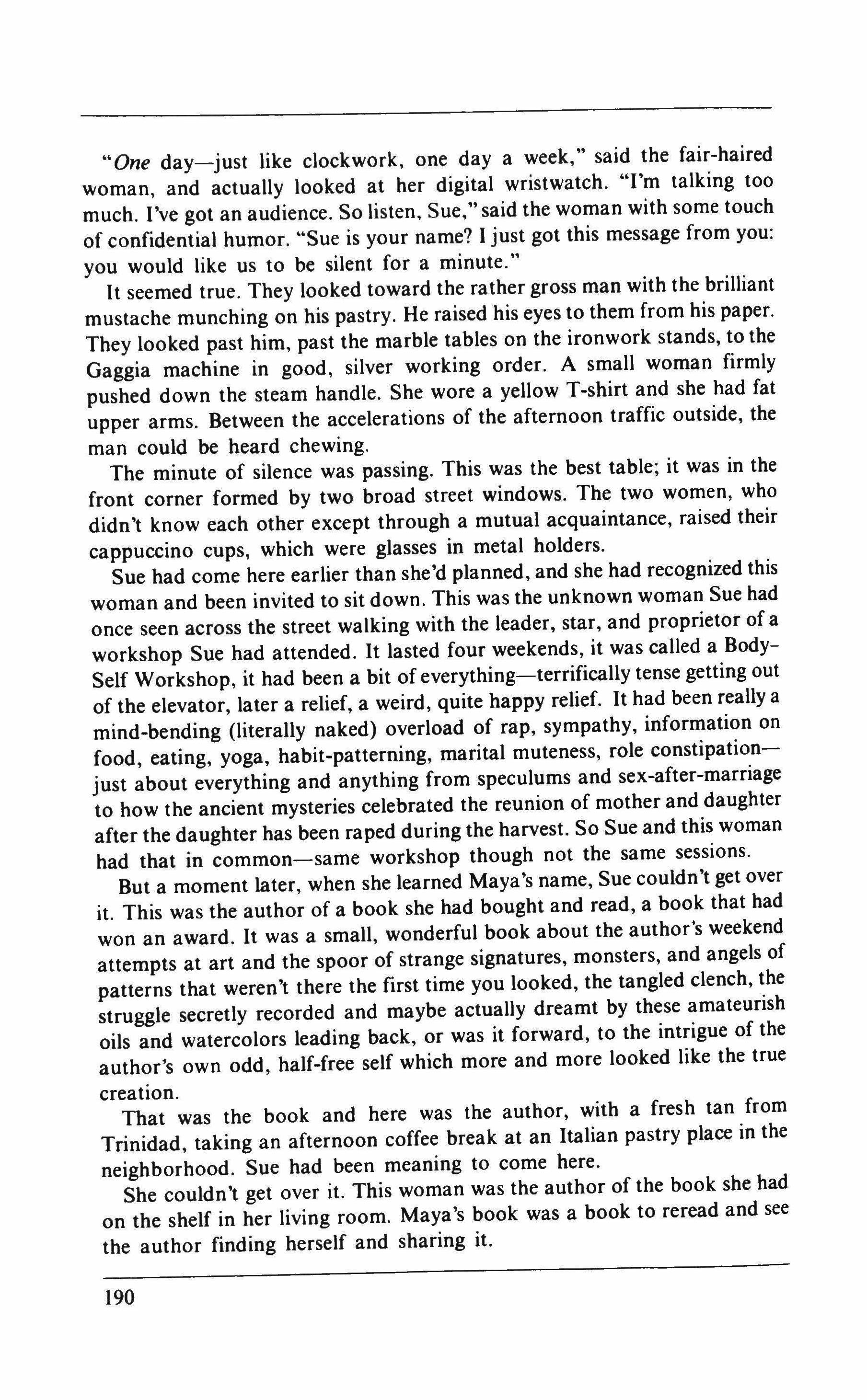
"One day-just like clockwork, one day a week," said the fair-haired woman, and actually looked at her digital wristwatch. "I'm talking too much. I've got an audience. So listen, Sue," said the woman with some touch of confidential humor. "Sue is your name? I just got this message from you: you would like us to be silent for a minute."
It seemed true. They looked toward the rather gross man with the brilliant mustache munching on his pastry. He raised his eyes to them from his paper. They looked past him, past the marble tables on the ironwork stands, to the Gaggia machine in good, silver working order. A small woman firmly pushed down the steam handle. She wore a yellow T-shirt and she had fat upper arms. Between the accelerations of the afternoon traffic outside, the man could be heard chewing.
The minute of silence was passing. This was the best table; it was in the front corner formed by two broad street windows. The two women, who didn't know each other except through a mutual acquaintance, raised their cappuccino cups, which were glasses in metal holders.
Sue had come here earlier than she'd planned, and she had recognized this woman and been invited to sit down. This was the unknown woman Sue had once seen across the street walking with the leader, star, and proprietor of a workshop Sue had attended. It lasted four weekends, it was called a BodySelf Workshop, it had been a bit of everything-terrifically tense getting out of the elevator, later a relief, a weird, quite happy relief. It had been really a mind-bending (literally naked) overload of rap, sympathy, information on food, eating, yoga, habit-patterning, marital muteness, role constipationjust about everything and anything from speculums and sex-after-marriage to how the ancient mysteries celebrated the reunion of mother and daughter after the daughter has been raped during the harvest. So Sue and this woman had that in common-same workshop though not the same sessions.
But a moment later, when she learned Maya's name, Sue couldn't get over it. This was the author of a book she had bought and read, a book that had won an award. It was a small, wonderful book about the author's weekend attempts at art and the spoor of strange signatures, monsters, and angels of patterns that weren't there the first time you looked, the tangled clench, the struggle secretly recorded and maybe actually dreamt by these amateurish oils and watercolors leading back, or was it forward, to the intrigue of the author's own odd, half-free self which more and more looked like the true creation.
That was the book and here was the author, with a fresh tan from Trinidad, taking an afternoon coffee break at an Italian pastry place in the neighborhood. Sue had been meaning to come here.
She couldn't get over it. This woman was the author of the book she had on the shelf in her living room. Maya's book was a book to reread and see the author finding herself and sharing it.
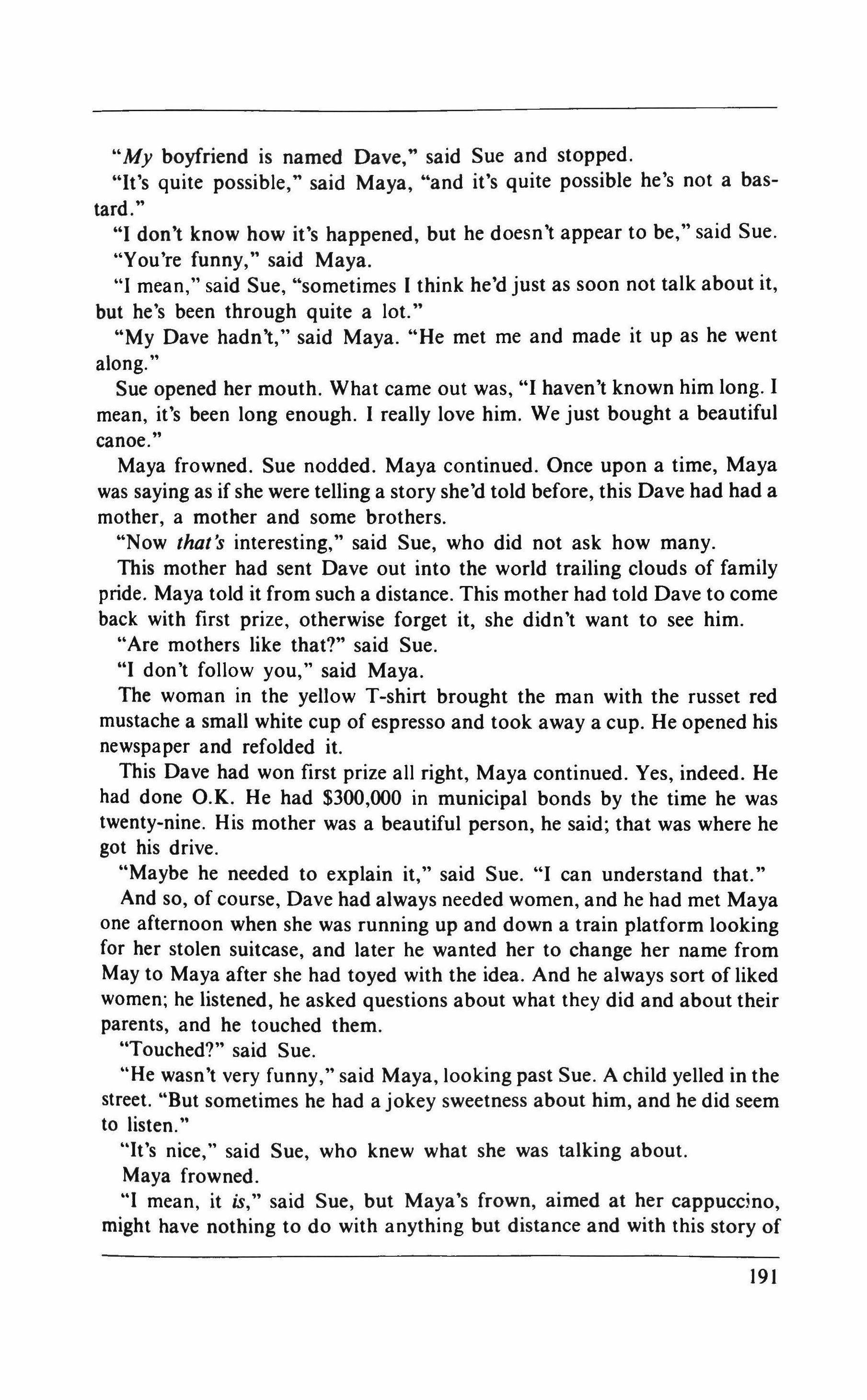
"My boyfriend is named Dave," said Sue and stopped. "It's quite possible,'" said Maya, "and it's quite possible he's not a bastard."
"I don't know how it's happened, but he doesn't appear to be," said Sue.
"You're funny," said Maya.
"I mean," said Sue, "sometimes 1 think he'd just as soon not talk about it, but he's been through quite a lot."
"My Dave hadn't," said Maya. "He met me and made it up as he went along.
Sue opened her mouth. What came out was, "I haven't known him long. I mean, it's been long enough. 1 really love him. We just bought a beautiful canoe."
Maya frowned. Sue nodded. Maya continued. Once upon a time, Maya was saying as if she were telling a story she'd told before, this Dave had had a mother, a mother and some brothers.
"Now that's interesting," said Sue, who did not ask how many.
This mother had sent Dave out into the world trailing clouds of family pride. Maya told it from such a distance. This mother had told Dave to come back with first prize, otherwise forget it, she didn't want to see him.
"Are mothers like that?" said Sue.
"I don't follow you," said Maya.
The woman in the yellow T-shirt brought the man with the russet red mustache a small white cup of espresso and took away a cup. He opened his newspaper and refolded it.
This Dave had won first prize all right, Maya continued. Yes, indeed. He had done O.K. He had $300,000 in municipal bonds by the time he was twenty-nine. His mother was a beautiful person, he said; that was where he got his drive.
"Maybe he needed to explain it," said Sue. ··1 can understand that."
And so, of course, Dave had always needed women, and he had met Maya one afternoon when she was running up and down a train platform looking for her stolen suitcase, and later he wanted her to change her name from May to Maya after she had toyed with the idea. And he always sort of liked women; he listened, he asked questions about what they did and about their parents, and he touched them.
"Touched?" said Sue.
"He wasn't very funny," said Maya,looking past Sue. A child yelled in the street. "But sometimes he had a jokey sweetness about him, and he did seem to listen."
"It's nice," said Sue, who knew what she was talking about.
Maya frowned.
"I mean, it is," said Sue, but Maya's frown, aimed at her cappuccino, might have nothing to do with anything but distance and with this story of

Dave with its sense somewhere beyond even Maya-and a sadness that halfincluded Sue.
And always in that glass house he had built for her, there had been that mother. Well, he kept women on the far side of his mother; but this beautiful person, this ever-dark-haired, amber-eyed mother who never changed and when she was sixty-three her hair still looked like a painting, well, he actually didn't see much of her, this great mother of his, even though-
"Did she live far away?" asked Sue.
-even though for a long time she lived close enough to drive to for a weekend (Maya had seen her the first time from a car window and didn't know it). Later Dave's mother sold the house and moved out West, right?
"What do you mean, 'He kept women on the far side of his mother'?"
"What do you mean what do 1 mean?" said Maya, distracted.
"I guess 1 know," said Sue, and couldn't look at anything but the metal cup-holder in her hand. "I meant, what did he do that you saw this?"
A pale shadow went over Maya's face as she looked past Sue over Sue's shoulder, and the long window behind Sue seemed ready to expose Sue if she turned to look. It wasn't that Sue was irritating Maya. The man facing them two tables away gulped some water.
"It wasn't what he did, it was how he did it," said Maya.
"There you are," said Sue, "the how."
Maya frowned at her and looked past her out through the street window behind Sue.
"1 only mean," said Sue, "it's like 1 said. 1 mean, if you don't want it to happen all over again the next time."
The pale shadow went over Maya's face again. Her mouth was speaking. The story had a mystery missing from it, something left out, some act undone.
On a Saturday when Maya was at her table in the study, Dave would tiptoe down the hall like the dog moving over the floorboards, then stop at the verge, so her heart would start pounding, and she'd get mad-she admitted it. Then he would push the door open a crack and watch her, so she felt she was being checked up on and approved of; whereas, if he had knocked and come in asking if he was interruptinganything oh, it was all in how he did it. He made her feel like a well-endowed slave on display, when all she was doing-
"But no one can make you feel like that unless you're willing to," interrupted Sue, recalling the workshop.
-when all Maya was doing was her own work although, mind you, it was stuff he pushed her to do. Like, there's encouragement and there's encouragement: "some encouragement is like alimony-deductible."
"But," said Sue, "when he came home for lunch when you weren't expecting him, and he brought two splits of champagne-"

"A bottle, I said," said Maya, "didn't I?"
"-it's the gesture that counts," said Sue, "however he did it."
"But I wasn't going to drink at one-thirty in the afternoon. I'm not his mother.• don't even look like her. He even pointed that out to me."
"But champagne," said Sue, "an impulse."
"Maybe it would be different now," said Maya. "I really don't know. His mother drank champagne; that's all she drank. He sent her a case of French champagne at Easter and Thanksgiving, probably still does. He used to quote her-"
"His mother liked champagne?" said Sue. "So do I." She smiled impishly at Maya who frowned. "I mean," said Sue, "I'm not at all extravagant. I'm quite careful about money. When. wanted to buy a canoe, he was going to order a bark canoe although he would have had to go on a waiting list, but it cost thirteen hundred dollars, and for me the main thing was just that it wasn't aluminum."
The newspaper crackled at the neighboring table and the man with the red mustache was heard to say, distinctly, "Good old Dive."
Maya rolled her eyes upward, lowered her voice a notch.
"He did bring home a couple of splits once."
"You see?" said Sue. "He doesn't have a bushy red mustache, does he?"
"He appears to have changed his looks with the times," said Maya drily.
Sue and Maya seemed closer. The woman in the yellow T-shirt leaned her elbows on the counter looking out toward the street.
Sue wanted to know how long they had been married.
Maya thought it over unhappily. She and Dave could be said to have been together, all told, for the better part of six years.
Sue said that Maya must really know the neighborhood. They identified the apartment houses where they lived. Sue got Maya's address. Sue's phone number was in the book with the initial S, she said.
When things were breaking down between Dave and Maya, rays came from him; he was hating her for knowing him, yet she kept reasonably quiet about it. She knew him, that is, too well.
"You kept quiet?" said Sue.
Later, more than earlier, it seemed to Maya. Dave seemed to think she didn't know he was seeing someone; he couldn't imagine that she would be angry only about how he was handling it.
"I don't understand that," said Sue.
Like he was putting one over. For example, walking the puppy all the damn time. As for Maya, she didn't want to know-that is, who it was.
"But you must have been angry." said Sue.
Maya looked past her out the window as if she had more to look at than Sue did.
The fat man exhaled audibly. Fresh cigarette smoke reached them.

Anger-it was a matter of degree. Of how things got said. Things had seldom been calm. Maya got a letter from her mother with advice on a particularly sore point. Maya determined to ignore the letter, not tell Dave; but then she left it on her table and, of course, Dave saw it and told her he sympathized. Then they got into a fight about it.
"About what?" said Sue, feeling the neighborly red mustache facing directly her way.
Maya's not telling Dave.
"About the letter? A fight about the letter?"
"Isn't that what I said?" said Maya.
She and Dave were close enough, and in the beginning Maya had never minded being dependent on Dave for love--wasn't he dependent on her? He was so proud of her, didn't want her to work, didn't want her to clean the place until she said, hell, she had been used to doing her own place. However, it was two floors now of this brownstone he owned. And then she found him to be a greater slob than she'd first seen; he'd walk around the apartment first thing in the morning, brushing his teeth, his mouth full of toothpaste-and talking.
"That's amazing," said Sue. It had indeed been amazing to see.
At first Maya never minded being dependent on Dave for money, but not because in those "preinflationary" days she'd thought of her houseworkher "homework"-as bringing in a portion of their income; his income was high even when she first knew him. Money was only money, and it wasn't as if he had cleaned up at someone else's expense-a chuckle came from two tables away-and if they had needed more money, she would have gone out to work again. But they were rich, comparatively-even not comparatively. She wasn't saying it right.
"But I understand," said Sue, who had the slightest physical discomfort and was afraid the conversation had to get somewhere but might not. "You 're forgiven," she said to the other woman.
"You're funny," said Maya.
"It's behind you," said Sue.
"But money isn't only money," said Maya suddenly. "It's how hard you have to hack for it."
"Where in New England do you paint?" asked Sue. "I don't think the book said.
"I don't paint," said Maya. "I never had the slightest gift. It was Connecticut at first, Vermont later on. There was a problem about my getting a driver's license."
"What was the problem?"
"I didn't get one."
"How come?"

"I happen to think driving is insane," said Maya.
"What about being driven?" Sue asked. They observed the man with the red mustache licking his fingers.
Well, Maya was of the opinion that it depended on who was doing the driving, and Dave was perfectly adequate, so why pressure her?
"Really," said Sue, supportively. But there she was, agreeing; and she added, "It's hard to understand women who don't drive; 1 think someone said that. But I couldn't imagine not having my license." Again this was not quite what Sue had meant to say.
She felt she was overhearing Maya, who went on musingly, seeing from far off by private surveillance some poignant map of motions: see the women pulling into the train station parking lot at sunset in the springtime; see them busing the children to school; see them unlocking the back of the station wagon for the cute supermarket boy to unload the cart he's wheeled out for you-a silver basket with a jammed wheel. Subjugation came step by step, not all at once, and suddenly there you were, you were in the picture, drawn in by some drug of living with others.
"That's eternal," said Sue. Which came out flattering. "But don't forget the women cab drivers up there in the front seat."
"Will you say what you mean," said Maya. She looked back across the room and smiled at the woman in the yellow T-shirt and pointed to her cup. The man with the bright, bushy eyebrows and the mustache to end all mustaches blew two smoke rings and would have managed a third but proceeded to cough violently, shaking his head and grinning as the women watched his paroxysms.
"SUbjugation," said Sue. "Was it really subjugation?"
"No, for God's sake," said Maya, "it wasn't really SUbjugation. It was only in my head. Got any other questions? It sounds like you haven't had your turn yet."
"I hope I don't," said Sue.
"He sounds O.K.," said Maya gently.
Sue thought a moment. "I don't know him too well yet," she said. "At least 1 can say what I mean to him."
"What you mean to him?" said Maya.
Sue shook her head and smiled tolerantly. "We're more easygoing," she said. "I don't ask him a lot of questions."
"About old loves."
"Right.
"Do you want to know?"
"Oh, once he had two girl friends going at the same time, and he was living with one. It didn't make him exactly happy."
"Poor thing," said Maya.
"He did have," said Sue, "what he called a long misunderstanding with

one person he really loved. I believe she was beautiful-I mean, I'm sure she was and," Sue shrugged, "he got really terribly confused, I gather. I didn't much care to hear about her; I didn't make a point of it, but he understood."
"I would have gotten every last detail," said Maya.
"Would you?"
"No. Yes."
"He said he was afraid she was suicidal, and once when they'd had a fight to end all fights, he felt suicidal himself-whatever that means."
"Which ain't much," said Maya.
"But he said they could never have agreed on a suicide pact; he wishes he had made the point. They might have had a good laugh about it and parted more like friends."
"So he had a good laugh with you instead, right?"
"Right.
"Have you ever hated him?" asked Maya abruptly.
"I can't say I have," said Sue.
"It'll give you a rush," said Maya.
"I don't follow you," said Sue. Maya had said the same thing to her.
"It's liberating," said Maya.
"Well, I got a lot out of the workshop," said Sue.
"My dear," said Maya. "I think you haven't smelled rock bottom yet."
"That's true," said Sue bravely. "I haven't been that desperate."
"It isn't like any workshop," said Maya. "No one can tell you."
"I've listened to everything you've said," said Sue. "I'm hopeful. I'm getting married to my lover. We're buying an apartment in my building. I'm pregnant; I didn't say that. He's glad. He's quite a bit older, but he's never taken the plunge. He's wonderful. He's amazing."
Sue had said too much. So she added, "I guess I didn't mention I'm pregnant. It happened during the workshop."
Sue and Maya had to laugh, relieved of a burden apparently not there until it wasn't there.
"You're pretty," said Maya.
"Thank you."
"I get sick of being blond with blue eyes," said Maya. Sue smiled-rather sweetly, she knew. She turned to look out through the street window behind her.
"But to be blond with eyes like yours," said Maya, "or to have my eyes and your hair-Celtic-that would be the thing. But what are your eyes?"
"Sort of brown," said Sue.
"Better than that," said Maya.
The man at the other table had a fit of coughing that wouldn't go away until the instant before the woman in the yellow T-shirt paused to clap him on the back, coming with Maya's cappuccino.

"That's better," said Maya.
"But subjugation," said Sue seriously.
"You're really asking for it," said Maya. "Remember, I can be held responsible for what I say."
One could use other words than "subjugation," according to Maya, if one wanted to split hairs. Anyway, this was how it had happened-in a nutshell.
Maya told it so Sue could practically see the man-she knew she couldthrough the words of this woman she'd run into in a cafe that her own Dave had given her the address of, that she had been meaning to come to all by herself until he had suggested today. For a while her time was going to be her own. Maya's experience was not her experience, and she didn't especially need to tell about herself. Actually, she was ready for Maya to go.
Maya's words felt more directed to Sue than before, and Sue signaled to the woman at the Gaggia machine. There was a harshness that had been in Maya's words that Sue recognized as now missing. The words were uncomfortable. They seemed, one by one, to be adding to Sue's life.
"He phoned from his office and asked me to meet him at the movies," said Maya. "Dinner was all out on the chopping board. I put it on hold. Take a break from cooking, he was always saying. Or he phoned from ChicagoChicago! when I thought he was twenty blocks away!-he hadn't known he was going until the last second, and he hadn't been able to reach me before he left. But I'd been home reading, right? Pack a bag for both of us, he said, we'd have a long weekend with his friends in Montana. I said, 'Montana." '
Sue felt the word "Montana." That is, sung from a familiar guitar by an easygoing voice, an already beloved voice that had recently taken up the guitar. I'm goin' to Montana for to throw the Hoolihan. She didn't know what the Hoolihan was. It was a type of cow or horse cowboys used to ride, she thought.
Sue said, "I would have gone to Montana."
"That was a weekend," said Maya. "I forgot my diaphragm, and Dave got paralyzed on top of our host's roof just when a windstorm came up."
"Did you travel a lot?" asked Sue.
"Of course not. I was thinking about a job. And how would I travel with a job? And anyway, weekends aren't traveling."
"So what did you do in between?"
"A lot of reading," said Maya. "I was reading science, yes, science. 1 sat reading from first thing in the morning till the middle of the afternoon. I used to get a phone call twice a day for a while. A variety of dirty phone call I called a Sadness Call or a Tragedy Call: I'd pick up, and all I'd hear was someone weeping. 1 didn't ask, "Who is this?" They would hang up and the line would start buzzing. It sounded as if maybe not the weeping person herself had hung up. I told Dave and at first he didn't believe me, but it was true. He paced the living room in front of the couch where I was lying with a

drink in my hand, waiting for the timer to ring in the kitchen. He said my reading gave me fantasies. He got so he wouldn't sit down."
"You were thinking about a job," said Sue. She was ready for Maya to go. "I was reading geometry. Yup. Then I was reading economics; I was sick of hearing people talk about it."
"I know what you mean," said Sue, "but no one really understands it."
"'Why do you read that stuff?' Dave said. He wanted to know what I thought of Delius's 'Florida Suite'; what did I think of a Dylan song, where had Dylan gotten it from? But then Dave would talk about economics after all, and he wasn't over my head. The only advantage of public-venturecapital companies over private is liquidity, as I recall. It's like those phone calls. I almost dream them. 'Are you still getting those phone calls?' he'd ask, as if he wanted me to bring up my insane fantasies. One night he said, 'What are we going to do about you?"
Sue imagined him standing doing something-she wasn't sure what-but straining his muscles putting out effort, a tall man.
"He demanded to know why I didn't take my painting seriously," continued Maya. "I told him I enjoyed it, fooling around in a field, getting everything in that field except the horse, which I always left out because I can't draw horses. Or sitting on a stump trying to get the color of a pond at five o'clock. He said that I should do something with the painting. He used to frown seriously as if he was really thinking about it.
"'You, you're just waiting for something to happen,' he said. I said things were happening. I was getting those phone calls. 'That's what I mean,' he said; 'you're at loose ends, you don't think enough of yourself.'
"One Sunday night in Vermont I was packing a bag. I mean, that's what I'd do Sunday at that hour, like clockwork."
"You said that," said Sue. "You said you met here like clockwork."
"I meant on one particular day of the week. Guess which one. Well, that Sunday in Vermont, a picture of mine was lying on the bed. Suddenly I hadn't painted it. I could see it. I don't know how long this went on, but I remember Dave was in the doorway with his new safari bow."
It was so vivid Sue looked away. She saw the man wedge one end of the hunting bow against his foot and decisively bend the top end down to hook the loop into the groove. She saw him occupied. She saw pale stubble along his jaw. She saw rimless glasses that she wanted to change for Polo hornrims but she couldn't make out his eyes, which were aimed past her over her shoulder.
"He knew I was aware of him. Then he said, 'Do you want me to pack?' I didn't answer because I knew what he meant, but, you see, I didn't answer because I was in that picture of mine. I resolved to be nice and to the point: I said, 'I've done something here. ",
"Well, it released him from the doorway. I can visualize to one side ofthat
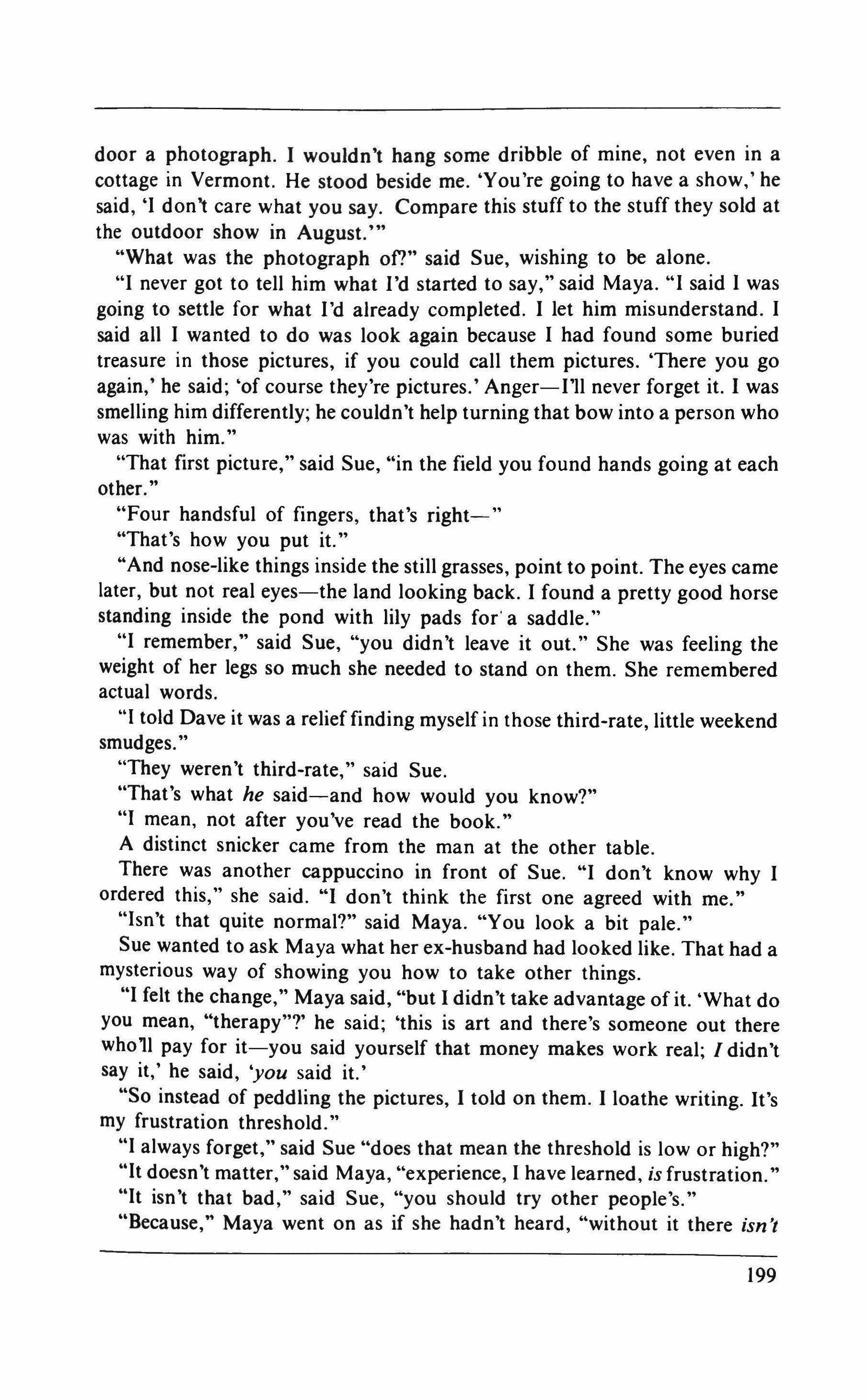
door a photograph. 1 wouldn't hang some dribble of mine, not even in a cottage in Vermont. He stood beside me. 'You're going to have a show,' he said, 'I don't care what you say. Compare this stuff to the stuff they sold at the outdoor show in August...
"What was the photograph on" said Sue, wishing to be alone.
"I never got to tell him what I'd started to say," said Maya. "I said I was going to settle for what I'd already completed. 1 let him misunderstand. I said all I wanted to do was look again because I had found some buried treasure in those pictures, if you could call them pictures. 'There you go again,' he said; 'of course they're pictures.' Anger-I'll never forget it. I was smelling him differently; he couldn't help turning that bow into a person who was with him."
"That first picture," said Sue, "in the field you found hands going at each other."
"Four handsful of fingers, that's right-"
"That's how you put it."
And nose-like things inside the still grasses, point to point. The eyes came later, but not real eyes-the land looking back. I found a pretty good horse standing inside the pond with lily pads for' a saddle."
"I remember," said Sue, "you didn't leave it out." She was feeling the weight of her legs so much she needed to stand on them. She remembered actual words.
"I told Dave it was a relief finding myself in those third-rate, little weekend smudges."
"They weren't third-rate," said Sue.
"That's what he said-and how would you know?"
"I mean, not after you've read the book."
A distinct snicker came from the man at the other table.
There was another cappuccino in front of Sue. "I don't know why I ordered this," she said. "I don't think the first one agreed with me."
"Isn't that quite normal?" said Maya. "You look a bit pale."
Sue wanted to ask Maya what her ex-husband had looked like. That had a mysterious way of showing you how to take other things.
"I felt the change," Maya said, "but I didn't take advantage of it. 'What do you mean, "therapy"?' he said; 'this is art and there's someone out there who'll pay for it-you said yourself that money makes work real; I didn't say it,' he said, 'you said it.'
"So instead of peddling the pictures, I told on them. I loathe writing. It's my frustration threshold."
"I always forget," said Sue "does that mean the threshold is low or high?"
"It doesn't matter," said Maya, "experience, I have learned. is frustration."
"It isn't that bad," said Sue, "you should try other people's."
"Because," Maya went on as if she hadn't heard, "without it there isn't
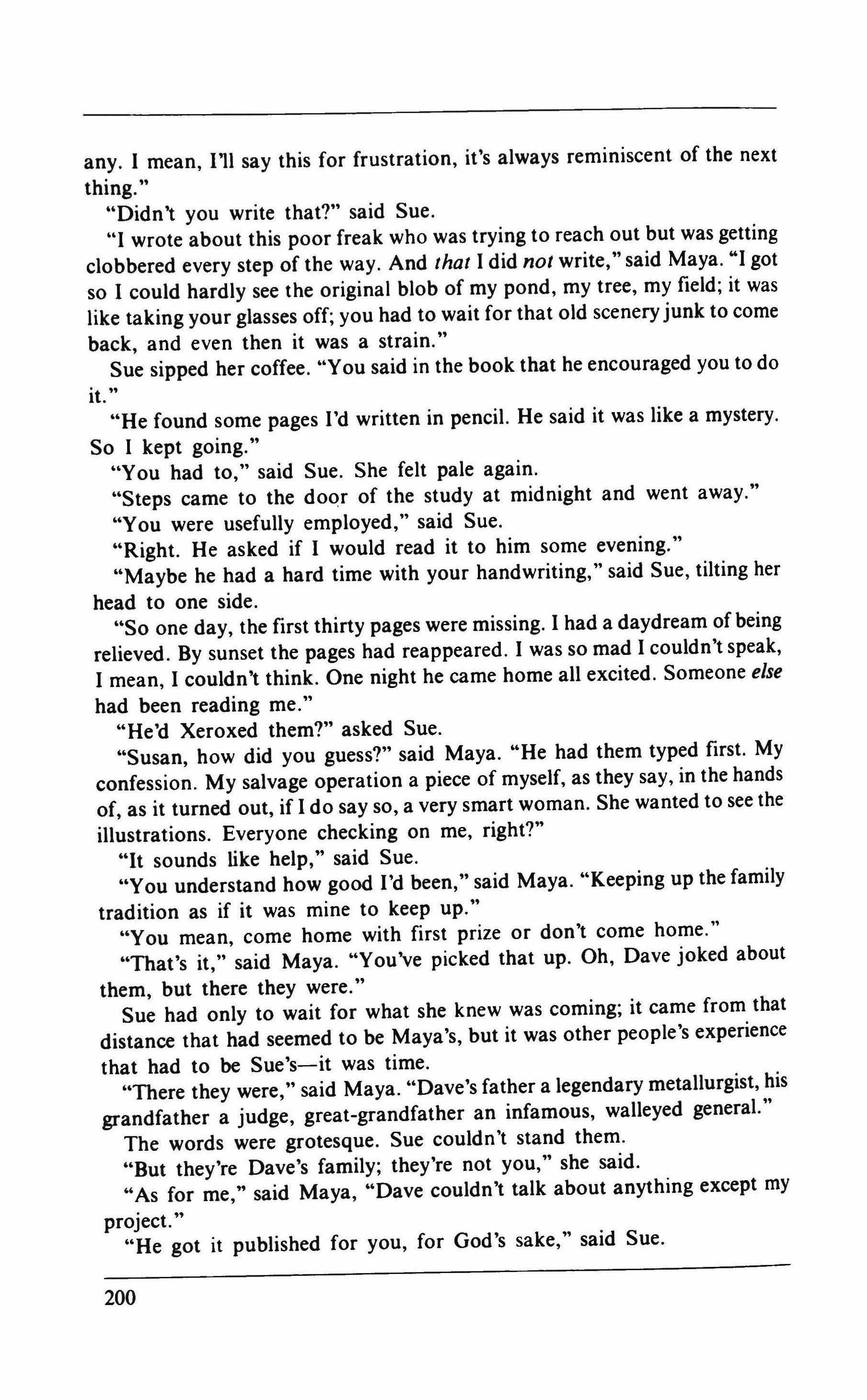
any. 1 mean, 111 say this for frustration, it's always reminiscent of the next thing.
"Didn't you write that?" said Sue.
"I wrote about this poor freak who was trying to reach out but was getting clobbered every step of the way. And that I did not write," said Maya. "I got so I could hardly see the original blob of my pond, my tree, my field; it was like taking your glasses off; you had to wait for that old scenery junk to come back, and even then it was a strain."
Sue sipped her coffee. "You said in the book that he encouraged you to do it.
"He found some pages I'd written in pencil. He said it was like a mystery. So I kept going."
"You had to," said Sue. She felt pale again.
"Steps came to the door of the study at midnight and went away."
"You were usefully employed," said Sue.
"Right. He asked if 1 would read it to him some evening."
"Maybe he had a hard time with your handwriting," said Sue, tilting her head to one side.
"So one day, the first thirty pages were missing. 1 had a daydream of being relieved. By sunset the pages had reappeared. 1 was so mad 1 couldn't speak, I mean, I couldn't think. One night he came home all excited. Someone else had been reading me."
"He'd Xeroxed them?" asked Sue.
"Susan, how did you guess?" said Maya. "He had them typed first. My confession. My salvage operation a piece of myself, as they say, in the hands of, as it turned out, if I do say so, a very smart woman. She wanted to see the illustrations. Everyone checking on me, right?"
"It sounds like help," said Sue.
"You understand how good I'd been," said Maya. "Keeping up the family tradition as if it was mine to keep up."
"You mean, come home with first prize or don't come home."
"That's it," said Maya. "You've picked that up. Oh, Dave joked about them, but there they were."
Sue had only to wait for what she knew was coming; it came from that distance that had seemed to be Maya's, but it was other people's experience that had to be Sue's-it was time.
"There they were," said Maya. "Dave's father a legendary metallurgist, his grandfather a judge, great-grandfather an infamous, walleyed general."
The words were grotesque. Sue couldn't stand them.
"But they're Dave's family; they're not you," she said.
"As for me," said Maya, "Dave couldn't talk about anything except my project.
"He got it published for you, for God's sake," said Sue. 200
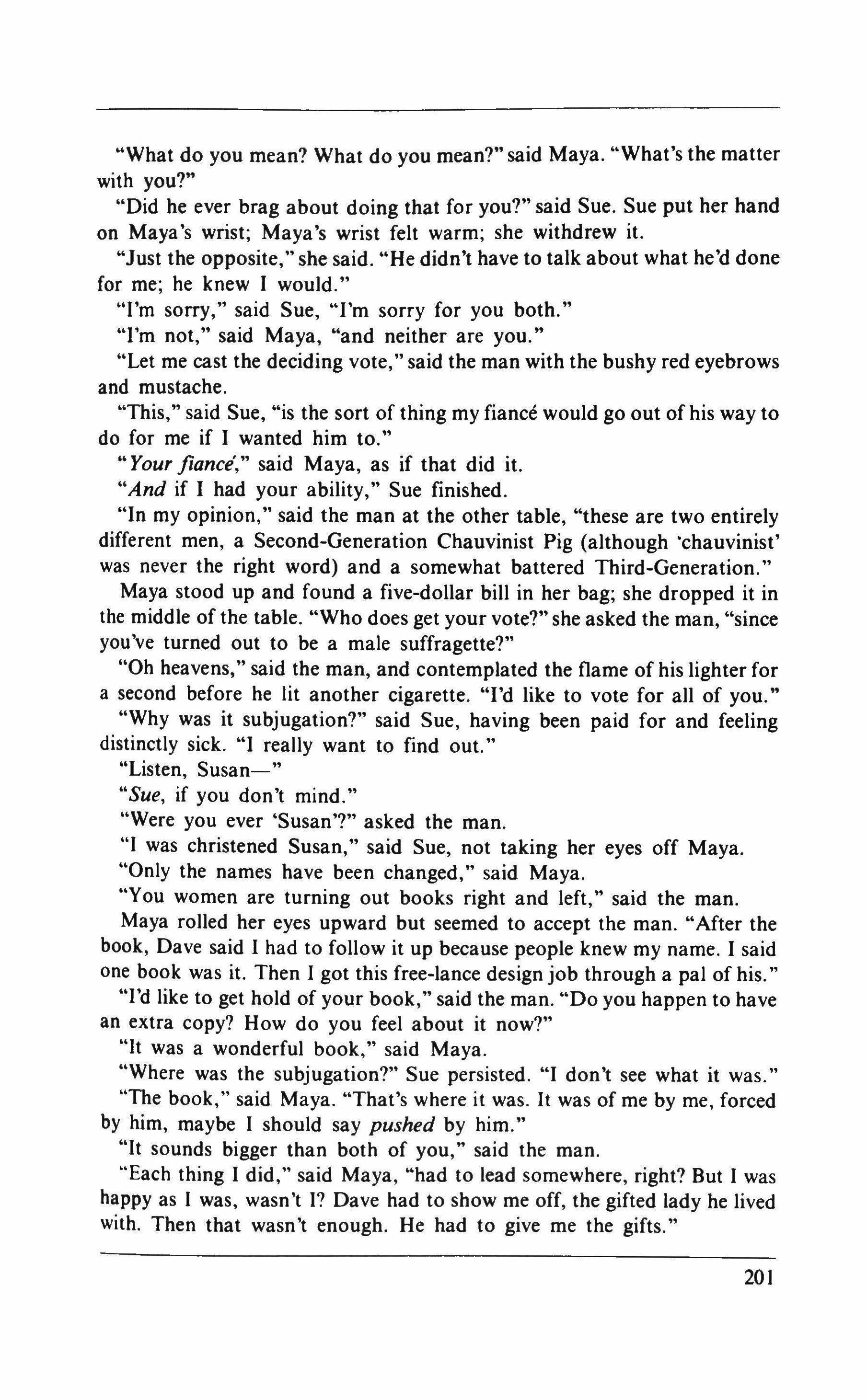
"What do you mean? What do you mean?" said Maya. "What's the matter with you?"
"Did he ever brag about doing that for you?" said Sue. Sue put her hand on Maya's wrist; Maya's wrist felt warm; she withdrew it.
"Just the opposite," she said. "He didn't have to talk about what he'd done for me; he knew I would."
"I'm sorry," said Sue, "I'm sorry for you both."
"I'm not," said Maya, "and neither are you."
"Let me cast the deciding vote," said the man with the bushy red eyebrows and mustache.
"This," said Sue, "is the sort of thing my fiance would go out of his way to do for me if I wanted him to."
"Your fiance," said Maya, as if that did it.
"And if I had your ability," Sue finished.
"In my opinion," said the man at the other table, "these are two entirely different men, a Second-Generation Chauvinist Pig (although 'chauvinist' was never the right word) and a somewhat battered Third-Generation."
Maya stood up and found a five-dollar bill in her bag; she dropped it in the middle of the table. "Who does get your vote?" she asked the man, "since you've turned out to be a male suffragette?"
"Oh heavens," said the man, and contemplated the flame of his lighter for a second before he lit another cigarette. "I'd like to vote for all of you."
"Why was it subjugation?" said Sue, having been paid for and feeling distinctly sick. "I really want to find out."
"Listen, Susan-"
"Sue, if you don't mind."
"Were you ever 'Susan'?" asked the man.
"I was christened Susan," said Sue, not taking her eyes off Maya.
"Only the names have been changed," said Maya.
"You women are turning out books right and left," said the man.
Maya rolled her eyes upward but seemed to accept the man. "After the book, Dave said I had to follow it up because people knew my name. I said one book was it. Then 1 got this free-lance design job through a pal of his.
"I'd like to get hold of your book," said the man. "Do you happen to have an extra copy? How do you feel about it now?"
"It was a wonderful book," said Maya.
"Where was the subjugation?" Sue persisted. "I don't see what it was."
"The book," said Maya. "That's where it was. It was of me by me, forced by him, maybe 1 should say pushed by him."
"It sounds bigger than both of you," said the man.
"Each thing I did," said Maya, "had to lead somewhere, right? But I was happy as 1 was, wasn't I? Dave had to show me off, the gifted lady he lived with. Then that wasn't enough. He had to give me the gifts."

"I don't get that," said Sue.
"Neither do I," said Maya. The woman in the yellow Tvshirt made change at the table and Maya left a dollar. "Thank you," said Sue.
The woman stood there; she thanked Maya for the dollar that lay on the table.
"But this began quite a while ago," said the man at the other table. "If Dave was a Second-Generation Pig, wasn't he ahead of his time?"
"He transcended it," said Maya.
"You 're Elsa?" said Sue to the woman. She nodded agreeably.
Sue then didn't ask what she had been going to ask. She felt sick and asked for a glass of water.
"This is hopeless," said Maya. "You'll have to find out for yourself."
"Maybe I'm a second-generation feminist," said Sue. "If we have problems, we'll talk about them."
"I hate all those words," said Maya, turning toward the door.
"What were you doing in Albuquerque?" said the fat man. "You saw the lady's book in Albuquerque."
"It was still sitting on a bookseller's shelfafter two years. I was on my way to visit my fiance's mother in Santa Fe." She stood up wearily.
"What were you doing in Burlington?" said the man.
"Dave has a cottage outside of Burlington. Why are we talking to you?" said Sue.
"And when your child is born," said Maya, "you will have a use for the inevitable extra bedroom."
"I have heard unconfirmed reports," said the man, "that marriage and love make doubtful bedfellows."
"But what else is there?" said Sue.
The man looked at the three women. "Maybe what I've been hearing about is first love and first marriage."
"You can't tell by her," said Sue. "She was a victim of subjugation."
"You're right, you can't tell by me," said Maya. "Dave and I were never married.
"I thought so," said Sue.
"Ah," said the man, "the sore point."
"So maybe he's still interested," said Maya.
"There are different kinds of love," said Sue. Then the fat man said, "You've seen him recently?"
Maya said, "What-fifteen, twenty minutes ago."
"You were here," said Sue.
"I was here," said Maya, "and he passed by and looked in the window. It happens.
"Dave?" said Sue.
"He was right behind you," said Maya. "I'm sure he couldn't handle it."
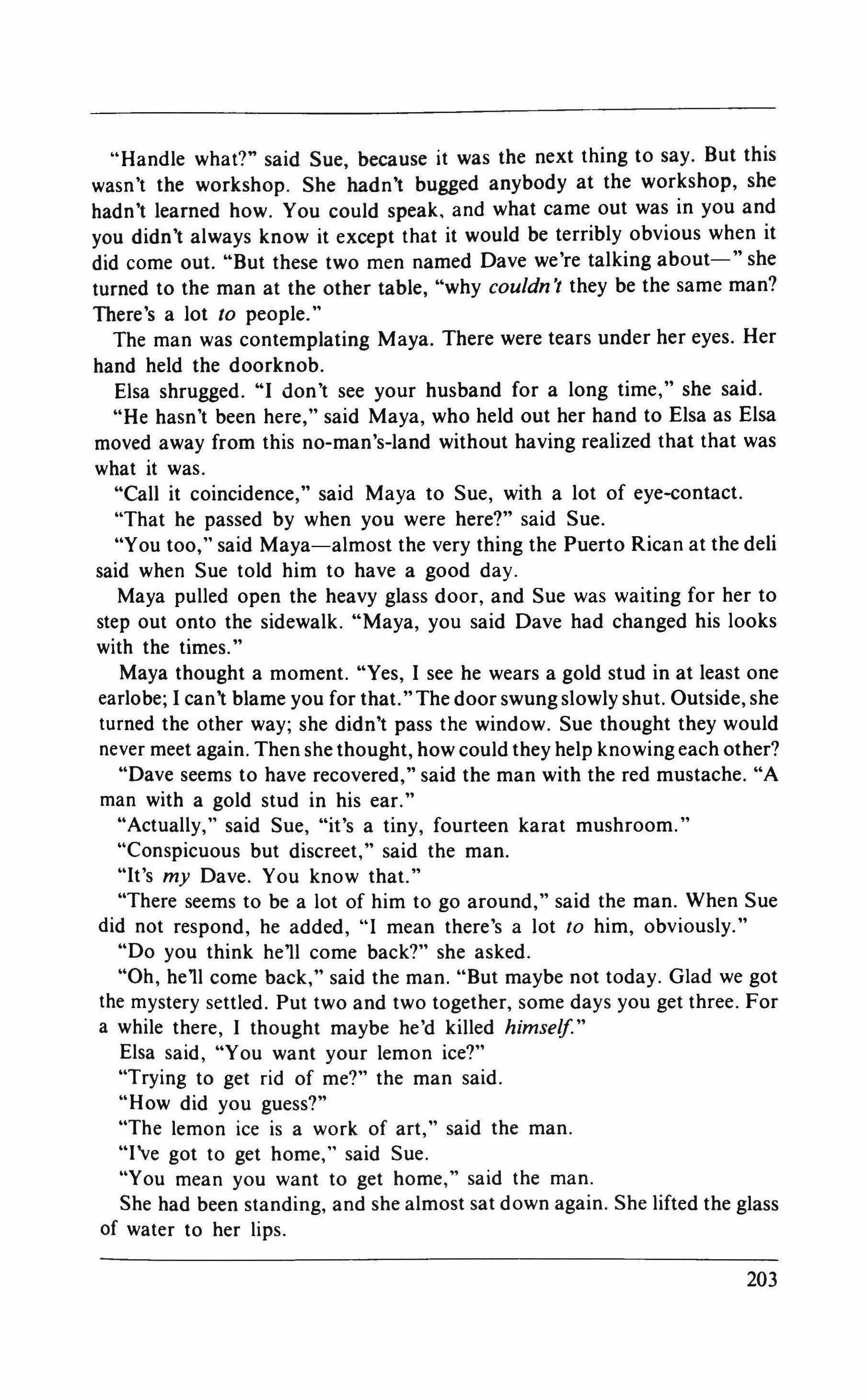
"Handle what?" said Sue, because it was the next thing to say. But this wasn't the workshop. She hadn't bugged anybody at the workshop, she hadn't learned how. You could speak. and what came out was in you and you didn't always know it except that it would be terribly obvious when it did come out. "But these two men named Dave we're talking about-" she turned to the man at the other table, "why couldn't they be the same man? There's a lot to people."
The man was contemplating Maya. There were tears under her eyes. Her hand held the doorknob.
Elsa shrugged. "I don't see your husband for a long time," she said.
"He hasn't been here," said Maya, who held out her hand to Elsa as Elsa moved away from this no-man's-land without having realized that that was what it was.
"Call it coincidence," said Maya to Sue, with a lot of eye-contact.
"That he passed by when you were here?" said Sue.
"You too," said Maya-almost the very thing the Puerto Rican at the deli said when Sue told him to have a good day.
Maya pulled open the heavy glass door, and Sue was waiting for her to step out onto the sidewalk. "Maya, you said Dave had changed his looks with the times."
Maya thought a moment. "Yes, 1 see he wears a gold stud in at least one earlobe; 1 can't blame you for that."The door swung slowly shut. Outside, she turned the other way; she didn't pass the window. Sue thought they would never meet again. Then she thought, how could they help knowing each other?
"Dave seems to have recovered," said the man with the red mustache. "A man with a gold stud in his ear."
"Actually," said Sue, "it's a tiny, fourteen karat mushroom."
"Conspicuous but discreet," said the man.
"It's my Dave. You know that."
"There seems to be a lot of him to go around," said the man. When Sue did not respond, he added, "I mean there's a lot to him, obviously."
"Do you think he'll come back?" she asked.
"Oh, he'll come back," said the man. "But maybe not today. Glad we got the mystery settled. Put two and two together, some days you get three. For a while there, I thought maybe he'd killed himself."
Elsa said, "You want your lemon ice?"
"Trying to get rid of me?" the man said.
"How did you guess?"
"The lemon ice is a work of art," said the man.
"I've got to get home," said Sue.
"You mean you want to get home," said the man.
She had been standing, and she almost sat down again. She lifted the glass of water to her lips.
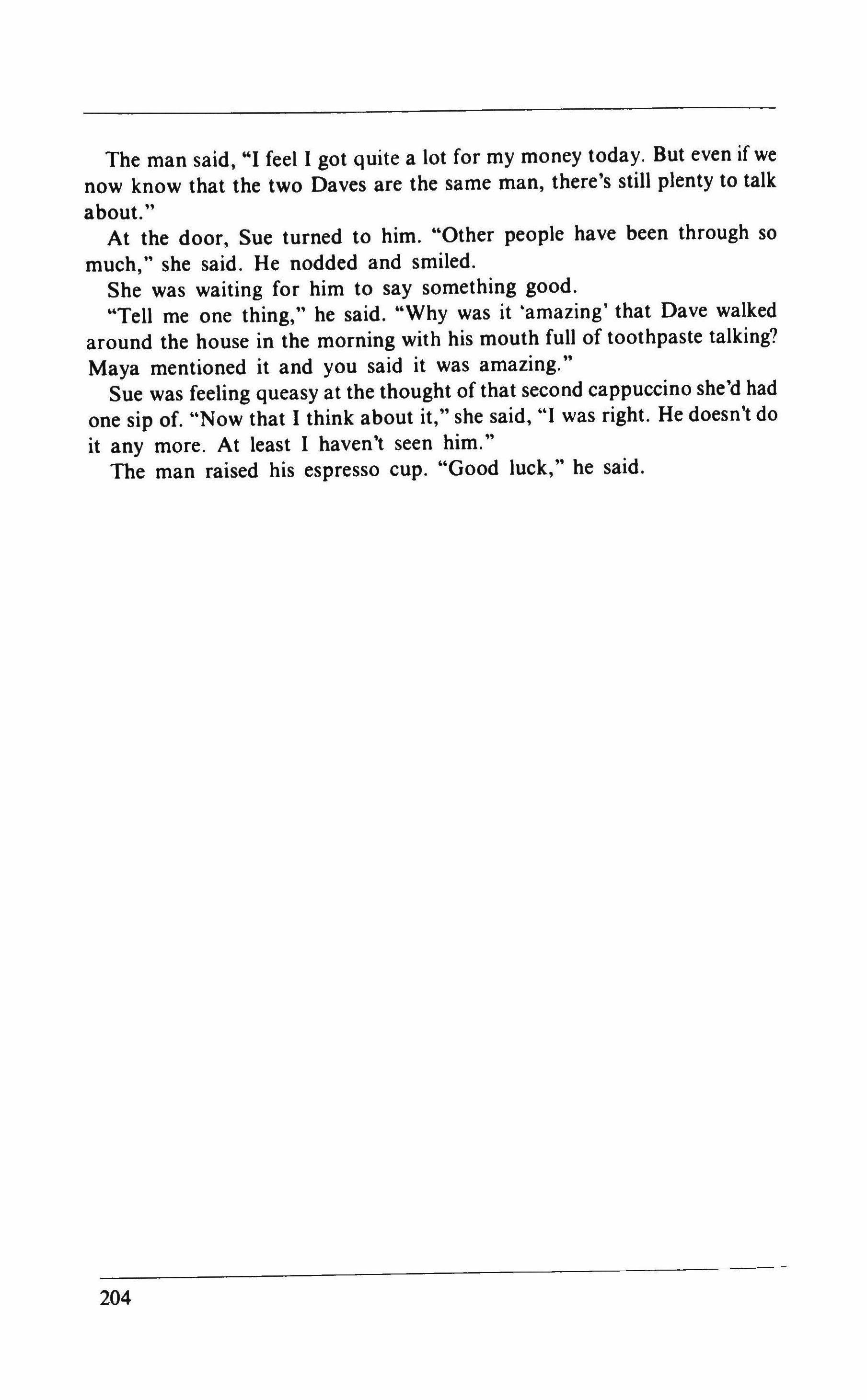
The man said, "I feel I got quite a lot for my money today. But even if we now know that the two Daves are the same man, there's still plenty to talk about.
At the door, Sue turned to him. "Other people have been through so much," she said. He nodded and smiled.
She was waiting for him to say something good.
"Tell me one thing," he said. "Why was it 'amazing' that Dave walked around the house in the morning with his mouth full of toothpaste talking? Maya mentioned it and you said it was amazing."
Sue was feeling queasy at the thought of that second cappuccino she'd had one sip of. "Now that I think about it," she said, "I was right. He doesn't do it any more. At least I haven't seen him."
The man raised his espresso cup. "Good luck," he said.

What Jonathon liked about Riordan's was that there were no ghosts there. At worst, a few small ones. When everything broke up with Tamara and all he could do was sit and stare at the walls, or glue himselfto the television set till one by one the channels went off the air, he took to going there instead. Anything you do out there with other people, he reasoned, even people you have nothing to do with, is preferable to staying shut inside your own head. Jonathon was no drinker, but he would nurse a glass or two of white wine and sit at a booth watching the scene.
The breakup had been ugly and he could not stop dwelling on it; not that there had been no crimes on his part, but the worst depredation by far had been hers. The week his therapist had stunned him by cutting him loose (saying, "I simply don't think I'm the best person for you; you're not feeling well and you need the best'') and one of his closest friends-a woman who only months before had been in almost the exact same position-refused to hear about it (saying, "Tomorrow I have to visit someone who's confined to a wheelchair; I just can't get it on for somebody's neurotic problem"), he had called Tamara in desperation and she had hung up on him. Only two days before she had told him he could call anytime. He called back and said, "Look, whatever has gone rotten between us, I'm in the middle of a nervous breakdown, my therapist won't see me any more, I really would like to talk to you." To which Tamara replied, "I don't care ifthe bottom has fallen out; you're a survivor, you'll survive," and hung up again. He was left with a prescription for a hundred antidepressant pills and walked around in a fog. So for him, Riordan's was a lifesaver.
Once a piano player he had shared a lover with briefly-there was still a certain touchiness on both sides-walked in. But that relationship was far enough in the past. Miggs Hart, a well-known movie reviewer who had succeeded him in the affections of someone else, also came in occasionally. But that, too, was minor and even longer ago. Nothing to alter the fact that
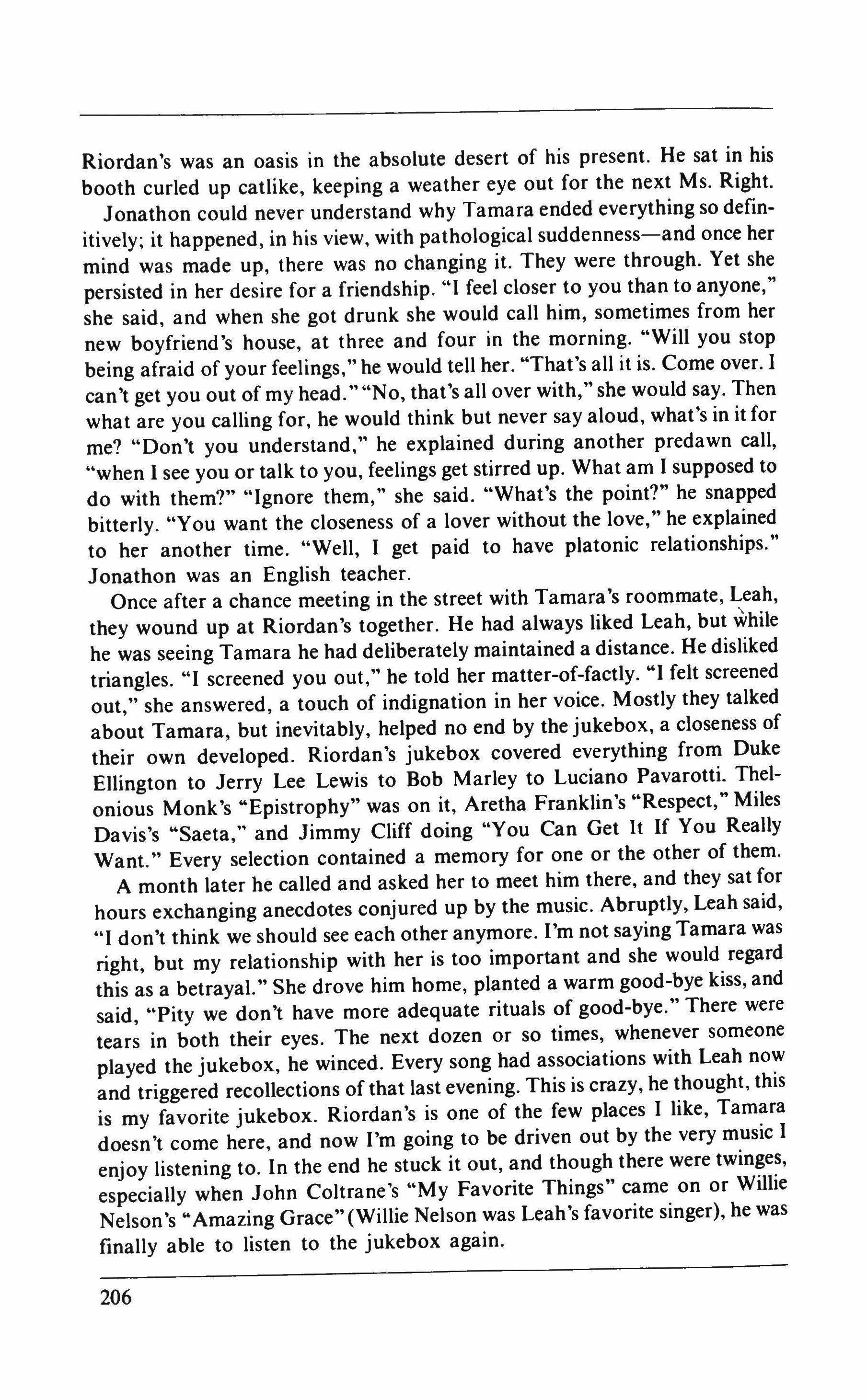
Riordan's was an oasis in the absolute desert of his present. He sat in his booth curled up catlike, keeping a weather eye out for the next Ms. Right.
Jonathon could never understand why Tamara ended everything so definitively; it happened, in his view, with pathological suddenness-and once her mind was made up, there was no changing it. They were through. Yet she persisted in her desire for a friendship. "I feel closer to you than to anyone," she said, and when she got drunk she would call him, sometimes from her new boyfriend's house, at three and four in the morning. "Will you stop being afraid of your feelings," he would tell her. "That's all it is. Come over. I can't get you out of my head." "No, that's all over with," she would say. Then what are you calling for, he would think but never say aloud, what's in it for me? "Don't you understand," he explained during another predawn call, "when I see you or talk to you, feelings get stirred up. What am I supposed to do with them?" "Ignore them," she said. "What's the point?" he snapped bitterly. "You want the closeness of a lover without the love," he explained to her another time. "Well, I get paid to have platonic relationships." Jonathon was an English teacher.
Once after a chance meeting in the street with Tamara's roommate, Leah, they wound up at Riordan's together. He had always liked Leah, but while he was seeing Tamara he had deliberately maintained a distance. He disliked triangles. "I screened you out," he told her matter-of-factly. "I felt screened out," she answered, a touch of indignation in her voice. Mostly they talked about Tamara, but inevitably, helped no end by the jukebox, a closeness of their own developed. Riordan's jukebox covered everything from Duke Ellington to Jerry Lee Lewis to Bob Marley to Luciano Pavarotti. Thelonious Monk's "Epistrophy" was on it, Aretha Franklin's "Respect," Miles Davis's "Saeta," and Jimmy Cliff doing "You Can Get It If You Really Want." Every selection contained a memory for one or the other of them.
A month later he called and asked her to meet him there, and they sat for hours exchanging anecdotes conjured up by the music. Abruptly, Leah said, "I don't think we should see each other anymore. I'm not saying Tamara was right, but my relationship with her is too important and she would regard this as a betrayal." She drove him home, planted a warm good-bye kiss, and said, "Pity we don't have more adequate rituals of good-bye." There were tears in both their eyes. The next dozen or so times, whenever someone played the jukebox, he winced. Every song had associations with Leah now and triggered recollections of that last evening. This is crazy, he thought, this is my favorite jukebox. Riordan's is one of the few places I like, Tamara doesn't come here, and now I'm going to be driven out by the very music I enjoy listening to. In the end he stuck it out, and though there were twinges, especially when John Coltrane's "My Favorite Things" came on or Willie Nelson's "Amazing Grace" (Willie Nelson was Leah's favorite singer), he was finally able to listen to the jukebox again.
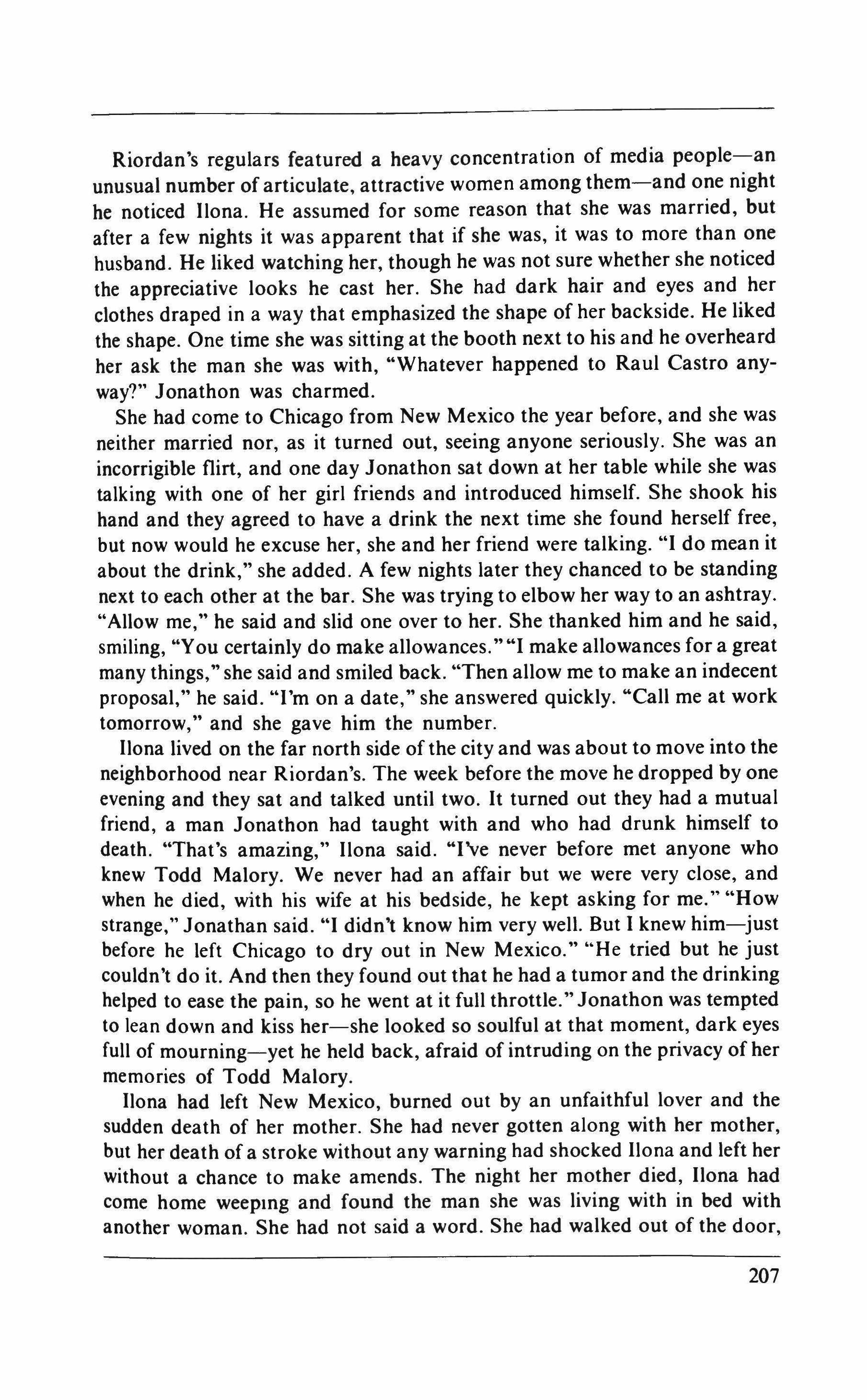
Riordan's regulars featured a heavy concentration of media people-an unusual number of articulate, attractive women among them-and one night he noticed Ilona. He assumed for some reason that she was married, but after a few nights it was apparent that if she was, it was to more than one husband. He liked watching her, though he was not sure whether she noticed the appreciative looks he cast her. She had dark hair and eyes and her clothes draped in a way that emphasized the shape of her backside. He liked the shape. One time she was sitting at the booth next to his and he overheard her ask the man she was with, "Whatever happened to Raul Castro anyway?" Jonathon was charmed.
She had come to Chicago from New Mexico the year before, and she was neither married nor, as it turned out, seeing anyone seriously. She was an incorrigible flirt, and one day Jonathon sat down at her table while she was talking with one of her girl friends and introduced himself. She shook his hand and they agreed to have a drink the next time she found herself free, but now would he excuse her, she and her friend were talking. "I do mean it about the drink," she added. A few nights later they chanced to be standing next to each other at the bar. She was trying to elbow her way to an ashtray. "Allow me," he said and slid one over to her. She thanked him and he said, smiling, "You certainly do make allowances.""1 make allowances for a great many things, she said and smiled back. "Then allow me to make an indecent proposal," he said. "I'm on a date," she answered quickly. "Call me at work tomorrow," and she gave him the number.
Ilona lived on the far north side of the city and was about to move into the neighborhood near Riordan's. The week before the move he dropped by one evening and they sat and talked until two. It turned out they had a mutual friend, a man Jonathon had taught with and who had drunk himself to death. "That's amazing," Ilona said. "I've never before met anyone who knew Todd Malory. We never had an affair but we were very close, and when he died, with his wife at his bedside, he kept asking for me." "How strange," Jonathan said. "I didn't know him very well. But I knew him-just before he left Chicago to dry out in New Mexico." "He tried but he just couldn't do it. And then they found out that he had a tumor and the drinking helped to ease the pain, so he went at it full throttle." Jonathon was tempted to lean down and kiss her-she looked so soulful at that moment, dark eyes full of mourning-yet he held back, afraid of intruding on the privacy of her memories of Todd Malory.
Ilona had left New Mexico, burned out by an unfaithful lover and the sudden death of her mother. She had never gotten along with her mother, but her death of a stroke without any warning had shocked Ilona and left her without a chance to make amends. The night her mother died, Ilona had come home weeping and found the man she was living with in bed with another woman. She had not said a word. She had walked out of the door,

driven back to her mother's house, and left for Chicago the day after the burial. Her father had died when she was twelve. He had doted on her, and the night he died he gave her a curious smile-she was struck by it at the time-and left the house to take a walk. His body was found the next morning. He had died of a heart attack while walking along the highway and had been run over repeatedly during the night. What stayed in Ilona's mind was his leaving without a word. She could not remember him going out without giving her a kiss or saying something specially to her. "He knew," she said.
She chose Chicago almost by chance. She was an editor by trade, and New York would have been the logical place to head. She had a few acquaintances there, and in Chicago she knew no one. There was an aunt she had met once and that was it. Only after she was settled and working at the LAw Review for a month did it occur to her that Chicago was Todd Malory's last stop before New Mexico. She hardly saw how that would have influenced her choice, but she could not help musing on the twelve years he had spent in the city. Twelve years of hard boozing and philandering. "I flirt a lot," she told Jonathon. "I know I'm outrageous. But you know what? I'm basically in an asexual phase. I have a feeling it might be a long one." "Well, I want to make love to you," Jonathon replied. "Just so you know." They were sitting in the new apartment, a tidy one-bedroom in a graystone. She was absorbed in sewing a button on her coat and did not look up, and Jonathon was suddenly moved to ruffle her hair and then bend down and kiss the top of her head. Still she did not look up and he could not tell what her reaction was. She was lost somewhere inside herself and he could not be sure she had even felt his touch. "I'm a very cerebral person, you know, maybe too cerebral," she said at length. "Why waste yourself on that?" he said. "Let's walk over to Riordan's," she said.
They sat at the bar and talked about the strangeness of being grown up: she had celebrated her thirtieth birthday the week before; he was thirtyseven. They had lost their mothers a year apart, too quickly in both cases to be able to undo the hurt caused by too much angry and prolonged rebellion. The night Jonathon's mother had died, in the middle of the night he had distinctly heard a chair scrape across the floor of the room. The next morning his sister had called from New York with the news. Ilona put a hand on top of his as if to say, "Poor thing, I can believe it, I know."
One of the men Jonathon had formerly supposed her to be married to came and sat down next to them. "Am I intruding?" he asked. "No," Ilona replied, "we were just talking about Jewish angst." "All I know is Irish angst," he said. "Not the same at all," she said. He had a serious look on his face and hardly paid any attention to their exchange. He ignored Jonathon altogether and kept staring fixedly at Ilona, who for her part was so struck by it that she neglected to introduce them. "Listen," he said finally, "I

understand that you moved into Lizzie's old place." "Yes, she arranged with the landlord that I could take over her lease." "Well, I suggest you talk to her." "I'm afraid that's not so easy; she lives in L.A. now." "I suggest you use the phone and talk to her anyway. Ask her to tell you about the apartment. For a year she lived there and all she kept saying was, 'There's something strange about this place; I don't know if I'm going to be able to last here. "Strange in what way?" Jonathon asked. "I don't know; I just know she was really scared." "Then why didn't she mention any of this to Ilona?" "Hard to say, everything seemed to happen at once. Just when she was her most frightened and kept saying she had to get out of her lease, this terrific job offer materialized in L.A. She ran. Call her," he added to Ilona, and moved off. "She resented me because of him," she said.
For a moment Ilona was silent. Then she said, "You know, last night I had an hallucination. At least I thought it was an hallucination. There was this man in the room, a young man. At first I even thought I knew him, but then it was clear I didn't. He stood at the side ofthe bed,just looking at me. Then he seemed to gain confidence and with a slight smile on his face moved around to the foot of the bed and leaned against the closet door. My first reaction was, Oh my God, someone has gotten into the apartment. But then I realized-I don't quite know how-that he didn't get into the apartment, he was simply there. I don't want you here, I thought, I don't want you disturbing me. But he just stood there watching, kind of slouching against the closet door. No! I thought, I won't have this, and I made myself turn away and somehow fell asleep." Jonathon moved his bar stool back and looked at her.
They stayed at Riordan's till closing, though it was a weeknight and Ilona had to be at work the next morning. Jonathon walked her home expecting a polite good night at the door, but she surprised him by suggesting that he come up. "Tea, coffee?" she asked. "Nothing keeps me awake when I'm tired. I'm going to have a cup of coffee and then fall in bed." And then without warning they were in each other's arms and kissing. "That was unexpected," she said. They became lovers that night. My God, he thought, wouldn't you know it, now I've fallen for a woman who lives in a haunted apartment.
The ghost made its appearance the third night they spent at her place. It was just as Ilona had described. The ghost was a young man in his late twenties, thin, with a sardonic smile on his face. So far as you could tell, he had wavy blond hair. But since it was a little like looking at a photographic negative, you could not be sure it had not been darker in life. His face was sensitive, aesthetic, Jonathon thought, rather on the Leslie Howard model. Jonathon tried to place him in time but could not. He was dressed in a blazer and slacks of classic cut, but something about him made Jonathon think he had died in the last ten or fifteen years.

"I wonder what his name is?" Jonathon said. "Was, I mean." "Is," Ilona said. "I think his name is Peter." "How do you know, can he speak?" "He hasn't spoken, but I just know." "What else do you know?" Jonathon said, implausibly angry, as though they were speaking of a rival. "I don't know anything else. It's the second time he's shown up and I merely happen to believe his name is Peter. The poor thing," she added. "What do you mean, poor thing?" "Don't you think there's something sad about him,just existing here all alone?" "I'm the one that's alone and sad," Jonathon said. "You know I've fallen in love with you and I want you. The least you could do is kiss me." "With him standing there watching? I couldn't."
They agreed finally that this Peter was clever and they would simply have to carryon normally, as though he weren't there at all. They would ignore him the way Ilona had the first time he had shown up. They would say, "We're neither interested nor impressed," and turn away from him. But this proved difficult to do because he would be right there by the side of the bed, standing over them, watching while they made love, almost as if he had never seen anything like it. Then Jonathon would become distracted and begin to watch Peter. "Listen," he said, "the hell with this, why don't we just go over to my place?" Absolutely not," Ilona said. "I won't let you drive me out of my own place." "Me?" Jonathon said.
Ilona lived on a landmark street of neat, little houses designed to produce the effect of a row of Swiss chalets. Most of the people owned their own homes, though a few of the houses, like hers, had been broken up into small apartments. None of the residents had lived there for longer than five years and few of them even recalled who Lizzie was. No one had any recollection of bizarre goings-on or tragedy on the street at any time since they had been living there.
Eventually, Ilona was put in touch with a Mrs. Meyerson who lived on the next block and had grown up in the neighborhood. Mrs. Meyerson recalled that after the Korean War a young man, recently married and returned from overseas, discovered his wife had been carrying on with his best friend and killed himself by swallowing cyanide tablets. Though she couldn't be certain where exactly this had occurred. Could she possibly recall his name, they persisted, or any small, personal details? Mrs. Meyerson said she couldn't. And she knew nothing about any hauntings, though, now that they mentioned it, there had perhaps been an unusual turnover of tenants living in Ilona's apartment. But the way people moved nowadays, could anyone say for sure? Not many people lived anywhere for more than five years. They had found that much out, they cheerfully admitted. And could you say the reason was that every house was haunted? No, you couldn't, they said, a little anxious to end the conversation. In fact you could, Mrs. Meyerson said, if they wanted her opinion.
Mrs. Meyerson, a heavyset woman, was manifestly warming to the sub-

ject. Beads of perspiration formed on her forehead, which she kept wiping off with a dainty little kerchief she kept winding nervously around her fingers. Every house in the city was haunted, she continued. The country itself. It was going to the dogs and would pay for all its arrogance and sins. You could see the signs all around you. The Roman Empire had tried to live with killing inflation, and look what happened to it. "His name is Peter," Ilona said. "You're right about the country," Jonathon said, "you've been very helpful, thank you," pulling Ilona along.
"He looks so forlorn, don't you think?" Ilona said. They were standing by the edge of the bed and kissing when Peter appeared by the closet door. He now showed up whenever they were together, usually just when they were about to get into bed. Sometimes, though, they would be drinking a cup of coffee in the kitchen and he would wander through distractedly, on those occasions not even paying them any attention. He seemed lost in some unfathomable, phantasmic depth. Jonathon looked toward the closet and, sure enough, though the inevitable smirk went across Peter's face, he did look quite forlorn. He gave Ilona a piercingly longing look, as ifto say, "Ah, life." Ilona began to kiss Jonathon passionately. She had become thoroughly comfortable with Peter around. One time she and Jonathon began to make love and for some reason he did not manifest himself. Ilona's eyes roamed the room restlessly. Presently they could hear him in the kitchen clanking the coffee cups on the table. Ilona looked immediately relieved and became at once more animated. Whatever intensity their lovemaking had acquired seemed to derive from Peter's presence.
"Listen," Jonathon complained finally, "I love you. The time 1 spend with you is precious, our relationship is everything. Is it the same with you? Why is it that more and more I'm beginning to feel like a stand-in for that ghost?" "Stop being silly," she said. "How could a person stand in for a ghost? Come over here, 1 want you now." As they tumbled into bed, he could sense Peter sliding noiselessly along the closet wall. For a moment Jonathon lost track of him. He looked everywhere but Peter was nowhere to be seen. Then he glanced up at the ceiling. Ilona had put in a black-light, overhead bulb, and there he was with the black light eerily shining through him, like some sort of ectoplasmicjoke. "Go away," Jonathon shouted, but Peter would not react. "I don't know if I can do this much more," he said.
One night he went into Riordan's by himself and seated in a booth at the back, laughing uproariously, were Tamara and Leah and their boyfriends. He stared horrified at Tamara who glared back defiantly. "This bar is absolutely the best," her boyfriend said, "we're definitely coming back often." "I love it," Tamara said. "Look, isn't that the anchorman from Channel Two?" Jonathon walked out with his head reeling, feeling as if the
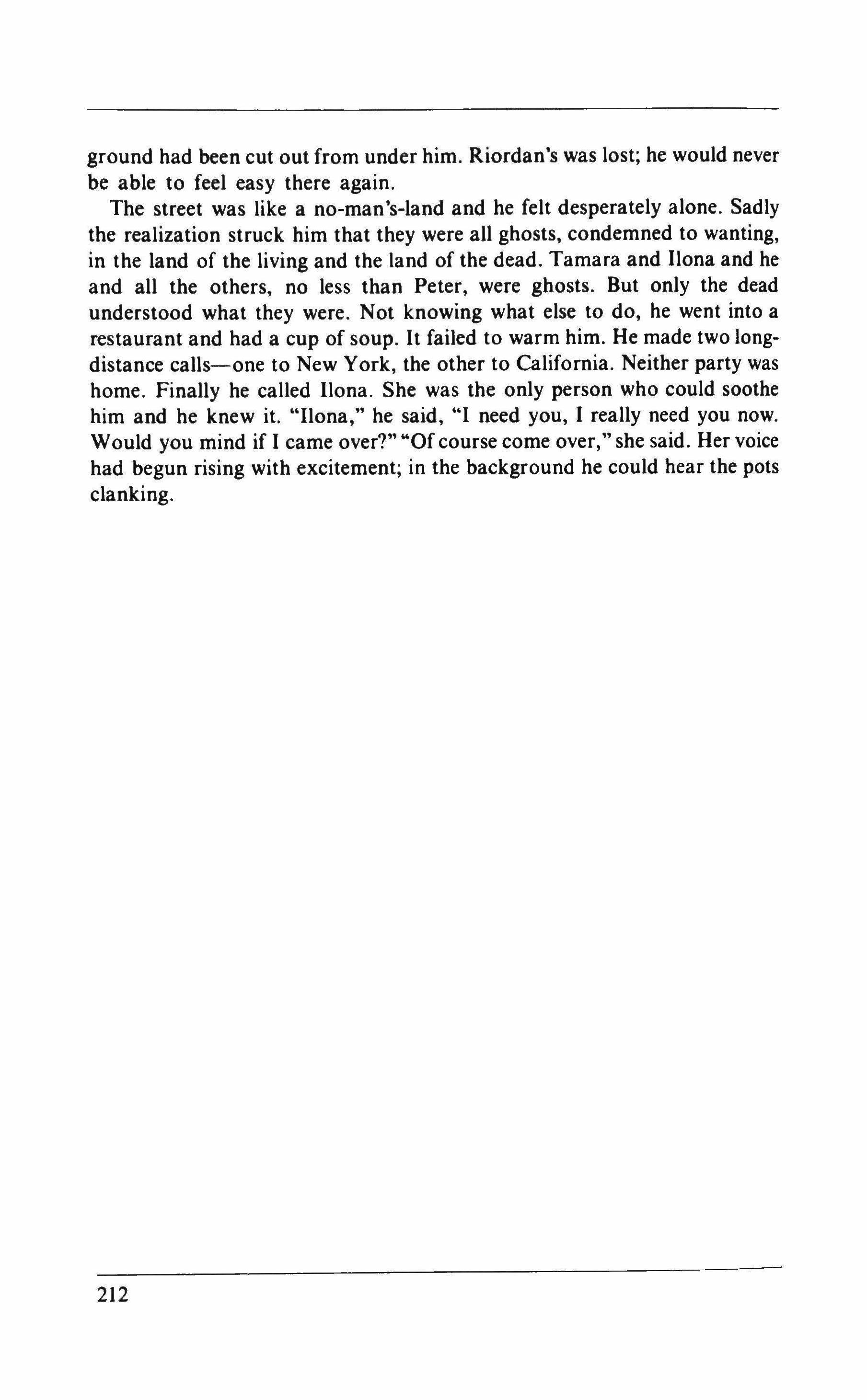
ground had been cut out from under him. Riordan's was lost; he would never be able to feel easy there again.
The street was like a no-man's-land and he felt desperately alone. Sadly the realization struck him that they were all ghosts, condemned to wanting, in the land of the living and the land of the dead. Tamara and Ilona and he and all the others, no less than Peter, were ghosts. But only the dead understood what they were. Not knowing what else to do, he went into a restaurant and had a cup of soup. It failed to warm him. He made two longdistance calls-one to New York, the other to California. Neither party was home. Finally he called Ilona. She was the only person who could soothe him and he knew it. "Ilona," he said, "I need you, 1 really need you now. Would you mind if 1 came over?" "Of course come over," she said. Her voice had begun rising with excitement; in the background he could hear the pots clanking.
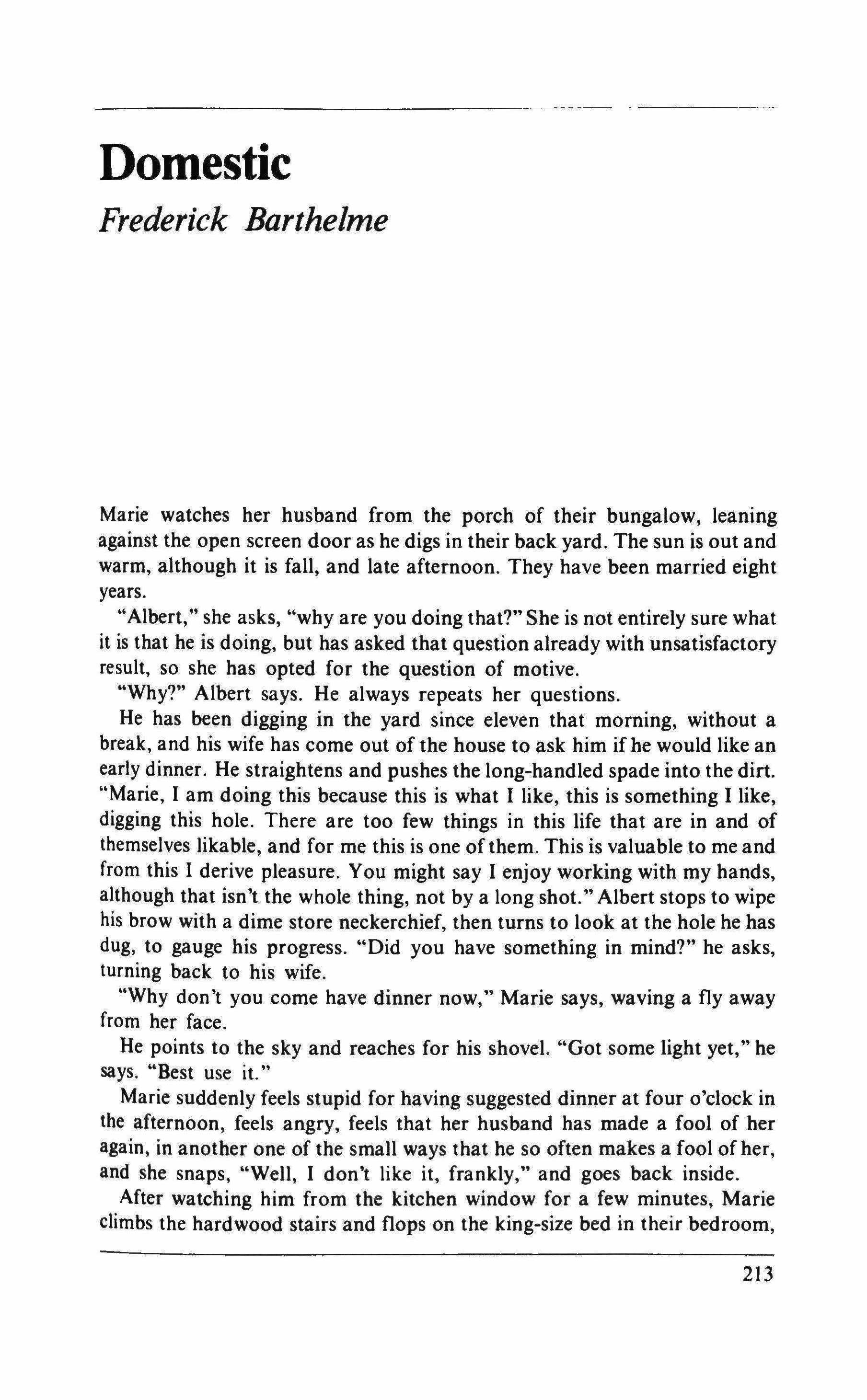
Marie watches her husband from the porch of their bungalow, leaning against the open screen door as he digs in their back yard. The sun is out and warm, although it is fall, and late afternoon. They have been married eight years.
"Albert," she asks, "why are you doing that?" She is not entirely sure what it is that he is doing, but has asked that question already with unsatisfactory result, so she has opted for the question of motive.
"Why?" Albert says. He always repeats her questions. He has been digging in the yard since eleven that morning, without a break, and his wife has come out of the house to ask him if he would like an early dinner. He straightens and pushes the long-handled spade into the dirt. "Marie, I am doing this because this is what I like, this is something I like, digging this hole. There are too few things in this life that are in and of themselves likable, and for me this is one ofthem. This is valuable to me and from this I derive pleasure. You might say I enjoy working with my hands, although that isn't the whole thing, not by a long shot." Albert stops to wipe his brow with a dime store neckerchief, then turns to look at the hole he has dug, to gauge his progress. "Did you have something in mind?" he asks, turning back to his wife.
"Why don't you come have dinner now," Marie says, waving a flyaway from her face.
He points to the sky and reaches for his shovel. "Got some light yet," he says. "Best use it."
Marie suddenly feels stupid for having suggested dinner at four o'clock in the afternoon, feels angry, feels that her husband has made a fool of her again, in another one of the small ways that he so often makes a fool of her, and she snaps, "Well, I don't like it, frankly," and goes back inside.
After watching him from the kitchen window for a few minutes, Marie climbs the hardwood stairs and flops on the king-size bed in their bedroom,

on her back, her arms outstretched. Even with her arms and legs spread, she is swallowed up in the huge mattress, enveloped by it, unable to touch the edges. She looks straight up at the ceiling and tries to imagine a great battle from the Middle Ages pictured there-horses, and cannon, and armor-but sees instead a lone knight in black mail astride an equally black horse, riding backward, bent over inspecting the rump of the animal. "Oh Lord," she says, and she rolls off the bed and reaches for the telephone. She calls her mother.
"What're you doing, Mama? How are you? I haven't talked to you in such a long time."
"I talked to you Thursday, Peaches. Is something wrong between you and Albert?"
"Mama! You always think that. And don't call me Peaches, please."
"Marie," her mother says, "you didn't call me two thousand miles across this great continent to ask me the time of day in the middle of the afternoon on the long-distance telephone, I know that don't I?"
"Albert is digging in the back yard is why I called," Marie says. "I don't know why-it isn't even Saturday."
"Your father dug, Peaches."
"This is different, Mama. And don't call me Peaches."
"So you called me now when the rates are high to tell me that your husband and the father of your eventual child is in the back yard digging a hole? Is that all you have to say to me? And you want me to believe that nothing is wrong in your marriage?"
Marie looks out the upstairs window at the bent white shoulders of her husband, watches as he hoists a small mound of dirt, gazes at the shovel's attenuated arc. "It's a serious problem, Mama, or I wouldn't have called. You know what happened to Papa."
"That was different, Peaches. Your papa went a little crazy, that's all. I suspect it ran in his family. When he bought the P-38 for the neighborhood kids, when he cut the hole in the roof of the den, remember? There were reasons, there were explanations-Papa was always up to some good. And by the way, have you asked about me yet? How I am and what I'm doing out here all alone on this barren coast? No you have not. Maybe if you had brought that Albert out here last summer like I asked you to I could have straightened him out and you wouldn't have this terrible problem you have right now, which, if I may say, doesn't sound all that terrible from this distance.
"Thank you, Mama," Marie says.
"Don't start with me, young lady," her mother says. "I'm just trying to help. A mother has an investment in a daughter as you might well learn one day if that Albert ever gets his head out of the clouds and gets down to business like a real man."
"I have to go now, Mama," Marie says.
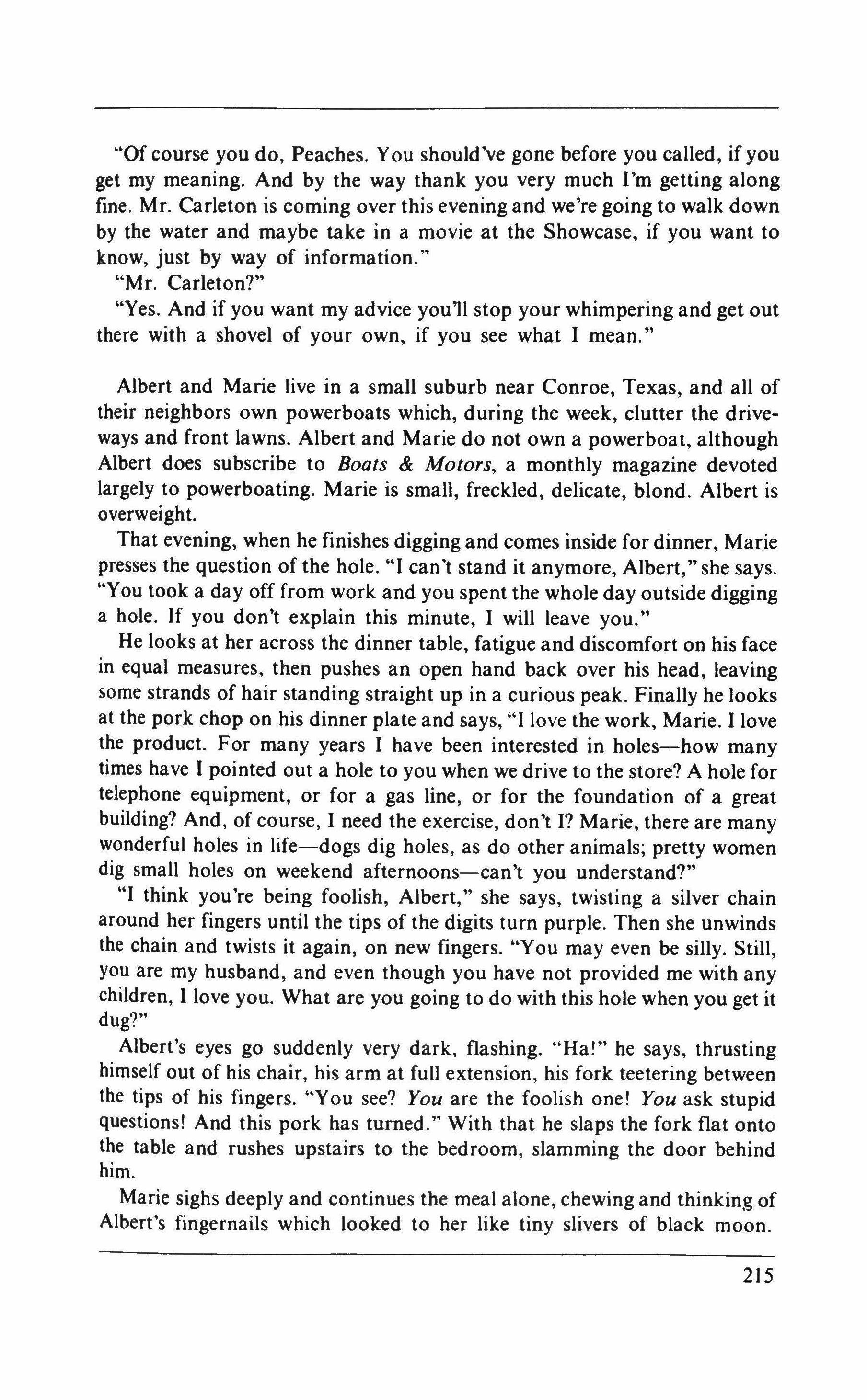
"Of course you do, Peaches. You should've gone before you called, if you get my meaning. And by the way thank you very much I'm getting along fine. Mr. Carleton is coming over this evening and we're going to walk down by the water and maybe take in a movie at the Showcase, if you want to know, just by way of information."
"Mr. Carleton?"
"Yes. And if you want my advice you'll stop your whimpering and get out there with a shovel of your own, if you see what 1 mean."
Albert and Marie live in a small suburb near Conroe, Texas, and all of their neighbors own powerboats which, during the week, clutter the driveways and front lawns. Albert and Marie do not own a powerboat, although Albert does subscribe to Boats & Motors, a monthly magazine devoted largely to powerboating. Marie is small, freckled, delicate, blond. Albert is overweight.
That evening, when he finishes digging and comes inside for dinner, Marie presses the question of the hole. "I can't stand it anymore, Albert," she says. "You took a day off from work and you spent the whole day outside digging a hole. If you don't explain this minute, I will leave you."
He looks at her across the dinner table, fatigue and discomfort on his face in equal measures, then pushes an open hand back over his head, leaving some strands of hair standing straight up in a curious peak. Finally he looks at the pork chop on his dinner plate and says, "I love the work, Marie. 1 love the product. For many years 1 have been interested in holes-how many times have 1 pointed out a hole to you when we drive to the store? A hole for telephone equipment, or for a gas line, or for the foundation of a great building? And, of course, 1 need the exercise, don't I? Marie, there are many wonderful holes in life-dogs dig holes, as do other animals; pretty women dig small holes on weekend afternoons-can't you understand?"
"I think you're being foolish, Albert," she says, twisting a silver chain around her fingers until the tips of the digits turn purple. Then she unwinds the chain and twists it again, on new fingers. "You may even be silly. Still, you are my husband, and even though you have not provided me with any children, 1 love you. What are you going to do with this hole when you get it dug?"
Albert's eyes go suddenly very dark, flashing. "Ha!" he says, thrusting himself out of his chair, his arm at full extension, his fork teetering between the tips of his fingers. "You see? You are the foolish one! You ask stupid questions! And this pork has turned." With that he slaps the fork flat onto the table and rushes upstairs to the bedroom, slamming the door behind him.
Marie sighs deeply and continues the meal alone, chewing and thinking of Albert's fingernails which looked to her like tiny slivers of black moon.

In the morning, after Albert has gone to work at the airline, Marie takes her coffee to the hall table where she sits staring at the telephone for a long time. The hands of the electric clock on the table fly around the clock's face, making a barely audible whir.
An airplane passes overhead, through the clouds.
In the distance there is a siren.
Marie begins to cry, falling forward on the table, her arms folded there and cradling her head. Between sobs she whispers, "I don't want my husband to dig this hole, 1 don't want my husband to dig this hole
The telephone rings. It is her friend Sissy, now a secondary school teacher in Vermont. Marie begins to tell Sissy the story of Albert and the hole, but is unable to make her objection clear, and Sissy responds unsympathetically. Marie is surprised that she isn't clearer about why she is upset by Albert's behavior, and instead of listening to Sissy, she gazes at Albert's university diploma which is framed and mounted above the hall table and wonders why she can't explain herself more clearly.
Finally she says, "I don't know why this upsets me so much, it's silly really." But she has interrupted Sissy's explanation of Albert's behavior, and Sissy insists on finishing the explanation.
"A metaphor," Sissy says, "works in a lot of ways to release the feelings of an individual, opening that individual to expressions which are, for some reason, closed to him. Albert may simply be depressed, and the physical digging is for him a model ofthe emotional digging that's going on, see what I'm saying? Reflects his disaffection, or something. Maybe he's bored?"
"I see what you mean," Marie says, and she marks another minute gone on the pink pad in front of her, a horizontal stroke crossing four vertical strokes.
"Why don't you dig some too?" Sissy asks. "Seems like that'd be more to the point."
"I've been thinking about that," Marie says.
"Don't think," Sissy says. "Do." Then, her voice rising with relief and new interest, she says, "We're on strike up here, that's why you caught me at home. I know it's terrible for the kids, but business is business, right? Besides, they're probably grateful."
"Strike?"
"Yeah," Sissy says. "We're going to bury the bastards if they don't pay up. There've been promises-it's real complicated, but we're up against the school board and an old jerk named Watkins who'd just as soon see us work for room and board. Anyway, we've been out three weeks and no end in sight. I've got a little money tucked away, so it's all right. Maybe you ought to get a job yourself, give you something to take your mind off old Albert. I mean, you never worked at all after we finished school, did you?"
"I worked in that hospital," Marie says. 216
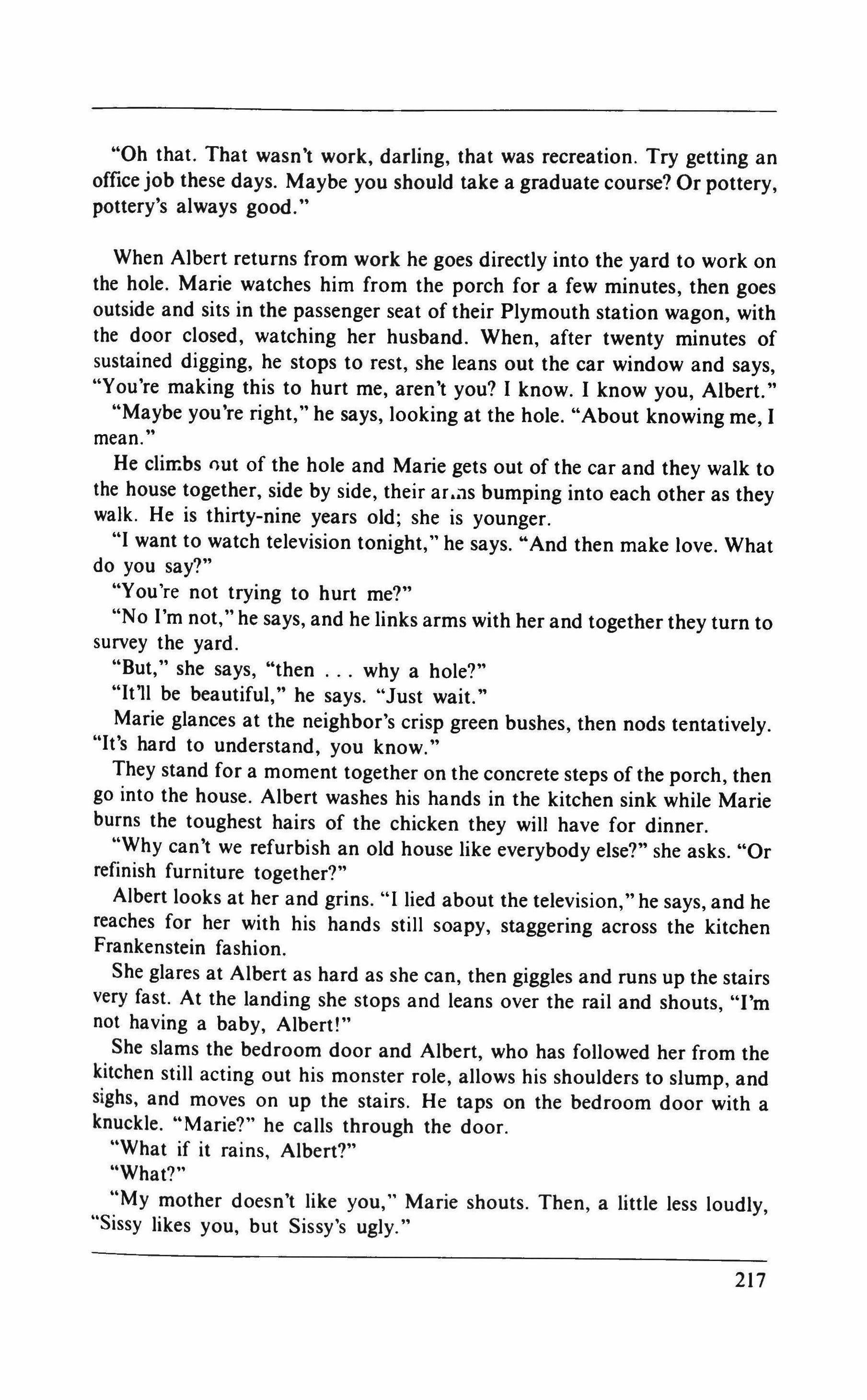
"Oh that. That wasn't work, darling, that was recreation. Try getting an office job these days. Maybe you should take a graduate course? Or pottery, pottery's always good."
When Albert returns from work he goes directly into the yard to work on the hole. Marie watches him from the porch for a few minutes, then goes outside and sits in the passenger seat of their Plymouth station wagon, with the door closed, watching her husband. When, after twenty minutes of sustained digging, he stops to rest, she leans out the car window and says, "You 're making this to hurt me, aren't you? 1 know. I know you, Albert."
"Maybe you're right," he says, looking at the hole. "About knowing me, 1 mean.
He clirr:.bs nut of the hole and Marie gets out of the car and they walk to the house together, side by side, their ar .ns bumping into each other as they walk. He is thirty-nine years old; she is younger.
"I want to watch television tonight," he says. "And then make love. What do you say?"
"You're not trying to hurt me?"
"No I'm not," he says, and he links arms with her and together they turn to survey the yard.
"But," she says, "then why a hole?"
"It'll be beautiful," he says. "Just wait."
Marie glances at the neighbor's crisp green bushes, then nods tentatively. "It's hard to understand, you know."
They stand for a moment together on the concrete steps of the porch, then go into the house. Albert washes his hands in the kitchen sink while Marie burns the toughest hairs of the chicken they will have for dinner.
"Why can't we refurbish an old house like everybody else?" she asks. "Or refinish furniture together?"
Albert looks at her and grins. "I lied about the television," he says, and he reaches for her with his hands still soapy, staggering across the kitchen Frankenstein fashion.
She glares at Albert as hard as she can, then giggles and runs up the stairs very fast. At the landing she stops and leans over the rail and shouts, "I'm not having a baby, Albert!"
She slams the bedroom door and Albert, who has followed her from the kitchen still acting out his monster role, allows his shoulders to slump, and sighs, and moves on up the stairs. He taps on the bedroom door with a knuckle. "Marie?" he calls through the door.
"What if it rains, Albert?"
"What?"
"My mother doesn't like you," Marie shouts. Then, a little less loudly, "Sissy likes you, but Sissy's ugly."

"What? Who's Sissy?"
"But you can't dig that hole anymore or I will not do anything you want me to do," she says, still shouting as he enters the room.
"What are you talking about?" he asks.
"Promise me that you won't," she says. "Promise it's all over."
"Oh Jesus," Albert says. "Forget the hole for shit's sake; it's just a hole. Jesus.
"Maybe it's just a hole to you, but it's more to me; it's something I don't want you to do-promise, Albert, please."
Marie is on the bed, her knees up under her chin held tight by her arms. She isn't smiling. Albert stands in the doorway with one hand still on the knob. "I just want to see what's under there," he says.
"Y ou don't mean that," Marie says.
"I'm going downstairs to watch television," Albert says.
Much later, Marie tiptoes down the stairs to see what Albert is doing. He is asleep on the couch in front of the television set, and, seeing him asleep, Marie squats on the stairs and weeps.
The following morning Marie eats a late breakfast alone on the porch, staring at the hole through the screen door. It is a cool day, cooler than yesterday, and she feels the closeness of winter, sees it in the graying sky, smells it in the scent of the morning air. The leaves on the trees seem darker to her, as if mustered for a final battle with the season. Taking a fresh cup of coffee in her striped mug, she goes down the steps into the yard. She walks in circles around the hole there, sipping her coffee and surveying the perimeter of their property-the fragment of an old stone fence, a willow, some low bushes with unremarkable fat leaves. The lot is a little more than half an acre-large, Albert has said, for this particular development.
At first she gives the hole a wide berth, almost ignoring it, but as she completes her third circle, she bears in toward it, stopping a few feet from its edge at a point on its perimeter farthest from the house. The hole, she observes, is about five feet in diameter and four feet deep. The sides are cut at ninety degrees to the horizontal and the bottom of the hole is very flat. Albert's spade is jammed into the spreading pile of dirt that borders the hole on the side away from the driveway. She drops to her knees in the still-damp grass of the lawn and mutters, "Not very prepossessing," then leans forward over the edge of the hole, looking to see what's inside. "Nothing," she says, "just nothing." She tosses the dregs of her coffee into the hole and watches the coal-colored earth turn instantly darker as it absorbs the liquid. "I don't know what Albert is so smug about," she says self-consciously. "Just a damn hole in the ground, for Christ's sake." Marie walks forward on her knees and then pivots her legs over the edge and into the hole. Now she realizes that the hole is a little deeper than she had thought, that it is very nearly five feet
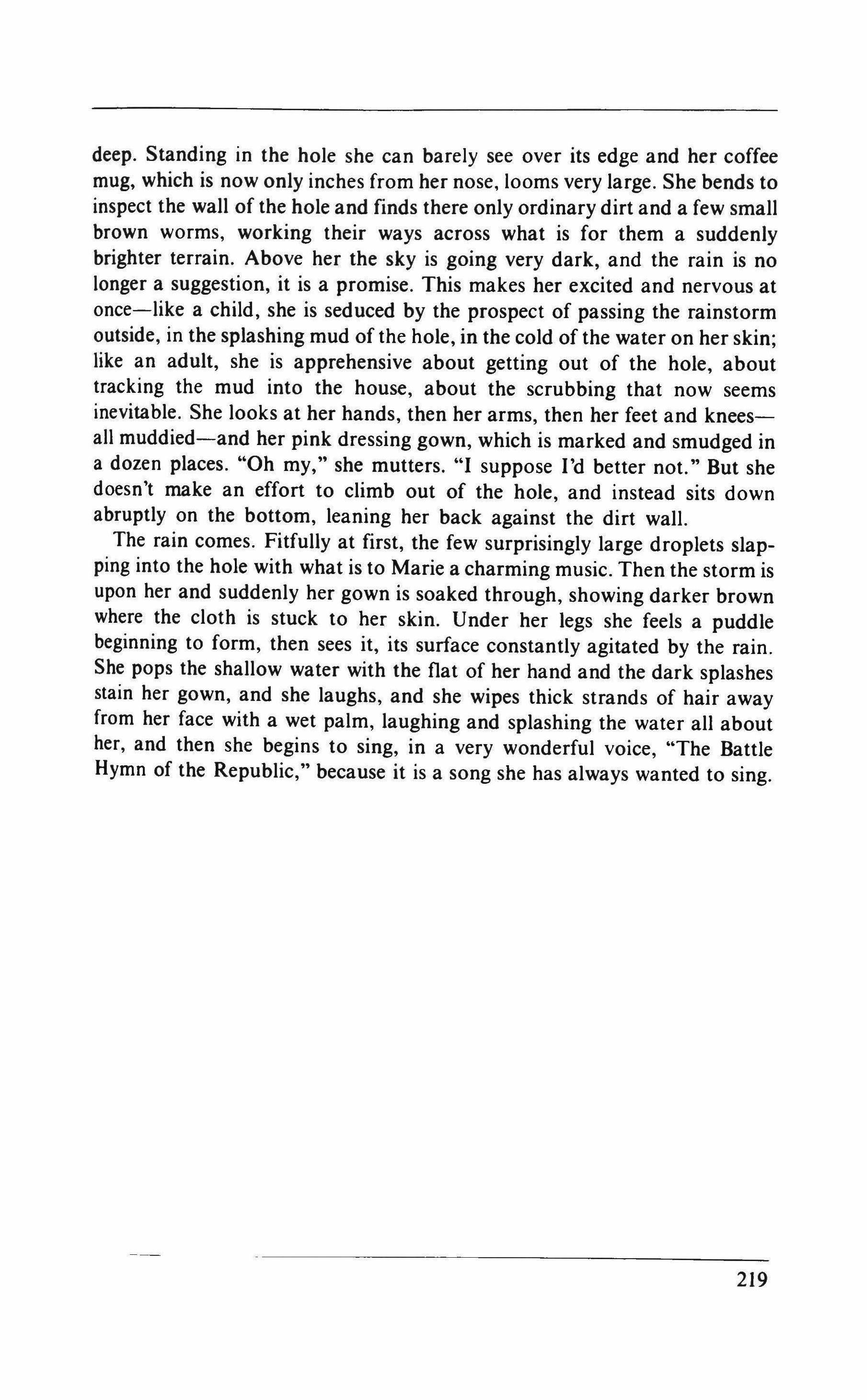
deep. Standing in the hole she can barely see over its edge and her coffee mug, which is now only inches from her nose, looms very large. She bends to inspect the wall of the hole and finds there only ordinary dirt and a few small brown worms, working their ways across what is for them a suddenly brighter terrain. Above her the sky is going very dark, and the rain is no longer a suggestion, it is a promise. This makes her excited and nervous at once-like a child, she is seduced by the prospect of passing the rainstorm outside, in the splashing mud of the hole, in the cold of the water on her skin; like an adult, she is apprehensive about getting out of the hole, about tracking the mud into the house, about the scrubbing that now seems inevitable. She looks at her hands, then her arms, then her feet and kneesall muddied-and her pink dressing gown, which is marked and smudged in a dozen places. "Oh my," she mutters. "I suppose I'd better not." But she doesn't make an effort to climb out of the hole, and instead sits down abruptly on the bottom, leaning her back against the dirt wall.
The rain comes. Fitfully at first, the few surprisingly large droplets slapping into the hole with what is to Marie a charming music. Then the storm is upon her and suddenly her gown is soaked through, showing darker brown where the cloth is stuck to her skin. Under her legs she feels a puddle beginning to form, then sees it, its surface constantly agitated by the rain. She pops the shallow water with the flat of her hand and the dark splashes stain her gown, and she laughs, and she wipes thick strands of hair away from her face with a wet palm, laughing and splashing the water all about her, and then she begins to sing, in a very wonderful voice, "The Battle Hymn of the Republic," because it is a song she has always wanted to sing.

Here is the summer sunset. Framed by the smudged window. You can see where I put my lips. I kissed the expensive red off. Lipstick red. Brand-new red. Mannie's lipstick. My lips look like my mother Mannie's. Thin. Inside, next to the window is the rubber plant. The perfect green, the manufactured green. The leaves larger than your hands, smoother. The leaves lean against the wall, barely touching the ceiling. An ant traces the edge of a leaf, carefully. The ceiling is low.
Once I stood outside on the patio and stepped on an ant. Quickly another came over and I stepped on it, too. Then another. And another. I was stepping on all of the ants. I played hopscotch on them. Play is important. I was stepping on all of the ants.
Shelly crawls by. A boy turtle but Woods named it Shelly. Woods talks to Shelly like a friend whispering. He listens to Shelly like he was the ocean, putting him up to his ear. Woods has never been to the ocean. Neither have I. With our beds across the room from each other like two people separated by night, I have imagined a dark ocean, so dark it is purple. Woods sleeps the wrong way on his bed and his feet hit the headboard. He wants to look out the window when he sleeps. That's what he said. He also said I shouldn't wear his undershirts. Sleeveless, and white the color of gray. I tell Shelly to go hide and I put him behind a stack of newspapers. I used to like Woods' undershirts. They felt soft next to my skin like Woods' face and his smell. Woods and I have shared a bedroom forever. When he could no longer stretch his legs out completely on his bed, when he grew so long and narrow, Mannie said, Woods, let's change bedrooms. Your sister's a girl now. Woods said: No.
Mannie has our baby pictures in this livingroom. Life-size photographs with frames as large as the fireplace. Inside the fireplace is a stack of books: a Ripley's Believe It or Not, a Guinness Book of World Records, a dictionary and psychology books. Woods studied each one like his life. Then he put them in the fireplace. The fireplace doesn't work.

Woods went to a flea market and exchanged Mannie's Jack Benny record for the psychology and Mannie got angry. She never listened to the record because it wasn't funny. You could hear people laughing on it and you wondered what they were laughing at. Mannie says humor is personal like religion. Mannie says most things are personal. Mostly she seems to care about her hair. Hadley, she will say, comb my hair, will you?
She wants me brushing her hair until she sleeps and she has long blond hair, this dyed yellow so it doesn't shine right. It relaxes me, she says, but don't let me sleep. Then she puts her hair in a tight ponytail, wrapping it in blue ribbon.
Once she said she wanted to trim my hair and she cut my bangs short and I could feel the back of my neck, so she laughed. What's wrong? she said, don't they teach you to laugh at school? She laughed so much one of her contact lenses fell out. I'm sorry, she said looking for her lens, but you look so funny. Hadley, help me. She tugged on myjeans and we looked through my broken hair. Damn it, she said, I get so nervous without fun.
Mannie wears contact lenses, tinted blue, and her eyes look painted. She doesn't need contact lenses or glasses at all. But the lenses make you look at her eyes-this blue, like doll's eyes. At home she uses her eyes a lot. She writes letters, she has her own stationery; at the top of each piece it's printed: From the desk of Mannie. She doesn't have a desk-she uses the ironing board. The ironing board, next to the rubber plant. Letters are hidden and locked in the jewelry box on the ironing board. A ballerina inside the box turns to "Twinkle, Twinkle, Little Star." Mannie got angry at Woods when he cut off the doll's head. She didn't notice for at least two days. Then she noticed. We were eating dinner and she noticed and she screamed. I looked at her, I looked at Woods, I didn't know.
God, you give me nerves, Mannie yelled. I've worked my can for you. I give you food. I give you a bed. I should get something. I should get some damn something.
Woods got on his chair and stood on it. He stomped his feet, he clapped. He put two fingers in his mouth and whistled, loud, so the dog next door would bark. I put my hands over my ears. More, Woods shouted, More. That's when Mannie started writing letters to Abby.
She has never had her letters printed. Mostly she gets a letter that is Xeroxed, like maybe ten thousand or a million other people get. The letters say something like: No time to answer everyone personally but try speaking to your problem. I know about these letters because Woods gets to the mail first. He used to open Mannie's mail before she found out. He let her find out. He told her and she hit him.
Mannie is gone most of the time so she won't hit Woods, she has said more than once. She works two jobs. She works for Cystic Fibrosis. She goes door to door with envelopes trying to find someone on the block to be respon-

sible, to start the envelope and get it back, to make sure people donate. She is still not sure what Cystic Fibrosis is but she loves to go to people's houses and listen to them complain. I've got better problems than they do, she says. I've never lived in a job where I didn't see that. Really, she says, regret is just another word for crapola. The main thing is to keep trucking. Then she'll lean back and stride across the room.
What she likes better than Cystic Fibrosis is the movie theater. She works at the neighborhood theater at night, sometimes, and on weekends. She gives tickets, she works the concession with college graduates. They store wine in the ice dispenser and when I come in to say hello they tease me about my muscles. They think I'm strong when I hit them back and they give me free candy. Even Woods likes them.
And Woods doesn't like anybody. Because he's older than everybody, he says. He made himself look old. He began growing hair on his face when he was twelve. During the summer he let it grow freely and under his chin. Then he shaved it off when school started. He shaved it all off, except for under his chin. He was sent home from school and he hitchhiked away. When Mannie came home from work, he called her to pick him up. He was three hours away. They both came home late at night, laughing. When he quit high school he grew a beard and trimmed it like a barber. He was a head taller than Mannie and he made himself look old by wearing suits and she listened to him. Then one night a couple of months ago they sat at the couch and Woods wrote ads for Mannie-"Young, Goodlooking, and Blond Wants Same"-and they put it in the classifieds. That's how Mannie met Bill.
A few people called-some men and a woman-but Mannie gave Bill her address because she said he had a blond voice; whatever that means, Woods said. After Mannie and Bill had talked on the phone for an hour, Mannie said, He sounds kind of oldish, but he can't help it.
I thought you just said he had a blond voice, Woods said. Doesn't that make him younger than you?
Hadley, should I wear my royal blue sweater or my light blue sweater? Ever notice the people that are happiest are those that don't think? Woods said in our room that night. Take Mannie. All she wants is a good time. She cares about her hair. She cares about her clothes. She wants a new car. She never reads. She couldn't care less about politics. Nothing bothers her. Nothing.
You bother her, I said while I turned over in bed. He continued: Everything's so easy for her. Life is so easy for her. You're jealous, I said. I put the pillow over my head. So? So what? There's worse things than beingjealous. Not having anyone who understands what you're saying. That's worse. He propped his chin on his hands and stared at me.
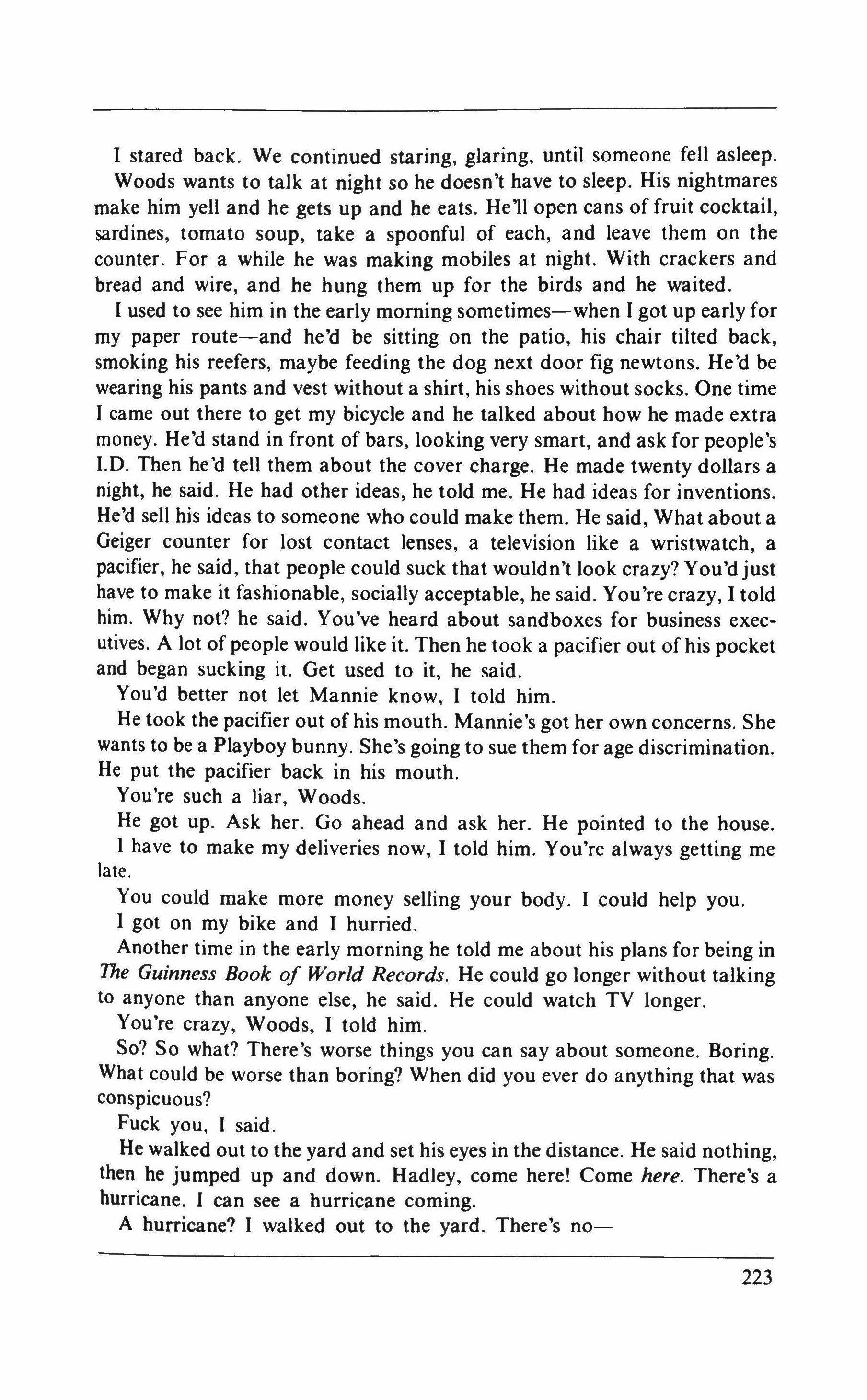
I stared back. We continued staring, glaring. until someone fell asleep. Woods wants to talk at night so he doesn't have to sleep. His nightmares make him yell and he gets up and he eats. He'll open cans of fruit cocktail, sardines, tomato soup, take a spoonful of each, and leave them on the counter. For a while he was making mobiles at night. With crackers and bread and wire, and he hung them up for the birds and he waited.
I used to see him in the early morning sometimes-when I got up early for my paper route-and he'd be sitting on the patio, his chair tilted back, smoking his reefers, maybe feeding the dog next door fig newtons. He'd be wearing his pants and vest without a shirt, his shoes without socks. One time I came out there to get my bicycle and he talked about how he made extra money. He'd stand in front of bars, looking very smart, and ask for people's I.D. Then he'd tell them about the cover charge. He made twenty dollars a night, he said. He had other ideas, he told me. He had ideas for inventions. He'd sell his ideas to someone who could make them. He said, What about a Geiger counter for lost contact lenses, a television like a wristwatch, a pacifier, he said, that people could suck that wouldn't look crazy? You'd just have to make it fashionable, socially acceptable, he said. You're crazy, I told him. Why not? he said. You've heard about sandboxes for business executives. A lot of people would like it. Then he took a pacifier out of his pocket and began sucking it. Get used to it, he said.
You'd better not let Mannie know, I told him.
He took the pacifier out of his mouth. Mannie's got her own concerns. She wants to be a Playboy bunny. She's going to sue them for age discrimination. He put the pacifier back in his mouth.
You're such a liar, Woods.
He got up. Ask her. Go ahead and ask her. He pointed to the house. I have to make my deliveries now, I told him. You're always getting me late.
You could make more money selling your body. I could help you. I got on my bike and I hurried.
Another time in the early morning he told me about his plans for being in The Guinness Book of World Records. He could go longer without talking to anyone than anyone else, he said. He could watch TV longer.
You're crazy, Woods, I told him.
So? So what? There's worse things you can say about someone. Boring. What could be worse than boring? When did you ever do anything that was conspicuous?
Fuck you, I said.
He walked out to the yard and set his eyes in the distance. He said nothing, then he jumped up and down. Hadley, come here! Come here. There's a hurricane. I can see a hurricane coming.
A hurricane? I walked out to the yard. There's no-
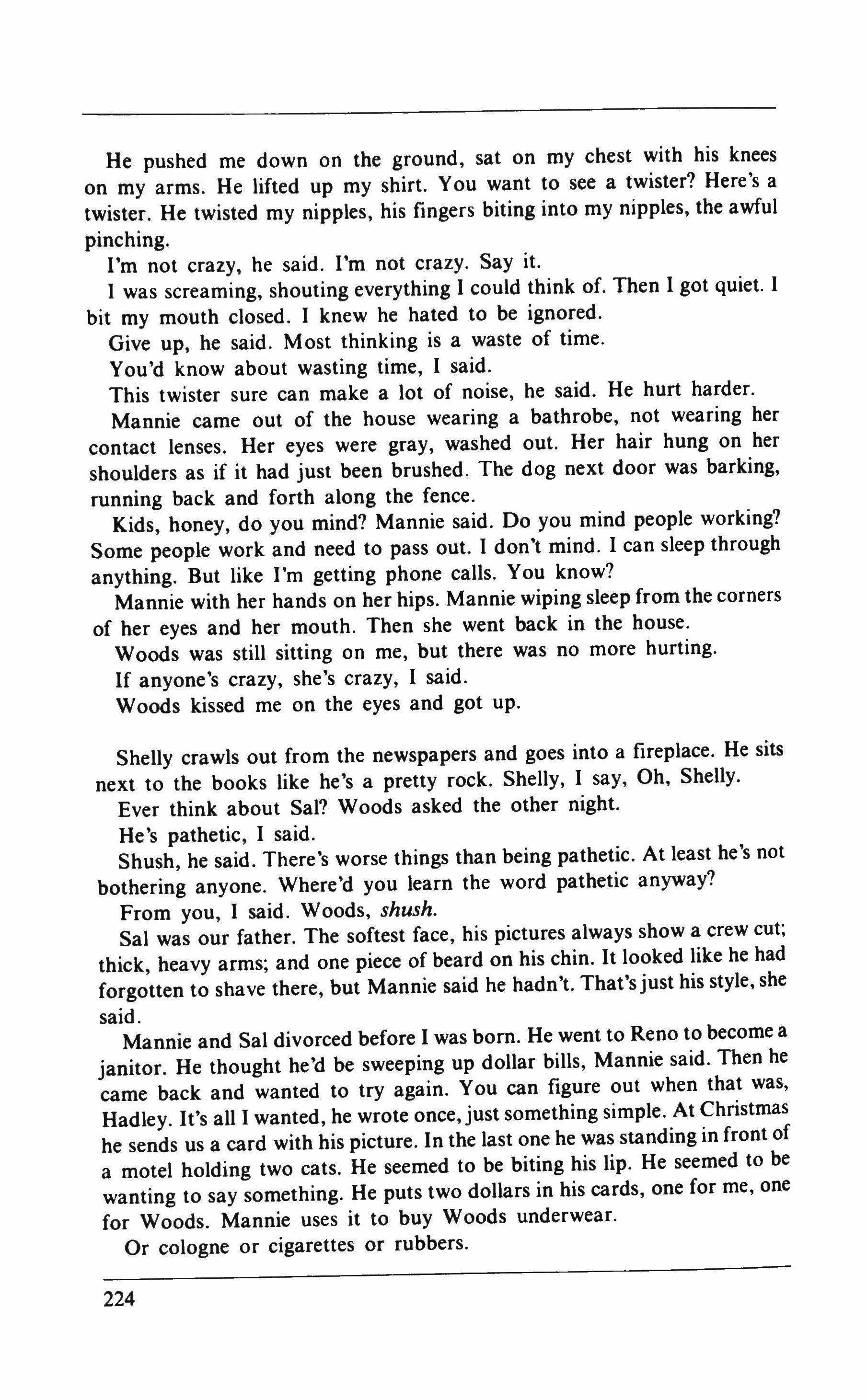
He pushed me down on the ground, sat on my chest with his knees on my arms. He lifted up my shirt. You want to see a twister? Here's a twister. He twisted my nipples, his fingers biting into my nipples, the awful pinching.
I'm not crazy, he said. I'm not crazy. Say it.
I was screaming, shouting everything I could think of. Then I got quiet. I bit my mouth closed. I knew he hated to be ignored.
Give up, he said. Most thinking is a waste of time.
You'd know about wasting time, I said.
This twister sure can make a lot of noise, he said. He hurt harder. Mannie came out of the house wearing a bathrobe, not wearing her contact lenses. Her eyes were gray, washed out. Her hair hung on her shoulders as if it had just been brushed. The dog next door was barking, running back and forth along the fence.
Kids, honey, do you mind? Mannie said. Do you mind people working? Some people work and need to pass out. I don't mind. I can sleep through anything. But like I'm getting phone calls. You know?
Mannie with her hands on her hips. Mannie wiping sleep from the corners of her eyes and her mouth. Then she went back in the house.
Woods was still sitting on me, but there was no more hurting.
If anyone's crazy, she's crazy, I said.
Woods kissed me on the eyes and got up.
Shelly crawls out from the newspapers and goes into a fireplace. He sits next to the books like he's a pretty rock. Shelly, I say, Oh, Shelly.
Ever think about Sal? Woods asked the other night.
He's pathetic, I said.
Shush, he said. There's worse things than being pathetic. At least he's not bothering anyone. Where'd you learn the word pathetic anyway?
From you, I said. Woods, shush.
Sal was our father. The softest face, his pictures always show a crew cut; thick, heavy arms; and one piece of beard on his chin. It looked like he had forgotten to shave there, but Mannie said he hadn't. That'sjust his style, she said.
Mannie and Sal divorced before I was born. He went to Reno to become a janitor. He thought he'd be sweeping up dollar bills, Mannie said. Then he came back and wanted to try again. You can figure out when that was, Hadley. It's all I wanted, he wrote once, just something simple. At Christmas he sends us a card with his picture. In the last one he was standing in front of a motel holding two cats. He seemed to be biting his lip. He seemed to be wanting to say something. He puts two dollars in his cards, one for me, one for Woods. Mannie uses it to buy Woods underwear. Or cologne or cigarettes or rubbers.

She wants me to be her stupid husband, Woods said when he got the rubbers.
What do you mean? I said. She just doesn't want to see your babies. Stupid!
That is what she said!
He gave the cigarettes out at Halloween. He waited almost a year for the doorbell and the kids in costumes and he gave them his Christmas cigarettes and he hid.
She found him in the closet and she got in there with him. All I heard was laughter that sounded wrong, like they were laughing into each other's hands.
And then there was Bill. Woods got the house ready for him. He sprinkled change on the floors, quarters and nickels next to the toilet, a five-dollar bill on the coffee table.
He's got to know we've got money, at least some, Woods said. So he doesn't think Mannie wants him for his money. And, he said, and if he picks it up, well, there's no trusting him.
I shrugged. O.K. I said. O.K.
He was smoking a reefer and it went out. He took out a book of matches. Want to see a match burn twice? he said.
He lit a match, waited. One, he said. Then he blew it out, touched it on my wrist. Two.
Shit, Woods. You shithead. Why'd you do that?
Don't call me crazy. I don't like it.
I didn't say anything, I said. I looked at the small spot of burn and I rubbed it. My eyes were stinging.
I'm sorry, he said. Hit me. Go on, hit me.
I hit him as hard as I could in the stomach, then I felt some fingers pulling my hair.
Hadley, get cleaned up and stop fighting.
I want you both clean and cute, Woods said, imitating her after she went to her room. It's all of us or nothing. He's a real family guy, oh my. Woods put on Mannie's sandals and flapped his elbows.
He had bloated pockets under his eyes, his face was stained with the brown dye of sun, he wore white shoes and a wide white belt. He had dark hair and silver sideburns that looked shoepolished. So, he said, so these are your kids.
He was smelling like strong cologne and I breathed through my mouth and my voice sounded like a cold, my hands holding my nose.
Mannie said, Hadley, knock it off.
I said, It stinks.
She said, Anything is an improvement over you.
Bill said, Hell, I'm sorry. Maybe I did put too much on.
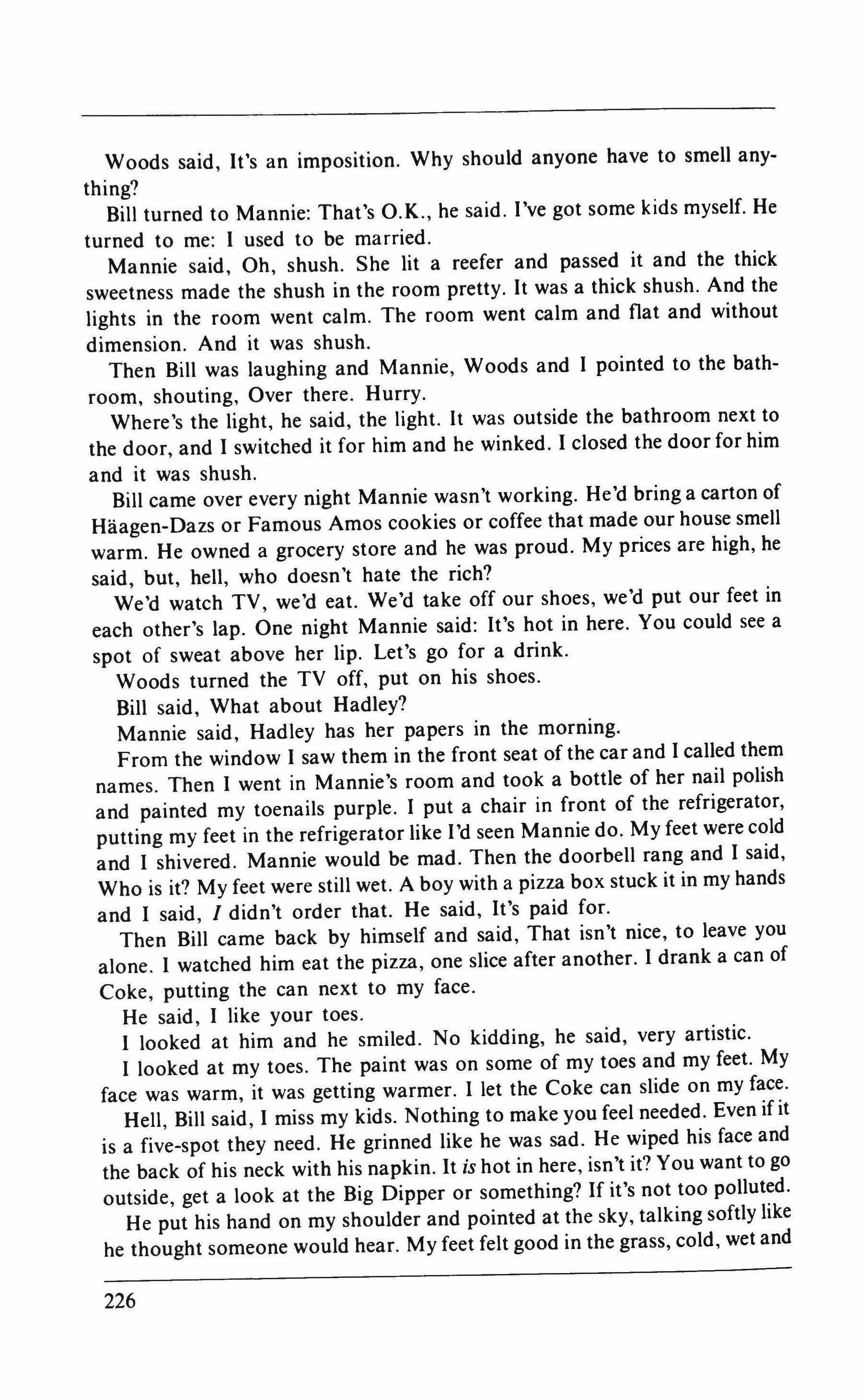
Woods said, It's an imposition. Why should anyone have to smell anything?
Bill turned to Mannie: That's O.K., he said. I've got some kids myself. He turned to me: I used to be married.
Mannie said, Oh, shush. She lit a reefer and passed it and the thick sweetness made the shush in the room pretty. It was a thick shush. And the lights in the room went calm. The room went calm and flat and without dimension. And it was shush.
Then Bill was laughing and Mannie, Woods and I pointed to the bathroom, shouting, Over there. Hurry.
Where's the light, he said, the light. It was outside the bathroom next to the door, and I switched it for him and he winked. I closed the door for him and it was shush.
Bill came over every night Mannie wasn't working. He'd bring a carton of Haagen-Dazs or Famous Amos cookies or coffee that made our house smell warm. He owned a grocery store and he was proud. My prices are high, he said, but, hell, who doesn't hate the rich?
We'd watch TV, we'd eat. We'd take off our shoes, we'd put our feet in each other's lap. One night Mannie said: It's hot in here. You could see a spot of sweat above her lip. Let's go for a drink.
Woods turned the TV off, put on his shoes.
Bill said, What about Hadley?
Mannie said, Hadley has her papers in the morning. From the window I saw them in the front seat of the car and I called them names. Then I went in Mannie's room and took a bottle of her nail polish and painted my toenails purple. I put a chair in front of the refrigerator, putting my feet in the refrigerator like I'd seen Mannie do. My feet were cold and I shivered. Mannie would be mad. Then the doorbell rang and I said, Who is it? My feet were still wet. A boy with a pizza box stuck it in my hands and I said, I didn't order that. He said, It's paid for.
Then Bill came back by himself and said, That isn't nice, to leave you alone. I watched him eat the pizza, one slice after another. I drank a can of Coke, putting the can next to my face.
He said, I like your toes.
I looked at him and he smiled. No kidding, he said, very artistic. I looked at my toes. The paint was on some of my toes and my feet. My face was warm, it was getting warmer. I let the Coke can slide on my face.
Hell, Bill said, I miss my kids. Nothing to make you feel needed. Even if it is a five-spot they need. He grinned like he was sad. He wiped his face and the back of his neck with his napkin. It is hot in here, isn't it? You want to go outside, get a look at the Big Dipper or something? If it's not too polluted. He put his hand on my shoulder and pointed at the sky, talking softly like he thought someone would hear. My feet felt good in the grass, cold, wet and

clean. When he took his hand off my shoulder to go home, I could still feel the warm spot and I shivered.
I was almost sleeping and I could hear his voice in my head like a warning. Listen, he said, it all has to do with expectations. Anything can be O.K. You've just got to make yourself think it doesn't matter. He was speaking slowly, carefully, so I could find him.
I yawned. Talk about Bill, I said. He's nice. He turned over on his stomach and looked at me. I know memory's got something to do with it, with learning. If you could forget everything you've ever learned, he said, if you could just start over Woods, can't you talk regular? I got under my covers. I thought he was tired.
Memory's the worst thing we've got, he said. The worst thing, Hadley. My eyes felt like someone was sitting on them. And what about good things, I said. I remember some good things. Like the time-
That's the problem, he said. It's also the best thing. Memory's also the best thing we've got. Or can be anyway.
I sat up in bed. The curtains were open for any leftover light, a moon like a flashlight and the wind moving so fast you expected the light to move. Why are you thinking so much about remembering stuff? I said. Did something bad happen?
I was thinking: Maybe he got trouble at a bar. Taking money. Once he was caught for hitchhiking. I didn't hear about it for months. Then I heard, he told me how the policemen sat him in between them and their new car smelling like warm plastic. And the windows were closed and they were talking baby to him. When they said, What, he said, Sir, sir, 111 walk, he said, 111 walk. And one man holding his wrist like a handcuff.
The dialogues on thejail walls, he said, written over one another, on top of one another, so that all the voices merged, he said, shouted the same thing. And the smells that went with them: of cigarette smoke and patchouli oil and wet wool. It wasn't just me, Woods said, it was all the sounds aiming for your ears. Everyone else's noise like garbage you have to walk through. He was so nervous, he said, he was talking to himself, talking out loud. My nightmares should be enough to wake you, he said.
Woods, I whispered, were you arrested again? It's too complicated, he whispered back. It'd need algebra to explain. Oh, Hadley, Madley, I'm absolutely madly about Hadley. Don't ever get old, Hadley, don't ever get old.
Woods, I said, if you're kidding with me, I'll hate you.
He was pretending to sleep. His sleep wasn't sleep breathing. Woods, I said.
I just want to sleep. I just want to sleep. In the dark his voice was shaking.

I got out of bed. I sat next to his bed on the floor, I put my head next to his. I could feel the sweat in his hair like warm paste. I put my fingers on his mouth like a shush. Maybe then we slept for a while.
I got my newspaper job. I wanted to give Woods some money. He'd know what to do. He'd find something fun. He'd buy a memory, something he could keep inside his head like a stone. Like a stone, Woods, that would crush your beddreams, make your sleep pure and quiet like night.
But his voice went on and on the following nights. He didn't want to leave his bed, he wanted to talk.
Ever wonder why we call our mother Mannie?
Woods, I said, I have to get up early for work. I need to sleep. There's worse things than not sleeping. Loneliness is worse. There's nothing worse than loneliness.
Why do we call our mother Mannie, Woods?
Her real name is Annie.
I tried not to groan. I had heard this before. I gave her the name Mannie. A combination of mother and a friend. But she's not either one. She's a creep. He turned on the light and got out of bed. He opened the dictionary. She's a creeper, as in "a plant having stems that grow along a surface, either rooting at intervals, or clinging for support."
Did you hear that, Hadley?
It was sleep that had my attention, that made things confused so that after a while, I couldn't tell what was sleepdrearns, what was Woods.
She's a creeper, Hadley. Woods, ever wonder why you're crazy? Crazy, crazy. Then I thought I heard him crying. Leave me alone, he said, when I got out of bed. Leave me the fuck alone. But if he thought I was sleeping, he'd shake me. Sit on my bed and make me listen.
Creep. Creeper!
I was fired from my job. I was late too many times. I wanted to tell them I was allergic to dark, that night was inside me like a sky, a sky you have to read, and every word you say is wrong.
Here is the sky paved with stars like broken glass. Framed by a �indow dirty with dark. Next to the window is the rubber plant that Bill gave Mannie. And the fireplace where Woods threw his books after Bill left tonight. And the chair where I sit, holding onto the armrests, as if I expected the chair to move. The house is quiet with the currents of sleep. Mannie's sleep. Woods' sleep.
Tonight Mannie had said, I'm bored. Can't we do something?
We can't do anything, Woods said. Bill wants to stay here. Let's do something here, Mannie said.
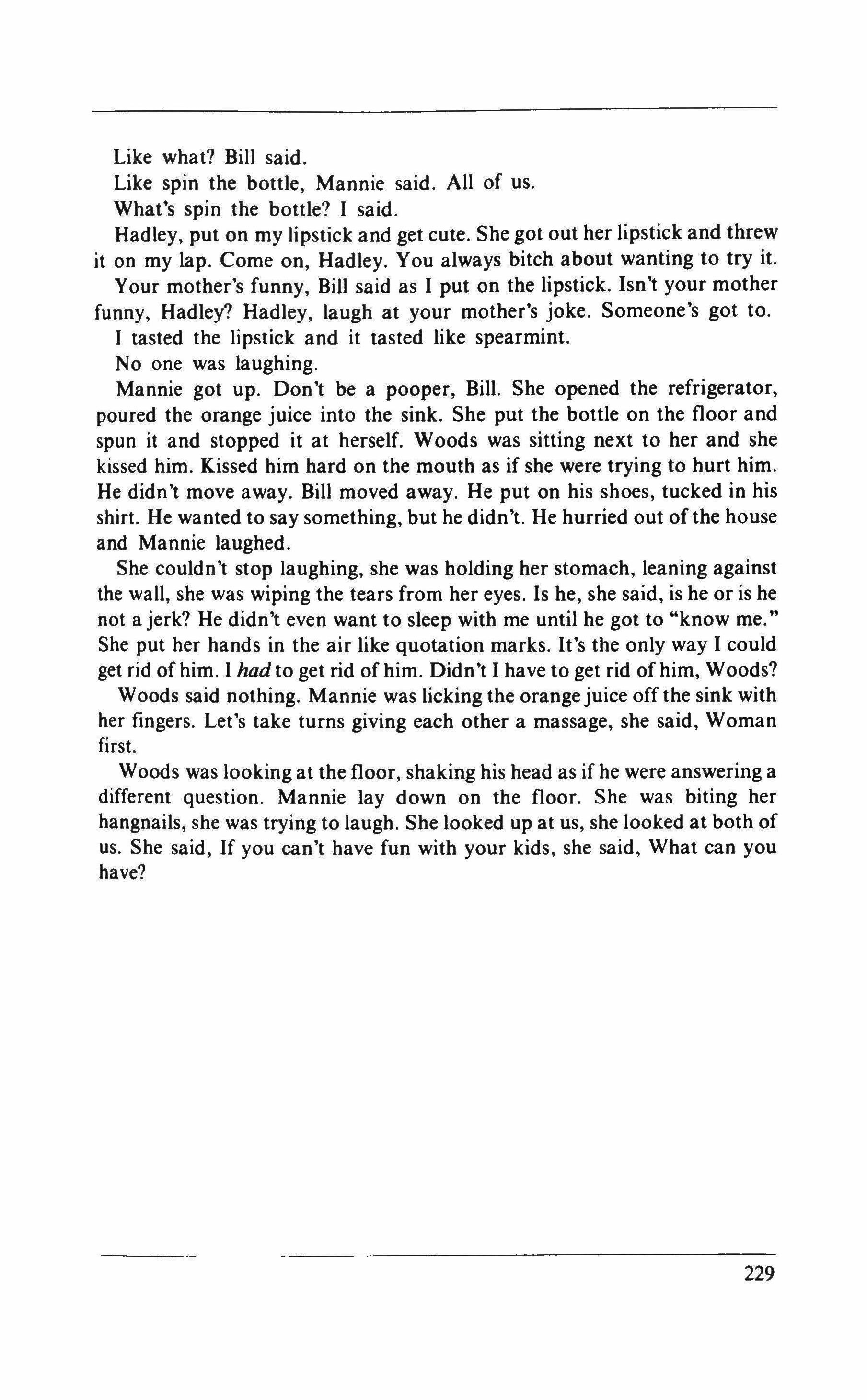
Like what? Bill said. Like spin the bottle, Mannie said. All of us. What's spin the bottle? I said. Hadley, put on my lipstick and get cute. She got out her lipstick and threw it on my lap. Come on, Hadley. You always bitch about wanting to try it. Your mother's funny, Bill said as I put on the lipstick. Isn't your mother funny, Hadley? Hadley, laugh at your mother's joke. Someone's got to. I tasted the lipstick and it tasted like spearmint. No one was laughing.
Mannie got up. Don't be a pooper, Bill. She opened the refrigerator, poured the orange juice into the sink. She put the bottle on the floor and spun it and stopped it at herself. Woods was sitting next to her and she kissed him. Kissed him hard on the mouth as if she were trying to hurt him. He didn't move away. Bill moved away. He put on his shoes, tucked in his shirt. He wanted to say something, but he didn't. He hurried out ofthe house and Mannie laughed.
She couldn't stop laughing, she was holding her stomach, leaning against the wall, she was wiping the tears from her eyes. Is he, she said, is he or is he not a jerk? He didn't even want to sleep with me until he got to "know me." She put her hands in the air like quotation marks. It's the only way I could get rid of him. I had to get rid of him. Didn't I have to get rid of him, Woods? Woods said nothing. Mannie was licking the orangejuice off the sink with her fingers. Let's take turns giving each other a massage, she said, Woman first.
Woods was looking at the floor, shaking his head as if he were answering a different question. Mannie lay down on the floor. She was biting her hangnails, she was trying to laugh. She looked up at us, she looked at both of us. She said, If you can't have fun with your kids, she said, What can you have?

My wife had just gone out West with a groom from the local dog track, and I was waiting around the house for things to clear up, thinking about catching the train to Florida to change my luck. I already had my ticket. It was on the dinette, in my wallet.
It was the day before Thanksgiving, and all week long there had been hunters parked down at the gate: pickups and a couple of old Chevys sitting empty all day-mostly with out-of-state tags-occasionally, two men standing beside their car doors drinking coffee and talking. I hadn't given them any thought. Gainsborough-who I was thinking at that time of stiffing for the rent-had said not to antagonize them and let them hunt unless they shot near the house, and then to call the state police and let them handle it. No one had shot near the house, though I had heard shooting back in the woods and had seen one of the Chevys drive off fast with a deer on top, but I didn't think there would be any trouble.
I wanted to get out before it began to snow and before the electricity bills started coming, and since my wife had sold our car before she left, getting my business settled wasn't easy, and I hadn't had time to pay much attention.
Just after ten o'clock in the morning there was a knock on the front door. Standing out in the frozen grass were two fat women with a dead deer.
"Where's Gainsborough?" the one fat woman said. They were both dressed like hunters: one had on a red plaid lumberjack's jacket and the other a greenish camouflage suit. Both of them had the little orange cushions that hang from your back belt loops and get hot when you sit on them. Both of them had guns.
"He's not here," I said. "He's gone back to England. Some trouble with the government. I don't know about it."
Both fat women were staring at me as if they were trying to get me in better focus. They had green and black camouflage paste on their faces and looked like they had something on their minds. I still had on my bathrobe.

"We wanted to give Gainsborough a deer steak," the one who had spoken first said and turned and looked at the dead deer, whose tongue was out the side of his mouth and whose eyes looked like a stuffed deer's eyes. "He lets us hunt and we wanted to thank him in that way," she said.
"You could give me a deer steak," I said. "I could keep it for him."
"I suppose we could do that," the one who was doing all the talking said. But the other one, who was wearing the camouflage suit, gave her a look that said she knew Gainsborough would never see the steak if it got in my hands.
"Why don't you come in," I said. "111 make some coffee and you can warm up."
"We are pretty cold," the one in the lumberjack's jacket said and patted her hands together. "If Phyllis wouldn't mind."
Phyllis said she didn't mind at all, though it was clear that accepting an invitation to have coffee had nothing to do with giving away a deer steak.
"Phyllis is the one who actually brought him down," the pleasant fat woman said when they had their coffees and were holding their mugs cupped between their fat hands, sitting on the davenport. She said her name was Bonny and that they were from across the state line. They were big women in their forties with fat faces, and their clothes made them look like all their parts were sized too big. Both of them were jolly, though-even Phyllis when she forgot about the deer steaks and got some color back in her fat cheeks. They seemed to fill up the house and make it feel jolly. "He ran sixty yards after she hit him and went down when he jumped the fence," Bonny said authoritatively. "It was a heart shot, and sometimes those take time to have effect.
"Ran like a scalded dog," Phyllis said, "and dropped like a load of shit." Phyllis had short blond hair and a hard mouth that seemed to want to say hard things.
"We saw a wounded doe, too," Bonny said and looked aggravated about it. "That really makes you mad."
"The man may have tracked it, though," I said. "It may have been a mistake. You can't tell about those things."
"That's true enough," Bonny said and looked at Phyllis hopefully, but Phyllis didn't look up. I tried to imagine the two of them dragging a dead deer out of the woods and it was easy.
I went out to the kitchen to get a honey pull-apart I had put in the oven, and they were whispering to each other when I came back in. The whispering, though, seemed good-natured, and I gave them the honey pull-apart without mentioning it. I was happy they were here. My wife is a slender, petite woman who bought all her clothes in the children's sections of department stores and said they were the best clothes you could buy because they were made for hard wearing. But she didn't have much presence in the house; there just wasn't enough of her to occupy the space-not that the
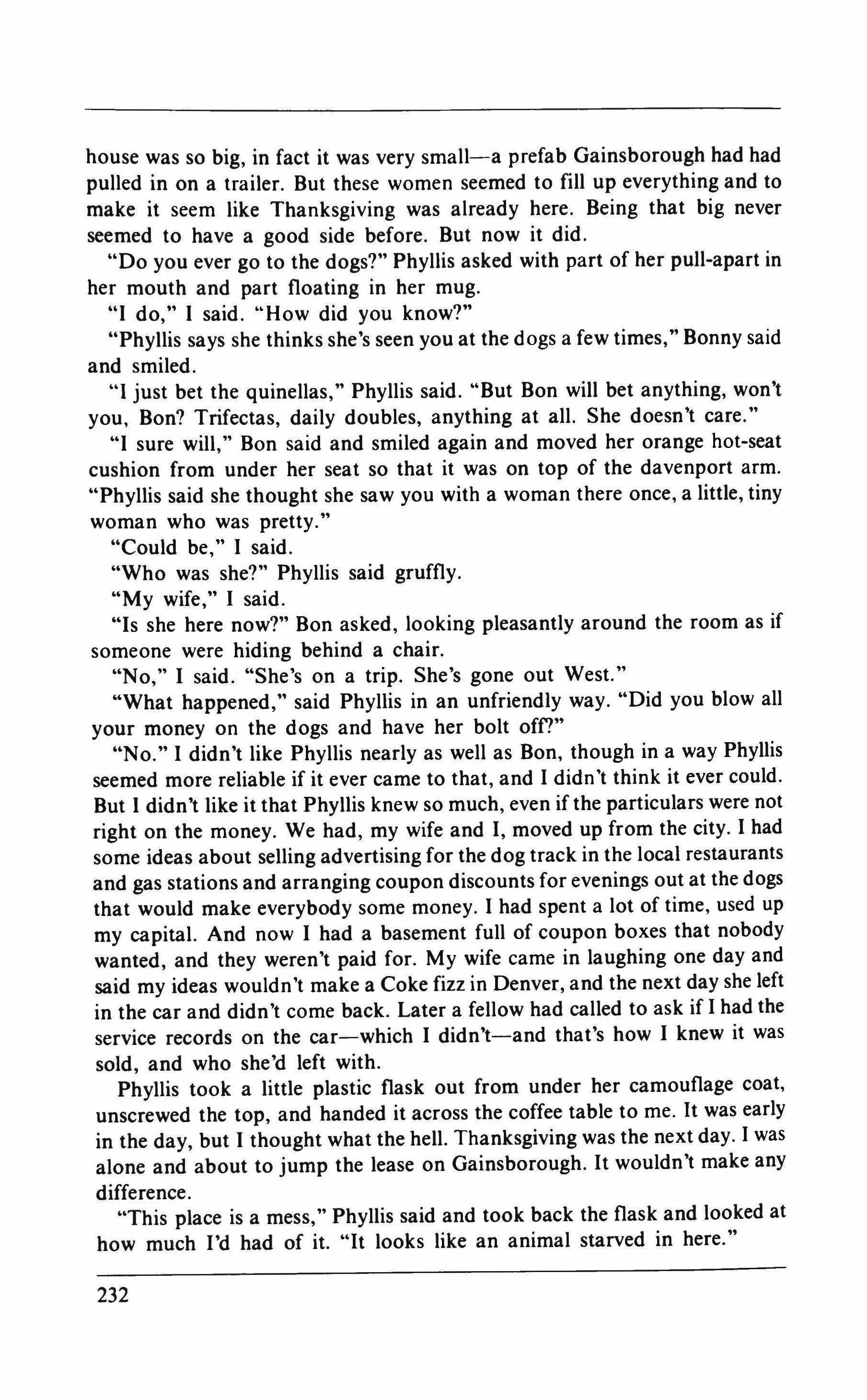
house was so big, in fact it was very small-a prefab Gainsborough had had pulled in on a trailer. But these women seemed to fill up everything and to make it seem like Thanksgiving was already here. Being that big never seemed to have a good side before. But now it did.
"Do you ever go to the dogs?" Phyllis asked with part of her pull-apart in her mouth and part floating in her mug.
"I do," I said. "How did you know?"
"Phyllis says she thinks she's seen you at the dogs a few times," Bonny said and smiled.
"I just bet the quinellas," Phyllis said. "But Bon will bet anything, won't you, Bon? Trifectas, daily doubles, anything at all. She doesn't care."
"I sure will," Bon said and smiled again and moved her orange hot-seat cushion from under her seat so that it was on top of the davenport arm.
"Phyllis said she thought she saw you with a woman there once, a little, tiny woman who was pretty."
"Could be," I said.
"Who was she?" Phyllis said gruffly.
"My wife," I said.
"Is she here now?" Bon asked, looking pleasantly around the room as if someone were hiding behind a chair.
"No," I said. "She's on a trip. She's gone out West."
"What happened," said Phyllis in an unfriendly way. "Did you blow all your money on the dogs and have her bolt off?"
"No." I didn't like Phyllis nearly as well as Bon, though in a way Phyllis seemed more reliable if it ever came to that, and. didn't think it ever COUld. But. didn't like it that Phyllis knew so much, even if the particulars were not right on the money. We had, my wife and I, moved up from the city. I had some ideas about selling advertising for the dog track in the local restaurants and gas stations and arranging coupon discounts for evenings out at the dogs that would make everybody some money.• had spent a lot of time, used up my capital. And now I had a basement full of coupon boxes that nobody wanted, and they weren't paid for. My wife came in laughing one day and said my ideas wouldn't make a Coke fizz in Denver, and the next day she left in the car and didn't come back. Later a fellow had called to ask if I had the service records on the car-which I didn't-and that's how I knew it was sold, and who she'd left with.
Phyllis took a little plastic flask out from under her camouflage coat, unscrewed the top, and handed it across the coffee table to me. It was early in the day, but I thought what the hell. Thanksgiving was the next day. I was alone and about to jump the lease on Gainsborough. It wouldn't make any difference.
"This place is a mess," Phyllis said and took back the flask and looked at how much I'd had of it. "It looks like an animal starved in here."

"It needs a woman's touch," Bon said and winked at me. She was not badlooking, even though she was a little heavy. The camouflage paste on her face made her look a little like a clown, but you could tell she had a nice face.
"I'm just about to leave," I said and reached for the flask, but Phyllis put it back in her hunting jacket. "I'm just getting things organized back in the back."
"Do you have a car?" Phyllis asked.
"I'm getting antifreeze put in it," I said. "It's down at the BP. It's a blue Camaro. You probably passed it. Are you girls married?" I asked. I was happy to steer away from my troubles.
Bon and Phyllis exchanged a look of annoyance, and it disappointed me. I was disappointed to see any kind of displeasure cloud up on Bon's nice, round features.
"We're married to a couple of rubber band salesmen down in Petersburg. That's across the state line," Phyllis said. "A real pair of monkeys, if you know what I mean."
I tried to imagine Bonny's and Phyllis's husbands. I pictured two skinny men wearing nylon jackets, shaking hands in the dark parking lot of a shopping mall in front of a bowling alley bar. 1 couldn't imagine anything else. "What do you think about Gainsborough?" Phyllis asked. Bon was just smiling at me now.
"I don't know him very well," 1 said. "He told me he was a direct descendant of the English painter. But I don't believe it."
"Neither do I," said Bonny and gave me another wink
He's farting through silk," Phyllis said.
"He has two children who come snooping around here sometime," I said. "One's a dancer in the city. And one's a computer repairman. I think they want to get in the house and live in it. But I've got the lease."
"Are you going to stiff him?" Phyllis said.
"No," I said. "I wouldn't do that. He's been fair to me, even if he lies sometimes.
"He's farting through silk," Phyllis said. "Just like Commander McCann."
Phyllis and Bonny gave each other a knowing look. Out the little picture window 1 saw it had begun to snow, just a mist, but unmistakable.
"You act to me like you could use a good snuggle," Bon said, and she broke a big smile at me so 1 could see her teeth. They were all there and white and small. Phyllis looked at Bonny without any expression, as if she'd heard the words before. "What do you think about that?" Bonny said and sat forward over her big knees.
At first 1 didn't know what to think about it. And then I thought it sounded pretty good, even if Bonny was a little heavy. I told her it sounded all right with me.

"I don't even know your name," Bonny said and stood up and looked around the sad, little room for the door to the back.
"Henderson," I lied. "Lloyd Henderson is my name. I've lived here six months." I stood up.
"I don't like Lloyd," Bonny said and looked at me up and down now that I was up, in my bathrobe. "I think I'll call you Curly, because you've got curly hair. As curly as a Negro's," she said and laughed so that she shook under her clothes.
"You can call me anything you want," I said, and felt good.
"If you two are going into the other room, I think I'm going to clean some things up around here," Phyllis said. She let her big hand fall on the davenport arm as if she thought dust would puff out. "You don't care if I do that, do you, Lloyd?"
"Curly," said Bonny, "say Curly."
"No, I certainly don't," I said and looked out the window at the snow as it began to sift over the field down the hill. It looked like a Christmas card.
"Then don't mind a little noise," she said and began collecting the cups and plates on the coffee table.
Without her clothes on Bonny wasn't all that bad-looking. It was just as though there were a lot of heavy layers of her, but at the middle of all those layers you knew she was generous and loving and as nice as anybody you'd ever meet. She was just fat, though probably not as fat as Phyllis if you'd put them side by side.
There were a lot of clothes on my bed and I put them all on the floor, but when Bon sat on the cover she sat on a metal tie tack and some pieces of loose change and she yelled and laughed, and we both laughed. I felt good.
"This is what we always hope well find out in the woods," Bonny said and giggled. "Somebody like you."
"Same here," I said. It wasn't at all bad to touch her,just soft everywhere. I've often thought that fat women might be better because they don't get to do it so much and have more time to sit around and think about it and get ready to do it right.
"Do you know a lot of funny stories about fatties?" Bonny said.
"A few," I said. "I used to know a lot more, though." I could hear Phyllis out in the kitchen, running water and shuffling dishes around in the sink.
"My favorite is the one about driving the truck," Bonny said.
I didn't know that one. "I don't know that one," I said.
"You don't know the one about driving the truck?" she said, surprised and astonished.
"I'm sorry," I said.
"Maybe 111 tell you sometime, Curly," she said. "You'd get a big kick out of it."
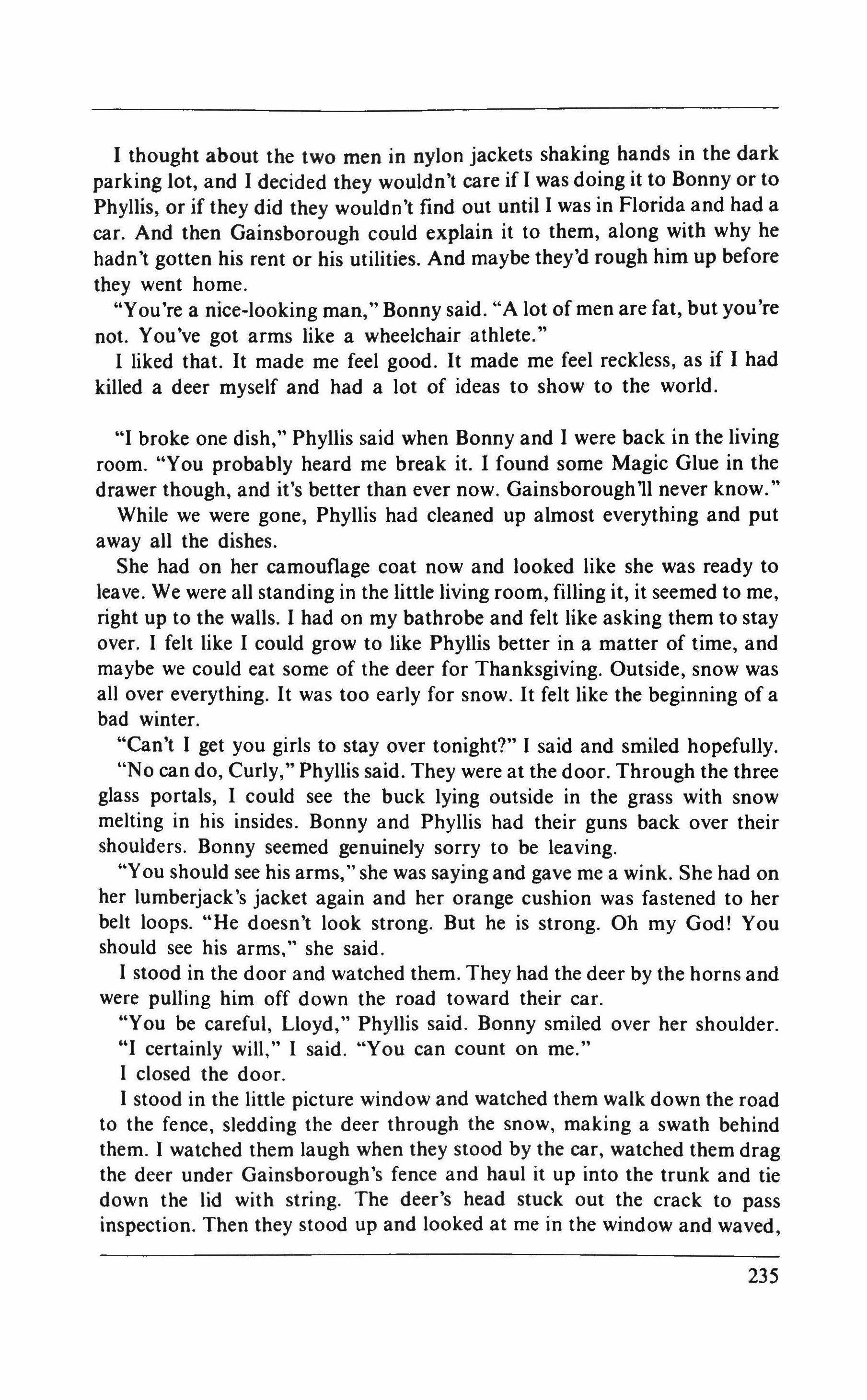
I thought about the two men in nylon jackets shaking hands in the dark parking lot, and I decided they wouldn't care if I was doing it to Bonny or to Phyllis, or if they did they wouldn't find out until I was in Florida and had a car. And then Gainsborough could explain it to them, along with why he hadn't gotten his rent or his utilities. And maybe they'd rough him up before they went home.
"You 're a nice-looking man," Bonny said. "A lot of men are fat, but you're not. You've got arms like a wheelchair athlete."
I liked that. It made me feel good. It made me feel reckless, as if I had killed a deer myself and had a lot of ideas to show to the world.
"I broke one dish," Phyllis said when Bonny and I were back in the living room. "You probably heard me break it. I found some Magic Glue in the drawer though, and it's better than ever now. Gainsborough'll never know."
While we were gone, Phyllis had cleaned up almost everything and put away all the dishes.
She had on her camouflage coat now and looked like she was ready to leave. We were all standing in the little living room, filling it, it seemed to me, right up to the walls. I had on my bathrobe and felt like asking them to stay over. I felt like I could grow to like Phyllis better in a matter of time, and maybe we could eat some of the deer for Thanksgiving. Outside, snow was all over everything. It was too early for snow. It felt like the beginning of a bad winter.
"Can't I get you girls to stay over tonight?" I said and smiled hopefully.
"No can do, Curly," Phyllis said. They were at the door. Through the three glass portals, I could see the buck lying outside in the grass with snow melting in his insides. Bonny and Phyllis had their guns back over their shoulders. Bonny seemed genuinely sorry to be leaving.
"Y ou should see his arms," she was saying and gave me a wink. She had on her lumberjack's jacket again and her orange cushion was fastened to her belt loops. "He doesn't look strong. But he is strong. Oh my God! You should see his arms," she said.
I stood in the door and watched them. They had the deer by the horns and were pulling him off down the road toward their car.
"You be careful, Lloyd," Phyllis said. Bonny smiled over her shoulder. "I certainly will," I said. "You can count on me."
I closed the door.
I stood in the little picture window and watched them walk down the road to the fence, sledding the deer through the snow, making a swath behind them. I watched them laugh when they stood by the car, watched them drag the deer under Gainsborough's fence and haul it up into the trunk and tie down the lid with string. The deer's head stuck out the crack to pass inspection. Then they stood up and looked at me in the window and waved,
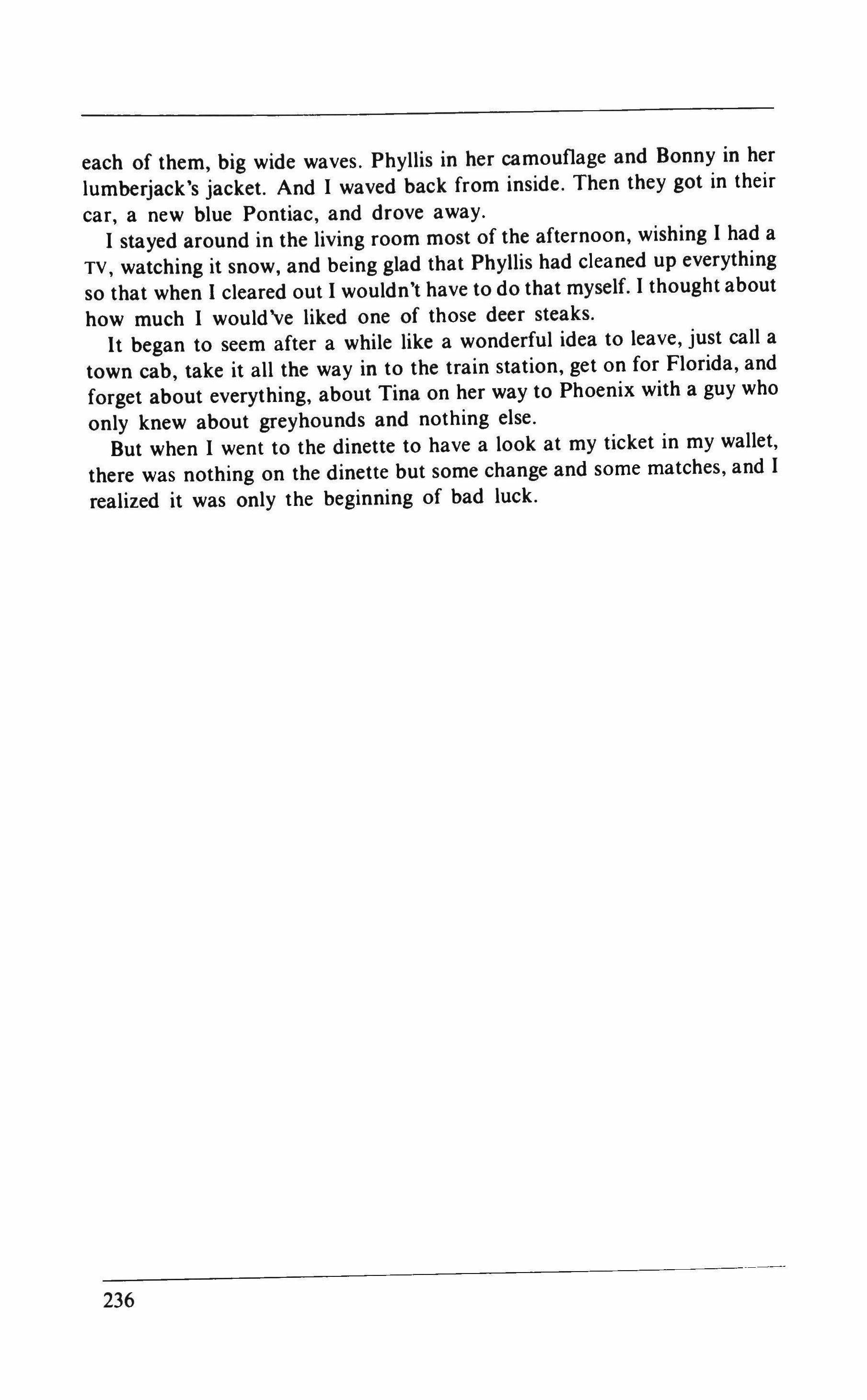
each of them, big wide waves. Phyllis in her camouflage and Bonny in her lumberjack's jacket. And I waved back from inside. Then they got in their car, a new blue Pontiac, and drove away.
I stayed around in the living room most of the afternoon, wishing I had a TV, watching it snow, and being glad that Phyllis had cleaned up everything so that when I cleared out I wouldn't have to do that myself. I thought about how much I would've liked one of those deer steaks.
It began to seem after a while like a wonderful idea to leave, just call a town cab, take it all the way in to the train station, get on for Florida, and forget about everything, about Tina on her way to Phoenix with a guy who only knew about greyhounds and nothing else.
But when I went to the dinette to have a look at my ticket in my wallet, there was nothing on the dinette but some change and some matches, and I realized it was only the beginning of bad luck.
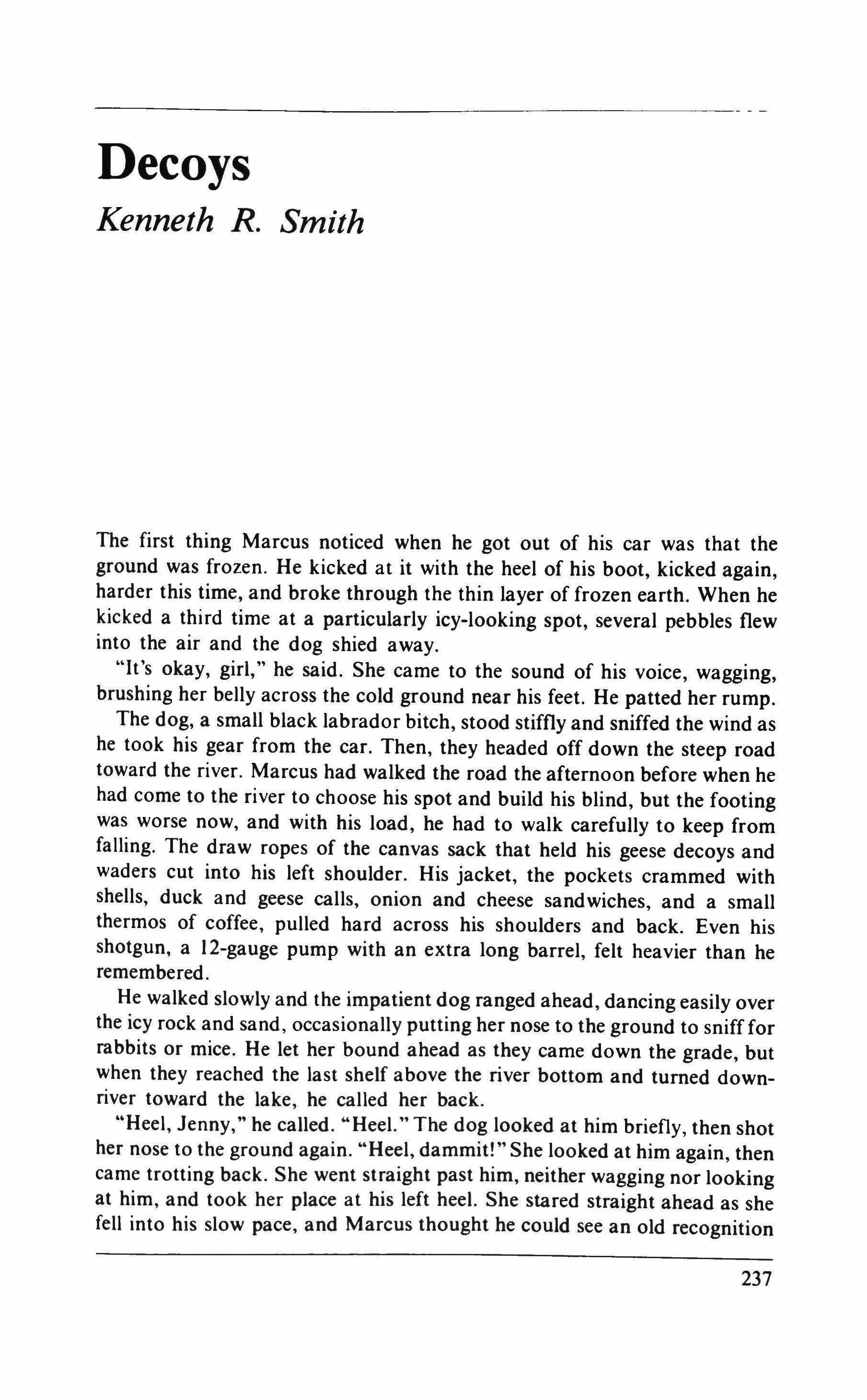
The first thing Marcus noticed when he got out of his car was that the ground was frozen. He kicked at it with the heel of his boot, kicked again, harder this time, and broke through the thin layer of frozen earth. When he kicked a third time at a particularly icy-looking spot, several pebbles flew into the air and the dog shied away.
"It's okay, girl," he said. She came to the sound of his voice, wagging, brushing her belly across the cold ground near his feet. He patted her rump.
The dog, a small black labrador bitch, stood stiffly and sniffed the wind as he took his gear from the car. Then, they headed off down the steep road toward the river. Marcus had walked the road the afternoon before when he had come to the river to choose his spot and build his blind, but the footing was worse now, and with his load, he had to walk carefully to keep from falling. The draw ropes of the canvas sack that held his geese decoys and waders cut into his left shoulder. His jacket, the pockets crammed with shells, duck and geese calls, onion and cheese sandwiches, and a small thermos of coffee, pulled hard across his shoulders and back. Even his shotgun, a 12-gauge pump with an extra long barrel, felt heavier than he remembered.
He walked slowly and the impatient dog ranged ahead, dancing easily over the icy rock and sand, occasionally putting her nose to the ground to sniff for rabbits or mice. He let her bound ahead as they came down the grade, but when they reached the last shelf above the river bottom and turned downriver toward the lake, he called her back.
"Heel, Jenny," he called. "Heel." The dog looked at him briefly, then shot her nose to the ground again. "Heel, dammit!" She looked at him again, then came trotting back. She went straight past him, neither wagging nor looking at him, and took her place at his left heel. She stared straight ahead as she fell into his slow pace, and Marcus thought he could see an old recognition

come into the dog's eyes. It was as if she were telling him, Okay, buster, so it s that way again. Okay, just tell me, no need to get mad.
When he'd taken a few steps with her at heel, he stopped, turned awkwardly, and bent down to pat her head. "You remember all right," he told her. "They haven't done a thing with you, have they? Except to spoil you."
Jenny allowed herself to be petted but she didn't respond. She looked like she was saying, Cut the shit, I'm working.
His folks had kept the dog during the four years he had been gone-two years at the junior college, then two years in the Army-and Marcus had figured she would be rusty. His dad didn't hunt. He knew they had treated her pretty much like a pet. Greeny, his friend from high school, had hunted her a little right after Marcus had gone off to college, but then Greeny had been drafted and sent to Vietnam, where he lasted almost two months before being killed. Marcus bent to pat the dog's aloof head again. "We did a good job with you, didn't we, girl? Old Greeny and I."
They pushed through the heavy creosote and mesquite brush on the edge of the river bottom and finally came to the bottom itself, the flat, open area where the spring floods uprooted all but the larger mesquite trees. The river was still a good ways off, and off to his left, Marcus could see the beginning of the lake. Farther to the west, across the tongue of that end of the lake, red cliffs were just taking on their color from the rising sun.
Just before they reached the blind, they flushed a pair of mudhens from under an overhang in the river bank. Marcus dropped the sack of decoys and was swinging his shotgun to his shoulder when he realized they were fish ducks. As he picked up his sack and brushed the wet sand from the canvas, he looked at Jenny. He felt embarrassed. She had been excited by the action; her hind legs were stiff, her muscles taut.
"Relax," he said. "Fish ducks. FISH DUCKS." One thing he'd never been able to teach her, telling the good ducks from the bad. She'd almost have it, then by the next trip, she would forget.
Now she stood and watched the mudhens flying out to the lake. She whined quietly and stamped her feet into the sand. They were in range, she told him, when she finally stopped watching the ducks and looked at him.
"Some pair," he said. He laughed as he rubbed his hand over her black fur. "You can't tell them, and I almost can't tell them."
Once, when Greeny had first started taking him to hunt the river, Marcus had killed a mudhen. Jumped it close, like these. And before he knew what he was doing, his reflexes had pushed the shotgun up, then down to cover the target, and he'd fired. Jenny was a very young dog then, still in training, but she ran quickly to retrieve the downed mudhen. Greeny, in front of him and a little off to one side, came over, his crooked, bashful smile exposing small

pieces of chewing tobacco. He spit at a rock, looked down at the brown spittle, then raised his laughing eyes.
"Y ou like eating second-hand fish?" he asked.
"111 kill you if you tell your sister about this."
Greeny laughed, then spit again. He held up his hand. "Not me," he said. "I'd be embarrassed if it got around I hunted with a fella liked to shoot fish ducks.
"I swear, Greeny, 111 kill you." Jenny came up with the fish duck in her mouth. Marcus took it from her. "Good girl," he said. Then, he turned to Greeny. "Take the dog downriver aways. I don't want her looking at me when I throw this thing away."
In those days, he and Greeny hunted every chance they got. And now, when he thought of those times, which he tried not to do very often, Marcus couldn't decide whether he had felt the way he had about Greeny because he loved Greeny's sister, or whether his feelings for Greeny had caused him to fall in love with her. It all seemed so long ago, and the emotions became confused in his mind; they merged so completely that he wasn't able to remember which attraction he'd felt first.
What he did remember were the cold, dark winter mornings when he would slip through the Greens' back door and out to the screened back porch where Greeny always slept. While Greeny was dressing and getting his gear, Marcus would sneak down the hall to Janice's bedroom. She always made him promise to wake her when he came by for Greeny.
He'd kiss her, and she would wake with a quiet moan and turn so she could hold him. She always asked what time it was.
"Five," he'd say. "Like always."
"Ridiculous." Then she would move over. "Lie down."
In his heavy boots and hunting clothes, he would stretch out on top of the covers. They would kiss quietly as they listened to Greeny getting his things together out on the porch.
He would reach his hand under the covers and touch her breasts through the soft nightgown.
"Touch me down here," she would say, moving his l.and down. "I want you so bad."
"We can't do anything now. Your folks will hear."
"At least touch me."
He'd grope under the covers until his hand was inside her panties. She always felt wet. "Tonight," he'd say. "Tonight we'll do something." Then, they'd hear Greeny's soft whistle from the living room.
"Just a little more," she would say. "Yes, tonight."
Besides the excitement of making love to Janice, he had always thought of that time as being comfortable. Like the year he and Greeny killed the two big Canadians, and Mrs. Green cooked them for New Year's dinner, inviting

him and all his family. Everyone sitting around the Greens' big table, the geese steaming on their platters as Mr. Green put the big carving knife to them. And Janice next to him, her hand on his thigh, and no need to hide it because everyone knew they were in love, knew they would eventually marry. At that dinner table the notion had first come to Marcus that his life was now comfortably planned. He could see it stretching out before him for many hazy but certain years, many comfortable years, with this just the beginning. His future seemed, at that moment, to be an endless chain of family dinners like this one. He and Greeny would get geese every year for New Year's. The families would all come together; Greeny and his wifewhoever she would be-would both smile shyly across the table, and he and Janice, and the children they would have by then, would smile back.
As he slipped on his waders, Marcus tried to push the memory of that particular New Year's dinner from his mind. He didn't want to think of Janice, and he especially didn't want to think of all the dinners they would never have.
She was the first girl he ever wanted to marry, and he wanted to be able to think of her without bitterness. He wasn't angry any longer that she had thrown him over during his second semester at college and married someone else. What still bothered him was the way she had told him of Greeny's death.
It was during his last fall at the junior college that Marcus received the newspaper clipping from Janice. A damn newspaper story, he thought now, and a short "thought you'd like to know" note. That night, when he called the Greens long distance, they had seemed surprised to hear from him. He would always remember that they didn't much want to talk to him. He remembered the feeling in his stomach as he hung up the phone-not realizing until then that the Greens found him somehow responsible for Greeny's death. Something Mr. Green had said, some small bit of the conversation-he couldn't even remember the exact words-had made him feel sick, had told him that since he'd gone off to college and had not been drafted when Greeny was, he was no longer trustworthy. He was someone who would run out on a friend.
After he finished college, he had gone to see the Greens once, and the suspicions he had felt vaguely over the phone on that earlier night were made clear to him. At first, he had tried to hate them for the way they treated him. But that phase had passed, and now he simply tried to avoid them, tried his best to understand, knowing all the time he could never forgive them, none of them, because they had all acted like Greeny's loss was theirs alone; they had refused to acknowledge his own pain.
Marcus didn't learn until after he was drafted himself that Greeny had been killed by his own people, by some frightened, trigger-happy kid whom Greeny surprised coming back in from a night patrol.
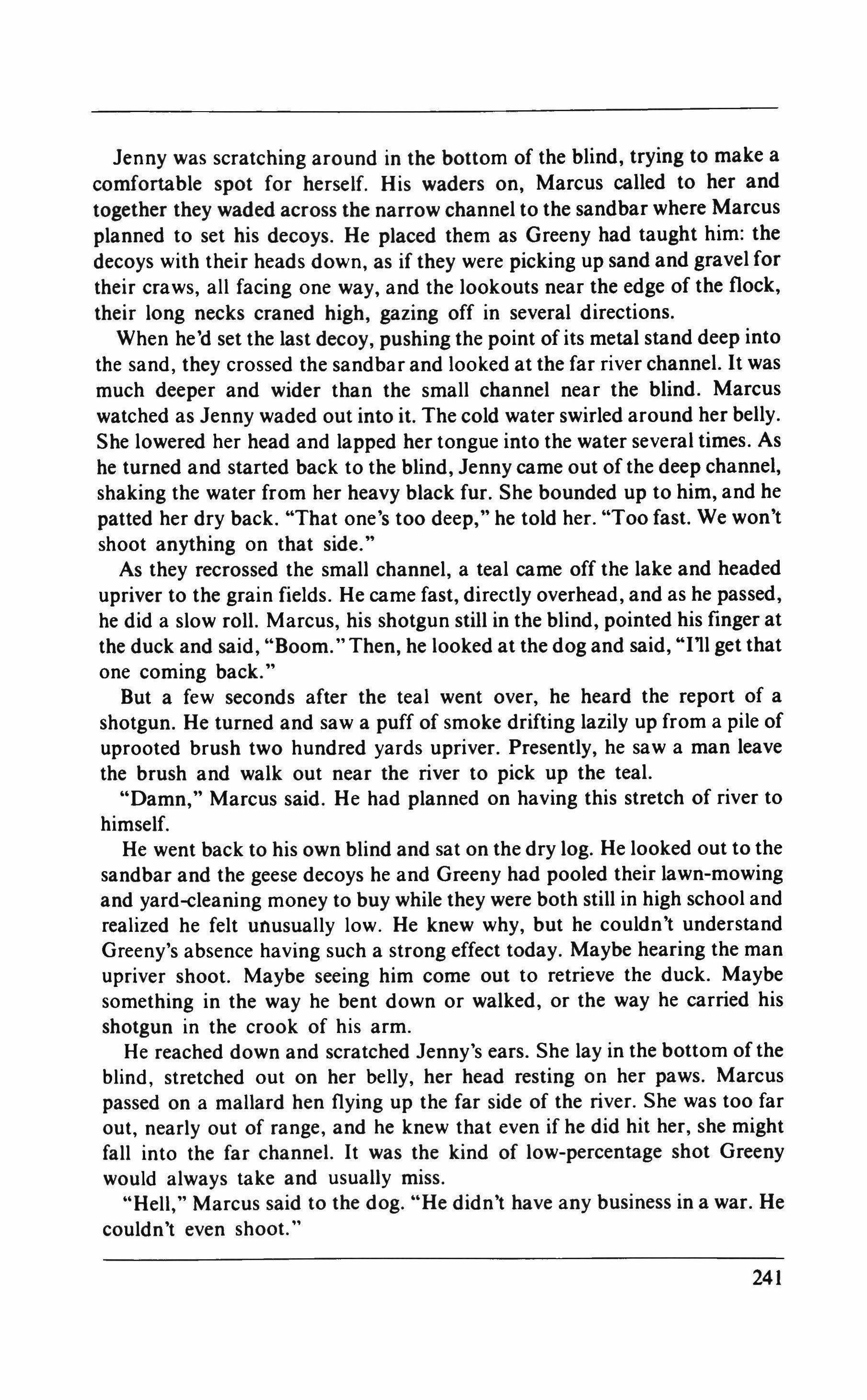
Jenny was scratching around in the bottom of the blind, trying to make a comfortable spot for herself. His waders on, Marcus called to her and together they waded across the narrow channel to the sandbar where Marcus planned to set his decoys. He placed them as Greeny had taught him: the decoys with their heads down, as if they were picking up sand and gravel for their craws, all facing one way, and the lookouts near the edge of the flock, their long necks craned high, gazing off in several directions.
When he'd set the last decoy, pushing the point of its metal stand deep into the sand, they crossed the sandbar and looked at the far river channel. It was much deeper and wider than the small channel near the blind. Marcus watched as Jenny waded out into it. The cold water swirled around her belly. She lowered her head and lapped her tongue into the water several times. As he turned and started back to the blind, Jenny came out of the deep channel, shaking the water from her heavy black fur. She bounded up to him, and he patted her dry back. "That one's too deep," he told her. "Too fast. We won't shoot anything on that side."
As they recrossed the small channel, a teal came off the lake and headed upriver to the grain fields. He came fast, directly overhead, and as he passed, he did a slow roll. Marcus, his shotgun still in the blind, pointed his finger at the duck and said, "Boom." Then, he looked at the dog and said, "111 get that one coming back."
But a few seconds after the teal went over, he heard the report of a shotgun. He turned and saw a puff of smoke drifting lazily up from a pile of uprooted brush two hundred yards upriver. Presently, he saw a man leave the brush and walk out near the river to pick up the teal.
"Damn," Marcus said. He had planned on having this stretch of river to himself.
He went back to his own blind and sat on the dry log. He looked out to the sandbar and the geese decoys he and Greeny had pooled their lawn-mowing and yard-cleaning money to buy while they were both still in high school and realized he felt unusually low. He knew why, but he couldn't understand Greeny's absence having such a strong effect today. Maybe hearing the man upriver shoot. Maybe seeing him come out to retrieve the duck. Maybe something in the way he bent down or walked, or the way he carried his shotgun in the crook of his arm.
He reached down and scratched Jenny's ears. She lay in the bottom of the blind, stretched out on her belly, her head resting on her paws. Marcus passed on a mallard hen flying up the far side of the river. She was too far out, nearly out of range, and he knew that even if he did hit her, she might fall into the far channel. It was the kind of low-percentage shot Greeny would always take and usually miss.
"Hell," Marcus said to the dog. "He didn't have any business in a war. He couldn't even shoot."
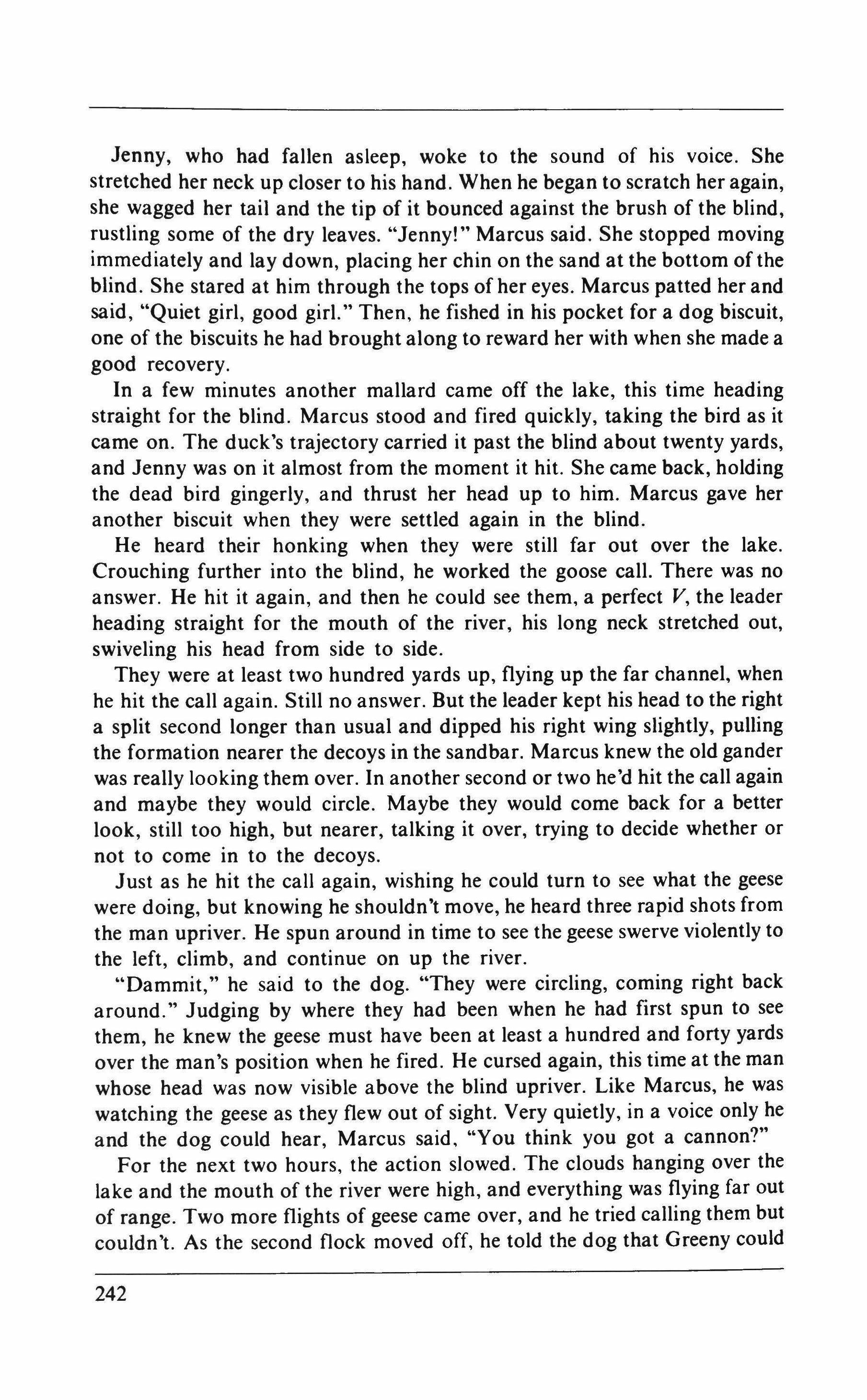
Jenny, who had fallen asleep, woke to the sound of his voice. She stretched her neck up closer to his hand. When he began to scratch her again, she wagged her tail and the tip of it bounced against the brush of the blind, rustling some of the dry leaves. "Jenny!" Marcus said. She stopped moving immediately and lay down, placing her chin on the sand at the bottom of the blind. She stared at him through the tops of her eyes. Marcus patted her and said, "Quiet girl, good girl." Then, he fished in his pocket for a dog biscuit, one of the biscuits he had brought along to reward her with when she made a good recovery.
In a few minutes another mallard came off the lake, this time heading straight for the blind. Marcus stood and fired quickly, taking the bird as it came on. The duck's trajectory carried it past the blind about twenty yards, and Jenny was on it almost from the moment it hit. She came back, holding the dead bird gingerly, and thrust her head up to him. Marcus gave her another biscuit when they were settled again in the blind.
He heard their honking when they were still far out over the lake. Crouching further into the blind, he worked the goose call. There was no answer. He hit it again, and then he could see them, a perfect V, the leader heading straight for the mouth of the river, his long neck stretched out, swiveling his head from side to side.
They were at least two hundred yards up, flying up the far channel, when he hit the call again. Still no answer. But the leader kept his head to the right a split second longer than usual and dipped his right wing slightly, pulling the formation nearer the decoys in the sandbar. Marcus knew the old gander was really looking them over. In another second or two he'd hit the call again and maybe they would circle. Maybe they would come back for a better look, still too high, but nearer, talking it over, trying to decide whether or not to come in to the decoys.
Just as he hit the call again, wishing he could turn to see what the geese were doing, but knowing he shouldn't move, he heard three rapid shots from the man upriver. He spun around in time to see the geese swerve violently to the left, climb, and continue on up the river.
"Darnmit," he said to the dog. "They were circling, coming right back around." Judging by where they had been when he had first spun to see them, he knew the geese must have been at least a hundred and forty yards over the man's position when he fired. He cursed again, this time at the man whose head was now visible above the blind upriver. Like Marcus, he was watching the geese as they flew out of sight. Very quietly, in a voice only he and the dog could hear, Marcus said, "You think you got a cannon?"
For the next two hours, the action slowed. The clouds hanging over the lake and the mouth of the river were high, and everything was flying far out of range. Two more flights of geese came over, and he tried calling them but couldn't. As the second flock moved off, he told the dog that Greeny could
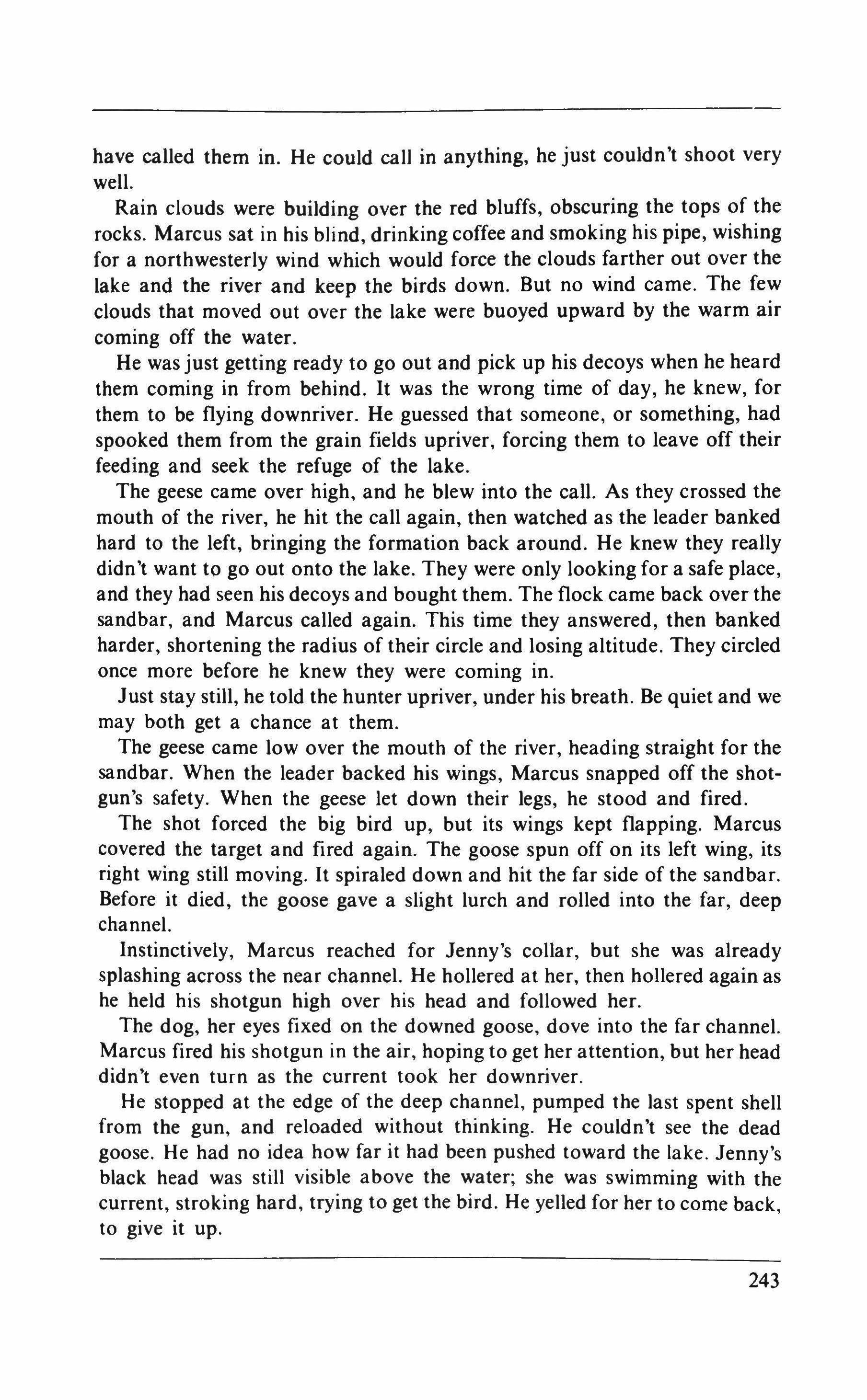
have called them in. He could call in anything, he just couldn't shoot very well.
Rain clouds were building over the red bluffs, obscuring the tops of the rocks. Marcus sat in his blind, drinking coffee and smoking his pipe, wishing for a northwesterly wind which would force the clouds farther out over the lake and the river and keep the birds down. But no wind came. The few clouds that moved out over the lake were buoyed upward by the warm air coming off the water.
He was just getting ready to go out and pick up his decoys when he heard them coming in from behind. It was the wrong time of day, he knew, for them to be flying downriver. He guessed that someone, or something, had spooked them from the grain fields upriver, forcing them to leave off their feeding and seek the refuge of the lake.
The geese came over high, and he blew into the call. As they crossed the mouth of the river, he hit the call again, then watched as the leader banked hard to the left, bringing the formation back around. He knew they really didn't want to go out onto the lake. They were only looking for a safe place, and they had seen his decoys and bought them. The flock came back over the sandbar, and Marcus called again. This time they answered, then banked harder, shortening the radius of their circle and losing altitude. They circled once more before he knew they were coming in.
Just stay still, he told the hunter upriver, under his breath. Be quiet and we may both get a chance at them.
The geese came low over the mouth of the river, heading straight for the sandbar. When the leader backed his wings, Marcus snapped off the shotgun's safety. When the geese let down their legs, he stood and fired.
The shot forced the big bird up, but its wings kept flapping. Marcus covered the target and fired again. The goose spun off on its left wing, its right wing still moving. It spiraled down and hit the far side of the sandbar. Before it died, the goose gave a slight lurch and rolled into the far, deep channel.
Instinctively, Marcus reached for Jenny's collar, but she was already splashing across the near channel. He hollered at her, then hollered again as he held his shotgun high over his head and followed her.
The dog, her eyes fixed on the downed goose, dove into the far channel. Marcus fired his shotgun in the air, hoping to get her attention, but her head didn't even turn as the current took her downriver.
He stopped at the edge of the deep channel, pumped the last spent shell from the gun, and reloaded without thinking. He couldn't see the dead goose. He had no idea how far it had been pushed toward the lake. Jenny's black head was still visible above the water; she was swimming with the current, stroking hard, trying to get the bird. He yelled for her to come back, to give it up.

When he lost sight of her, he ran back to the highest point of the sandbar. He hoped that if the river took her out into the lake, she would still have enough strength to reach the shore. He leaned his shotgun against one ofthe decoys, crossed the narrow channel, and ran down that bank, calling her name as loud as he could.
He had run two hundred yards downriver when he saw her again. She had given up on the goose and was swimming across the current now, struggling toward the last point of land before the river emptied into the lake. Marcus noted the steep banks on the upriver side of the far point. He knew that even if she reached the point, she wouldn't be able to climb out. "Go around," he yelled at her. He flung his hand through the air. "Go around, girl."
She reached the steep bank and made a pitiful lunge up against it. For a second, he could see the upper half of her black body, then she slid back into the river and went under. He ran into the river until it was waist high. The cold water came over his waders, spilling down into them, adding weight to his legs. He took two more steps and realized it was useless. He looked across to the far point and screamed. With his legs so heavy, he had to struggle himself to regain the shore.
For a few seconds after he'd pulled off his waders and emptied them of water, Marcus stood on the sandy river bank and watched the far point where he'd last seen Jenny. He paced the bank and shivered and said her name softly. Twice more, without fully realizing what he was doing, he stumbled back into the river, cursing it, not realizing until the swift current almost took him away, how useless it was to try crossing. Maybe, he thought as he came out of the river the third time, maybe she went around. Maybe she made the lower side of the point.
He was watching the opposite bank so intently that he didn't see the black, bobbing head until she was already halfway across. She was angling upriver, fighting against the current. Her strokes were short and choppy, and when he first saw her, he could see the fear in her eyes. She was heading straight for him. Again, he waded into the river, thinking better now, trying to figure just how much the current would drive her off course. He walked parallel to the shore, knowing that if she made it, she would end up slightly downriver from the angle she was taking. Her hard, fast strokes slowed. She looked several times like she was giving up. He called to her and went further out toward her, stopping when the water was halfway up his chest. Planting his feet in the muddy bottom, he pushed as hard as he could against the current. With each stroke, the dog seemed to be making less headway against the fast-moving water. It seemed like she wasn't moving at all, but she came nearer. He took another small step into the river.
The whites of the dog's eyes were completely red. Marcus almost lost his
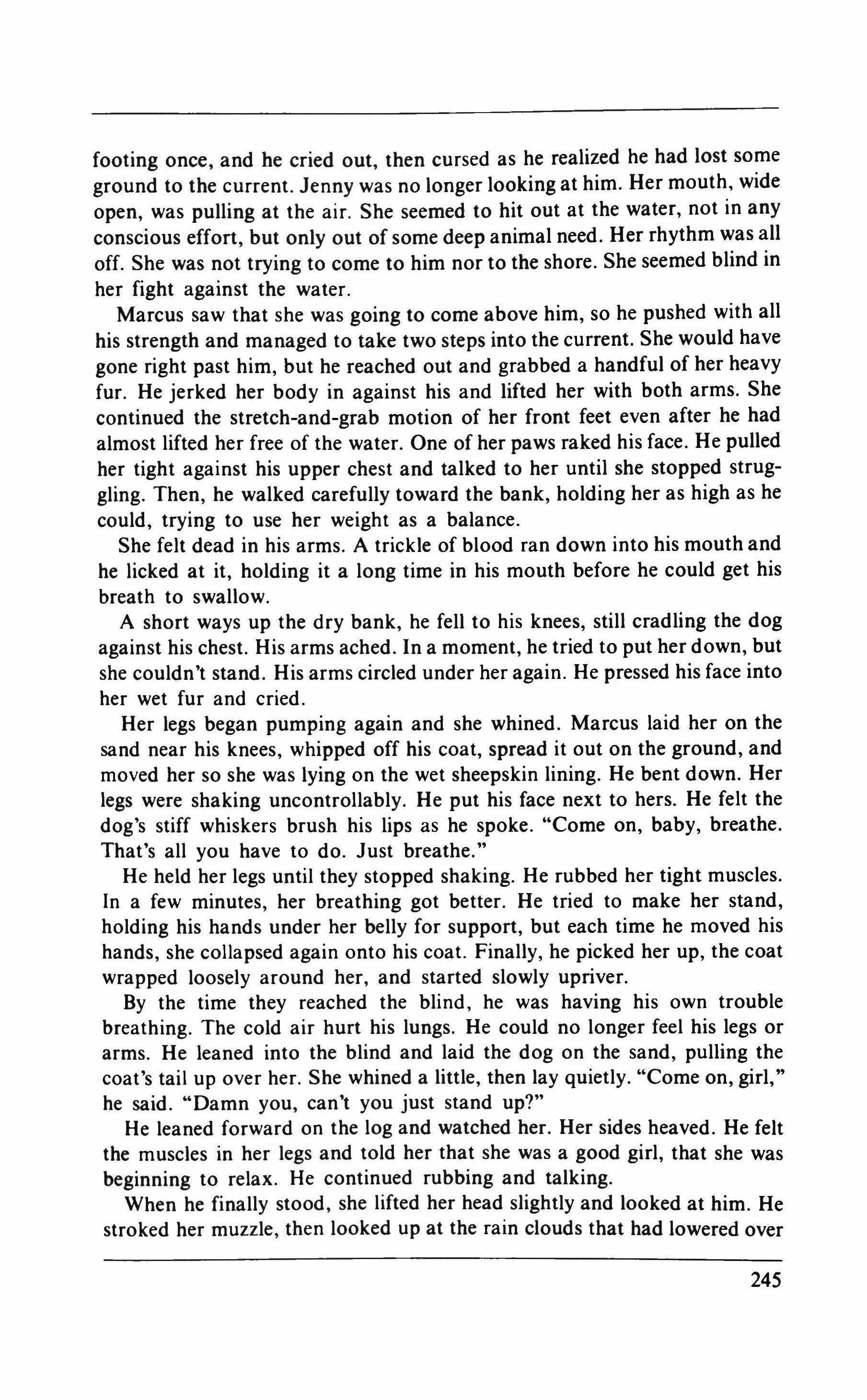
footing once, and he cried out, then cursed as he realized he had lost some ground to the current. Jenny was no longer looking at him. Her mouth, wide open, was pulling at the air. She seemed to hit out at the water, not in any conscious effort, but only out of some deep animal need. Her rhythm was all off. She was not trying to come to him nor to the shore. She seemed blind in her fight against the water.
Marcus saw that she was going to come above him, so he pushed with all his strength and managed to take two steps into the current. She would have gone right past him, but he reached out and grabbed a handful of her heavy fur. He jerked her body in against his and lifted her with both arms. She continued the stretch-and-grab motion of her front feet even after he had almost lifted her free of the water. One of her paws raked his face. He pulled her tight against his upper chest and talked to her until she stopped struggling. Then, he walked carefully toward the bank, holding her as high as he could, trying to use her weight as a balance.
She felt dead in his arms. A trickle of blood ran down into his mouth and he licked at it, holding it a long time in his mouth before he could get his breath to swallow.
A short ways up the dry bank, he fell to his knees, still cradling the dog against his chest. His arms ached. In a moment, he tried to put her down, but she couldn't stand. His arms circled under her again. He pressed his face into her wet fur and cried.
Her legs began pumping again and she whined. Marcus laid her on the sand near his knees, whipped off his coat, spread it out on the ground, and moved her so she was lying on the wet sheepskin lining. He bent down. Her legs were shaking uncontrollably. He put his face next to hers. He felt the dog's stiff whiskers brush his lips as he spoke. "Come on, baby, breathe. That's all you have to do. Just breathe."
He held her legs until they stopped shaking. He rubbed her tight muscles. In a few minutes, her breathing got better. He tried to make her stand, holding his hands under her belly for support, but each time he moved his hands, she collapsed again onto his coat. Finally, he picked her up, the coat wrapped loosely around her, and started slowly upriver. By the time they reached the blind, he was having his own trouble breathing. The cold air hurt his lungs. He could no longer feel his legs or arms. He leaned into the blind and laid the dog on the sand, pulling the coat's tail up over her. She whined a little, then lay quietly. "Come on, girl," he said. "Damn you, can't you just stand up?"
He leaned forward on the log and watched her. Her sides heaved. He felt the muscles in her legs and told her that she was a good girl, that she was beginning to relax. He continued rubbing and talking. When he finally stood, she lifted her head slightly and looked at him. He stroked her muzzle, then looked up at the rain clouds that had lowered over
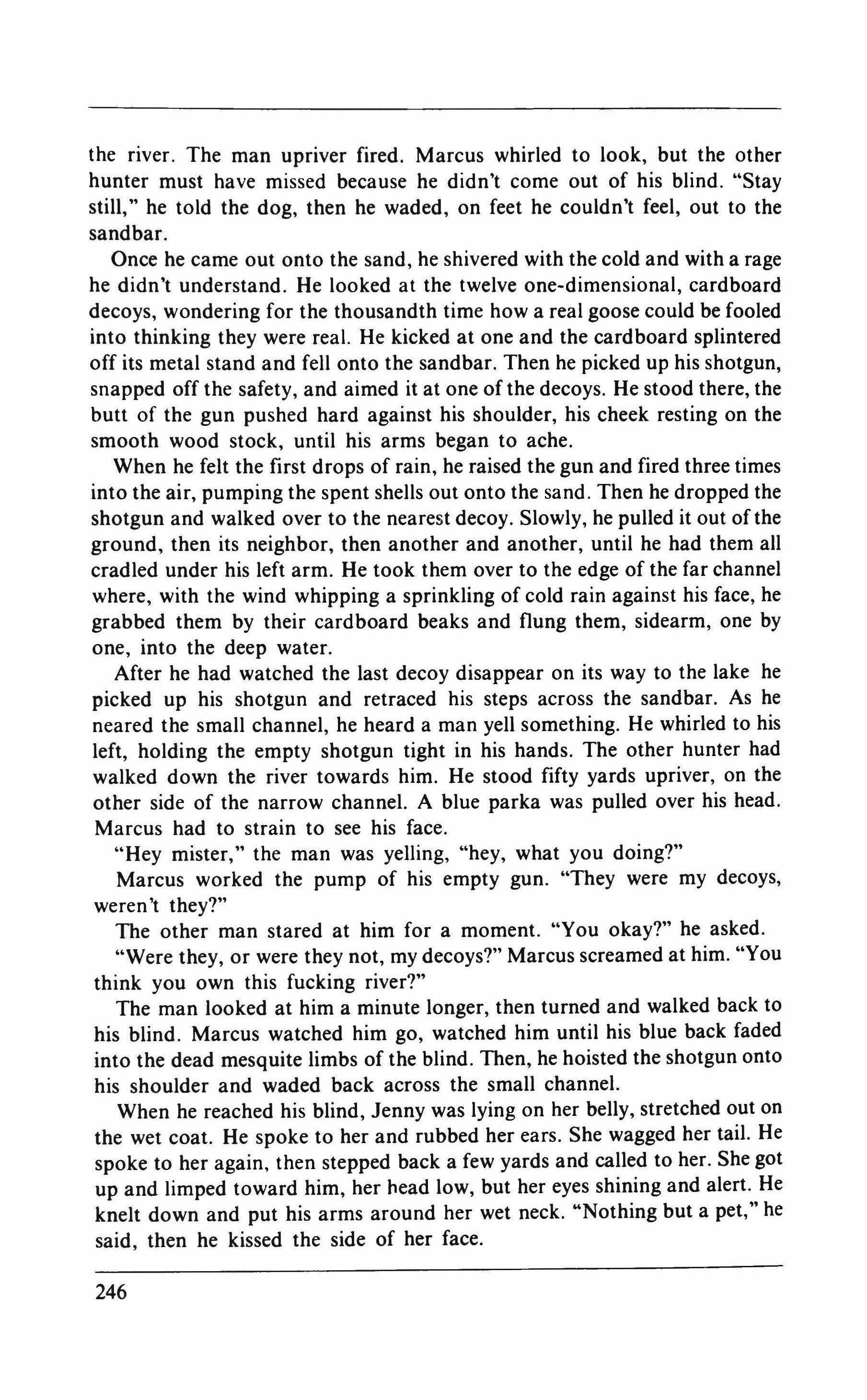
the river. The man upriver fired. Marcus whirled to look, but the other hunter must have missed because he didn't come out of his blind. "Stay still," he told the dog, then he waded, on feet he couldn't feel, out to the sandbar.
Once he came out onto the sand, he shivered with the cold and with a rage he didn't understand. He looked at the twelve one-dimensional, cardboard decoys, wondering for the thousandth time how a real goose could be fooled into thinking they were real. He kicked at one and the cardboard splintered off its metal stand and fell onto the sandbar. Then he picked up his shotgun, snapped off the safety, and aimed it at one ofthe decoys. He stood there, the butt of the gun pushed hard against his shoulder, his cheek resting on the smooth wood stock, until his arms began to ache.
When he felt the first drops of rain, he raised the gun and fired three times into the air, pumping the spent shells out onto the sand. Then he dropped the shotgun and walked over to the nearest decoy. Slowly, he pulled it out ofthe ground, then its neighbor, then another and another, until he had them all cradled under his left arm. He took them over to the edge of the far channel where, with the wind Whipping a sprinkling of cold rain against his face, he grabbed them by their cardboard beaks and flung them, sidearm, one by one, into the deep water.
After he had watched the last decoy disappear on its way to the lake he picked up his shotgun and retraced his steps across the sandbar. As he neared the small channel, he heard a man yell something. He whirled to his left, holding the empty shotgun tight in his hands. The other hunter had walked down the river towards him. He stood fifty yards upriver, on the other side of the narrow channel. A blue parka was pulled over his head. Marcus had to strain to see his face.
"Hey mister," the man was yelling, "hey, what you doing?"
Marcus worked the pump of his empty gun. "They were my decoys, weren't they?"
The other man stared at him for a moment. "You okay?" he asked.
"Were they, or were they not, my decoys?" Marcus screamed at him. "You think you own this fucking river?"
The man looked at him a minute longer, then turned and walked back to his blind. Marcus watched him go, watched him until his blue back faded into the dead mesquite limbs of the blind. Then, he hoisted the shotgun onto his shoulder and waded back across the small channel.
When he reached his blind, Jenny was lying on her belly, stretched out on the wet coat. He spoke to her and rubbed her ears. She wagged her tail. He spoke to her again, then stepped back a few yards and called to her. She got up and limped toward him, her head low, but her eyes shining and alert. He knelt down and put his arms around her wet neck. "Nothing but a pet," he said, then he kissed the side of her face.
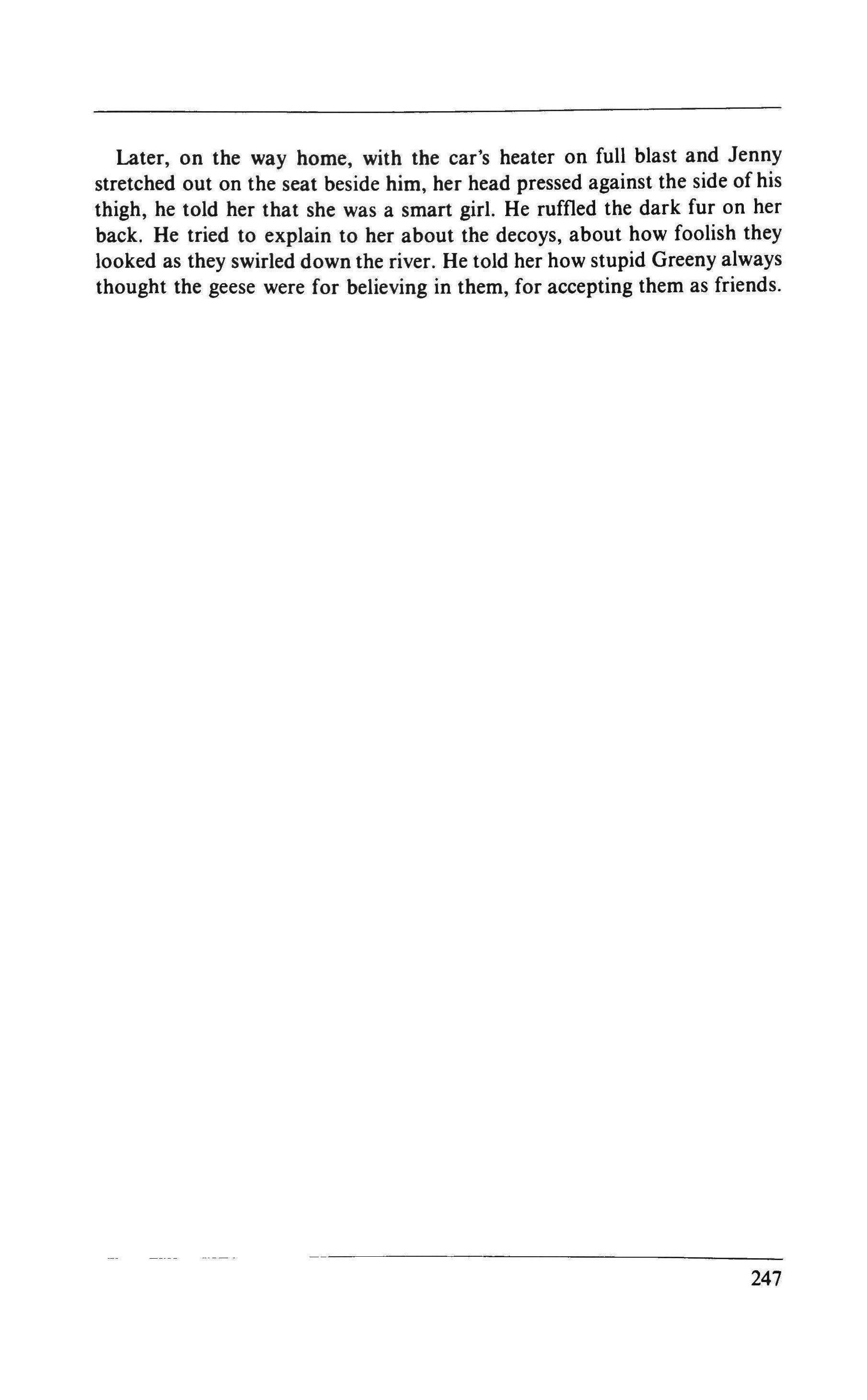
Later, on the way home, with the car's heater on full blast and Jenny stretched out on the seat beside him, her head pressed against the side of his thigh, he told her that she was a smart girl. He ruffled the dark fur on her back. He tried to explain to her about the decoys, about how foolish they looked as they swirled down the river. He told her how stupid Greeny always thought the geese were for believing in them, for accepting them as friends.
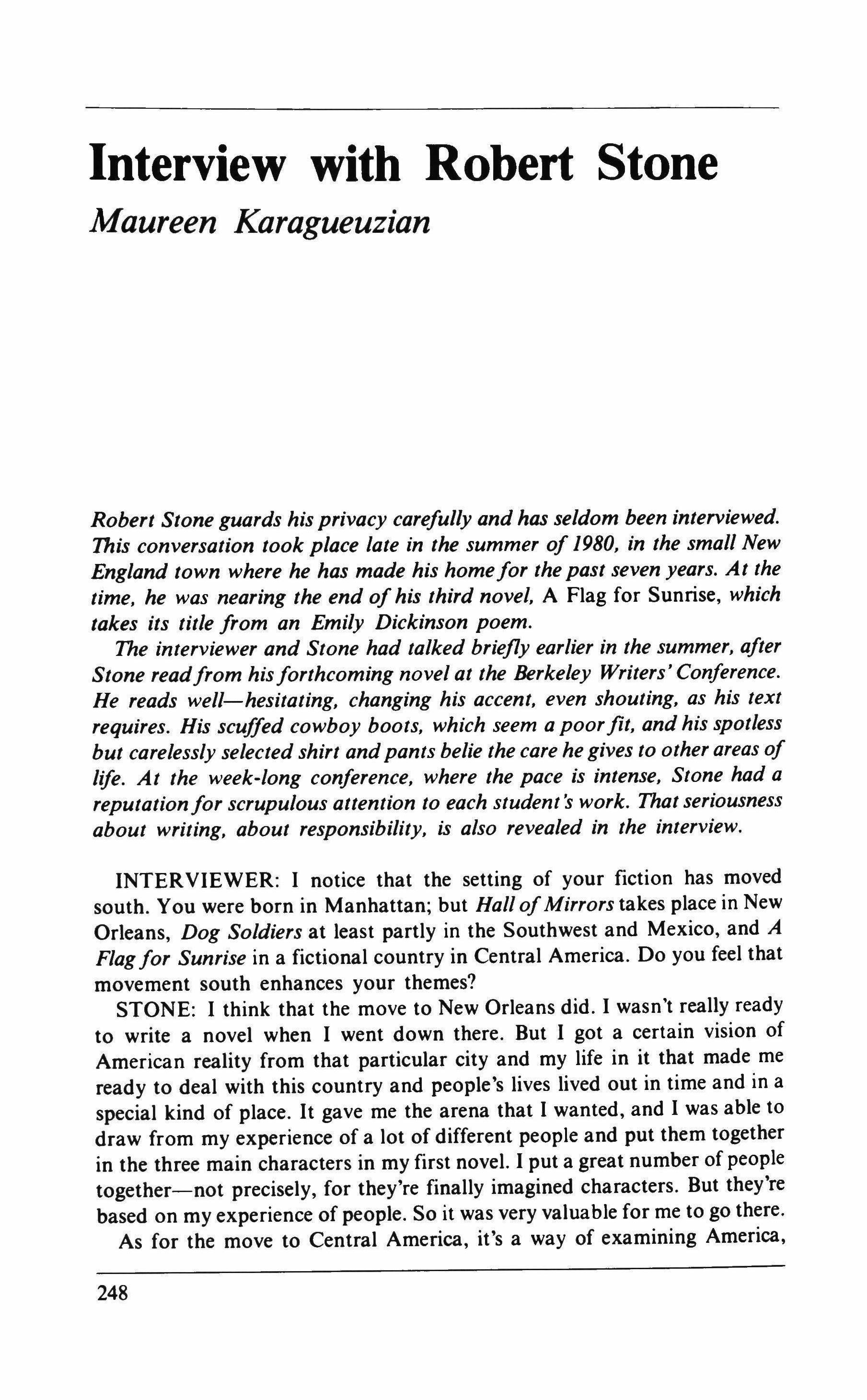
Robert Stone guards hisprivacy carefully and has seldom been interviewed. This conversation took place late in the summer of /980, in the small New England town where he has made his homefor thepast seven years. At the time, he was nearing the end of his third novel, A Flag for Sunrise, which takes its title from an Emily Dickinson poem. The interviewer and Stone had talked briefly earlier in the summer, after Stone readfrom hisforthcoming novel at the Berkeley Writers' Conference. He reads well-hesitating, changing his accent, even shouting, as his text requires. His scuffed cowboy boots, which seem a poorfit, and his spotless but carelessly selected shirt andpants belie the care he gives to other areas of life. At the week-long conference, where the pace is intense, Stone had a reputationfor scrupulous attention to each student s work. That seriousness about writing, about responsibility, is also revealed in the interview.
INTERVIEWER: I notice that the setting of your fiction has moved south. You were born in Manhattan; but Hall ofMirrors takes place in New Orleans, Dog Soldiers at least partly in the Southwest and Mexico, and A Flagfor Sunrise in a fictional country in Central America. Do you feel that movement south enhances your themes?
STONE: I think that the move to New Orleans did. I wasn't really ready to write a novel when I went down there. But I got a certain vision of American reality from that particular city and my life in it that made me ready to deal with this country and people's lives lived out in time and in a special kind of place. It gave me the arena that I wanted, and I was able to draw from my experience of a lot of different people and put them together in the three main characters in my first novel. I put a great number of people together-not precisely, for they're finally imagined characters. But they're based on my experience of people. So it was very valuable for me to go there. As for the move to Central America, it's a way of examining America,
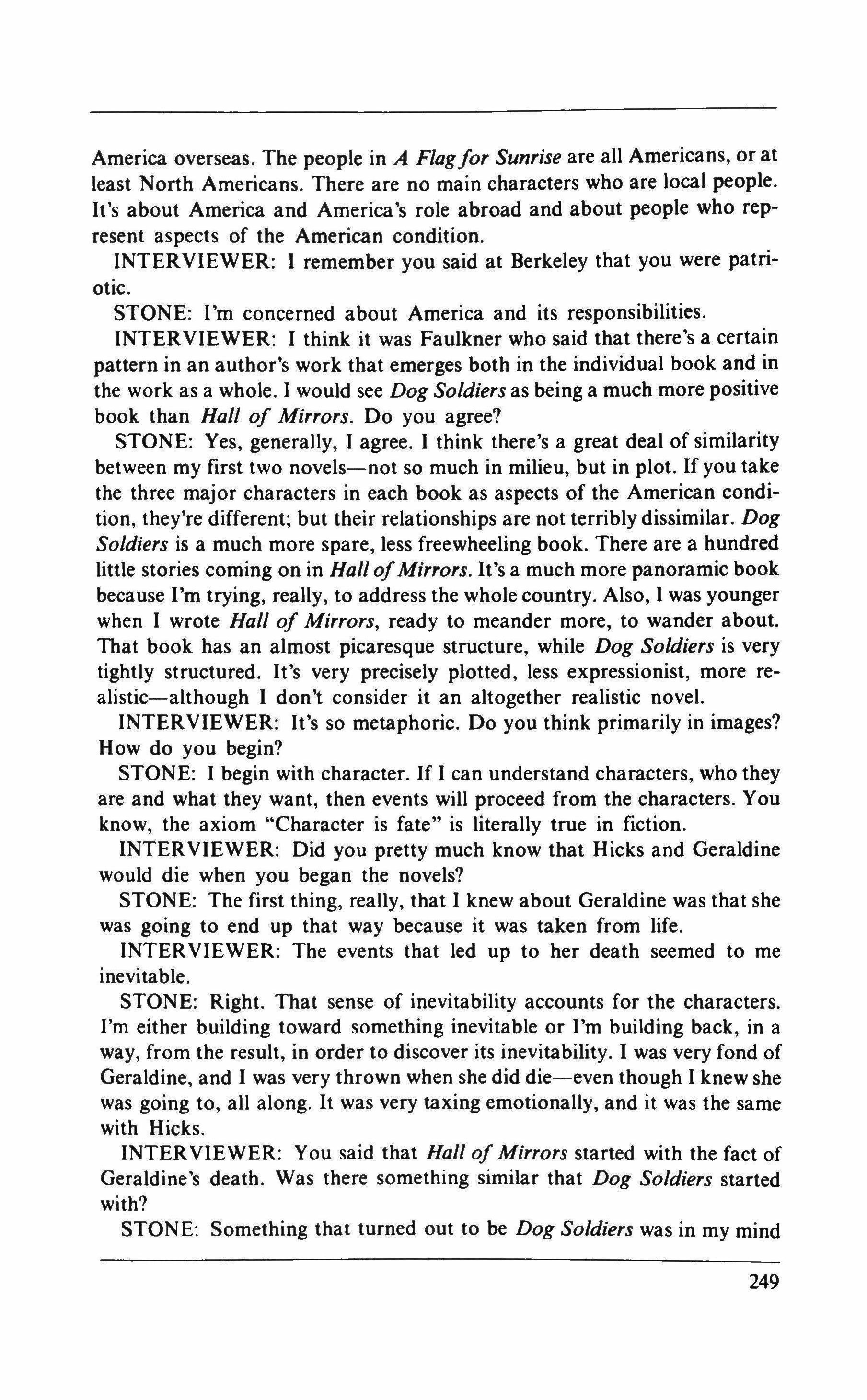
America overseas. The people in A Flagfor Sunrise are all Americans, or at least North Americans. There are no main characters who are local people. It's about America and America's role abroad and about people who represent aspects of the American condition.
INTERVIEWER: I remember you said at Berkeley that you were patriotic.
STONE: I'm concerned about America and its responsibilities.
INTERVIEWER: I think it was Faulkner who said that there's a certain pattern in an author's work that emerges both in the individual book and in the work as a whole. I would see Dog Soldiers as being a much more positive book than Hall of Mirrors. Do you agree?
STONE: Yes, generally, I agree. I think there's a great deal of similarity between my first two novels-not so much in milieu, but in plot. If you take the three major characters in each book as aspects of the American condition, they're different; but their relationships are not terribly dissimilar. Dog Soldiers is a much more spare, less freewheeling book. There are a hundred little stories coming on in Hall ofMirrors. It's a much more panoramic book because I'm trying, really, to address the whole country. Also, I was younger when I wrote Hall of Mirrors, ready to meander more, to wander about. That book has an almost picaresque structure, while Dog Soldiers is very tightly structured. It's very precisely plotted, less expressionist, more realistic-although I don't consider it an altogether realistic novel.
INTERVIEWER: It's so metaphoric. Do you think primarily in images? How do you begin?
STONE: I begin with character. If I can understand characters, who they are and what they want, then events will proceed from the characters. You know, the axiom "Character is fate" is literally true in fiction.
INTERVIEWER: Did you pretty much know that Hicks and Geraldine would die when you began the novels?
STONE: The first thing, really, that I knew about Geraldine was that she was going to end up that way because it was taken from life.
INTERVIEWER: The events that led up to her death seemed to me inevitable.
STONE: Right. That sense of inevitability accounts for the characters. I'm either building toward something inevitable or I'm building back, in a way, from the result, in order to discover its inevitability. I was very fond of Geraldine, and I was very thrown when she did die-even though I knew she was going to, all along. It was very taxing emotionally, and it was the same with Hicks.
INTERVIEWER: You said that Hall of Mirrors started with the fact of Geraldine's death. Was there something similar that Dog Soldiers started with?
STONE: Something that turned out to be Dog Soldiers was in my mind

before I went to Vietnam. I was in England at the time. Of course, being in Vietnam brought it all together, and I got a clearer picture of what I wanted to do. Before I went to Vietnam, I had the idea of somebody in possession of something that represented ultimate need. The Vietnam War was an event of such widespread consequence that it was very much on my mind, along with the idea of possessing something, of a person's putting himself in the position of possessing this thing in a kind of feckless moment and having to bear the consequences. When I went to Vietnam and, as it were, saw the war, things became clear to me as a result of what I saw.
INTERVIEWER: Would you say that A Flagfor Sunrise is moving in an even more positive direction than Dog Soldiers?
STONE: I don't think so. It's about something different. I think that Marge and Converse, even in their extreme condition, have an insight. They have learned something. They do come out at the other end of all that having-at least it's imminent-a kind of realization. They have made a series of discoveries, they are seeing more clearly, and the chance for them to bring that insight to bear is definitely there. The insight presents itself in a kind of an odd and reversed way when Converse says, "In spite of everything, there's something." It's deliberately made inarticulate and kind of nonsensical, but that's what the positive dimension is.
INTERVIEWER: Marge doesn't know what he means?
STONE: He says, "There's us," by which he means not just the two of them. But she dismisses that. Nevertheless, he has it; and he mayor may not do something with it. A Flagfor Sunrise is more about the problem of living in a kind of meaningful, moral way in a world which is apparently godless.
INTERVIEWER: The "War Stories" section and the section on Father Egan have been published. Who's the central character?
STONE: Holliwell is a main character. Egan is fairly important, but he's not quite one of the principals.
INTERVIEWER: Sections from your previous novels also came out prior to publication. Does that give you a sense of how your current work is going? Is that your working pattern-to complete a section of a novel and send it out?
STONE: I work section by section, and I usually have the sections fairly complete without the necessity of a lot of rewriting. But I don't usually send them out unless somebody asks me. I want to see a section complete for myself, although I may work on it a bit for purposes of publication. If I round it out a little to make it an excerptible piece, then it will have its own existence. But I don't necessarily put it into the book the way it appears in the magazine. I feel quite free to change it.
INTERVIEWER: What about "Porque No Tiene, Porque Le Falta," that wonderful short story in the 1970 Martha Foley collection-was it originally conceived as part of Dog Soldiers? 250

STONE: Or Aquarius Obscured. But it's an independent short story that's been published.
INTERVIEWER: How do you feel about the short story form versus the novel?
STONE: I think a short story is very, very difficult to write. In a way, it's harder than a novel. A novel takes years and a story takes weeks or months, at the most. But I think writing a successful short story is very difficult. Stories built out of anecdotes-and usually they are-don't occur to me very often. I like larger pictures and the convolutions and ironies of event-not what the short story is built on. I think the short story is something like a joke; at least it has the structure of a joke-or any sort of anecdote. The curve of its dynamic breaks, just like a pitch. And when it finishes, it has illustrated something. All short stories are the same. It's always: this is how it is. That's the unspoken. And to do that successfully, to make a statement in a relatively short space about how things are is very difficult; and the people who do it well have a great gift.
INTERVIEWER: Is the writing process pleasurable for you?
STONE: It is sometimes, but a lot of times it's simply hard work. The writing process itself is slightly less pleasurable than the process that goes into dreaming. it up. That's the nice part.
INTERVIEWER: Do you keep a notebook?
STONE: I do. I don't keep it very religiously, but I write things down. And then the notebook gets mislaid, and so forth.
INTERVIEWER: Do you write in longhand or at a typewriter?
STONE: I write at a typewriter. Sometimes 111 stop, though, and write something out in longhand if I really want to get it straight, if I think that it calls for very careful analysis so that I don't get it wrong. If I want to think it out very clearly, then 111 slow myself down to write it out in longhanddescription sometimes and sometimes an attitude or a thought, a revelation of some kind that introduces itself into a character's consciousness. 111 do that in longhand because I want to get it right.
INTERVIEWER: You said you don't do much rewriting?
STONE: Generally I write every chapter twice, and then I leave it until I go over the whole thing. I take two chapters a day when I start rewriting. I read the whole thing first and make notes, and then 111 take it chapter by chapter, two a day for a couple of weeks, until I've gone through the whole book.
INTERVIEWER: Do you write the chapters in order?
STONE: I try to go sequentially, but sometimes-if I have a breakthrough in one direction-111 follow through. I know what goes behind it. I have a kind of map written down.
INTERVIEWER: An outline?
STONE: Yes, chapter by chapter. I eventually make an outline about a

quarter to halfway in. Then 111 see what I've got in front of me because I want to balance it. I usually have simultaneous stories going, people over here and people over here, so I want to balance those episodes. And for that I have to make some kind of outline. I don't really make charts, brochures or portfolios on characters, the way some writers do. But I do make a little written outline.
INTERVIEWER: What is the most difficult part of writing for you?
STONE: Getting myself to do it. If I can't write, then 111 pick up something and start reading. But I have to get myself into the space-whether I feel like it or not, I mean. I think the hard thing is just getting yourselfgoing when you don't feel like it, when you'd rather be doing something else, when it's a nice day and you'd rather be doing something outside. But it just doesn't finish itself. Plenty of people can think very moving and inspiring thoughts, but that's not the same as writing. No one can do it for you.
INTERVIEWER: Do you work regular hours? Do you have a certain pattern to get going?
STONE: It's always hard for me to get going. I always start early in the morning, and I go on as long as I can. Since the Berkeley Writers' Conference, I've been working almost every day. I've taken a few days off, but I haven't done anything like taking a week at the beach. I'm reaching the conclusion and I've been anxious to finish, so I've taken very little time off.
INTERVIEWER: You don't have to be in certain emotional state in order to write?
STONE: I just don't feel I can afford to wait for the right emotional state. I think I feel guilty about how little I've produced. I don't know why I've produced so relatively little. I feel like I work all the time.
INTERVIEWER: It must have taken a great deal of time to keep Dog Soldiers so precise.
STONE: I think so. And with my first novel, I didn't know a lot about control.
INTERVIEWER: You've traveled in Central America, where your new novel takes place?
STONE: By chance. I had done a reading at the University of Alabama, and I had $1,000 to play with. Since I was already in Tuscaloosa, I went to the Bay Islands, off Honduras. I started wandering around, riding on busses, traveling; and I ran into some people I knew who lived in Managua. So I caught a ride with them and stayed with them in Managua for a while. Then I went down the coast to Costa Rica. I went back to Central America later, researching, as it were.
INTERVIEWER: You think that kind of thing is necessary in order to write?
STONE: It's necessary in certain circumstances. I don't write documentary novels, but I certainly want to have a sense of place. I have to know
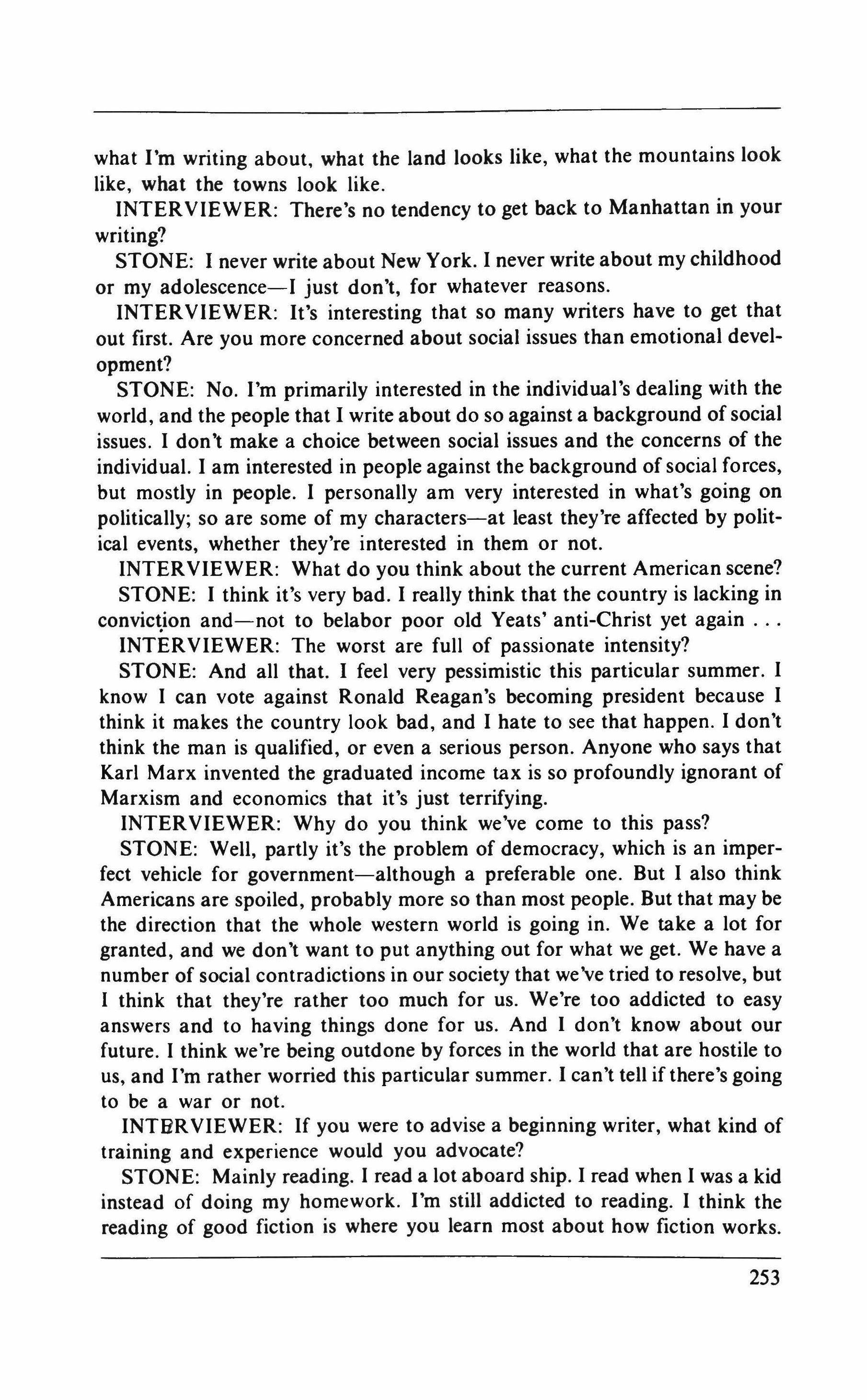
what I'm writing about, what the land looks like, what the mountains look like, what the towns look like.
INTERVIEWER: There's no tendency to get back to Manhattan in your writing?
STONE: I never write about New York. I never write about my childhood or my adolescence-I just don't, for whatever reasons.
INTERVIEWER: It's interesting that so many writers have to get that out first. Are you more concerned about social issues than emotional development?
STONE: No. I'm primarily interested in the individual's dealing with the world, and the people that I write about do so against a background of social issues. I don't make a choice between social issues and the concerns of the individual. I am interested in people against the background of social forces, but mostly in people. I personally am very interested in what's going on politically; so are some of my characters-at least they're affected by political events, whether they're interested in them or not.
INTERVIEWER: What do you think about the current American scene?
STONE: I think it's very bad. I really think that the country is lacking in conviction and-not to belabor poor old Yeats' anti-Christ yet again
INTERVIEWER: The worst are full of passionate intensity?
STONE: And all that. I feel very pessimistic this particular summer. I know I can vote against Ronald Reagan's becoming president because I think it makes the country look bad, and I hate to see that happen. I don't think the man is qualified, or even a serious person. Anyone who says that Karl Marx invented the graduated income tax is so profoundly ignorant of Marxism and economics that it's just terrifying.
INTERVIEWER: Why do you think we've come to this pass?
STONE: Well, partly it's the problem of democracy, which is an imperfect vehicle for government-although a preferable one. But I also think Americans are spoiled, probably more so than most people. But that may be the direction that the whole western world is going in. We take a lot for granted, and we don't want to put anything out for what we get. We have a number of social contradictions in our society that we've tried to resolve, but I think that they're rather too much for us. We're too addicted to easy answers and to having things done for us. And I don't know about our future. I think we're being outdone by forces in the world that are hostile to us, and I'm rather worried this particular summer. I can't tell if there's going to be a war or not.
INTItRVIEWER: If you were to advise a beginning writer, what kind of training and experience would you advocate?
STONE: Mainly reading. I read a lot aboard ship. I read when I was a kid instead of doing my homework. I'm still addicted to reading. I think the reading of good fiction is where you learn most about how fiction works.

There's no kind of life that is of more advantage to a writer than another. Allen Ginsberg might go off to Peru or India, or San Francisco when he was younger, but Wallace Stevens went to Hartford Accident and Indemnity. I don't think there is one kind of life, but I think you obviously have got to have the sort of make-up that makes you listen. In addition to reading, you have to listen. The more kinds of people you know, the more kinds of voices you hear, the better off you are because you have those voices echoing in your head.
INTERVIEWER: At Berkeley, you said you were well-acquainted with institutions, that you were brought up in institutions. In what sense?
STONE: I was in a school, more an orphanage, from the time I was six to the time I was about nine; and I was in and out, depending on my mother's circumstances at the time. And I was in the Navy, which itself is a kind of institution. That's what I meant.
INTERVIEWER: You went to parochial schools?
STONE: Yes. The place I was at was Catholic, run by the Marist Brothers.
INTERVIEWER: Were they strict?
STONE: They were strict in the sense that they hit you. As those orders were in the forties and fifties, they were strict and they were a bit physical.
INTERVIEWER: Can you credit them with giving you an eye for imagery, for allegory?
STONE: I credit them with teaching me to spell and for teaching me grammar, which they did quite efficiently. They certainly gave me a grounding in language that was sufficient to carry me farther. It was practical, down-to-earth, and basic-and in its way, good.
INTERVIEWER: What about the religion?
STONE: The religion I certainly absorbed. I don't know if I absorbed it so much from them as I took what I chose. I don't know if going to that school enhanced my religious convictions, but my religious convictions were pretty strong.
INTERVIEWER: Did you get them from your mother?
STONE: No, my mother wasn't Christian. It may have had something to do with religious instruction. I certainly took it for granted. First I resisted, then I was kind of won over by it, then I became enthusiastic, and then I turned around.
INTERVIEWER: You liked the ritual?
STONE: I liked all that. I also believed in it. There's a lot in my make-up, in my conditioning, that's the result of being brought up Catholic. Quite a lot, I think.
INTERVIEWER: One reviewer has said that you're like one of the great nineteenth-century moralists.
STONE: I wonder what nineteenth-century moralist the reviewer had in

mind. Dickens, Twain I do write about what people do and what they ought to do or what I think they ought to do. And I really believe people are responsible for what they do. That's why my principal characters sometimes do unsympathetic things and maybe why my books don't sell terribly well. I have people do things that they accept responsibility for.
INTERVIEWER: How do you envision your audience?
STONE: I envision my audience as people who in sensibility are somehow like me. I think the imaginary reader, every writer's imaginary reader, is someone who is either similar in sensibility or who has the openness to accept the expression of another's sensibility. That's who my readers are. I'm fond of my readers. My readers feel strongly about my work, and I feel strongly about them. I mean, they're who I'm writing for. Because I'm not an immensely popular writer with a real mass audience, I feel that my readers are a relatively small band, and that makes me feel all the more chummy toward them.
INTERVIEWER: I think it also means your work will last longer.
STONE: I'd like it to. My first book is out of print, which I'm unhappy about-especially with the current scene, the political, evangelical groups.* Although the political events, in a way, are dated, they were rather prophetic, if I may say so.
INTERVIEWER: Do you reread your own work?
STONE: From time to time. I always think: How did I do this? I'll never be able to do it again. I reread Hall of Mirrors when I was writing Dog Soldiers. I always get into a kind of despair about the book I'm writing. Sometimes I think it's the best thing I've ever done and sometimes I think it's not.
INTERVIEWER: You know, for Norman Mailer Hemingway is still the champ. What do you think about Hemingway?
STONE: I think Hemingway was a very, very good technician. He learned a lot about how dialogue works and, simply, how to write. I think he was a very gifted and wonderful technician, the kind of master you can learn from. I think he made what have come to be technical discoveries about how to utilize the difference between the way people actually speak and dialogue that reads like people speaking, which isn't the same thing. I have learned from Hemingway, from that kind of almost Latinate spareness of his. But, on the level of ideas, I think he was very trivial. I see Hemingway as really not a very wise or insightful man. His work is a bit adolescent, a bit impoverished spiritually. I mean, he never came close to writing something like The Great Gatsby, That's a damn near perfect novel. There's a great deal of wisdom in that book about the American condition. It's short. It's very
·Since this interview, Houghton Mifflin has reissued Stone's first book, A Hall ofMirrors, in a paperback edition.

rich. It has a character who is elusive and mysterious and, at the same time, perfectly understood. It's a great book. I first read it when I was a boy and didn't really understand it, and then I read it later just before I began Hall of Mirrors. That's what made me want to write a novel, reading Gatsby.
INTERVIEWER: Hemingway said he couldn't combine writing and teaching but that he admired those who could. You have no problems with that life?
STONE: I think it's easier to do that, although I don't teach regularly. I usually do it when I'm asked, but I've never looked for a teaching job. In some ways, I think teaching's good. It gives a certain structure to your week if you have to teach a couple of times, and it also discharges a lot of social energy. Writing is a very solemn and lonely business, and to be able to talk about writing isn't necessarily a bad thing. Especially if you're teaching writing, responding to student writing, you don't have a great deal of preparation. You have to read the pieces and think about them, but it isn't really very hard work. Something like a writers' conference is really very wearing because of its intensity, but teaching a course is different. And I like talking about writing.
INTERVIEWER: You don't find the academic world an impediment to writing?
STONE: Since I didn't go to college, since-in fact-I didn't really finish high school, I haven't had time to get very irritated at the academic world. I went into the Navy at seventeen, and I got an equivalency diploma.
INTERVIEWER: You said you like talking about writing. Do you like to associate with other writers?
STONE: It's interesting to talk to other writers, and I do know quite a number of writers. But American writers are very prone not to talk about writing. American writers like to talk about bear hunting and scuba diving and trout fishing and things like that rather than literature.
INTERVIEWER: Do you read a lot when you're writing?
STONE: I read almost anything that comes in front of me. I read all the time. That's what I'm doing if I'm not out-of-doors. I was reading about Scott Fitzgerald in Hollywood fairly recently and some of his Pat Hobby stories. I read a lot of history. I have always read a lot about the Renaissance and the Reformation periods. I read a biography of Giordano Bruno by Frances Yates fairly recently, also a book about Renaissance mysticism and symbolism. I tend to read the same poets. I read Wallace Stevens and I read Yeats, and I have those books around. I also read the Bible. I usually have a Bible on my desk, Shakespeare handy.
INTERVIEWER: When did you realize that you were going to become a writer?
STONE: I started, I think, with some kind of narrative compulsion when I was a child. I wanted to make a story out of what I was doing and what
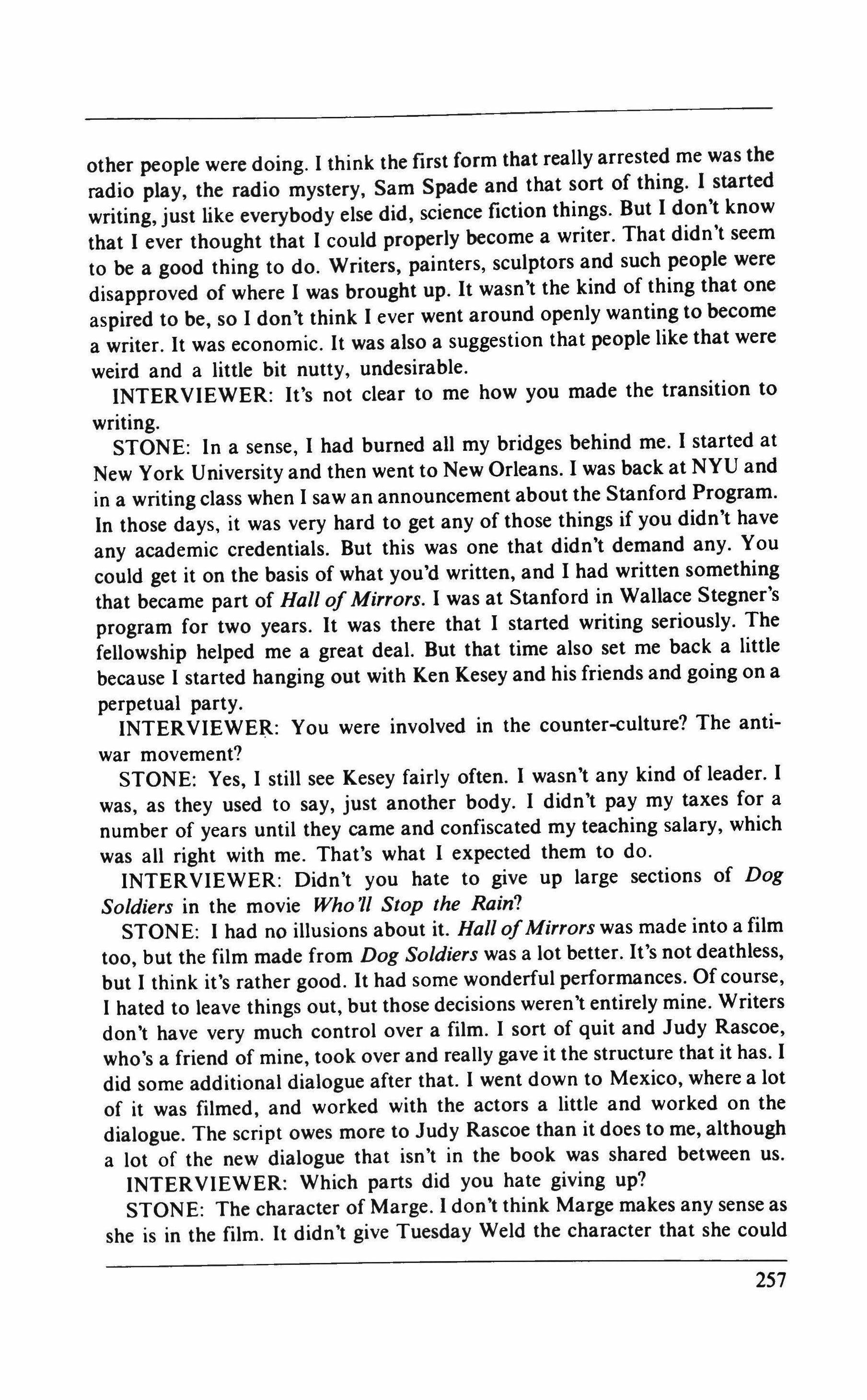
other people were doing. I think the first form that really arrested me was the radio play, the radio mystery, Sam Spade and that sort of thing. I started writing, just like everybody else did, science fiction things. But I don't know that I ever thought that I could properly become a writer. That didn't seem to be a good thing to do. Writers, painters, sculptors and such people were disapproved of where I was brought up. It wasn't the kind of thing that one aspired to be, so I don't think I ever went around openly wanting to become a writer. It was economic. It was also a suggestion that people like that were weird and a little bit nutty, undesirable.
INTERVIEWER: It's not clear to me how you made the transition to writing.
STONE: In a sense, I had burned all my bridges behind me. I started at New York University and then went to New Orleans. I was back at NYU and in a writing class when I saw an announcement about the Stanford Program. In those days, it was very hard to get any of those things if you didn't have any academic credentials. But this was one that didn't demand any. You could get it on the basis of what you'd written, and I had written something that became part of Hall of Mirrors. I was at Stanford in Wallace Stegner's program for two years. It was there that I started writing seriously. The fellowship helped me a great deal. But that time also set me back a little because I started hanging out with Ken Kesey and his friends and going on a perpetual party.
INTERVIEWER: You were involved in the counter-culture? The antiwar movement?
STONE: Yes, I still see Kesey fairly often. I wasn't any kind of leader. I was, as they used to say, just another body. I didn't pay my taxes for a number of years until they came and confiscated my teaching salary, which was all right with me. That's what I expected them to do.
INTERVIEWER: Didn't you hate to give up large sections of Dog Soldiers in the movie Who 11 Stop the Rain?
STONE: I had no illusions about it. Hall ofMirrors was made into a film too, but the film made from Dog Soldiers was a lot better. It's not deathless, but I think it's rather good. It had some wonderful performances. Of course, I hated to leave things out, but those decisions weren't entirely mine. Writers don't have very much control over a film. I sort of quit and Judy Rascoe, who's a friend of mine, took over and really gave it the structure that it has. I did some additional dialogue after that. I went down to Mexico, where a lot of it was filmed, and worked with the actors a little and worked on the dialogue. The script owes more to Judy Rascoe than it does to me, although a lot of the new dialogue that isn't in the book was shared between us.
INTERVIEWER: Which parts did you hate giving up?
STONE: The character of Marge. I don't think Marge makes any sense as she is in the film. It didn't give Tuesday Weld the character that she could

have delivered on. I think Marge in the book is much more interesting than in the film. but what they were trying to do was make her more sympathetic, an innocent victim of circumstances rather than a person who is responsible. The book, of course, demands that people be responsible for their actions. So the change in Marge's character is a violation to me. Oh, I have no great quarrel with the film. But, in a book, there's no limit to the dimension which you can bring to bear. Words reverberate. They have chains of association. The experience of reading is a much more elaborate and complicated one than watching a film. When you limit it with a camera, you're making it much smaller, whereas in a book things go on and on reverberating.
INTERVIEWER: That's what the images in Dog Soldiers did.
STONE: That's what I try to do. In a film you can't do that. It becomes extremely limited. It goes so far and no farther. It flattens out. This is true of the filming of anything. If you take the scene in War and Peace, where-who is it?-where Andrey Bolkonsky first sees the French when he leads a patrol across a wooden bridge and he sees the French colors and the line of French infantry on the distant high ground and then he gallops back-and it's all on this crisp autumn day-the experience of that is going to be much richer and immediate when you read it than when you just have a bunch of people dressed up as the Russian hussars or French infantry. Then you automatically limit it to what you can see. If you've got the Battle of Borodino in your mind, it has all the dimension, the complexity, the richness of real life. When you have the Battle of Borodino filmed, then all you get is what you see.
INTERVIEWER: What plans do you have for the future-after A Flag for Sunrise is finished?
STONE: There are a number of things I want to do. A couple of books. A play. There's also a film I would like to do pretty much for fun. I may find myself in California next year. I'm ready for a little urban living again. I've been here seven years, with a little time out for teaching. I may go back out and work at Zoetrope, the film complex Francis Coppola owns.
INTERVIEWER: Would you work on adapting your own novel?
STONE: No. III adapt somebody's else's novel-preferably a Zane Grey western. Adapting your own novel is thankless, and you end up worried about traducing the book. I don't want to go through the characters twice. I want to have done with them. I don't want to be a party to the process of flattening them out, vulgarizing them. The work in itself is fun as long as you don't take it seriously and cannot be broken by it. But you can't make any emotional investment in it. You have to realize that it's an industrial process, often supervised by people who don't have a very clear hold on what they're about. And if you're prepared to not take it too seriously and simply enjoy it, it's O.K. I'd like to do that. There's a trick to writing a screenplay, but you're working with other people and it's not nearly as hard. I like film, although I take it more seriously as a moviegoer than I do as a screenwriter.
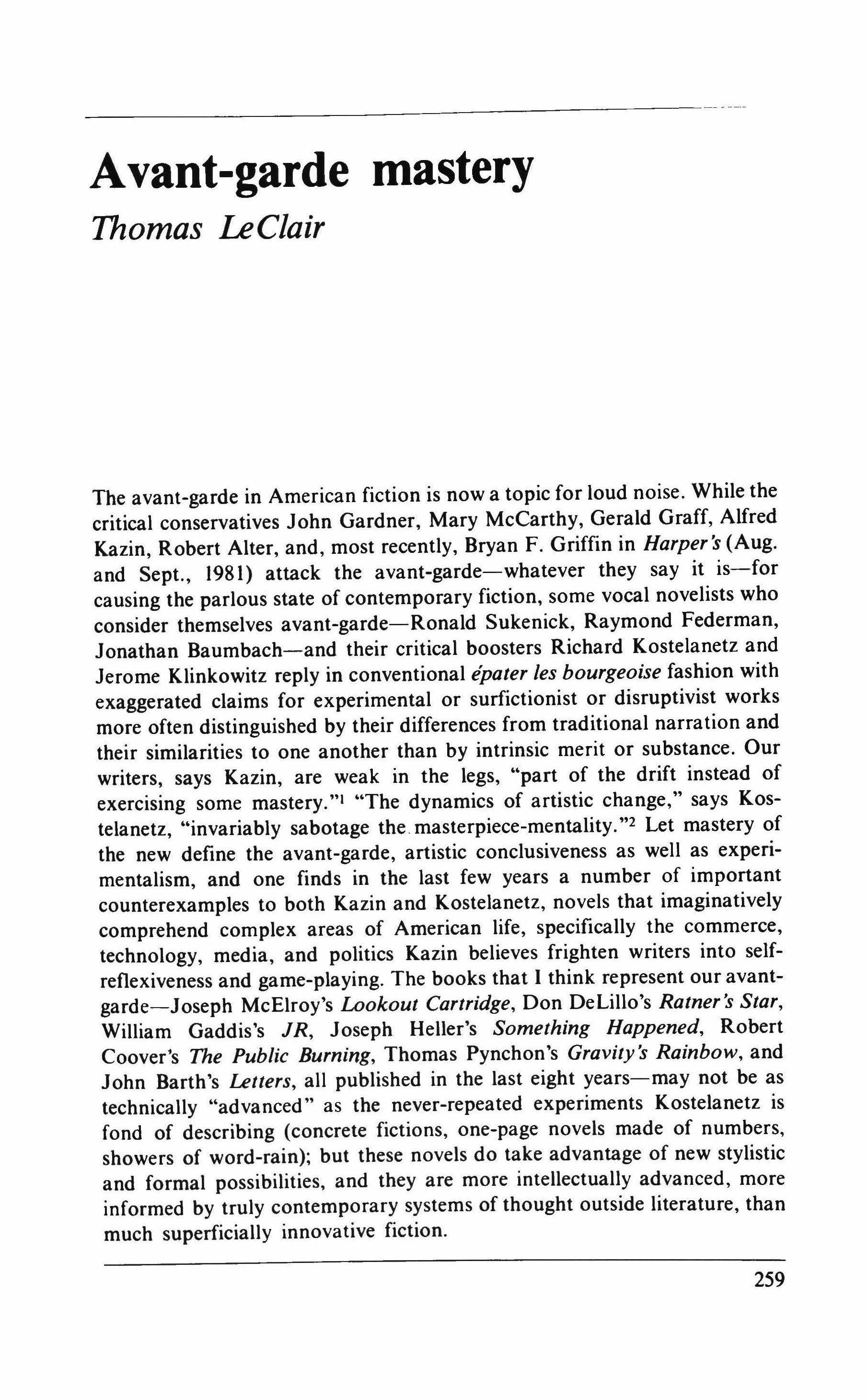
The avant-garde in American fiction is now a topic for loud noise. While the critical conservatives John Gardner, Mary McCarthy, Gerald Graff, Alfred Kazin, Robert Alter, and, most recently, Bryan F. Griffin in Harper's (Aug. and Sept., 1981) attack the avant-garde-whatever they say it is-for causing the parlous state of contemporary fiction, some vocal novelists who consider themselves avant-garde-Ronald Sukenick, Raymond Federman, Jonathan Baumbach-and their critical boosters Richard Kostelanetz and Jerome Klinkowitz reply in conventional epater les bourgeoise fashion with exaggerated claims for experimental or surfictionist or disruptivist works more often distinguished by their differences from traditional narration and their similarities to one another than by intrinsic merit or substance. Our writers, says Kazin, are weak in the legs, "part of the drift instead of exercising some mastery. "I "The dynamics of artistic change," says Kostelanetz, "invariably sabotage the masterpiece-mentality.'? Let mastery of the new define the avant-garde, artistic conclusiveness as well as experimentalism, and one finds in the last few years a number of important counterexamples to both Kazin and Kostelanetz, novels that imaginatively comprehend complex areas of American life, specifically the commerce, technology, media, and politics Kazin believes frighten writers into selfreflexiveness and game-playing. The books that I think represent our avantgarde-Joseph McElroy's Lookout Cartridge, Don DeLillo's Ratner's Star, William Gaddis's JR, Joseph Heller's Something Happened, Robert Coover's The Public Burning, Thomas Pynchon's Gravity's Rainbow, and John Barth's Letters, all published in the last eight years-may not be as technically "advanced" as the never-repeated experiments Kostelanetz is fond of describing (concrete fictions, one-page novels made of numbers, showers of word-rain); but these novels do take advantage of new stylistic and formal possibilities, and they are more intellectually advanced, more informed by truly contemporary systems of thought outside literature, than much superficially innovative fiction.
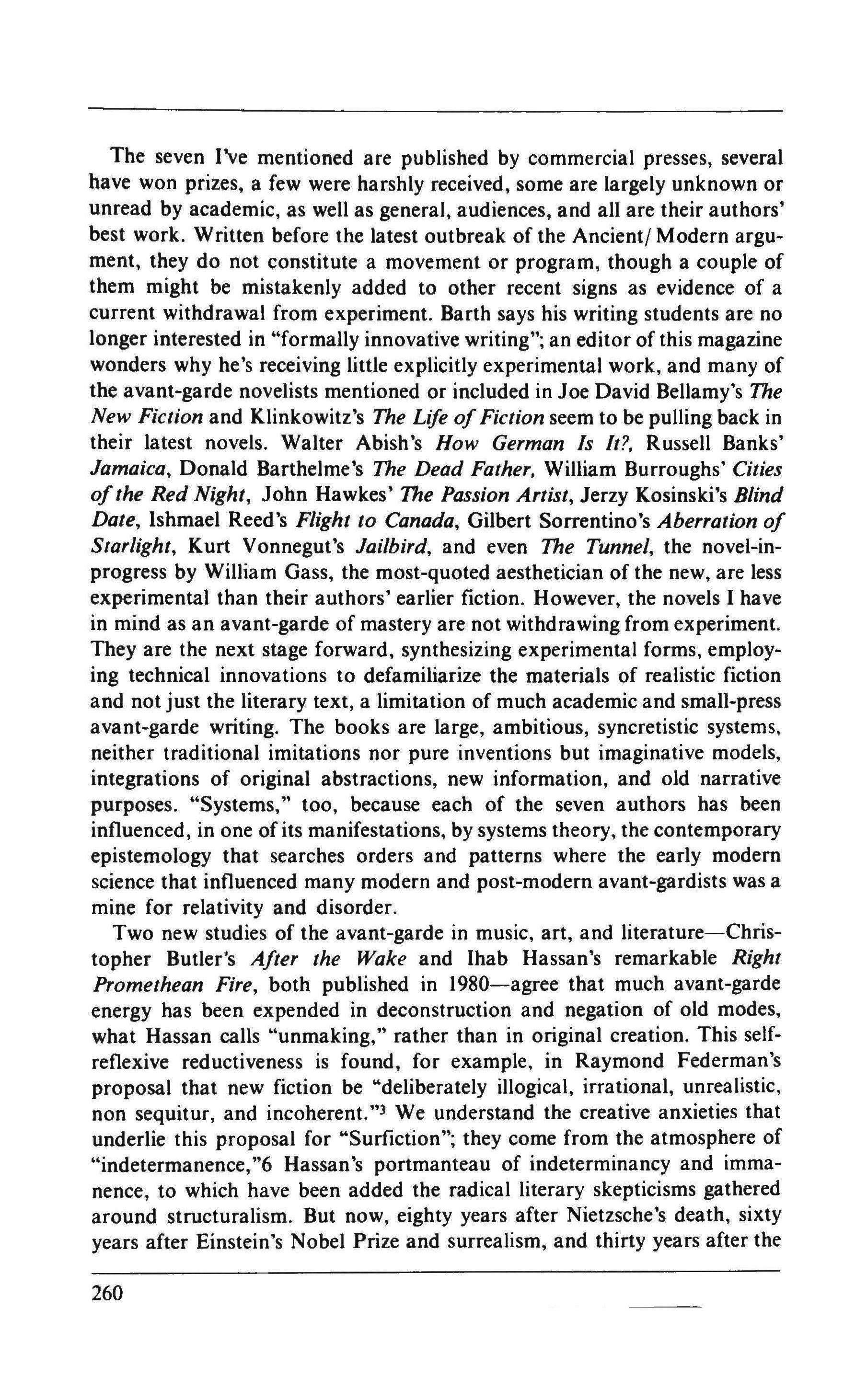
The seven I've mentioned are published by commercial presses, several have won prizes, a few were harshly received, some are largely unknown or unread by academic, as well as general, audiences, and all are their authors' best work. Written before the latest outbreak of the Ancient/ Modern argument, they do not constitute a movement or program, though a couple of them might be mistakenly added to other recent signs as evidence of a current withdrawal from experiment. Barth says his writing students are no longer interested in "formally innovative writing"; an editor of this magazine wonders why he's receiving little explicitly experimental work, and many of the avant-garde novelists mentioned or included in Joe David Bellamy's The New Fiction and Klinkowitz's The Life of Fiction seem to be pulling back in their latest novels. Walter Abish's How German Is It? Russell Banks' Jamaica, Donald Barthelme's The Dead Father. William Burroughs' Cities ofthe Red Night, John Hawkes' The Passion Artist, Jerzy Kosinski's Blind Date, Ishmael Reed's Flight to Canada, Gilbert Sorrentino's Aberration of Starlight, Kurt Vonnegut's Jailbird, and even The Tunnel, the novel-inprogress by William Gass, the most-quoted aesthetician of the new, are less experimental than their authors' earlier fiction. However, the novels I have in mind as an avant-garde of mastery are not withdrawing from experiment. They are the next stage forward, synthesizing experimental forms. employing technical innovations to defamiliarize the materials of realistic fiction and not just the literary text, a limitation of much academic and small-press avant-garde writing. The books are large, ambitious, syncretistic systems. neither traditional imitations nor pure inventions but imaginative models, integrations of original abstractions, new information, and old narrative purposes. "Systems," too, because each of the seven authors has been influenced, in one of its manifestations, by systems theory, the contemporary epistemology that searches orders and patterns where the early modern science that influenced many modern and post-modern avant-gardists was a mine for relativity and disorder.
Two new studies of the avant-garde in music, art, and literature-Christopher Butler's After the Wake and Ihab Hassan's remarkable Right Promethean Fire, both published in 1980-agree that much avant-garde energy has been expended in deconstruction and negation of old modes, what Hassan calls "unmaking," rather than in original creation. This selfreflexive reductiveness is found, for example. in Raymond Federman's proposal that new fiction be "deliberately illogical, irrational, unrealistic, non sequitur, and incoherent. "3 We understand the creative anxieties that underlie this proposal for "Surfiction"; they come from the atmosphere of "indetermanence,"6 Hassan's portmanteau of indeterminancy and immanence, to which have been added the radical literary skepticisms gathered around structuralism. But now, eighty years after Nietzsche's death, sixty years after Einstein's Nobel Prize and surrealism, and thirty years after the
beginnings of structuralism, this kind of program for disintegration of the medium seems not advanced but aged, old-fashioned, produced by the disappointment of naive assumptions about certitude. The concept of entropy, a much-discussed rationale for imitative deconstruction, offers an instructive example of some avant-gardists' use of dated science. Entropy has a malign and fixed rule in mechanistic, closed systems-the heat machines of late nineteenth- and early twentieth-century physics-but systems theorists of our day show that man, nature, the universe, and, I think, literature are open systems, circular networks of disintegration and adaption. I don't mean to suggest that transcendence is making a comeback, or that doom isn't crouched in missile silos or diffused in the exhaust of a hundred million automobiles, but that theoreticians in many scientific disciplines are now moving beyond the fragmentation produced by specialization and the infinite regresses of experimental sciences to propose new orders, some elegant in their simplicity and useful in their explanatory power. There is not space here to summarize the work of Ludwig von Bertalanffy, the initiator of systems theory, or some of his more notable followers-Gregory Bateson in anthropology, Kenneth Boulding in economics, Buckminster Fuller in ecology, R. D. Laing in psychology, Ervin Laszlo in biology, Norbert Weiner in cybernetics, Anthony Wilden in literary and cultural criticism-but I can briefly list some qualities of systems thinking that carryover into the work of the novelists I call the avant-garde of mastery-or the reconstructive avantgarde. Systems theorists accept relativity, fragmentation, and the artifices of knowledge as givens, then proceed to make new intellectual maps. Their method is more like that of mathematics than of physical sciences: hypothetical, imaginative, comprehensive, highly abstract. Some of the emphases of systems theory are illustrated in this table of contrasts with mechanistic science:
Mechanistic Science phenomena functions sequences linear causes effects one-way isolation closed systems

Systems Theory relations formal properties homologies hierarchical processes of communication constraints reciprocal collaboration ecosystems
The conclusions offered by systems theory are models, or what Thomas Kuhn termed paradigms, new ways of organizing and seeing the world.
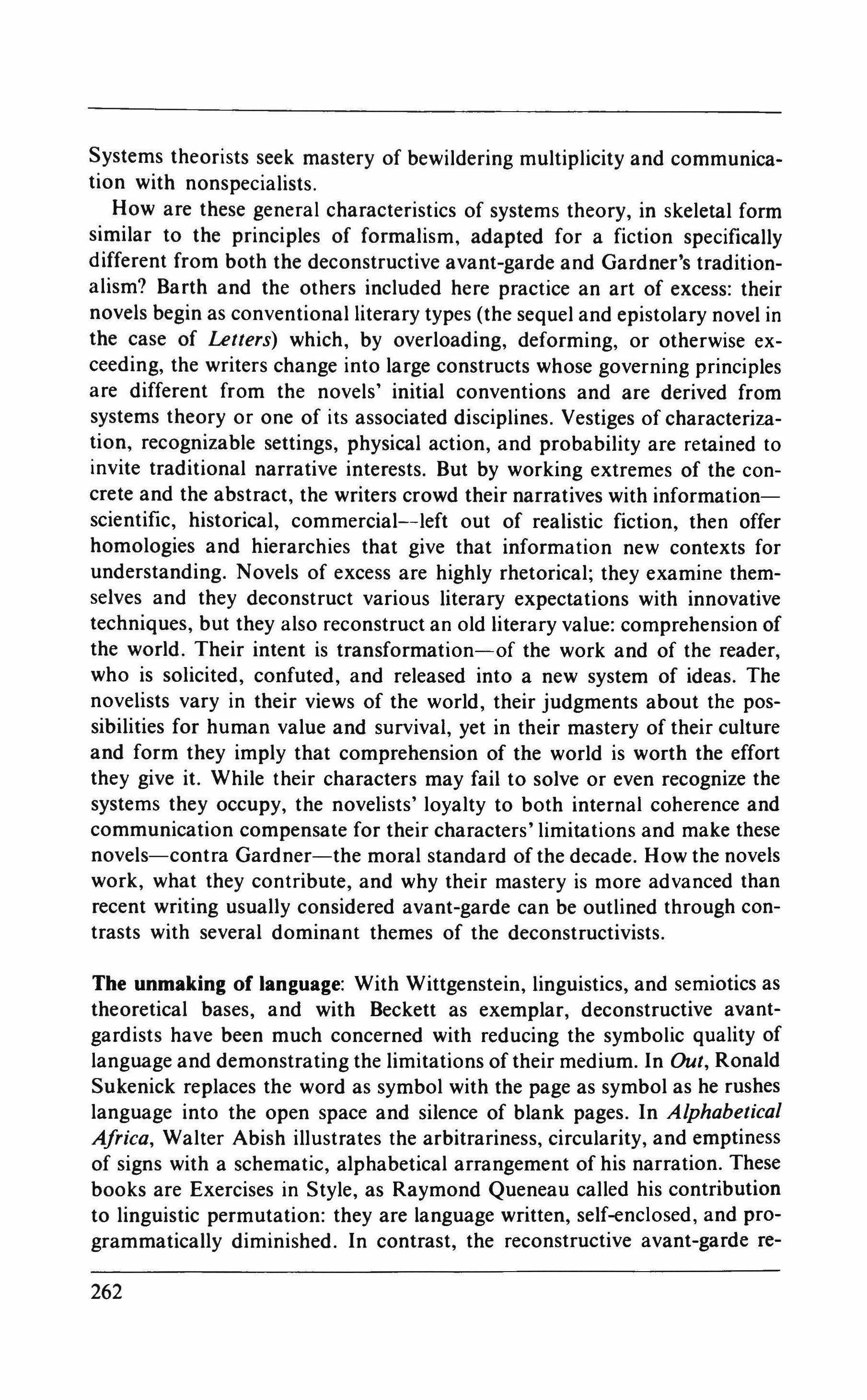
Systems theorists seek mastery of bewildering multiplicity and communication with nonspecialists.
How are these general characteristics of systems theory, in skeletal form similar to the principles of formalism, adapted for a fiction specifically different from both the deconstructive avant-garde and Gardner's traditionalism? Barth and the others included here practice an art of excess: their novels begin as conventional literary types (the sequel and epistolary novel in the case of Letters) which, by overloading, deforming, or otherwise exceeding, the writers change into large constructs whose governing principles are different from the novels' initial conventions and are derived from systems theory or one of its associated disciplines. Vestiges of characterization, recognizable settings, physical action, and probability are retained to invite traditional narrative interests. But by working extremes of the concrete and the abstract, the writers crowd their narratives with informationscientific, historical, commercial--Ieft out of realistic fiction, then offer homologies and hierarchies that give that information new contexts for understanding. Novels of excess are highly rhetorical; they examine themselves and they deconstruct various literary expectations with innovative techniques, but they also reconstruct an old literary value: comprehension of the world. Their intent is transformation-of the work and of the reader, who is solicited, confuted, and released into a new system of ideas. The novelists vary in their views of the world, their judgments about the possibilities for human value and survival, yet in their mastery of their culture and form they imply that comprehension of the world is worth the effort they give it. While their characters may fail to solve or even recognize the systems they occupy, the novelists' loyalty to both internal coherence and communication compensate for their characters' limitations and make these novels-contra Gardner-the moral standard of the decade. How the novels work, what they contribute, and why their mastery is more advanced than recent writing usually considered avant-garde can be outlined through contrasts with several dominant themes of the deconstructivists.
The unmaking of language: With Wittgenstein, linguistics, and semiotics as theoretical bases, and with Beckett as exemplar, deconstructive avantgardists have been much concerned with reducing the symbolic quality of language and demonstrating the limitations of their medium. In Out, Ronald Sukenick replaces the word as symbol with the page as symbol as he rushes language into the open space and silence of blank pages. In Alphabetical A/rica, Walter Abish illustrates the arbitrariness, circularity, and emptiness of signs with a schematic, alphabetical arrangement of his narration. These books are Exercises in Style, as Raymond Queneau called his contribution to linguistic permutation: they are language written, self-enclosed, and programmatically diminished. In contrast, the reconstructive avant-garde re-

members that language is also spoken and, whatever its duplicities, referential; that the language of technology are new creative sources; and that language limits-or enables-all humans, not just itself and the artists who choose it as medium. Heller in Something Happened, a book whose intellectual seriousness is yet to be recognized, and Gaddis in JR place their characters in communication industries to illustrate that, along with its intrinsic limitations, language also carries in contemporary America the pervasive and negative effects of the business world's obsession with entities, quantity, and prediction. In these novels, unlike the shrinking works of the deconstructivists, the difficulties of communication do not decrease speech acts but rather increase their number. Gresham's Law becomes linguistic and practical as well as economic and speculative.
Begun respectively as another ad man's confession and as an Horatio Alger parody, Something Happened and JR employ techniques of "unmaking"-typographical experiment, lexical flatness, redundancy, fragmentation, noise-as well as the "recording" of natural speech, to give the reader local discomfort and, finally, to lead him into recognition of the global forms being created as alternatives to plot-positive feedback systems, influenced by Bateson and Laing (Heller) and by Weiner (Gaddis), and characterized by growth without control, a tendency toward the infinite regress of the question "What happened?" and the infinite expansion of J. R. 's "the more you have the more you get" business practices. As informed about communication processes as their deconstructive colleagues, Heller and Gaddis choose to combine theoretical knowledge with the closely observed "real-time" of commerce, thus manifesting the reciprocal relation between language and the world, not just between language and the writer. In these two novels and in the five others I've mentioned, language is unmade but also replaced by or included within a system which, understood, could help reverse the process of linguistic waste.
The unmaking of mind: From the elegant modernist paradoxes of Borges, we descend in some post-modern American fiction to the simple contradiction of theory-based novels that disallow the formulating mind within them. The gratuitous acts of Kosinski's books and the digressive consciousness of Federman's improvisational surfictions are representative reactions against mind as mechanism, psychological cause and effect, the intellectual enclosures of plot and character; but their reduction to the aleatory, the irrational, and the personal is at odds with the dominant fact of science and technology: that the rational and creative mind expands outward through the methods and machines it invents. The deconstructivists' isolation of mind and their metonymic techniques are replaced in the reconstructive avant-garde by the collaborative intellectual processes and the extended homologies of systems theory, exemplified in two works that should be more
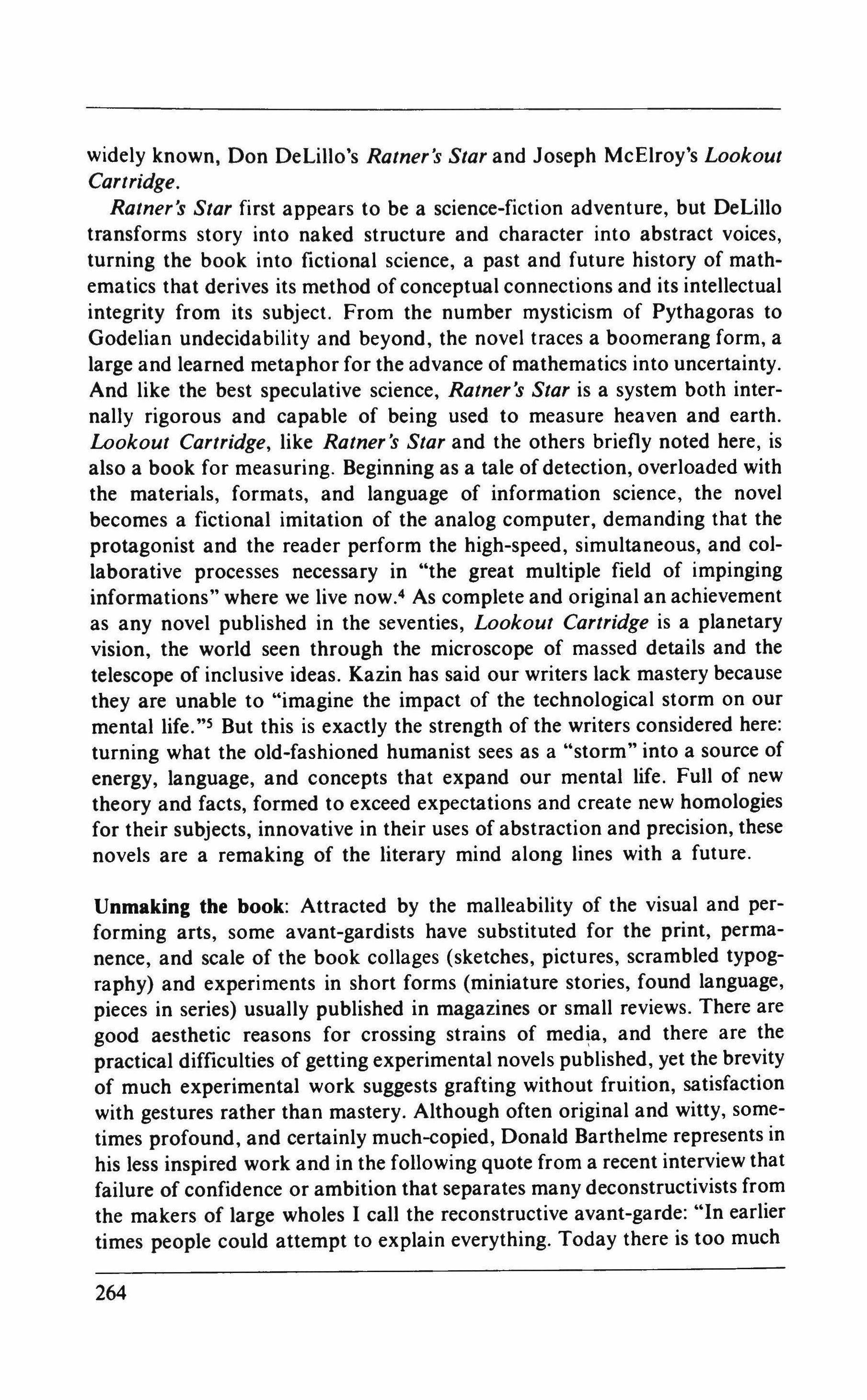
widely known, Don DeLillo's Ratner's Star and Joseph McElroy's Lookout Cartridge.
Ratner's Star first appears to be a science-fiction adventure, but DeLillo transforms story into naked structure and character into abstract voices, turning the book into fictional science, a past and future history of mathematics that derives its method of conceptual connections and its intellectual integrity from its subject. From the number mysticism of Pythagoras to Godelian undecidability and beyond, the novel traces a boomerang form, a large and learned metaphor for the advance of mathematics into uncertainty. And like the best speculative science, Ratner's Star is a system both internally rigorous and capable of being used to measure heaven and earth. Lookout Cartridge, like Ratner's Star and the others briefly noted here, is also a book for measuring. Beginning as a tale of detection, overloaded with the materials, formats, and language of information science, the novel becomes a fictional imitation of the analog computer, demanding that the protagonist and the reader perform the high-speed, simultaneous, and collaborative processes necessary in "the great multiple field of impinging informations" where we live now.' As complete and original an achievement as any novel published in the seventies, Lookout Cartridge is a planetary vision, the world seen through the microscope of massed details and the telescope of inclusive ideas. Kazin has said our writers lack mastery because they are unable to "imagine the impact of the technological storm on our mental life. "S But this is exactly the strength of the writers considered here: turning what the old-fashioned humanist sees as a "storm" into a source of energy, language, and concepts that expand our mental life. Full of new theory and facts, formed to exceed expectations and create new homologies for their subjects, innovative in their uses of abstraction and precision, these novels are a remaking of the literary mind along lines with a future.
Unmaking the book: Attracted by the malleability of the visual and performing arts, some avant-gardists have substituted for the print, permanence, and scale of the book collages (sketches, pictures, scrambled typography) and experiments in short forms (miniature stories, found language, pieces in series) usually published in magazines or small reviews. There are good aesthetic reasons for crossing strains of media, and there are the practical difficulties of getting experimental novels published, yet the brevity of much experimental work suggests grafting without fruition, satisfaction with gestures rather than mastery. Although often original and witty, sometimes profound, and certainly much-copied, Donald Barthelme represents in his less inspired work and in the following quote from a recent interview that failure of confidence or ambition that separates many deconstructivists from the makers of large wholes I call the reconstructive avant-garde: "In earlier times people could attempt to explain everything. Today there is too much
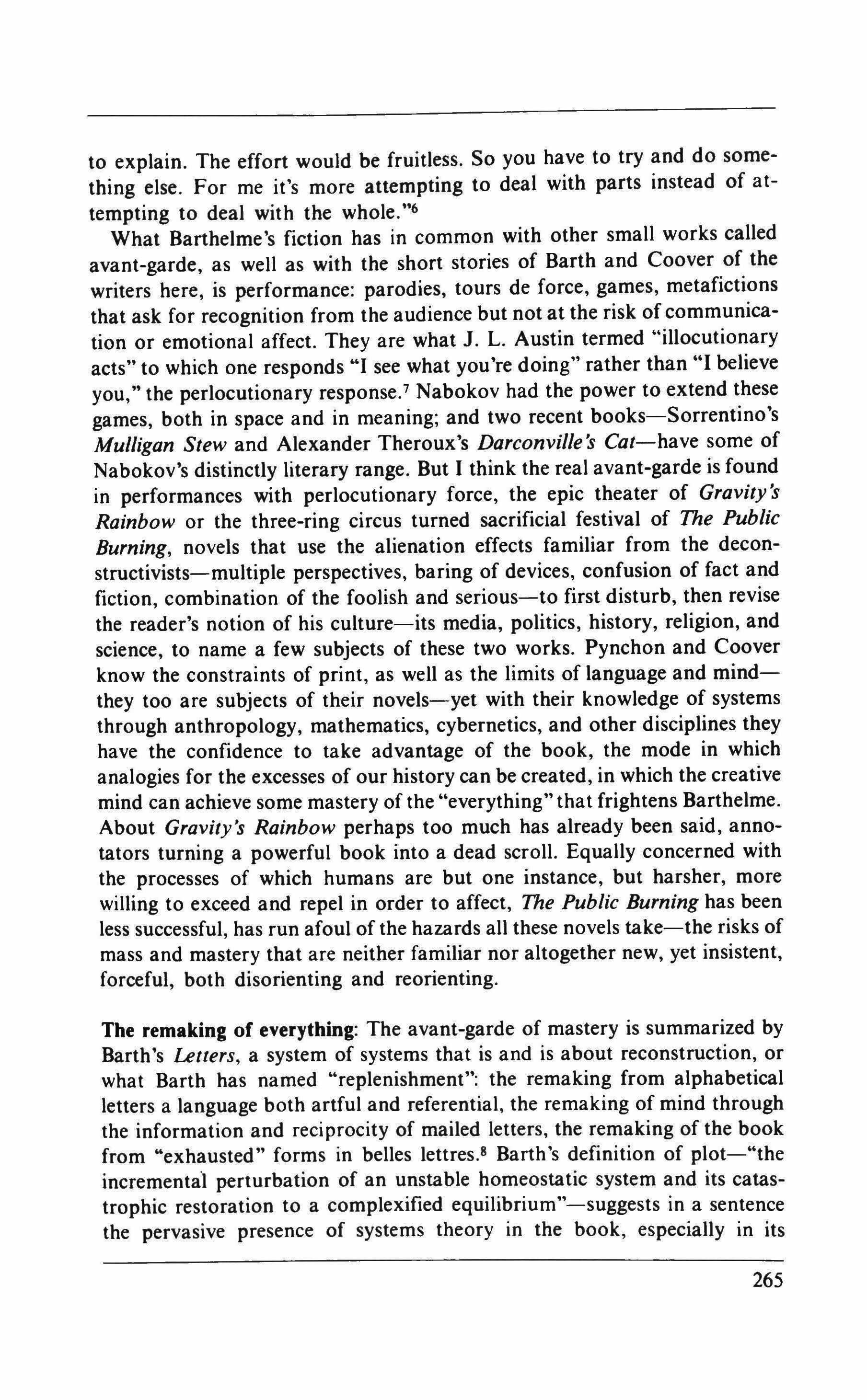
to explain. The effort would be fruitless. So you have to try and do something else. For me it's more attempting to deal with parts instead of attempting to deal with the whole. "6
What Barthelmes fiction has in common with other small works called avant-garde, as well as with the short stories of Barth and Coover of the writers here, is performance: parodies, tours de force, games, metafictions that ask for recognition from the audience but not at the risk of communication or emotional affect. They are what J. L. Austin termed "illocutionary acts" to which one responds "I see what you're doing" rather than "I believe you," the perlocutionary response.' Nabokov had the power to extend these games, both in space and in meaning; and two recent books-Sorrentino's Mulligan Stew and Alexander Theroux's Darconville's Cat-have some of Nabokov's distinctly literary range. But I think the real avant-garde is found in performances with perlocutionary force, the epic theater of Gravity's Rainbow or the three-ring circus turned sacrificial festival of The Public Burning, novels that use the alienation effects familiar from the deconstructivists-multiple perspectives, baring of devices, confusion of fact and fiction, combination of the foolish and serious-to first disturb, then revise the reader's notion of his culture-its media, politics, history, religion, and science, to name a few subjects of these two works. Pynchon and Coover know the constraints of print, as well as the limits of language and mindthey too are subjects of their novels-yet with their knowledge of systems through anthropology, mathematics, cybernetics, and other disciplines they have the confidence to take advantage of the book, the mode in which analogies for the excesses of our history can be created, in which the creative mind can achieve some mastery of the "everything" that frightens Barthelme. About Gravity'S Rainbow perhaps too much has already been said, annotators turning a powerful book into a dead scroll. Equally concerned with the processes of which humans are but one instance, but harsher, more willing to exceed and repel in order to affect, The Public Burning has been less successful, has run afoul of the hazards all these novels take-the risks of mass and mastery that are neither familiar nor altogether new, yet insistent, forceful, both disorienting and reorienting.
The remaking of everything: The avant-garde of mastery is summarized by Barth's Letters, a system of systems that is and is about reconstruction, or what Barth has named "replenishment": the remaking from alphabetical letters a language both artful and referential, the remaking of mind through the information and reciprocity of mailed letters, the remaking of the book from "exhausted" forms in belles lettres.! Barth's definition of plot-"the incremental perturbation of an unstable homeostatic system and its catastrophic restoration to a complexified equilibrium"-suggests in a sentence the pervasive presence of systems theory in the book, especially in its
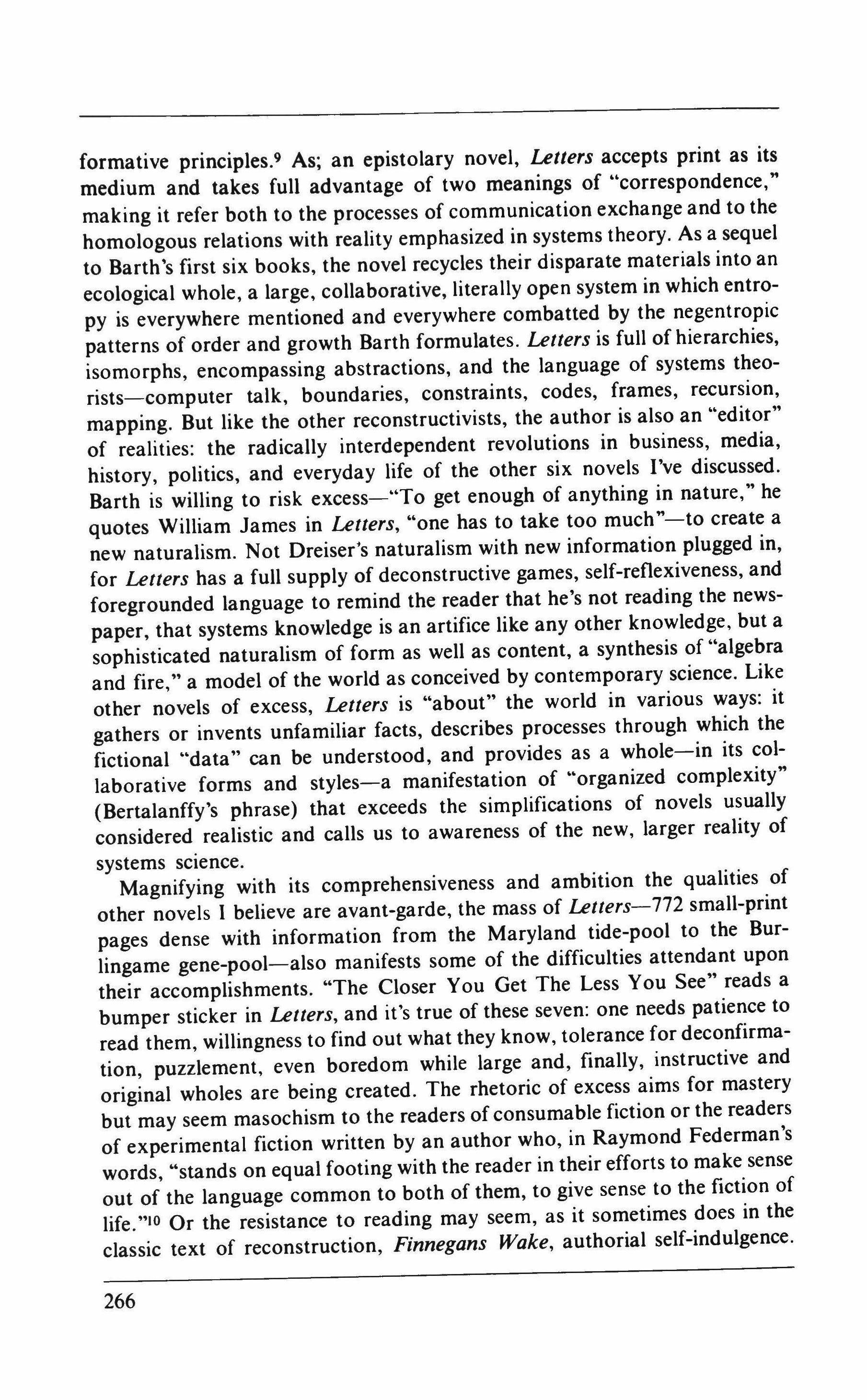
formative principles.? As; an epistolary novel, Letters accepts print as its medium and takes full advantage of two meanings of "correspondence," making it refer both to the processes of communication exchange and to the homologous relations with reality emphasized in systems theory. As a sequel to Barth's first six books, the novel recycles their disparate materials into an ecological whole, a large, collaborative, literally open system in which entropy is everywhere mentioned and everywhere combatted by the negentropic patterns of order and growth Barth formulates. Letters is full of hierarchies, isomorphs, encompassing abstractions, and the language of systems theorists-computer talk, boundaries, constraints, codes, frames, recursion, mapping. But like the other reconstructivists, the author is also an "editor" of realities: the radically interdependent revolutions in business, media, history, politics, and everyday life of the other six novels I've discussed. Barth is willing to risk excess=-t'To get enough of anything in nature," he quotes William James in Letters, "one has to take too much"-to create a new naturalism. Not Dreiser's naturalism with new information plugged in, for Letters has a full supply of deconstructive games, self-reflexiveness, and foregrounded language to remind the reader that he's not reading the newspaper, that systems knowledge is an artifice like any other knowledge, but a sophisticated naturalism of form as well as content, a synthesis of "algebra and fire," a model of the world as conceived by contemporary science. Like other novels of excess, Letters is "about" the world in various ways: it gathers or invents unfamiliar facts, describes processes through which the fictional "data" can be understood, and provides as a whole-in its collaborative forms and styles-a manifestation of "organized complexity" (Bertalanffy's phrase) that exceeds the simplifications of novels usually considered realistic and calls us to awareness of the new, larger reality of systems science.
Magnifying with its comprehensiveness and ambition the qualities of other novels I believe are avant-garde, the mass of Letters-772 small-print pages dense with information from the Maryland tide-pool to the Burlingame gene-pool-also manifests some of the difficulties attendant upon their accomplishments. "The Closer You Get The Less You See" reads a bumper sticker in Letters, and it's true of these seven: one needs patience to read them, willingness to find out what they know, tolerance for deconfirmation, puzzlement, even boredom while large and, finally, instructive and original wholes are being created. The rhetoric of excess aims for mastery but may seem masochism to the readers of consumable fiction or the readers of experimental fiction written by an author who, in Raymond Federman's words, "stands on equal footing with the reader in their efforts to make sense out of the language common to both of them, to give sense to the fiction of life."10 Or the resistance to reading may seem, as it sometimes does in the classic text of reconstruction, Finnegans Wake, authorial self-indulgence.
But once understood as systems, validated and just maybe verified as well, these novels have the integrity of the Ancient Mariner's tale: a long and difficult story because it had to be for both truth and effect, for mastery.

I. Alfred Kazin, "American Writing Now," The New Republic, October 18, 1980, p. 29.
2. Richard Kostelanetz, "New Fiction in America" in Surfiction, ed. Raymond Federman (Chicago: Swallow, 1975), p. 86.
3. Raymond Federman, "Introduction" to Surfiction, p. 13.
4. Joseph McElroy, Lookout Cartridge (New York: Knopf, 1974), p. 465.
5. Kazin, p. 29.
6. Michiko Kakutani, "Donald Barthelrne," International Herald Tribune, September 25, 1981, p. 20.
7. J. L. Austin, How to Do Things with Words (Cambridge: Harvard University Press, 1962).
8. John Barth, "The Literature of Replenishment," Atlantic, January, 1980, pp. 65-71.
9. John Barth, Letters (New York: Putnam, 1979), p. 767.
10. Federman, p. 14.

Arnost Lustig, a native of Prague, was interned during World War II at Theresienstadt, Buchenwald, and Auschwitz before escaping from the "death transport" en route to Dachau. He has authored many books of fiction, of which five have been translated into English, including the novel A Prayerfor Katerina Horovitzova, which was nominated for the National Book Award. Lustig is a professor of literature and film-writing at American University, in Washington, D.C. Two of his stories appeared in TriQuarterly 45 and 50. The excerpt in this issue is the second part of his new novel, Darling. Stanley Elkin has published seven works of fiction. His novel, George Mills, from which the story appearing in this issue is taken, will be released in 1982. He is a professor of English at Washington University, in St. Louis. James McManus's first two books are Antonio Salazar Is Dead, a collection of prose poems, and The Disciples at Second Hand, a collection of stories, one of which, "Picasso," appeared in TriQuarterly 51. Polish sculptress Magdalena Abakanowicz, although relatively unknown in the United States, has exhibited throughout Europe, the Far East, and Australia. Chicago's Museum of Contemporary Art plans a major showing of her work in October 1982. Mary Jane Jacob is the curator of the Museum of Contemporary Art. F. R. Padorr teaches in the English Department at Loyola University, in Chicago, and has published poetry in The Yale Review and The Columbia Review. Arturo Vivante's stories have appeared in The New Yorker since 1958. His recent books include a collection of stories, Run to the Waterfall (1979) and a handbook, Writing Fiction (1981). Joseph McElroy's forthcoming novel, Women and Men, is his first book since Plus (1977). The story published in this issue was taken from the novel, as was "The Unknown Kid," which appeared in TriQuarterly 51. Eugene Wildman teaches in the Program for Writers at the University of Illinois, Chicago Circle. He is finishing a collection of short stories. A professor of English at the University of Southern Mississippi, Frederick Barthelme has recently
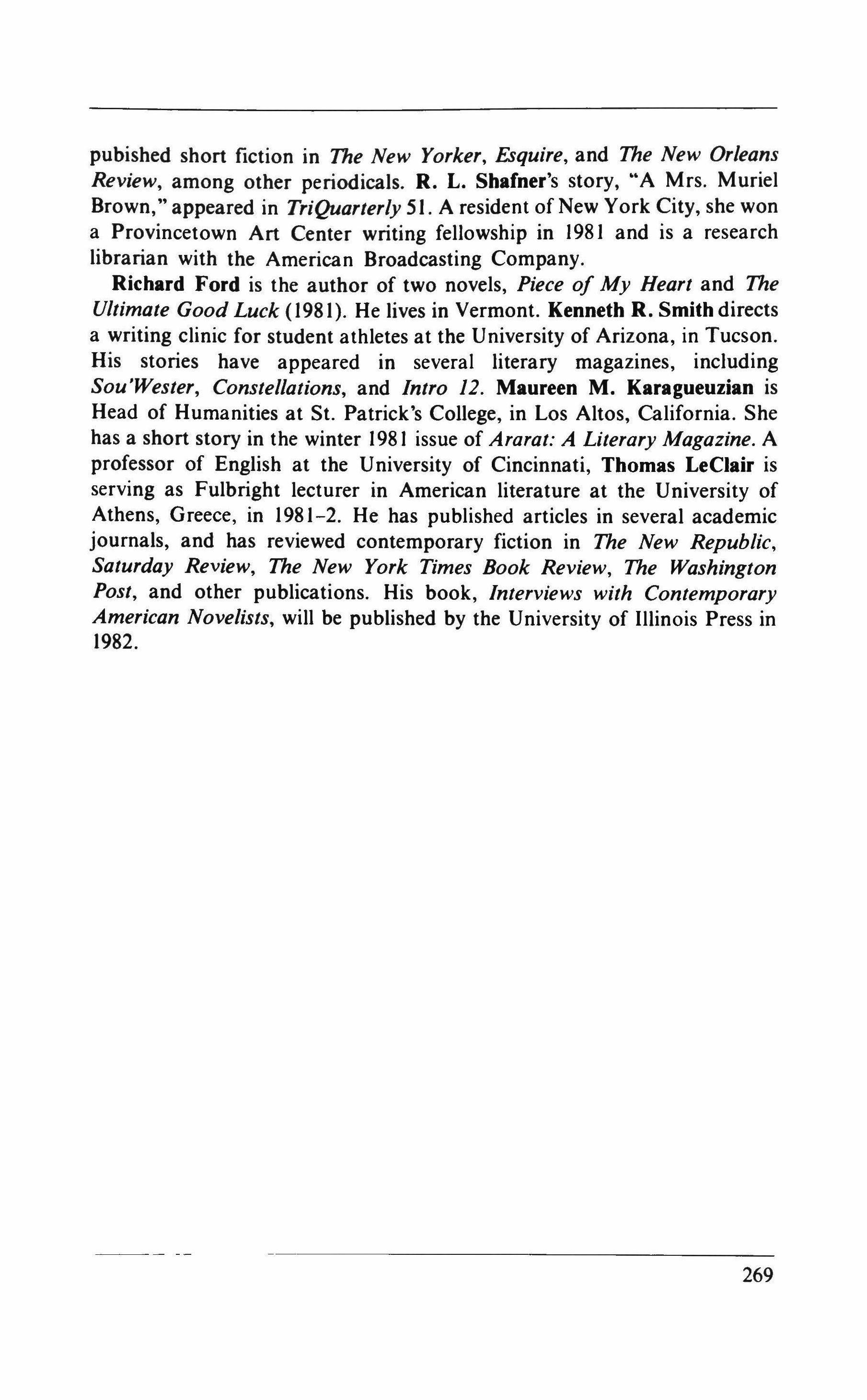
pubished short fiction in The New Yorker, Esquire, and The New Orleans Review, among other periodicals. R. L. Shafner's story, "A Mrs. Muriel Brown," appeared in TriQuarterly 51. A resident of New York City, she won a Provincetown Art Center writing fellowship in 1981 and is a research librarian with the American Broadcasting Company. Richard Ford is the author of two novels, Piece of My Heart and The Ultimate Good Luck (1981). He lives in Vermont. Kenneth R. Smith directs a writing clinic for student athletes at the University of Arizona, in Tucson. His stories have appeared in several literary magazines, including Sou'Wester, Constellations, and Intro 12. Maureen M. Karagueuzian is Head of Humanities at St. Patrick's College, in Los Altos, California. She has a short story in the winter 1981 issue of Ararat: A Literary Magazine. A professor of English at the University of Cincinnati, Thomas LeClair is serving as Fulbright lecturer in American literature at the University of Athens, Greece, in 1981-2. He has published articles in several academic journals, and has reviewed contemporary fiction in The New Republic, Saturday Review, The New York Times Book Review, The Washington Post, and other publications. His book, Interviews with Contemporary American Novelists, will be published by the University of Illinois Press in 1982.
Cary Nelson. "Here is a welcome addition to the growing scholarship examining the impact of the Vietnam War on contemporary American poetry. Focusing on five mature poets whose careers were well established by the early 1960sRoethke, Kinnell, Duncan, Rich, and MerwinNelson asserts that these poets' careers show the effects of the historical pressures of the last two decades." - Library Journal. should rank (along with quite different books by Altieri and Pinsky) as among the three best studies of contemporary American poetry." - James E. Breslin. "Immensely intriguing. it urges a new view of Walt Whitman's limitations as a model for poetry in our country at this point in history. I find the readings of individual poems sensitive and acute." - Leslie Fiedler. "It is a stunning thesis, this matter of politics and open form, and what Nelson is searching out is certainly at the heart of America." - Sherman Paul. $15.95
Don Byrd. Of the several recent books on Olson - pivotal figure in the Black Mountain school of poetry and chief shaper of postmodemist poetryByrd's striking assessment is the first to offer an in-depth analysis of the three-volume sequence known as Maximus. "An acute and impassioned study in the tradition of our finest critical intelligences." - George F. Butterick. "An excellent introduction to the major work of a troubling contemporary poet." - Jerome Mazzaro, American Literature. $15.00
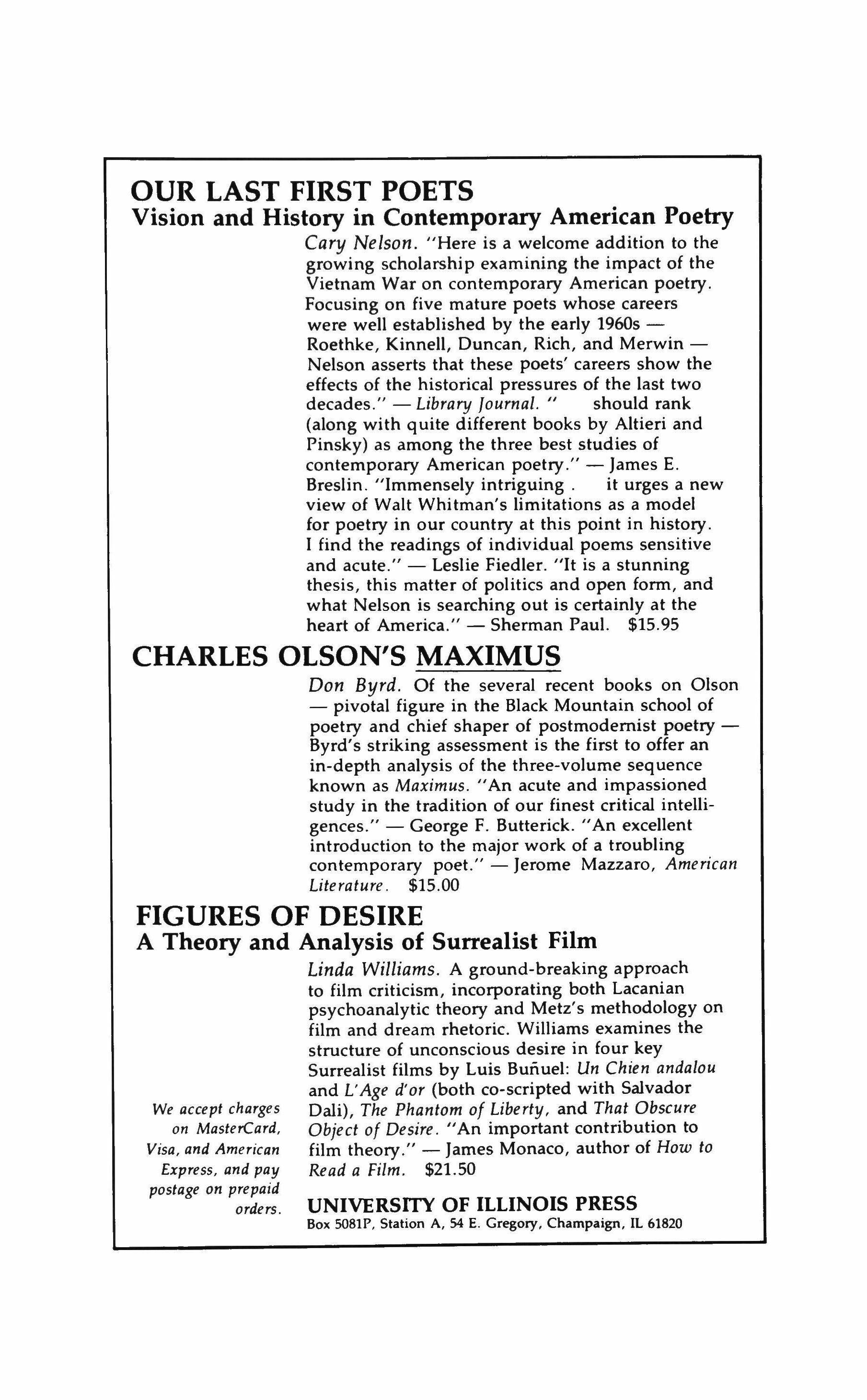
We accept charges on MasterCard, Visa, and American Express, and pay postage on prepaid orders.
Linda Williams. A ground-breaking approach to film criticism, incorporating both Lacanian psychoanalytic theory and Metz's methodology on film and dream rhetoric. Williams examines the structure of unconscious desire in four key Surrealist films by Luis Bufiuel: Un Chien andalou and L'Age d'or (both co-scripted with Salvador Dali), The Phantom of Liberty, and That Obscure Object of Desire. "An important contribution to film theory." - James Monaco, author of How to Read a Film. $21.50
UNIVERSITY OF ILLINOIS PRESS
Box 5081P, Station A, 54 E. Gregory, Champaign, IL 61820


"The poetry ofReginald Gibbons has been close to me for a long time and I hope it may be discovered and enjoyed by many others in this beautiful new collection."
- WILLIAM GOYEN"The Ruined Motel is a major work, an exemplary contribution to contemporary American poetry and, in my best judgment, likely to prove to be the finest volume published so far in the distinguished Houghton Mifflin New Poetry Series."
-GEORGE GARRETT"Saving and purifying, richly evocative, remarkably pure in language and influence, these new poems show Gibbons' expressive range and direct emotional power at its most impressive. With this book he takes his place among the necessary poets ofhis generation."
-ROBERT PHILLIPS$10.95 cloth, $5.95 paper

Moore,
510.95, cloth; $6.95, paper-72 pages
"Only first-rate poets, I believe, have been attracted to write such demanding monologues Moore resoundingly does exactly what he sets himself to do."-X.j. Kennedy
John Ditsky, FRIEND & LOVER
510.95, cloth; 55.95, paper-72 pages
"A lean, lithe, mature poet."-Theodore Weiss "A pleasure to read and reread. "i--Publishers Weekly "A splendid collection." -Howard Nemerov
59.95, cloth; 54.95, paper-72 pages
"Reed seeks to resensitize readers to the inconsistencies, turmoil, violence, and vitality of modern life."-Michigan Quarterly Review "Highly recommended."-Library Journal
New Voices from Abroad
510.95, cloth; 55.95, paper-72 pages
One of Ireland's leading younger poets, whose recent work has been hailed as: "Brilliant both technically and imaginatively its effect is stunning."-Irish Press
Selected Poems 1973-1980
510.95, cloth; 55.95, paper-t34 pages
"One of Canada's finest young poets. a must for all collections. "-Choice " a true successor of Whitman. "-Hudson Review "Highly recommended."-Librar)' Journal
Forthcoming
New and Selected Poems 1970-1982
Distributed by PERSEA BOOKS, Inc. 225 Lafayette St., New York, N.Y. 10012
"A
 By RICHARD FORD author of A Piece ofMy Heart
By RICHARD FORD author of A Piece ofMy Heart
A love story set in the world of drugtraffickers and urban guerrillas
IIA grand Maltese Falcon of a novel. So hard-boiled and tough it might have been written on the back of a trenchcoat the only case for the bystander to crack is his heart."
-STANLEY ELKIN* "Belongs alongside The Power and the Gloru in its stark vision of utter loss followed by a 'last-ditch healing redemption."
-RAYMOND CARVER, Chicago Tribune Book World
"Like Dog Soldiers, dramatic fiction at its toughest and. most unyielding."
-TIM O'BRIEN
$9.95, now at your bookstore

A Celebration of John Cage's 70th Birthday, with contributions by Kathan Brown. Merce Cunningham. Morton Feldman, Marjorie Perloff, Paul Zukovsky, and others, and with etchings by Cage
An interview with Eugenio Montale Fiction and poems by Arturo Vivante, Jay Wright, and others. Sophocles translated by Robert Fagles
A novella by William Goyen, and more fiction Poems by Pamela Hadas, Bruce Weigl, Linda Pastan, Theodore Weiss, and others
Michael Harper on jazz and writing and more
Please 0 enter a subscription to TriQuarterly for: o renew 01 year ($14) 02 years {$2S) o 3 years ($35) o life ($100)
o I enclose $ o Please bill me
o Charge my VISA/MasterCard tI
Signature Exp. date
Please start subscription with issue tI
Additional or gift subscriptions are available at even greater savings: 01 year ($12) 02 years ($20)
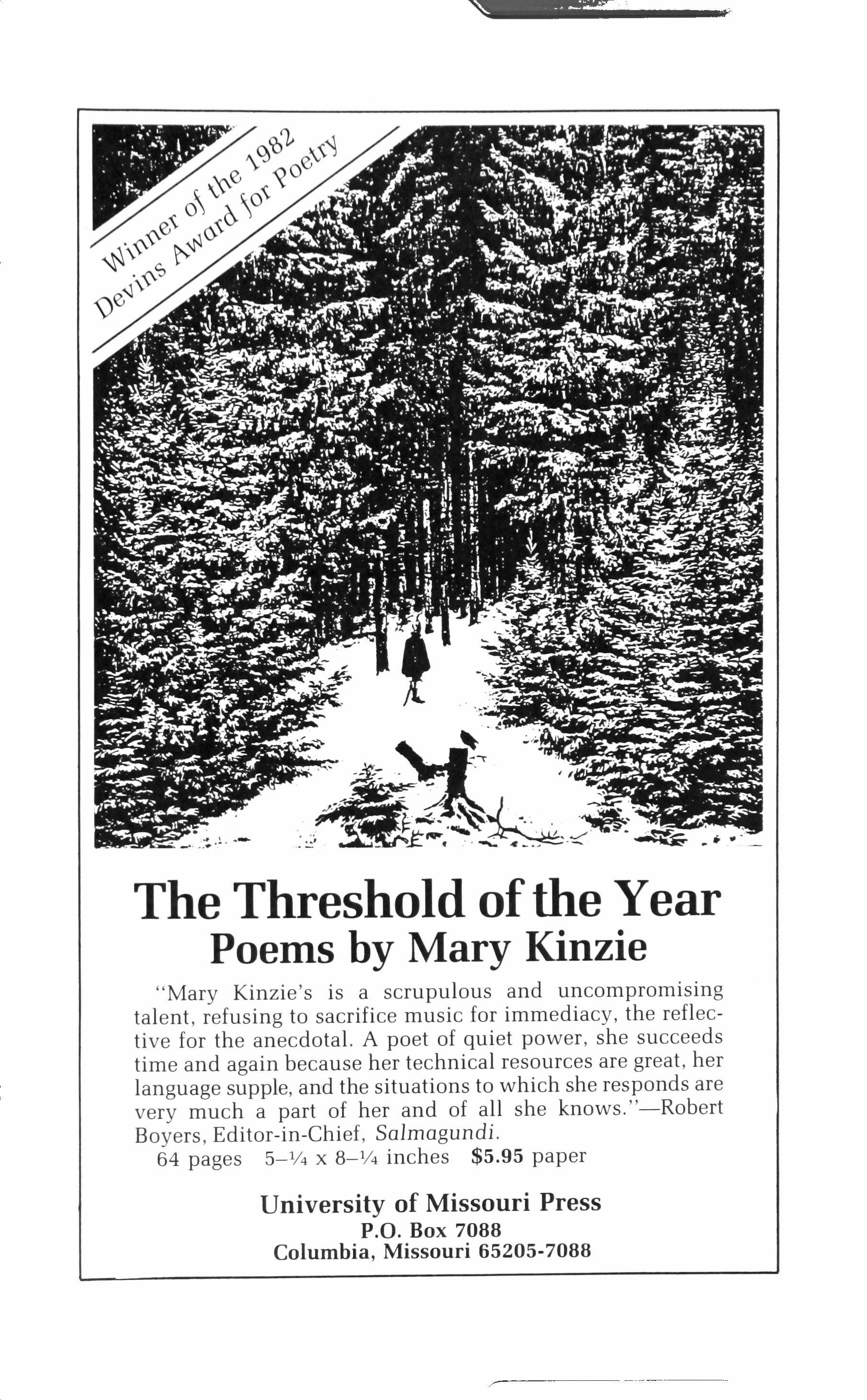
"Mary Kinzie's is a scrupulous and uncompromising talent, refusing to sacrifice music for immediacy, the reflective for the anecdotal. A poet of quiet power, she succeeds time and again because her technical resources are great, her language supple, and the situations to which she responds are very much a part of her and of all she knows."-Robert Boyers, Editor-in-Chief, Salmagundi. 64 pages 5-% x 8-% inches $5.95 paper
University of Missouri Press P.O. Box 7088 Columbia, Missouri 65205-7088
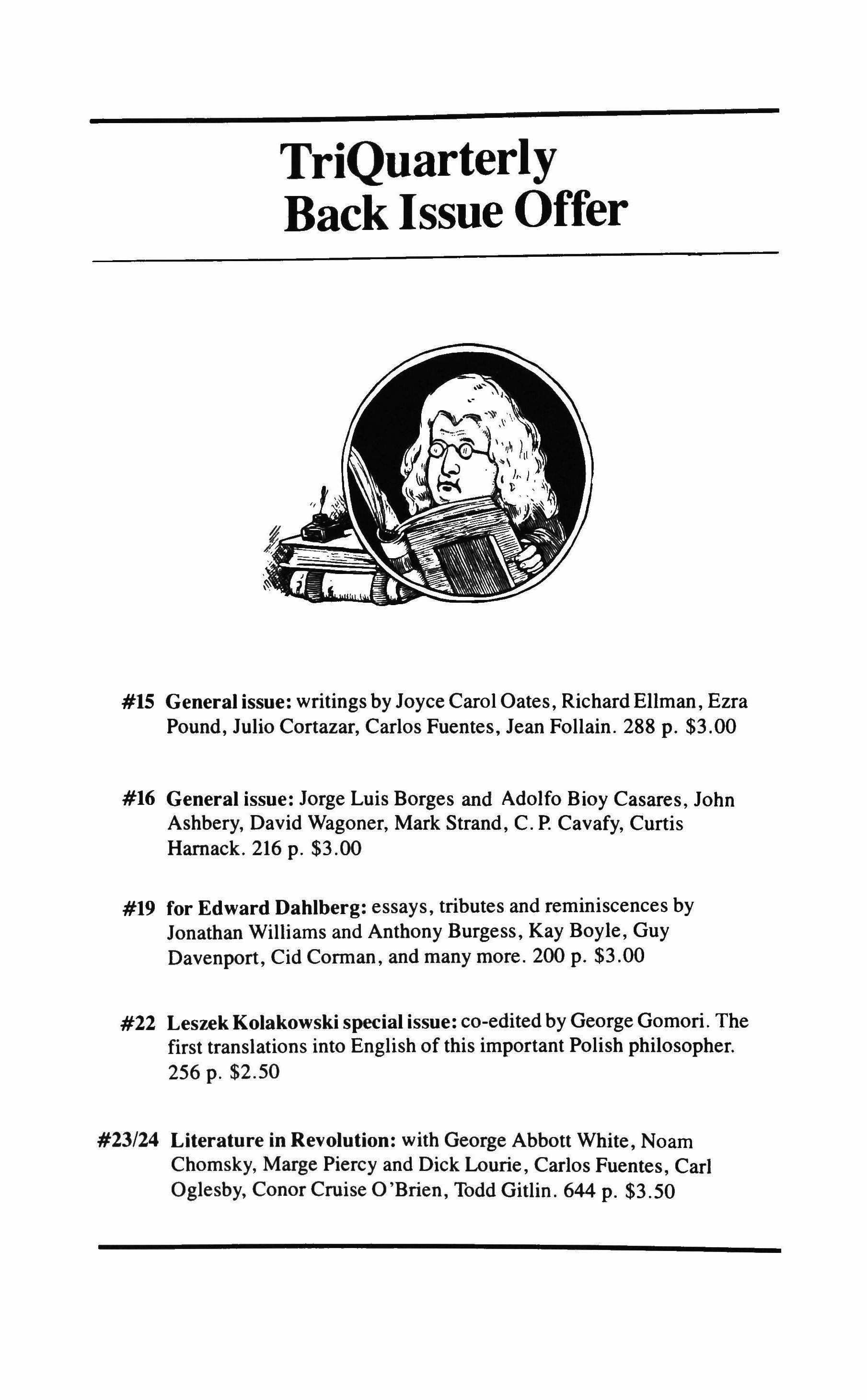
#15 General issue: writingsby Joyce Carol Oates, Richard Ellman, Ezra Pound, Julio Cortazar, Carlos Fuentes, Jean Follain. 288 p. $3.00
#16 General issue: Jorge Luis Borges and Adolfo Bioy Casares, John Ashbery, David Wagoner, Mark Strand, C. P. Cavafy, Curtis Harnack. 216 p. $3.00
#19 for Edward Dahlberg: essays, tributes and reminiscences by Jonathan Williams and Anthony Burgess, Kay Boyle, Guy Davenport, Cid Corman, and many more. 200 p. $3.00
#22 Leszek Kolakowski special issue: co-edited by George Gomori. The first translations into English of this important Polish philosopher. 256 p. $2.50
#23/24 Literature in Revolution: with George Abbott White, Noam Chomsky, Marge Piercy and Dick Lourie, Carlos Fuentes, Carl Oglesby, Conor Cruise O'Brien, Todd Gitlin. 644 p. $3.50
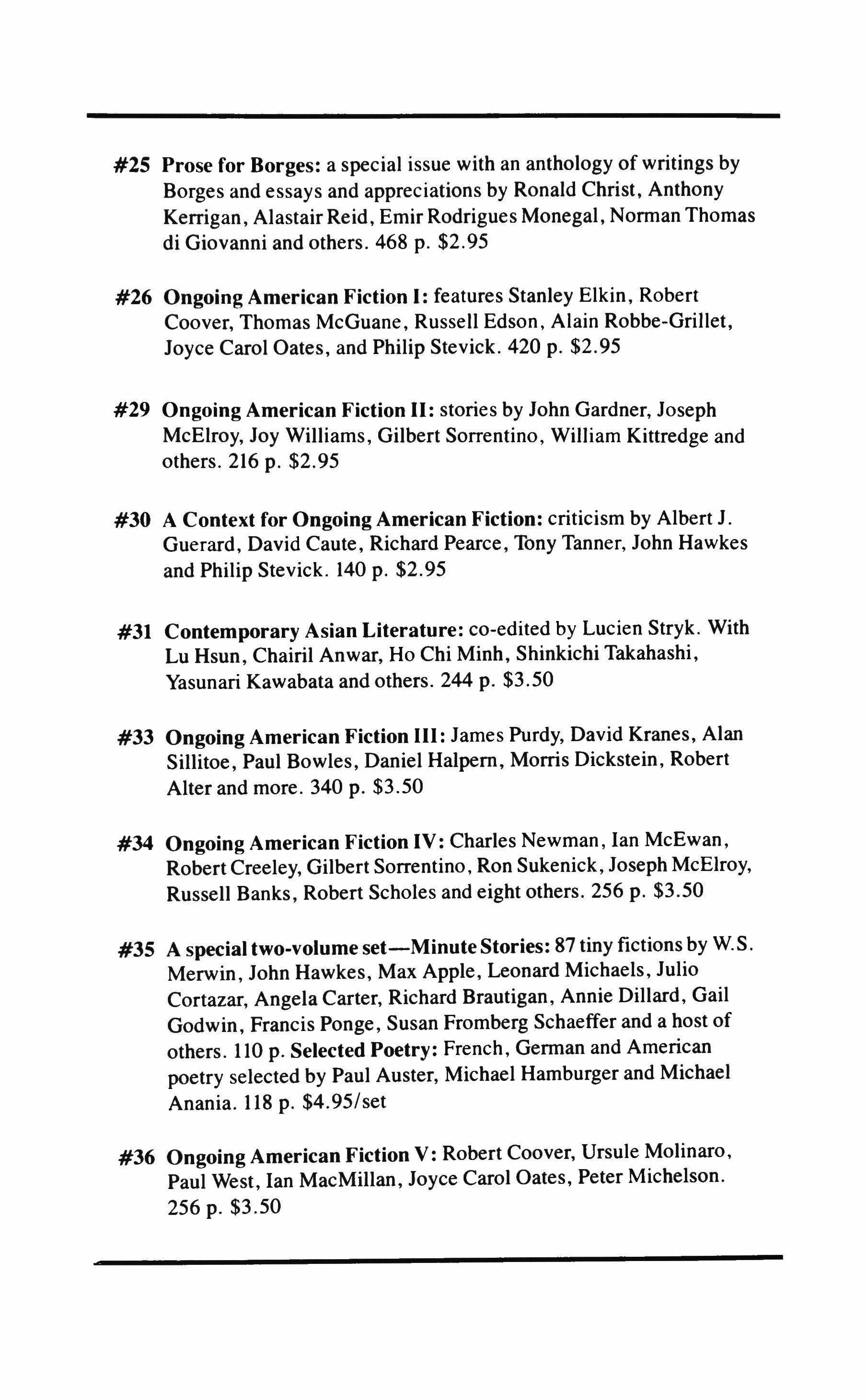
#25 Prose for Borges: a special issue with an anthology of writings by Borges and essays and appreciations by Ronald Christ, Anthony Kerrigan, Alastair Reid, Emir Rodrigues Monegal, Norman Thomas di Giovanni and others. 468 p. $2.95
#26 Ongoing American Fiction I: features Stanley Elkin, Robert Coover, Thomas McGuane, Russell Edson, Alain Robbe-Grillet, Joyce Carol Oates, and Philip Stevick. 420 p. $2.95
#29 Ongoing American Fiction II: stories by John Gardner, Joseph McElroy, Joy Williams, Gilbert Sorrentino, William Kittredge and others. 216 p. $2.95
#30 A Context for Ongoing American Fiction: criticism by Albert J. Guerard, David Caute, Richard Pearce, Tony Tanner, John Hawkes and Philip Stevick. 140 p. $2.95
#31 Contemporary Asian Literature: co-edited by Lucien Stryk. With Lu Hsun, Chairil Anwar, Ho Chi Minh, Shinkichi Takahashi, Yasunari Kawabata and others. 244 p. $3.50
#33 Ongoing American Fiction III: James Purdy, David Kranes, Alan Sillitoe, Paul Bowles, Daniel Halpern, Morris Dickstein, Robert Alter and more. 340 p. $3.50
#34 Ongoing American Fiction IV: Charles Newman, Ian McEwan, Robert Creeley, Gilbert Sorrentino, Ron Sukenick, Joseph McElroy, Russell Banks, Robert Scholes and eight others. 256 p. $3.50
#35 A special two-volume set-MinuteStories: 87 tiny fictions by W. S. Merwin, John Hawkes, Max Apple, Leonard Michaels, Julio Cortazar, Angela Carter, Richard Brautigan, Annie Dillard, Gail Godwin, Francis Ponge, Susan Fromberg Schaeffer and a host of others. 110 p. Selected Poetry: French, German and American poetry selected by Paul Auster, Michael Hamburger and Michael Anania. 118 p. $4.95/set
#36 Ongoing American Fiction V: Robert Coover, Ursule Molinaro, Paul West, Ian MacMillan, Joyce Carol Oates, Peter Michelson. 256 p. $3.50

#38 In the Wake of the WAKE: co-edited by David Hayman. With Samuel Beckett, John Cage, William C.-.ss, Italo Calvino, Amo Schmidt, Gilbert Sorrentino. 256 p. $3.50
#39 Contemporary Israeli Literature: fiction by Amos Oz, David Shahar, YehudaAmichai, Pinchas Sadeh, A. B. Yehoshua. Poetry by Amichai, Dan Pagis, Abba Kovner and others. Afterword by Robert Alter. 342 p. $4.25
#40 Ongoing American Fiction VI: Sean Con�olly, Pau�The�oux, �a�y Morris, Joyce Carol Oates, Michael Anania, Cynthia OZIck, Virgil Burnett, Joseph McElroy and 14 more. 280 p. $4.25
#41 Longer Fiction: novellas by Charles Newman and Arthur A. Cohen. A section of "LETTERS" by John Barth. 242 p. $4.25
#42 Men and Women: featuring Manuel Puig, Penelope Gilliatt, Joseph McElroy, Maxine Kurnin, William Gass, Joy Williams, T. Coraghessan Boyle and 11 more. Illustrated by Brad Holland. 280 p. $4.25
#44 Four Novellas: by Virgil Burnett, Peter Collier, Stanley Elkin and Oakley Hall. Illustrated by Jim Matusik. 280 p. $4.50
#45 War Stories: fourteen stories by Jay Neugeboren, Milovan Djilas, Ian MacMillan, Amost Lustig, Kent Anderson, Larry Heinemann, Benedict Kiely and others. 320 p. $4.50
#46 Fiction: by Arturo Vivante Maxine Kumin, Francine Prose, Nicholas Delbanco, John Hawkes, Bruce Chatwin, Cyra McFadden, Ted Solotaroff, William Kittredge, Meredith Steinbach and nine more. 296 p. $5.95
#47 Love/Hate: fiction by Robert Stone, Oakley Hall, Joyce Carol Oates, Angela Carter, Herbert Gold, Alfred Gillespie, Ted Walker, Victor Power and six more. Illustrated by Diane BleIl. 352 p. $5.95
#48 Western Stories: 19 stories, by Cormac McCarthy, Ivan Doig John Sayles, Edward Abbey, William Kittredge, Thomas McGuane, Leslie Silko, Raymond Carver, Dorothy M. Johnson, John Nichols, David Quammen and others. 298 p. $5.95
#49 Science Fiction: featuring Thomas Disch, Ursula K. LeGuin, Gene Wolfe, Samuel Delany and others. With an introduction by A. J. Budrys. 262 p. $5.95
#50 Fiction: by Thomas McGuane, Jonathan Penner, Robert Stone, Alan Sillitoe, Helen Chasin, Arturo Vivante, Arnost Lustig, Richard Stern and others. 256 p. $5.95

We pay postage on orders of three or more copies. For orders of 1 or 2 books please add $1.00 for postage and handling. Supplies of all back issues are limited.
TriQuarterly
Northwestern University/1735 Benson Avenue/Evanston, 111.60201
Please send me the following back issues ofTriQuarterly:
I enclose $ Charge my VISA/MasterCard #
Signature: Expires:
Name Address City State Zip

Arnost Lustig
Stanley Elkin
James McManus
Mary Jane Jacob
Magdalena Abakanowicz
F. R. Padorr
Arturo Vivante
Joseph McElroy
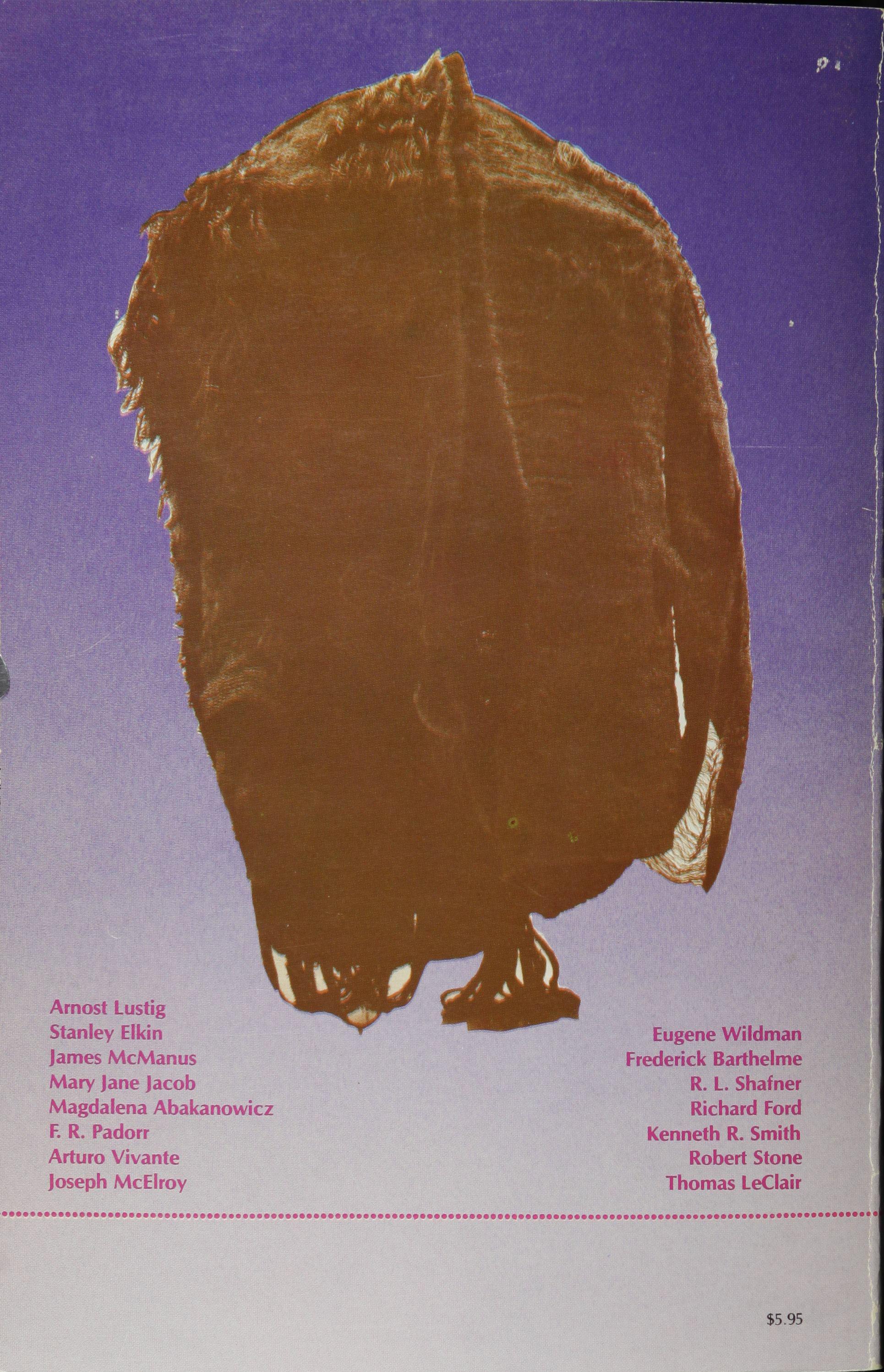
Eugene Wildman
Frederick Barthelme
R. L. Shafner
Richard Ford
Kenneth R. Smith
Robert Stone
Thomas LeClair